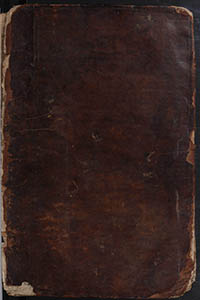
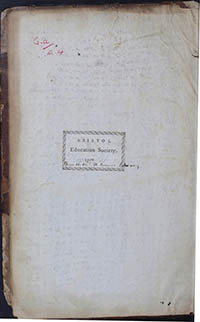
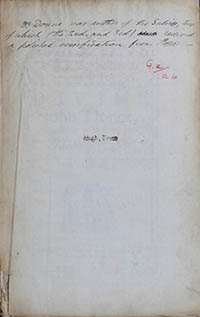
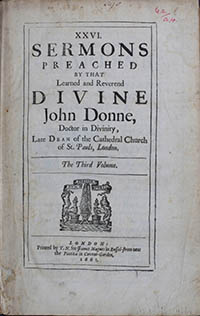
XXVI.
SERMONS
PREACHED
BY THAT
Learned and Reverend
DIVINE
John Donne,
Doctor in Divinity,
Late DEAN of the Cathedral Church
of St. Pauls, London.
The Third Volume. DVM PREMOR ATTOLLOR [emblem]
London:
Printed by T. N. for James Magnes in Russel-street near
the Piazza in Covent Garden.
166o
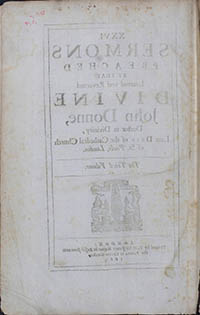
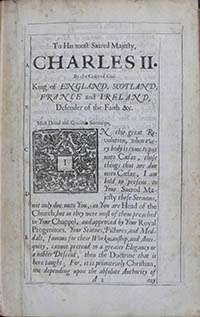
To His most Sacred Majesty,
CHARLES II.
By the Grace of God
King of ENGLAND, SCOTLAND,
FRANCE and IRELAND,
Defender of the Faith &c.
Most Dread and Gracious Soveraign,
INIn this great Re-
volution, when eve-
ry body is come to pay
unto Cæsar, those
things that are due
unto Cæsar, I am
bold to present to
Your Sacred Ma-
jesty these Sermons,
not only due unto You, as You are Head of the
Church, but as they were most of them preached
in Your Chappel, and approved by Your Royal
Progenitors. Your Statues, Pictures, and Med-
dals, famous for their Workmanship, and Anti-
quity, cannot pretend to a greater Elegancy or
a nobler Descent, then the Doctrine that is
here taught; For, it is primitively Christian,
not depending upon the absolute Authority of A2 any
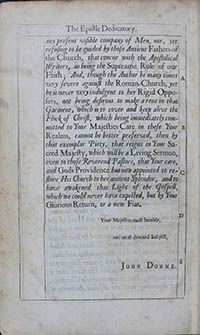 The Epistle Dedicatory.
The Epistle Dedicatory.
any present visible company of Men, nor, yet
refusing to be guided by those Antient Fathers of
the Church, that concur with the Apostolical
Writers, as being the Supreame Rule of our
Faith; And, though the Author be many times
very severe against the Roman-Church, yet
he is never very indulgent to her Rigid Oppo-
sers, not being desirous to make a rent in that
Garment, which is to cover and keep alive the
Flock of Christ, which being immediately com-
mitted to Your Majesties Care in these Your
Realms, cannot be better preserved, then by
that exemplar Piety, that reigns in Your Sa-
cred Majesty, which will be a Living Sermon,
even to those Reverend Pastors, that Your care,
and Gods Providence has now appointed to re-
store His Church to her antient Splendor, and to
have awakened that Light of the Gospell,
which we could never have expected, but by Your
Glorious Return, or a new Fiat.
Your Majesties most humble,
and most devoted Subject,
JOHN DONNE.
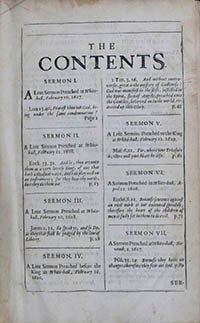
THE
CONTENTS.
SERMON I.
A Lent Sermon Preached at White-
hall, February 20. 1617.
Luc. 23.40. Fearest thou not God, be-
ing under the same condemnation?
Page 1 SERMON II.
A Lent Sermon Preached at White-
hall, February 12. 1618.
Ezek. 33.32. And lo, thou art unto
them as a very lovely Song, of one that
hath a pleasant voice, and can play well on
an Instrument; for they hear thy words,
but they do them not. p. 15
SERMON III.
A Lent Sermon Preached at White-
hall, February 20. 1628.
James 2.12. So speak ye, and so Do,
as they that shall be judged by the law of
Liberty. p. 28
SERMON. IV.
A Lent Sermon Preached before the
King at White-hall, February 16.
1620.
1 Tim. 3.16. And without contro-
versie, great is the mystery of Godliness:
God was manifest in the flesh, justified in
the Spirit, seen of Angels, preached unto
the Gentiles, believed on in the world, re-
ceived up into Glory. p. 45
SERMON V.
A Lent Sermon Preached to the King
at White-hall, February 12. 1629.
Mat. 6.21. For, where your Treasure
is, there will your heart be also. p. 61
SERMON VI.
A Sermon Preached at White-hall, A-
pril 21. 1616.
Eccles. 8.11. Because sentence against
an evil work is not executed speedily,
therefore the heart of the children of
men is fully set in them to do evil. p. 75
SERMON VII.
A Sermon Preached at White-hall, No-
vemb, 2. 1617.
Psal. 55.19. Because they have no
changes, therefore they fear not God. p. 89 SER
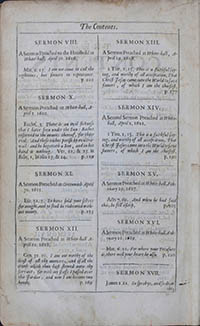 The Contents.
The Contents.
SERMON VIII.
A Sermon Preached to the Houshold at
White-hall, April 30. 1626.
Mat. 9.13. I am not come to call the
righteous, but sinners to repentance.
p. 101
SERMON X.
A Sermon Preached at White-hall, A-
pril 2. 1620.
Eccles. 5. There is an evil sickness
that I have seen under the Sun: Riches
reserved to the owners thereof, for their
evil. And these riches perish by evil tra-
vail: and he begetteth a Son, and in his
hand is nothing. Ver. 12. & 13. in
Edit. 1. In alia 13. & 14. p. 129
SERMON XI.
A Sermon Preached at Greenwich April
30. 1615.
Esa. 52.3. Ye have sold your selves
for nought, and ye shall be redeemed with-
out money. p. 153
SERMON XII.
A Sermon Preached at White-hall A-
pril 12. 1618.
Gen. 32.10. I am not worthy of the
least of all thy mercies, and of all the
truth which thou hast shewed unto thy
servant; for with my staffe I passed over
this Jordan, and now I am become two
bands. p. 169
SERMON XIII.
A Sermon Preached at White-hall, A-
pril 19. 1618.
1 Tim. 1.15. This is a faithful say-
ing, and worthy of all acceptation, That
Christ Jesus came into the World to save
sinners, of which I am the chiefest.
p. 177
SERMON XIV.
A Second Sermon Preached at White-
hall, April 2. 1621.
1 Tim. 1.15. This is a faithful say-
ing, and worthy of all acceptation, That
Christ Jesus came into the World to save
sinners, of which I am the chiefest.
p. 190
SERMON XV.
A Sermon Preached, at White-hall, Feb-
ruary 29. 1627.
Acts 7.60. And when he had said
this, he fell asleep. p. 205
SERMON XVI.
A Sermon Preached at White-hall, Feb-
ruary 22. 1629.
Mat. 6.21. For where your Treasure
is, there will your heart be also. p. 220
SERMON XVII.
James 2.12. So speak ye, and so do, as they
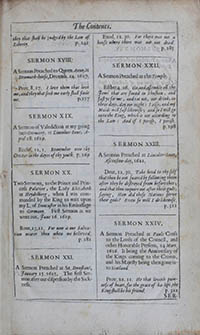 The Contents.
The Contents.
they that shall be judged by the Law of
Liberty. p. 241
SERMON XVIII.
A Sermon Preached to Queen Anne, at
Denmark-house, Decemb. 14. 1617.
Prov. 8.17. I love them that love
me, and they that seek me early shall finde
me. p. 257
SERMON XIX.
A Sermon of Valediction at my going
into Germany, at Lincolns-Inne, A-
pril 18. 1619.
Eccles. 12.1. Remember now thy
Creator in the dayes of thy youth. p. 269
SERMON XX.
Two Sermons, to the Prince and Prin-
cess Palatine, the Lady Elizabeth
at Heydelberg, when I was com-
manded by the King to wait upon
my L. of Doncaster in his Embassage
to Germany. First Sermon as we
went out, June 16. 1619.
Rom. 13.11. For now is our Salva-
tion nearer then when we believed.
p. 281
SERMON XXI.
A Sermon Preached at St. Dunstans,
January 15. 1625. The first Ser-
mon after our dispersion by the Sick-
ness.
Exod. 12.30. For there was not a
house where there was not one dead.
p. 285
SERMON XXII.
A Sermon Preached at the Temple.
Esther 4.16. Go and assemble all the
Jews that are found in Shushan, and
fast ye for me, and eat not, nor drink, in
three days, day nor night: I also, and my
Maids will fast likewise; and so I will go
in to the King, which is not according to
the Law: And if I perish, I perish.
p. 298
SERMON XXIII.
A Sermon Preached at Lincolns-Inne,
Ascension-day, 1622.
Deut. 12.30. Take heed to thy self
that thou be not snared by following them
after they be destroyed from before thee;
and that thou inquire not after their gods,
saying, How did these Nations serve
their gods? Even so will I do likewise.
p. 311
SERMON XXIV.
A Sermon Preached at Pauls Cross
to the Lords of the Council, and
other Honorable Persons, 24 Mart.
1616. It being the Anniversary of
the Kings coming to the Crown,
and his Majesty being then gone in-
to Scotland.
Prov. 22.11. He that loveth pure-
ness of heart, for the grace of his lips, the
King shall be his friend. p. 322 SER
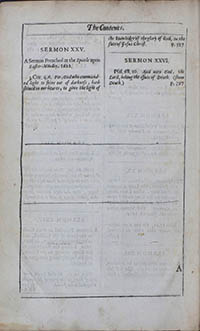 The Contents.
The Contents.
SERMON XXV.
A Sermon Preached at the Spittle upon
Easter-Monday, 1622.
2 Cor. 4.6. For, God who command-
ed light to shine out of darkness, hath
shined in our hearts, to give the light of
the knowledge of the glory of God, in the
face of Jesus Christ. p. 357
SERMON XXVI.
Psal. 68.20. And unto God, the
Lord, belong the issues of Death. (from
Death.) p. 397 A
 TO THE
TO THE READER. UPonUpon the Death of my Father Dr. Donne,
sometimes Deane of Pauls, I was sent to,
by his Majesty of Blessed Memory, to recol-
lect and publish his Sermons; I was encou-
raged by many of the Nobility, both Spi-
ritual and Temporal, and indeed, by the
most Eminent Men that the Kingdom then
had, of all Professions, telling me, what a
publick good I should confer upon the Church, and, that by this
means I should not only preach to all the Parishes of England,
but to those, whose Affairs carried them into Forraigne Coun-
tries; and to those, whose infirmities did not suffer them to come
to their own Churches at home, But, above all, I was encoura-
ged by the example of St. Paul, who, though he took wages
of other Churches, and yet served the Corinthians, thought him-
self excusable, in that, he was alwaies doing service to the Church
of Christ. The first Volume that I published, consisting of Fourscore
Sermons, I dedicated to his Majesty then living, by whom, it was
not only graciously received, but I had fresh Incouragements to
proceed: For the Second Volume, I was forced to take Protecti-
on from those that were then in Authority, lest (our duty to
our King being so often, and so pathetically urged) they might
have incurred the danger, First, to have been voted No
Sermons, and then, that No Sermons should
have bin burnt by the hand of the Publick Executioner; and,
the use that might have bin made of them, by keeping up the
Banks of the Church, against that Torrent of Heretiques, that
did then invade her, might have been absolutely defeated: for
now began to swarme and muster the Ebionites, Sabellians, Jovi-
nians, Eutichians, Corpocratians, Sethians, Cerinthians, Theo-
dotians, Nicolaitans, Samocetanians, Apolenarians, Montane-
ans, all against the second Person of the Trinity.
And, although, in some parts of the World the Sun may see
the Men eating their god, and in six hours journey farther, he
may see the gods eating the Men, though he may have beheld
as many Religions, as he produced Insects, yet he could tell us of
no such Python, as appeared here, who swallowing up all the
other Heretiques, pretended that he himself was the very Son of B God;

God; not knowing how dearly that Imposter payed for it, that
adventured upon that designe, but in the days of Queen Eliza-
beth; for though it be true, That he that is baptized into Christ, may
put on Christ, his Person, nay Him, so that God may take him for
his own Christ, and look upon him, as all Mankinde; Yet, 'tis
a hard matter to appear so before Man, for Homo homini dæmon,
we see nothing, we hear of nothing but the Imperfections of one
another, and then we are not only content to ground our Faith
upon slight Reports, but to believe, even Impossibilities.
The People concluded Paul to be a Murderer, but first, they
saw a Viper seize upon him after he had escaped Shipwrack; but
still proceeding upon new Evidence, when they saw him shake off
that Viper, they said he was a God; and certainly, though a Ca-
lumniator, with a two-edged tongue, sharper and more venemous
then the teeth of any Viper, may traduce the reputation of any
man, so far as to make impressions upon some pious and godly
persons, yet if those persons would but retreat from those
suddain assaults unto those Forts which their Charity may, nay,
ought to erect, but to reasonable Evidences; they may reasona-
bly conclude, that if many thousands were converted by one
Sermon to the Christian Faith; he that has spent so many years,
in publishing so many Sermons for the propagation of that Faith,
and preserving the Light of that Gospel, so as to dazle and extin-
guish those New Lights, those ignes fatuas, with their great Lead-
er William-a-the-Wispe, (who drawing men, first out of the
known paths, carries them into Boggs, Quagmires, and Whirle-
pools of Confusion) cannot possibly be but a well-grounded Chri-
stian.
When the Jews intended the building of the Temple, their
wise King Solomon sent to Hiram many thousand measures of
corn, knowing that the Fellers of Timber, the hewers of stone,
and those that bore the burden, must be provided for, as well as
the great Officers, the Overseers. Fac hoc & vives, was often
repeated to me when I undertook this work, and a fair reward was
promised me; but at last I am constrained, hoc facere ut vivam,
to publish them at my own cost that I may sell them; which I had
not been able to perform, if I had not been assisted by the
bounty of our most Honorable Lord Chancellor, (who is not only
content, that the Churches should be furnished with good Preach-
ers, but that those Preachers should have good Sermons) and I
am to rest satisfied with that Text, that tells us, that To those that
have much, more shall be given; and to those that have nothing (and
there is nothing so near of kin to Nothing, as a Reversion) that
that they have shall be taken away.
A better method (I confess) might have been observed in
their Publication; whereby those that are called to the service
of

of private Churches, and have not the convenience of Publick
Libraries, might have made more use of them, (for, I have seen
many great Edifices, many noble Palaces erected without one
stone taken out of the Quarry) but, so neer an Age, where Holy
Confusion is prescribed to the Preacher, a little disorder (I hope,
Gentle Reader) may be pardoned in the Publisher.
JO. DONNE.
Postscript. BYBy the Dates of these Sermons, the Reader may easily col-
lect, that although they are the last that are published, they
were the first that were Preached; and I did purposely select these
from amongst all the rest, for, being to finish this Monument,
which I was to erect to his Memory, I ought to reserve those ma-
terials that were set forth with the best Polish: The Impression
consists onely of Five hundred, which will somewhat advance the
Price; but the buyer being at liberty, he can receive no pre-
judice. Upon
 Upon the sending the First Volume of these
Upon the sending the First Volume of these
SERMONS to the Right Reverend Father in God, the
Bishop of Peterborough, then my Diocesan, I received this
Letter.
SIR, YOuYou have sent me a Treasure, and I would
not share time to tell you so, till I had some-
what satisfied the thirst I had to drink down
many of those Excellent Sermons, which I
have so long desired: And by this I have the
advantage, that I can know what I thank you
for, though I could presumptuously value
them, by the rest of his which I have heard,
and read formerly, (for I think I have all those, that in the Press
did foreran these) yet by this time, I can sensibly acknowledge to
you, how great cause so many of us have to thank you: How well may
your Parishioners pardon your silence to them, for a while, since by it
you have Preached to them and their Childrens children, and to all
our English Parishes for ever: For; certainly, many ages hence when
they shall be made good, or confirmed in goedness, by studying your
Father, they shall account these times Primitive, in which he
Preached; and you will then, if not now, be in danger to lose your
propriety in him, he will be called a Father of the Church. Sir, Though this Book, with his former Printed Sermons be a
great Stock to the Church, from one man, yet if you shall please to
perform the trust of a good Executor, there is, I presume, a great
remainder of his Legacy, which, when you have taken breath, we must
call you to account for, in a Court of Equity; though you may think
this will abundantly satisfie, yet believe it, Sir, it will but increase
our appetite: We shall give you time, Sir, but no general release, yet
his God and yours assist you, to whose blessing I commend you, and
am Sir Your very Friend
in Christ Jesus
Jo. Peterborough.
Peterborough,
July 20.
1640.
A
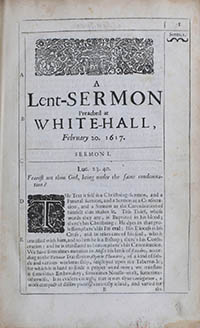 1
Serm. 1.
A
1
Serm. 1.
A Lent-SERMON
Preached at
WHITE-HALL,
February 20. 1617.
SERMON I. Luc. 23.40.
Fearest not thou God, being under the same condemna-
tion? THeThe Text it self is a Christning-Sermon, and a
Funeral Sermon, and a Sermon at a Consecra-
tion, and a Sermon at the Canonization of
himself that makes it. This Thief, whose
words they are, is Baptized in his blood;
there's his Christning: He dyes in that pro-
fession; there's his Funeral: His Diocess is his
Cross, and he takes care of his soul, who is
crucified with him, and to him he is a Bishop; there's his Conse-
cration: and he is translated to heaven; there's his Canonization.
We have sometimes mention in Moses his book of Exodus, accor-
ding to the Romane Translation, Operis Plumarii, of a kind of sub-
tle and various workmanship, imployed upon the Tabernacle,
for which it is hard to finde a proper word now; we translate
it sometimes Embroidery, sometimes Needle-work, sometimes
otherwise. It is evident enough, that it was Opus variegatum, a
work compact of divers pieces, curiously inlaid, and varied for B
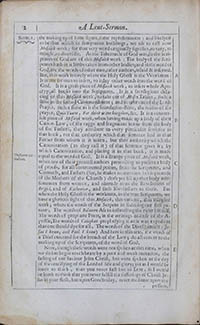 2
A Lent-Sermon.
Serm. 1.
2
A Lent-Sermon.
Serm. 1.
the making up of some figure, some representation: and likelyest
to be that which in sumptuous buildings, we use to call now
Mosaick work: for that very word originally signifies, to vary, to
mingle, to diversifie. As the Tabernacle of God was, so the Scri-
ptures of God are of this Mosaick work: The body of the Scri-
ptures hath in it limbs taken from other bodies; and in the word of
God, are the words of other men, other authors, inlaid & inserted.
But, this work is onely where the Holy Ghost is the Workman:
It is not for man to insert, to inlay other words into the word of
God. It is a gross piece of Mosaick work, to insert whole Apo-
cryphal books into the Scriptures. It is a sacrilegious defa-
cing of this Mosaick work, to take out of Moses Tables, such a
stone as the second Commandment; and to take out of the Lords
Prayer, such a stone as is the foundation-stone, the reason of the
prayer, Quia Tuum, For thine is the kingdom, &c. It is a counter-
feit piece of Mosaick work, when having made up a body of their
Canon-Law, of the raggs and fragments torne from the body
of the Fathers, they attribute to every particular sentence in
that book, not that authority which that sentence had in that
Father from whom it is taken, but that authority which the
Canonization (as they call it) of that sentence gives it; by
which Canonization, and placing it in that book, it is made
equal to the word of God.Thesaurus Ca-
tholicus. It is a strange piece of Mosaick work,
when one of their greatest authors pretending to present a body
of proofs, for all controverted points, from the Scriptures, and
Councels, and Fathers (for, he makes no mention in his promise
of the Mothers of the Church) doth yet fill up that body with
sentences from women, and obtrude to us the Revelations of
Brigid, and of Katherine, and such She-fathers as those. But
when the Holy Ghost is the workman, in the true Scriptures, we
have a glorious sight of this Mosaick, this various, this mingled
work; where the words of the Serpent in seducing our first pa-
rents, The words of Balaams Ass in instructing the rider himself,
The words of prophane Poets, in the writings and use of the A-
postle, The words of Caiaphas prophesying that it was expedient
that one should dye for all, The words of the Divel himself (Je-
sus I know, and Paul I know) And here in this text, the words of
a Thief executed for the breach of the Law; do all concur
to the making up of the Scriptures, of the word of God. Now, though these words were not spoken at this time, when
we do but begin to celebrate by a poor and weak imitation, the
fasting of our Saviour Jesus Christ, but were spoken at the day
of the crucifying of the Lord of life and glory; yet as I would be
loath to think, that you never fast but in Lent, so I would
be loath to think that you never fulfill the sufferings of Christ Je-
sus in your flesh, but upon Goodfriday, never meditate upon the
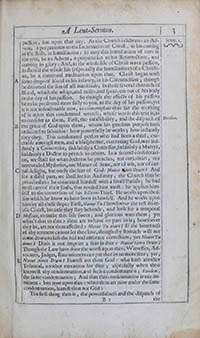 A Lent-Sermon.
3
Serm.1.
A Lent-Sermon.
3
Serm.1.
passion, but upon that day. As the Church celebrates an Ad-
vent, a preparation to the Incarnation of Christ, to his coming
in the flesh, in humiliation: so may this humiliation of ours in
the text, be an Advent, a preparation to his Resurrection, and
coming in glory: And, as the whole life of Christ was a passion,
so should the whole life (especially the humiliation) of a Christi-
an, be a continual meditation upon that. Christ began with
some drops of blood in his infancy, in his Circumcision; though
he drowned the sins of all mankinde, in those several channels of
Blood, which the whips, and nailes, and spear, cut out of his body
in the day of his passion. So though the effects of his passion
be to be presented more fully to you, at the day of his passion, yet
it is not unseasonable now, to contemplate thus far the working
of it upon this condemned wretch, whose words this text is,Division. as
to consider in them, First, the infallibility, and the dispatch of
the grace of God upon them, whom his gracious purpose hath
ordained to salvation: how powerfully he works; how instantly
they obey. This condemned person who had been a thief, exe-
crable amongst men, and a blasphemer, execrating God, was sud-
dainly a Convertite, suddainly a Confessor, suddainly a Martyr,
suddainly a Doctor to preach to others. In a second considerati-
on, we shall see what doctrine he preaches; not curiosities, not
unrevealed Mysteries, not Matter of State, nor of wit, nor of car-
nal delight, but onely the fear of God: Nonne times Deum? And
for a third part, we shall see his Auditory, the Church that he
preached to: he contented himself with a small Parish; he had
most care of their souls, that needed him most: he applies him-
self to the conversion of his fellow-Thief. He works upon those
sins which he knew to have been in himself. And he works upon
him by all these steps: First, Nonne Tu? howsoever the rest do re-
vile Christ, because they stay behinde, and look for a temporal
Messias, to make this life sweet, and glorious unto them; yet
what's that to thee? thou art to have no part in it; howsoever
they be, art not thou affected? Nonne Tu times? If the bitterness
of thy torment cannot let thee love, though thy stomach will not
come down to kiss the rod and embrace correction, yet Nonne Tu
times? Doth it not imprint a fear in thee? Nonne times Deum?
Though the Law have done the worst upon thee, Witnesses, Ad-
vocates, Judges, Executioners can put thee in no more fear; yet,
Nonne times Deum? Fearest not thou God? who hath another
Tribunal, another execution for thee; especially when thou
knowest thy condemnation, and such a condemnation; Eandem,
the same condemnation; And that this condemnation is not im-
minent, but now upon thee: when thou art now under the same
condemnation, fearest thou not God? The first thing then is, the powerfulness and the dispatch of B2
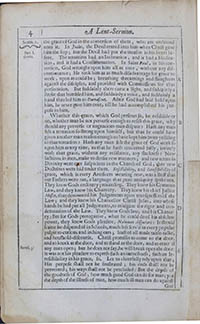 4
A Lent-Sermon.
Serm.1.
4
A Lent-Sermon.
Serm.1.
the grace of God in the conversion of them, who are ordained Part. I.
unto it. In Judas, the Devil entred into him when Christ gave
him the Sop;Gratia. but the Devil had put the treason in his heart be-
fore. The tentation had an Inchoation, and it had a Medita-
tion, and it had a Consummation. In Saint Paul, in his con-
version, God wrought upon him all at once, without any dis-
continuance; He took him at as much disadvantage for grace to
work, upon as could be; breathing threatnings and slaughters
against the disciples, and provided with Commissions for that
persecution. But suddainly there came a light, and suddainly a
stroke that humbled him, and suddainly a voice, and suddainly a
hand that led him to Damascus. After God had laid hold upon
him, he never gave him over, till he had accomplished his pur-
pose in him. Whether this grace, which God presents so, be resistible or
no, whether man be not perverse enough to resist this grace, why
should any perverse or ungracious man dispute? Hath any man
felt a tentation so strong upon himself, but that he could have
given another man reason enough to have kept him from yeilding
to that tentation? Hath any man felt the grace of God work so
upon him at any time, as that he hath concurred fully, intirely
with that grace, without any resistance, any slackness? New
fashions in men, make us doubt new manners; and new terms in
Divinity were ever suspicious in the Church of God, that new
Doctrines were hid under them. Resistibility, and Irresistibility of
grace, which is every Artificers wearing now, was a stuff that
our Fathers wore not, a language that pure antiquity spake not.
They knew Gods ordinary proceeding. They knew his Common
Law, and they knew his Chancery. They knew his chief Justice
Moses, that denounced his Judgements upon transgressors of the
Law; and they knew his Chancellor Christ Jesus, into whose
hands he had put all Judgements, to mitigate the rigor and con-
demnation of the Law. They knew Gods law, and his Chance-
ry: But for Gods prerogative, what he could do of his absolute
power, they knew Gods pleasure, Nolumus disputari: It should
scarce be disputed of in Schools, much less serv'd in every popular
pulpit to curious and itching ears; least of all made table-talke,
and houshold-discourse. Christ promises to come to the door,
and to knock at the door, and to stand at the door, and to enter if
any man open;Revel. 3. but he does not say, he will break open the door:
it was not his pleasure to express such an earnestness, such an Ir-
resistibility in his grace, so. Let us cheerfully rely upon that;
His purpose shall not be frustrated; his ends shall not be
prevented; his ways shall not be precluded: But the depth of
the goodness of God, how much good God can do for man; yea
the depth of the illness of man, how much ill man can do against
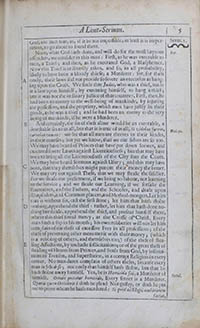 A Lent-Sermon.
5
Serm.1.
A Lent-Sermon.
5
Serm.1.
God, are such seas, as, if it be not impossible, at least it is imper-
tinent, to go about to sound them. Now, what God hath done,Fac. and will do for the most haynous
offenders, we consider in this man: First, as he was execrable to
men, a Thief; and then, as he execrated God, a Blasphemer.
Now this Thief is ordinarily taken, and so, in all probability,
likely to have been a bloody thiefe, a Murderer: for, for theft
onely, their laws did not provide so severe an execution as hang-
ing upon the Cross. We finde that Judas, who was a thief,
made it a law upon himself, by executing himself, to hang a thief;
but it was not the ordinary justice of that countrey. First, then, he
had been an enemy to the well-being of mankinde, by injuring
the possession, and the propriety, which men have justly in their
goods, as he was a thief; and he had been an enemy to the very
being of mankinde, if he were a Murderer. And certainly, the sin of theft alone would be an execrable, a
detestable sin to us all, but that it is true of us all, Si videbas furem,
currebas cum eoPsal. 50.: we see that all men are theeves in their kindes,
in their courses; but yet we know, that we our selves are so too.
We may have heard of Princes that have put down Stewes, and
executed severe Lawes against Licentiousness; but that may have
been to bring all the Licentiousness of the City into the Court.
We may have heard Sermons against Usury; and this may have
been, that they themselves might put out their money the better.
We may cry out against Theft, that we may steale the safelier.
For we steale our preferment, if we bring no labour, nor learning
to the Service; and we steale our Learning, if we forsake the
Fountaines, and the Fathers, and the Schooles, and deale upon
Rhapsoders, and Common placers, and Method-mongers. Let him
that is without sin, cast the first stone; let him that hath stolne
nothing, apprehend the thief: rather, let him that hath done no-
thing but steale, apprehend the thief, and present himself there,
where this thief found mercy, at the Crosse of Christ. Every
man hath a sop in his mouth; his own robberies will not let him
complain of the theft of excessive Fees in all professions; of the
theft of preventing other mens merit with their money; (which
is a robbing of others, and themselves too;) of the theft of stea-
ling Affections, by unchaste sollicitations; or of the great theft of
stealing of Hearts from Princes, and Souls from God, by insinua-
tions of Treason, and Superstition, in a corrupt Religion in every
corner. No man dares complain of others thefts, because every
man is felo de se; not onely that himself hath stolne, but that he
hath stolne away himself. Yea, he is Homicida sui,Tertul. a Murderer of
himself. Omnis peccator homicida, Every sinner is a Murderer.
Quæris quem Occiderit? doth he plead Not guilty, or doth he put
me to prove whom he hath murdered? Si quid ad Elogii ambitionem
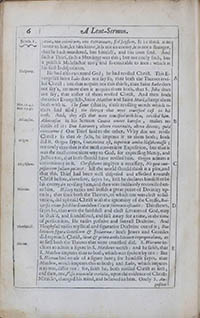 6
A Lent-Sermon.
Serm.1.
6
A Lent-Sermon.
Serm.1.
faciat, non inimicum, non extraneum, sed seipsum. If he think it an
honor to him, let him know, it is not an enemy, it is not a stranger,
that he hath murdered, but himself, and his own soul. And
such a Thief, such a Murderer was this; but not onely such, but
a publick Malefactor too; and so execrable to men: which is
his first Indisposition. He had also execrated God; he had reviled Christ. BlaspemyBlasphemy.This E-
vangelist Saint Luke does not say so, that both the Theeves revi-
led Christ: but that acquits not this thiefe, that Saint Luke does
not say't, no more then it acquits them both, that S. John does
not say, that either of them reviled Christ. And then both
the other Evangelists, Saint Matthew and Saint Mark, charge them
both with it.Mat. 27.4.3.
Mar. 15.32. The same (that is, those reviling words which o-
thers had used) the theeves that were crucified cast in his
teeth. And, they also that were crucified with him, reviled him.
Athanasius in his Sermon Contra omnes hæreses,Athanasius. makes no
doubt of it: Duo Latrones; altero execrante, altero dicente, quid
execramur? One Thief said to the other, Why doe we revile
Christ?Origen. so that de facto, he imputes it to them both; both
did it. Origen sayes, Conveniens est, inprimis ambos blasphemasse;
not onely that that is the most convenient Exposition, but that it
was the most convenient way to God, for expressing Mercy, and
Justice too, that both should have reviled him. Origen admits a
conveniency in it.Chrysostome. Chrysostome implyes a necessity, Ne quis com-
posito rem factam putaret: lest the world should think it a plot, and
that this Thief had been well disposed and affected towards
Christ before, therefore, sayes he, first he declares himself to be
his enemy, in reviling him, and then was suddainly reconciled un-
to him.Hilarius. Hilary raises and builds a great point of Divinity up-
on it; that since both the Theeves, of which one was elect to sal-
vation, did upbraid Christ with the ignominy of the Crosse, Uni-
versis etiam fidelibus scandalum Crucis futurum ostendit: This shews,
sayes he, that even the faithfull and elect servants of God, may
be shak'd, and scandalized, and fall away for a time, in the time
of persecution. He raises positive and literall Doctrine. And
Theophylact raises mystical and figurative Doctrine out of it;Theophylact. Duo
latrones figura Gentilium & Judæorum: both Jewes and Gentiles
did reproach Christ, Sicut & primo ambo latrones improperabant, as
at first both the Theeves that were crucified did.Hierom. S. Hierome in-
clines to admit a figure in S. Matthews words: and he saith, that
S. Matthew imputes that to both, which was spoken by one: But
S. Hierom had no use of a figure here; for himselfe sayes, that
Matthew, which imputes this to both; and Luke, which imputes
it to one, differ not: for, saith he, both reviled Christ at first;
and then, one, Visis miraculis credidit, upon the evidence of Christs
Miracles, changed his mind, and believed in him. Onely S. Au-
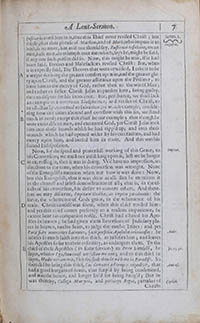 A Lent-Sermon.
7
Serm.1.
gustine is confident in it, that this Thief never reviled Christ; but
A Lent-Sermon.
7
Serm.1.
gustine is confident in it, that this Thief never reviled Christ; but
thinks, that that phrase of Matthew, and of Mark,Augustine. who impute it to
both, is no more, but as if one should say, Rusticani insultant; mean
men, base men, do triumph over me: which, says he, might be said,
if any one such person did so. Now, this might be true, if it had
been said, Theeves and Malefactors reviled Christ: But, when
it is expresly said, The Theeves that were crucified, I take it to be
a way of deriving the greater comfort upon us, and the greater glo-
ry upon Christ, and the greater assurance upon the Prisoner, to
leave him to the mercy of God, rather then to the wit of Man;
and rather to suffer Christ Jesus to pardon him, being guilty,
then to dispute for his innocence. For, perchance, we shall lack
an example of a notorious Blasphemer, and reviler of Christ, to
be effectually converted to salvation (of which example, conside-
ring how our times abound and overflow with this sin, we stand
much in need) except this thief be our example; that though he
were execrable to men, and execrated God, yet Christ Jesus took
him into those bowels which he had ripp'd up, and into those
wounds which he had opened wider by his execrations, and had
mercy upon him, and buried him in them. And this was his
second Indisposition. Now, for the speed and powerfull working of this Grace,Impetus. to
his Conversion; we must not insist long upon it, lest we be longer
in expressing it, then it was in doing. We have no impression, no
direction of the time, when his conversion was wrought. None
of the Evangelists mention when nor how it was done: None,
but this Evangelist, that it was done at all. But he mentions it
in the clearest and safest demonstration of all; that is, in the ef-
fects of his conversion, his desire to convert others. And there-
fore we may discerne, Impetum Gratiæ, in impetu pœnitentis: the
force, the vehemence of Gods grace, in the vehemence of his
zeale. Christ himself was silent, when this thief reviled him:
and yet this thief comes presently to a zealous impatience, he
cannot hear his companion revile. Christ had estated his Apo-
stles in heaven; he had given them Reversions of Judiciary pla-
ces in heaven, twelve Seats, to judge the twelve Tribes: and yet
Facit fides innocentes Latrones, facit perfidia Apostolos criminosos:Ambr. he
infuses so much faith into this thief, as justifies him; and leaves
his Apostles so far to their infirmity, as endangers them. To the
chief of these Apostles (in some services) to Peter himself,Jo. 13.36. he
sayes, Whither I go, thou canst not follow me now; and to this thief he
sayes, Hodie mecum eris, This day shalt thou be with me in Paradise. So
soon did he bring this thief, Cui damnari ad tempus expedivit,Ambros. that
had a good bargain of death, that scap'd by being condemned,
and was the better, and longer liv'd for being hang'd; (for he
was thereby, Collega Martyrii, and particeps Regni,Cyprian. partaker of
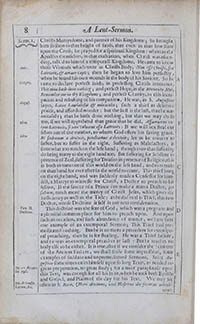 8
A Lent-Sermon.
Serm.1.
8
A Lent-Sermon.
Serm.1.
Christs Martyrdome, and partner of his Kingdome; he brought
him so soon to that height of faith, that even in that low state
upon the Cross, he prayed for a spiritual Kingdom: whereas the
Apostles themselves, in that exaltation, when Christ was ascen-
ding, talk'd to him of a temporall Kingdome. He came to know those
Wounds which were in Christs Body,Ambr. Non esse Christi, sed
Latronis, & amare cæpit; then he began to love him perfectly,
when he found his own wounds in the body of his Saviour. So he
came to declare perfect faith,Gregory. in professing Christs innocence,
This man hath done nothing; and perfect Hope, in the Momento Mei,
Remember me in thy Kingdome; and perfect Charity, in this incre-
pation and rebuking of his companion.August. He was, as S. Augustine
sayes, Latro Laudabilis & miraculis; such a thief as deserved
praise, and afforded wonder: but the best is the last, that he was
imitabilis; that he hath done nothing, but that we may do so
too,Idem. if we will apprehend that grace that he did. Assumamus vo-
cem Latronis, si non volumus esse Latrones: If we will not steal our
selves out of the number,Idem to whom God offers his saving grace.
Ut sedeamus a dextris, pendeamus a dextris; let us be content to
suffer, but to suffer in the right. Suffering as Malefactors, is
somewhat too much on the left hand; though even that suffering
do bring many to the right hand too. But suffering for Schisme in
pretence of Zeal, suffering for Treason in pretence of Religion; this
is both to turn out of this world on the left hand, and to remain
on that hand for ever after in the world to come. This thief hung
on the right hand, and was suddenly made a Confessor for him-
self, a Martyr to witnesse for Christ, a Doctor to preach to his
fellow. If the favour of a Prince can make a man a Doctor, per
saltum, much more the mercy of Christ Jesus, which gives the
Sufficiency as well as the Title: as he did in this Thief, this new
Doctor, whose Doctrine it self is our next consideration. Part. II.This doctrine was the fear of God, which was a pregnant and
Doctrina.a plentiful common place for him to preach upon. And upon
such an occasion, and such abundance of matter, we have here
one example of an extemporal Sermon; This Thief had pre-
meditated nothing. But he is no more a precedent for extempo-
ral preaching, then he is for stealing. He was a Thief before,
and he was an extemporal preacher at last: But he teaches no
body else to be either. It is true, that if we consider the Sermons
of the Ancient Fathers, we shall finde some impressions, some
examples of suddain and unpremeditated Sermons. Saint Au-
gustine some times eases himself upon so long Texts,Ser. 10 de ver-
bis Hpli. as needed no
great preparation, no great study; for a meer paraphrase upon
this Text, was enough for all his hour, when he took both Epistle
and Gospel,Ser. de Sancto
Latrone, &c. and Psalm of the day for his Text. We may see
often in S. Bern. (Heri diximus, and Hesterno die fecimus mentio-
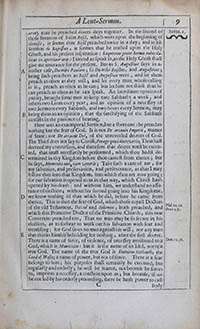 A Lent-Sermon.
9
Serm.1.
nem) that he preached divers days together. In the second of
A Lent-Sermon.
9
Serm.1.
nem) that he preached divers days together. In the second of
those Sermons of Saint Basil, which were upon the beginning of
Genesis, it seems that Basil preached twice in a day; and in his
Sermon de Baptismo, it seemes that he trusted upon the Holy
Ghost, and his present inspiration: Loquemar prout Sermo nobis da-
bitur in apertione oris: I intend to speak so, as the Holy Ghost shall
give me utterance for the present. But as S. Augustine says in a-
nother case, Da mihi Paulum; so Da mihi Basilios, and Augustinos;
bring such preachers as Basil and Augustine were, and let them
preach as often as they will; and let every man whose calling
it is, preach as often as he can; but let him not think that he
can preach as often as he can speak. An inordinate opinion of
purity, brought some men to keep two Sabbaths a week, and
others two Lents every year; and an opinion of a necessity of
two Sermons every Sabbath, and two hours every Sermon, may
bring them to an opinion, that the sanctifying of the Sabbath
consists in the patience of hearing. Here was an extemporal Sermon, but a short one: he preaches
nothing but the fear of God. It is not De arcanis Imperii, matter
of State: nor De arcanis Dei, of the unrevealed decrees of God.
The Thief does not say to Christ, Perage quod decreveris; Thou hast
decreed my conversion, and therefore that decree must be execu-
ted, that must necessarily be performed, which thou hadst de-
termined in thy Kingdom before thou camest from thence; but
he says, Memento mei, cum veneris; Take such a care of me, for
my salvation, and preservation, and perseverance, as that I may
follow thee into that Kingdom, into which thou art now going;
for our salvation is opened to us in that way, which Christ hath
opened by his death: and without him, we understand no assu-
rance of election; without his second going into his Kingdome,
we know nothing of that which he did, before he came from
thence. This is then the fear of God,Psal. 11.10. which those royall Doctors
Prov. 1.7.of the old Testament, David and Solomon, both preached, and
which this Primitive Doctor of the Primitive Church, this new
Convertite preached too, That no man may be so secure in his
election, as to forbear to work out his salvation with fear and
trembling: for God saves no man against his will, nor any man
that thinks himself beholding for nothing, after the first decree.Dan. 11.38.
There is a name of force, of violence, of necessity attributed to a
God, which is Mauzzim: but it is the name of an Idol, not of a
true God. The name of the true God is Dominus tzebaoth, the
Lord of Hosts; a name of power, but not of force. There is a fear
belongs to him; his purposes shall certainly be executed, but
regularly and orderly; he will be feared, not because he forces
us, imprints a necessity, a coaction upon us; but because, if we
be not led by his orderly proceeding, there he hath power to cast C
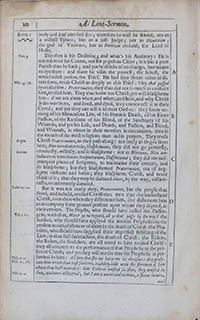 10
A Lent-Sermon.
Serm.1.
10
A Lent-Sermon.
Serm.1.
body and soul into hell fire; therefore he will be feared, not as
a wilfull Tyrant, but as a just Judge; not as Mauzzim,
the god of Violence, but as Dominus tzebaoth, the Lord of
Hosts. Part 3.This then is his Doctrine; and what's his Auditory? He is
not reserved for Courts, nor for populous Cities; it is but a poor
Parish that he hath; and yet he thinks of no change, but means
to dye there: and there he visits the poorest, the sickest, the
wretchedest person, the Thief. He had seen divers other of di-
vers sorts,Mat. 27.38. revile Christ as deeply as this Thief: They that passed
by reviled him: Prætereuntes, they that did not so much as consider
him, reviled him. They that know not Christ, yet will blaspheme
him: if we ask them when, and where, and how, and why Christ
Jesus was born, and lived, and dyed, they cannot tell it in their
Creed; and yet they can tell it in their Oathes: they know no-
thing of his Miraculous Life, of his Humble Death, of his Bitter
Passion, of the Ransome of his Blood, of the Sanctuary of his
Wounds; and yet his Life, and Death, and Passion, and Blood,
and Wounds, is oftner in their mouthes in execrations, then in
the mouth of the most religious man in his prayers. They revile
Christ Prætereuntes,Origen. as they pass along: not onely as Origen sayes
here, Non incedentes recte, blasphemant, they did not go perversly,
crookedly,Hierom. wilfully, and so blaspheme: nor as Hierome, Non am-
bulantes in vero itinere Scripturarum, blasphemant; they did not mis-
interpret places of Scripture, to maintaine their errours, and
so blaspheme; but they blasphemed Prætereuntes, out of neg-
ligent custome and habit; they blaspheme Christ, and never
think of it; that they may be damned obiter, by the way, collate-
rally, occasionately damned. Luke 23.24.But it was not onely they, Prætereuntes, but the people that
stood, and beheld, reviled Christ too: men that doe understand
Christ, even then when they dishonour him, doe dishonour him
to accompany some greater persons upon whom they depend, in
their errours. The Priests, who should have called the Passen-
gers,Thr. 1.12. with that, Have ye no regard, all ye that passe by the way? the
Scribes, who should have applyed the ancient Prophesies to the
present accomplishment of them in the death of Christ: the Pha-
risees, who should have supplied their imperfect fulfilling of the
Law, in that full satisfaction, the death of Christ: the Elders,
the Rulers, the Souldiers, are all noted to have reviled Christ:
they all concurre to the performance of that Prophesie in the per-
son of Christ; and yet they will not see that the Prophesie Psal. 22.7. is per-
formed in him: Psal. 69.26. All they that see me have me in derision: they perse-
cute him whom thou hast smitten, and they adde unto the sorrowes of him
whom thou hast wounded: Psal. 22.4.Our Fathers trusted in thee, they trusted in
thee, and were delivered; but I am a worm and no man, a shame to men,
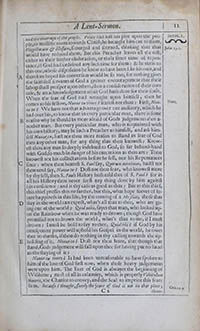 A Lent-Sermon.
11
Serm.1.
A Lent-Sermon.
11
Serm.1.
and the contempt of the people. Pilate had lost his plot upon the peo-
ple, to mollifie them towards Christ; he brought him out to them,
Flagellatum & illusum, scourged and scorned,John 19.1. thinking that that
would have reduced them. But this Preacher leaves all the rest,
either to their farther obduration, or their fitter time of repen-
tance, if God had ordained any such time for them: & he turns to
this one, whose disposition he knew to have been like his own, and
therefore hoped his conversion would be so too; for nothing gives
the faithfull servants of God a greater encouragement that their
labors shall prosper upon others, then a consideration of their own
case, & an acknowledgement what God hath done for their souls.
When the fear of God had wrought upon himself, then he
comes to his fellow, Nonne tu times? fearest not thou? First,Times. Non-
ne tu? We have not that advantage over our auditory, which he
had over his, to know that in every particular man, there is some
reason why he should be more afraid of Gods judgements then a-
nother man. But every particular man, who is acquainted with
his own history, may be such a Preacher to himself, and ask him-
self Nonne tu, hast not thou more reason to stand in fear of God
then any other man, for any thing that thou knowest? Know-
est thou any man so deeply indebted to God, so far behind-
hand with God, so much in danger of his executions as thou art? Thou
knowest not his colluctations before he fell, nor his Repentances
since: when thou hearest S. Paul say, Quorum maximus, hadst not
thou need say, Nonne tu? Dost not thou fear, who knowest more
by thy self, then S. Pauls History hath told thee of S. Paul? for in
all his History thou never seest any thing done by him against
his conscience: and is thy case as good as that? But to this thief,
this thief presses this no farther, but this, what hope soever of fu-
ture happiness in this life, by the coming of a Messias, those that
stay in the world can expect, what's all that to thee, who art go-
ing out of the world? Quid mihi, sayes that man, who looked up-
on the Rainbow when he was ready to drown; though God have
promised not to drown the world, what's that to me, if I must
drown? I must be bold to say to thee, Quid tibi? if God by his
omnipotent power will uphold his Gospel in the world, he owes
thee no thanks, if thou do nothing in thy calling towards the up-
holding of it. Nonne tu? Dost not thou feare, that though that
stand, Gods judgement will fall upon thee for having put no hand
to the staying of it? Nonne tu times? It had been unreasonable to have spoken to
him of the love of God first now, when those heavy judgements
were upon him. The Fear of God is alwayes the beginning of
Wisdome; most of all in calamity, which is properly Vehiculum
timoris, the Chariot to convey, and the Seal to imprint this feare
in us. Gen. 20.9. Because I thought, surely the feare of God is not in this place; C2
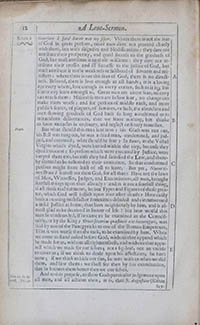 12
A Lent-Sermon.
Serm.1.
12
A Lent-Sermon.
Serm.1.
therefore I said Sarah was my sister. Where there is not the fear
of God in great persons, other men dare not proceed clearly
with them, but with disguises and Modifications: they dare not
attribute their prosperity, and good success to the goodness of
God, but must attribute it to their wisdome: they dare not at-
tribute their crosses and ill successe to the justice of God, but
must attribute it to the weakness or falshood of servants and mi-
nisters: where there is not this fear of God, there is no direct-
ness. Beloved, there is love enough at all hands; it is a loving
age every where, love enough in every corner, such as it is; but
scarce any feare amongst us. Great men are above fear, no envy
can reach them: Miserable men are below fear, no change can
make them worse: and for persons of middle rank, and more
publick feares, of plagues, of famines, or such, the abundant and
over-flowing goodness of God hath so long accustomed us to
miraculous deliverances, that we feare nothing, but thinke
to have miracles in ordinary, and neglect ordinary remedies. Deum.But what should this man fear now? his Glass was run out,
his Bell was rung out, he was a dead man, condemned, and jud-
ged, and executed; what should he fear? In Rome, as the Vestal
Virgins which dyed, were buried within the city, because they
dyed innocent: so persons which were executed by Justice, were
buryed there too, because they had satisfied the Law, and there-
by seemed to be restored to their innocence. So that condemned
persons might seem least of all to feare. But yet, Nonne ti-
mes Deum? fearest not thou God, for all that? Have not the laws
of Men, Witnesses, Judges, and Executioners, all men, brought
fearfull things upon thee already? and is it not a fearfull thing,
if all those real torments, be but Types and Figures of those grea-
ter, which God will inflict upon thee after death? How easily
hath a cunning malefactor sometimes deluded and circumvented
a mild Justice at home, that lives neighbourly by him, and is al-
most glad to be deceived in favour of life! but how would this
man be confounded, if he came to be examined at the Council-
table, or by the King? Omni severius quæstione a te interrogari, was
said by one of the Panegyricks to one of the Roman Emperours,
That it was worse then the rack, to be examined by him. When
we come to stand naked before God, without that apparel which
he made for us, without all righteousness, and without that appa-
rell which we made for our selves; not a fig-leaf, not an excuse
to cover us; if we think to deale upon his affections, he hath
none; if we think to hide our sins, he was with us when we did
them, and saw them: we shall see then by his examination,
that he knowes them better then we our selves. Tom. 10. in Ap-
pend. Ser. 49.And to this purpose, to shew Gods particular judgement upon
all men, and all actions then, it is, that S. Augustine (if that
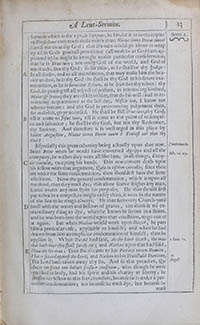 A Lent-Sermon.
13
Serm.1.
A Lent-Sermon.
13
Serm.1.
Sermon which is the 130, de Tempore, be his, for it is in the copies
of Chrysostome too) reads those words thus: Nonne times Deum tuum?
fearest not thou thy God? that if a man would go about to wrap
up all in Gods generall providence (all must be as God hath ap-
pointed it) he might be brought to this particular consideration,
that he is Deus tuus; not onely God of the world, and God of
mankinde, but thy God: so far thine, as he shall be thy Judge:
In all senses, and to all intendments, that may make him the hea-
vier to thee, he is thy God: he shall be thy God in his severe exa-
minations, as he is Scrutator Renum, as he searches thy reines: thy
God, in putting off all respect of persons, in renouncing kindred,
Mater & frater; they are of kin to him, that do his will: and in re-
nouncing acquaintance at the last day, Nescio vos, I know not
whence you are: and thy God in pronouncing judgement then,
Ite maledicti, go ye accursed. He shall be still Deus tuus, thy God,
till it come to Jesus tuus, till it come to the point of redempti-
on and salvation; he shall be thy God, but not thy Redeemer,
thy Saviour. And therefore it is well urged in this place by
Saint Augustine, Nonne times Deum tuum? Fearest not thou thy
God? Especially this great calamity being actually upon thee now.
Condemnatio. Saint Peter when he would have converted Agrippa and all the
company, he wishes they were all like him, in all things,Act. 26.29. Excep-
tis vinculis, excepting his bands. This new convert deals upon
his fellow with that argument, Quia in iisdem vinculis; since thou
art under the same condemnation, thou shouldest have the same
affections. Now the general condemnation, which is upon all
mankind, that they must dye, this alone scarce frights any man,
scarce averts any man from his purposes. He that should first
put to Sea in a tempest, he might easily think, it were in the nature
of the Sea to be rough always. He that sees every Church-yard
swell with the waves and billows of graves, can think it no ex-
traordinary thing to dye, when he knows he set out in a storm,
and he was born into the world upon that condition, to go out of
it again. But when Nathan would work upon David, he puts
him a particular case, appliable to himself; and when he had
drawn from him an implicite condemnation of himself, then he
applies it. When David had said, As the Lord liveth, the man
that hath done this shall surely dye2 Sam. 12.; and Nathan upon that had said,
Thou art the man: Then David came to his Peccavi coram Domino,
I have sinned against the Lord; and Nathan to his Transtulit Dominus,
August. The Lord hath taken away thy sin. And so this preacher, Qui
clavis confixus non habuit sensum confixum, who though he were
crucified in body, had his spirit and his charity at liberty, he
presses his fellow to this fear, therefore, because he is under a par-
ticular condemnation; not because he must dye, but because he
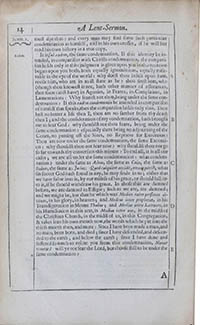 14
A Lent-Sermon.
Serm.1.
14
A Lent-Sermon.
Serm.1.
must dye thus: and every man may find some such particular
condemnation in himself, and in his own crosses, if he will but
read his own history in a true copy. Eadem.It is sub eadem, the same condemnation. If this identity be in-
tended, in comparison with Christs condemnation, the compari-
son holds only in this: judgment is given upon you both, execution
begun upon you both, both equally ignominious, equally mise-
rable in the eye of the world: why doest thou insult upon him,
revile him, who art in as ill state as he? thou seest him, who
(though thou knowest it not, hath other manner of assurances,
then thou canst have) in Agonies, in Feares, in Complaints,
in Lamentations: Why fearest not thou, being under the same con-
demnation? If this eadem condemnatio be intended in comparison
of himself that speaks, then the comparison holds only thus, Thou
hast no better a life then I, thou art no farther from thy death
then I; and the consideration of my condemnation, hath brought
me to fear God: why shouldst not thou feare, being under the
same condemnation? especially there being no adjourning of the
Court, no putting off the Sizes, no Reprieve for Execution:
Thou art now under the same condemnation, the same Executi-
on: why shouldst thou not fear now? why shouldst thou not go
so far towards thy conversion this minute? To end all, it is all our
cases; we are all under the same condemnation: what condem-
nation? under the same as Adam, the same as Cain, the same as
Sodom, the same as Judas: Quod cuiquam accidit, omnis potest; what
sin soever God hath found in any, he may finde in us; either that
we have falne into it, by our misuse of his grace, or should fall in-
to it, if he should withdraw his grace. In those that are damned
before, we are damned in Effigie; such as we are, are damned;
and we might be, but that he which was Medius inter personas di-
vinas, in his glory, in heaven; and Medius inter prophetas, in his
Transfiguration in Mount Thabor; and Medius inter Latrones, in
his Humiliation in this text, is Medius inter nos, in the midst of
the Christian Church, in the midst of us, in this Congregation,
& takes into his own mouth now, the words which he put into the
thiefs mouth then, and more: Since I have been made a man, and
no man; been born, and died; since I have descended, and descen-
ded to the earth, and below the earth; since I have done and
suffered so much to rescue you from this condemnation, Nonne
timetis? will ye not fear the Lord, but choose still to be under the
same condemnation? A
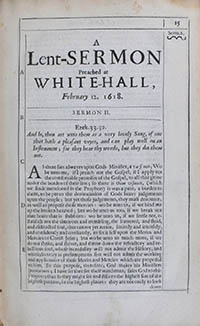 15
Serm.2.
A
15
Serm.2.
A Lent-SERMON
Preached at
WHITE-HALL,
February 12. 1618.
SERMON II. Ezek. 33.32.
And lo, thou art unto them as a very lovely Song, of one
that hath a pleasant voyce, and can play well on an
Instrument; for they hear thy words, but they doe them
not. ASAs there lies alwayes upon Gods Minister, a væ si non, Wo
be unto me, if I preach not the Gospel, if I apply not
the comfortable promises of the Gospel, to all that grone
under the burden of their sins; so there is Onus visionis, (which
we finde mentioned in the Prophets) it was a pain, a burden to
them, to be put to the denunciation of Gods heavy judgements
upon the people: but yet those judgements, they must denounce,
as well as propose those mercies: wo be unto us, if we bind not
up the broken hearted; but wo be unto us too, if we break not
that heart that is stubborn: wo be unto us, if we settle not, e-
stablish not the timorous and trembling, the scattered, and fluid,
and distracted soul, that cannot yet attain, intirely and intensely,
and confidently and constantly, to fix it self upon the Merits and
Mercies of Christ Jesus; but wo be unto us much more, if we
do not shake, and shiver, and throw down the refractory and re-
bellious soul, whose incredulity will not admit the History, and
whose security in presumptuous sins will not admit the working
and application of those Merits and Mercies which are proposed
to him. To this purpose, therefore, God makes his Ministers
speculatores; I have set thee for their watchman, saies God to this
Prophet; that so they might see and discern the highest sins of the
highest persons, in the highest places: they are not onely to look down
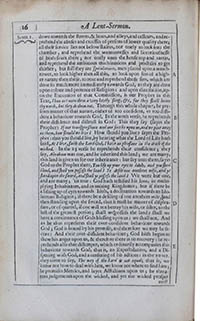 16
A Lent-Sermon.
Serm.2.
16
A Lent-Sermon.
Serm.2.
down towards the streets, & lanes, and alleys, and cellearscellars, and re-
prehend the abuses and excesses of persons of lower quality there;
all their service lies not below staires, nor onely to look into the
chamber, and reprehend the wantonnesses and licentiousnesse
of both sexes there; nor onely unto the house top and tarras,
and reprehend the ambitious machinations and practises to get
thither; but still they are speculatores, men placed upon a watch-
tower, to look higher then all this, to look upon sins of a high-
er nature then these, to note and reprehend those sins, which are
done so much more immediately towards God, as they are done
upon colour and pretence of Religion: and upon that station, up-
on the Execution of that Commission, is our Prophet in this
Text, Thou art unto them a very lovely song, &c. for they shall heare
thy words, but they do them not. Through this whole chapter, he pre-
sents matter of that nature, either of too confident, or too diffi-
dent a behaviour towards God. In the tenth verse, he reprehends
their diffidence and distrust in God: This they say (sayes the
Prophet) If our transgressions and our sins be upon us, and we pine away
in them, how should we live? How should you live? sayes the Pro-
phet: thus you should live, by hearing what the Lord of Life hath
said, As I live, saith the Lord God, I have no pleasure in the death of the
wicked. In the 25 verse he reprehends their confidence; they
say, Abraham was one, and he inherited this land; we are many,
this land is given us for our inheritance: but say unto them, sayes
God to the Prophet there, You lift up your eyes to Idols, and you shed
blood, and shall you possess the land? Ye defile one anothers wife, and ye
stand upon the sword, and shall ye possess the land? We were but one,
and are many; 'tis true: God hath testified his love, in multi-
plying Inhabitants, and in uniting Kingdomes; but if there be
a lifting up of eyes towards Idols, a declination towards an Ido-
latrous Religion; if there be a defiling of one anothers wife, and
then standing upon the sword, that it must be matter of displea-
sure, or of quarrel, if one will not betray his wife, or sister, to the
lust of the greatest person; shall we possess the land? shall we
have a continuance of Gods blessing upon us? we shall not. And
as he thus represents their over-confident behaviour towards
God; God is bound by his promise, and therefore we may be se-
cure: And their over-diffident behaviour; God hath begun to
shew his anger upon us, & therefore there is no recovery: he re-
prehends also that distemper, which ordinarily accompanies this
behaviour towards God, that is, an Expostulation, and a Di-
sputing with God, and a censuring of his actions: in the 20 ver.
they come to say, The way of the Lord is not equal; that is, we
know not how to deal with him, we know not where to find him;
he promises Mercies, and layes Afflictions upon us; he threa-
tens judgements upon the wicked, and yet the wicked prosper most
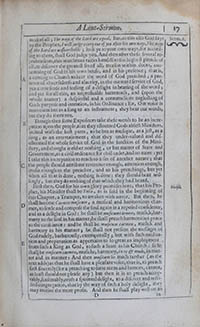 A Lent-Sermon.
17
Serm.2.
A Lent-Sermon.
17
Serm.2.
most of all; The ways of the Lord are equal. But, to this also God says
by the Prophet, I will judge every one of you after his own ways. The ways
of the Lord are unsearchable; look ye to your own ways, for accord-
ing to them, shall God judge you. And then after these several re-
prehensions, this watchman raises himself to the highest pinacle of
all, to discover the greatest sin of all, treason within doors, con-
temning of God in his own house, and in his presence; that is,
a coming to Church to hear the word of God preached, a pre-
tence of cheerfulness and alacrity, in the outward service of God,
yea a true sense and feeling of a delight in hearing of the word;
and yet for all this, an unprofitable barrenness, and (upon the
whole matter) a despiteful and a contumelious neglecting of
Gods purpose and intention, in his Ordinance: for, Our voice is
unto them but as a song to an instrument; they hear our words,
but they do them not. Though then some Expositors take these words to be an incre-
pation upon the people, that they esteemed Gods ablest Ministers,
indued with the best parts, to be but as musique, as a jest, as a
song, as an entertainment; that they under-valued and dis-
esteemed the whole service of God in the function of the Mini-
stery, and thought it either nothing, or but matter of State and
Government, as a civil ordinance for civil order, and no more: yet
I take this increpation to reach to a sin of another nature; that
the people should attribute reverence enough, attention enough,
credit enough to the preacher, and to his preachings, but yet
when all that is done, nothing is done: they should hear wil-
lingly, but they do nothing of that which they had heard. First then, God for his own glory promises here,Divisio. that his Pro-
phet, his Minister shall be Tuba, as is said in the beginning of
this Chapter, a Trumpet, to awaken with terror. But then, he
shall become Carmen musicum, a musical and harmonious char-
mer, to settle and compose the soul again in a reposed confidence,
and in a delight in God: he shall be musicum carmen, musick, har-
mony to the soul in his matter; he shall preach harmonious peace
to the conscience: and he shall be musicum carmen, musick and
harmony in his manner; he shall not present the messages of
God rudely, barbarously, extemporally; but with such medita-
tion and preparation as appertains to so great an imployment,
from such a King as God, to such a State as his Church: so he
shall be musicum carmen, musicke, harmony, in re & modo, in mat-
ter and in manner: And then musicum so much farther (as the
text adds) as that he shall have a pleasant voice, that is, to preach
first sincerely (for a preaching to serve turns and humors, cannot,
at least should not please any) but then it is to preach accep-
tably, seasonably, with a spiritual delight, to a discreet and recti-
fied congregation, that by the way of such a holy delight, they
may receive the more profit. And then he shall play well on an D in
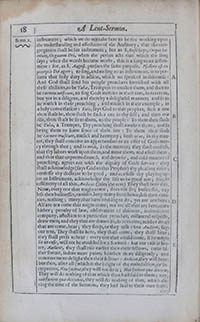 18
A Lent-Sermon.
Serm.2.
18
A Lent-Sermon.
Serm.2.
instrument; which we do not take here to be the working upon
the understanding and affections of the Auditory, that the con-
gregation shall be his instrument; but as S. Basil says, Corpus ho-
minis, Organum Dei, when the person acts that which the song
says; when the words become works, this is a song to an instru-
ment: for, as S. August. pursues the same purpose, Psallere est ex
preceptis Dei agere; to sing, and to sing to an instrument, is to per-
form that holy duty in action, which we speak of in discourse:
And God shall send his people preachers furnished with all
these abilities, to be Tubæ, Trumpets to awaken them; and then to
be carmen musicum, to sing Gods mercies in their ears, in reverent,
but yet in a diligent, and thereby a delightful manner; and so to
be musick in their preaching, and musick in their example, in
a holy conversation: Eris, says God to this prophet, such a one
thou shalt be, thou shalt be such a one in thy self; and then eris
illis, thou shalt be so to them, to the people: To them thou shalt
be Tuba, a Trumpet, Thy preaching shall awaken them, and so
bring them to some sence of their sins: To them thou shalt
be carmen musicum, musick and harmony; both in re, in thy mat-
ter, they shall conceive an apprehension or an offer of Gods mer-
cy through thee; and in modo, in the manner; they shall confess,
that thy labors work upon them, and move them, and affect them,
and that that unpremeditated, and drowsie, and cold manner of
preaching, agrees not with the dignity of Gods service: they
shall acknowledge (says God to this Prophet) thy pleasant voice;
confesse thy doctrine to be good, and confesse thy playing up-
on an Instrument, acknowledge thy life to be good too; for, in
testimony of all this, Audient (saies the text) They shall hear this.
Now, every one that might come, does not so; businesses, nay
less then businesses, vanities, keep many from hence; less then vani-
ties, nothing; many, that have nothing to do, yet are not here:
All are not come that might come; nor are all that are here, come
hither; penalty of law, observation of absences, invitation of
company, affection to a particular preacher, collateral respects,
draw men; and they that are drawn so, do not come; neither do all
that are come, hear; they sleep, or they talk: but Audient, says
our text, They shall be here, they shall come, they shall hear;
they shall press to hear: every one that would come, if he might
sit at ease, will not be troubled for a Sermon: but our case is bet-
ter, Audient, they shall rise earlier then their fellows, come hi-
ther sooner, indure more pains, hearken more diligently, and
conceive more delight then their fellows: Audient, they will hear:
but then, after all (which is the height of the malediction, or in-
crepation), Non facient, they will not do it; Non facient quæ dixeris,
They will do nothing of that which thou hast said to them; nay,
non facient quæ dixerunt, they will do nothing of that, which du-
ring the time of the Sermons, they had said to their own souls, they
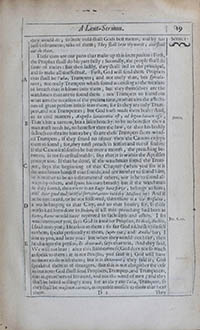 A Lent-Sermon.
19
Serm.2.
A Lent-Sermon.
19
Serm.2.
they would do; so little hold shall Gods best means, and by his
best instruments, take of them; They shall hear thy words, and shall
not do them. These then are our parts that make up this increpation: First,
the Prophet shall do his part fully: Secondly, the people shall do
some of theirs: But then lastly, they shall fail in the principal,
and so make all uneffectual. First, God will send them Prophets
that shall be Tubæ, Trumpets; and not onely that, but specula-
tores; not onely Trumpets which sound according to the measure
of breath that is blown into them, but they themselves are the
watchmen that are to sound them: not Trumpets to sound out
what airs the occasion of the present time, or what airs the affecti-
ons of great persons infuse into them; for so they are only Trum-
pets, and not Trumpetors; but God hath made them both: And,
as in civil matters, Angusta innocentia est, ad legem bonum esse,Seneca.
That's but a narrow, but a faint honesty, to be no honester then a
man must needs be, no honester then the law, or then his bodily
sickness constrains him to be; so are these Trumpets short-wind-
ed Trumpets, if they sound no oftner then the Canons enjoyn
them to sound; for, they must preach in season and out of season:
If the Canonical season be but once a month, the preaching be-
tween, is not so unseasonable, but that it is within the Apostles
precept too. If that be done, if the watchman sound the Trum-
pet, says the beginning of this Chapter (when you see it is
the watchman himself that sounds, and not another to sound him;
he is neither to be an instrument of others, nor is he to sound al-
ways by others, and spare his own breath) but if the watchman
do duly sound, then there is an Euge bone serve, belongs to him;
Well done good and faithful servant, enter into thy Masters joy: And if
he be not heard, or be not followed, then there is a væ Betsaida,
a wo belonging to that City, and to that house; for, if those
works had been done in Sodom, if all this preaching had been at
Rome, Rome would have repented in sackcloth and ashes.Jer. 6.17. I set
watchmen over you, says God in another Prophet, Et dixi, Audite,
I said unto you, Hearken to them: so far God addresses himself
to them, speaks personally to them, super vos, and Audite vos; I
sent to you, and hear you: but when they would not hear, then
he changes the person, Et dixerunt, says that text, And they said,
We will not hear: after this stubbornness, God does not so much
as speak to them: it is not Dixistis, you said it; God will have
no more to do with them; but it is Dixerunt, they said it; God
speaks of them as of strangers. But this is not altogether the case
in our text: God shall send Prophets, Trumpets, and Trumpetors,
that is, preachers of his word, and not the word of men; and they
shall be heard willingly too; for as they are Tubæ, Trumpets, so
they shall be musicum carmen, acceptable musick to them that hear
them. D2 They
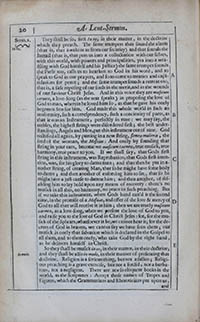 20
A Lent-Sermon.
Serm.2.
They shall be so, first In re, in their matter, in the doctrine
20
A Lent-Sermon.
Serm.2.
They shall be so, first In re, in their matter, in the doctrine
which they preach.In Re. The same trumpets that sound the alarm
(that is, that awakens us from our security) and that sounds the
Battail (that is, that puts us into a colluctation with our selves,
with this world, with powers and principalities, yea into a wra-
stling with God himself and his Justice) the same trumpet sounds
the Parle too, calls us to hearken to God in his word, and to
speak to God in our prayers, and so to come to treaties and capi-
tulations for peace; and the same trumpet sounds a retreat too,
that is, a safe reposing of our souls in the merit, and in the wounds
of our Saviour Christ Jesus. And in this voice they are musicum
carmen, a love-song (as the text speaks) in proposing the love of
God to man, wherein he loved him so, as that he gave his onely
begotten Son for him. God made this whole world in such an
uniformity, such a correspondency, such a concinnity of parts, as
that it was an Instrument, perfectly in tune: we may say, the
trebles, the highest strings were disordered first; the best under-
standings, Angels and Men, put this instrument out of tune. God
rectified all again, by putting in a new string, semen mulieris, the
seed of the woman, the Messias: And onely by sounding that
string in your ears, become we musicum carmen, true musick, true
harmony, true peace to you. If we shall say, that Gods first
string in this instrument, was Reprobation, that Gods first inten-
tion, was, for his glory to damn man; and that then he put in a-
nother string, of creating Man, that so he might have some body
to damn; and then another of enforcing him to sin, that so he
might have a just cause to damne him; and then another, of dis-
abling him to lay hold upon any means of recovery: there's no
musick in all this, no harmony, no peace in such preaching. But
if we take this instrument, when Gods hand tun'd it the second
time, in the promise of a Messias, and offer of the love & mercy of
God to all that will receive it in him; then we are truely musicum
carmen, as a love-song, when we present the love of God to you,
and raise you to the love of God in Christ Jesus: for, for the mu-
sick of the Sphears, whatsoever it be, we cannot hear it; for the de-
crees of God in heaven, we cannot say we have seen them; our
musick is onely that salvation which is declared in the Gospel to
all them, and to them onely, who take God by the right hand,
as he delivers himself in Christ. So they shall be musick in re, in their matter, in their doctrine;
and they shall be also in modo,In modo. in their manner of presenting that
doctrine. Religion is a serious thing, but not a sullen; Religi-
ous preaching is a grave exercise, but not a sordid, not a barba-
rous, not a negligent. There are not so eloquent books in the
world, as the Scriptures: Accept those names of Tropes and
Figures, which the Grammarians and Rhetoricians put upon us, and
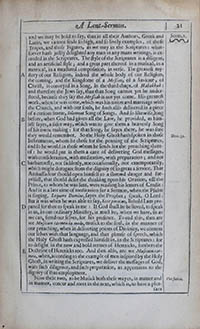 A Lent-Sermon.
21
Serm.2.
A Lent-Sermon.
21
Serm.2.
and we may be bold to say, that in all their Authors, Greek and
Latin, we cannot finde so high, and so lively examples, of those
Tropes, and those Figures, as we may in the Scriptures: what-
soever hath justly delighted any man in any mans writings, is ex-
ceeded in the Scriptures. The style of the Scriptures is a diligent,
and an artificial style; and a great part thereof in a musical, in a
metrical, in a measured composition, in verse. The greatest my-
stery of our Religion, indeed the whole body of our Religion,
the coming, and the Kingdome of a Messias, of a Saviour, of
Christ, is conveyed in a Song, in the third chapt. of Habakkuk:
and therefore the Jews say, that that Song cannot yet be under-
stood, because they say the Messiah is not yet come. His greatest
work, when he was come, which was his union and marriage with
the Church, and with our souls, he hath also delivered in a piece
of a curious frame, Solomons Song of Songs. And so likewise, long
before, when God had given all the Law, he provided, as him-
self sayes, a safer way, which was to give them a heavenly Song
of his owne making: for that Song, he sayes there, he was sure
they would remember.Deut. 31. So the Holy Ghost hath spoken in those
Instruments, whom he chose for the penning of the Scriptures,
and so he would in those whom he sends for the preaching there-
of: he would put in them a care of delivering GodGod's messages,
with consideration, with meditation, with preparation; and not
barbarously, not suddenly, not occasionally, not extemporarily,
which might derogate from the dignity of so great a service. That
Ambassadour should open himself to a shrewd danger and sur-
prisall, that should defer the thinking upon his Oration, till the
Prince, to whom he was sent, were reading his letters of Credit:
And it is a late time of meditation for a Sermon, when the Psalm
is singing. Loquere Domine, sayes the Prophet; speak, O Lord:
But it was when he was able to say, Ecce paratus, Behold I am pre-
pared for thee to speak in me: If God shall be believed, to speak
in us, in our ordinary Ministry, it must be, when we have, so as
we can, fitted our selves, for his presence. To end this, then are
we Musicum carmen in modo, musick to the soul, in the manner of
our preaching, when in delivering points of Divinity, we content
our selves with that language, and that phrase of speech, which
the Holy Ghost hath expressed himself in, in the Scriptures: for
to delight in the new and bold termes of Hereticks, furthers the
Doctrine of Hereticks too. And then also, are we Musicum car-
men, when, according to the example of men inspired by the Holy
Ghost, in writing the Scriptures, we deliver the messages of God,
with such diligence, and such preparation, as appertains to the
dignity of that employment. Now these two, to be Musick both these wayes,Vox suavis. in matter and
in manner, concur and meet in the next, which is, to have a plea-
sant
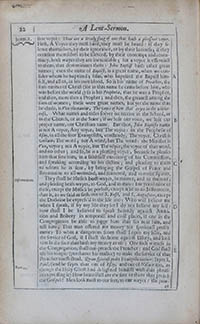 22
A Lent-Sermon.
Serm.2.
sant voyce: Thou art a lovely song of one that hath a pleasant voyce.
22
A Lent-Sermon.
Serm.2.
sant voyce: Thou art a lovely song of one that hath a pleasant voyce.
First, A Voyce they must have, they must be heard: if they si-
lence themselves, by their ignorance, or by their laziness; if they
occasion themselves to be silenced, by their contempt and contu-
macy, both wayes they are inexcusable; for a voyce is essentiall
to them, that denominates them: John Baptist hath other great
names; even the name of Baptist, is a great name, when we con-
sider whom he baptized; him, who baptized the Baptist him-
self, and all us, in his own blood. So is his name of Preacher, the
fore-runner of Christ (for in that name he came before him, who
was before the world;) so is his Propheta, that he was a Prophet,
and then, more then a Prophet; and then, the greatest among the
sons of women; these were great names, but yet the name that
he chose, is Vox clamantis, The voyce of him that cryes in the wilder-
ness. What names and titles soever we receive in the School, or
in the Church, or in the State; if we lose our voice, we lose our
proper name, our Christian name. But then, John Baptists name
is not A voyce, Any voyce, but The voyce: in the Prophesie of
Esay, in all the four Evangelists, constantly, The voyce. Christ is
verbum, The word; not A word, but The word: the Minister is
Vox, voyce; not A voyce, but The voyce, the voyce of that word,
and no other; and so, he is a pleasing voyce, because he pleases
him that sent him, in a faithfull executing of his Commission,
and speaking according to his dictate; and pleasing to them
to whom he is sent, by bringing the Gospel of Peace and
Reparation to all wounded, and scattered, and contrite Spirits. Instrumentum.They shall be Musick both wayes, in matter, and in manner;
and pleasing both wayes, to God, and to men: but yet to none of
these, except the Musick be perfect, except it be to an Instrument,
that is, as we said at first, out of S. Basil, and S. Augustine, except
the Doctrine be express'd in the life too: Who will believe me
when I speak, if by my life they see I do not believe my self?
how shall I be believed to speak heartily against Ambi-
tion and Bribery in temporall and civil places, if one in the
Congregation be able to jogge him that sits next him, and
tell him, That man offered me money for spirituall prefer-
ment? To what a dangerous scorn shall I open my selfe, and
the service of God, if I shall declaime against Usury, and look
him in the face that hath my money at use? One such witness in
the Congregation, shall out-preach the Preacher: and God shall
use his tongue (perchance his malice) to make the service of that
Preacher uneffectual. Quam speciosi pedes Evangelicantium! sayes S.
Paul,Rom. 10. (and he sayes that out of Esay, and out of Nahum too, as
though the Holy Ghost had delighted himself with that phrase
in expressing it) How beautifull are the feet of them that preach
the Gospel! Men look most to our feet, to our wayes: the pow-
er
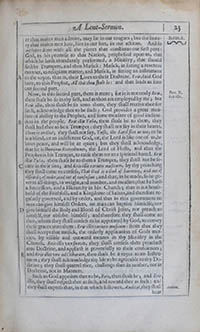 A Lent-Sermon.
23
Serm.2.
er that makes men admire, may lie in our tongues; but the beau-
A Lent-Sermon.
23
Serm.2.
er that makes men admire, may lie in our tongues; but the beau-ty that makes men love, lies in our feet, in our actions. And so
we have done with all the pieces that constitute our first part:
God, in his promise to that Nation, prophesied upon us, that
which he hath abundantly performed, a Ministry, that should
first be Trumpets, and then Musick: Musick, in fitting a reverent
manner, to religious matter; and Musick, in fitting an instrument
to the voyce, that is, their Lives to their Doctrine. Eris, said God
here, to this Prophet, All this thou shalt be: and that leads us into
our second part. Now, in this second part, there is more; for it is not onely Eris,Part. II.
Eris illis. thou shalt be so in thy self, and as thou art employed by me; but
Eris illis, thou shalt be so unto them, they shall receive thee for
such, acknowledge thee to be such: God provides a great mea-
sure of ability in the Prophet, and some measure of good inclina-
tion in the people. Eris illis Tuba, thou shalt be to them, they
shall feel thee to be a Trumpet: they shall not say in their hearts,
There is no God; they shall not say, Tush, the Lord sees us not, or he
is a blind, or an indifferent God, or, the Lord is like one of us, he
loves peace, and will be at quiet; but they shall acknowledge,
that he is Dominus Exercituum, the Lord of Hosts, and that the
Prophet is his Trumpet, to raise them up to a spiritual battel. Eris
illis Tuba, thou shalt be to them a Trumpet, they shall not be se-
cure in their sins; and Eris illis carmen musicum, by thy preaching
they shall come to confess, That God is a God of harmony, and not of
discord; of order, and not of confusion; and that, as he made, so he go-
verns all things, in weight, and number, and measure; that he hath
a Succession, and a Hierarchy in his Church; that it is a house-
hold of the Faithfull, and a Kingdome of Saints, and therefore re-
gularly governed, and by order, and that in this government no
man can give himself Orders, no man can baptize himselfe, nor
give himself the Body and Blood of Christ Jesus, nor preach to
himself, nor absolve himself; and therefore they shall come to
thee, whom they shall confess to be appointed by God, to convey
these graces unto them: Eris illis carmen musicum: from thee they
shall accept that musick, the orderly application of Gods mer-
cies, by visible and outward meanes in thy Ministry in the
Church. Eris illis vox suavis, they shall confess thou preachest
true Doctrine, and appliest it powerfully to their consciences;
and Eris illis vox ad Citharam, thou shalt be a voyce to an Instru-
ment; they shall acknowledge thy life to be agreeable to thy Do-
ctrine; they shall quarrel thee, challenge thee in neither, not in
Doctrine, not in Manners. Such as God appoints thee to be, Eris, thou shalt be; and Eris
illis, they shall respect thee as such, and reward thee as such: and
they shall express that, in that which followes, Audient,Audient. they shall hear
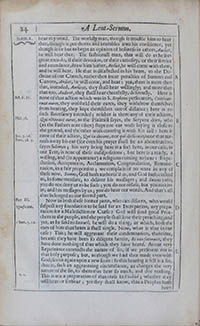 24
A Lent-Sermon.
Serm.2.
24
A Lent-Sermon.
Serm.2.
hear thy word. The worldly man, though it trouble him to hear
thee, though it put thorns and brambles into his conscience, yet
though it be but to beget an opinion of holiness in others, Audiet,
he will hear thee. The fashionall man, that will do as he sees
great men do, if their devotion, or their curiosity, or their service
and attendance, draw him hither, Audiet, he will come with them,
and he will hear. He that is disaffected in his heart, to the Do-
ctrine of our Church, rather then incur penalties of Statutes and
Canons, Audiet, he will come, and hear: yea, there is more then
that, intended, Audient, they shall hear willingly; and more then
that too, Audient, they shall hear cheerfully, desirously. Here is
none of that action which was in S. Stephens persecutors,Act. 7.57. Continue-
runt aures, they withheld their eares, they withdrew themselves
from hearing, they kept themselves out of distance; here is no
such Recusancy intended;Psal. 58. neither is there any of their actions,
Qui obturant aures, as the Psalmist sayes, the Serpent does, who
(as the Fathers note often) stops one ear with laying it close to
the ground, and the other with covering it with his tail: here is
none of their action,Jer. 7.26. Qui in durant, nor qui declinant; none that tur-
neth away his ear (for even his prayer shall be an abomination,Prov. 28.9.
sayes Solomon; his very being here is a sin) here, in our case, in
our Text, is none of these indispositions; but here is a ready, a
willing, and (in appearance) a religious coming to hear: Expe-
ctation, Acceptation, Acclamation, Congratulation, Remune-
ration, in a fair proportion; we complain of no want in any of
these now. Sumus, God hath authoriz'd us, and God hath exalted
us, in some measure, to deliver his messages; and Sumus vobis,
you do not deny us to be such; you do not refuse, but you receive
us, and his messages by us; you do hear our words. And that's all
that belonged to our second part. Part III.Now in both these former parts, who can discern, who would
suspect any foundation to be laid for an Increpation,Non facient. any prepa-
ration for a Malediction or Curse? God will send good Prea-
chers to the people, and the people shall love their preaching; and
yet,1 Sam. 3.11. as he said to Samuel, he will do a thing, at which, both the
ears of him that hears it shall tingle. Now, what is that in our
case? This; he will aggravate their condemnation, therefore,
because they have been so diligent herein, Et non fecerunt, they
have done nothing of that which they have heard. As our very
Repentance contracts the nature of sin, if we persevere not in
that holy purpose; but, as though we had then made even with
God, sin on again upon a new score: so this hearing it self is a sin,
that is, such an aggravating circumstance, as changes the very
nature of the sin, to them that hear so much, and doe nothing.
This is not a preparation of that curse in Ezekiel;2.5. whether they
will hear or forbear, yet they shall know, that a Prophet hath been
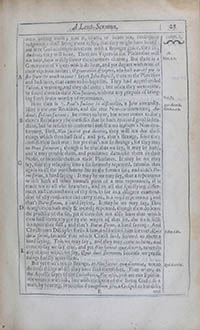 A Lent-Sermon.
25
Serm.2.
A Lent-Sermon.
25
Serm.2.
been among them; that is, heare, or heare not, subsequent
judgements shall bring them to see, that they might have heard:
but here God accompanies them with a stronger grace, then so;
Audient, they will hear.58. There are Vipers in the Psalm that will
not hear, how wisely soever the charmers charm;Mat. 3.7. But there is
a Generation of Vipers which do hear, and yet depart with none of
their viperous nature: O generation of vipers, who hath warned you to
flee from the wrath to come! sayes John Baptist, there to the Pharisees
and Sadduces, that came to his baptism. They had apprehended
Tubam, a warning, and they did come; but when they were come,
he found them in their Non faciunt, without any purpose of bring-
ing forth fruits worthy of repentance.Ver. 8. Here then is S. Paul's Judæus in abscondito, a Jew inwardly.Quæ dixeris.
Rom. 2.29.Here is the true Recusant, and the true Non-conformitan; Au-
diunt, sed non faciunt: he comes to hear, but never comes to doe;
there's Recusancy: he confesses that he hath received good instru-
ction, but he refufesrefuses to conform himself unto it; there's Non-con-
formity. First, Non facient quæ dixeris, they will not doe those
things which thou hast said; and yet, that's strange, since they
confess thou saist true: but yet that's not so strange; for they may
be Duri sermones; though it be true that we say, it may be hard,
and it may trouble them, and perchance damnifie them in their
Profit, or mortifie them in their Pleasures. It may be we may
say, that thy relapsing into a sin formerly repented, submits thee
again to all the punishment due to the former sin; and that's Du-
rus sermo, a hard saying: It may be we may say, that a repentance
which hath all other formall parts of a true repentance, if it
reach not to all the branches, and to all the specifying differ-
ences and circumstance of thy sins, so far as a diligent examina-
tion of thy conscience can carry thee, is a voyd repentance; and
that's Durus sermo, a hard saying. It may be we may say, That
though thou hast truly & intirely repented, though thou do leave
the practice of the sin, yet if thou doe not also leave that which
thou hast corruptly got by the wayes of that sin, the sin it selfe
lies upon thee still; and that's Durus sermo, a hard saying: And
Christs own Disciples forsook him, and forsook him for ever,John 6.60. Quia
durus sermo, because that which Christ said, seemed to them a
hard saying. This we may say; and they may come to hear, and
come to say we say true, and yet Non facient quæ dixeris, never do
any of that which we say, Quia duri sermones, because we presse
things hardly upon them. But yet that's not so strange, as Non facere quæ dixerint,Qud dixerint. not to
do those things which they have said themselves. That when, as
the Apostle sayes of the Corinthians, Vos estis, you are our Epistle,
not written with ink, but with the spirit of the living God: so a
man, by hearing, is become Evangelium sibi, a Gospel to himself; E and
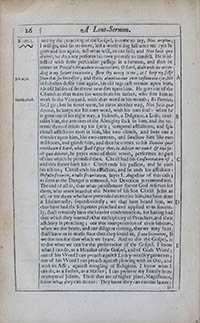 26
A Lent-Sermon.
Serm.3.Serm.2.
26
A Lent-Sermon.
Serm.3.Serm.2.
and by the preaching of the Gospel, is come to say, Non amplius,
I will go, and sin no more, lest a worse thing fall unto me: yet he
goes and sins again, fall what will, or can fall; and Non facit quæ
dixerit, he does not perform his own promise to himself. He is af-
fected with some particular passage in a Sermon, and then he
comes to David's Secundum innocentiam; O Lord, deale with me accor-
ding to my future innocence; shew thy mercy to me, as I keep my selfe
from that sin hereafter;Job 9.31. and then, abominantur eum vestimenta ejus, his
old clothes defile him again, his old rags cast vermin upon him,
his old habits of sin threw new dirt upon him. He goes out of the
Church as that mans son went from his father, who sent him to
work in the Vineyard,Matth. 21.28. with that word in his mouth, Eo Domine,
Sir, I go; but he never went, he turns another way, Non facit quæ
dixerat, he keeps not his own word, with his own soul: when he
is gone out of his right way, a Sickness, a Disgrace, a Loss, over-
takes him, the arrowes of the Almighty stick in him, and the ve-
nome thereof drinks up his spirit; temporal afflictions, and spi-
rituall afflictions meet in him, like two clouds, and beat out a
thunder upon him, like two currents, and swallow him like two
milstones, and grinde him, and then he comes to his Domine quid
retribuam? Lord, what shall I give thee, to deliver me now? & non fa-
cit quæ dixerat, he payes none of those vowes, performes no part
of that which he promised then. Christ had his Consummatum est,
and this sinner hath his: Christ ends his passion, and he ends
his action; Christ ends his affliction, and he ends his affection:
Distulit securim, attulit securitatem, sayes S. Augustine of this case;
as soon as the Danger is removed, his Devotion is removed too.
The end of all is, that what punishment soever God reserves for
them, who never heard of the Name of his Son Christ Jesus at
all, or for them who have pretended to receive him, but have done
it Idolatrously, superstitiously; we that have heard him, we
that have had the Scriptures preached and applied to us sincere-
ly, shall certainly have the heavier condemnation, for having had
that which they wanted: Our multiplicity of Preachers, and their
assiduity in preaching; our true interpretation of their labours,
when we doe heare, and our diligent coming, that we may hear,
shall leave us in worse state then they found us, si non fecerimus, If
we doe not doe that which we heare. And to doe the Gospel, is
to doe what we can for the preservation of the Gospel. I know
what I can do, as a Minister of the Gospel, and of Gods Word;
out of his Word I can preach against Linsey-woolsey garments;
out of his Word I can preach against plowing with an Oxe, and
with an Asse, against mingling of Religions. I know what I
can do, as a Father, as a Master; I can preserve my Family from
attempts of Jesuits. Those that are of higher place, Magistrates,
know what they can do too: They know they can execute lawes; if
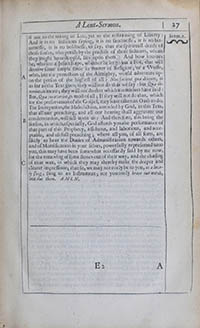 A Lent-Sermon.
27
Serm.2.
A Lent-Sermon.
27
Serm.2.
if not to the taking of Life, yet to the restraining of Liberty:
And it is no seditious saying, it is no saucinesse, it is no bit-
ternesse, it is no boldnesse, to say, that the spirituall death of
those soules, who perish by the practise of those seducers, whom
they might have stopp'd, lies upon them. And how knowes
he, who lets a Jesuit scape, whether he let go but a Fox, that will
deceive some simple soule in matter of Religion; or a Wolfe,
who, but the protection of the Almighty, would adventure up-
on the person of the highest of all? Non facient quæ dixeris, is
as far as the Text goes; they will not do that we say: but Quæ di-
xerint, is more; they will not do that which themselves have said:
But, Quæ juraverint, is most of all; If they will not do that, which
for the preservation of the Gospel, they have taken an Oath to do,
The Increpation, the Malediction, intended by God, in this Text,
that all our preaching, and all our hearing shall aggravate our
condemnation, will fall upon us: And therefore, this being the
season, in which, especially, God affords you the performance of
that part of this Prophecy, assiduous, and laborious, and acce-
ptable, and usefull preaching; where all you, of all sorts, are
likely to hear the Duties of Administration towards others,
and of Mortification in your selves, powerfully represented unto
you, this may have been somewhat necessarily said by me now,
for the removing of some stones out of their way, and the chafing
of that wax, in which they may thereby make the deeper and
clearer impressions; that so, we may not onely be to you, as a love-
ly song, sung to an Instrument; nor you onely heare our words,
but doe them. AMEN. A
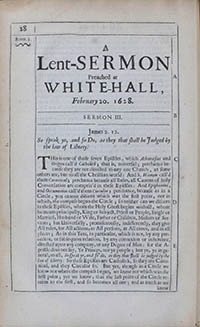 28
Serm.3.
A
28
Serm.3.
A Lent-SERMON
Preached at
WHITE-HALL,
February 20. 1628.
SERMON III. James 2.12.
So speak ye, and so Do, as they that shall be Judged by
the law of Liberty. THisThis is one of those seven Epistles, which Athanasius and
Origen call'd Catholick; that is, universal; perchance be-
cause they are not directed to any one Church, as some
others are, but to all the Christian world: And S. Hierom call'd
them Canonical; perchance because all Rules, all Canons of holy
Conversation are compriz'd in these Epistles: And Epiphanius,
and Oecumenius call'd them Circular; perchance, because as in a
Circle, you cannot discern which was the first point, nor in
which, the compass begun the Circle; so neither can we discern
in these Epistles, whom the Holy Ghost begins withall, whom
he means principally, King or Subject, Priest or People, Single or
Married, Husband or Wife, Father or Children, Masters or Ser-
vants; but Universally, promiscuously, indifferently, they give
All rules, for All actions, to All persons, at All times, and in all
places; As in this Text, in particular, which is not, by any pre-
cedent, or subsequent relation, by any connexion or coherence,
directed upon any company, or any Degree of Men: for the A-
postle does not say, Ye Princes, nor ye people; but ye, ye in ge-
neral, to all, So speak ye, and so do, as they that shall be judged by the
law of liberty: So these Epistles are Catholick, so they are Cano-
nical, and they Circular so. But yet, though in a Circle we
know not where the compass began, we know not which was the
first point; yet we know, that the last point of the Circle re-
turns to the first, and so becomes all one; and as much as we
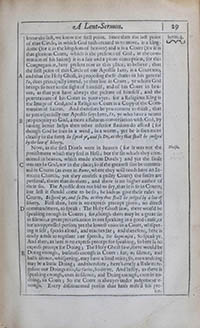 29
Serm.3.
29
Serm.3.
know the last, we know the first point. Since then the last point
of that Circle, in which God hath created us to move, is a king-
dome (for it is the kingdom of heaven) and it is a Court (for it is
that glorious Court, which is the presence of God, in the com-
munion of his Saints) it is a fair and a pious conception, for this
Congregation, here present now in this place, to believe, that
the first point of this Circle of our Apostle here, is a Court too;
and that the Holy Ghost, in proposing these duties in his general
Ye, does principally intend, ye that live in Court, ye whom God
brings so neer to the sight of himself, and of his Court in hea-
ven, as that you have always the picture of himself, and the
pourtraiture of his Court in your eyes: for a Religious King is
the Image of God, and a Religious Court is a Copy of the Com-
munion of Saints. And therefore be you content to think, that
to you especially our Apostle says here, Ye, ye who have a nearer
propinquity to God, a more assiduous conversation with God, by
having better helps then other inferior stations do afford (for
though God be seen in a weed, in a worm, yet he is seen more
clearly in the sumsun) So speak ye, and so Do, as they that shall be judged
by the law of liberty. Now,Divisio. as the first Divels were in heaven (for it was not the
punishment which they feel in Hell, but the sin which they com-
mitted in heaven, which made them Divels) and yet the fault
was not in God, nor in the place; so if the greatest sins be commit-
ted in Courts (as even in Rome, where they will needs have an In-
nocent Church, yet they confess a guilty Court) the faults are
personal, theirs that do them, and there is no higher author of
their sin. The Apostle does not bid us say, that it is so in Courts;
but lest it should come to be so, he bids us give these rules to
Courts, So speak ye, and so Do, as they that shall be judged by a law of
liberty. First then, here is no express precept given, no direct
commandment, to speak: The Holy Ghost saw, there would be
speaking enough in Courts; for, though there may be a great sin
in silence, a great prevarication in not speaking in a good cause, or
for an oppressed person; yet the lowest voice in a Court, whisper-
ing it self, speaks a loud, and reaches far; and therefore, here is
onely a rule to regulate our speech, Sic loquimini, So speak ye.
And then, as here is no express precept for speaking, so here is no
express precept for Doing; The Holy Ghost saw, there would be
Doing enough, business enough in Court: for, as silence, and
halfe silence, whispering, may have a loud voice; so, even undoing
may be a busie Doing; and therefore, here's onely a Rule to re-
gulate our Doings too, Sic facite, So do ye. And lastly, as there is
speaking enough, even in silence, and Doing enough, even in un-
doing, in Court; So the Court is alwayes under judgement e-
nough. Every discontented person that hath miss'd his pre-
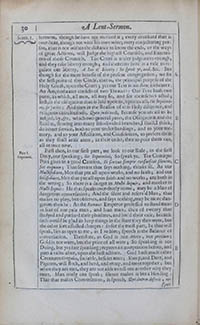 A Lent-Sermon.
30
Serm.3.
ferment, though he have not merited it; every drunkard that is over-
A Lent-Sermon.
30
Serm.3.
ferment, though he have not merited it; every drunkard that is over-
heat, though not with his own wine; every conjecturing per-
son, that is not within the distance to know the ends, or the ways
of great Actions, will Judge the highest Counsels, and Executi-
ons of those Councels. The Court is under judgement enough,
and they take liberty enough; and therefore here is a rule to re-
gulate our liberty, A law of liberty: So speak ye, and, &c. But
though for the more benefit of the present congregation, we fix
the first point of this Circle, that is, the principal purpose of the
Holy Ghost, upon the Court; yet our Text is an Amphitheater.
An Amphitheater consists of two Theaters: Our Text hath two
parts, in which, all men, all may fit, and see themselves acted;
first, in the obligation that is laid upon us, upon us all, Sic loquimi-
ni, sic facite: And then in the Reason of this Holy diligence, and
religious cautelousness, Quia judicandi, Because you are all to be
judged, by, &c. which two general parts, the Obligation, and the
Reason, flowing into many sub-divided branches, I shall, I think,
do better service, both to your understandings, and to your me-
mory, and to your Affections, and Consciences, to present them
as they shall arise anon, in their order, then to pour them out,
all at once now. Part I. First then, in our first part, we look to our Rule, in the first
Loquimini.Duty, our speaking; Sic loquimini, So speak ye. The Comique
Poet gives us a good Caution, Si servus semper consuescat silentio,
fiet nequam; That servant that says nothing, thinks ill. As our
Nullifidians, Men that put all upon works, and no faith; and our
Solisidians, Men that put all upon faith and no works, are both in
the wrong; So there is a danger in Multi loquio, and another in
Nulli loquio: He that speaks over-freely to me, may be a Man of
dangerous conversation; And the silent and reserv'd Man, that
makes no play, but observes, and says nothing, may be more dan-
gerous then he: As the Romane Emperor professed to stand more
in fear of one pale man, and lean man, then of twenty that
studyed and pursued their pleasures, and lov'd their ease, because
such would be glad to keep things in the state they then were, but
the other sort affected changes: so for the most part, he that will
speak, lies as open to me, as I to him; speech is the Balance of
conversation. Therefore, as God is not Merx, but pretium;
Gold is not ware, but the price of all ware; So speaking is not
Doing, but yet fair speaking prepares an acceptation before, and
puts a value after, upon the best actions. God hath made other
Creatures Gregalia, sociable, besides man; Sheep, and Deer, and
Pigeons, will flock, and herd, and troup, and meet together; but
when they are met, they are not able to tell one another why they
meet. Man onely can speak; silence makes it but a Herding:
That that makes Conversation, is speech, Qui datum deserit, re-
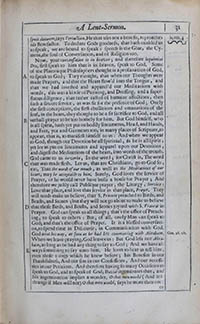 A Lent-Sermon.
31
Serm.3.
spuit datorem, says Tertullian. He that uses not a benefit, reproaches
A Lent-Sermon.
31
Serm.3.
spuit datorem, says Tertullian. He that uses not a benefit, reproaches
his Benefactor. To declare Gods goodness, that hath enabled us
to speak, we are bound to speak: speech is the Glue, the Cy-
ment, the soul of Conversation, and of Religion too. Now, your conversation is in heaven; and therefore loquimini
Deo, first speak to him that is in heaven, speak to God. Some
of the Platonique Philosophers thought it a profanation of God,
to speak to God; They thought, that when our Thoughts were
made Prayers, and that the Heart flow'd into the Tongue, and
that we had invested and apparel'd our Meditations with
words, this was a kinde of Painting, and Dressing, and a super-
fluous diligence, that rather tasted of humane affections, then
such a sincere service, as was fit for the presence of God; Onely
the first conceptions, the first ebullitions and emanations of the
soul, in the heart, they thought to be a fit sacrifice to God, and all
verball prayer to be too homely for him. But God himself, who
is all spirit, hath yet put on bodily lineaments, Head, and Hands,
and Feet, yea and Garments too, in many places of Scripture, to
appear, that is, to manifest himself to us: And when we appear
to God, though our Devotion be all spiritual, as he is all spirit,
yet let us put on lineaments and apparel upon our Devotions,
and digest the Meditations of the heart, into words of the mouth.
God came to us in verbo, In the word; for Christ is, The word
that was made flesh. Let us, that are Christians, go to God so,
too, That the words of our mouth, as well as the Meditations of our
heart, may be acceptable to him. Surely, God loves the service of
Prayer, or he would never have built a house for Prayer; And
therefore we justly call Publique prayer, the Liturgy, Service:
Love that place, and love that service in that place, Prayer. They
will needs make us believe, that S. Francis preached to Birds, and
Beasts, and Stones; but they will not go about to make us believe
that those Birds, and Beasts, and Stones joyned with S. Francis in
Prayer. God can speak to all things; that's the office of Preach-
ing, to speak to others: But, of all, onely Man can speak to
God; and that's the office of Prayer. It is a blessed conversati-
on, to spend time in Discourse, in Communication with God.
God went his way, as soon as he had left communing with Abraham.
Gen. 18. ult. When we leave praying, God leaves us: But God left not Abra-
ham, as long as he had any thing to say to God; And we have al-
ways something to say unto him. He loves to hear us tell him,
even those things which he knew before; his Benefits in our
Thankfulness, And our sins in our Confessions, And our necessi-
ties in our Petitions. And therefore having so many Occasions to
speak to God, and to speak of God, David ingeminates that, and
his ingemination implies a wonder, O that men would (And it is
strange if Men will not) O that men would, says he more then once
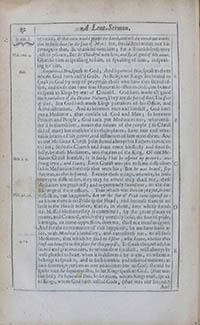 A Lent-Sermon.
32
Serm.3.
A Lent-Sermon.
32
Serm.3.
or twice, O that men would praise the Lord, and tell the wondrous works
that he hath done for the sons of Men! for, David determines not his
precept in that, Be thankful unto him; for a Thankfulness may
pass in private,Psal. 100.4. But Be Thankful unto him, and speak good of his name.
Glorifie him in speaking to him, in speaking of him, in speak-
ing for him. Diis.Loquimini Deo, speak to God; And loquimini Diis, speak to them
whom God hath call'd Gods. As Religious Kings are bound to
speak to God by way of prayer; so those who have that sacred of-
fice, and those that have that Honorable office to do so, are bound
to speak to Kings by way of Counsel. God hath made all good
men partakers of the Divine Nature; They are the sons of God, The seed
of God; But God hath made Kings partakers of his Office, and
Administration. And as between man and himself, God hath
put a Mediator, that consists of God and Man; so between
Princes and People, God hath put Mediators too, who consi-
der'd in themselves, retain the natnrenature of the people (so Christ
did of man) but consider'd in their places, have fair and vene-
rable beams of his power, and influences of him upon them. And
as our Mediator Christ Jesus found always his Fathers ears open
to him; so do the Church and State enter blessedly and success-
fully, by these Mediators, into the ears of the King. Of our Me-
diator Christ himself,Heb. 5.7. it is said, That he offered up prayers, and
strong cryes, and Tears; Even Christ was put to some difficulties
in his Mediation for those that were his; But he was heard, says
that text, in that he feared. Even in those things, wherein, in some
emergent difficulties, they may be afraid they shall not, these
Mediators are graciously and opportunely heard too, in the due
discharge of their offices. That which was Davids prayer, is our
possession,Psal. 36.11. our happiness, Let not the foot of Pride come against us:
we know there is no Pride in the Head; and because there is no
fault in the Hands neither, that is, in them, into whose hands
this blessed Mediatorship is committed, by the great places of
power, and Councel, which they worthily hold; the foot of pride,
forraign, or home-oppression, does not, shall not tread us down.
And for the continuation of this happiness, let me have leave to
say, with Mordicai's humility, and earnestness too, to all such
Mediators,4.14. that which he said to Esther, Who knows, whether thou
beest not brought to this place for this purpose, To speak that, which his
sacred and gracious ears, to whom thou speakest, will always be
well pleased to hear, when it is delivered by them, to whom it
belongs to speak it, and in such humble and reserved manner, as
such soveraign persons as owe an account but to God, should be
spoke too? Sic loquimini Deo, So let Kings speak to God, (that was
our first) Sic loquimini Diis, So let them, whom Kings trust, speak
to Kings, whom God hath called Gods, (that was our second.)
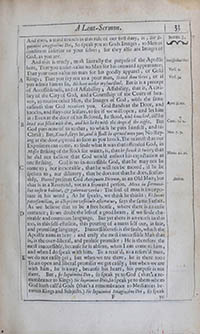 A Lent-Sermon.
33
Serm.3.
A Lent-Sermon.
33
Serm.3.
And then, a third branch in this rule of our first duty, is, Sic lo-
quimini imaginibus Dei, So speak you to Gods Images, to Men of
condition inferior to your selves; for they also are Images of
God, as you are. And this is truely,Imaginibus Dei. most literally the purpose of the Apostle
here, That you under-value no Man for his outward appearance;Vers. 2.
That youryou over-value no man for his goodly apparel, or Gold
Rings; That you say not to a poor man, Stand thou there;Vers. 3. or if
you admit him to sit, Sit here under my footstool. But it is a precept
of Accessibleness, and of Affability; Affability, that is, A civi-
lity of the City of God, and a Courtship of the Court of hea-
ven, to receive other Men, the Images of God,Apoc. 3.20. with the same
easiness that God receives you. God stands at the Door, and
knocks, and stays our leisure, to see if we will open, and let him
in: Even at the door of his Beloved, he stood, and knocked, till his
head was filled with dew, and his locks with the drops of the night.Cant. 5.2. But
God puts none of us to that, to which he puts himself, and his
Christ: But, Knock, says he, and it shall be opened unto you;Mat. 7.7. No stay-
ing at the door, opened as soon as you knock. The nearest that our
Expositors can come, to finde what it was that offended God, in
Moses striking of the Rock for water, is, that he strook it twice;Num. 20.10. that
he did not believe that God would answer his expectation at
one striking. God is no in-accessible God, that he may not be
come to; nor inexorable, that he will not be moved, if he be
spoken to; nor dilatory, that he does not that he does, season-
ably. Daniel presents God Antiquum Dierum, as an Old Man;Ambro. but
that is as a Reverend, not as a froward person. Mens in sermoni-
bus nostris habitat, & gubernat verba: The soul of man is incorpo-
rate in his word; As he speaks, we think he thinks: Et bonus
paterfamilias, in illo primo vestibulo æstimatur, says the same Father.
As we believe that to be a free house, where there is an easie
entrance; so we doubt the less of a good heart, if we finde cha-
ritable and courteous language. But yet there is an excess in this
too, in this self-effusion, this pouring of a mans self out, in fair,
and promising language. Inaccessibleness is the fault, which the
Apostle aims at here: and truly the most inaccessible Man that
is, is the over-liberal, and profuse promiser: He is therefore the
most inaccessible, because he is absent, when I am come to him,
and when I do speak with him. To a retir'd, to a reserv'd man,
we do not easily get; but when we are there, he is there too:
To an open and liberal promiser we get easily; but when we are
with him, he is away, because his heart, his purpose is not
there. But, sic loquimini Deo, so speak ye to God (that's a re-
membrance to Kings) Sic loquimini Diis, so speak ye to them whom
God hath call'd Gods (that's a remembrance to Mediators be-
tween Kings and Subjects.) Sic loquimini Imaginibus Dei, so speak F
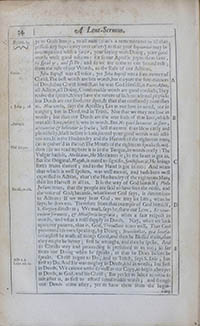 A Lent-Sermon.
34
Serm.3.
A Lent-Sermon.
34
Serm.3.
ye to Gods Image, to all men (that's a remembrance to all that
possess any superiority over others) as that your loquimini may be
accompanied with a facite, your saying with Doing, your good
words with good actions: for so our Apostle joyns them here,
So speak ye, and so Do: and so we are come to our second rule;
from the rule of our Words, to the Rule of our Actions. Facite.John Baptist was all voice, yet John Baptist was a fore-runner of
Christ. The best words are but words, but they are the fore-runners
of Deeds: but Christ himself, as he was God himself, is Purus Actus,
all Action, all Doing. Comfortable words are good cordials; They
revive the spirits, & they have the nature of such occasional physick:
but Deeds are our food, our dyet, & that that constantly nourishes
us.1 John 3.18. Non verbo, says the Apostle; Let us not love in word, nor in
tongue; but in Deed, and in Truth. Not that we may not love in
words; but that our Deeds are the true seals of that love, which
was also love,Ambrose. when it was in words. But Ne quod luxuriat in flore,
attenuetur & hebetetur in fructu; lest that tree that blew early and
plentifully, blast before it knit, second your good words with acti-
ons too. It is the Husbandry and the Harvest of the righteous man;
(as it gather'd in David) The Mouth of the righteous speaketh wis-
dom:Psal. 37.30. so we read it; there it is in the Tongue, in words onely: The
Vulgar hath it, Meditatur, He Meditates it; so the heart is got in.
But the Original, Hagah, is noted to signifie, fructificavit, He brings
forth fruits thereof; and so the Hand is got in too: And when
that which is well spoken, was well meant, and hath been well
expressed in Action, that's the Husbandry of the righteous Man;
then his Harvest is all in. It is the way of God himself; Philo
Judæus notes,Exod. 20.18. that the people are said to have seen the noise, and
the voice of God; because, whatsoever God says, it determines
in Action: If we may hear God, we may see him; what he
says, he does too. Therefore from that example of God himself,
S. Gregory directs us; We must, says he, shew our Love, Et vene-
ratione sermonis, & Ministerio largitatis, what a fair respect in
words, and what a reall supply in Deeds. Nay, when we look
upon our pattern, that is, God, Tertullian notes well, That God
prevented his own speaking, by Doing; Benedicebat, quæ benefa-
ciebat; first he made all things Good, and then he Blessed them, that
they might be better; first he wrought, and then he spoke. And
so Christs way and proceeding is presented to us too; so far
from not Doing when he speaks, as that he Does before he
speaks.Acts 1.1. Christ began to Do, and to Teach, says S. Luke; but
Luke ult. i19.first to Do. And He was mighty in Deeds, and in words; but first
in Deeds. We cannot write so well as our Copy, to begin alwayes
at Deeds, as God, and his Christ; But yet let us labor to write so
fair after it, as first to afford comfortable words; and though
our Deeds come after, yet to have them from the begin-
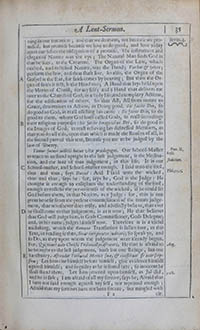 A Lent-Sermon.
35
Serm.3.
ning in our intention; and that we do them, not because we pro-
A Lent-Sermon.
35
Serm.3.
ning in our intention; and that we do them, not because we pro-mised, but promise because we love to do good, and love to lay
upon our selves the obligation of a promise. The instrument and
Organ of Nature was the eye; The Natural Man finds God in
that he sees, in the Creature. The Organ of the Law, which
exalted, and rectified Nature, was the Hand; Fac hoc & vives;
perform the law, and thou shalt live. So also, the Organ of the
Gospel is the Ear, for faith comes by hearing; But then the Or-
gan of faith it self, is the Hand too; A Hand that lays hold upon
the Merits of Christ, for my self; and a Hand that delivers me
over to the Church of God, in a holy life, and exemplary Actions,
for the edification of others. So that All, All from nature to
Grace, determines in Action, in Doing good. Sic facite Deo, so
do good to God, in reall assisting his cause: Sic facite Diis, so do
good to them, whom God hath called Gods, in reall secondingsseconding
their religious purposes: Sic facite Imaginibus Dei, so do good to
the Images of God, in reall relieving his distressed Members, as
that you do all this, upon that which is made the Reason of all, in
the second part of this text, Because you are to be judged by the
law of liberty. Timor futuri judicii hujus vitæ prædagogus.Part. II. Our School-Master
Basil.to teach us to stand upright in the last judgement, is the Medita-
tion, and the fear of that judgement, in this life. Judicium.It is our
School-master, and School-master enough. I said unto the fool,Psal. 75.5.
thus and thus, says David: And I said unto the wicked,
thus and thus, says he: for, says he, God is the Judge: He
thought it enough to enlighten the understanding of the fool,
enough to rectifie the perverseness of the wicked, if he could set
God before them, in that Notion, as a Judge: for, this is one
great benefit from the present contemplation of the future judge-
ment, that whosoever does truly, and advisedly believe, that ever
he shall come to that judgement, is at it now; He that believes
that God will judge him, is Gods Commissioner, Gods Delegate,
and, in his name, judges himself now. Therefore it is a useful
mistaking, which the Romane Translation is fallen into, in this
Text, in reading it thus, Sicut incipientes judicari; So speak ye, and
so Do, as they upon whom the judgement were already begun.
For, Qui timet ante Christi Tribunal præsentari,Aug. He that is afraid to
be brought to the last judgement, hath but one Refuge, but one
Sanctuary, Ascendat Tribunal Mentis suæ, & constituat se ante seip-
sum; Let him cite himself before himself, give evidence himself
against himself; and so guilty as he is found here, so innocent he
shall stand there. Let him proceed upon himself, as Job did,9.28.
and he is safe; I am afraid of all my sorrow, says he; Afraid that
I have not said enough against my self, nor repented enough;
Afraid that my sorrows have not been sincere, but mingled with F2
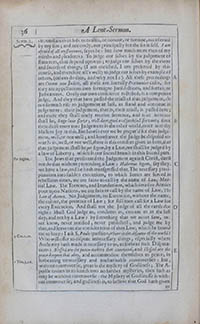 A Lent-Sermon.
36
Serm.3.
A Lent-Sermon.
36
Serm.3.
circumstances of loss of health, or honour, or fortune, occasioned
by my sins; and not onely, not principally for the sin it self. I am
afraid of all my sorrowes, sayes he: but how much more then of my
mirths and pleasures? To judge our selves by the judgement of
flatterers, that depend upon us; to judge our selves by the event
and success of things, (I am enriched, I am preferred by this
course, and therefore all's well) to judge our selves by example of
others, (others do thus, and why not I?) All these proceedings
are Coram non Judice, all these are literally Præmunire cases, for
they are appellations into forraigne Jurisdictions, and forraigne
Judicatures. Onely our own conscience rectified, is a competent
judge. And they that have passed the triall of that judgement, do
not so much rise to judgement at last, as stand and continue in
judgement: their judgement, that is, their triall, is passed here;
and there they shall onely receive sentence, and that sentence
shall be, Euge bone serve; Well done, good and faithfull servant; since
thou didst enter into Judgement in the other world, enter into thy
Masters Joy in this. But howso everhowsoever we be prepar'd for that judge-
ment, well, or not well; and howsoever the Judge be disposed to-
wards us, well, or not well, there is this comfort given us here, that
that judgement shall be per legem, by a Law, we shall be judged by
a law of Liberty; which is our second branch in this second part. Per Legem.The Jews that prosecuted the Judgement against Christ, durst
not do that without pretending a Law: Habemus legem, say they,
we have a law, and he hath transgressed that. The necessary preci-
pitations into sudden executions, to which States are forced in
rebellious times, we are faine to call by the name of Law, Mar-
tial Law. The Torrents, and Inundations, which invasive Armies
pour upon Nations, we are fain to call by the name of Law, The
Law of Armes. No Judgement, no Execution, without the name,
the colour, the pretence of Law; for still men call for a Law for
every Execution. And shall not the Judge of all the earth doe
right? Shall God judge us, condemn us, execute us at the last
day, and not by a Law? by something that we never saw, ne-
ver knew, never notified, never published, and judge me by
that, and leave out the consideration of that Law, which he bound
me to keep?1 Cor. 1.20. I ask S. Pauls question, Where is the disputer of the world?
Who will offer to dispute unnecessary things, especially where
Authority hath made it necessary to us, to forbear such Disputa-
tions? Blessed are the peace-makers that command, and blessed are the
peace-keepers that obey, and accommodate themselves to peace, in
forbearing unnecessary and uncharitable controversies:1 Tim. 3.16. but,
without controversie, great is the mystery of Godliness; The A-
postle invites us to search into no farther mysteries, then such as
may be without controversie: the Mystery of Godlinesse is with-
out controversie; and godliness is, to believe that God hath given
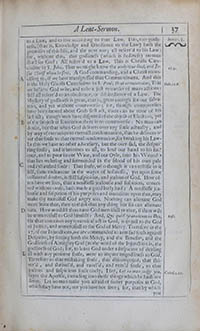 A Lent-Sermon.
37
Serm.3.
A Lent-Sermon.
37
Serm.3.
us a Law, and to live according to that Law. This, this godli-
ness, (that is, Knowledge and Obedience to the Law) hath the
promises of this life, and the next too; all referr'd to his Law:
for, without this, this godliness (which is holiness) no man
shall see God: All referr'd to a Law. This is Christs Cate-
chisme in S. John, That we might know the onely true God, and Je-
sus Christ whom he sent17.3.. A God commanding, and a Christ recon-
ciling us, if we have transgressed that Commandment. And this
is the Holy Ghosts Catechisme in S. Paul, Deus remunerator,Heb. 11.6. That
we believe God to be, and to be a just rewarder of mans actions:
still all referr'd to an obedience, or disobedience of a Law. The
Mystery of godliness is great, that is, great enough for our salva-
tion, and yet without controversie; for, though controversies
have been moved about Gods first act, there can be none of his
last act; though men have disputed of the object of Election, yet
of the subject of Execution there is no controversie: No man can
doubt, but that when God delivers over any soule actually, and
by way of execution to eternall condemnation, that he delivers o-
ver that soule to that eternal condemnation, for breaking his Law.
In this we have no other adversary, but the over-sad, the despai-
ring soule; and it becomes us all, to lend our hand to his suc-
cour, and to pour in our Wine, and our Oyle, into his Wounds,
that lies weltring and surrounded in the blood of his own pale
and exhausted soule: That soule, who though it can testifie to it
self, some endeavour in the wayes of holinesse, yet upon some
collateral doubts, is still suspicious, and jealous of God. How of-
ten have we seen, that a needlesse jealousie and suspition, concei-
ved without cause, hath made a good body bad? A needlesse jea-
lousie and suspition of his purposes and intentions upon thee, may
make thy mercifull God angry too. Nothing can alienate God
more from thee, then to think that any thing but sin can alienate
him. How wouldst thou have God mercifull to thee, if thou wilt
be unmercifull to God himself? And, Qui quid tyrannicum in Deo,
Basil. He that conceives any tyrannical act in God, is unjust to the God
of Justice, and unmercifull to the God of Mercy. Therefore in the
17. of our Injunctions, we are commanded to arm sad souls against
Despaire, by setting forth the Mercy, and the Benefits, and the
Godliness of Almighty God (as the word of the Injunction is, the
godliness of God) for, to leave God under a suspicion of dealing
ill with any penitent soule, were to impute ungodliness to God.
Therefore to that mistaking soule, that discomposed, that shi-
ver'd, and shrivel'd, and ravel'd, and ruin'd soule, to that
jealous and suspicious soule onely, I say, Let no man judge you,Coloss. 2.16.
sayes the Apostle, intruding into those things which he hath not
seene. Let no man make you afraid of secret purposes in God,
which they have not, nor you have not seen; for, that by which
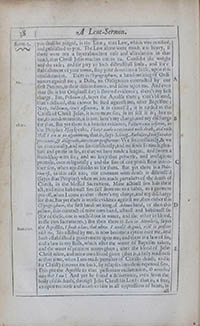 A Lent-Sermon.
38
Serm.3.
A Lent-Sermon.
38
Serm.3.
you shall be judged, is the Law; that Law, which was notified,
and published to you. The Law alone were much too heavy, if
there were not a superabundant ease and alleviation in that
hand, that Christ Jesus reaches out to us. Consider the weight
and the ease; and for pity to such distrustfull souls, and for e-
stablishment of your owne, stop your devotions a little, upon this
consideration. There is Chyrographum, a hand-writing of Ordi-
nances against me;14. a Debt, an Obligation contracted by our
first Parents, in their disobedience, and falne upon me. And even
that (be it but Originall sin) is shrewd evidence; there's my first
charge. But, Deletum est, sayes the Apostle there; that's blotted,
that's defaced, that cannot be sued against me, after Baptisme:
Nay, Sublatum, cruci affixum, it is cancel'd, it is nailed to the
Crosse of Christ Jesus, it is no more sin; in its self it is; but to
me, to condemnation, it is not: here's my charge, and my discharge
for that.28.15. But yet there is a heavier evidence, Pactum cum inferno, as
the Prophet Esay speaks, I have made a covenant with death, and with
Hell I am at an agreement; that is, says S. Greg. Audacter, Indesinenter
peccamus, & diligendo, amicitiam profitemur: We sin constantly, & we
sin continually, and we sin confidently; and we finde so much plea-
sure and profit in sin, as that we have made a league, and sworn a
friendship with sin; and we keep that perverse, and irreligious
promise, over-religiously; and the sins of our youth flow into o-
ther sins, when age disables us for them. But yet there is a Dele-
tum est, in this case too; our covenant with death is disanull'd
(sayes that Prophet) when we are made partakers of the death of
Christ, in the blessed Sacrament. Mine actuall sins lose their
act, and mine habituall sins fall from me as a habit, as a garment
put off, when I come to that: there's my charge, and my discharge
for that. But yet there is worse evidence against me, then either this
Chyrographum, the first hand-writing of Adams hand, or then this
pactum, this contract of mine own hand, actuall and habituall sin
(for of these, one is wash'd out in water, and the other in blood,
in the two Sacraments.) But then there is Lex in Membris, sayes
the Apostle,Rom. 7.21. I finde a law, that when I would do good, evil is present
with me. Sin assisted by me, is now become a tyrant over me, and
hath established a government upon me; and there is a law of sin,
and a law in my flesh, which after the water of Baptism taken,
and the water of penitent teares given; after the blood of Jesus
Christ taken, and mine own blood given (that is, a holy readiness
at that time, when I am made partaker of Christs death, to die
for Christ) throwes me back, by relapses into those repented sins.
This put the Apostle to that passionate exclamation, O wretched
man that I am! And yet he found a deliverance, even from the
body of this death, through Jesus Christ his Lord: that is, a free,
an open recourse and access to him in all oppressions of heart, in
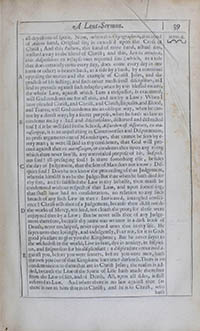 A Lent-Sermon.
39
Serm.3.
A Lent-Sermon.
39
Serm.3.
all dejections of spirit. Now, when this Chyrographum, this bond
of Adams hand, Original sin, is cancell'd upon the Cross of
Christ; And this Pactum, this bandbond of mine hand, actual sins,
washed away in the blood of Christ; and this, Lex in membris,
this disposition to relapse into repented sins (which, as a tide
that does certainly come every day, does come every day in one
form or other) is beaten back, as a tide by a bank, by a continual
opposing the merits and the example of Christ Jesus, and the
practise of his fasting, and such other medicinall disciplines, as I
find to prevaile against such relapses; when by this blessed means,
the whole Law, against which I am a trespasser, is evacuated,
will God condemn me for all this, and not by a Law? When I
have pleaded Christ, and Christ, and Christ; Baptism, and Blood,
and Teares; will God condemn me an oblique way, when he can-
not by a direct way; by a secret purpose, when he hath no law to
condemn me by? Sad and disconsolate, distorted and distracted
soul! if it be well said in the School, Absurdum est disputare, ex ma-
nuscriptis, it is an unjust thing in Controversies and Disputations,
to press arguments out of Manuscripts, that cannot be seen by e-
very man; it were ill said in thy conscience, that God will pro-
ceed against thee ex manuscripto, or condemn thee upon any thing
which thou never saw'st, any unrevealed purpose of his. Suspici-
ous soul! ill-presaging soul! Is there something else, besides
the day of Judgement, that the Son of Man does not know? Dis-
quiet soul! Does he not know the proceeding of that Judgement,
wherein himself is to be the Judge? But that when he hath died for
thy sins, and so fulfilled the Law in thy behalfe, thou maist be
condemned without respect of that Law, and upon something,
that shall have had no consideration, no relation to any such
breach of any such Law in thee? Intricated, intangled consci-
ence! Christ tells thee of a Judgement, because thou didst not do
the works of Mercy, not feed, not cloath the poor; for those were
enjoyned thee by a Law: But he never tells thee of any Judge-
ment therefore, because thy name was written in a dark book of
Death, never unclasped, never opened unto thee in thy life. He
sayes unto thee lovingly, and indulgently, Fear not, for it is Gods
good pleasure to give you the Kingdome; But he never sayes to
the wickedest in the world, Live in fear, dye in anxiety, in suspiti-
on, and suspension for his displeasure: a displeasure conceived a-
gainst you, before you were sinners, before you were men, hath
thrown you out of that Kingdome into utter darkness. There is no
condemnation to them that are in Christ Jesus; the reason is ad-
ded, because the Law of the Spirit of Life hath made them free
from the Law of Sin, and of Death. All, upon all sides, is still
referred to Law. And where there is no law against thee (as
there is not to him that is in Christ; and he is in Christ, who
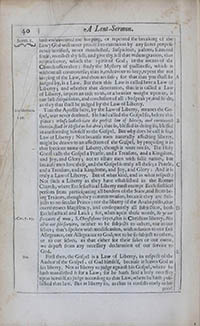 A Lent-Sermon.
40
Serm.3.
A Lent-Sermon.
40
Serm.3.
hath endeavoured the keeping, or repented the breaking of the
Law) God will never proceed to execution by any secret purpose
never notified, never manifested. Suspicious, jealous, scattered
soule, recollect thy self, and give thy self that redintegration, that
acquiescence, which the Spirit of God, in the means of the
Church offers thee: study the Mystery of godlinesse, which is
without all controversie; that is, endeavour to keep, repent the not
keeping of the Law, and thou art safe; for that that you shall be
judged by, is a Law. But then this Law is called here a Law of
Liberty; and whether that denotation, that it is called a Law
of Liberty, import an ease to us, or a heavier weight upon us, is
our last disquisition, and conclusion of all: So speak ye, and so do,
as they that shall be judged by the Law of Liberty. Lex libertatis.That the Apostle here, by the Law of Liberty, meanes the Go-
spel,1.25. was never doubted. He had called the Gospel so, before this
place: Whoso looketh into the perfect law of liberty, and continueth
therein, shall be blessed in his deed; that is, blessed in doing so, blessed
in conforming himself to the Gospel. But why does he call it so, a
Law of Liberty? Not because men naturally affecting liberty,
might be drawn to an affection of the Gospel, by proposing it in
that specious name of Liberty, though it were not so. The Holy
Ghost calls the Gospel a Pearle, and a Treasure, and a Kingdom,
and Joy, and Glory; not to allure men with false names, but
because men love these, and the Gospel is truly all these; a Pearle,
and a Treasure, and a Kingdome, and Joy, and Glory: And it is
truly a Law of Liberty. But of what kind, and in what respect?
Not such a Liberty as they have established in the Roman
Church, where Ecclesiastical Liberty must exempt Ecclesiastical
persons from participating all burdens of the State, and from be-
ing Traitors, though they commit treason, because they are Sub-
jects to no secular Prince: nor the liberty of the Anabaptists, that
overthrowes Magistracy, and consequently all subjection, both
Ecclesiastical and Laick; for, when upon those words, Be ye not
servants of men,1 Cor. 7.23. S. Chrysostome sayes, this is Christian liberty, Nec
aliis nec sibi servire, neither to be subjects to others, nor to our
selves; that's spoken with modification, with relation to our first
Allegeance, our Allegeance to God; not to be so subject to others,
or to our selves, as that either for their sakes or our owne,
we depart from any necessary declaration of our service to
God. Deo.First then, the Gospel is a Law of Liberty, in respect of the
Author of the Gospel, of God himself, because it leaves God at
his liberty. Not at liberty to judge against his Gospel, where he
hath manifested it for a Law; for he hath laid a holy necessity
upon himself, to judge according to that Law, where he hath pub-
lished that law. But at liberty so, as that it consists onely in his
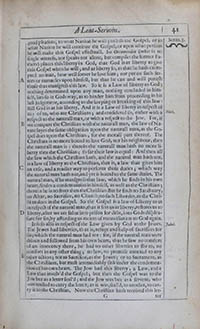 A Lent-Sermon.
41
Serm.3.
A Lent-Sermon.
41
Serm.3.
good pleasure, to what Nation he will publish the Gospel, or in
what Nation he will continue the Gospel, or upon what persons
he will make this Gospel effectuall. So Oecumenius (who is no
single witness, nor speaks not alone, but compiles the former Fa-
thers) places this liberty in God, that God is at liberty to give
this Gospel when he will; and at liberty so, as that he hath exem-
pted no man, how well soever he love him; nor put on such fet-
ters or manacles upon himself, but that he can and will punish
those that transgress this law. So it is a Law of liberty to God;
nothing determined upon any man, nothing concluded in him-
self, lies so in Gods way, as to hinder him from proceeding in his
last judgement, according to the keeping or breaking of this law:
still God is at his liberty. And it is a Law of liberty in respect of
us: of us, who are Christians; and considered so,Nobis. either with a
respect to the naturall man, or with a respect to the Jew. For, if
we compare the Christian with the naturall man, the law of Na-
ture layes the same obligation upon the naturall man, as the Go-
spel does upon the Christian, for the morall part thereof. The
Christian is no more bound to love God, nor his neighbour, then
the naturall man is: therein the naturall man hath no more li-
berty then the Christian; so far their law is equal: And then all
the law which the Christian hath, and the natural man hath not,
is a law of liberty to the Christian, that is, a law that gives him
an ease, and a readier way to perform those duties; which way
the natural man hath not, and yet is bound to the same duties. The
natural man, if he transgress that law, which he finds in his own
heart, findes a condemnation in himself, as well as the Christian;
therein he is no freer then the Christian: But he finds no Sanctuary,
no Altar, no Sacrifice, no Church; no such Liberties, as the Chri-
stian does in the Gospel. So the Gospel is a law of Liberty to us
in respect of the natural man, that it sets us at liberty, restores us to
liberty, after we are falne into prison for debt, into Gods displea-
sure for sin, by affording us means of reconciliation to God again. It is so also in respect of the Law given by God to the Jewes.Judæi.
The Jewes had liberties, that is, refuge and help of sacrifices for
sin; which the natural man had not: for, if the natural man were
driven and followed from his own heart, that he saw no comfort
of an innocency there, he had no other liberties to flie to, no
comfort in any other thing; no law, no promise annexed to any
other action; not to Sacrifice, as the Jewes; or to Sacrament, as
the Christians, but must irremediably sink under the condemna-
tion of his own heart. The Jew had this liberty, a Law, and a
Law that involv'd the Gospel; but then the Gospel was to the
Jew but as a letter seal'd; and the Jew was but as a servant, who
was trusted to carry the letter, as it was, seal'd, to another, to car-
ry it to the Christian. Now the Christian hath received this let-
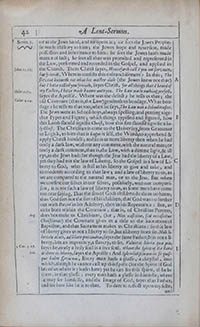 A Lent-Sermon.
42
Serm.3.
ter at the Jews hand, and he opens it; he sees the Jewes Prophe-
A Lent-Sermon.
42
Serm.3.
ter at the Jews hand, and he opens it; he sees the Jewes Prophe-sie made History to him; the Jewes hope and reversion, made
possession and inheritance to him: he sees the Jewes faith made
matter of fact; he sees all that was promised and represented in
the Law, performed and recorded in the Gospel, and applied in
the Church.John 15.15. There Christ sayes, Henceforth call I you not servants,
but friends. Wherein consists this enfranchisement? In this; The
servant knoweth not what his master doth (the Jewes knew not that)
but I have called you friends, sayes Christ, for all things that I heard of
my Father, I have made known unto you. The Law made nothing perfect,
sayes the ApostleHebr. 7.19.. Where was the defect? he tells us that; the
old Covenant (that is, the Law) gendreth to bondageGalat 4.24.. What bon-
dage? he tells us that too, when he says, The Law was a Schoolmaster.
The Jews were as School-boys, always spelling, and putting toge-
ther Types and Figure; which things typified and figured, how
this Lamb should signifie Christ, how this fire should signifie a ho-
ly Ghost. The Christian is come to the University, from Grammar
to Logick, to him that is Logos it self, the Word; to apprehend &
apply Christ himself; and so is at more liberty then when he had
onely a dark law, without any comment, with the natural man; or
onely a dark comment, that is, the Law, with a dimme light, & ill
eys, as the Jews had: for though the Jew had the liberty of a Law,
yet they had not the law of Liberty. So the Gospel is a law of Li-
berty to God, who is still at his liberty to give and take, and
to condemn according to that law; and a law of liberty to us, as
we are compared to the natural man, or to the Jew. But when
we confine our selves in our selves, positively, without compari-
son, it is not such a law of liberty to us, as some men have come
too near saying, That the sins of Gods children do them no harm;
that God sees not the sins of his children; that God was no further
out with David in his Adultery, then in his Repentance: But, as
to be born within the Covenant, that is, of Christian Parents,
does not make us Christians,Aug. (for, Non nascitur, sed renascitur
Christianus) the Covenant gives us a title to the Sacrament of
Baptisme, and that Sacrament makes us Christians: so this law
of liberty gives us not a liberty to sin, but a liberty from sin. Noli li-
bertate abuti, ad libere peccandum, sayes the same Father; It is not a li-
berty, but an impotency, a slavery, to sin. Voluntas libera quæ pia,
sayes he, onely a holy soul is a free soul. Where the spirit of the Lord
is there is liberty, sayes the Apostle2 Cor. 3.17.: And Splendidissimum in se quis-
que habet speculumLeo., Every man hath a glasse, a chrystal, into
which, though he cannot call up this spirit (for the Spirit of God
breathes where it pleases him) yet he can see this spirit, if he be
there, in that glasse: every man hath a glasse in himselfe, where
he may see himselfe, and the Image of God, sayes that Father,
and see how like he is to that. To dare to reflect upon my selfe,
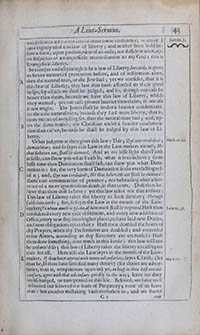 A Lent-Sermon.
43
Serm.3.
A Lent-Sermon.
43
Serm.3.
and to search all the corners of mine owne conscience, whether I
have rightly used this law of liberty; and neither been bold be-
fore a sinne, upon presumption of an easie; nor diffident after, up-
on suspicion of an impossible reconciliation to my God: this is
Evangelical liberty. So then (to end all) though it be a law of Liberty, because it gives
us better meanes of prevention before, and of restitution after,
then the natural man, or the Jew had; yet we consider, that it is
this law of Liberty, this law that hath afforded us these good
helps, by which we shall be judged; and so, though our case be
better then theirs, because we have this law of Liberty, which
they wanted, yet our case growes heavier then theirs, if we use
it not aright. The Jewes shall be under a heavier condemnati-
on then the natural man, because they had more liberty, that is,
more means of avoyding sin, then the natural man had; and, up-
on the same reason, the Christian under a heavier condemna-
tion then either, because he shall be judged by this law of Li-
berty. What judgement then gives this law? This; Qui non crediderit,
damnabiturMark 16.16.; and so sayes this Law in the Law-makers mouth, He
that believes not, shall be damned. And as no lesse light then Faith
it selfe, can shew you what Faith is, what it is to believe; so no
lesse time then Damnation shall last, can shew you what Dam-
nation is: for, the very form of Damnation is the everlastingness
of it; and, Qui non crediderit, He that believeth not shall be damned:
there's no commutation of penance, nor beheading after a sen-
tence of a more ignominious death, in that court. Dost thou be-
lieve that thou dost believe? yet this law takes not that answer:
This law of Liberty takes the liberty to look farther; Through
faith into works; for, so sayes the Law in the mouth of the Law-
maker; To whom much is given, of him much shall be requiredLuke 12.48.. Hast thou
considered every new title of Honour, and every new addition of
Office, every new step into higher places, to have laid new Duties,
and new obligations upon thee? Hast thou doubled the hours of
thy Prayers, when thy Preferments are doubled; and encreased
thine Almes, according as thy Revenues are encreased? Hast
thou done something, done much in this kinde? this law will not
be answer'd so; this law of Liberty takes the liberty to call upon
thee for all. Here also the Law sayes in the mouth of the Law-
maker, If thou have agreed with many adversaries, sayes Christ,Mat 5.25. (let
that be, If thou have satisfied many duties) (for duties are adver-
saries, that is, temptations upon us) yet, as long as thou hast one ad-
versary, agree with that adversary quickly in the way; leave no duty
undischarged, or unrepented in this life. Beloved, we have well
delivered our selves of the feare of Purgatory; none of us feare
that: but another mistaking hath overtaken us, and we flatter
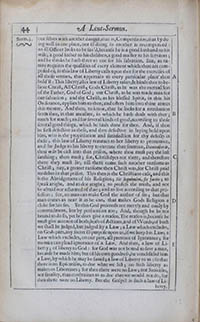 A Lent-Sermon.
44
Serm.3.
A Lent-Sermon.
44
Serm.3.
our selves with another danger, that is, Compensation, that by do-
ing well in one place, our ill doing in another is recompenced:
an ill Officer looks to be sav'd, because he is a good husband to his
wife, a good father to his children, a good master to his servants;
and he thinks he hath three to one for his salvation. But, as na-
ture requires the qualities of every element which thou art com-
posed of; so this law of Liberty calls upon thee for the exercises of
all those vertues, that appertain to every particular place thou
hold'st: This liberty, this law of Liberty takes; It binds thee to be-
lieve Christ, All Christ; Gods Christ, as he was the eternal Son
of the Father, God of God; our Christ, as he was made man for
our salvation; and thy Christ, as his blessed Spirit, in this his
Ordinance, applies him to thee, and offers him into thine armes
this minute. And then, to know, that he looks for a retribution
from thee, in that measure, in which he hath dealt with thee;
much for much; and for several kinds of good, according to those
several good things, which he hath done for thee. And, if thou
be first defective in these, and then defective in laying hold upon
him, who is the propitiation and satisfaction for thy defects in
these, this law of Liberty returnes to her liberty to pronounce,
and hethe Judge to his liberty to execute that sentence, Damnaberis,
thou wilt be cast into that prison, where thou must pay the last
farthing; thou must; for, Christ dyes not there, and therefore
there they must lie, till there come such another ransome as
Christ; nay, a greater ransome then Christ was, for Christ paid
no debts in that prison. This then is the Christians case, and this
is the Abridgement of his Religion; Sic loquimini, sic facite; to
speak aright, and to doe aright; to profess the truth, and not
be afraid nor ashamed of that; and to live according to that pro-
fession: for, no man can make God the author of sin; but that
man comes as near it as he can, that makes Gods Religion a
cloke for his sin. To this God proceeds not meerly and onely by
commadment, but by perswasion too; And, though he be not
bound to do so, yet he does give a reason. The reason is, because he
must give account of both; both of Actions, and of Words; of both
we shall be judged, but judged by a Law; a Law which excludes,
on Gods part, any secret ill purpose upon us, if we keep his Law; a
Law which excludes, on our part, all pretence of Ignorance; for
no man can plead ignorance of a Law. And then, a law of Li-
berty; of liberty to God: for God was not bound to save a man,
because he made him; but of his own goodness, he vouchsafed him
a Law, by which he may be saved; a law of Liberty to us: so that
there is no Epicurism, to doe what we list; no such liberty as
makes us Libertines; for then there were no Law; nor Stoicism,
nor fatality, that constraines us to doe that we would not do, for
then there were no Liberty. But the Gospel is such a law of Li-
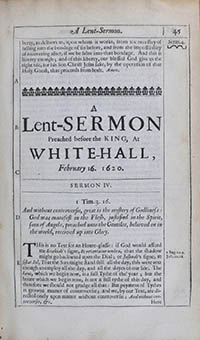 A Lent-Sermon.
45
Serm.4.
berty, as delivers us, upon whom it works, from the necessity of
A Lent-Sermon.
45
Serm.4.
berty, as delivers us, upon whom it works, from the necessity of
falling into the bondage of sin before, and from the impossibility
of recovering after, if we be falne into that bondage. And this is
liberty enough; and of this liberty, our blessed God give us the
right use, for his Son Christ Jesus sake, by the operation of that
Holy Ghost, that proceeds from both. Amen. A
Lent-SERMON
Preached before the KING, At
WHITE-HALL,
February 16. 1620.
SERMON IV. 1 Tim. 3.16.
And without controversie, great is the mystery of Godliness:
God was manifest in the Flesh, justified in the Spirit,
seen of Angels, preached unto the Gentiles, believed on in
the world, received up into Glory. THisThis is no Text for an Houre-glasse: if God would afford
me Ezekiah's signe, Ut revertatur umbra,2 Reg. 20.9. that the shadow
might go backward upon the Dial; Josh. 10.11. or Joshuah's signe, Ut
sistat Sol, That the Sun might stand still all the day, this were text
enough to employ all the day, and all the dayes of our life. The
Lent, which we begin now, is a full Tythe of the year; but the
houre which we begin now, is not a full tythe of this day, and
therefore we should not grudge all that: But payment of Tythes
is growne matter of controversie; and we, by our Text, are di-
rected onely upon matter without controversie: And without con-
troversie, &c.
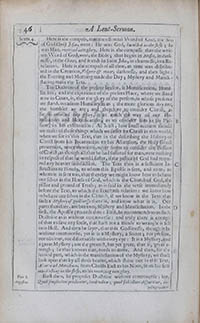 46
A Lent-Sermon.
Serm.4.
Here is the compass, that the essential Word of God, the Son
46
A Lent-Sermon.
Serm.4.
Here is the compass, that the essential Word of God, the Son
of God Christ Jesus, went: He was God, humbled in the flesh; he
was Man, received into glory. Here is the compasse that the writ-
ten Word of God, went, the Bible; that begun in Moses, in dark-
nesse, in the Chaos; and it ends in Saint John, in clearnesse, in a Re-
velation. Here is the compass of all time, as time was distribu-
ted in the Creation, Vespere & mane; darknesse, and then light:
the Evening and Morning made the Day; Mystery and Manife-
station make the Text. The Doctrine of the present Season, is Mortification, Humi-
liation; and the experience of the present Place, where we stand
now in Court, is, that the glory of the persons, in whose presence
we stand, occasions Humility in us; the more glorious they are,
the humbler we are; and therefore to consider Christ, as
he is received into glory, is as much the way of our Hu-
miliation and Mortification, as to consider him in his Pas-
sion, in his exinanition: At least, how small account should
we make of those things which we suffer for Christ in this world,
when we see in this Text, that in the describing the History of
Christ from his Incarnation to his Ascension, the Holy Ghost
pretermits, never mentions, never seems to consider the Passion
of Christ; as though all that he had suffered for man, were nothing
in respect of that he would suffer, if the justice of God had requi-
red any heavier satisfaction. The Text then is a sufficient In-
struction to Timothy, to whom this Epistle is sent, and to us, to
whom it is sent too, that thereby we might know how to behave
our selves in the House of God, which is the Church of God, the
pillar and ground of Truth; as is said in the verse immediately
before the Text, to which the Text hath relation: we know how
to behave our selves in the Church, if we know in the Text that
such a Mystery of godlinesse there is, and know what it is. Our
parts therefore, are but two; Mystery and Manifestation. In the
first, the Apostle proceeds thus: First, he recommends to us such
Doctrine as is without controversie: and truly there is enough
of that to save any soule, that hath not a minde to wrangle it self
into Hell. And then he sayes, that this Godlinesse, though it be
without controversie, yet it is a Mystery, a Secret; not present,
not obvious, not discernable with every eye: It is a Mystery, and
a great Mystery; not the greatest, but yet great, that is, great e-
nough; he that knowes that, needs no more. And then, for the
second part, which is the manifestation of the Mystery, we shall
look upon that by all those beams, which shine out in this Text,
Abortu ad Meridium, from Christs East to his Noon, from his first
manifesting in the flesh, to his receiving into glory. Part I.First then, he proposes Doctrine without controversie: for,
Augustine.Quod simpliciter predicatur, credendum; quod subtiliter disputatur, in-
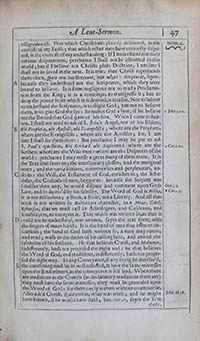 A Lent-Sermon.
47
Serm.4.
telligendum est. That which Christ hath plainly delivered, is the
A Lent-Sermon.
47
Serm.4.
telligendum est. That which Christ hath plainly delivered, is the
exercise of my Faith; that which other men have curiously dispu-
ted, is the exercise of my understanding: If I understand not their
curious disputations, perchance I shall not be esteemed in this
world; but if I believe not Christs plain Doctrine, I am sure I
shall not be saved in the next. It is true, that Christ reprehends
them often, Quia non intellexerunt, but what? Scripturas, legem:
because they understood not the Scriptures, which they were
bound to believe. It is some negligence not to read a Proclama-
tion from the King; it is a contempt, to transgresse it; but to
deny the power from which it is derived, is treason. Not to labour
to understand the Scriptures, is to slight God; but not to believe
them, is to give God the lye: 1 John 5.10.he makes God a lyer, if he believe
not the Record that God gave of his Son. When I come to hea-
ven, I shall not need to ask of S. John's Angel, nor of his Elders,
Ubi Prophetæ, ubi Apostoli, ubi Evangelistæ; where are the Prophets,
where are the Evangelists, where are the Apostles; for, I am
sure I shall see them there: But perchance I may be put to ask
S. Paul's question, 1 Cor. 1.20.Ubi Scribæ? ubi Sapientes? where are the
Scribes? where are the Wise men? where are the Disputers of the
world? perchance I may misse a great many of them there. It is
the Text that saves us; the interlineary glosses, and the marginal
notes, and the variæ lectiones, controversies and perplexities, un-
do us: the Will, the Testament of God, enriches us; the Sche-
dules, the Codicils of men, begger us: Gen. 3.1.because the Serpent was
subtiller then any, 2 Cor. 2.3. he would dispute and comment upon Gods
Law, and so deceiv'd by his subtilty. The Word of God is Biblia,
it is not Bibliotheca; a Book, a Bible, not a Library. And all that
book is not written in Balthazars character; in a Mene, Tekel,
Upharsim, that we must call in Astrologers, and Caldeans, and
Southsayers, to interpret it. That which was written so, as that it
could not be understood, was written, sayes the text there, with
the fingers of mans hand; It is the hand of man that induces ob-
scurities; the hand of God hath written so, a man may runne,
and read; walk in the duties of his calling here, and attend the
salvation of his soul too. He that believes Christ, and Mahomet,
indifferently, hath not proposed the right end: he that believes
the Word of God, and traditions, indifferently, hath not propo-
sed the right way. In any Conveyance, if any thing be interlin'd,
the interlining must be as well testified, & have the same witnesses
upon the Endorsment, as the conveyance it self had. When there
are traditions in the Church (as declaratory traditions there are)
they must have the same witnesses, they must be grounded upon
the Word of God: for there onely is truth without controversie.
Pilate ask'd Christ, John 18.38.Quid veritas, what was truth; and he might
have known, if he would have staid; but, exivit, sayes the Text
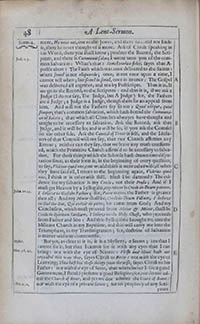 48
A Lent-Sermon.
Serm.4.
48
A Lent-Sermon.
Serm.4.
there, He went out, out to the Jewes; and there he could not finde
it, there he never thought of it more. Ask of Christ speaking in
his Word, there you shall know; produce the Record, the Scri-
pture, and there is Jude 1.3.Communis salus; I wrote unto you of the com-
mon Salvation: What's that? Semel tradita fides, sayes that A-
postle there: The Faith which was once delivered to the Saints:
where semel is not aliquando; once, is not once upon a time, I
cannot tell when; but semel is simul, once is at once: The Gospel
was delivered all together, and not by Postscripts. Thus it is, If
we go to the Record, to the Scripture: and thus it is, if we ask a
Judge (I do not say, The Judge, but A Judge) for, the Fathers
are a Judge; a Judge is a Judge, though there lie an appeal from
him. And will not the Fathers say so too? Quod ubique, quod
semper; that's common salvation, which hath bound the Communi-
on of Saints; that which all Churches alwayes have thought and
taught to be necessary to salvation. Ask the Record, ask that
Judge, and it will be so; and it will be so, if you ask the Counsel
on the other side. Ask the Council of Trent it self, and the Idola-
ters of that Council will not say, that our Church affirmes any
Errour; neither can they say, that we leave any truth unaffirm-
ed, which the Primitive Church affirm'd to be necessary to salva-
tion. For those things which the Schoole hath drawn into dispu-
tation since, as their form is, in the beginning of every question,
to say, Videtur quod non, one would think it were otherwise; if when
they have said all, I return to the beginning again, Videtur quod
non, I think it is otherwise still. Must I be damned? The evi-
dence for my salvation is my Credo, not their Probo; And if I
must get Heaven by a Syllogism, my Major is Credo in Deum patrem,
I believe in God the Father; for, John 10.29.Pater major, the Father is greater
then all: And my Minor shall be, Credo in Deum Filium, I believe
in God the Son, Qui exivit de patre, he came from God; And my
Conclusion, which must proceed from Major & Minor, shall be
Credo in Spiritum Sanctum, I believe in the Holy Ghost, who proceeds
from Father and Son: And this Syllogisme brought me into the
Militant Church in my Baptisme, and this will carry me into the
Triumphant, in my Transmigration; for, doctrine of Salvation
is matter without controversie. Myster.But yet, as clear as it is, it is a Mystery, a Secret; not that I
cannot see it, but that I cannot see it with any eyes that I can
bring: not with the eye of Nature: Mat. 16.16. Flesh and blood hath not
revealed this unto thee, sayes Christ to Peter: not with the eye of
Learning; Thou hast hid these things from the wise, sayes Christ to his
Father: not with the eye of State, that wheresoever I see a good
Government, I should presume a good Religion; for, we do not ad-
mit the Church of Rome, and yet we doe admire the Court of Rome:
nor with the eye of a private sence;2 Pet. 1.20. for no prophecy of any Scri-
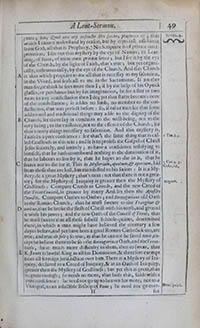 A Lent-Sermon.
49
Serm.4.
pture; for, Quod non nisi instinctu Dei scitur, prophetia est; that
A Lent-Sermon.
49
Serm.4.
pture; for, Quod non nisi instinctu Dei scitur, prophetia est; that
which I cannot understand by reason, but by especiall assistance
from God, all that is Prophecy.) No Scripture is of private inter-
pretation. I see not this mystery by the eye of Nature, of Lear-
ning, of State, of mine own private sence; but I see it by the eye
of the Church, by the light of Faith, that's true; but yet organi-
cally, instrumentally, by the eye of the Church. And this Church
is that which proposes to me all that is necessaynecessary to my salvation,
in the Word, and seals all to me in the Sacraments. If another
man see, or think he sees more then I; if by the help of his Optick
glasses, or perchance but by his imagination, he see a star or two
more in any constellation then I do; yet that starre becomes none
of the constellation; it addes no limb, no member to the con-
stellation, that was perfect before: so, if other men see that some
additional and traditional things may adde to the dignity of the
Church, let them say it conduces to the well-being, not to the
very being; to the existence, not to the essence of the Church; for
that's onely things necessary to salvation. 1 Tim. 3.9.And this mystery is,
Faith in a pure conscience: for that's the same thing that is cal-
led Godliness in this text: and it is to profess the Gospel of Christ
Jesus sincerely, and intirely; to have a conscience testifying to
himself, that he hath contributed nothing to the diminution of it,
that he labours to live by it, that he hopes to die in it, that he
feares not to die for it. This is Mysterium, opertum, & apertum, 2 Cor. 4.3.hid
from those that are lost, Col. 1.26.but manifested to his Saints: It is a My-
stery, & a great Mystery; that's next: not that there is not a grea-
ter;Magnum. for the Mystery of Iniquity is greater then the Mystery of
Godliness: Compare Creeds to Creeds, and the new Creed of
the Trent Council, is greater by many Articles then the Apostles
Creed is. Compare Oathes to Oathes; and Berengarians old Oath
in the Roman Church, that he must sweare to the Frangitur &
teritur, that he broke the flesh of Christ with his teeth, and ground
it with his jawes; and the new Oath of the Council of Trent, that
he must sweare that all those subtill Schoole-points, determined
there, in which a man might have believed the contrary a few
dayes before, and yet have been a good Roman Catholick too, are
true, and true de fide; so true, as that he cannot be saved now, ex-
cept he believe them to be so: the Berengarians Oath, and the Trent-
oath, have much more difficulty in them, then to swear, that
K. James is lawful King in all his Dominions, & therefore exempt
from all forreign jurisdiction over him. There is a Mystery of Ini-
quity, declared in a Creed of Iniquity, & in an Oath of Iniquity,
greater then the Mystery of Godliness: but yet this is great, that
is, great enough; he needs no more, that hath this, faith with a
pure conscience: he need not go up to heaven for more, not to a
Vice-god, to an infallible Bishop of Rome;Deut. 30.12. he need not go over H
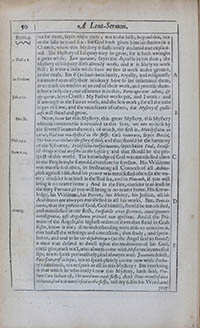 50
A Lent-Sermon.
Serm.4.
50
A Lent-Sermon.
Serm.4.
sea for more, sayes Moses there; not to the hills, beyond-sea, nor
to the lake beyond-sea: for God hath given him his station in a
Church, where this Mystery is sufficiently declared and explica-
ted. The Mystery of Iniquity may be great, for it hath wrought
a great while.2 Thes. 2.7. Jam operatur, sayes the Apostle in his time; the
Mystery of iniquity doth already work, and it is likely to work
still: It is but a little while since we saw it work under ground,
in the vault. But if (as hath been lately, royally, and religiously
intimated to us all) their insolency have so far infatuated them,In Parliam.
as to think themselves at an end of their work, and promise them-
selves a holy-day, our assurance is in this, Joh. 5.17.Pater operatur adhuc, &
ego operor, sayes Christ: My Father works yet, and I work: and
if amongst us the Father work, and the Son work; for all the vain
hopes of some, and the vain feares of others, the Mystery of godli-
ness will stand and grow. Part II.Now, how far this Mystery, this great Mystery, this Mystery
without controversie is revealed in this Text, we are to look by
the severall beames thereof; of which, the first is, Manifestatus in
carne, God was manifested in the flesh. Psal. 19.2.Psal. 19.1.Cœli enarrant, sayes David,
The heavens declare the glory of God; and that should be the harmony
of the Spheares. Rom. 1.20.Invisibilia conspiciuntur, sayes Saint Paul, Invisi-
ble things of God are seen in the visible; and that should be the pro-
spect of this world. The knowledge of God was manifested often
in the Prophets; he foretold, therefore he foresaw. His Wisdome
was manifested often, in frustrating all Councels of all Achito-
phels against him. And his power was manifested often: In the wa-
ter; consider it at least in the Red sea, and in Pharaoh, if you will
bring it no nearer home; And in the Fire, consider it at least in
the fiery Furnace, if you will bring it no nearer home. His Know-
ledge, his Wisdome, his Power, his Mercy, his Justice, all his
Attributes are alwayes manifested in all his works. But, Deus in
carne, that the person of God, God himself, should be manifested,
and manifested in our flesh,Areopag. Ineffabile omni sermoni, omni ignotum
intelligentiæ, ipse Angelorum primati non agnitum. And if the Pri-
mate of the Angels, the highest orders of them that stand in Gods
sight, know it not; if no understanding were able to conceive it,
that had all the refinings and concoction, that study, and specu-
lation, and zeal to be vir desideriorum (as the Angel said to Daniel)
a man that desired to dwell upon the meditation of his God,
could give; must not I, who always come with Moses uncircumcised
lips, not to speak perswasively; and alwayes with Jeremies defect,
Puer sum, nescio loqui, not to speak plainly; come now with Zacha-
ry's dumbness, not to speak at all in this Mystery? But hearkning
to that which he who onely knew this Mystery, hath said, Ver-
bum Caro factum est, The word was made flesh; And Deus manifestatus
in carne, God was manifested in the flesh; rest my self in his Word, and
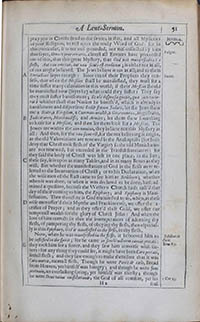 A Lent-Sermon.
51
Serm.4.
A Lent-Sermon.
51
Serm.4.
pray you in Christs stead to doe so too, in this, and all Mysteries
of your Religion, to rest upon the onely Word of God: for in
this particular, it is not mis-grounded, nor mis-collected by him
that sayes, Fulgent. Omnes pene errores, almost all Errours have proceeded
out of this, that this great Mystery, that God was manifested in the
flesh, Aut non omnino, aut non sicuti est creditum; is either not at all,
or not aright believed. The Jews believe it not at all; and to them
Tertullian sayes enough:Tertul. Since out of their Prophets they con-
fess, that when the Messias shall be manifested, they must for a
time suffer many calamities in this world; if their Messias should
be manifested now (sayes he) what could they suffer? They say
they must suffer banishment; Et ubi dispersio gentis, quæ jam extor-
ris? whither shall that Nation be banish'd, which is already in
banishment and dispersion? Redde statum Judæis, let the Jews shew
me a State, a Kingdom, a Common-wealth, a Government, Magistrates,
Judicatures, Merchandise, and Armies; let them shew something
to loose for a Messias, and then let them look for a Messias. The
Jewes are within the non omnino, they believe not this Mystery at
all: And then, for the non sicut est, for the not believing it aright,
as the old Valentinians are renewed in the Anabaptists (for both
deny that Christ took flesh of the Virgin) so the old Manichæans
are not renewed, but exceeded in the Transubstantiators: for
they said the body of Christ was left in one place, in the Sun;
these say, it is upon as many Tables, and in as many Boxes as they
will. But whether the manifestation of God in the flesh were re-
ferred to the Incarnation of Christ; or to his Declaration, when
the wise men of the East came to see him at Bethleem; whether
when it was done, or when it was declared to be done, hath ad-
mitted a question, because the Western Church hath call'd that
day of their coming to him, the Epiphany; and Epiphany is Mani-
festation. Then therefore is God manifested to us, when, as these
wise men offer'd their Myrrhe and Frankincense, we offer the Sa-
crifice of Prayer; and as they offer'd their Gold, we offer our
temporall wealth for the glory of Christ Jesus: And when the
love of him corrects in thee the intemperances of adorning thy
flesh, of pampering thy flesh, of obeying thy flesh, then especial-
ly is this Epiphany, God is manifested in the flesh, in thy flesh. Justificat. in
spiritNow, when he was manifested in the flesh, it behooved him
to be justified in the spirit; for he came in similitudinem carnis peccati:
Rom. 8.3.they took him for a sinner, and they saw him converse with sin-
ners: for any thing they could see, it might have been Caro peccati,
sinfull flesh; and they saw enough to make them sure that it was
Caro mortis, mortall flesh. Though he were Panis de cœlo, Bread
from Heaven, yet himself was hungry; and though he were fons
perennis, an everlasting spring, yet himself was thirsty; though
he were 2 Cor. 13.2 Cor. 1.3.Deus totius consolationis, the God of all comfort, yet his H2
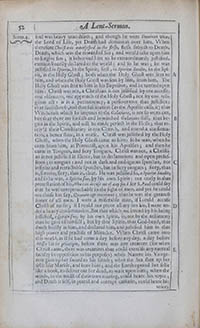 52
A Lent-Sermon.
Serm.4.
52
A Lent-Sermon.
Serm.4.
soul was heavy unto death; and though he were Dominus vitæ,
the Lord of Life, yet Death had dominion over him. When
therefore Christ was manifested in the flesh, flesh subject to Death,
Death, which was the reward of Sin; and would take upon him
to forgive sins; it behooved him to be extraordinarily justified,
extraordinarily declared to the world: and so he was; he was
justified in Spiritu, in the Spirit; first, in Spiritu Sancto, in the Spi-
rit, in the Holy Ghost; both when the Holy Ghost was sent to
him, and when the Holy Ghost was sent by him, from him. The
Holy Ghost was sent to him in his Baptisme, and he tarried upon
him: Christ was not, a Christian is not justified by one accesse,
one visitation, one approach of the Holy Ghost; not by one reli-
gious act: it is a permanency, a perseverance that justifies:
that foolishness, and that fascination (as the Apostle calls it) that
Witchcraft which he imputes to the Galatians, is not so worn out,
but that there are foolish and bewitched Galatians still, that be-
gun in the Spirit, and will be made perfect in the Flesh; that re-
ceiv'd their Christianity in one Church, and attend a confirma-
tion, a better state, in a worse. Christ was justified by the Holy
Ghost, when the Holy Ghost came to him: so he was, when he
came from him, at Pentecost, upon his Apostles; and then he
came in Tongues, and fiery Tongues. Christ was not, a Christi-
an is not justified in silence, but in declarations and open profes-
sions; in tongues: and not in dark and ambiguous speeches, nor
infinite and retractable speeches, but in fiery tongues; fiery, that
is, fervent; fiery, that is, clear. He was justified so, a Spiritu Sancto;
and so he was, a Spiritu suo, by his own Spirit: not onely in that
protestation of his, Who can accuse me of any sin? for S. Paul could say
that he was unreproachable in the sight of men, and yet he could
not chuse but say, Quorum ego maximus; that he was the greatest
sinner of all men. I were a miserable man, if I could accuse
Christ of no sin; if I could not prove all my sins his, I were un-
der a heavy condemnation. But that which we intend by his being
justified, a spiritu suo, by his own spirit, is, not by the testimony
that he gave of himself; but by that Spirit, that God-head, that
dwelt bodily in him, and declared him, and justified him in that
high power and practise of Miracles. When Christ came into
this world, as if he had come a day before any day, a day before
Moses his in principio, before there was any creature (for when
Christ came, there was creatures that could exercise any natural
faculty in opposition to his purposes) when Nature his Vicege-
rent gave up her sword to his hands; when the Sea shut up her selfe
like Marble, and bore him; and the Earth opened her selfe
like a book, to deliver out her dead, to wait upon him; when the
winds, in the midst of their own roaring, could heare his voyce;
and Death it self, in putrid and corrupt carkases, could heare his
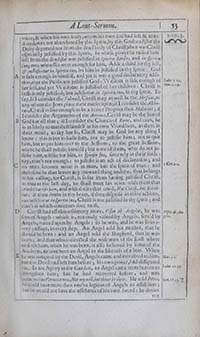 A Lent-Sermon.
53
Serm.3.Serm.4.
A Lent-Sermon.
53
Serm.3.Serm.4.
voice; & when his own body, whom his own soul had left & aban-
doned, was not abandoned by this Spirit, by this Godhead (for the
Deity departed not from the dead body of Christ) then was Christ
especially justified by this Spirit, in whose power he raised him-
self from the dead; he was justified in Spiritu Sanctoin Spiritu Sancto, and in spiritu
suo; two witnesses were enough for him. Adde a third for thy self,
& justificetur in Spiritu tuo, let him be justified in thy spirit: God
is safe enough in himself, and yet it was a good declaratory addi-
tion, that Luke 7.29.the Publicans justified God: Wisdom is safe enough of
her self, Mat. 2.19.Mat. 11.19.and yet Wisdome is justified of her children: Christ is
sufficiently justified; but justificetur in Spiritu tuo, in thy spirit. To
say, If I consider the Talmud, Christ may as well be the Messias, as
any whom the Jews place their marks upon; if I consider the Alcho-
ran, Christ is like enough to be a better Prophet then Mahomet; if
I consider the Arguments of the Arrians, Christ may be the Son of
God for all that; if I consider the Church of Rome, and ours, he
is as likely to manifest himself in his own Word here, as there in
their word; to say but so, Christ may be God for any thing I
know: this is but to baile him, not to justifie him; not to quit
him, but to put him over to the Sessions, to the great Sessions,
where he shall justifie himself; but none of them, who do not ju-
stifie him, testifie for him, in spiritu suo, sincerely in their souls:
nay, that's not enough: to justifie is an act of declaration;1 Cor. 2.2.1 Cor. 2.11. and
no man knowes what is in man, but the spirit of man: and
therefore he that leaves any outward thing undone, that belongs
to his calling, for Christ, is so far from having justified Christ,
as that at the last day, he shall meet his voice with them that
cried Crucifie him, and with theirs that cried, Not Christ, but Barab-
bas: if thou doubt in thy heart, if thou disguise in thine actions,
non justificatur in spiritu tuo, Christ is not justified in thy spirit; and
that's it which concernes thee most. Visus ab An-
gelis.Christ had all this testimony more, Visus ab Angelis, he was
seen of Angels: which is, not onely visited by Angels, serv'd by
Angels; waited upon by Angels: so he was, and he was so in e-
very passage, in every step. An Angel told his mother, that he
should be born: and an Angel told the Shepherd, that he was
born; and that which directed the wise men of the East where
to finde him, when he was born, is also believed by some of the
Ancients, to have been an Angel in the likeness of a Star. Mat. 4.2.Mat. 4.11When
he was tempted by the Devil, Angels came and ministred to him,
but the Devil had left him before; his own power, had dissipated
his. Luke 22.43.In his Agony in the Garden, an Angel came from heaven to
strengthen him; but he had recovered before, and was
come to his Veruntamen, Not my will, but thine be done. He told Peter,Mat. 26.53.
he could have more then twelve legions of Angels to assist him;
but he would not have the assistance of his own sword: he denies
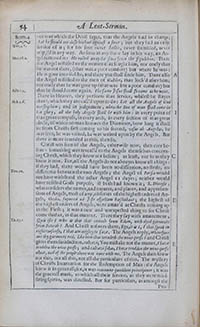 54
A Lent-Sermon.
Serm.4.
54
A Lent-Sermon.
Serm.4.
not that which the Devil sayes, that the Angels had in charge,
Mat. 4.6. that he should not dash his foot against a stone; but they had an easie
service of it; for his foot never dasht, never stumbled, never
tripp'd in any way. As soon as any stone lay in his way, an An-
gel removed it:Mat. 28.2. He rolled away the stone from the sepulchre. There
the Angel testified to the women that sought him, not onely that
he was not there, (that was a poor comfort) but where he was:
He is gone into Galilee, and there you shall finde him. There also
the Angel testified to the men of Galilee; that look'd after him,
not onely that he was gone up (that was but a poor comfort) but
that he should come again.Acts 1.2.Acts 1:11 The same Jesus shall so come as he went.
There in Heaven, they perform that service, whilest he stayes
there, which they are call'd upon to do: Heb. 1.6.Let all the Angels of God
worship him; and in judgement, when the Son of man shall come in
his glory, all the holy Angels shall be with him: in every point of
that great compass, in every arch, in every section of that great
circle, of which no man knowes the Diameter, how long it shall
be from Christs first coming to his second, visus ab Angelis, he
was seen, he was visited, he was waited upon by the Angels. But
there is more intended in this, then so. Christ was seen of the Angels, otherwise now, then ever be-
fore: something was reveal'd to the Angels themselves concern-
ing Christ, which they knew not before; at least, not so as they
knew it now. For, all the Angels do not alwayes know all things:
if they had, there would have been no dissention, no strife, no
difference between the two Angels;Dan. 10. the Angel of Persia would
not have withstood the other Angel 21 dayes; neither would
have resisted Gods purpose, if both had known it; S. Dionyse,
who considers the names, and natures, and places, and apprehen-
sions of Angels, most of any, observes of the highest orders of An-
gels, Ordin. supremi ad Jesu aspectum hæsitabant; the highest of
the highest orders of Angels, were amaz'd at Christs coming up
in the Flesh; it was a new and unexpected thing to see Christ
come thither, in that manner. There they say with amazement,
Isa. 63.1Quis iste? Who is this that cometh from Edom, with dyed garments
from Bozrah? And Christ answers there, Ego, it is I, I that speak in
righteousness, I that am mighty to save. The Angels reply, Wherefore
are thy garments red, like him that treadeth the wine-press? and Christ
gives them satisfaction, calcavi; You mistake not the matter, I have
trodden the wine-press; and calcavi solus, I have trodden the wine-press
alone, and of the people there was none with me. The Angels then knew
not this, not all this, not all the particulars of this, The mystery
of Christs Incarnation for the Redemption of Man: the Angels
knew it in generall; for, it was commune quoddam principium; it was
the generall mark, to which all their service, as they were mini-
string spirits, was directed. But for particulars, as amongst the
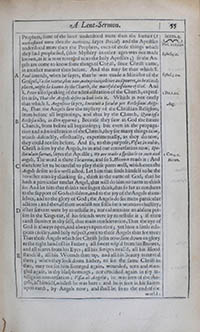 A Lent-Sermon.
55
Serm.4.
A Lent-Sermon.
55
Serm.4.
Prophets, some of the later understood more then the former (Psal. 119.100.I
understand more then the ancients, sayes David) and the Apostles
understood more then the Prophets, even of those things which
they had prophesied,Ephes. 3.6. (this Mystery in other ages was not made
known, as it is now revealed unto the holy Apostles;) so the An-
gels are come to know some things of Christ, since Christ came,
in another manner then before. And this may be that which S.
Paul intends, when he sayes, Ephes. 3.10. that he was made a Minister of the
Gospel, To the intent, that now, unto principalities and powers, in heavenly
places, might be known by the Church, the manifold wisdome of God. And
S. Peter also speaking of the administration of the Church, expres-
ses it so, 1 Pet. 1.12.That the Angels desire to look into it. Which is not onely
that which S. Augustine sayes,Aug. Innotuit a seculis per Ecclesiam Ange-
lis, That the Angels saw the mystery of the Christian Religion,
from before all beginnings, and that by the Church, Quia ipsa
Ecclesia illis, in Deo apparuit; Because they saw in God the future
Church, from before all beginnings; but even in the propaga-
tion and administration of the Church, they see many things now,
which distinctly, effectually, experimentally, as they do now,
they could not see before. And so, to this purpose, Visus in nobis,
Christ is seen by the Angels, in us and our conversation now. 1 Cor. 4.9.Spe-
ctaculum sumus, sayes the Apostle; We are made a spectacle to men and
angels. The word is there Theatrum, and so S. Hierom reads it:Hierom. And
therefore let us be careful to play those parts well, which even the
Angels desire to see well acted. Let him that finds himself to be the
honester man by thinking so, think in the name of God, that he
hath a particular tutelar Angel, that will do him no harm to think
so: And let him that thinks not so, yet think, that so far as conduces
to the support of Gods children, and to the joy of the Angels them-
selves, and to the glory of God; the Angels do see mens particular
actions: and then, if thou wouldst not sollicite a womans chastity,
if her servant were by to testifie it; nor calumniate an absent per-
son in the Kings ear, if his friends were by to testifie it; if thou
canst slumber in thy self, that main consideration, That the eye of
God is always open, and always upon thee; yet have a little reli-
gious civility, and holy respect, even to those Angels that see thee:
That those Angels which see Christ Jesus now, sate down in glory
at the right hand of his Father; all sweat wip'd from his Browes,
and all teares from his Eyes; all his Stripes heal'd, all his Blood
stanch'd, all his Wounds shut up, and all his Beauty returned
there; when they look down hither, to see the same Christ in
thee, may not see him scourged again, wounded, torn and man-
gled again, in thy blasphemings, nor crucified again in thy ir-
religious conversation: Visus ab Angelis, he was seen of the An-
gels, in himself, whilest he was here: and he is seen in his Saints
upon earth, by Angels now; and shall be so to the end of the
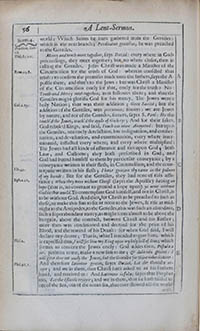 56
A Lent-Sermon.
Serm.4.
56
A Lent-Sermon.
Serm.4.
world: Which Saints he hath gathered from the Gentiles:
which is the next branch; PredicatusPraedicatus gentibus, he was preached
to the Gentiles. Prædicat. Gen-
tib. Mercy and truth meet together, says David: every where in Gods
proceedings, they meet together; but no where closer, then in
calling the Gentiles.Psal. 85.10. Jesus Christ was made a Minister of the
Circumcision for the truth of GodRom. 15.8.: wherein consisted that
truth? to confirm the promises made unto the fathers, says the A-
postle there, and that's to the Jews: but was Christ a Minister
of the Circumcision onely for that, onely for the truth? No:
Truth and Mercy meet together, as it followes there; and that the
Gentiles might glorifie God for his mercy. The Jewes were a
holy Nation; that was their addition; Gens Sancta; but the
addition of the Gentiles, was peccatores, sinners: Gal. 2.15.we are Jewes
by nature, and not of the Gentiles, sinners, sayes S. Paul: He that
touch'd the Jewes, touch'd the apple of Gods eye; And for their sakes,
God rebuk'd Kings, and said, Touch not mine Anoynted: but upon
the Gentiles, not onely dereliction, but indignation, and conster-
nation, and devastation, and extermination, every where inter-
minated, inflicted every where, and every where multiplied:
The Jewes had all kinde of assurance and ties upon God; both
Law, and Custome; they both prescribed in God, and
God had bound himself to them by particular conveyance; by a
conveyance written in their flesh, in Circumcision; and the coun-
terpane written in his flesh; Isa. 49.I have graven thy name in the palmes
of my hands: But for the Gentiles, they had none of this assu-
rance: Eph. 2.12.When they were without Christ (sayes the Apostle) having no
hope (that is, no covenant to ground a hope upon) ye were without
God in this world. To contemplate God himself, and not in Christ, is
to be without God. And then, for Christ to be preached to such as
these, to make this Sun to set at noon to the Jewes, & rise at mid-
night to the Antipodes, to the Gentiles, this was such an abundant,
such a superabundant mercy, as might seem almost to be above the
bargain, above the contract, between Christ and his Father;
more then was conditioned and decreed for the price of his
Blood, and the reward of his Death: for when God said, I will
declare my decree; That is, what I intended to give him, which
is expressed thus,Psal. 2. I will set him my King upon my holy hill of Sion; which
seemes to concern the Jewes onely: God addes then, Postula a
me, petition to me, make a new suit to me; & dabo tibi gentes: I
will give thee not onely the Jewes, but the Gentiles for thine inheritatnceinheritance:
And therefore Psal. 97.1.lætentur gentes, sayes David, Let the Gentiles re-
joyce; and we in them, that Christ hath asked us at his Fathers
hand, and received us: And Lætentur insulæ, sayes that Prophet
too, Let the Islands rejoyce; and we in them, that he hath raised us
out of the Sea, out of the ocean sea, that over-flowed all the world
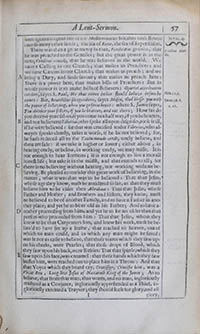 A Lent-Sermon.
57
Serm.4.
A Lent-Sermon.
57
Serm.4.
with ignorance; and out of the Mediterranean Sea, that hath flowed
into so many other lands; the sea of Rome, the sea of Superstition. Creditus Mun-
do.There was then a great mercy in that, PredicatusPraedicatus gentibus, that
he was preached to the Gentiles; but the great power is in the
next, Creditus mundo, that he was believed in the world. We
have a Calling in our Church; that makes us Preachers: and
we have Canons in our Church; that makes us preach: and we
bring a Duty, and finde favour; that makes us preach here:
There is a power here, that makes bills of Preachers: But in
whose power is it to make bills of Believers? Heb. 11.6. Oportet accedentem
credere, sayes S. Paul, He that comes hither should believe before he
comes: But, Deut. 28.6.Benedictus sis egrediens, sayes Moses, God blesse you with
the power of believing, when you go from hence: where S. James sayes,1.22.
You deceive your selves, if you be hearers, and not doers; How far do
you deceive your selves, if you come not half way, if you be hearers,
and not believers? Tiberius, who spoke all upon disguises, took it ill,
if he were believed: he that was crucified under Tiberius, who al-
wayes speaks clearly, takes it worse, if he be not believed; for,
he hath reduced all to the Tantummodo crede, onely believe, and
thou art safe: if we take it higher or lower; either above, in
hearing onely, or below, in working onely, we may misse. It is
not enough to hear Sermons; it is not enough to live a morall
honest life; but take it in the midst, and that extends to all; for
there is no believing without hearing, nor working without be-
lieving. Be pleased to consider this great work of believing, in the
matter, what it was that was to be believed: That that Jesus, whose
age they knew, must be antidated so far, as that they must
believe him to be elder then Abraham: That that Jesus, whose
Father and Mother, and Brothers and Sisters, they knew, must
be believed to be of another Family, and to have a Father in ano-
ther place; and yet he to be as old as his Father; And to have a-
nother proceeding from him, and yet he to be no older then that
person who proceeded from him: That that Jesus, whom they
knew to be that Carpenters Son, and knew his work, must be be-
liev'd to have set up a frame, that reached to heaven, out of
which no man could, and in which any man might be saved:
was it not as easie to believe, that those teares which they saw up-
on his cheeks, were Pearles; that those drops of Blood, which
they saw upon his back, were Rubies: That that spittle, which they
saw upon his face, was ennamel: that those hands which they saw
buffet him, were reached out to place him in a Throne: And that
that Voyce which they heard cry, Crucifige, Crucifie him, was a
Vivat Rex, Long live Jesus of Nazareth King of the Jewes; As to
believe, that from that man, that worm, and no man, ingloriously
traduced as a Conjurer, ingloriously apprehended as a Thief, in-
gloriously executed a Traytor; they should look for glory, and all
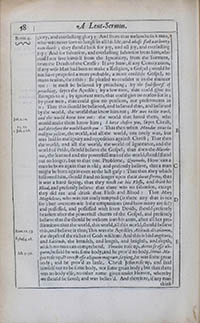 58
A Lent-Sermon.
Serm.4.
58
A Lent-Sermon.
Serm.4.
glory, and everlasting glory? And from that melancholick man,
who was never seen to laugh in all his life, and whose soul was heavy
unto death; they should look for joy, and all joy, and everlasting
joy: And for salvation, and everlasting salvation from him, who
could not save himself from the Ignominy, from the Torment,
from the Death of the Crosse? If any State, if any Convocation,
if any wise Man had been to make a Religion, a Gospel; would he
not have proposed a more probable, a more credible Gospel, to
mans reason, then this? Be pleased to consider it in the manner
too: it must be believed by preaching, by the foolishness of
preaching, sayes the Apostle; by a few men, that could give no
strength to it; by ignorant men, that could give no reason for it;
by poor men, that could give no pensions, nor preferments in
it: That this should be believed, and believed thus, and believed
by the world, the world that knew him not; He was in the word,
Joh. 1.10.and the world knew him not: the world that hated them, who
would make them know him; 15.19. I have chosen you, sayes Christ,
and therefore the world hateth you: That then when 1 Joh. 5.19.Mundus totus in
maligno positus, the world, and all the world, not onely was, but
was laid in malignity and opposition against Christ; That then
the world, and all the world, the world of Ignorance, and the
world of Pride, should believe the Gospel; that then the Nicode-
mus, the learned and the powerfull man of the world, should stand
out no longer, but to that one Probleme, Quomodo, How can a
man be born again that is old; and presently believe, that a man
might be born again even at the last gasp: That then they which
followed him, should stand no longer upon their durus sermo, that
it was a hard saying, that they must eat his Flesh, and drink his
Blood, and presently believe that there was no salvation, except
they did eat and drink that Flesh and Blood: That Mary
Magdelene, who was not onely tempted (is there any that is not
so?) but overcom wit hwith the temptations (and how many are so!)
and possessed, and possessed with seven Devils, should presently
hearken after the powerfull charm of the Gospel, and presently
believe that she should be welcom into his arms, after all her pro-
stitutions: that the world, this world, all this world, should believe
this, and believe it thus; This was the Apostles Rom. 11.33.Altitudo divitiarum,
the depth of the riches of Gods wisdom: And this is his Ephes. 3.18. Longitudo,
and Latitudo, the breadth, and length, and heighth, and depth,
which no man can comprehend. Theudas rose up, Act. 5.36.dicens se esse ali-
quem, he said he was some body; and he prov'd no body. Simon Ma-
gus rose up, Dicens se esse aliquem magnum, saying, he was some great
body; and he prov'd as little. Christ Jesus rose up, and said
himself not to be some body, nor some great body; but that there
was no body else, no other name given under Heaven, whereby
we should be saved; and was believ'd. And therefore, if any man
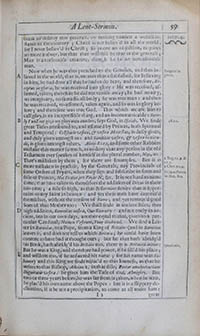 A Lent-Sermon.
59
Serm.4.
A Lent-Sermon.
59
Serm.4.
think to destroy this generall, by making himself a wofull in-
stance to the contrary; Christ is not believ'd in all the world,
for I never believ'd in Christ; so poore an objection, requires
no more answer, but that that will still be true in the generall;
Man is a reasonable creature, though he be an unreasonable
man. Receptus in
gloria.Now when he was thus preached to the Gentiles, and thus be-
lieved in the world, that is, meanes thus established, for believing
in him, he had done all that he had to do here, and therefore, Re-
ceptus in gloria, he was received into glory: He was received, as-
sumed, taken; therefore he did not vanish away; he had no airy,
no imaginary, no fantasticall body; he was true man: and then
he was received, re-assumed, taken again, and so was in glory be-
fore; and therefore was true God. This which we are fain to
call glory, is an inexpressible thing, and an incommunicable: 48.11.Sure-
ly I will not give my glory unto another, says God, in Isaiah. We finde
great Titles attributed to, and assumed by Princes, both Spiritual
and Temporal: Celsitudo vestra, & vestra Majestas, is daily given,
and duly given amongst us: and Sanctitas vestra, & vestra beatitu-
do, is given amongst others. Aben-Ezra, and some other Rabbins
mistake this matter so much, as to deny that any person in the old
Testament ever speakes of himself in the plural number, Nos, We:1 Reg. 12.9. &
22.3.
2 Chro. 10.9.
That's mistaken by them; for there are Examples. But it is
more mistaken in practise, by the Generals, nay Provincials of
some Orders of Fryars,In libros Porret.
in Mat. &c. when they sign and subscribe in form and
stile of Princes, Nos Frater, We Fryar N. &c. It is not hard to name
some, that have taken to themselves the addition of Divus in their
life-time; a stile so high, as that Bellarmine denies that it apper-
tains to any Saint in heaven: and yet these men have canoniz'd
themselves, without the consent of Rome; and yet remain'd good
Sons of that Mother too: We shall finde in ancient stiles, that
high addition, Eternitas nostra, Our Eternity: and not onely in an-
cient, but in our own days, another equal to that, given to a par-
ticular Cardinal, Numen Vestrum, Your Godhead. We find a Let-
ter in Baronius, to a Pope, from a King of Britain (and so Baronius
leaves it, and does not tell us which Britain; he could have been
content to have had it thought ours; but he that hath abridg'd
his Book, hath abridg'd his Britain too, there it is Britania minor:Spondamus.
But he was a King, and therefore had power, if he fill'd his place;
and wisdom too, if he answered his name; for his name was So-
lomon) and this King we finde reduc'd to this lowness, as that he
writes to that Bishop, Adrian 2. in that stile, Precor omnipotentiam
Dignitatis vestræ: he gives him the Title of God, Almighty. But
two or three years before, he was far from it; then, when he writ,
he plac'd his own name above the Popes: but it is a slippery de-
clination, if it be not a precipitation, to come at all under him: I2
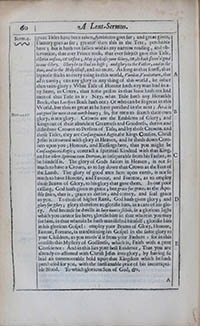 60
A Lent-Sermon.
Serm.4.
60
A Lent-Sermon.
Serm.4.
great Titles have been taken, Ambition goes far; and great given,
Flattery goes as far; greater then this in the Text, perchance
have; but it hath not fallen within my narrow reading, and ob-
servation, that ever Prince took, that ever subject gave this Title,
Gloria nostra, or vestra; May it please your Glory, or, It hath seem'd good
to our Glory. Glory be to God on high; and glory to the Father, and to the
Son, and to the Holy Ghost, and no more. As long as that scurff, that
leprosie sticks to every thing in this world, Vanitas, Vanitatum, that
all is vanity; can any glory in any thing of this world, be other
then vain-glory? What Title of Honour hath any man had in a-
ny State, in Court, that some prison in that State hath not had
men of that Title in it? Nay, what Title hath any Heraulds
Book, that Lucifers Book hath not? Or who can be so great in this
World, but that as great as he have perished in the next? As Prov. 25.27.it is
not good for men to eat much honey; so, for men to search their own
glory, is not glory. Crowns are the Emblems of Glory; and
Kings out of their abundant Greatness and Goodness, derive and
distribute Crowns to Persons of Title; and by those Crowns, and
those Titles, they are Consanguinei Regis, the Kings Cousins. Christ
Jesus is crowned with glory in Heaven, and he sheds down Coro-
nets upon you; Honour, and Blessings here, that you might be
Consanguinei Regis; contract a spiritual Kindred with that King,
and be idem Spiritus cum Domino, as inseparable from his Father, as
he himself is. The glory of Gods Saints in Heaven, is not so
much to have a Crown, as to lay down that Crown at the Feet of
the Lamb. The glory of good men here upon earth, is not so
much to have Honour, and Favour, and Fortune, as to employ
those Beams of Glory, to his glory that gave them. In our poor
calling, God hath given us grace; but grace for grace, as the Apo-
stle saies, that is, grace to derive, and convey, and seal grace
to you. To those of higher Rank, God hath given glory; and
glory for glory; glory therefore to glorifie him, in a care of his glo-
ry. And because he dwells in luce inaccessibili, in a glorious light
which you cannot see here; glorifie him in that wherein you may
see him, in that wherein he hath manifested himself; glorifie him
in his glorious Gospel: employ your Beams of Glory, Honour,
Favour, Fortune, in transmitting his Gospel in the same glory to
your Children, as you receiv'd it from your Fathers: for in this
consists this Mystery of Godliness, which is, Faith with a pure
Conscience: And in this lies your best Evidence, That you are
already co-assumed with Christ Jesus into glory, by having so
laid an unremoveable hold upon that Kingdom which he hath
purchased for you, with the inestimable price of his incorrupti-
ble Blood. To which glorious Son of God, &c.
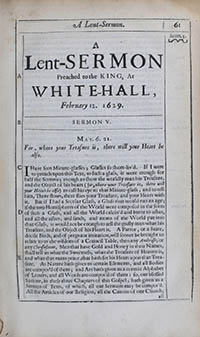 A Lent-Sermon. 61
Serm.5.
A
A Lent-Sermon. 61
Serm.5.
A Lent-SERMON
Preached to the KING, At
WHITE-HALL,
February 12. 1629.
SERMON V. Mat. 6.21.
For, where your Treasure is, there will your Heart be
also. I Havehave seen Minute-glasses; Glasses so short-liv'd. If I were
to preach upon this Text, to such a glass, it were enough for
half the Sermon; enough to show the worldly man his Treasure,
and the Object of his heart (for, where your Treasure is, there will
your Heart be also) to call his eye to that Minute-glass, and to tell
him, There flows, there flies your Treasure, and your Heart with
it. But if I had a Secular Glass, a Glass that would run an age;
if the two Hemispheres of the World were composed in the form
of such a Glass, and all the World calcin'd and burnt to ashes,
and all the ashes, and sands, and atoms of the World put into
that Glass, it would not be enough to tell the godly man what his
Treasure, and the Object of his Heart is. A Parrot, or a Stare,
docile Birds, and of pregnant imitation, will sooner be brought to
relate to us the wisdom of a Council Table, then any Ambrose, or
any Chrysostome, Men that have Gold and Honey in their Names,
shall tell us what the Sweetness, what the Treasure of Heaven is,
and what that mans peace, that hath set his Heart upon that Trea-
sure. As Nature hath given us certain Elements, and all Bodies
are compos'd of them; and Art hath given us a certain Alphabet
of Letters, and all Words are compos'd of them: so, our blessed
Saviour, in these three Chapters of this Gospel, hath given us a
Sermon of Texts, of which, all our Sermons may be compos'd.
All the Articles of our Religion, all the Canons of our Church,
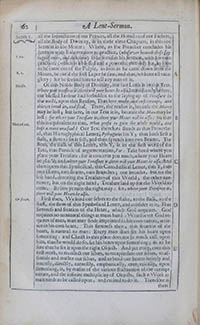 62 A Lent-Sermon.
Serm.5.
62 A Lent-Sermon.
Serm.5.
all the Injunctions of our Princes, all the Homilies of our Fathers,
all the Body of Divinity, is in these three Chapters, in this one
Sermon in the Mount: Where, as the Preacher concludes his
Sermon with Exhortations to practice,7.24. (whosoever heareth these say-
ings of mine, and doth them) so he fortifies his Sermon, with his own
practice, (which is a blessed and a powerful method) for, as soon
as he came out of the Pulpit,8.1. as soon as he came down from the
Mount, he cur'd the first Leper he saw, and that, without all vain-
glory: for he forbad him to tell any man of it. Divisio.Of this Noble Body of Divinity, one fair Limb is in this Text,
Where your treasure is, there will your heart be also. Immediately before,
our blessed Saviour had forbidden us the laying up of Treasure in
this world, upon this Reason, That here moths and rust corrupt, and
thieves break in, and steal. There, the reason is, because the Money
may be lost; but here, in our Text it is, because the Man may be
lost: for where your Treasure is, there your Heart will be also: So that
this is equivalent to that,Mat. 16.26. What profit to gain the whole world, and
loose a mans own soul? Our Text therefore stands as that Proverbi-
al, that Hieroglyphical Letter, Pythagoras his Y; that hath first a
stalk, a stem to fix it self, and then spreads into two Beams. The
stem, the stalk of this Letter, this Y, is in the first word of the
Text, that Particle of argumentation, For: Take heed where you
place your Treasure: for it concerns you much, where your Heart
be plac'd; and, where your Treasure is, there will your Heart be also. And
then opens this Symbolical, this Catechistical Letter, this Y, into
two Horns, two Beams, two Branches; one broader, but on the
left hand, denoting the Treasures of this World; the other nar-
rower, but on the right hand, Treasure laid up for the World to
come. Be sure ye turn the right way: for, where your Treasure is,
there will your Heart be also. Cor fixum.First then, We bind our selves to the stake, to the stalk, to the
staff, the stem of this Symbolical Letter, and consider in it, That
firmness and fixation of the Heart, which God requires. God
requires no unnatural things at mans hand: Whatsoever God re-
quires of man, man may finde imprinted in his own nature, writ-
ten in his own heart. This firmness then, this fixation of the
heart, is natural to man: Every man does set his heart upon
something: and Christ in this place does not so much call upon
him, that he would do so, set his heart upon something; as to be
sure that he set it upon the right Object. And yet truly, even this
first work, to recollect our selves, to recapitulate our selves, to as-
semble and muster our selves, and to bend our hearts intirely and
intensly, directly, earnestly, emphatically, energetically, upon
something, is, by reason of the various fluctuation of our corrupt
nature, and the infinite multiplicity of Objects, such a Work as
man needs to be called upon, and excited to do it. Therefore is
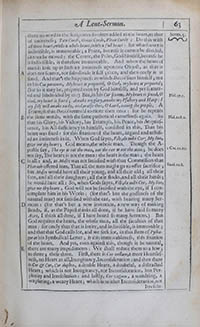 A Lent-Sermon. 63
Serm.5.
A Lent-Sermon. 63
Serm.5.
there no word in the Scriptures so often added to the heart, as that
of intireness; Toto Corde, Omni Corde, Pleno Corde: Do this with
all thine heart, with a whole heart, with a full heart: for whatsoever is
indivisible, is immoveable; a Point, because it cannot be divided,
cannot be moved: the Centre, the Poles, God himself, because he
is indivisible, is therefore immoveable. And when the heart of
man is knit up in such an intireness upon one Object, as that it
does not scatter, nor sub-divide it self; then, and then onely is it
fixed. And that's the happiness in which David fixes himself; not
in his Cor paratum, My heart is prepared, O God, my heart is prepared;
(for so it may be, prepared even by God himself, and yet scatter-
ed and subdivided by us:) But, in his Psal. 57.7. Cor fixum, My heart is fixed, O
God, my heart is fixed; Awake my glory, awake my Psaltery and Harp: I
my self will awake early, and praise thee, O Lord, among the people. A
Triumph that David return'd to more then once: for he repeats
the same words, with the same pathetical earnestness again.Psal. 108.1. So
that his Glory, his Victory, his Triumph, his Peace, his Acquies-
cence, his All-sufficiency in himself, consisted in this, That his
heart was fixed: for this fixation of the heart, argued and testifi-
ed an intireness in it. When God sayes, Fili, da mihi Cor; My Son,
give me thy heart; God means, the whole man. Though the A-
postle say, 1 Cor. 12.17.The eye is not the man, nor the ear is not the man; he does
not say, The heart is not the man: the heart is the man; the heart
is all: and,Exod. 10.8. as Moses was not satisfied with that Commission that
Pharaoh offered him, That all the men might go to offer sacrifice;
but Moses would have all their young, and all their old; all their
sons, and all their daughters; all their flocks, and all their herds;
he would have all: So, when Gods sayes, Fili, da mihi Cor, My Son,
give me thy heart, God will not be satisfied with the eye, if I con-
template him in his Works: (for that's but the godliness of the
natural man) nor satisfied with the ear, with hearing many Ser-
mons: (for that's but a new invention, a new way of making
Beads, if, as the Papist thinks all done, if he have said so many
Aves, I think all done, if I have heard so many Sermons.) But
God requires the heart, the whole man, all the faculties of that
man: for onely that that is intire, and indivisible, is immovable;
and that that God calls for, and we seek for, in this stem of Pytha-
goras his Symbolical Letter, is this immovableness, this fixation
of the heart. And yet, even against this, though it be natural,
there are many impediments: We shall reduce them to a few;
to three; these three. First, there is Cor nullum, a meer Heartles-
ness, no Heart at all, Incogitancy, Inconsideration: and then there
is Cor & Cor, Cor duplex, a double Heart, a doubtful, a distracted
Heart; which is not Incogitancy, nor Inconsideration, but Per-
plexity and Irresolution: and lastly, Cor vagum, a wandring, a
way faring, a weary Heart; which is neither Inconsideration, nor
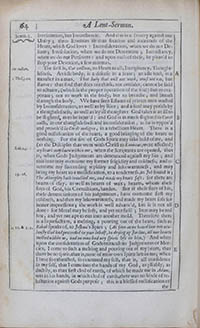 64 A Lent-Sermon.
Serm.5.
64 A Lent-Sermon.
Serm.5.
Irresolution, but Inconstancie. And this is a Trinity against our
Unity; three Enemies to that fixation and intireness of the
Heart, which God loves: Inconsideration, when we do not De-
bate; Irresolution, when we do not Determine; Inconstancy,
when we do not Persevere: and upon each of these, be pleas'd to
stop your Devotion, a few minutes. Cor nullum.The first is, Cor nullum, no Heart at all, Incogitancy, Thought-
lesness. An idle body, is a disease in a State; an idle soul, is a
monster in a man.2 Thes. 3.10. That body that will not work, must not eat, but
starve: that soul that does not think, not consider, cannot be said
to actuate, (which is the proper operation of the soul) but to eva-
porate; not to work in the body, but to breathe, and smoak
through the body. We have seen Estates of private men wasted
by Inconsideration, as well as by Riot; and a soul may perish by
a thoughtlesness, as well as by ill thoughts: God takes it as ill to
be slighted, as to be injur'd: and God is as much slighted in Corde
nullo, in our thoughtlesness and inconsideration, as he is oppos'd
and provok'd in Corde maligno, in a rebellious Heart. There is a
good nullification of the heart, a good bringing of the heart to
nothing. For the fire of Gods Spirit may take hold of me, and
(as the Disciples that went with Christ to Emmaus,Luk. 24. were affected)
my heart may burn within me, when the Scriptures are opened, that
is, when Gods Judgements are denounced against my Sin; and
this heat may overcome my former frigidity and coldness, and o-
vercome my succeeding tepidity and lukewarmness, and may
bring my heart to a mollification, to a tenderness, as Job found it; 23.16.
The Almighty hath troubled me, and made my heart soft: for there are
hearts of clay, as well as hearts of wax; hearts, whom these
fires of God, his Corrections, harden. But if these fires of his,
these denunciations of his judgements, have overcome first my
coldness, and then my lukewarmness, and made my heart soft for
better impressions; the work is well advanc'd, but it is not all
done: for Metal may be soft, and yet not fusil; Iron may be red
hot, and yet not apt to run into another mold. Therefore there
is a liquefaction, a melting, a pouring out of the heart, such as
Rahab speaks of, to Joshua's Spies; (2.11. & 5.1.As soon as we heard how miracu-
lously God had proceeded in your behalf, in drying up Jordan, all our hearts
melted within us, and no man had any spirit left in him.) And when
upon the consideration of Gods miraculous Judgements or Mer-
cies, I come to such a melting and pouring out of my heart, that
there be no spirit, that is, none of mine own spirit left in me; when
I have so exhausted, so evacuated my self, that is, all confidence
in my self, that I come into the hands of my God, as pliably, as
ductily, as that first clod of earth, of which he made me in Adam,
was in his hands, in which clod of earth, there was no kinde of re-
luctation against Gods purpose; this is a blessed nullification of
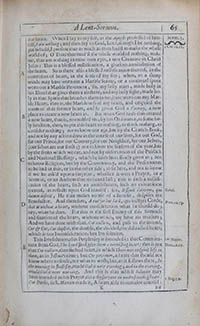 A Lent-Sermon. 65
Serm.5.
A Lent-Sermon. 65
Serm.5.
the heart. When I say to my self, as the Apostle professed of him-
self, 2 Cor. 12.11.I am nothing; and then say to God, Lord, though I be nothing,
yet behold, I present thee as much as thou hadst to make the whole
world of; O Thou that mad'st the whole world of nothing, make
me, that am nothing in mine own eyes, a new Creature in Christ
Jesus: This is a blessed nullification, a glorious annihilation of
the heart. So is there also a blessed nullification thereof, in the
contrition of heart, in the sense of my sins; when, as a sharp
winde may have worn out a Marble Statue, or a continual spout
worn out a Marble Pavement, so, my holy tears, made holy in
his Blood that gives them a tincture, and my holy sighs, made ho-
ly in that Spirit that breathes them in, mein me, have worn out my Mar-
ble Heart, that is, the Marbleness of my heart, and emptied the
room of that former heart, and so given God a Vacuity, a new
place to create a new heart in. But when God hath thus created
a new heart, that is, re-enabled me, by his Ordinance, to some ho-
ly function, then, to put this heart to nothing, to think nothing, to
consider nothing; not to know our age, but by the Church-Book,
and not by any action done in the course of our lives, for our God,
for our Prince, for our Country, for our Neighbor, for our Selves,
(our selves are our souls;) not to know the seasons of the year, but
by the fruits which we eat, and not by observation of the Publick
and National Blessings, which he hath successively given us; not
to know Religion, but by the Conveniency, and the Preferments
to be had in this, or in the other side; to sit here, and not to know
if we be ask'd upon a surprize, whether it were a Prayer, or a
Sermon, or an Anthem that we heard last; this is such a nullifi-
cation of the heart, such an annihilation, such an exinanition
thereof, as reflects upon God himself: for, Tertul.Respuit datorem, qui
datum deserit, He that makes no use of a Benefit, despises the
Benefactor. And therefore, Prov. 10.13.A rod for his back, qui indiget Corde,
that is without a heart, without consideration what he should do;
nay, what he does. For this is the first Enemy of this firmness
and fixation of the heart, without which, we have no treasure;
And we have done with that, Cor nullum, and pass to the second,
Cor & Cor, Cor duplex, the double, the divided, the distracted heart,
which is not Inconsideration, but Irresolution. Cor Duplex.This Irresolution, this Perplexity is intended in that Commina-
tion from God, Deut. 28.65.The Lord shall give them a trembling heart: this is not
that Cor nullum, that melted heart, in which There was no spirit left in
them, as in Joshua's time; but Cor pavidum, a heart that should not
know where to settle, nor what to wish; but, as it follows there, In
the morning behe shall say, Would God it were evening; and in the evening,
Would God it were morning. And this is that which Solomon may
have intended in his Prayer, 1 Reg. 3.9.Give thy servant an understanding heart:
Cor Docile, so S. Hierom reads it, A heart able to conceive counsel: K
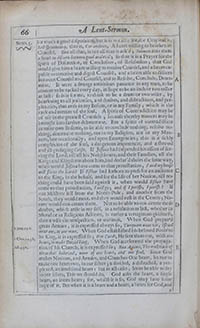 66 A Lent-Sermon.
Serm.5.
66 A Lent-Sermon.
Serm.5.
for that's a good disposition, but it is not all: for, the Original is,
Leb shemmeany, that is, Cor audiens, A heart willing to hearken to
Counsel. But all that, is not all that is ask'd; Solomon asks there
a heart to discern between good and evil; so that it is a Prayer for the
spirit of Discretion, of Conclusion, of Resolution; that God
would give him a heart willing to receive Counsel, and a heart ca-
pable to conceive and digest Counsel, and a heart able to discern
between Counsel and Counsel, and to Resolve, Conclude, Deter-
mine. It were a strange ambitious patience in any man, to be
content to be racked every day, in hope to be an inch or two taller
at last: so is it for me, to think to be a dram or two wiser, by
hearkning to all jealousies, and doubts, and distractions, and per-
plexities, that arise in my Bosom, or in my Family; which is the
rack and torture of the soul. A spirit of Contradiction may be
of use in the greatest Counsels; because thereby matters may be
brought into farther debatement. But a spirit of contradiction
in mine own Bosome, to be able to conclude nothing, resolve no-
thing, determine nothing, not in my Religion, not in my Man-
ners, but occasionally, and upon Emergencies; this is a sickly
complexion of the soul, a dangerous impotencie, and a shrewd
and ill-presaging Crisis. If Joshua had suspended his assent of ser-
ving the Lord, till all his Neighbours, and their Families, all the
Kings and Kingdoms about him, had declar'd theirs the same way,
when would Joshua have come to that protestation, I and my house
will serve the Lord? If Esther had forborn to press for an audience
to the King, in the behalf, and for the life of her Nation, till no-
thing could have been said against it, when would Esther have
come to that protestation, I will go; and if I perish, I perish? If
one Milstone fell from the North-Pole, and another from the
South, they would meet, and they would rest in the Centre; Na-
ture would con-centre them. Not to be able to con-centre those
doubts, which arise in my self, in a resolution at last, whether in
Moral or in Religious Actions, is rather a vertiginous giddiness,
then a wise circumspection, or wariness. When God prepar'd
great Armies, it is expressed always so, 1 Sam. 11.7.Tanquam unus vir, Israel
went out, as one man. When God established his beloved David to
be King, it is expressed so; 1 Chro. 12.38.Uno Corde, He sent them out, with one
heart, to make David king. When God accelerated the propaga-
tion of his Church, it is expressed so; Act. 4.32.Una Anima, The multitude of
them that believed, were of one heart, and one soul. Since God
makes Nations, and Armies, and Churches One heart, let not us
make one heart two, in our selves; a divided, a distracted, a per-
plexed, an irresolved heart: but in all cases, let us be able to say
to our selves, This we should do. God asks the heart, a single
heart, an intire heart; for, whilst it is so, God may have some
hope of it. But when it is a heart and a heart, a heart for God, and
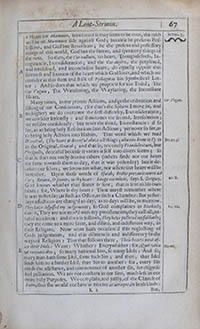 A Lent-Sermon. 67
Serm.5.
A Lent-Sermon. 67
Serm.5.
a Heart for Mammon, howsoever it may seem to be even, the odds
will be on Mammons side against God; because he presents Pos-
sessions, and God but Reversions; he the present and possessory
things of this world, God but the future, and speratory things of
the next. So then, the Cor nullum, no heart, Thoughtlesness, In-
cogitancie, Inconsideration; and the Cor duplex, the perplexed,
and irresolved, and inconclusive heart, do equally oppose this
firmness and fixation of the heart which God loves, and which we
consider in this stem and stalk of Pythagoras his Symbolical Let-
ter: And so does that which we propos'd for the Third, The
Cor Vagum, The Wandering, the Wayfaring, the Inconstant
Heart. Cor Vagum.Many times, in our private Actions, and in the cribration and
sifting of our Consciences, (for that's the Sphere I move in, and
no higher) we do overcome the first difficulty, Inconsideration;
we consider seriously: and sometimes the second, Irresolution;
we resolve confidently: but never the third, Inconstancie: if so
far, as to bring holy Resolutions into Actions; yet never so far, as
to bring holy Actions into Habits. That word which we read
Deceitful, (Jer. 17.9:.The heart is deceitful above all things; who can know it?) is
in the Original, Gnacob; and that is, not onely Fraudulentum, but
Versipelle, deceitful because it varies it self into divers forms; so
that it does not onely deceive others (others finde not our heart
the same towards them to day, that it was yesterday) but it de-
ceives our selves; we know not what, nor where our heart will be
hereafter. Upon those words of Isaiah, 46.8. Redite prevaricatores ad
Cor; Return, O sinner, to thy heart: Longe eos mittit, says S. Gregory,
God knows whither that sinner is sent, that is sent to his own
heart: for, Where is thy heart? Thou mayst remember where
it was yesterday; at such an Office, at such a Chamber: But yester-
days affections are chang'd to day, as to days will be, to morrow.
20.16.They have despised my judgements; so God complaines in Ezekiel;
that is, They are not mov'd with my punishments; they call all, na-
tural accidents: and then it follows, They have polluted my sabbaths;
they are come to a more faint, and dilute, and indifferent way, in
their Religion. Now what hath occasion'd this neglecting of
Gods judgements, and this diluteness and indifferency in the
ways of Religion? That that follows there, Their hearts went af-
ter their Idols: Went? Whither? Everywhither: for,Hierom. Quot vitia
tot recentes deos; so many habitual Sins, so many Idols: And so,
every man hath some Idol, some such Sin; and then, that Idol
sends him to a further Idol, that Sin to another: for, every Sin
needs the assistance, and countenance of another sin, for disguise
and palliation. We are not constant in our Sins, much less in our
more holy Purposes. We complain, and justly, of the Church of
Rome, that she would not have us receive in utraque, in both kinds: K2
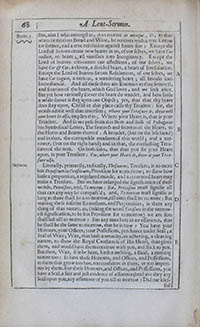 68 A Lent-Sermon.
Serm.5.
68 A Lent-Sermon.
Serm.5.
But, alas! who amongst us, does receive in utraque, so, as that
when he receives Bread and Wine, he receives with a true sorrow
for former, and a true resolution against future sins? Except the
Lord of heaven create new hearts in us, of our selves, we have Cor
nullum, no heart; all vanishes into Incogitancy. Except the
Lord of heaven con-centre our affections, of our selves, we
have Cor & Cor, a cloven, a divided heart, a heart of Irresolution.
Except the Lord of heaven fix our Resolutions, of our selves, we
have Cor vagum, a various, a wandering heart; all smoaks into
Inconstancie. And all these three are Enemies to that firmness,
and fixation of the heart, which God loves, and we seek after.
But yet how variously soever the heart do wander, and how little
a while soever it stay upon one Object; yet, that that thy heart
does stay upon, Christ in this place calls thy Treasure: for, the
words admit well that inversion; Where your Treasure is, there will
your heart be also, implies this; Where your Heart is, that is your
Treasure. And so we pass from this stem and stalk of Pythagoras
his Symbolical Letter, The firmness and fixation of the Heart, to
the Horns and Beams thereof: A broader, (but on the left hand)
and in that, the corruptible treasures of this world; and a nar-
rower, (but on the right hand) and in that, the everlasting Trea-
sures of the next. On both sides, that that you fix your Heart
upon, is your Treasure: For, where your Heart is, there is your Trea-
sure also. Thesaurus.Literally, primarily, radically, Thesaurus, Treasure, is no more
but Depositum in Crastinum, Provision for to morrow; to shew how
little a proportion, a regulated minde, and a contented heart may
make a Treasure. But we have enlarged the signification of these
words, Provision, and, To morrow: for, Provision must signifie all
that can any way be compass'd; and, To morrow must signifie as
long as there shall be a to morrow, till time shall be no more: But
waving these infinite Extensions, and Perpetuities, is there any
thing of that nature, as, (taking the word Treasure in the narrow-
est signification, to be but Provision, for to morrow) we are sure
shall last till to morrow? Sits any man here in an assurance, that
he shall be the same to morrow, that he is now? You have your
Honours, your Offices, your Possessions, perchance under Seal; a
Seal of Wax; Wax, that hath a tenacity, an adhering, a cleaving
nature, to shew the Royal Constancie of His Heart, that gives
them, and would have them continue with you, and stick to you.
But then, Wax, if it be heat, hath a melting, a fluid, a running
nature too: so have these Honours, and Offices, and Possessions,
to them that grow too hot, too confident in them, or too imperi-
ous by them. For these Honours, and Offices, and Possessions, you
have a Seal, a fair and just evidence of assurance; but have they any
Seal upon you, any assurance of you till to morrow? Did our bles-
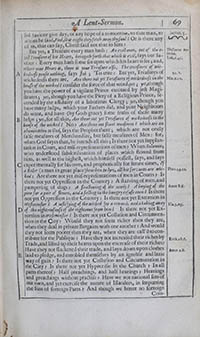 A Lent-Sermon. 69
A Lent-Sermon. 69
Serm.5.sed Saviour give day, or any hope of a to morrow, to that man, to
whom he said, Fool, this night they fetch away thy soul? Or is there any
of us, that can say, Christ said not that to him? Thesaurus ma-
lorum.But yet, a Treasure every man hath: An evil man, out of the e-
vil Treasure of his Heart, bringeth forth that which is evil, says our Sa-
viour Luk. 6.45.: Every man hath some sin upon which his heart is set; and,
Where your Heart is, there is your Treasure also. 10.2.The treasures of wic-
kedness profit nothing, says Job; 'Tis true: But yet, Treasures of
wickedness there are. Mic. 6.10.Are there not yet Treasures of wickedness in the
house of the wicked? consider the force of that word, yet; yet, though
you have the power of a vigilant Prince executed by just Magi-
strates; yet, though you have the Piety of a Religious Prince, se-
conded by the assiduity of a laborious Clergy; yet, though you
have many helps, which your Fathers did, and your Neighbours
do want, and have (by Gods grace) some fruits of those many
helps; yet, for all this, Are there not yet Treasures of wickedness in the
house of the wicked? No? Are there not scant measures? which are an
abomination to God, says the Prophet there; which are not onely
false measures of Merchandize, but false measures of Men: for,
when God sayes that, he intends all this; Is there not yet supplan-
tation in Court, and mis-representations of men? When Solomon,
who understood subdordination of places which flowed from
him, as well as the highest, which himself possest, says, and says
experimentally for his own, and prophetically for future times, Prov. 29.22. IfIf
a Ruler (a man in great place) hearken to lyes, all his servants are wic-
ked: Are there not yet mis-representations of men in Courts? Is
there not yet Oppression in the Country? A starving of men, and
pampering of dogs? Amos 8.5.A swallowing of the needy? A buying of the
poor for a pair of shooes, and a selling to the hungry refuse corn? Is there
not yet Oppression in the Country? Is there not yet Extortion in
Westminster? Isa. 5.23.A justifying of the wicked for a reward, and a taking away
of the righteousness of the righteous from him? Is there not yet Ex-
tortion in Westminster? Is there not yet Collusion and Circumven-
tion in the City? Would they not seem richer then they are,
when they deal in private Bargains with one another? And would
they not seem poorer then they are, when they are call'd to con-
tribute for the Publique?Ezek. 28.5. Have they not increased their riches by
Trade, and lifted up their hearts upon the encrease of their riches?
Have they not slackened their trade,Amos 2.8. and layn down upon clothes
laid to pledge, and ennobled themselves by an ignoble and lazie
way of gain? Is there not yet Collusion and Circumvention in
the City? Is there not yet Hypocrisie in the Church? In all
parts thereof? Half preachings, and half hearings? Hearings
and preachings without practise? Have we not national sins of
our own, and yet exercise the nature of Islanders, in importing
the Sins of forreign Parts? And though we better no forreign
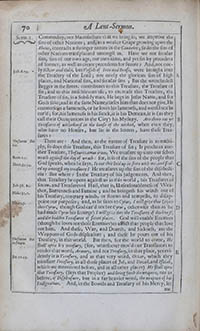 70 A Lent-Sermon.
70 A Lent-Sermon.
Serm.5.Commodity, nor Manufacture that we bring in, we improve the
sins of other Nations; and, as a weaker Grape growing upon the
Rhene, contracts a stronger nature in the Canaries; so do the sins of
other Nations transplanted amongst us. Have we not secular
sins, sins of our own age, our own time, and yet sin by precedent
of former, as well as create precedents for future? And, not one-
ly Josh. 6.19.Silver and Gold, but Vessels of Iron and Brass, were brought into
the Treasury of the Lord; not onely the glorious sins of high
places, and National sins, and secular sins; But the wretchedest
Begger in the street, contributes to this Treasure, the Treasure of
sin; and to this mischievous use, to encrease this Treasure, the
Treasure of sin, is a Subsidy man. He begs in Jesus Name, and for
Gods sake; and in the same Name, curses him that does not give. He
counterfeits a lameness, or he loves his lameness, and would not be
cur'd; for, his lameness is his Stock, it is his Demean, it is (as they
call their Occupations in the City) his Mystery. Are there not yet
Treasures of wickedness in the house of the wicked, when even they,
who have no Houses, but lie in the Streets, have these Trea-
sures? Thesaurus Dei
hic.There are: And then, as the nature of Treasure is to multi-
ply, so does this Treasure, this Treasure of sin; It produces ano-
ther Treasure, Thesaurizamus iram, Rom. 2.5.We treasure up unto our selves
wrath against the day of wrath: for, it is of the sins of the people that
God speaks, when he says, Deut. 32.34.Is not this laid up in store with me, and seal-
ed up amongst my treasures? He treasures up the sins of the disobedi-
ent: But where? In the Treasury of his judgements. And then,
that Treasury he opens against us in this world, Job 38.22.his Treasures of
Snow, and Treasures of Hail, that is, Unseasonableness of Wea-
ther, Barrenness and Famine; Psal. 135.7.and he bringeth his winds out of
his Treasury, contrary winds, or storms and tempests, to disap-
point our purposes; and, as he saies to Cyrus, Isa. 45.3. I will give thee (even
thee Cyrus, though God car'd not for Cyrus, otherwise then as he
had made Cyrus his scourge) I will give thee the Treasures of darkness,
and the hidden Treasures of secret places. God will enable Enemies
(though he loves not those Enemies) to afflict that people that love
not him. And these, War, and Dearth, and Sickness, are the
Weapons of Gods displeasure; and these he pours out of his Thesaurus Dei
in futuro.
Treasury, in this world. But then, for the world to come, He
shall open his treasuryJer. 50.25., (for, whatsoever mov'd our Translators to
render that word, Armory, and not Treasury, in that place, yet evi-
dently it is Treasury, and in that very word, Otzar, which they
translate Treasury, in all those places of Job, and David, and Isaiah,
which we mentioned before, and in all other places) He shall open
that Treasury, (says that Prophet) and bring forth the weapons, not as
before, of Displeasure, but in a far heavier word, the weapons of his
Indignation. And, in the Bowels and Treasury of his Mercy, let
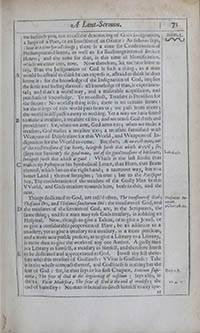 A Lent-Sermon. 71
A Lent-Sermon. 71
Serm.5.me beseech you, not to call the denouncing of Gods Indignation,
a Satyr of a Poet, or an Invective of an Orator: As Solomon says,
There is a time for all things; there is a time for Consternation of
Presumptuous Hearts, as well as for Redintegration of Broken
Hearts; and the time for that, is this time of Mortification,
which we enter into, now. Now therefore, let me have leave to
say, That the Indignation of God is such a thing, as a man
would be affraid to think he can express it, affraid to think he does
know it: for the knowledge of the Indignation of God, implies
the sense and feeling thereof: all knowledge of that, is experimen-
tal; and that's a woful way, and a miserable acquisition, and
purchase of knowledge. To re-collect, Treasure is Provision for
the future: No worldly thing is so; there is no certain future:
for the things of this world pass from us; we pass from them;
the world it self passes away to nothing. Yet a way we have found
to make a treasure, a treasure of sin; and we teach God thrift and
providence: for, when we arm, God arms too; when we make a
treasure, God makes a treasure too; a treasure furnished with
Weapons of Displeasure for this World, and Weapons of In-
dignation for the World to come. But then, Luk. 6.45.As an evil man, out
of the evil treasure of his heart, bringeth forth that which is evil; so,
(says our Saviour) the good man, out of the good treasure of his heart,
bringeth forth that which is good: Which is the last stroke that
makes up Pythagoras his Symbolical Letter, that Horn, that Beam
thereof, which lies on the right hand; a narrower way, but to a
better Land; thorow Straights; 'tis true; but to the Pacifique
Sea, The consideration of the treasure of the Godly Man in this
VVorldWorld, and Gods treasure towards him, both in this, and the
next. Thesaurus Bo-
norum.Things dedicated to God, are call'd often, The treasures of God;
Thesauri Dei, and Thesauri sanctorum Dei: the treasures of God, and
1 Chro. 28.12.the treasures of the servants of God, are, in the Scriptures, the
same thing; and so a man may rob Gods treasury, in robbing an
Hospital. Now, though to give a Talent, or to give a Jewel, or
to give a considerable proportion of Plate, be an addition to a
treasury; yet to give a treasury to a treasury, is a more precious,
and a more acceptable present; as to give a Library to a Library,
is more then to give the works of any one Author. A godly man
is a Library in himself, a treasury in himself, and therefore fittest
to be dedicated and appropriated to God. Invest thy self there-
fore with this treasure of Godliness: VVhatWhat is Godliness? Take
it in the whole compass thereof, and Godliness is nothing but the
fear of God: for, he that says in his first Chapter,Prov. 1.7. Initium sapi-
entiæ, The fear of God is the beginning of wisdom; says also, in
the 22. 22.4.Finis Modestiæ, The fear of God is the end of modesty; the
end of humility: No man is bound to direct himself to any low-
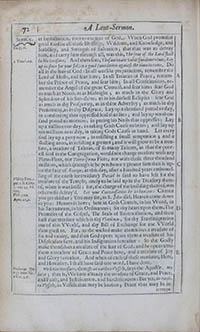 72 A Lent-Sermon.
72 A Lent-Sermon.
Serm.5.er humiliation, then to the fear of God. When God promised
good Ezekias all those Blessings, Wisdome, and Knowledge, and
Stability, and Strength of Salvation; that that was to defray
him, and carry him through all, was this, Isa. 33.6.The fear of the Lord shall
be his treasure. And therefore, 1 Tim. 6.19.Thesaurizate vobis fundamentum, Lay
up in store for your selves a good foundation against the time to come. Do
all in the fear of God: In all warlike preparations, remember the
Lord of Hosts, and fear him; In all Treaties of Peace, remem-
ber the Prince of Peace, and fear him; In all Consultations, re-
member the Angel of the great Council, and fear him: fear God
as much at Noon, as at Midnight; as much in the Glory and
Splendour of his Sun-shine, as in his darkest Eclipses: fear God
as much in thy Prosperity, as in thine Adversity; as much in thy
Preferment, as in thy Disgrace. Lay up a thousand pound to day,
in comforting that oppressed soul that sues; and lay up ten thou-
sand pound to morrow, in paring his Nails that oppresses: Lay
up a million one day, in taking Gods Cause to heart; and lay up
ten millions next day, in taking Gods Cause in hand. Let every
soul lay up a peny now, in resisting a small temptation; and a
shilling anon, in resisting a greater; and it will grow to be a trea-
sure, a treasure of Talents, of so many Talents, as that the poor-
est soul in the Congregation, would not change treasure with any
Plate-Fleet, nor Terra-firma Fleet, nor with those three thousand
millions, which (though it be perchance a greater sum then is up-
on the face of Europe, Villalp. Tom. 2.
par. 2. li. 5. Dip.
3. cap. 43. fol.
503.at this day, after a hundred years embowel-
ling of the earth for treasure) David is said to have left for the
treasure of the Temple, onely to be laid up in the Treasury there-
of, when it was built: for, the charge of the building thereof, was
otherwise defray'd. Phil. 3.20.Let your Conversation be in heaven: Cannot
you get thither? You may see, as S. John did, Apoc. 21.2.Heaven come down
to you: Heaven is here; here in Gods Church, in his Word, in
his Sacraments, in his Ordinances; set thy heart upon them, The
Promises of the Gospel, The Seals of Reconciliation, and thou
hast that treasure which is thy Viaticum, for thy Transmigration
out of this VVorldWorld, and thy Bill of Exchange for the VVorldWorld
thou goest to. For, as the wicked make themselves a treasure of
sin and vanity, and then God opens upon them a treasure of his
Displeasure here, and his Indignation hereafter: So the Godly
make themselves a treasure of the fear of God, and he opens unto
them a treasure of Grace and Peace here, and a treasure of Joy
and Glory hereafter. And when of each of these treasures, Here,
and Hereafter, I shall have said one word, I have done. Thesaurus Dei
erga Bonos hîc.hic. We have treasure, though in earthen Vessels, says the Apostle. We
have; that is, We have already the treasure of Grace, and Peace,
and Faith, and Justification, and Sanctification:2 Cor. 4.7. But yet, in earth-
en Vessels, in Vessels that may be broken; Peace that may be in-
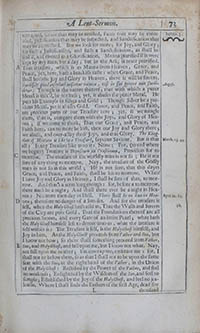 A Lent-Sermon. 73
A Lent-Sermon. 73
Serm.5.terrupted, Grace that may be resisted, Faith that may be enfee-
bled, Justification that may be suspected, and Sanctification that
may be blemished. But we look for more; for Joy, and Glory;
for such a Justification, and such a Sanctification, as shall be
seal'd, and riveted in a Glorification. Manna putrified if it were
kept by any man, but a day; but in the Ark, it never putrified.
That treasure, which is as Manna from Heaven, Grace, and
Peace, yet, here, hath a brackish taste: when Grace, and Peace,
shall become Joy and Glory in Heaven, there it will be sincere.
August.Sordescit quod inferiori miscetur naturæ, etsi in suo genere non sordi-
detur: Though in the nature thereof, that with which a purer
Metal is mix'd, be not base; yet, it abases the purer Metal. He
puts his Example in Silver and Gold; Though Silver be a pre-
cious Metal, yet it abases Gold. Grace, and Peace, and Faith,
are precious parts of our Treasure here; yet, if we mingle
them, that is, compare them with the Joys, and Glory of Hea-
ven; if we come to think, That our Grace, and Peace, and
Faith here, can no more be lost, then our Joy and Glory there;
we abase, and over-allay those Joys, and that Glory. Matth. 13.44.The King-
dom of Heaven is like to a Treasure, says our Saviour. But is that
all? Is any Treasure like unto it? None: For, (to end where
we begun) Treasure is Depositum in Crastinum, Provision for to
morrow. The treasure of the worldly man is not so; He is not
sure of any thing to morrow. Nay, the treasure of the Godly
man is not so in this world; He is not sure, that this dayes
Grace, and Peace, and Faith, shall be his to morrow. When
I have Joy and Glory in Heaven, I shall be sure of that, to mor-
row. And that's a term long enough: for, before a to morrow,
there must be a night; And shall there ever be a night in Hea-
ven? No more then day in Hell.Apoc. 21.23. There shall be no Sun in Hea-
ven; therefore no danger of a Sun-set. And for the treasure it
self, when the Holy Ghost hath told us, 18.That the Walls and Streets
of the City are pure Gold, That the Foundations thereof are all
precious Stones, and every Gate of an intire Pearl; what hath
the Holy Ghost himself left to denote unto us, what the treasure it
self within is? The Treasure it self, is the Holy Ghost himself, and
Joy in him. As the Holy Ghost proceeds from Father and Son, but
I know not how; so there shall something proceed from Father,
Son, and Holy Ghost, and fall upon me, but I know not what. Nay,
not fall upon me neither; but enwrap me, embrace me: for, I
shall not be below them, so as that I shall not to be upon the same
seat with the Son, at the right hand of the Father, in the Union
of the Holy Ghost: Rectified by the Power of the Father, and feel
no weakness; Enlightned by the Wisdom of the Son, and feel no
scruple; Established by the Joy of the Holy Ghost, and feel no jea-
lousie. Where I shall finde the Fathers of the first Age, dead five L
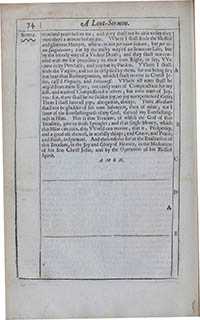 74 A Lent-Sermon.
74 A Lent-Sermon.
Serm.6.Serm.5.
thousand years before me; and they shall not be able to say they
were there a minute before me. Where I shall finde the blessed
and glorious Martyrs, who went not per viam lacteam, but per vi-
am sanguineam; not by the milky way of an Innocent Life, but
by the bloody way of a Violent Death; and they shall not con-
tend with me for precedency in their own Right, or say, VVeWe
came in by Purchase, and you but by Pardon. VVhereWhere I shall
finde the Virgins, and not be despised by them, for not being so;
but hear that Redintegration, which I shall receive in Christ Je-
sus, call'd Virginity, and Intireness. VVhereWhere all tears shall be
wip'd from mine Eyes; not onely tears of Compunction for my
self, and tears of Compassion for others; but even tears of Joy,
too: for, there shall be no sudden joy, no joy unexperienced there;
There I shall have all joys, altogether, always. There Abraham
shall not be gladder of his own Salvation, then of mine; nor I
surer of the Everlastingness of my God, then of my Everlasting-
ness in Him. This is that Treasure, of which the God of this
Treasure, give us those Spangles; and that single Money, which
this Mint can coin, this VVorldVVorld can receive, that is, Prosperity,
and a good use thereof, in worldly things; and Grace, and Peace,
and Faith, in spiritual. And then reserve for us the Exaltation of
this Treasure, in the Joy and Glory of Heaven, in the Mediation
of his Son Christ Jesus, and by the Operation of his Blessed
Spirit. AMEN.
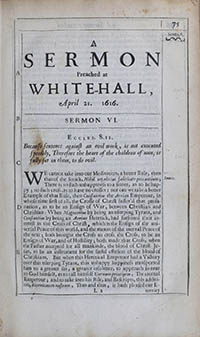 75
Serm.6.
A
75
Serm.6.
A SERMON
Preached at
WHITE-HALL,
April 21. 1616.
SERMON VI. Eccles. 8.11.
Because sentence against an evil work, is not executed
speedily, Therefore the heart of the children of men, is
fully set in them, to do evil. WEWe cannot take into our Meditation, a better Rule, then
that of the Stoick, Seneca.Nihil infælicius fælicitate peccantium;
There is no such unhappiness to a sinner, as to be hap-
py; no such cross, as to have no crosses: nor can we take a better
Example of that Rule, then Constantius the Arrian Emperour, in
whose time first of all, the Crosse of Christ suffer'd that profa-
nation, as to be an Ensign of War, between Christian and
Christian: When Magnentius by being an usurping Tyrant, and
Constantius by being an Arrian Heretick, had forfeited their in-
terest in the Cross of Christ, which is the Ensign of the uni-
versal Peace of this world, and the means of the eternal Peace of
the next; both brought the Cross to cross the Cross, to be an
Ensign of War, and of Hostility; both made that Cross, when
the Father accepted for all mankinde, the blood of Christ Je-
sus, to be an instrument for the sinful effusion of the blood of
Christians. But when this Heretical Emperour had a Victory
over this usurping Tyrant, this unhappy happiness transported
him to a greater sin, a greater insolence, to approach so near
to God himself, as to call himself Eternum principem, The eternal
Emperour; and to take into his stile, and Rescripts, this additi-
on, Eternitatem nostram, Thus and thus, it hath pleased our E-
L2
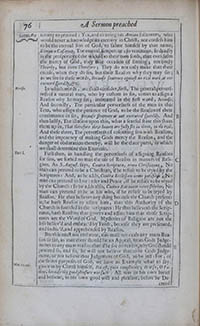 A Sermon preached
76
Serm.6.
ternity to proceed: Yea, and to bring his Arrian followers, who
A Sermon preached
76
Serm.6.
ternity to proceed: Yea, and to bring his Arrian followers, who
would never acknowledge an eternity in Christ, nor confess him
to be the eternal Son of God, to salute himself by that name,
Eternum Cæsarem, The eternal Emperour: so venimous, so deadly
is the prosperity of the wicked to their own souls, that even from
the mercy of God, they take occasion of sinning; not onely
Thereby, but even Therefore; They do not only make that their
excuse, when they do sin, but their Reason why they may sin;
as we see in these words, Because sentence against an evil work, is not
excuted speedily, &c. Divisio.In which words, we shall consider, first, The general pervers-
ness of a natural man, who by custom in sin, comes to assign a
Reason why he may sin; intimated in the first word, Because.
And secondly, The particular perversness of the men in this
Text, who assign the patience of God, to be the Reason of their
continuance in sin, Because sentence is not executed speedily. And
then lastly, The illusion upon this, what a fearful state this shuts
them up in, That therefore their hearts are fully set in them, to do evil.
And these three, The perversness of colouring sins with Reasons,
and the impotency of making Gods mercy the Reason, and the
danger of obduration thereby, will be the three parts, in which
we shall determine this Exercise. Part I.First then, in handling the perversness of assigning Reasons
for sins, we forbid no man the use of Reason in matters of Reli-
gion. As S. August. says, Contra Scriptura, nemo Christianus, No
man can pretend to be a Christian, if he refuse to be tryed by the
Scriptures: And, as he adds, Contra Ecclesiam nemo pacificus, No
man can pretend to love order and Peace, if he refuse to be tryed
by the Church: so he adds also, Contra Rationem nemo sobrius, No
man can pretend to be in his wits, if he refuse to be tryed by
Reason. He that believes any thing because the Church presents
it, he hath Reason to assure him, that this Authority of the
Church is founded in the Scriptures: He that believeth the Scrip-
tures, hath Reasons that govern and assure him that those Scrip-
tures are the Word of God. Mysteries of Religion are not the
less believ'd and embrac'd by Faith, because they are presented,
and induc'd, and apprehended by Reason. But this must not enthrone, this must not exalt any mans Rea-
son so far, as that there should lie an Appeal, from Gods Judge-
ments to any mans reason: that if he see no reason, why God should
proceed so, and so, he will not believe that to be Gods Judge-
ment, or not believe that Judgement of God, to be just: For, of
the secret purposes of God, we have an Example what to say,
given us by Christ himself, Mat. 11.26.Ita est, quia complacuit; It is so, O Fa-
ther, because thy good pleasure was such: All was in his own breast
and bosome, in his own good will and pleasure, before he De-
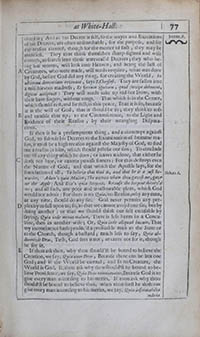 at White-Hall.
77
Serm.6.
creed it; And as his Decree it self, so the wayes and Executions
at White-Hall.
77
Serm.6.
creed it; And as his Decree it self, so the wayes and Executions
of his Decrees, are often unsearchable, for the purpose, and for
the reason thereof, though for the matter of fact, they may be
manifest. They that think themselves sharp-sighted and wise
enough, to search into those unreveal'd Decrees; they who be-
ing but worms, will look into Heaven; and being the last of
Creatures, who were made, will needs enquire, what was done
by God, before God did any thing, for creating the World, In
ultimam dementiam reverant, says S. Chrysost. They are fallen into
a mischievous madness, Et ferrum ignitum, quod forcipe deberent,
digitus accipiunt: They will needs take up red hot Irons, with
their bare fingers, without tongs. That which is in the Center,
which should rest, and lie still, in this peace, That it is so, because
it is the will of God, that it should be so; they think to toss
and tumble that up, to the Circumference, to the Light and
Evidence of their Reason, by their wrangling Disputa-
tions. If then it be a presumpteous thing, and a contempt against
God, to submit his Decrees to the Examination of humane rea-
son, it must be a high treason against the Majesty of God, to find
out a reason in him, which should justifie our sins; To conclude
out of any thing which he does, or leaves undone, that either he
doth not hate, or cannot punish sinners: For this destroys even
the Nature of God, and that which the Apostle lays, for the
foundation of all, Heb. 11.6. To believe that God is, and that he is a just Re-
warder. Adam's quia Mulier, The woman whom thou gavest me, gave
me the Apple: And Eve's quia Serpens, Because the Serpent deceiv'd
me; and all such, are poor and unallowable pleas, which God
would not admit: For there is no Quia, no Reason, why any man,
at any time, should do any sin. God never permits any per-
plexity to fall upon us, so, as that we cannot avoyd one sin, but by
doing another: or that we should think our self excusable by
saying, Quia inde minus malum, There is less harm in a Concu-
bine, then in another wife; Or, Quia inde aliquod bonum, That
my incontinence hath produc'd a profitable man to the State or
to the Church, though a bastard; much less to say, Quia ob-
dormivit Deus, Tush, God sees it not, or cares not for it, though
he see it. If thou ask then, why thou should'st be bound to believe the
Creation, we say, Quia unus Deus, Because there can be but one
God; and if the World be eternal, and so no Creature, the
World is God. If thou ask why thou should'st be bound to be-
lieve Providence, we say, Quia Deus remunerator, Because God is to
give every man according to his merits. If thou ask why thou
should'st be bound to believe that, when thou seest he doth not
give every man according to his merits, we say, Quia inscrutabilia
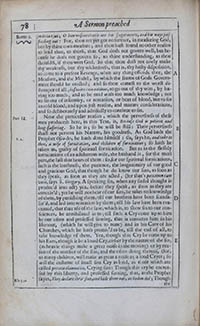 A Sermon preached
78
Serm.6.
A Sermon preached
78
Serm.6.
judicia ejus; O how unsearchable are his JugdementsJudgements, and his ways past
finding out! For, thou art yet got no farther, in measuring God,
but by thine own measure; and thou hast found no other reason
to lead thee, to think, that God doth not govern well, but be-
cause he doth not govern so, to thine understanding, as thou
shouldst, if thou wert God. So that thou dost not onely make
thy weakness, but thy wickedness, that is, thy hasty disposition,
to come to a present Revenge, when any thing offends thee, the
Measure, and the Model, by which the frame of Gods Govern-
ment should be erected; and so thou comest to the worst di-
stemper of all, insanire cum ratione, to go out of thy wits, by ha-
ving too much, and to be mad with too much knowledge; not
to sin out of infirmity, or tentation, or heat of blood, but to sin
in cold blood, and upon just reason, and mature considerations,
and so deliberately and advisedly to continue to sin. Part II.Now the particular reason, which the perversness of these
men produceth here, in this Text, is, Because God is patient and
long-suffering. So he is; so he will be still: Their perversness
shall not pervert his Nature, his goodness. As God bade the
Prophet Osea do, he hath done himself: 1.2. Go, says he, and take to
thee, a wife of fornication, and children of fornication; so hath he
taken us, guilty of spiritual fornication. But as in the fleshly
fornications of an adulterous wife, the husband is, for the most
part, the last that hears of them: so, for our spiritual fornications,
such is the loathness, the patience, the longanimity of our good
and gracious God, that though he do know our sins, as soon as
they speak, as soon as they are acted, (for that's peccatum cum
voco, says S. Gregory, A speaking sin, when any sinful thought is
produc'd into act) yea, before they speak, as soon as they are
conceiv'd; yet he will not hear of our sins, he takes no knowledge
of them, by punishing them, till our brethren have been scanda-
liz'd, and led into tentation by them; till his law have been eva-
cuated, that that use of the law, which is, to shew sin to our con-
sciences, be annihilated in us; till such a Cry come up to him
by our often and professed sinning, that it concerns him in his
Honour, (which he will give to none) and in his Care of his
Churches, which he hath promis'd to be, till the end of all, to
take knowledge of them. Yea, though this Cry be come up to
his Ears, though it be a lowd Cry, either by the nature of the sin,
(as heavie things make a great noise in the moving) or by rea-
son of the number of the sins, and the often doing thereof, (for,
as many children, will make as great a noise as a loud Cryer; so
will the custome of small sins Cry as loud, as those which are
called peccata clamantia, Crying sins) Though this cry be encrea-
sed by this liberty, and professed sinning, that, as the Prophet
sayes,Esa. 3.9. They declare their sins, and hide them not, as Sodom did; Though
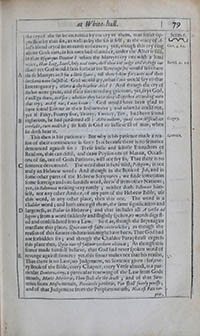 at White-HallWhite-hall.
79
at White-HallWhite-hall.
79
Serm.6.
the cry of the sin be increased by the cry of them, that suffer op-
pression by that sin, as well as by the sin it self, as Gen. 4.10.the voice of A-
bel's bloud cryed from earth to heaven; yea, though this cry ring
about Gods ears, in his own bed-chamber, under the Altar it self,
in that Usquequo Domine? when the Martyrs cry out with a loud
voice, Revel. 6.10.How long, Lord, holy and true, dost thou not judge and avenge our
bloud! yet God would fain forbear his Revenge, he would fain have
those Martyrs rest for a little space, till their fellow servants and their
brethren were fulfilled. God would try, what Cain would say to that
Interrogatory, Where is thy brother Abel? And though the cry of
Sodom were great, and their sin exceeding grievous, yet, says God,
I will go down, and see, whether they have done altogether according unto
that cry; and if not, I may know: God would have been glad to
have found Errour in their Inditement; and when he could not,
yet if Fifty, Fourty five, Thirty, Twenty, Ten, had been found
righteous, he had pardoned all: Gregory. Adeo malum, quasi cum difficultate
credidit, cum audivit; so loth is God to believe ill of man, when
he doth hear it. Sententia.This then is his patience: But why is his patience made a rea-
son of their continuance in sins? Is it because there is no sentence
denounced against sin? These busie and subtile Extractors of
Reasons, that can distil, and draw Poyson out of Manna, Occasi-
ons of sin, out of Gods Patience, will not say so, That there is no
sentence denounced. The word that is here used, Pithgam, is not
truly an Hebrew word: And though in the Book of Job, and in
some other parts of the Hebrew Scriptures, we finde sometimes
some forreign and out-landish word, deriv'd from other Nations;
yet, in Solomons writing very rarely; neither doth Solomon him-
self, nor any other Author, of any part of the Hebrew Bible, use
this word, in any other place, then this one. The word is a
Chaldee word; and hath amongst them, the same signification and
largeness, as Dabar in Hebrew; and that includes all A verbo ad
legem; from a word suddenly and slightly spoken, to words digest-
ed and consolidated into a Law. So that, though the Septuagint
translate this place, Quia non est facta contradictio; as though the
reason of this sinners obduration might have been, That God had
not forbidden sin; and though the Chaldee Paraphrast express
this place thus, Quia non est factum verbum ultionis; As though this
sinner made himself believe, that God had never spoken word of
revenge against sinners: yet, this sinner makes not that his reason,
That there is no Law, no Judgement, no Sentence given: for, eve-
ry Book of the Bible, every Chapter, every Verse almost, is a par-
ticular Deuteronomy, a particular renewing of the Law from Gods
mouth, Morte Morieris, Thou shalt die the death; and of that Sen-
tence from Moses mouth, Pereundo peribitis, You shall surely perish;
and of that Judgement from the Prophets mouth, Non est Pax im-
piis
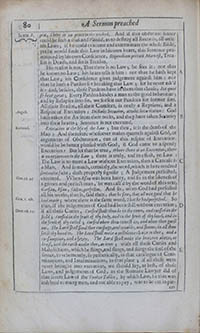 A Sermon preached
80
Serm.6.
piis, There is no peace to the wicked. And if this obdurate sinner
A Sermon preached
80
Serm.6.
piis, There is no peace to the wicked. And if this obdurate sinner
could be such a Goth and Vandal, as to destroy all Records, all writ-
ten Laws; if he could evacuate and exterminate the whole Bible,
yet he would finde this Law in his own heart, this Sentence pro-
nounced by his own Conscience, Stipendium peccati Mors est, Trea-
son is Death, and sin is Treason. His reason is not, That there is no Law; he sees it: nor that
he knows no Law; his heart tells it him: nor that he hath kept
that Law; his Conscience gives judgement against him: nor
that he hath a Pardon for breaking that Law; for he never ask'd
it: and, besides, those Pardons have in them that clause, Ita quod
se bene gerat; Every Pardon bindes a man to the good behaviour;
and by Relapses into sin, we forfeit our Pardons for former sins.
All their Reason, all their Comfort, is onely a Reprieve, and a
Respite of Execution:August. Distulit Securim, attulit Securitatem: God
hath taken the Ax from their necks, and they have taken Security
into their hearts; Sentence is not executed. Executed.Execution is the life of the Law; but then, it is the death of the
Man: And therefore whosoever makes quarrels against God, or
arguments of Obduration, out of this respite of Execution,
would he be better pleased with God, if God came to a speedy
Execution? But let that be true, Where there is no Execution, there
is no reverence to the Law; there is truly, and in effect, no Law:
The Law is no more a Law without Execution, then a Carcase is
a Man. And so much, certainly, the word, which is here rendred
sententia facta, doth properly signifie; A Judgement perfected,
executed. When Gen. 25.25.Esau was born hairy, and so in the likeness of
a grown and perfect man, he was call'd by the word of this text,
Gnesau, Esau, factus, perfectus. And so, when God had perfected
all his works, that is, said then, Gen. 1. ult.that he saw, that all was good that he
had made; where there is the same word, That he had perfected. So
that, if the judgements of God had been still without execution;
if all those Curses,Deut. 28.15. Cursed shalt thou be in the town, and cursed in the
field; cursed in the fruit of thy body, and in the fruit of thy land, and in
the fruit of thy cattel; cursed when thou comest in, and when thou goest
out. The Lord shall send thee cursings, and trouble, and shame, in all thou
setst thy hand to. The Lord shall make a pestilence cleave to thee, and a
consumption, and a fever. The Lord shall make the heavens above, as
brass, and the earth under thee, as iron; with all those Curses and
Maledictions, which he flings, and slings, and stings the soul of the
sinner, so vehemently, so pathetically, in that catalogue of Com-
minations, and Interminations, in that place; if all these were
never brought into execution, we should say, at best, of those
Laws, and judgements of God, as the Romane Lawyer did of
that severe Law of the Twelve Tables, by which Law, he that was
indebted to many men, and not able to pay, was to be cut in pie-
ces
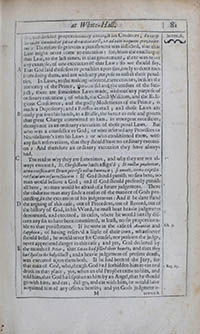 at White-Hall.
81
Serm.6.
ces, and divided proportionably amongst his Creditors, Eo consi-
at White-Hall.
81
Serm.6.
ces, and divided proportionably amongst his Creditors, Eo consi-lio tanta immanitas pœnæ denuatiata est, ne ad eam unquam pervenire-
tur: Therefore so grievous a punishment was inflicted, that that
Law might never come to execution: for, from the enacting of
that Law, to the last times, in that government, there was never
any example, of one execution of that Law: so we should say,
That God laid those severe penalties upon sins, onely to deter men
from doing them, and not with any purpose to inflict those penal-
ties. In Laws, to the making whereof, there concurs, besides the
authority of the Prince, the counsel and the consent of the Sub-
ject, there are sometimes Laws made, without any purpose of
ordinary execution; of which, the Civil Wisdom, and the Reli-
gious Conscience, and the godly Moderation of the Prince, is
made a Depository, and a Feoffee in trust; and those Laws are
onely put into his hands, as a Bridle, the better to rule and govern
that great Charge committed to him, in emergent necessities,
though not in an ordinary execution of those penal Laws. But
who was a counsellor to God, or who inserted any Provisoes or
Nonobstante'sNon obstante's into his Laws? or who conditioned them, with
any such reservations, that they should have no ordinary executi-
on? And therefore an ordinary execution they have always
had. The reason why they are sometimes, and why they are not al-
ways executed, St. Chrysostome hath assign'd; Si nullus puniretur,
nemo existimaret Deum pre-esse rebus humanis; si omnes, nemo expecta-
ret futuram resurrectionem: If God should punish no sins here, no
man would believe a God; and if God should presently punish
all here, no man would be afraid of a future judgement. There
the obdurate man may finde a reason of the manner of Gods pro-
ceeding, in the execution of his judgements: And if he dare stand
the arguing of this case, out of Precedent, out of Record, out of
the history of God, in his Word, he must hear heavie judgments
denounced, and executed, in cases, where he would hardly dis-
cern any sin to have been committed, at least, no sin proportiona-
ble to that punishment. If he were in the case of Act. 5.Ananias and
Sapphira, of having reserv'd a little of their own, whatsoever
should befal, he would never see Counsel, nor petition the judge,
never apprehend danger in this case; and yet, God declared by
the mouth of Peter, that Satan had filled their hearts, and that they
had lyed to the holy Ghost; and a heavie judgement of present death,
was executed upon them both. If he had been of the Jury, for
1 Reg. 13.that man of God, who, though God had forbidden him to eat and
drink in that place, yet, when an old Prophet came to him, and
told him, that God had spoken to him by an Angel, that he should
go with him, and eat, did go, and eat with him, he would have
acquitted him of any offence herein; and yet Gods judgment o-
vertookM
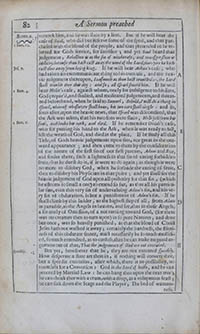 A Sermon preached
82
Serm.6.
vertook him, and he was slain by a lion. But if he will hear the
A Sermon preached
82
Serm.6.
vertook him, and he was slain by a lion. But if he will hear the
case of Saul1 Sam. 15., who did but reserve some of the spoil, and that pur-
chased with the bloud of the people, and that pretended to be re-
served for Gods service, for sacrifice; and yet Saul heard that
judgement, Rebellion is as the sin of witchcraft, and transgression is
idolatry: because thou hast cast away the word of the Lord, therefore he hath
cast thee away from being king. If he will hear Achan's caseJos. 7., who
had taken an excommunicate thing to his own use, and the hea-
vie judgement thereupon, Inasmuch as thou hast troubled us, the Lord
shall trouble thee this day: and so, all Israel stoned him. If he will
hear Helie's case1 Sam. 4., against whom, onely for indulgence to his sons,
God prepar'd, and studied, and meditated judgements, and threat-
ned beforehand, when he said to Samuel, Behold, I will do a thing in
Israel, whereof whosoever shall hear, his two ears shall tingle: and so,
soon after, upon the heavie news, that Israel was discomfited, that
the Ark was taken, that his two sons were slain, 2 Sam. 6.Heli fell from his
seat, and broke his neck, and died. If he remember Oziah's case,
who for putting his hand to the Ark, when it was ready to fall,
felt the wrath of God, and died in the place. If he study all this
Title, of Gods heavie judgements upon sins, not great in the out-
ward appearance; and then come to them by the consideration
of the nature of the first sin of our first parents, Adam and Eve,
and findes there, such a lightness in that sin of eating forbidden
fruit, that he durst do it, if it were to do again; as though it were
no more to disobey God, when he forbade the eating of fruit,
then to disobey his Physician in that point; and yet shall see the
heavie judgement of God upon all posterity for that sin, (which
he esteems so small a one) to extend so far, as that all his particu-
lar sins, even this very sin of undervaluing Adam's sin, and his ve-
ry sin of obduration, is but a punishment of Adam's sin. If he
shall climb by this ladder, to the highest step of all, from Adam
in paradise, to the Angels in heaven, and see, that in those Angels,
a sin onely of Omission, of a not turning toward God, (for there
was no creature then to turn upon) in so pure Natures, and done
but once, was so heavily punished, as that the bloud of Christ
Jesus hath not washed it away; certainly the hardness, the flinti-
ness of this obdurate sinner, must necessarily be so much mollifi-
ed, so much entendred, as to confess, that he can make no good ar-
gument out of that, That the judgements of God are not executed. Speedily.But yet, howsoever that be, they are not executed speedily.
How desperate a state art thou in, if nothing will convert thee,
but a speedie execution, after which, there is no possibility, no
room left for a Conversion? God is the Lord of hosts, and he can
proceed by Martial Law: he can hang thee upon the next tree;
he can choak thee with a crum, with a drop, at a voluptuous feast;
he can sink down the Stage and the Player; The bed of wanton-
ness,
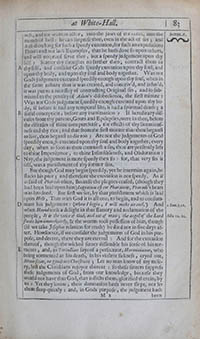 at White-Hall.
83
Serm.6.ness, and the wanton actor, into the jaws of the earth, into the
at White-Hall.
83
Serm.6.ness, and the wanton actor, into the jaws of the earth, into the
mouth of hell: he can surprise thee, even in the act of sin; and
dost thou long for such a speedy execution, for such an expedition?
Thou canst not lack Examples, that he hath done so upon others,
and will no proof serve thee, but a speedy judgement upon thy
self? Scatter thy thoughts no farther then; contract them in
thy self, and consider Gods speedy execution upon thy soul, and
upon thy body, and upon thy soul and body together. Was not
Gods judgement executed speedily enough upon thy soul, when in
the same instant that it was created, and conceiv'd, and infus'd,
it was put to a necessity of contracting Original sin, and so sub-
mitted to the penalty of Adam's disobedience, the first minute?
Was not Gods judgement speedily enough executed upon thy bo-
dy, if before it had any temporal life, it had a spiritual death; a
sinful conception, before any inanimation? If hereditary dis-
eases from thy parents, Gouts and Epilepsies, were in thee, before
the diseases of thine own purchase, the effects of thy licentious-
ness and thy riot; and that from the first minute that thou beganst
to live, thou beganst to die too? Are not the judgements of God
speedily enough executed upon thy soul and body together, every
day, when as soon as thou commitst a sin, thou art presently left
to thine Impenitence, to thine Insensibleness, and Obduration?
Nay, the judgement is more speedy then so: for, that very sin it
self, was a punishment of thy former sins. But though God may begin speedily, yet he intermits again, he
slacks his pace; and therefore the execution is not speedy. As it
is said of Pharaoh often, Because the plagues ceased, (though they
had been laid upon him) Ingratum est cor Pharaonis, Pharaoh's heart
was hardned. But first we see, by that punishment which is laid
upon Heli, That with God it is all one, to begin, and to consum-
mate his judgement: (1 Sam. 3.12.When I begin, I will make an end.) And
when Herod took a delight in that flattery and acclamation of the
people, Acts 12.22.It is the voice of God, and not of man; the angel of the Lord
smote him immediately, & the worms took possession of him, though
(if we take Josephus relation for truth) he died not in five days af-
ter. Howsoever, if we consider the judgements of God in his pur-
pose, and decree, there they are eternal: And for the execution
thereof, though the wicked sinner dissemble his sense of his tor-
ments, and, as Tertullian says of a persecutor, Herminianus, who
being tormented at his death, in his violent sickness, cryed out,
Nemo sciat, ne gaudeant Christiani; Let no man know of my mise-
ry, lest the Christians rejoyce thereat: so these sinners suppress
these judgements of God, from our knowledge, because they
would not have that God, that inflicts them, glorified therein, by
us: Yet they know, their damnation hath never slept, nor let
them sleep quietly: and, in Gods purpose, the judgement hath M2 been
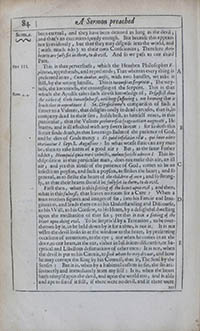 A Sermon preached
84
A Sermon preached
84
Serm.6.been eternal, and they have been damned as long as the devil;
and that's an execution speedy enough. But because this appears
not so evidently, but that they may disguise it to the world, and
(with much ado) to their own Consciences; Therefore their
hearts are fully set in them, to do evil. And so we pass to our third
Part. Part III.This is that perversness, which the Heathen Philosopher E-
pictetus, apprehends, and reprehends; That whereas every thing is
presented to us, Cum duabus ausisansis, with two handles, we take it
still, by the wrong handle. This is tortuositas serpentis, The wry-
ness, the knottiness, the entangling of the Serpent. This is that
which the Apostle takes such direct knowledge of,Rom. 2.4. Despisest thou
the riches of Gods bountifulness, and long-suffering, not knowing that it
leads thee to repentance? St. Chrysostome's comparison of such a
sinner to a Vulture, that delights onely in dead carcases, that is, in
company dead in their sins, holds best, as himself notes, in this
particular, that the Vulture perhorrescit fragrantiam unguenti, He
loaths, and is ill affected with any sweet savour: for so doth this
sinner finde death, in that soveraign Balm of the patience of God,
and he dies of Gods mercy: Et quid infelicius illis, qui bono odore
moriuntur? says S. Augustine: In what worse state can any man
be, then to take harm of a good air? But, as the same Father
addes, Numquid quia mori voluisti, malum fecisti odorem? This in-
disposition in that particular man, does not make this air, an ill
air; and yet this abuse of the patience of God, comes to be an
infectious poyson, and such a poyson, as strikes the heart; and so
general, as to strike the heart of the children of men; and so strong-
ly, as that their hearts should be fully set in them, to do evil. First then, what is this setting of the heart upon evil; and then,
what is this fulness, that leaves no room for a Cure? When a
man receives figures and images of sin, into his Fancie and Ima-
gination, and leads them on to his Understanding and Discourse,
to his Will, to his Consent, to his Heart, by a delightful dwelling
upon the meditation of that sin; yet this is not a setting of the
heart upon doing evil. To be surpris'd by a Tentation, to be over-
thrown by it, to be held down by it for a time, is not it. It is not
when the devil looks in at the window to the heart, by presenting
occasions of tentations, to the eye; nor when he comes in at the
door, to our heart, at the ear, either in lascivious discourses, or Sa-
tyrical and Libellous defamations of other men: It is not, when
the devil is put to his Circuit, to seek whom he may devour, and how
he may corrupt the King by his Council, that is, The Soul by the
Senses: But it is, when by a habitual custom in sin, the sin ari-
ses meerly and immediately from my self: It is, when the heart
hath usurp'd upon the devil, and upon the world too, and is able
and apt to sin of it self, if there were no devil, and if there were no
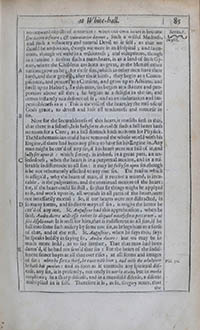 at White-Hall.
85
Serm.6.
at White-Hall.
85
Serm.6.
no outward objects of tentation: when our own heart is become
Chrysost.spontanea insania, & voluntarius dæmon, Such a wilful Madness,
and such a voluntary and natural Devil to it self, as that we
should be ambitious, though we were in an Hospital; and licen-
tious, though we were in a wilderness; and voluptuous, though
in a famine: so that such a mans heart, is as a land of such Gy-
ants, where the Children are born as great, as the Men of other
nations grow to be; for those sins, which in other men have their
birth, and their growth, after their birth, they begin at a Concu-
piscence, and proceed to a Consent, and grow up to Actions, and
swell up to Habits; In this man, sin begins at a stature and pro-
portion above all this; he begins at a delight in the sin, and
comes instantly to a defence of it, and to an obduration and im-
penitibleness in it: This is the evil of the heart, by the mis-use of
Gods grace, to devest and lose all tenderness and remorse in
sin. Now for the Incurableness of this heart, it consists first in this,
that there is a fulness; It is fully set to do evil: & such a full heart hath
no room for a Cure; as a full stomack hath no room for Physick.
The Mathematician could have removed the whole world with his
Engine, if there had been any place to have set his Engine in. Any
man might be cur'd of any sin, if his heart were not full of it, and
fully set upon it: which setting, is indeed, in a great part, an un-
setledness, when the heart is in a perpetual motion, and in a mi-
serable indifferencie to all sins: it may be fully set upon sin, though
it be not vehemently affected to any one sin. The reason which
is assign'd, why the heart of man, if it receive a wound, is incu-
rable, is the palpitation, and the continual motion of the heart:
for, if the heart could lie still, so that fit things might be applyed
to it, and work upon it, all wounds in all parts of the heart, were
not necessarily mortal: So, if our hearts were not distracted, in
so many forms, and so divers ways of sin, it might the better be
cur'd of any one. St. Augustine had this apprehension, when he
said, Audeo dicere utile esse cadere in aliquod manifestum peccatum, ut
sibi displiceant: It is well for him, that is indifferent to all sins, if he
fall into some such misery by some one sin, as brings him to a sense
of that, and of the rest. St. Augustine, when he says this, says
he speaks boldly in saying so, Audeo dicere: but we may be so
much more bold, as to say further, That that man had been
damn'd, if he had not sinn'd that sin: For the heart of the indif-
ferent sinner bayts at all that ever rises, at all forms and images
of sin: Psal. 50.when he sees a thief, he runs with him; and with the adulterer
he hath his portion: and as soon as it contracts any spiritual dis-
ease, any sin, it is presently, not onely in morbo acuto, but in morbo
complicato; in a sharp disease, and in a manifold disease, a disease
multiplied in it self. Therefore it is, as St. Gregory notes, that the
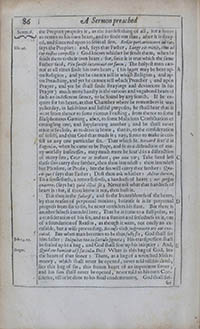 A Sermon preached
86
A Sermon preached
86
Serm.6.the Prophet proposes it, as the hardest thing of all, for a sinner
to return to his own heart, and to finde out that, after it is stray-
ed, and scattered upon so several sins. Esa. 46.Redite prevaricatores ad cor,
says the Prophet: and, says that Father, Longe eis mittit, cum ad
cor redire compellit: God knows whither he sends them, when he
sends them to their own heart: for, since it is true which the same
Father said, Vix sancti inveniunt cor suum, The holyest man can-
not at all times finde his own heart, (his heart may be bent up-
on Religion, and yet he cannot tell in which Religion; and up-
on Preaching, and yet he cannot tell which Preacher; and upon
Prayer, and yet he shall finde strayings and deviations in his
Prayer) much more hardly is the various and vagabond heart of
such an indifferent sinner, to be found by any search. If he en-
quire for his heart, at that Chamber where he remembers it was
yesterday, in lascivious and lustful purposes, he shall hear that it
went from thence to some riotous Feasting, from thence to some
Blasphemous Gaming, after, to some Malicious Consultation of
entangling one, and supplanting another; and he shall never
trace it so close, as to drive it home, that is, to the consideration
of it self, and that God that made it; nay, scarce to make it con-
sist in any one particular sin. That which St. Bernard fear'd in
Eugenius, when he came to be Pope, and so to a distraction of ma-
ny worldly businesses, may much more be fear'd in a distraction
of many sins, Cave ne te trahant, quo non vis; Take heed lest
these sins carry thee farther, then thou intendest: thou intendest
but Pleasure, or Profit; but the sin will carry thee farther: Quæ -
ris quo? says that Father; Dost thou ask whither? Ad cor durum,
To a senslesness, a remorslesness, a hardness of heart: nec pergas
quærere, (says he) quid illud sit; Never ask what that hardness of
heart is: for, if thou know it not, thou hast it. This then is the fulness, and so the Incurableness of the heart,
by that reason of perpetual motion; because it is in perpetual
progress from sin to sin, he never considers his state. But there is
another fulness intended here, That he is come to a full point, to
a consideration of his sin, and to a station and setledness in it, out
of a foundation of Reason, as though it were, not onely an ex-
cusable, but a wise proceeding, Because Gods judgements are not exe-
cuted. But when man becomes to be thus fully set, God shall set
him faster: Job 14.17.Iniquitas tua in sacculo signata; His transgression shall
be sealed up in a bag, and God shall sow up his iniquity: And,
Gregor.Quid cor hominis nisi sacculus Dei? What is this bag of God, but
the heart of that sinner? There, as a bag of a wretched Misers
money, which shall never be opened, never told till his death,
lies this bag of sin, this frozen heart of an impenitent sinner;
and his sins shall never be opened, never told to his own Con-
science, till it be done to his final condemnation. God shall suf-
fer
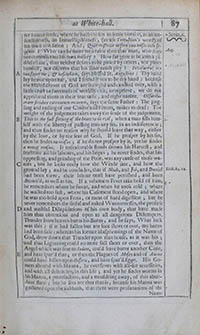 at White-Hall.
87
Serm.6.fer him to settle, where he hath chosen to settle himself, in an un-
at White-Hall.
87
Serm.6.fer him to settle, where he hath chosen to settle himself, in an un-sensibleness, an Inintelligibleness, (to use Tertullian's word) of
his own condition: And,Aug. Quid miserior misero non miserante se-
ipsum? Who can be more miserable then that man, who does
not commiserate his own misery? How far gone is he into a pi-
tiful estate, that neither desires to be pitied by others, nor pities
himself, nor discerns that his state needs pity? Invaluerat ira
tua super me, & nesciebam, says blessed St. Augustine: Thy hand
lay heavie upon me, and I found it not to be thy hand: because
the Maledictions of God are honeyed and candied over, with a
little crust or sweetness of worldly ease, or reprieve, we do not
apprehend them in their true taste, and right nature. Obsurdu-
eram stridore catenarum mearum, says the same Father: The jing-
ling and ratling of our Chains and Fetters, makes us deaf: The
weight of the judgement takes away the sense of the judgement.
This is the full setting of the heart to do evil, when a man fills him-
self with the liberty of passing into any sin, in an indifferencie;
and then findes no reason why he should leave that way, either
by the love, or by the fear of God. If he prosper by his sin,
then he findes no reason; if he do not prosper by it, yet he findes
a wrong reason. If unseasonable flouds drown his Harvest, and
frustrate all his labours, and his hopes; he never findes, that his
oppressing, and grinding of the Poor, was any cause of those wa-
ters, but he looks onely how the Winde sate, and how the
ground lay; and he concludes, that if Ezek. 14.14.Noah, and Job, and Daniel
had been there, their labour must have perished, and been
drown'd, as well as his. If a vehement Fever take hold of him,
he remembers where he sweat, and when he took cold; where
he walked too fast, where his Casement stood open, and where
he was too bold upon Fruit, or meat of hard digestion; but he
never remembers the sinful and naked Wantonnesses, the profuse
and wastful Dilapidations of his own body, that have made
him thus obnoxious and open to all dangerous Distempers.
Thunder from heaven burns his Barns, and he says, What luck
was this? if it had fallen but ten foot short or over, my barns
had been safe: whereas his former blasphemings of the Name of
God, drew down that Thunder upon that house, as it was his;
and that Lightning could no more fall short or over, then the
Angel which was sent to Sodom, could have burnt another Citie,
and have spar'd that; or then the Plagues of Moses and of Aaron
could have fallen upon Goshen, and have spar'd Egypt. His Go-
mers abound with Manna, he overflows with all for necessities,
and with all delicacies, in this life; and yet he findes worms in
his Manna, a putrefaction, and a mouldring away, of this abun-
dant state; but he sees not that that is, because his Manna was
gathered upon the Sabbath, that there were profanations of the Name
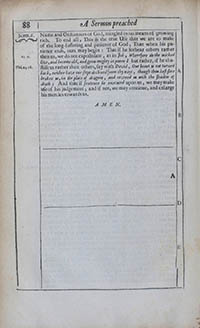 A Sermon preached
88
A Sermon preached
88
Serm.6.Name and Ordinances of God, mingled in his means of growing
rich. To end all, This is the true Use that we are to make
of the long-suffering and patience of God, That when his pa-
tience ends, ours may begin: That if he forbear others rather
then us, we do not expostulate, as in Job, 21.7.Wherefore do the wicked
live, and become old, and grow mighty in power? but rather, if he cha-
stise us rather then others, say with David, Psal. 44.18.Our heart is not turned
back, neither have our steps declined from thy ways, though thou hast sore
broken us, in the place of dragons, and covered us with the shadow of
death: And that if sentence be executed upon us, we may make
use of his judgement; and if not, we may continue, and enlarge
his mercies towards us. AMEN. A
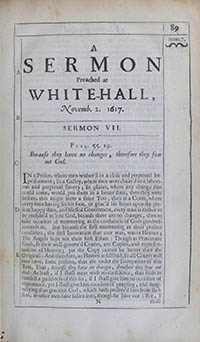 89
Serm.7.
A
89
Serm.7.
A SERMON
Preached at
WHITE-HALL,
Novemb. 2. 1617.
SERMON VII. Psal. 55.19.
Because they have no changes, therefore they fear
not God. INIn a Prison, where men wither'd in a close and perpetual im-
prisonment; In a Galley, where men were chain'd to a labori-
ous and perpetual slavery; In places, where any change that
could come, would put them in a better state, then they were
before, this might seem a fitter Text, then in a Court, where
every man having set his foot, or plac'd his hopes upon the pre-
sent happy state, and blessed Government, every man is rather to
be presum'd to love God, because there are no changes, then to
take occasion of murmuring at the constancie of Gods goodness
towards us. But because the first murmuring at their present
condition, the first Innovation that ever was, was in Heaven;
The Angels kept not their first Estate: Though as Princes are
Gods, so their well-govern'd Courts, are Copies, and represen-
tations of Heaven; yet the Copy cannot be better then the
Original: And therefore, as Heaven it self had, so all Courts will
ever have, some persons, that are under the Increpation of this
Text, That, Because they have no changes, therefore they fear not
God: At least, if I shall meet with no conscience, that finds in
himself a guiltiness of this sin, if I shall give him no occasion of
repentance, yet I shall give him occasion of praysing, and mag-
nifying that gracious God, which hath preserv'd him from such
sins, as other men have fallen into, though he have not: For, I shall
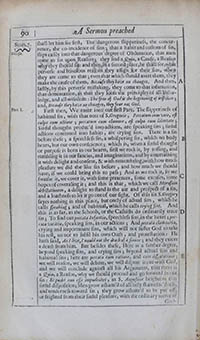 A Sermon preached
90
Serm.7.
A Sermon preached
90
Serm.7.
shall let him see first, The dangerous slipperiness, the concur-
rence,Divisio. the co-incidence of sins; that a habit and custom of sin,
slips easily into that dangerous degree of Obduration, that men
come to sin upon Reason; they find a Quia, a Cause, a Reason
why they should sin: and then, in a second place, he shall see, what
perverse and frivolous reasons they assign for their sins, when
they are come to that; even that which should avert them, they
make the cause of them, Because they have no changes. And then,
lastly, by this perverse mistaking, they come to that infatuation,
that dementation, as that they loose the principles of all know-
ledge, and all wisedom: The fear of God is the beginning of wisedom;
and, Because they have no changes, they fear not God. Part I.First then, We enter into our first Part, The slipperiness of
habitual sin, with that note of S. Gregorie, Peccatum cum voce, est
culpa cum actione; peccatum cum clamore, est culpa cum libertate;
Sinful thougths produc'd into actions, are speaking sins; sinful
actions continued into habits, are crying sins. There is a sin
before these; a speechless sin, a whispering sin, which no body
hears, but our own conscience; which is, when a sinful thought
or purpose is born in our hearts, first we rock it, by tossing, and
tumbling it in our fancies, and imaginations, and by entertaining
it with delight and consent, & with remembring, with how much
pleasure we did the like sin before, and how much we should
have, if we could bring this to pass; And as we rock it, so we
swathe it, we cover it, with some pretences, some excuses, some
hopes of coveraling it; and this is that, which we call Morosam
delectationem, a delight to stand in the air and prospect of a sin,
and a loathness to let it go out of our sight. Of this sin S. Gregory
sayes nothing in this place, but onely of actual sins, which he
calls speaking; and of habitual, which he calls crying sins. And
this is as far, as the Schools, or the Casuists do ordinarily trace
sin; To find out peccata Infantia, speechless sins, in the heart; pec-
cata vocatia, speaking sins, in our actions; And peccata clamantia,
crying and importunate sins, which will not suffer God to take
his rest, no nor to fulfil his own Oath, and protestation: He
hath said, As I live, I would not the death of a sinner; and they extort
a death from him. But besides these, Here is a farther degree,
beyond speaking sins, and crying sins; beyond actual sins and
habitual sins; here are peccata cum ratione, and cum disputatione;
we will reason, we will debate, we will dispute it out with God,
and we will conclude against all his Arguments, that there is
a Quia, a Reason, why we should proceed and go forward in our
sin: Et pudet non esse impudentes, as S. Augustine heightens this
sinful disposition; Men grow asham'd of all holy shamefac'dness,
and tenderness toward sin; they grow asham'd to be put off,
or frighted from their sinful pleasure, with the ordinary terror of Gods
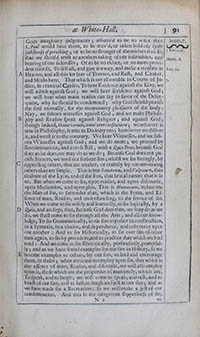 at White-Hall.
91
Serm.7.
at White-Hall.
91
Serm.7.
Gods imaginary judgements; asham'd to be no wiser then
S. Paul would have them, to be mov'd, or taken hold of, 1 Cor. 1.21.by the
foolishness of preaching; or to be no stronger of themselves then so,
Matth. 8.that we should trust to anothers taking of our infirmities, and
bearing of our sicknesses; Or to be no richer, or no more provi-
dent then so, Luc. 12.To sell all, and give it away, and make a treasure in
Heaven, and all this for fear of Theeves, and Rust, and Canker,
and Moths here. That which is not allowable in Courts of Ju-
stice, in criminal Causes, To hear Evidence against the King, we
will admit against God; we will hear Evidence against God;
we will hear what mans reason can say in favor of the Delin-
quent, why he should be condemned; why God should punish
the soul eternally, for the momentany pleasures of the body:
Nay, we suborn witnesses against God, and we make Philoso-
phy and Reason speak against Religion, and against God;
though indeed, Omne verum, omni vero consentiens; whatsoever is
true in Philosophy, is true in Divinity too; howsoever we distort
it, and wrest it to the contrary. We hear Witnesses, and we sub-
orn Witnesses against God; and we do more; we proceed by
Recriminations, and a cross Bill, with a Quia Deus, because God
does as he does, we may do as we do; Because God does not pu-
nish Sinners, we need not forbear sins; whilst we sin strongly, by
oppressing others, that are weaker, or craftily by circumventing
others that are simple. This is but Leoninum, and Vulpinum, that
tincture of the Lyon, and of the Fox, that brutal nature that is in
us. But when we come to sin, upon reason, and upon discourse,
upon Meditation, and upon plot, This is Humanum, to become
the Man of Sin, to surrender that, which is the Form, and Es-
sence of man, Reason, and understanding, to the service of sin.
When we come to sin wisely and learnedly, to sin logically, by a
Quia, and an Ergo, that, Because God does thus, we may do as we
do, we shall come to sin through all the Arts, and all our know-
ledge, To sin Grammatically, to tie sins together in construction,
in a Syntaxis, in a chaine, and dependance, and coherence upon
one another: And to sin Historically, to sin over sins of other
men again, to sin by precedent, and to practice that which we had
read: And we come to sin Rhetorically, perswasively, powerful-
ly; and as we have found examples for our sins in History, so we
become examples to others, by our sins, to lead and encourage
them, in theirs; when we come to employ upon sin, that which is
the essence of man, Reason, and discourse, we will also employ
upon it, those which are the properties of man onely, which are,
To speak, and to laugh; we will come to speak, and talk, and to
boast of our sins, and at last, to laugh and jest at our sins; and as
we have made sin a Recreation, so we will make a jest of our
condemnation. And this is the dangerous slipperiness of sin, N2 to
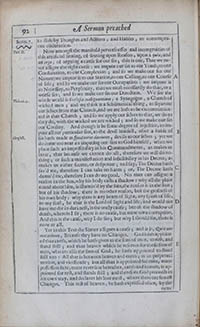 A Sermon preached
92
Serm.7.
A Sermon preached
92
Serm.7.
to slide by Thoughts and Actions, and Habits, to contemptu-
ous obduration. Part II.Now amongst the manifold perversnesses and incongruities of
this artificial sinning, of sinning upon Reason, upon a quia, and
an ergo, of arguing a cause for our sin; this is one, That we ne-
ver assigne the right cause: we impute our sin to our Youth, to our
Constitution, to our Complexion; and so we make our sin our
Nature: we impute it to our Station, to our Calling, to our Course
of life; and so we make our sin our Occupation: we impute it
to Necessity, to Perplexity, that we must necessarily do that, or a
worse sin; and so we make our sin our Direction. We see the
whole world is Psal. 26.5.Ecclesia malignantium, a Synagogue, a Church of
wicked men; and we think it a Schismatical thing, to separate
our selves from that Church, and we are loth to be excommunica-
ted in that Church; and so we apply our selves to that, we do as
they do, with the wicked we are wicked; and so we make our sin
our Civility. And though it be some degree of injustice, to im-
pute all our particular sins, to the devil himself, after a habit of
sin hath made us Chrysost.spontaneos dæmones, devils to our selves; yet we
do come too near an imputing our sins to God himself, when we
place such an impossibility in his Commandments, as makes us
lazie, that because we cannot do all, therefore we will do no-
thing; or such a manifestation and infallibility in his Decree, as
makes us either secure, or desperate; and say, The Decree hath
sav'd me, therefore I can take no harm; or, The Decree hath
damn'd me, therefore I can do no good. No man can assigne a
reason in the Sun, why his body casts a shadow: why all the place
round about him, is illumin'd by the Sun, the reason is in the Sun;
but of his shadow, there is no other reason, but the grosness of
his own body: why there is any beam of light, any spark of life,
in my soul, he that is the Lord of light and life, and would not
have me die in darkness, is the onely cause; but of the shadow of
death, wherein I sit, there is no cause, but mine own corruption.
And this is the cause, why I do sin; but why I should sin, there is
none at all. Yet in this Text the Sinner assignes a cause; and it is, Quia non
mutationes, Because they have no Changes. God hath appoint-
ed that earth, which he hath given to the sons of men, to rest, and
stand still; and that heaven which he reserves for those sons of
men, who are also the sons of God, he hath appointed to stand
still too: All that is between heaven and earth, is in perpetual
motion, and vicissitude; but all that is appointed for man, mans
possession here, mans reversion hereafter, earth and heaven, is ap-
pointed for rest, and stands still; and therefore God proceeds in
his own way, and declares his love most, where there are fewest
Changes. This rest of heaven, he hath expressed often, by the name
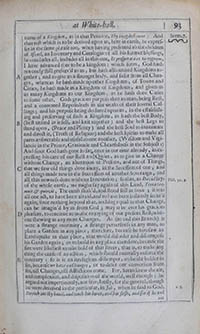 at White-Hall.
93
Serm.7.
at White-Hall.
93
Serm.7.
name of a Kingdom, as in that Petition, Thy kingdom come: And
that rest which is to be derived upon us, here in earth, he expres-
ses in the same phrase too, when having presented to the children
of Israel, an Inventary and Catalogue of all his former blessings,
he concludes all, includes all in this one, Et prosperata es in regnum,
I have advanced thee to be a kingdom: which form, God hath
not onely still preserv'd to us, but hath also united Kingdoms to-
gether; and to give us a stronger body, and safer from all Chan-
ges, whereas he hath made up other Kingdoms, of Towns and
Cities, he hath made us a Kingdom of Kingdoms, and given us
as many Kingdoms to our Kingdom, as he hath done Cities
to some other. Gods gracious purpose then to man, being Rest,
and a contented Reposedness in the works of their several Cal-
lings; and his purpose being declared upon us, in the establish-
ing and preserving of such a Kingdom, as hath the best Body,
(best united in it self, and knit together) and the best Legs to
stand upon, (Peace and Plenty) and the best Soul to inanimate
and direct it, (Truth of Religion) and the best Spirits to make all
parts answerable and useful to one another, (Wisdom and Vigi-
lancie in the Prince, Gratitude and Chearfulness in the Subject:)
And since God hath gone so far, once in our time already, in ex-
pressing his care of our Rest and Quiet, as to give us a Change
without Change, an alteration of Persons, and not of Things,
that we saw old things done away, in the Secession of one, and
all things made new in the Succession of another Soveraign, and
all this newness done without Innovation; so that, as David says
of the whole earth, we might say again of this Land, Psal. 76.9.Terra tre-
muit & quievit, The earth shak'd, and stood still at once; it was
all one act, to have been afraid, and to have been instantly secur'd
again, since nothing beyond that, nothing equal to that Change,
can be imagin'd by us from God; may it be ever his gracious
pleasure, to continue to us, the enjoying of our present Rest, with-
out shewing us any more Changes. As (to end this Branch) it
were a strange enormity, a strange perversness in any man, to
plant a Garden in any place, therefore, because he foresaw an
Earthquake in that place, that would disorder and discompose
his Garden again; or to build in any place therefore, because the
fire were likeliest to take hold of that street; that is, to make any
thing the cause of an action, which should naturally enforce the
contrary: so is it an irreligious distemper, to be the bolder in
sin, because we have no Changes, or to defer our conversion from
sin, till Changes, till Afflictions come. For, Satan knew the air,
and complexion, and disposition of the world, well enough: he
argued not impertinently, nor frivolously, for the general, though
he were deceived in the particular, in Job, when he said to God,
2.5.Stretch out thy hand, and touch his bones, and his flesh, and see if he will not
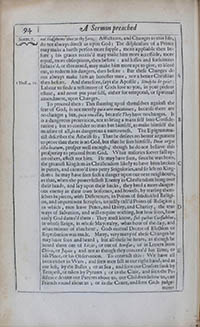 A Sermon preached
94
Serm.7.
A Sermon preached
94
Serm.7.
not blaspheme thee to thy face. Afflictions, and Changes in this life,
do not always direct us upon God: The displeasure of a Prince
may make a harsh person more supple, more appliable then be-
fore; his graces receiv'd may make him more accessible, more
equal, more obsequious, then before: and losses and forfeitures
sustain'd, or threatned, may make him more apt to give, to bleed
out, to redeem his dangers, then before: But these Changes do
not always make him an honester man, nor a better Christian
then before. And therefore, says the Apostle, 1 Thess. 4.11.Study to be quiet;
Labour to finde a testimony of Gods love to you, in your present
estate, and never put your self, either for temporal, or spiritual
amendment, upon Changes. To proceed then: This shutting up of themselves against the
fear of God, is not meerly quia non mutationes, because there are
no changes; but, quia non illis, because They have no changes. It
is a dangerous preterition, not to bring a mans self into Conside-
ration; but to consider no man but himself, to make himself the
measure of all, is as dangerous a narrowness. The Epigramma-
tist describes the Atheist so, That he desires no better argument
to prove that there is no God, but that he sees himself, Dum negat
ista beatum, prosper well enough, though he do not believe this
prosperity to proceed from God. What miseries soever fall up-
on others, affect not him. He may have seen, since he was born,
the greatest Kingdom in Christendom likely to have been broken
in pieces, and canton'd into petty Seigniories, and so left no King-
dom: he may have seen such a danger upon our next neighbours,
as that, when the powerfullest Enemy in Christendom hung over
their heads, and lay upon their backs, they bred a more danger-
ous enemy in their own bosomes, and bowels, by tearing them-
selves in pieces, with Differences, in Points of subdivided Religi-
on, and impertinent Scruples, unjustly call'd Points of Religion;
in which, men leave Peace, and Unity, and Charity, the true
ways of Salvation, and will enquire nothing, but how soon, how
early God damn'd them: They must know, sub quibus Consulibus,
in whose Reign, in whose Mayoralty, what hour of the day, and
what minute of that hour, Gods eternal Decree of Election or
Reprobation was made. Many, very many of these Changes he
may have seen and heard; but all these he hears, as though he
heard them out of Livie, or out of Berosus, or in Letters from
China, or Japan; and not as though they concern'd his Time, or
his Place, or his Observation. To contract this: We have all
been either in Wars, and seen men fall at our right hand, and at
our left, by the Bullet; or at Sea, and seen our Consort sunk by
Tempest, or taken by Pyrates; or in the Citie, and seen the Pe-
stilence devour our Parents above us, our Children below us, our
Friends round about us; or in the Court, and seen Gods judge-
ments
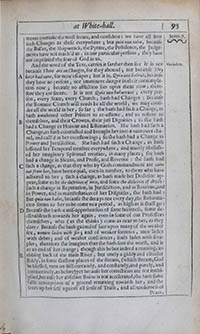 at White-Hall.
95
Serm.7.
ments overtake the most secure, and confident: we have all seen
at White-Hall.
95
Serm.7.
ments overtake the most secure, and confident: we have all seen
such Changes as these everywhere; but quia non nobis, because
the Bullet, the Shipwrack, the Pyrate, the Pestilence, the Judge-
ments have not reach'd us, in our particular persons, they have
not imprinted the fear of God in us. Non habent.And the word of the Text, carries it farther then so: it is not
because There are no Changes, for they abound; nor because They
have had none, for none escapes; but it is, Quia non habent, because
they have no present, nor imminent danger in their contempla-
tion now; because no affliction lies upon them now, there-
fore they are secure. It is not Quia non habuerunt; every per-
son, every State, every Church, hath had Changes: Because
the Romane Church will needs be all the world, we may consi-
der all the world in her, so far; she hath had such a Change, as
hath awakened other Princes to re-assume, and to restore to
themselves, and their Crowns, their just Dignities; so she hath
had a Change in Honour and Estimation. She hath had such a
Change, as hath contracted and brought her into a narrower cha-
nel, and call'd in her overflowings; so she hath had a Change in
Power and Jurisdiction. She hath had such a Change, as hath
lessened her Temporal treasure everywhere, and utterly abolish-
ed her imaginary Spiritual treasure, in many places; she hath
had a change in Means, and Profit, and Revenue: she hath had
such a change, as that they who by Gods commandment are come
out from her, have been equal, even in number, to them who have
adhered to her; such a change, as hath made her Doctrine ap-
pear, some to be the doctrines of men, and some the doctrines of devils:
such a change in Reputation, in Jurisdiction, and in Revenue, and
in Power, and in manifestation of her Disguises, she hath had:
But quia non habet, because she decays not every day, the Reforma-
tion seems to her to be come to a period, as high as it shall go:
Because she hath a mis-apprehension of some faintness, some de-
clinableness towards her again, even in some of our Professors
themselves, who (as she thinks) come as near to her, as they
dare: Because she hath gained of late upon many of the weaker
sex, women laden with sin; and of weaker fortunes, men laden
with debts; and of weaker consciences, souls laden with scru-
ples; therefore she imagines that she hath seen the worst, and is
at an end of her change; though this be but indeed a running, an
ebbing back of the main River, but onely a giddy and circular
Eddy, in some shallow places of the stream, (which stream, God
be blessed, runs on still currantly, and constantly, and purely, and
intemerately, as before) yet because her corrections are not multi-
plied, because her absolute Ruine is not accelerated, she hath some
false conceptions of a general returning towards her, and she
sears up her self against all sense of Truth, and all tenderness of Peace,Peace;
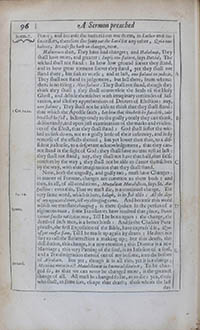 A Sermon preached
96
Serm.7.
A Sermon preached
96
Serm.7.
Peace; and because she hath rid out one storm, in Luther and his
successors, therefore she fears not the Lord for any other, Quia non
habent, Because she hath no changes, now. Habuerunt then, They have had changes; and Habebunt, They
shall have more, and greater: Impii non stabunt, says David, The
wicked shall not stand: In how low ground soever they stand,
and in how great torment soever they stand, yet they shall not
stand there, but sink to worse; and at last, non stabunt in judicio,
They shall not stand in judgement, but fall there, from whence
there is no rising: Non stabunt: They shall not stand, though they
think they shall; they shall counterfeit the Seals of the Holy
Ghost, and delude themselves with imaginary certitudes of Sal-
vation, and illusory apprehensions of Decrees of Election: nay,
non stabunt, They shall not be able to think that they shall stand:
that which the Apostle saith,1 Cor. 10.12. Let him that thinketh he standeth, take
heed lest he fall, belongs onely to the godly; onely they can think,
deliberately, and upon just examination of the marks and eviden-
ces of the Elect, that they shall stand: God shall suffer the wic-
ked to sink down, not to a godly sense of their infirmity, and holy
remorse of the effects thereof; but yet lower then that, to a dif-
fident jealousie, to a desperate acknowledgement, that they can-
not stand in the sight of God: they shall have no true rest at last:
they shall not stand; nay, they shall not have that half, that false
comfort by the way; they shall not be able to flatter themselves
by the way, with that imagination that they shall stand. Now, both the ungodly, and godly too, must have Changes:
in matter of Fortune, changes are common to them both: and
then, in all, of all conditions, Mortalitas Mutabilitas, says St. Au-
gustine: even this, That we must die, is a continual change. The
very same word, which is here, kalaph, is in Job also: 14.14.All the days
of my appointed time, till my changing come. And because this word
which we translate changing, is there spoken in the person of a
righteous man, some Translators have rendred that place, Symma.Donec
veniat sancta nativitas mea, Till I be born again: the change, the
death of such men, is a better birth: And so the Chaldee Para-
phrasts, the first Exposition of the Bible, have express'd it, Quo-
usque rursus fiam, Till I be made up again by death: He does not
stay to call the Resurrection a making up; but this death, this
dissolution, this change, is a new creation; this Divorce is a new
Marriage; this very Parting of the soul, is an Infusion of a soul,
and a Transmigration thereof out of my bosome, into the bosom
of Abraham. But yet, though it is all this, yet it is a change;
Bernard.Maxima mutatio est Mutabilitatis in Immutabilitatem, To be chan-
ged so, as that we can never be changed more, is the greatest
change of all. All must be changed so far, as to die: yea, those
who shall, in some sort, escape that death; those whom the last day
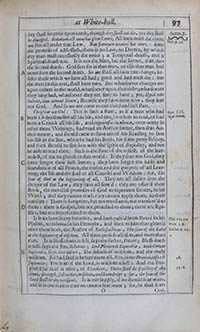 at White-Hall.
97
Serm.7.
at White-Hall.
97
Serm.7.
day shall surprise upon earth, though they shall not die, yet they shall
be changed. Statutum est omnibus, semel mori, Heb. 9.27.All men must die once;
we live all under that Law. But statutum nemini hic mori: since
the promise of a Messiah, there is no Law, no Decree, by which
any man must necessarily die twice; a Temporal death, and a
Spiritual death too. It is not the Man, but the Sinner, that dies
the second death: God sees sin in that man, or else that man had
never seen the second death. So we shall all have one change, be-
sides those which we have all had; good and bad must die: but
the men in this text, shall have two. But whatsoever changes are
upon others in the world, whatsoever upon themselvsthemselves; whatsoever
they have had, whatsoever they are sure to have; yet, Quia non
habent, non timent Deum; Because they have none now, they fear
not God. And so we are come to our third and last Part. Part III.They fear not God: This is such a state, as if a man who had
Non timent.been a Schoolmaster all his life, and taught others to read, or had
been a Critick all his life, and ingeniosus in alienis, over-witty in
other mens Writings, had read an Author better, then that Au-
thor meant, and should come to have use of his Reading to save
his life at the Bar, when he had his Book, for some petty Felony,
and then should be stricken with the spirit of stupidity, and not
be able to read then. Such is the state of the wisest, of the lear-
nedest, of the mightiest in this world: If they fear not God, they
have forgot their first letters; they have forgot the basis and
foundation of all Power, the reason and the purpose of all Lear-
ning, the life and the soul of all Counsel and Wisdom: for, The
fear of God is the beginning of all. They are all fallen into the
danger of the Law; they have all sinn'd: they are offer'd their
Book, the merciful promises of God to repentant sinners, in his
Word; and they cannot read, they cannot apply them, to their
comfort: There is Scripture, but not translated, not transferr'd to
them: there is Gospel, but not preached to them; there are Epi-
stles, but not superscribed to them. It is an hereditary Sentence, and hath pass'd from David in hisPsal. 111.10.
Psalms, to Solomon in his Prov. 1.7.Proverbs, and then to him that glean'd
after them both, the Author of Ecclus 1.16.Ecclesiasticus, The fear of the Lord
is the beginning of wisdom. All three profess all that, and more then
that. It is Blessedness it self, says the father, David; Blessedness
it self, says the son, Solomon; and Plenitudo Sapientiæ, and Omnis
Sapientia, says the other, The fulness of wisdom, and the onely
wisdom. Job had said it before them all, 28.Ecce, timor Domini, ipsa est
sapientia; The fear of the Lord, is wisdom it self: And the Pro-
phet Esai said it after, of Ezechias,33.6. There shall be stability of thy
times, strength, salvation, wisdom, and knowledge; for, the fear of the
Lord shall be thy treasure. It is our supply, if we should fear want,
and it is our reason that we cannot fear want; for, he that fears OGod,
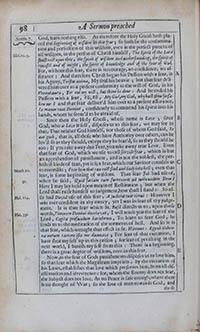 A Sermon preached
98
Serm.7.
A Sermon preached
98
Serm.7.
God, fears nothing else. As therefore the Holy Ghost hath pla-
ced the beginning of wisdom in this fear; so hath he the consumma-
tion and perfection of this wisdom, even in the perfect pattern of
all wisdom, in the person of Christ himself, Esai. 11.3.Esai. 11.2The Spirit of the Lord
shall rest upon thee, the spirit of wisdom and understanding, the spirit of
counsel and of might, the spirit of knowledge and of the fear of God.
For, without this fear, there is no courage, no confidence, no as-
surance: And therefore Christ begun his Passion with a fear, in
his Agony, Tristis anima, My soul hisis heavie; but that fear deli-
vered him over to a present conformity to the will of God, in his
Veruntamen, Yet not my will, but thine be done: And he ended his
Passion with a fear, Eli, Eli, My God, my God, why hast thou forsa-
ken me? and that fear deliver'd him over to a present assurance,
In manus tuas Domine, confidently to commend his spirit into his
hands, whom he seem'd to be afraid of. Since then the Holy Ghost, whose name is Love; since
God, who is Love it self, disposes us to this fear, we may see in
that, That neither God himself, nor those of whom God said, Ye
are gods, that is, all those who have Authority over others, can be
lov'd so as they should, except they be fear'd, so as they should be
too: If you take away due Fear, you take away true Love. Even
that fear of God, which we use to call servile fear, which is but
an apprehension of punishment, and is not the noblest, the per-
fectest kinde of fear, yet it is a fear, which our Saviour counsels us
to entertain;Matth. 10. Fear him that can cast soul and body into hell; even that
fear, is some beginning of wisdom. That fear Job had use of,
when he said,31. Quid faciam cum surrexerit ad judicandum Deus?
Here I may lay hold upon means of Restitution; but when the
Lord shall raise himself to judgement, how shall I stand? So al-
so had David use of this fear,Psal. 119. A judiciis tuis timui: However I
was ever confident in thy mercy, yet I was in fear of thy judge-
ment. It is that fear which St. Basil directs us to, upon those
words,Psal. 33. Timorem Domini docebo vos, I will teach you the fear of the
Lord, Cogita profundum barathrum, To learn to fear God, he
sends us to the meditation of the torments of hell. And so it is
that fear, which wrought that effect in St. Hierome: Ego ob Gehen-
næ metum carcere isto me damnavi; For fear of that execution, I
have shut my self up in this prison; for fear of perishing in the
next world, I banish my self from this: There is a beginning,
there is a great degree of wisdom, even in this fear. Now, as the fear of Gods punishments disposes us to love him,
so that fear which the Magistrate imprints, by the execution of
his Laws, establishes that love which preserves him, from all dis-
estimation and irreverence: for, whom the Enemy does not fear,
the Subject does not love. As no Peace is safe enough, where there
is no thought of War; so the love of man towards God, and those
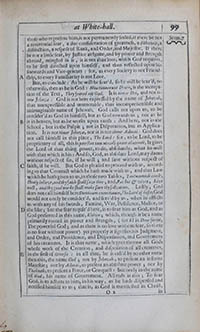 at White-Hall.
99
Serm.7.
at White-Hall.
99
Serm.7.
those who represent him, is not permanently setled, if there be not
a reverential fear, a due consideration of greatness, a distance, a
distinction, a respect of Rank, and Order, and Majestie. If there
be not a little fear, by Justice at home, and by power and strength
abroad, mingled in it, it is not that love, which God requires,
to be first directed upon himself; and then reflected upon his
Stewards and Vice-gerents: for, as every Society is not Friend-
ship, so every Familiarity is not Love. But, to conclude: As he will be fear'd, so he will be fear'd, no
otherwise, then as he is God: Non timuerunt Deum, is the increpa-
tion of the Text, They feared not God. It is timor Dei, and not ti-
mor Jehovæ: God is not here expressed by the name of Jehovah,
that unexpressible and unutterable, that incomprehensible and
unimaginable name of Jehovah. God calls not upon us, to be
consider'd as God in himself, but as God towards us; not as he
is in heaven, but as he works upon earth: And here, not in the
School, but in the Pulpit; not in Disputation, but in Applica-
tion. It is not timor Jehovæ, nor it is not timor Adonai: God does
not call himself in this place, The Lord: for, to be Lord, to be
proprietary of all, this is potestas tam utendi quam abutendi, It gives
the Lord of that thing power, to do, absolutely, what he will
with that which is his: And so, God, as absolute Lord, may damn
without respect of sin, if he will; and save without respect of
faith, if he will. But God is pleased to proceed with us, accord-
ing to that Contract which he hath made with us, and that Law
which he hath given to us, in those two Tables, Tantummodo crede,
Onely believe, and thy faith shall save thee; and, Fac hoc & vives, Live
well, and thy good works shall make sure thy salvation. Lastly, God
does not call himself here Dominum exercituum, The Lord of hosts; God
would not onely be consider'd, and serv'd by us, when he afflicts
us with any of his swords, Famine, War, Pestilence, Malice, or
the like; but the fear requir'd here, is to fear him as God, and as
God presented in this name, Elohim; which, though it be a name
primarily rooted in power and strength, (for El is Deus fortis,
The powerful God; and as there is no love without fear, so there
is no fear without power) yet properly it signifies his Judgment,
and Order, and Providence, and Dispensation, and Government
of his creatures. It is that name, which goes thorow all Gods
whole work of the Creation, and disposition of all creatures,
in the first of Genesis: in all that, he is call'd by no other name
then this, the name God; not by Jehovah, to present an infinite
Majestie; nor by Adonai, to present an absolute power; nor by
Tzebaoth, to present a Force, or Conquest: but onely in the name
of God, his name of Government. All ends in this; To fear
God, is to adhere to him, in his way, as he hath dispensed and
notified himself to us; that is, as God is manifested in Christ, O2in
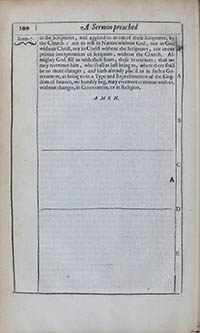 A Sermon preached
100
Serm.8.
A Sermon preached
100
Serm.8.
in the Scriptures, and applied to us out of those Scriptures, by
the Church: not to rest in Nature without God, nor in God
without Christ, nor in Christ without the Scriptures, nor in our
private interpretation of Scripture, without the Church. Al-
mighty God fillfills us with these fears, these reverences; that we
may reverence him, who shall at last bring us, where there shall
be no more changes; and hath already plac'd us in such a Go-
vernment, as being to us a Type and Representation of the King-
dom of heaven, we humbly beg, may evermore continue with us,
without changes, in Government, or in Religion. AMEN. A
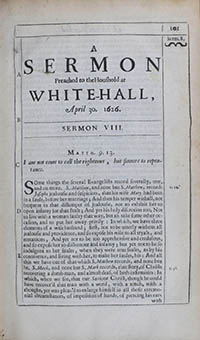 101
Serm.8.
A
101
Serm.8.
A SERMON
Preached to the Houshold at
WHITE-HALL,
April 30. 1626.
SERMON VIII. Matth. 9.13.
I am not come to call the righteous, but sinners to repen-
tance. SOmeSome things the several Evangelists record severally, one,
and no more. S. Matthew, and none but S. Matthew,1.14.1.18-19 records
Josephs jealousie and suspicion, that his wife Mary had been
in a fault, before her marriage; And then his temper withall, not
frequent in that distemper of jealousie, not to exhibit her to
open infamy for that fault; And yet his holy discretion too, Not
to live with a woman faulty that way, but to take some other oc-
casion, and to put her away privily: In which, we have three
elements of a wise husband; first, not to be utterly without all
jealousie and providence, and so expose his wife to all tryals, and
tentations, And yet not to be too apprehensive and credulous,
and so expose her to dishonour and infamy; but yet not to be so
indulgent to her faults, when they were true faults, as by his
connivence, and living with her, to make her faults, his: And all
this we have out of that which S. Matthew records, and none but
he. S. Mark, and none but S. Mark records, that story,7.31.7.32 of Christs
recovering a dumb man, and almost deaf, of both infirmities: In
which, when we see, that our Saviour Christ, though he could
have recover'd that man with a word, with a touch, with a
thought, yet was pleas'd to enlarge himself in all those ceremo-
nial circumstances, of imposition of hands, of piercing his ears with
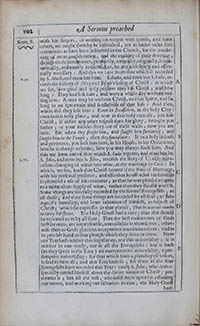 102
A Sermon preached
Serm.8.
102
A Sermon preached
Serm.8.
with his fingers, of wetting his tongue with spittle, and some
others, we might thereby be instructed, not to under-value such
ceremonies as have been instituted in the Church, for the awake-
ning of mens consideration, and the exalting of their devotion;
though those ceremonies, primarily, naturally, originally, funda-
mentally, and meerly in themselves, be not absolutely and essen-
tially necessary: And this we have from that which is recorded
by S. Mark, and none but him. S. Luke, and none but S. Luke, 2.422.43.re-
cords the history of Mary and Joseph's losing of Christ: in which
we see, how good and holy persons may lose Christ; and how
long? They had lost him, and were a whole day without mis-
sing him: A man may be without Christ, and his Spirit, and lie
long in an ignorance and senslesness of that loss: And then,
where did they lose him? Even in Jerusalem, in the holy City:
even in this holy place, and now in this holy exercise, you lose
Christ, if either any other respect then his glory, brought you
hither; or your mindes stray out of these walls, now you are
here. But when they sought him, and sought him sorrowing, and
sought him in the Temple, then they found him: If in a holy sadness
and penitence, you seek him here, in his House, in his Ordinance,
here he is always at home, here you may always finde him. And
this we have out of that which S. Luke reports, and none but he.
S. John, and none but S. John, 2.11.records the story of Christs mira-
culous changing of water into wine, at the marriage in Cana: In
which, we see, both that Christ honour'd the state of Marriage,
with his personal presence, and also that he afforded his servants
so plentiful a use of his creatures, as that he was pleased to come
to a miraculous supply of wine, rather then they should want it.
Some things are severally recorded by the several Evangelists, as
all these; and then some things are recorded by all four; as John
Baptist's humility, and lowe valuation of himself, in respect of
Christ; which he expresses in that phrase, That he was not worthy
to carry his shooes. The Holy Ghost had a care, that this should
be repeated to us by all four, That the best endeavours of Gods
best servants, are unprofitable, unavailable in themselves, other-
wise then as Gods gracious acceptation inanimates them, and as
he puts his hand to that plough which they drive or draw. Now
our Text hath neither this singularity, nor this universality; it is
neither in one onely, nor in all the Evangelists: but it hath
(as they speak in the Law) an interpretative universality, a pre-
sumptive universality: for that which hath a plurality of voices,
is said to have all; and this Text hath so; for three of the four
Evangelists have recorded this Text: onely S. John, who doth e-
specially extend himself about the divine nature of Christ, pre-
termits it; but all the rest, who insist more upon his assuming
our nature, and working our salvation in that, the Holy Ghost hath
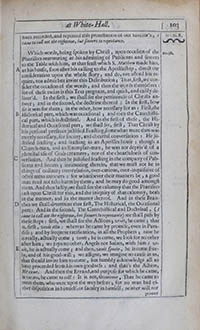 at White-Hall.
103
Serm.8.
at White-Hall.
103
Serm.8.
hath recorded, and repeated this protestation of our Saviour's,
I came to call not the righteous, but sinners to repentance. Divisio.Which words, being spoken by Christ, upon occasion of the
Pharisees murmuring at his admitting of Publicans and sinners
to the Table with him, at that feast which S. Matthew made him,
at his house, soon after his calling to the Apostleship, direct our
consideration upon the whole story, and do, not afford but re-
quire, not admit but invite this Distribution; That, first, we con-
sider the occasion of the words, and then the words themselves:
for of these twins is this Text pregnant, and quick, and easily de-
liver'd. In the first, we shall see the pertinencie of Christs an-
swer; and in the second, the doctrine thereof: In the first, how
fit it was for them; in the other, how necessary for us: First, the
Historical part, which was occasional; and then the Catechisti-
cal part, which is doctrinal. And in the first of these, the Hi-
storical and Occasional part, we shall see, first, That Christ by
his personal presence justified Feasting, somewhat more then was
meerly necessary, for society, and chearful conversation: He ju-
stified feasting, and feasting in an Apostles house: though a
Church-man, and an Exemplar-man, he was not depriv'd of a
plentiful use of Gods creatures, nor of the chearfulness of con-
versation. And then he justified feasting in the company of Pub-
licans and sinners; intimating therein, that we must not be in
things of ordinary conversation, over-curious, over-inquisitive of
other mens manners: for whatsoever their manners be, a good
man need not take harm by them, and he may do good amongst
them. And then lastly, we shall see the calumny that the Pharisees
cast upon Christ for this, and the iniquity of that calumny, both
in the manner, and in the matter thereof. And in these Bran-
ches we shall determine that first, The Historical, the Occasional
part: And in the second, The Catechistical and Doctrinal, (I
came to call not the righteous, but sinners to repentance) we shall pass by
these steps: first, we shall see the Actions; venit, he came; that
is, first, venit actu: whereas he came by promise, even in Para-
dise; and by frequent ratification, in all the Prophets; now he
is really, actually come; venit, he is come, we look for no other
after him; we joyn no other, Angels nor Saints, with him: ve-
nit, he is actually come; and then, venit sponte, he is come free-
ly, and of his good-will; we assigne, we imagine no cause in us,
that should invite him to come, but humbly acknowledge all to
have proceeded from his own goodness: and that's the Action,
He came. And then the Errand, and purpose for which he came,
is vocare, he came to call: It is not, Occurrere, That he came to
meet them, who were upon the way before; for no man had ei-
ther disposition in himself, or faculty in himself, neither will nor power
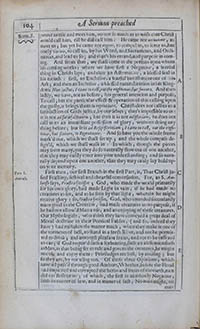 104
A Sermon preached
Serm.8.
104
A Sermon preached
Serm.8.
power to rise and meet him, no nor so much as to wish that Christ
would call him, till he did call him: He came not occurrere, to
meet us; but yet he came not cogere, to compel us, to force us, but
onely vocare, to call us, by his Word, and Sacraments, and Ordi-
nances, and lead us so; and that's his errand, and purpose in com-
ing. And from that, we shall come to the persons upon whom
his coming works: where we have first a Negative, a fearful
thing in Christs lips; and then an Affirmative, a blessed seal in
his mouth: first, an Exclusive, a fearful banishment out of his
Ark; and then an Inclusive, a blessed naturalization in his King-
dom: Non justos, I came to call, not the righteous, but sinners. And then
lastly, we have, not as before, his general intention and purpose,
To call; but the particular effect & operation of this calling upon
the godly, it brings them to repentance. Christ does not call us to a
satisfaction of Gods justice, by our selves; that's impossible to us:
it is not ad satisfactionem; but then it is not ad gloriam, he does not
call us to an immediate possession of glory, without doing any
thing before; but it is ad Resipiscentiam; I came to call, not the righ-
teous, but sinners, to Repentance. And so have you the whole frame
mark'd out, which we shall set up; and the whole compass de-
sign'd, which we shall walk in: In which, though the pieces
may seem many, yet they do so naturally flow out of one another,
that they may easily enter into your understanding; and so natu-
rally depend upon one another, that they may easily lay hold up-
on your memory. Part I.First then, our first Branch in the first Part, is, That Christ ju-
fied Feasting, festival and chearful conversation. Ambrose.For, as S. Am-
brose says, Frustra fecisset; God, who made the world primarily
for his own glory, had made Light in vain, if he had made no
creatures to see, and to be seen by that light, wherein he might
receive glory: so, frustra fecisset, God, who intended secondarily
mans good in the Creation, had made creatures to no purpose, if
he had not allow'd Man a use, and an enjoying of those creatures.
Our Mythologists, who think they have conveyed a great deal of
Moral doctrine in their Poetical Fables, (and so, indeed they
have) had mistaken the matter much, when they make it one of
the torments of hell, to stand in a fresh River, and not be permit-
ted to drink; and amongst pleasant fruits, and not to be suffered
to eat; if God requir'd such a forbearing, such an abstemiousness
in Man, as that being set to rule and govern the creatures, he might
not use and enjoy them: Priviledges are lost, by abusing; but
so they are, by not using too. Of those three Opinions, which
have all pass'd through good Authors, Whether, before the Floud
had impaired and corrupted the herbs and fruits of the earth, men
did eat flesh or no; of which, the first is absolutely Negative,
both in matter of law, and in matter of fact, No man might, no man
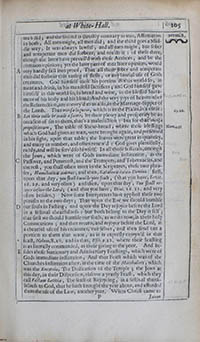 at White-Hall.
105
Serm.8.
at White-Hall.
105
Serm.8.
man did; and the second is directly contrary to this, Affirmative
in both, All men might, all men did; and the third goes a Mid-
dle way, It was always lawful, and all men might, but sober
and temperate men did forbear, and not do it: of these three,
though the later have prevail'd with those Authors, and be the
common opinion; yet the later part of that later opinion, would
very hardly fall into proof, That all their sober and temperate
men did forbear this eating of flesh, or any lawful use of Gods
creatures. God himself took his portion in this world so, in
meat and drink, in his manifold sacrifices; and God himself gave
himself in this world so, in bread and wine, in the blessed Sacra-
ment of his body and his bloud: And the very joys of heaven after
the Resurrection, are convey'd to us also, in the Marriage-supper of
the Lamb. That mensa laqueus, which is in the Psalm, is a curse:
69.22. Let their table be made a snare, let their plenty and prosperity be an
occasion of sin to them, that's a malediction: but for that mensa
propositionum, The table of Shew-bread,Num. 4.7. where those blessings
which God had given to man, were brought again, and presented
in his sight, upon that table; the loaves were great in quantity,
and many in number, and often renew'd: God gives plentifully,
richly, and will be serv'd so himself. In all those festivals, amongst
the Jews, which were of Gods immediate institution, as the
Passover, and Pentecost, and the Trumpets, and Tabernacles, and
the rest, you shall often meet in the Scriptures, these two phra-
ses, Humiliabitis animas; and then, Lætaberis coram Domino: first,
upon that day, you shall humble your souls, (that you have, Levit.
16.29. and very often) and then, upon that day, You shall re-
joyce before the Lord; (and that you have, Deut. 16.11. and very
often besides.) Now some Interpreters have applied these two
phrases to the two days; That upon the Eve we should humble
our souls in Fasting, and upon the Day rejoyce before the Lord
in a festival chearfulness: but both belong to the Day it self;
that first we should humble our souls, as we do now, in these holy
Convocations; and then return, and rejoyce before the Lord, in
a chearful use of his creatures, our selves, and then send out a
portion to them that want, as it is expresly enjoyn'd in that
feast, Nehem. 8.10. and in that, Esth. 9.22. where their feasting
is as literally commanded, as their giving to the poor. And be-
sides those Stationary and Anniversary Feastings, which were of
Gods immediate institution, And that Feast which was of the
Churches institution after, in the time of the Macchabees, which
was the Encœnia, The Dedication of the Temple; the Jews at
this day, in their Dispersion, observe a yearly Feast, which they
call Festum Letitiæ, The feast of Rejoycing, in a festival thank-
fulness to God, that he hath brought the year about, and afforded
them the use of the Law, another year. When Christ came to PJairus
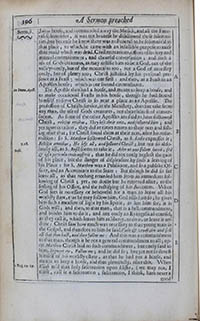 106
A Sermon preached
Serm.8.
106
A Sermon preached
Serm.8.
Jairus house, and commanded away the Musick, and all the Fune-
ral-solemnities, it was not because he disallowed those solemni-
ties, but because he knew there was no Funeral to be solemniz'd in
that place, to which he came with an infallible purpose to raise
that maid which was dead. Civil recreations, offices of society and
mutual entertainment, and chearful conversation; and such a
use of Gods creatures, as may testifie him to be a God, not of the
valleys onely, but of the mountains too, not a God of necessity
onely, but of plenty too; Christ justified by his personal pre-
sence at a Feast; which was our first: and then, at a Feast in an
Apostles house; which is our second circumstance. In Domo Apost.The Apostle then had a house, and means to keep a house, and
to make occasional Feasts in his house, though he had bound
himself to serve Christ in so near a place as an Apostle. The
profession of Christs service, in the Ministery, does not take from
any man, the use of Gods creatures, nor chearfulness of conver-
sation. As some of the other Apostles are said to have followed
Christ, relictis retibus, They left their nets, and followed him; and
yet upon occasion, they did at times return to their nets and fish-
ing after that; for Christ found them at their nets, after his resur-
rection: so S. Matthew followed Christ, as S. Luke expresses it;
5.28.Relictis omnibus, He left all, and followed Christ; but not so abso-
lutely all, as S. Basil seems to take it, Basil.Adeo ut non solum lucra, sed
& ipsa pericula contempserit, that he did not onely neglect the gain
of his place, but the danger of displeasure by such a leaving of
his Place: for S. Matthew was a Publicane, and so a publike Of-
ficer, and an Accountant to the State: But though he did so far
leave all, as that nothing retarded him from an immediate fol-
lowing of Christ; yet, no doubt but he returned after, to the
setling of his Office, and the rectifying of his Accounts. When
God sees it necessary or behoveful for a man to leave all his
worldly state, that he may follow him, God tells him so; he gives
him such a measure of light by his Spirit, as lets him see, it is
Gods will; and then, to that man, that is a full commandment,
and bindes him to do it, and not onely an Evangelical counsel,
as they call it, which leaves him at liberty, to do it, or leave it un-
done: Christ saw how much was necessary to that young man in
the Gospel, and therefore to him he said, Vade & vende, Go and sell
all that thou hast, and then follow me: And this was a commandment
to that man, though it be not a general commandment to all; up-
on Matthew Christ laid no such commandment, but onely said to
him, Sequere me, Follow me; and he did so; but yet not so devest
himself of his worldly estate, as that he had not a house, and
means to keep a house, and that plentifully, after this. When
Eliah us'd that holy fascination upon Elisha,1 Reg. 19.19. (we may not, I
think, call it a fascination; fascination, I think, hath never a good
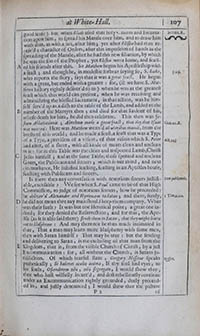 at White-Hall.
107
Serm.8.
at White-Hall.
107
Serm.8.
good sense) but when Eliah used that holy Charm and Incanta-
tion upon him, to spread his Mantle over him, and to draw him
with that, as with a net, after him; yet after Elisha had thus re-
ceiv'd a character of Orders, after this imposition of hands in the
spreading of the Mantle, after he had this new filiation, by which
he was the son of the Prophet, yet Elisha went home, and feast-
ed his friends after this. So Matthew begun his Apostleship with
a feast; and though he, in modestie forbear saying so, S. Luke,
who reports the story, says that it was a 5.29.great feast. He begun
with a great, but ended with a greater: for, (if we have S. Mat-
thews history rightly deliver'd to us) when he was at the greatest
feast which this world can present, when he was receiving and
administring the blessed Sacrament, in that action, was he him-
self serv'd up as a dish to the table of the Lamb, and added to the
number of the Martyrs then; and died for that Saviour of his,
whose death for him, he did then celebrate. This then was Gen. 21.8.fe-
stum Ablactationis; Abraham made a great feast, that day that Isaac
was weaned: Here was Matthew wean'd ab uteribus mundi, from the
brests of this world; and he made a feast, a feast that was a Type
of a TyyeType, a prevision of a vision, of that vision which S. Peter
had afterAct. 10., of a sheet, with all kinde of meats clean and unclean
in it: for at this Table was the clean and unspotted Lamb, Christ
Jesus himself; and at the same Table, those spotted and unclean
Goats, the Publicans and sinners; which is our third, and next
circumstance, He justified feasting, feasting in an Apostles house,
feasting with Publicans and sinners. Cum publicanis.Is there then any conversation with notorious sinners justifi-
able, excusable? We see when S. Paul came to be of that High
Commission, to judge of notorious sinners, how he proceeded:
he 1 Tim. 1.20.deliver'd Alexander and Hymenæus to Satan; and there, surely,
he did not mean that any man should keep them company. What
was their fault? It was but one Heretical point; a great one in-
deed; for they denied the Resurrection; and for this, the Apo-
stle (as it is also said there) sends them to Satan, that they might learn
not to blaspheme: And may there not be thus much intimated in
that, That a man may learn more blasphemy with some men,
then with Satan himself? That may be true: but the sending
and delivering to Satan, is the excluding of that man from the
Kingdom, that is, from the visible Church of Christ, by a just
Excommunication: for, all without the Church, is Satans ju-
risdiction. Of which fearful state, Gregory Nyssene speaks
pathetically; Nyssen.Si haberet oculos anima, If thy soul had eyes, to
see souls, Ostenderem tibi, tibi segregato, I would shew thee,
thee who hast wilfully incurr'd, and dost rebelliously continue
under an Excommunication rightly grounded, duely proceed-
ed in, and justly denounced; I would shew thee the picture P2of
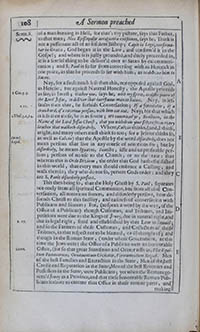 108
A Sermon preached
Serm.8.
108
A Sermon preached
Serm.8.
of a man burning in Hell, for that's thy picture, says that Father,
to that man; Non Episcopalis arrogantiæ existimes, says he, Think it
not a passionate act of an insolent Bishop; Cæpit in Lege, confirma-
tur in Gratia, God began it in the Law, and confirm'd it in the
Gospel; and where it is justly grounded, and duely proceeded in,
it is a fearful thing to be deliver'd over to Satan by excommuni-
cation; and S. Paul is so far from conversing with an Heretick in
one point, as that he proceeds so far with him, as to deliver him to
Satan. Nay, for a fault much less then this, not opposed against God,
as Heresie, but against Natural Honesty, the Apostle proceeds
as far, in Incest; 1 Cor. 5.5.Gather you, says he, with my spirit, and the power of
the Lord Jesus, to deliver that incestuous man to Satan. Nay, in less
faults then that, he forbids Conversation; v. 11.If a fornicator, if a
drunkard, if a covetous person, with him eat not. Nay; for that which
is less then these, he is as severe; 2 Thes. 3.6,14.We command ye, Brethren, in the
Name of the Lord Jesus Christ, that you withdraw your selves from every
brother that walketh disorderly. Where, Calvin thinks, (and, I think,
aright, and many others must think so too; for a Jesuite thinks so,
as well as Calvin) that the Apostle by the word disorderly,Cornel.
Lapid. does not
mean persons that live in any course of notorious sin; but by
disorderly, he means Ignavos, Inutiles, idle and unprofitable per-
sons; persons of no use to the Church, or to the State: that
whereas this is Ordo Divinus, the order that God hath established
in this world, that every man should embrace a Calling, and
walk therein; they who do not so, pervert Gods order: and they
are S. Pauls disorderly persons. This then being so, that the Holy Ghost by S. Paul, separates
not onely from all spiritual Communion, but from all civil Con-
versation, all notorious sinners, and disorderly persons, how de-
scends Christ to this facility, and easiness of conversation with
Publicans and Sinners? For, (to speak a word by the way, of the
Office of a Publican) though Customes, and Tributes, and Im-
positions were due to the Kings of Jewry, due in natural right, and
due in legal right, fixed and established by that Law in 1.17.Samuel;
and so the Farmers of those Customes, and Collectors of those
Tributes, in that respect not to be blamed, or ill thought of; and
though in the Roman State, (under whose Government, at this
time the Jews were) the Office of a Publican were an honourable
Office, (for so that great Statesman and Orator tells us, Cicero.Flos Equi-
tum Romanorum, Ornamentum Civitatis, Firmamentum Reipub. Men
of the best Families and Extraction in the State, Men of the best
Credit and Reputation in the State, Men of the best Revenues and
Possession in the State, were Publicans; yet when the Romans go-
vern'd Jewry as a Province, and that these honourable Roman Pub-
licans forbore to execute that Office in those remote parts, and making
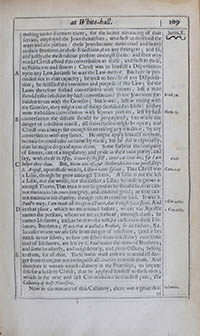 at White-hallWhite-Hall.
109
Serm.8.
at White-hallWhite-Hall.
109
Serm.8.
making under-Farmers there, for the better advancing of that
service, employed the Jews themselves, who best understood the
ways and the persons: these Jews became more cruel and heavy
to their Brethren, in these Exactions, then any strangers; and so,
and justly, the most odious persons amongst them: and then why
would Christ afford this conversation to these, and such as these,
to Publicans and sinners? Christ was in himself a Dispensation
upon any Law, because he was the Law-maker. But here he pro-
ceeded not in that capacity; he took no benefit of any Dispensa-
tion; he fulfilled the intention and purpose of the Law; for the
Laws therefore forbad conversation with sinners, lest a man
should take infection by such conversation:Exod. 34. so the Jews were for-
bidden to eat with the Gentiles; but it was, lest in eating with
the Gentiles, they might eat of things sacrificed to Idols: so they
were forbidden conversation with leprous persons,Num. 5. lest by such
conversation the disease should be propagated; but where the
danger of infection ceas'd, all conversation might be open; and
Christ was always far enough from taking any infection, by any
conversation with any sinner. He might apply himself to them,
because he could take no harm by them; but he did it especially,
that he might do good upon them. Some forbear the company
of sinners, out of a singularity, and pride in their own purity, and
say, with those in 65.5.Esay, Stand by thy self, come not near me, for I am
holyer then thou. But, Bonus non est, qui Malos tolerare non potest, says
S. August. upon those words, Cant. 2.2.Lilium inter spinas, That Christ was
a Lilie, though he grew amongst Thorns. A Lilie is not the less
a Lilie, nor the worse, nor the darker a Lilie, because it grows a-
mongst Thorns. That man is not so good as he should be, that can-
not maintain his own integrity, and continue good; or that can-
not maintain his charity, though others continue bad. It was S.
Paul's way, 1 Cor. 9.22.I am made all things to all men, that I might save some. And
in that place1 Cor. 5.11., which we mentioned before, where the Apostle
names the persons, whom we are to forbear, amongst them, he
names Idolators; and, as he does the rest, he calls even those Ido-
lators, Brethren; If any that is called a Brother, be an Idolator, &c.
In cases where we are safe from danger of infection, (and it lies
much in our selves, to save our selves from infection) even some
kind of Idolators, are left by S. Paul under the name of Brethren;
and some brotherly, and neighbourly, and pious Offices, belong
to them, for all that. These faults must arm me to avoid all dan-
ger from them, but not extinguish all charity towards them. And
therefore it was an unjust calumny in the Pharisees, to impute
this for a fault to Christ, that he applyed himself to these men;
which is the next and last Circumstance in this first part, The
Calumny of these Pharisees. Calumnia.Now in the manner of this Calumny, there was a great deal of
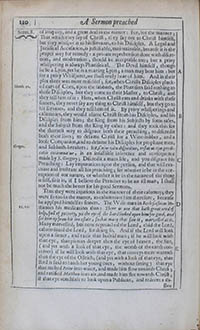 110
A Sermon preached
Serm.8.
110
A Sermon preached
Serm.8.
of iniquity, and a great deal in the matter: For, for the manner;
That which they say of Christ, they say not to Christ himself,
but they whisper it to his servants, to his Disciples. A Legal and
Juridical Accusation, is justifiable, maintainable, because it is the
proper way for remedy: a private reprehension done with discre-
tion, and moderation, should be acceptable too; but a privy
whispering is always Pharisaical. The Devil, himself, though
he be a Lyon, yet he is a roaring Lyon; a man may hear him: but
for a privy Whisperer, we shall onely hear of him. And in their
plot there was more mischief; for, Matth. 12.when Christs Disciples pluck-
ed ears of Corn, upon the sabbath, the Pharisees said nothing to
those Disciples, but they come to their Master, to Christ, and
they tell him of it: Here, when Christ eats and drinks with these
sinners, they never say any thing to Christ himself, but they go to
his servants, and they tell him of it. By privy whisperings and
calumnies, they would aliene Christ from his Disciples, and his
Disciples from him; the King from his Subjects by some tales,
and the Subject from the King by otherothers: and they took this for
the shortest way to disgrace both their preaching, to discredit
both their lives; to defame Christ for a Wine-bibber, and a
loose Companion, and to defame his Disciples for prophane men,
and Sabbath-breakers: for, Gregor. Cujus vita despicitur, restat ut ejus predi-
catio contemnatur, is an infallible inference and consequence
made by S. Gregory; Discredit a mans life, and you disgrace his
Preaching: Lay imputations upon the person, and that will eva-
cuate and frustrate all his preaching; for whether it be in the cor-
ruption of our nature, or whether it be in the nature of the thing
it self, so it is, if I believe the Preacher to be an ill man, I shall
not be much the better for his good Sermons. Thus they were injurious in the manner of their calumny; they
were so too in the matter, to calumniate him therefore, because
he applyed himself to sinners. The Wise-man in Ecclesiasticus in-
stitutes his meditation thus: 11.12.There is one that hath great need of
help, full of poverty, yet the eye of the Lord looked upon him for good, and
set him up from his low estate, so that many that saw it, marvelled at it.
Many marvelled, but none reproached the Lord, chid the Lord,
calumniated the Lord, for doing so. And if the Lord will look
upon a sinner, and raise that bedrid man; if he will look with
that eye, that pierces deeper then the eye of heaven, the Sun,
(and yet with a look of that eye, the womb of the earth con-
ceives) if he will look with that eye, that conveys more warmth
then the eye of the Ostrich, (and yet with a look of that eye, that
Bird is said to hatch her young ones, without sitting) that eye
that melted Peter into water, and made him flow towards Christ;
and ratified Matthew into air, and made him flee towards Christ;
if that eye vouchsafe to look upon a Publican, and redeem a Go-
shen
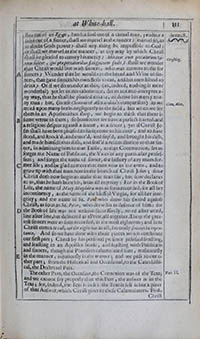 at White-hallWhite-Hall.
111
Serm.8.
shen out of an Egypt, hatch a soul out of a carnal man, produce a
at White-hallWhite-Hall.
111
Serm.8.
shen out of an Egypt, hatch a soul out of a carnal man, produce a
saint out of a sinner, shall we marvel at the matter? marvel so, as
to doubt Gods power? shall any thing be impossible to God?
or shall we marvel at the manner, at any way by which Christ
shall be pleased to convey his mercy? Chrysolog.Miraris eum peccatorum vi-
num bibere, qui pro peccatoribus sanguinem fudit? shall we wonder
that Christ would live with sinners, who was content to die for
sinners? Wonder that he would eat the bread and Wine of sin-
ners, that gave sinners his own flesh to eat, and his own blood to
drink? Or if we do wonder at this, (as, indeed, nothing is more
wonderful) yet let us not calumniate, let us not mis-interpret a-
ny way, that he shall be pleased to take, to derive his mercy to a-
ny man: but, (to use Clement of Alexandria's comparison) Clem. Alex.as we
tread upon many herbs negligently in the field, but when we see
them in an Apothecaries shop, we begin to think that there is
some vertue in them; so howsoever we have a perfect hatred, and
a religious despite against a sinner, as a sinner; yet if Christ Je-
sus shall have been pleased to have come to his door, and to have
stood, and knock'd, and enter'd, and sup'd, and brought his dish,
and made himself that dish, and seal'd a reconciliation to that sin-
ner, in admitting him to that Table, to that Communion, let us
forget the Name of Publican, the Vices of any particular profes-
sion; and forget the name of sinner, the history of any mans for-
mer life; and be glad to meet that man now in the arms, and to
grow up with that man now in the bowels of Christ Jesus; since
Christ doth now begin to make that man his, but now declares
to us, that he hath been his, from all eternity: For in the Book of
Life, the name of Mary Magdalen was as soon recorded, for all her
incontinency, as the name of the blessed Virgin, for all her inte-
grity; and the name of St. Paul who drew his sword against
Christ, as soon as St. Peter, who drew his in defence of him: for
the Book of life was not written successively, word after word,
line after line, but delivered as a Print, all together. There the grea-
test sinners were as soon recorded, as the most righteous; and here
Christ comes to call, not the righteous at all, but onely sinners to repen-
tance. And so we have done with those pieces which constitute
our first part; Christ by his personal presence justified feasting,
and feasting in an Apostles house, and feasting with Publicans
and sinners, though the Pharisees calumniated him, malitiously
in the manner, injuriously in the matter; and we pass to our o-
ther part; from the Historical and Occasional, to the Catechisti-
cal, the Doctrinal Part. Part II.The other Part, the Occasion, the Connexion was of the Text;
and we cannot say properly that this Part, the answer is in the
Text; for, indeed, the Text is in it: the Text it self is but a piece
of that Answer, which Christ gives to these Calumniators. First, Christ
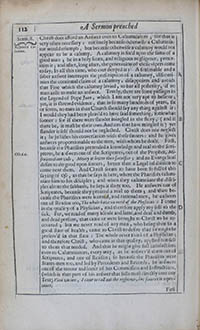 112
A Sermon preached
Serm.8.
112
A Sermon preached
Serm.8.
Christ does afford an Answer even to Calumniators;Respondet Ca-
lumniæ. for that is
very often necessary: not onely because otherwise a Calumnia-
tor would triumph, but because otherwise a calumny would not
appear to be a calumy. A calumny is fix'd upon the fame of a
good man; he in a holy scorn, and religious negligence, preter-
mits it; and after, long after, the generation of those vipers come
to say, In all this time, who ever denyed it? A seasonable and a
sober answer interrupts the prescription of a calumny, disconti-
nues the continual claim of a calumny, disappoints and avoids
that Fine which the calumny levied, to bar all posterity, if no
man arise to make an answer. Truely, there are some passages in
the Legend of Pope Joan, which I am not very apt to believe;
yet, it is shrewd evidence, that in so many hundreds of years, six
or seven, no man in that Church should say any thing against it:
I would they had been pleas'd to have said something, somewhat
sooner: for if there were slander mingled in the story, (and if
there be, it must be their own Authors that have mingled it) yet
slander it self should not be neglected. Christ does not neglect
it; he justifies his conversation with these sinners: and he gives
answers proportionable to the men, with whom he dealt. First,
because the Pharisees pretended a knowledge and zeal to the Scri-
ptures, he answers out of the Scriptures, out of the Prophet, Ose 6.6.Mi-
sericordiam volo, Mercy is better then sacrifice; and an Evangelical
desire to do good upon sinners, better then a Legal inhibition to
come near them. And Christ seems to have been so full of this
saying of Ose, as that he says it here, where the Pharisees calum-
niate him to his disciples; and when they calumniate the disci-
ples about the sabbath, he says it there too. He answers out of
Scriptures, because they pretend a zeal to them; and then be-
cause the Pharisees were learned, and rational men, he answers
out of Reason too, The whole have no need of the Physician: I come
in the quality of a Physician, and therefore apply my self to the
sick. For, we read of many blinde and lame, and deaf and dumb,
and dead persons, that came or were brought to Christ to be re-
covered; but we never read of any man, who being then in a
good state of health, came to Christ to desire that he might be
preserv'd in that state: The whole never think of a Physician;
and therefore Christ, who came in that quality, applied himself
to them that needed. And that he might give full satisfaction,
even to Calumniators, every way, as he answer'd them out of
Scriptures, and out of Reason; so because the Pharisees were
States-men too, and led by Precedents and Records, he answers
out of the tenour and letter of his Commission and Instructions,
(which is that part of his answer that falls most directly into our
Text) Veni vocare, I came to call not the righteous, but sinners to repen-
tance. First
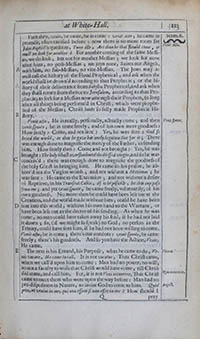 at White-Hall.
113
Serm.8.
First then, venit, he came, he is come: venit actu; he came in Venit Actu.
at White-Hall.
113
Serm.8.
First then, venit, he came, he is come: venit actu; he came in Venit Actu.
promise, often ratified before: now there is no more room for
John Baptist's question, Tune ille, Art thou he that should come, or
must we look for another? For another coming of the same Messi-
as, we do look, but not for another Messias; we look for none
after him, no post-Messias; we joyn none, Saints nor Angels,
with him, no sub-Messias, no vice-Messias. The Jews may as
well call the history of the Floud Prophetical, and ask when the
world shall be drown'd according to that Prophecie; or the hi-
story of their deliverance from Babylon Prophetical, and ask when
they shall return from thence to Jerusalem, according to that Pro-
phecie, as seek for a Messias now amongst their Prophets, so long
after all things being perform'd in Christ, which were prophe-
sied of the Messias; Christ hath so fully made Prophecie Hi-
story. Venit sponte.Venit actu, He is really, personally, actually come; and then
venit sponte, he is come freely, and of his own meer goodness:
How freely? Come, and not sent? Yes, he was sent: God so
loved the world, as that he gave his onely begotten Son for it; There
was enough done to magnifie the mercy of the Father, in sending
him. How freely then? Come and not brought? Yes, he was
brought: The holy Ghost overshadowed the blessed virgin, and so he was
conceiv'd: there was enough done to magnifie the goodness of
the holy Ghost in bringing him. He came to his prison, he ab-
horr'd not the Virgins womb; and not without a Mittimus; he
was sent: He came to the Execution; and not without a desire
of Reprieve, in his Transeat Calix, If it be possible, let this cup pass
from me; and yet venit sponte, he came freely, voluntarily, of his
own goodness. No more then he could have been left out at the
Creation, and the world made without him, could he have been
sent into this world, without his own hand to the Warrant, or
have been left out at the decree of his sending. As when he was
come, no man could have taken away his soul, if he had not laid
it down; so, (if we might so speak) no God, no person in the
Trinity, could have sent him, if he had not been willing to come.
Venit actu, he is come; there's our comfort: venit sponte, he came
freely; there's his goodness. And so you have the Action, Venit,
He came. Vocare. The next is his Errand, his Purpose, what he came to do, Ve-
nit vocare, He came to call. It is not vocatus, That Christ came,
when we call'd upon him to come: Man had no power, no will,
no not a faculty to wish that Christ would have come, till Christ
did come, and call him. Non occurrere.For, it is not Veni occurrere, That Christ
came to meet them who were upon the way before: Man had no
pre-disposition in Nature, to invite God to come to him. August.Quid
peto, ut venias in me, qui non essem si non esses in me How should I Qpray
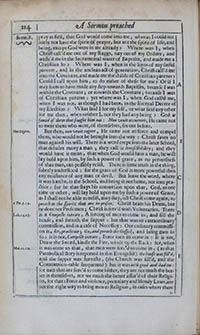 114
A Sermon preached
Serm.8.
114
A Sermon preached
Serm.8.
pray at first, that God would come into me, when as I could not
onely not have the spirit of prayer, but not the spirit of life, and
being, except God were in me already? Where was I, when
Christ call'd me out of my Raggs, nay out of my Ordure, and
wash'd me in the Sacramental water of Baptism, and made me a
Christian so? Where was I, when in the loyns of my sinful
parents, and in the unclean act of generation, Christ call'd me
into the Covenant, and made me the childe of Christian parents?
Could I call upon him, to do either of these for me? Or if I
may seem to have made any step towards Baptism, because I was
within the Covenant; or towards the Covenant, because I was
of Christian parents: yet where was I, when God call'd me,
when I was not, as though I had been, in the Eternal Decree of
my Election? What said I for my self, or what said any other
for me then, when neither I, nor they had any being? God is
found of them that sought him not: Non venit occurrere, He came not
to meet them who were, of themselves, set out before. Non Cogere.But then, non venit cogere, He came not to force and compel
them, who would not be brought into the way: Christ saves no
man against his will. There is a word crept into the later School,
that deludes many a man; they call it Irresistibility; and they
would have it mean, that when God would have a man, he will
lay hold upon him, by such a power of grace, as no perversness
of that man, can possibly resist. There is some truth in the thing,
soberly understood: for the grace of God is more powerful then
any resistance of any man or devil. But leave the word, where
it was hatcht, in the School, and bring it not home, not into pra-
ctice: for he that stays his conversion upon that, God, at one
time or other, will lay hold upon me by such a power of Grace,
as I shall not be able to resist, may stay, till Christ come again, to
1 Pet. 3.19.preach to the spirits that are in prison. Christ beats his Drum, but
he does not Press men; Christ is serv'd with Voluntaries. There
is a Luk. 14.23.Compelle intrare, A forcing of men to come in, and fill the
house, and furnish the supper: but that was an extraordinary
commission, and in a case of Necessity: Our ordinary commissi-
on is, Ite, prædicate; Go, and preach the Gospel, and bring men in
so: it is not, Compelle intrare, Force men to come in: it is not,
Draw the Sword, kindle the Fire, winde up the Rack: for, when
it was come to that, that men were forc'd to come in, (as that
Parabolical story is reported in this Evangelist) Mat. 22.10.the house was fill'd,
and the supper was furnisht, (the Church was fill'd, and the
Communion-table frequented) but it was with good and bad too:
for men that are forc'd to come hither, they are not much the bet-
ter in themselves, nor we much the better assur'd of their Religi-
on, for that: Force and violence, pecuniary and bloudy Laws, are
not the right way to bring men to Religion, in cases where there is
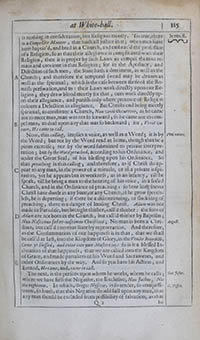 at White-hallWhite-Hall.
115
Serm.8.
at White-hallWhite-Hall.
115
Serm.8.
is nothing in consideration, but Religion meerly. 'Tis true, there
is a Compellite Manere, that hath all justice in it; when men have
been baptiz'd, and bred in a Church, and embrac'd the profession
of a Religion, so as that their allegiance is complicated with their
Religion, then it is proper by such Laws to compel them to re-
main and continue in that Religion; for in the Apostacy, and
Defection of such men, the State hath a detriment, as well as the
Church; and therefore the temporal sword may be drawn as
well as the spiritual; which is the case between those of the Ro-
mish perswasion, and us: their Laws work directly upon our Re-
ligion; they draw blood meerly for that, ours work directly up-
on their allegiance, and punish only where pretence of Religion
colours a Defection in allegiance. But Christs end being meerly
spiritual, to constitute a Church, Non venit Occurrere, as he came
not to meet man, man was not so forward; so he came not to com-
pel man, to deal upon any that was so backward; for, Venit vo-
care, He came to call. Veni vocare.Now, this calling, implies a voice, as well as a Word; it is by
the Word; but nor by the Word read at home, though that be a
pious exercise; nor by the word submitted to private interpre-
tation; but by the Word preached, according to his Ordinance, and
under the Great Seal, of his blessing upon his Ordinance. So
that preaching is this calling; and therefore, as if Christ do ap-
pear to any man, in the power of a miracle, or in a private inspi-
ration, yet he appears but in weakness, as in an infancy, till he
speak, till he bring a man to the hearing of his voice, in a setled
Church, and in the Ordinance of preaching: so how long soever
Christ have dwelt in any State, or any Church, if he grow speech-
less, he is departing; if there be a discontinuing, or slackning of
preaching, there is a danger of loosing Christ. Adam was not
made in Paradise, but brought thither, call'd thither: the sons of
Adam are not born in the Church, but call'd thither by Baptism;
August.Non Nascimur sed re-nascimur Christiani; No man is born a Chri-
stian, but call'd into that state by regeneration. And therefore,
as the Consummation of our happiness is in that, that we shall
be call'd at last, into the Kingdom of Glory, in the Venite Benedicti,
Come ye blessed, and enter into your Masters joy: so is it a blessed In-
choation of that happiness, that we are called into the Kingdom
of Grace, and made partakers of his Word and Sacraments, and
other Ordinances by the way. And so you have his Action, and
Errand, He came, and, came to call. Non Justos.The next, is the persons upon whom he works, whom he calls;
where we have first the Negative, the Exclusive, Non Justos, Not
the righteous. In which, G. Nyssen.Grego: Nyssene, is so tender, so compassi-
onate, so loath, that this Negative should fall upon any man, that
any man should be excluded from possibility of salvation, as that Q2he
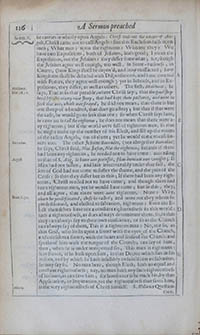 116
A Sermon preached
Serm.8.
116
A Sermon preached
Serm.8.
he carries it wholly upon Angels: Christ took not the nature of An-
gels, Christ came not to call Angels: But this Exclusion falls upon
men; What men? upon the righteous: Who are they? We
have two Expositions, both of Jesuites, both good; I mean the
Expositions, not the Jesuites: they differ somewhat; for, though
the Jesuites agree well enough, too well, in State-business, in
Courts, (how Kings shall be depos'd, and how massacred; how
Kingdoms shall be deluded with Dispensations, and how invaded
with Forces, they agree well enough) yet in Schools, and in Ex-
positions, they differ, as well as others. The first, Maldonat. Maldonat, he
says, That as in that parable, where Christ says, that Mat. 18.12.the good shep-
herd left the ninety nine sheep, that had kept their pastures, and went to
seek that one, which was strayed, he did not mean, that there is but
one sheep of a hundred, that does go astray; but that if that were
the case, he would go to seek that one: so when Christ says here,
he came not to call the righteous, he does not mean that there were a-
ny righteous; but if the world were full of righteous men, so that
he might make up the number of his Elect, and fill up the rooms
of the fallen Angels, out of them; yet he would come to call sin-
ners too. The other Jesuite Barradas. Barradas, (not altogether Barrabas)
he says, Christ said, Non Justos, Not the righteous, because if there
had been any righteous, he needed not to have come: according
to that of S. Aug. August.Si homo non periisset, filius hominis non venisset; If
Man had not fallen, and lain irrecoverably under that fall, the
Son of God had not come to suffer the shame, and the pain of the
Cross: so that they differ but in this; If there had been any righ-
teous, Christ needed not to have come; and though there had
been righteous men, yet he would have come; but in this, they,
and all agree, that there were none righteous. None? Why,
Rom. 8.30.whom he predestinated, those he called; and were not they whom he
predestinated, and elected to salvation, righteous? Even the E-
lect themselves have not a constant righteousness in this world:
such a righteousness, as does always denominate them, so, as that
they can always say to their own conscience, or so as the Church
can always say of them, This is a righteous man: No, nor so, as
that God, who looks upon a sinner with the eyes of the Church,
and considers a sinner, with the heart and sense of the Church, and
speaks of him with the tongue of the Church, can say of him,
then, when he is under unrepented sin, This man is righteous:
howsoever, if he look upon him, in that Decree which lies in his
bosom, and by which he hath infallibly ordain'd him to salvation,
he may say so. No man here, though Elect, hath an equal and
constant righteousness; nay, no man hath any such righteousness
of his own, as can save him; for howsoever it be made his, by that
Application, or Imputation, yet the righteousness that saves him,
is the very righteousness of Christ himself.Hilarie. S. Hilaries Question then,
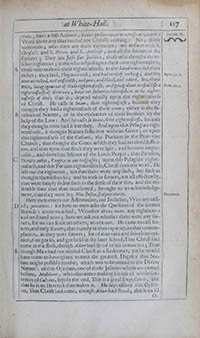 at White-Hall.
117
Serm.8.
at White-Hall.
117
Serm.8.
then, hath a full Answer, Erant quibus non erat necesse ut ventret?
Were there any that needed not Christs coming? No; there
were none; who then are these righteous? we answer with S.
Chrysost. and S. Hiero. and S. Ambrose, and all the stream of the
Fathers; They are Justi sua Justitia, those who thought them-
selves righteous; those who relyed upon their own righteousness;
those who mistook their righteousness, as the Laodiceans did their
riches; they said, Apoc. 3.17. They were rich, and had need of nothing; and they
were wretched, and miserable, and poor, and blind, and naked. So, these
men, Rom. 10.3.being ignorant of Gods righteousness, and going about to establish a
righteousness of their own, have not submitted themselves to the righte-
ousness of God; that is, depend wholly upon the righteousness
of Christ. He calls it Suam, their righteousness, because they
thought they had a righteousness of their own; either in the fa-
culties of Nature, or in the exaltation of those faculties by the
help of the Law: And he calls it Suam, their righteousness, because
they thought none had it but they. And upon this Pelagian righ-
teousness, it thought Nature sufficient without Grace; or upon
this righteousness of the Cathari, the Puritans in the Primitive
Church, that thought the Grace which they had received suffici-
ent, and that upon that stock they were safe, and become impec-
cable, and therefore left out of the Lords Prayer, that Petition,
Dimitte nobis, Forgive us our trespasses; upon this Pelagian righte-
ousness, and this Puritan righteousness, Christ does not work. He
left out the righteous, not that there were any such, but such as
thought themselves so; and he took in sinners, not all effectually,
that were simply so, but such as the sense of their sins, and the mi-
serable state that that occasioned, brought to an acknowledge-
ment, that they were so; Non Justos, sed peccatores. Peccatores.Here then enters our Affirmative, our Inclusive, Who are call-
ed; peccatores: for here no man asks the Question of the former
Branch: there we asked, Whether there were any righteous?
and we found none; here we ask not whether there were any sin-
ners, for we can finde no others, no not one. He came to call sin-
ners, and only sinners; that is, only in that capacity, in that contem-
plation, as they were sinners; for of that vain and frivolous opi-
nion, that got in, and got hold in the later School, That Christ had
come in the flesh, though Adam had stood in his innocence; That
though Man had not needed Christ as a Redeemer, yet he would
have come to have given to man the greatest Dignity that Na-
ture might possibly receive, which was to be united to the Divine
Nature: of this Opinion, one of those Jesuites whom we named
before, Maldonat, who oftentimes making his use of whole sen-
tences of Calvins, says in the end, This is a good Exposition, but
that he is an Heretick that makes it. He says also of this Opini-
on, That Christ had come, though Adam had stood; this is an ill Opinion
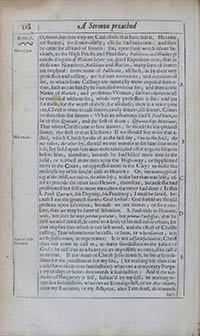 118
A Sermon preached
Serm.8.
118
A Sermon preached
Serm.8.
Opinion, but that they are Catholicks that have said it. He came
for sinners; for sinners onely; else he had not come: and then
he came for all kind of sinners: for, upon those words of our Sa-
viours, to the High Priests and Pharisees, Mat. 21.31.Publicans and Harlots go
into the Kingdom of Heaven before you, good Expositors note, that in
those two Notations, Publicans and Harlots, many sorts of sinners
are implyed: in the name of Publicans, all such, as by their very
profession and calling, are led into tentations, and occasions of
sin, to which some Callings are naturally more exposed then o-
ther o-
ther, such as can hardly be exercised without sin; and then in the
Name of Harlots, and prostitute Women, such as cannot at all
be exercised without sin; whose very profession is sin: and yet
for these, for the worst of these, for all these, there is a voice gone
out, Christ is come to call sinners, onely sinners, all sinners. Comes
he then thus for sinners? What an advantage had S. Paul then, to
be of this Quorum, and the first of them; Quorum Ego Maximus,
That when Christ came to save sinners, he should be the greatest
sinner, the first in that Election? If we should live to see that a-
cted, which Christ speaks of at the last day, Mat. 24.41.Two in the field, the
one taken, the other left, should we not wonder to see him that were
left, lay hold upon him that were taken, and offer to go to Heaven
before him, therefore, because he had killed more men in the
field, or robbed more men upon the High-way, or supplanted
more in the Court, or oppressed more in the City? to make the
multiplicity of his sins, his title to Heaven? Or, two women grind-
ing at the Mill, one taken, the other left; to see her that was left, of-
fer to precede the other into Heaven, therefore, because she had
prostituted her self to more men, then the other had done? Is this
S. Pauls Quorum, his Dignity, his Prudency; I must be saved, be-
cause I am the greatest sinner? God forbid: God forbid we should
presume upon salvation, because we are sinners; or sin there-
fore, that we may be surer of salvation. S. Pauls title to Heaven,
was, not that he was primus peccator, but primus Confessor, that he
first accused himself, & came to a sense of his miserable estate; for
that implies that which is our last word, and the effect of Christs
calling, That whomsoever he calls, or how, or whensoever, it is
ad Resipiscentiam, to repentance. It is not Non ad satis-
factionem. ad satisfactionem, Christ
does not come to call us, to make satisfaction to the justice of
God: he call'd us to a heavy, to an impossible account, if he call'd
us to that. If the death of Christ Jesus himself, be but a satisfa-
ction for the punishment for my sins, (for nothing less then that
could have made that satisfaction) what can a temporary Purga-
tory of days or hours do towards a satisfaction? And if the tor-
ments of Purgatory it self, sustain'd by my self, be nothing to-
wards a satisfaction, what can an Evenings fast, or an Ave Marie,
from my Executor, or my Assignee, after I am dead, do towards such
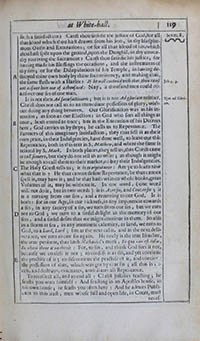 at White-hallWhite-Hall.
119
Serm.8.
at White-hallWhite-Hall.
119
Serm.8.
such a satisfaction? Canst thou satisfie the justice of God, for all
that blood which thou hast drawn from his Son, in thy blasphe-
mous Oaths and Execrations; or for all that blood of his, which
thou hast spilt upon the ground, upon the Dunghil, in thy unwor-
thy receiving the Sacrament? Canst thou satisfie his justice, for
having made his Blessings the occasions, and the instruments of
thy sins; or for the Dilapidations of his Temple, in having de-
stroyed thine own body by thine incontinency, and making that,
the same flesh with a Harlot? Job 9.9. If he will contend with thee, thou canst
not answer him one of a thousand: Nay, a thousand men could not
answer one sin of one man. Non ad Glori-
am.It is not then Ad satisfactionem; but it is not Ad gloriam neither.
Christ does not call us to an immediate possession of glory, with-
out doing any thing between. Our Glorification was in his in-
tention, as soon as our Election: in God who sees all things at
once, both entred at once; but in the Execution of his Decrees
here, God carries us by steps; he calls us to Repentance. The
Farmers of this imaginary satisfaction, they that fell it at their
own price, in their Indulgencies, have done well, to leave out this
Repentance, both in this text in S. Matthew, and where the same is
related by S. Mark. In both places, they tell us, that Christ came
to call sinners, but they do not tell us to what; as though it might
be enough to call them to their market, to buy their Indulgencies.
The Holy Ghost tells us; it is to repentance: Are ye to learn now
what that is? He that cannot define Repentance, he that cannot
spell it, may have it; and he that hath written whole books, great
Volumes of it, may be without it. In one word, (one word
will not do it, but in two words) it is Aversio, and Conversio; it
is a turning from our sins, and a returning to our God. It is
both: for in our Age, in our Sickness, in any impotencie towards
a sin, in any satiety of a sin, we turn from our sin, but we turn
not to God; we turn to a sinful delight in the memory of our
sins, and a sinful desire that we might continue in them. So also
in a storm at sea, in any imminent calamity, at land, we turn to
God, to a Lord, Lord; but at the next calm, and at the next deli-
verance, we turn to our sin again. He onely is the true Israelite,
the true penitent, that hath Nathaniel's mark, In quo non est dolus,
In whom there is no deceit: For, to sin, and think God sees it not,
because we confess it not; to confess it as sin, and yet continue
the practise of it; to discontinue the practise of it, and continue
the possession of that, which was got by that sin; all this is de-
ceit, and destroys, evacuates, annihilates all Repentance. To recollect all, and to end all: Christ justifies feasting; he
feasts you with himself: And feasting in an Apostles house, in
his own house; he feasts you often here: And he admits Publi-
cans to this feast, men whose full and open life, in Court, must neces-
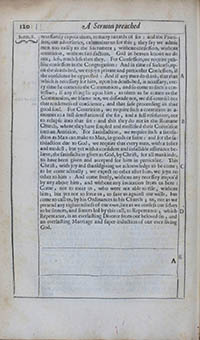 120
A Sermon preached
Serm.8.
120
A Sermon preached
Serm.8.
necessarily expose them, to many hazards of sin: and the Phari-
sees, our adversaries, calumniate us for this; they say we admit
men too easily to the Sacrament; without confession, without
contrition, without satisfaction. God in heaven knows we do
not; less, much less then they. For Confession, we require pub-
like confession in the Congregation: And in time of Sickness, up-
on the death-bed, we enjoyn private and particular Confession, if
the conscience be oppressed: And if any man do think, that that
which is necessary for him, upon his death-bed, is necessary, eve-
ry time he comes to the Communion, and so come to such a con-
fession, if any thing lie upon him, as often as he comes to the
Communion, we blame not, we disswade not, we dis-counsel not
that tenderness of conscience, and that safe proceeding in that
good soul. For Contrition, we require such a contrition as a-
mounts to a full detestation of the sin, and a full resolution, not
to relapse into that sin: and this they do not in the Romane
Church, where they have soupled and mollified their Contrition
into an Attrition. For Satisfaction, we require such a satisfa-
ction as Man can make to Man, in goods or fame: and for the sa-
tisfaction due to God, we require that every man, with a sober
and modest, but yet with a confident and infallible assurance be-
lieve, the satisfaction given to God, by Christ, for all mankinde,
to have been given and accepted for him in particular. This
Christ, with joy and thanksgiving we acknowledge to be come;
to be come actually; we expect no other after him, we joyn no
other to him: And come freely, without any necessity impos'd
by any above him, and without any invitation from us here:
Come, not to meet us, who were not able to rise, without
him; but yet not to force us, to save us against our wills, but
come to call us, by his Ordinances in his Church; us, not as we
pretend any righteousness of our own, but as we confess our selves
to be sinners, and sinners led by this call, to Repentance; which
Repentance, is an everlasting Divorce from our beloved sin, and
an everlasting Marriage and super-induction of our ever-living
God. A
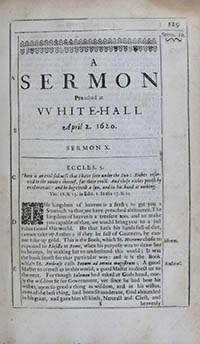 129
Serm.10.Serm.9.
A
129
Serm.10.Serm.9.
A SERMON
Preached at
VVHITE-HALLWHITE-HALL
April 2. 1620.
SERMON X. ECCLES. 5.
There is an evil sickness that I have seen under the Sun: Riches reser-
ved to the owners thereof, for their evill. And these riches perish by
evil travail: and he begetteth a son, and in his hand is nothing.
Ver. 12. & 13. in Edit. 1. In alia 13. & 14. THeThe kingdom of heaven is a feast; to get you a
Stomach to that, we have preached abstinence. The
kingdom of heaven is a treasure too, and to make
you capable of that, we would bring you to a just
valuation of this world. He that hath his hands full of dirt,
cannot take up Amber; if they be full of Counters, he can-
not take up gold. This is the Book, which Hierm.St. Hierome chose to
expound to Blesilla at Rome, when his purpose was to draw her
to heaven, by making her to understand this world; It was
the book fittest for that particular way: and it is the Book
which St. Ambrose calls Ambros.Bonum ad omnia magistrum; A good
Master to correct us in this world, a good Master to direct us to
the next. For though Solomon had asked at Gods hand, one-
ly the wisdom fit for Government, yet since he had bent his
wishes, upon so good a thing as wisdom, and in his wishes,
even of the best thing, had been so moderate, God abounded
in his grant, and gave him all kinds, Naturall and Civil, and Sheavenly
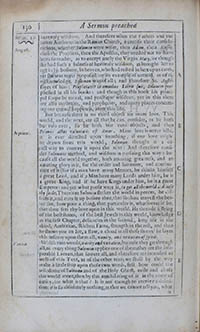 130
A Sermon preached
Serm.10.Serm.9.
130
A Sermon preached
Serm.10.Serm.9.
heavenly wisdom. And therefore when the Fathers and the
latter Authours in the Roman ChurchAugust., exercise their conside-
rations, whether Solomon were wiser, then Adam, then Moses,
then the Prophets, then the Apostles, they needed not to have
been so tender, as to except onely the Virgin Mary, for though
she had such a fulness of heavenly wisdom, as brought her to
rest in his bosome, in heaven, who had rested in hers upon earth,
yet she was never proposed for an example of natural, or of ci-
vil knowledge. Solomon was of all; and therefore St. Austin
sayes of him; Prophetavit in omnibus Libris suis, Solomon pro-
phesied in all his books; and though in this book his princi-
pal scope be moral, and practique wisdom, yet in this there
are also mysteries, and prophecies, and many places concern-
ing our eternal happiness, after this life. But because there is no third object for mans love. This
world, and the next, are all that he can consider, as he hath
but two eyes, so he hath but two objects, and then
Aquinas.Primus actus voluntatis est Amor, Mans love is never idle,
it is ever directed upon somthing, if our love might
be drawn from this world, Solomon thought it a di-
rect way to convay it upon the next: And therefore consi-
der Solomons method, and wisdom in pursuing this way: be-
cause all the world together, hath amazing greatness, and an
amazing glory in it, for the order and harmony, and continu-
ance of it (for if a man have many Manors, he thinks himself
a great Lord, and if a Man have many Lords under him, he is
a great King, and if he have Kings under him, he is a great
Emperor): and yet what profit were it, to get all the world and loose
thy soule; Therefore Solomon shakes the world in peeces, he dis-
sects it, and cuts it up before thee, that so thou mayest the bet-
ter see, how poor a thing, that particular is, whatsoever it be,
that thou sets thy love upon in this world. He threads a string
of the best stones, of the best Jewels in this world, knowledge
in the first Chapter, delicacies in the second, long life in the
third, Ambition, Riches; Fame, strength in the rest, and then
he shows you an Ice, a flaw, a cloud in all these stones? he layes
this infamy upon them all, vanity, and vexation of spirit. Vanitas.Which two words, vanity and vexation, because they go through
all, to every thing Solomon applies one of them; they are the inse-
parable Laeven, that sowers all, and therefore are intended as
well of this Text, as of the other text; we shall by the way
make a little stop upon those two words, first how could the
wisedome of Solomon and of the Holy Ghost, avile and abase
this world more, then by this annihilating of it in the name of
vanity, for what is that? It is not enough to receive a defini-
tion; it is so absolutely nothing, as that we cannot tell you, what it
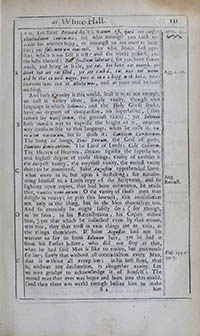 131
at White-Hall.
Serm.10.Serm.9.
131
at White-Hall.
Serm.10.Serm.9.
it is. Let Saint Bernard do it; vanum est, quod nec confert
plenitudinem continenti; for who amongst you hath not
room for another bagg, or amongst us for another bene-
fice; nec fulcimentum innitenti, for who stands fast upon
that, which is not fast it self? and the world passeth, and
the lusts thereof; Nec fructum laboranti, for you have sowen
much, and bring in little, Agg. 1.16. yee eat, but have not enough, yee
drink but are not filled, yee are cloth'd, but wax not warm,
and he that earneth wages, puts it into a bagg with holes, mid-
summer runs out at Michalmas, and at years end he hath
nothing. And such a vanity is this world, least it were not enough,
to call it vanity alone, simply vanity, though that
language in which Solomon, and the Holy Ghost spoke,
have no degrees of comparison, no superlative, (they
cannot say vanissimum, the greatest vanity,) yet Solomon
hath found a way to expresse the height of it, another
way conformable to that language, when he calls it, va-
nitatem vanitatum, for so doth it; Canticum Canticorum;
The Song of Songs, Deus Deorum, the God of gods,
Dominus dominantium, The Lord of Lords; Cœli Cœlorum,
The Heaven of Heavens, alwaies signifie the superlative,
and highest degree of those things; vanity of vanities is
the deepest vanity, the emptiest vanity, the veriest vanity
that can be conceived. Saint Augustin apprehended some-
what more in it, but upon a mistaking;Aug.
Retract. for accusto-
ming himself to a Latin copy of the Scriptures, and so
lighting upon copies, that had been miswritten, he reads
that, vanitas vani antum: O the vanity of those men that
delight in vanity; he puts this lowness, this annihilation
not only in the thing, but in the Men themselves too.
And so certainly he might safely do; (for though,
as he saies, in his Retractations, his Copies misled
him,) yet that which he collected even by that errour,
was true, they that trust in vain things are as vain, as
the things themselves. If Saint Augustin had not his
warrant to say so from Solomon here, yet he had it
from his Father before, who did not stop at that,
when he had said Psal. 144.4. Man is like to vanity, but proceeeds
farther; 39.5.surely that is without all contradiction every Man,
that is without all exception; in his best state, that
is, without any declination, is altogether vanity. Let
no man grudge to acknowledge it of himself; The
second man that ever was begot and born into this world,
(and then there was world enough before him to make S2him
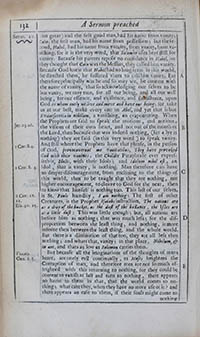 132
A Sermon preached
Serm.10.Serm.9.
132
A Sermon preached
Serm.10.Serm.9.
him great) and the first good man, had his name from vanity;
Cain, the first man, had his name from possession; but the se-
cond, Habel, had his name from vacuity, from vanity, from va-
nishing; for it is the very word, that Solomon uses here still for
vanity. Because his parents repose no confidence in Habel, for
they thought that Cain was the Messias, they called him vanity.
Because God knew that Habel had no long term in this world,
he directed them, he suffered them to call him vanity. But
therefore principally was he and so may we, be content with
the name of vanity, that so acknowledging our selves to be
but vanity, we may turn, for all our being, and all our well
being, for our essence, and existence, and subsistence, upon
God in whom onely we live and move and have our being; for take
us at our best, make every one an Abel, and yet that is but
Evanescentia in nihilum, a vanishing, an evapourating. Jer. 23.16.When
the Prophets are said to speak the motions, and notions,
the visions of their own heart, and not out of the mouth of
the Lord, then because that was indeed nothing, (for a lye is
nothing) they are said (in this very word) to speak vanity.
And still where the Prophets have that phrase, in the person
of God, 1 Cor. 8.4.Deut. 32.21provocaverunt me vanitatibus, They have provoked
God with their vanities, the Chaldee Paraphrase ever expres-
seth it, Idolis, with their Idols; and Idolum nihil est, an
Idol,1 Cor. 8.4. that is vanity, is nothing. Man therefore can have
no deeper discouragement, from enclining to the things of
this world, then to be taught that they are nothing, nor
higher encouragement, to cleave to God for the next, then
to know that himself is nothing too. This last of our selves,
is St. Pauls humility, 2 Cor. 12.
11.I am nothing; The first of other
Creatures, is the Prophet Isaiahs instruction, The nations are
as a drop of the bucket, as the dust of the ballance, theEsa. 40.15. IIsles are
as a little dust: This was little enough; but, all nations are
before him as nothing; that was much less; for the dis-
proportion between the least thing, and nothing, is more
infinite then between the least thing, and the whole world.
But there is a diminution of that too, they are all less then
nothing; and whats that, vanity; in that place, Nihilum, &
in ane, and thats as low as Solomon carries them. Vexatio.But because all the imaginations of the thoughts of mans
heart, are onely evil continually, as Gen. 6.5.Moses heightens the
Corruption of man, and therefore men are not so much af-
frighted with this returning to nothing, for they could be
content to vanish at last and turn to nothing, there appears
no harm to them in that, that the world comes to no-
thing; what care they, when they have no more use of it? and
there appears an ease to them, if their souls might come to nothing
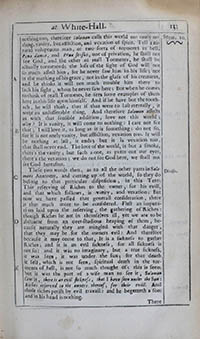 133
at White-Hall.
Serm.10.Serm.9.
133
at White-Hall.
Serm.10.Serm.9.
nothing too; therefore Solomon calls this world not onely no-
thing, vanity, but affliction, and vexation of spirit. Tell a na-
tural voluptuous man, of two sorts of torments in hell,
Pœna damni, and Pœna sensus, one of privation, he shall not
see God, and the other of reall Torments, he shall be
actually tormented; the loss of the sight of God will not
so much affect him, for he never saw him in his life; not
in the marking of his grace, not in the glass of his creatures,
and he thinks it will not much trouble him there to
lack his sight, whom he never saw here; But when he comes
to think of reall Torments, he sees some examples of them
here in this life upon himself. And if he have but the tooth-
achache, he will think, that if that were to last eternally, it
were an unsufferable thing. And therefore Solomon affects
us with that sensible addition, love not this world;
why? It is vanity, it will come to nothing: I care not for
that; I will love it, as long as it is something; do not so,
for it is not onely vanity, but affliction, vexation too. It will
be nothing at last, it ends; but it is vexation too,
that shall never end. The love of the world, is but a smoke,
there's the vanity; but such a one, as putts out our eyes,
there's the vexation; we do not see God here, we shall not
see God hereafter. Divisio.Divisio.These two words then, as to all the other parts in Solo-
mons Anatomy, and cutting up of the world, so they do
belong to that particular disposition, in this Text;
This reserving of Riches to the owner, for his evill,
and that which follows, is vanity, and vexation; But
now we have passed that generall consideration, there
is thus much more to be considered. First an imputa-
tion laid upon the reserving, the gathering of Riches:
though Riches be not in themselves ill, yet we are to be
abstinent from an over-studious heaping of them, be-
cause naturally they are mingled with that danger,
that they may be for the owners evil: And therefore
because it may come to that, It is a sickness to gather
Riches; and it is an evil sickness, for all sickness is
not so: and it was no imaginary, but a true sickness,
it was seen, it was under the sun; for that death
it self, which is not seen, spiritual death in the tor-
ments of hell, is not so much thought of; this is seen;
but it was the part of a wise man to see it, Solomon
saw it, there is an evil sickness, that I have seen under the Sun:
Riches reserved to the owners thereof, for their evill. And
those riches perish by evil travail: and he begetteth a son;
and in his hand is nothing. There
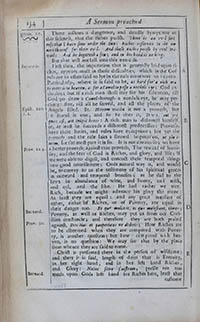 134
A Sermon preached
Serm.10.Serm.9.
There follows a dangerous, and deadly Symptome of
134
A Sermon preached
Serm.10.Serm.9.
There follows a dangerous, and deadly Symptome of
this sickness, that the riches perish. There is an evil sick-
ness that I have seen under the Sun: Riches reserved to the ow-
ners thereof for their evil. And those Riches perish by evil tra-
vail: And he begetteth a son; and in his hand is nothing. But that will not fall into this exercise. Imputatio.First then, the imputation that is generally laid upon ri-
ches, appears most in those difficulties, which in the Gos-
pels are so often said to lye in the rich mans way to heaven:
Particularly, where it is said to be, as hard for a rich man
to enter into heaven, as for a Camel to passe a needels eye; God can
do this; but if a rich man shall stay for his salvation, till
God podo draw a Camel through a needels eye, he may per-
chance stay, till all be served, and all the places of the
Angels filled. St. Hierom made it not a proverb, but
he found it one, and so he cites it, Epist. 160.
7.1.Dives, aut ini-
quus est, aut iniqui hæres: A rich man is dishonest himself,
or, at least he succeeds a dishonest predecessor: Proverbs
have their limits, and rules have exceptions; but yet the
proverb, and the rule laies a shrewd imputation, ut pluri-
mum, for the most part it is so. It is not alwaies so; we have
a better proverb, against that proverb, Prov. 22.4. The reward of humi-
lity, and the fear of God is Riches, and glory, and life; If
we were able to digest, and concoct these temporal things
into good nourishment; Gods natural way is, and would
be, to convay to us the testimony of his spiritual graces
in outward and temporal benefits; as he did to the
Iews in abundance of wine, and honey, and milk,
and oyl, and the like. He had rather we were
Rich, because we might advance his glory the more:
At least they are equal: and any great measure of
either, either of Riches, or of Poverty, are equal in
their danger too.Bernard. Et quæ mulcent, et quæ molestant, timeo;
Poverty, as well as Riches, may put us from our Chri-
stian constancie; and therefore they are both praied
against, Prov. 30.Divitias et paupertates ne dederis; How Riches are
to be esteemed when they are compared with Pover-
ty, is another question; but how compared with hea-
ven, is no question: We may see that by the place
from whence they are said to come. Christ is presented there in the person of wisdome;
and there it is said, length of daies, that is Eternity,
in her right hand, and in her left hand Riches,
and Glory: Bernard. Nolite sitire sinistram; presse not too
much upon Gods left hand for Riches here, least that custome
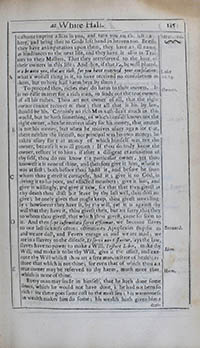 135
at White-Hall.
Serm.10.Serm.9.
135
at White-Hall.
Serm.10.Serm.9.
custome imprint a Bias in you, and turn you on the left hand
here, and bring thee to Gods left hand in heaven too. Briefly
they have an imputation upon them, they have an ill name,
as hindrances to the next life, and they have it also as Trai-
tors to their Masters, That they are reserved to the hurt of
their owners in this life; And then, if that Væ, be well placed,
Luke
26. 24.Wo be unto you, that are rich, for you have received your consolation,
what a wofull thing is it, to have received no consolation in
them, but to have had harm here by them? Owners.To proceed then, riches may do harm to their owners. It
is no easie matter for a rich man, to finde out the true owners
of all his riches. Thou art not owner of all, that the right
owner cannot recover of thee; that all that is his by law,
should be his. Certainly no rich Man hath dealt much in this
world, but he hath something, of which himself knows not the
right owner, when he receives usury for his money, that interest
is not his money, but when he receives usury again for that,
there neither the interest, nor principal was his own money; he
takes usury for that money of which himself was not the
owner, because it was ill gotten: If thou do truly know the
owner, restore it to him; if after a diligent examination of
thy self, thou do not know the particular owner, yet thou
knowest it is none of thine, and therefore give it him, whose it
was at first; both before thou hadst it, and before he from
whom thou gottest it corruptly, had it; give it to God, in
giving it to his poor, and afflicted members; give it him, and
give it willingly, and give it now, for that that thou givest at
thy death thou dost but leave by thy last will, thou dost not
give; he onely gives that might keep, thou givest unwilling-
ly; howsoever they have it, by thy will, yet it is against thy
will that they have it, thou givest then, but art sorry, that they
Bernard.to whom thou givest, that which thou givest, came so soon to
it. And then sæpe infirmitatis servi efficimur, we become slaves
to our last sickness often; oftentimes Apoplexies stupifie us
and we are dull, and Fevers enrage us and we are mad; we
are in a slavery to the disease, Et servï non testantur, says the law,
slaves have no power to make a Will; Idem.Testare Liber, make thy
Will, and make it to be thy Will, give it the effect, and exe-
cute thy Will whilest thou art a free man, in state of health; re-
store that which is not thine; for even that of which thou art
true owner may be reserved to thy harm, much more that,
which is none of thine. Harm.Harm.Every man may finde in himself, that he hath done some
sinnes, which he would not have done, if he had not been so
rich: for there goes some cost to the most sins; his wantonness
in wealth makes him do some; his wealth hath given him a con-
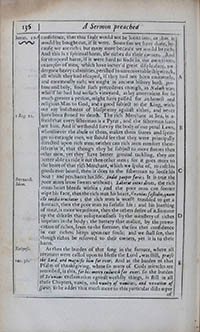 136
A Sermon preached
Serm.10.Serm.9.
136
A Sermon preached
Serm.10.Serm.9.
confidence, that that fault would not be lookt into, or that it
would be bought out, if it were. Some sins we have done, be-
cause we are rich; but many more because we would be rich;
And this is a spiritual harm, the riches do their owners. And
for temporal harm, if it were hard to finde in our own times,
examples of men, which have incurr'd great displeasure, un-
dergone heavy calamities, perished in unrecoverable shipwrack,
all which they had escaped, if they had not been eminently,
and enormously rich; we might in ancient history both pro-
fane and holy, finde such precedents enough, as Naboth was;
who if he had had no such vineyard, as lay convenient for so
much greater a person, might have passed for an honest and
religious Man to God, and a good subject to the King, with-
out any indictment of blasphemy against either, and never
have been stoned to death1 RegReg. 21.. The rich Merchant at Sea, is a-
fraid that every fisherman is a Pyrat, and the fisherman fears
not him. And if we should survay the body of our penal Laws,
whensoever the abuse of them, makes them snares and sprin-
ges to entangle men, we should see that they were principally
directed upon rich men; neither can rich men comfort them-
selves in it, that though they be subject to more storms then
other men, yet they have better ground tackling, they are
better able to ride it out then other men; for it goes more to
the heart of that rich Merchant, which we spoke of, to cast his
goods over board, then it does to the fisherman to loose his
boat: and perchance his life. BernardBernard. Sudat pauper foris; It is true the
poor mans brow sweats without; Idem.Laborat intus dives, the rich
mans heart bleeds within; and the poor man can sooner
wipe his face, then the rich man his heart, Gravius fastidio, quam
ille inedia cruciatur; the rich man is worse troubled to get a
stomach, then the poor man to satisfie his: and his loathing
of meat, is more wearisome, then the others desire of it. Summe
up the diseases that voluptuousness by the ministery of riches
imprints in the body; the battery that malice, by the provo-
cation of riches, layes to the fortune; the sins that confidence
in our riches; heaps upon our souls; and we shall see, that
though riches be reserved to their owners, yet it is to their
harm. Sickness.As then the burden of that song in the furnace, where all
creatures were called upon to blesse the Lord, was still, ver. 36.praise
the Lord, and magnifie him for ever; And as the burden of that
Psalm of thanksgiving, where so many of Gods miracles are
recorded, is this, for his mercy endureth for ever; so the burden
of Solomons exclamation against worldly things, is still in all
these Chapters, vanity, and vanity of vanities, and vexation of
spirit; so he addes thus much more to this particular distemper of
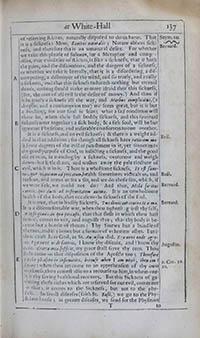 137
at White-Hall.
Serm.10.Serm.9.
137
at White-Hall.
Serm.10.Serm.9.
of reserving Riches, naturally disposed to do us harm. That
it is a sickness; MowNow, Bernard.Sanitas naturalis; Nature abhors sick-
ness, and therefore this is an unnatural desire. For whether
we take this phrase of Solomon, for a Metaphor and compa-
rison, that this desire of Riches, is like a sickness, that it hath
the pains, and the discomforts, and the dangers of a sickness,
or whether we take it literally, that it is a disordering, a dis-
composing, a distemper of the mind, and so truely, and really
a sickness, and that this sickness induceth nothing but eternal
death, nothing should make us more afraid then this sickness,
(for, the root of all evil is the desire of money.) And then if
it be truely a sickness all the way, and Morbus complicatus, (a
dropsie, and a consumption too) we seem great, but it is but
a swelling, for our soul is lean; what a sad condition will
there be, when their last bodily sickness, and this spiritual
sickness meet together; a sick body, & a sick soul, will be but
ignorant Physitians, and miserable comforters to one another. Evil.It is a sickness, and an evil sickness; & there is a weight ad-
ded in that addition; for though all sickness have rationem ma-
li, some degrees of the evil of punishment in it, yet sometimes
the good purpose of God, in inflicting a sickness, and the good
use of man, in mending by a sickness, overcome and weigh
down that little dram, and washes away the pale tincture of
evil, which is in it. There is a wholsome sickness, Basil.Et est sani-
tas, quæ viaticum ad peccatum, health sometimes victuals us, and
fuels us, and armes us for a sin, and we do those sins, which, if
we were sick, we could not do: And then, Bernard.Mala sanitas
carnis, quæ ducit ad infirmitatem animæ. It is an unwholsome
health of the body, that occasions the sickness of the soul. It is true, that in bodily Sickness, Bernard.Tua dimicant contra te arma.
It is a discomfortable war, when thou fightest against thy self;
In ipso gemis, in quo peccasti, that that flesh in which thou hast
sinned, comes to vex, and anguish thee; that thy body is be-
come but a bottle of rheum: Thy Sinews but a bundle of
thornes, and thy bones but a furnace of vehement ashes. But if
thou canst hear God, as St. Augustin did., Augustin.Ego novi unde ægro-
tes, Ego novi unde saneris, I know thy disease, and I know thy
cure. Gratia mea sufficit, my grace shall serve thy turn. Thou
shalt come to that disposition of the Apostle too; 2. Cor. 12.
10.Therefore
I take pleasure in infirmities, because when I am weak, then am I
strong: when thou art come to an apprehension of thy own
weakness, thou comest also to a recourse to him, in whom one-
ly is thy saving health and recovery. But this Sickness of ga-
thering those riches which are reserved for our evil, comes not
to that; it comes to the Sickness, but not to the phy-
sick. In small diseases (saith St. Basil,) we go to the Phy-
sitians house; in greater diseases, we send for the Physitian Tto
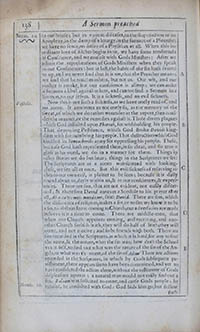 138
A Sermon preached
Serm.10.Serm.9.
138
A Sermon preached
Serm.10.Serm.9.
to our house; but in violent diseases, in the stupefaction of an
Apoplexy, in the damp of a leturgylethurgy, in the furnace of a Pleurisie;
we have no sence, no desire of a Physitian at all. When this in-
ordinate love of Riches begins in us, we have some tenderness
of Conscience, and we consult with Gods Ministers: After we
admit the reprehensions of Gods Ministers when they speak
to our Consciences; but at last, the habit of our sin hath seared
us up, and we never find that it is we, that the Preacher means;
we find that he touches others, but not us. Our wit, and our
malice is awake, but our conscience is asleep; we can make
a Sermon a libel against others, and cannot find a Sermon in a
Sermon, to our selves. It is a sickness, and an evil sickness. Visibilis.Now this is not such a sickness, as we have onely read of, and
no more. It concernes us not onely so, as the memory of the
sweat, of which we do rather wounderwonder at the report, then consi-
der the manner, or the remedies against it. Those divers plagues
which God inflicted upon Pharoah, for withholding his people.
That devouring Pestilence, which God stroke Davids king-
dom with for numbring his people. That destruction which God
kindled in Sennacheribs army for oppressing his people. These,
because God hath represented them, in so clear, and so true a
glass as his word, we do in a manner see them. Things in
other stories we do but hear; things in the Scriptures we see:
The Scriptures are as a room wainscotted with looking-
glass, we see all at once. But this evil sickness of reserving ri-
ches to our own evil, is plainer to be seen; because it is daily
round about us, dayly within us, & in our consciences, & experi-
ences. There are sins, that are not evident, not easily discer-
ned; & therefore David annexes a SceduleSchedule to his prayer after
all, Ab occultis meis munda me, saith David. There are sins, which
the difference of religion, makes a sin, or no sin; we know it to be
a sin, to abstain from coming to Church, our adversaries are made
beleeve it is a time to come. There are middle-men, that
when our Church appoints coming, and receiving, and ano-
otheran-
other Church forbids both, they will do half of both; they will
come, and not receive: and so be friends with both. There are
sins recorded in the Scriptures, in which it is hard, for any to find
the name, & the nature, what the sin was; how doth the School
vex it self, to find out what was the nature of the sin of the An-
gels, or what was the name, of the sin of Adam? There are actions
recorded in the Scriptures, in which by Gods subsequent pu-
nishment, there appears sin to have been committed, and yet to
have considered the action alone, without the testimony of Gods
displeasure upon it; a natural man would not easily find out a
sin.Numb. 22. Balaam was solicited to come, and curse Gods people; he
refused, he consulted with God: God bids him go, but follow such
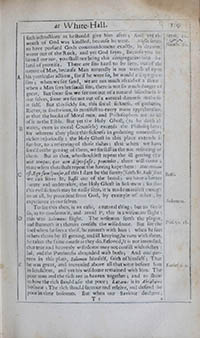 139
at White-Hall.
Serm.10.Serm.9.
139
at White-Hall.
Serm.10.Serm.9.
such instructions as he should give him after; And yet the
wrath of God was kindled, because he went. Numb. 20.Moses seems
to have pursued Gods commandement exactly, in drawing
water out of the Rock, and yet God sayes, Because you be-
lieved me not, you shall not bring this congregation into that
land of promise. There are sins hard to be seen, out of the
nature of Man, because Man naturally is not watchful upon
his particular actions, for if he were so, he would escape great
sins; when we see sand, we are not much afraid of a stone;
when a Man sees his small sins, there is not so much danger of
great. But some sins we see not out of a natural blindness in
our selves, some we see not out of a natural dimness in the sin
it self. But this sickly sin, this sinful sickness, of gathering
Riches, is so obvious, so manifest to every mans apprehension,
as that the books of Moral men, and Philosophers are as full
of it as the Bible. But yet the Holy Ghost, (as he doth al-
waies, even in moral Counsels) exceeds the Philosophers;
for whereas they place this sickness in gathering unnecessary
riches injuriously; the Holy Ghost in this place extends it
further, to a reserving of those riches; that when we have
sinn'd in the getting of them, we sin still in the not restoring of
them. But to thee, who shouldest repent the ill getting; ve-
niet tempus, quo non dispensasse, pœnetebit, there will come a
time when thou shalt repent the having kept them: Basil.Hoc certum
est, Ego sum sponsor, of this I dare be the surety (saith St. Basil); But
we can leave St,St. Basil out of the bond; we have a better
surety and undertaker, the Holy Ghost in Solomon; So that
this evil sickness may be easily seen, it is made manifest enough
to us all, by precedent from God, by example of others, by
experience in our selves. Solomon.To see this then, is an easie, a natural thing; but to see it
so, as to condemn it, and avoid it, this is a wisemans slight;
this was Solomons slight. The wiseman seeth the plague,
and shunneth it; therein consists the wisedome. Psal. 50.18.But for the
fool when he sees a theif, he runneth with him; when he sees
others thrive by ill getting, and ill keeping, he runs with them,
he takes the same course as they do. Beloved, It is not intended,
that true and heavenly wisedome may not consist with riches:
IobIob, and the Patriarchs abounded with both; And our pat-
tern in this place, Solomon himself, saith of himself; Eccles. 2.9.That
he was great, and increased above all that were before him
in Ierusalem, and yet his wisdome remained with him. The
poor man and the rich are in heaven together; and to show
us how the rich should use the poor; Lazarus is in Abrahams
bosome; The rich should succour and releive, and defend the
poor in their bosomes. But when our Saviour declares, T2a
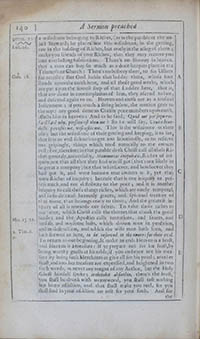 140
A Sermon preached
Serm.10.Serm.9.
140
A Sermon preached
Serm.10.Serm.9.
a wisedome belonging to Riches, (Luk. 16.as in the parable of the un-
just Steward) he places not this wisedome, in the getting,
nor in the holding of Riches, but onely in the using of them;
make you friends of your Riches, that they may receive you
into everlasting habitations. There's no Simony in heaven,
that a man can buy so much as a door-keepers place in the
Triumphant Church: There's no bribery there, to see Ushers
for accesse;Gen. 28. But God holds that ladder there, whose foot
stands upon the earth here, and all those good works, which
are put upon the lowest step of that Ladder here, that is,
that are done in contemplation of him, they ascend to him,
and descend again to us. Heaven and earth are as a musical
Instrument; if you touch a string below, the motion goes to
the top: any good done to Christs poor members upon earth,
affects him in heaven; And as he said, Quid me per sequeris.
Saul, Saul why, persecutest thou me? So he will say, Venite bene-
dicti, pavistis me, visitastis me. This is the wisedome of their
use; but the wisedome of their getting and keeping, is to see,
that it is an evil sickness to get too laboriously, or to reserve
too gripingly, things which tend naturally to the owners
evil: For, therefore in that parable doth Christ call all their Ri-
ches generaly, universally, Mammonas iniquitatis, Riches of ini-
quity, not that all that they had was ill got (that's not likely in
so great a company) but that whatsoever, and howsoever they
had got it, and were become true owners of it, yet they
were Riches of iniquity; because that is one iniquity to pos-
sess much, and not distribute to the poor; and it is another
iniquity to call those things riches, which are onely temporal,
and so to defraud heavenly graces, and spiritual treasure of
that name, that belongs onely to them; And the greatest in-
iquity of all is towards our selves. To take those riches to
our heart, which Christ calls the thornes that choak the good
Mat. 13.22.seeds; and the ApostlesApostle calls tentations, and snares, and
1. Tim. 6.
9.foolish, and noysome lusts, which drown men in perdition,
and in destruction, and which the wise man hath seen, and
hath shewed us here, to be reserved to the owners for their evil.
To return to our beginning, & make an end; Heaven is a feast,
and Heaven is a treasure: If ye prepare not for his feast, by
being worthy guests at his table, if you embrace not his trea-
sure, by being such Merchants as give all for his pearl; another
feast, and another treasure are expressed, and heightned in two
such words, as never any tongue of any Author, but the Holy
Ghost himself spoke; Inebriabit absinthio, there's the feast,
you shall be drunk with wormwood, you shall tast nothing
but bitter affliction, and that shall make you reel, for you
shall find in your affliction no rest for your souls. And for the
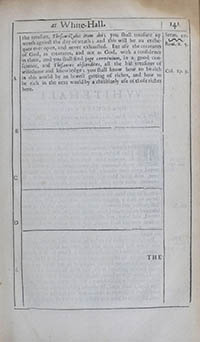 141
at White-Hall.
Serm.10.Serm.9.
141
at White-Hall.
Serm.10.Serm.9.
the treasure, Rom. 2.5.Thesaurizabis iram dei; you shall treasure up
wrath against the day of wrath; and this will be an exche-
quor ever open, and never exhausted. But use the creatures
of God, as creatures, and not as God, with a confidence
in them, and you shall find juge convivium, in a good con-
science, and Thesauros absconditos, all the hid treasures of
wisedome and knowledge;Col. 29.3.Col. 2.3 you shall know how to be rich
in this world by an honest getting of riches, and how to
be rich in the next world by a christianly use of those riches
here. THE
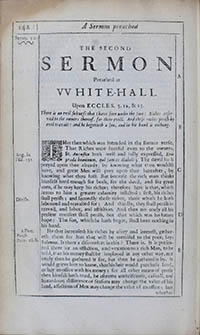 142
A Sermon preached
Serm.10.
THE SECOND
142
A Sermon preached
Serm.10.
THE SECOND SERMON
Preached at
VVHITE-HALLWHITE-HALL Upon ECCLES. 5.12, & 13.
There is an evil sickness that I have seen under the Sun: Riches reser-
ved to the owners thereof, for their evill. And these riches perish by
evil travail: and he begetteth a son, and in his hand is nothing. THatThat then which was intended in the former verse,
That Riches were hurtful even to the owners,
St. Augustin hath well and fully expressed,Aug. in
Psal. 131. Eris
prœda hominum, qui jam es diaboli; The devil hath
preyed upon thee already, by knowing what thou wouldst
have, and great Men will prey upon thee hereafter, by
knowing what thou hast. But because the rich man thinks
himself hard enough for both, for the devil, and for great
men, if he may keep his riches; therefore here is that, which
seems to him a greater calamity inflicted; Divisio.Divisiofirst, his riches
shall perish; and secondly those riches, those which he hath
laboured and travailed for; And thirdly, they shall perish in
travail, and labor, and affliction. And then not onely all his
present comfort shall perish, but that which was his future
hope: The son, which he hath begot, shall have nothing in
his hand. 2 Part.He that increaseth his riches by usury and interest, gather-
eth them for him that will be merciful to the poor,Perish. says
Solomon.Prov. 28.8. Is there a discomfort in this? There is. It is presen-
ted there for an affliction, and vexation to a rich Man, to be
told, that his money shall be imployed in any other way, not
onely then he gathered it for, but then he gathered it by. It
would grieve him to know, that his heir would purchase land,
or buy an office with his money; for all other means of profit
then himself hath tried, he esteems unthriftiness, casuall, and
hazardous; difference of seasons may change the value of his
land, affections of Men may change the value of an office; but whether
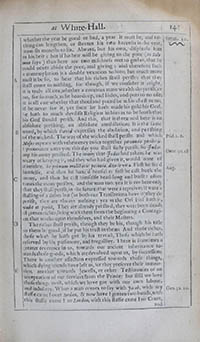 at White-Hall.
143
Serm.10.
at White-Hall.
143
Serm.10.
whether the year be good or bad, a year it must be, and no-
thing can lengthen, or shorten his two harvests in the year,
from six moneths to six. Always, but his own, displease him
in his heir; but if his heir will be giving to the poor (as Solo-
mon says) then here are two mischiefs met to gethertogether, that he
could never abide the poor, and giving; and therefore such
a contemplation is a double vexation to him; but much more
must it be so, to hear that his riches shall perish; that they
shall come to nothing, for though, if we consider it aright,
it is truly all one, whether a covetous mans wealth do perish, or
no, for so mnch much, as he hoards up, and hides, and puts to no use;
it is all one whether that thousand pound be in his chest or no,
if he never see it, yet since he hath made his gold his God,
he hath so much devilish Religion in him as to be loath that
his God should perish. And this, that is threatned here is an
absolute perishing, an absolute annihilation; It is the same
word, by which David expresses the abolition, and perishing
of the wicked. Psal. 1.6.The way of the wicked shall perish; and which
Moses repeats with vehemency twice together Deut. 30.18 pereundo peribitis;
I pronounce unto you this day you shall surly perish. So Judas,
anpand his mony perished. The mony that Judas had taken; he was
weary of keeping it, and they who had given it, would none of
it neither. Aug.Se primum mulctavit pecunia, deinde vita. First he fin'd
himselfe, and then he hang'd himselfe; first he cast back the
mony, and then he cast himselfe head-long and burst: often
times the mony perishes, and the man too: yea it is not here only
that they shall perish, in the future; that were a repreive; it were a
stalling of a debt; but (as both our Translations have it) they do
perish, they are always melting; yea as the Original hath it,
vadit et periit, They are already perished, they were born dead;
ill gotten riches, bring with them from the beginning a Contagi-
on that works upon themselves, and their Masters. The riches shall perish, though they be his, though his title
to them be good, if he put his trust in them; And those riches,
those which he hath got by his travail, Those which he hath
reserved by his parsimony, and frugallity. There is somtimes a
greater reverence in us, towards our ancient inheritance to-
wards those goods, which are devolved upon us, by succession;
There is another affection expressed towards those things,
which dying friends have left us, for they preserve their memo-
ries; another towards Jewells, or other Testimonies of an
acceptation of our services from the Prince: but still we love
those things most, which we have got with our own labour,
and industrey. When a man comes to say with Jacob,Gen. 32.10. with my
staffe came I over Iordan, & now have I gotten two bands, with
this staffe came I to London, with this staffe came I to Court, and
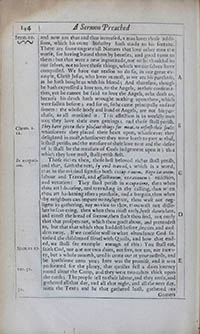 144
A Sermon Preachedpreached
Serm.10.Serm.9.
144
A Sermon Preachedpreached
Serm.10.Serm.9.
and now am thus and thus increased, a man loves those addi-
sions, which his owne Industry hath made to his fortune.
There are some ungratefull Natures that love other men the
worse, for having bound them by benefits, and good turns to
them: but that were a new ingratitude, not to be thankful to
our selves, not to love those things, which we our selves have
compassed. We have our reason to do so, in our great ex-
ample, Christ Jesus, who loves us most, as we are his purchase,
as he hath bought us with his bloud; And therefore, though
he hath expressed a love too, to the Angels, in their confirma-
tion, yet he cannot be said to love the Angels, as he doth us,
because his death hath wrought nothing upon them, which
were fallen before; and for us, so he came principally to save
sinners: the whole body and band of Angels, are not his pur-
chase, as all mankind is. This affection is in worldly men
too; they love their own gettings; and those shall perish.
Chron. 1.
11.Lam. 1. 11.They have given their pleasant things for meat, to refresh their souls:
whatsoever they placed their heart upon, whatsoever they
delighted in most, whatsoever they were loath to part withal,
it shall perish; and the measure of their love to it and the desire
of it shall be the measure of Gods judgement upon it; that
which they love most, shall perish first. In occupati-
one.Those riches then, those best beloved riches shall perish,
and that, saith the text, by evil travail,; which is a word,
that in the original signifies both Occupationem, Negotiationem,
labour and Travail, and afflictionem, vexationem; affliction,
and vexation: They shall perish in occupatione, then when
thou art labouring, and travailing in thy calling, then when
thou art harkening after a purchase, and a bargain, then when
thy neighbors can impute no negligence, thou wast not neg-
ligent in gathering, nay no vice to thee, thou wast not disso-
lute in scattering, then when thou risest early, lyest down late,
and eatest the bread of sorrow, then shalt thou find, not onely
that that prospers not, which thou goest about, and pretendest
to, but that that which thou haddest before, decaies, and mol-
ders away. If we consider well in what abundance God sa-
tisfied the children of Israel with Quails, and how that end-
ed, we shall see example enough of this: Num. 11.19.You shall eat,
saith God, not one nor two daies, nor five, nor ten, nor twen-
ty, but a whole moneth, until it come out at your nostrils, and
be loathsome unto you; here was the promise, and it was
performed for the plenty,ver. 31. that quailes fell a daies journey
round about the Camp, and they were two cubits thick upon
the earth; The people fell to their labour, and they arose, and
gathered all that day, and all that night, and all the next day,
saith the Text32.; and he that gathered least, gathered ten Gomers
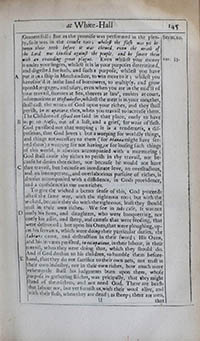 at White-Hall.
145
Serm.10.
at White-Hall.
145
Serm.10.
Gomers full; But as the promise was performed in the plen-
ty, so it was in the course too; ver. 33.whilest the flesh was yet be-
tween the r teeth before it was chewed, even the wrath of
the Lord was kindled against the people, and he smote them
with an exceeding great plague. Even whilest your money
is under your fingers, whilest it is in your purposes determined,
and digested for such, and such a purpose, whilest you have
put it in a ship in Merchandice, to win more to it; whilest you
have sow'd it in the land of borrowers, to multiply, and grow
upon Mortgages, and usury, even when you are in the mid'st of
your travail, stormes at Sea, theeves at land, enviers at court,
informations at Westminster, whilest the meat is in your mouthes,
shall cast the wrath of God upon your riches, and they shall
perish, In occupatione, then, when you travail to increase them.
The Children of Israel are said in that place, onely to have
wept to Moses, out of a lust, and a grief, for want of flesh.
God punished not that weeping; it is a tenderness, a dis-
position, that God loves; but a weeping for worldly things,
and things not necessary to them (for Manna might have ser-
ved them) a weeping for not having, or for loosing such things
of this world, is alwaies accompanied with a murmuring;
God shall cause thy riches to perish in thy travail, not be-
cause he denies thee riches, nor because he would not have
thee travail, but because an inordinate love, an overstudious,
and an intemperate,,, and overlaborious pursuite of riches, is
alwaies accompanied with a diffidence, in Gods providence,
and a confidence in our own riches. To give the wicked a better sense of this, God proceeds
often the same way, with the righteous too; but with the
wicked, because they do with the righteous, least they should
trust in their own riches. We see in Iobs case, It was not
onely his Sons, and daughters, who were banquetting, nor
onely his asses, and sheep, and camels that were feeding, that
were destroyed; but upon his Oxen, that were ploughing, up-
on his servants, which were doing rheirtheir particular duties, the
Sabæans came, and destruction in their sword; His Oxen,
and his servants perished, in occupatione, in their labour, in their
travail, when they were doing that, which they should do.
And if God do thus to his children, to humble them before-
hand, that they do not sacrifice to their own nets, not trust in
their own industry, nor in their own riches, how much more
vehemently shall his judgments burn upon them, whose
purpose in gathering Riches, was pricipallyprincipally, that they might
stand of themselves, and not need God. There are beasts
that labour not, but yet furnish us, with their wool alive, and
with their flesh, when they are dead; as sheep; there are men, Uthat
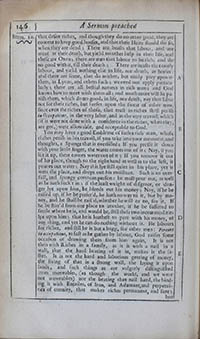 146
A Sermon preached
Serm.10.Serm.9.
146
A Sermon preached
Serm.10.Serm.9.
that desire riches, and though they do no other good, they are
content to keep good houses, and that their Heire should do so,
when they are dead; There are beasts that labour, and are
meat at their death, but yield no other help in their life, and
these are Oxen; there are men that labour to be rich, and do
no good with it, till their death; There are beasts that onely
labour, and yield nothing else in life, nor death, as horses:
and there are some, that do neither, but onely prey upon o-
thers, as Lyons, and others such; we need not apply particu-
larly; there are all bestial natures in rich men; and God
knows how to meet with them all; and much more will he pu-
nish them, which do no good, in life, nor death, nay that labor
not for their riches, but surfet upon the sweat of other men,
since even the riches of those, that trust in riches, shall perish
in Occupatione, in the very labor, and in the very travail, which
(if it were not done with a confidence in the riches, when they,
are got,) were allowable, and acceptable to God. You may have a good Embleme of such a rich man, whose
riches perish in his travail, if you take into your memorie, and
thoughts, a Spunge that is overfilled; If you presse it down
with your little finger, the water comes out of it; Nay, if you
lift it up, there comes water out of it; If you remove it out
of his place, though to the right hand as well as to the left, it
poures out water; Nay if it lye still quiet in his place, yet it
wets the place, and drops out his moisture. Such is an over-
full, and spungy covetous person: he must pour out, as well
as he hath suck't in; if the least weight of disgrace, or dan-
ger lye upon him, he bleeds out his money; Nay, if he be
raised up, if he be prefer'd, he hath no way to it, but by mo-
ney, and he shall be rais'd, whether he will or no, for it. If
he be stirr'd from one place to another, if he be suffered to
settle where he is, and would be, still these two incommodities
lye upon him; that he is loathest to part with his money, of
any thing, and yet he can do nothing without it. He labours
for riches, and still he is but a bagg, for other men: Pereunt
in occupatione, as fast as he gather by labour, God raises some
occasion of drawing them from him again, It is not
then with Riches in a family, as it is with a nail in a
wall, that the hard beating of it in, makes it the fa-
ster. It is not the hard and laborious getting of money,
the fixing of that in a strong wall, the laying it upon
lands, and such things as are vulgarly distinguished
from moveables, (as though the world, and we were
not moveables) nor the beating that nail hard, the bind-
ing it with Entailes, of Iron, and Adamant, and perpetui-
ties of eternity, that makes riches permanent, and sure; but
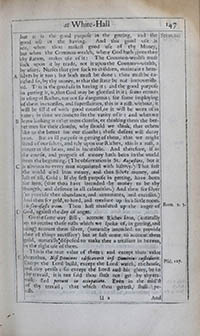 at White-Hall.
147
Serm.10.
at White-Hall.
147
Serm.10.
but it is the good purpose in the getting, and the
good use in the having. And this good use is
not, when thou makest good use of thy Money,
but when the Common-wealth, where God hath given thee
thy station, makes use of it: The Common-wealth must
suck upon it, by trade, not it upon the Common-wealth,
by usury. Nurses that give such to children, maintain t hem-
selvesthem-
selves by it too; but both must be done; thou must be en-
riched so, by thy money, as that the state be not impoverish-
ed. This is the good use in having it; and the good purpose
in getting it, is, that God may be glorified in it; some errours
in using of Riches, are not so dangerous; for some imploying
of them in excesses, and superfluities, this is a rust, without, it
will be fill'd of with good counsel, or it will be worn of in
time; in time we come to see the vanity of it: and when we
leave looking at other mens cloaths, or thinking them the bet-
ter men for their cloaths, why should we think, that others
like us the better for our cloaths; those desires will decay
in us. But an ill purpose in getting of them, that we might
stand of our selves, and rely upon our Riches, this is a rust, a
cancer at the heart, and is incurable. And therefore, if as
the course, and progress of money hath been in the world
from the beginning. (The observation is St. Augustins, but it
is obvious to every man acquainted with history.) That first
the world used Iron money, and then Silver money, and
last of all, Gold; If thy first purpose in getting, have been
for Iron, (that thou have intended thy money to be thy
strength, and defence in all calamities.) And then for silver
(to provide thee abundance, and ornaments, and excesses.)
And then for gold, to hord, and treasure up in a little room.
Rom. 2.5. Thesaurisasti iram. Thou hast treasured up the anger of
God, against the day of anger. Go the same way still; account Riches Iron, (naturally
apt to receive those rusts which we spoke of, in getting, and
using) account them silver, (naturally intended to provide
thee of things necessary) but at last come to account them
gold, naturally disposed to make thee a treasure in heaven,
in the right use of them. This is the true value of them; and except thou value
them thus, Psal. 127.Nisi Dominus edificaverit insi Dominius custodierit.
Except the Lord build, except the Lord watch, the house,
and city perish; so except the Lord and his glory, be in
thy travail, it is not said thou shalt not get by thy tra-
vail. Sed pereunt in occupatione. Even in the mid'st
of thy travail, that which thou gettest, shall pe-
rish. U2And
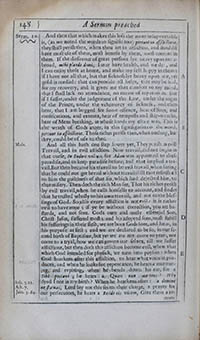 148
A Sermon preached
Serm.10.Serm.9.
And then that which makes this loss the more insupportable
148
A Sermon preached
Serm.10.Serm.9.
And then that which makes this loss the more insupportable
is, (as we noted the words to signifie too) pereunt in afflictione,
they shall perish then, when thou art in affliction, and shouldst
have most use of them, most benefit by them, most content in
them. If the disfavour of great persons lye heavy upon me a-
broad, mihi plaudo domi, I may have health, and wealth, and
I can enjoy those at home, and make my self happy in them;
if I have not all that, but that sickness lye heavy upon me, yet
gold is cordial: that can provide all helps, that may be had,
for my recovery, and it gives me that comfort to my mind,
that I shall lack no attendance, no means of reparation. But
if I suffer, under the judgement of the Law, under the anger
of the Prince, under the vehemency of sickness, and then
hear, that I am begged for some offence, hear of fines, and
confiscations, and extents, hear of tempests and ship-wracks,
hear of Mens breaking, in whose hands my estate was, This is
the wrath of Gods anger, in this signifigation of the word,
pereunt in afflictione. Those riches perish then, when nothing, but
they, could be of use to thee. Mala.Mala.And all this hath one step lower yet, They perish in evill
Travail, and in evil affliction. Now travail, did not begin in
that curse, In Sudore vultus; for Adam was appointed to dress
paradise, and to keep paradise before; and that implied a tra-
vail. But then became his travail to be evil travail, when seeing
that he could not get bread without travail; still that refresh edrefreshed
to him the guiltiness of that sin, which had dejected him, to
that misery. Then doth the rich Man see, That his riches perish
by evil travail, when he calls himselfe to account, and findes
that he trusted wholly to his own travail, and not to the bles-
sings of God. So also every affliction is not evil: it is rather
evil to have none; if ye be without correction, you are ba-
stards, and not sons. Gods own and onely essential Son,
Christ Jesus, suffered most; and his adopted sons, must fulfill
his sufferings in their flesh, we are born Gods sons, and heirs, in
his purpose at first; and we are declared to be so, in our se-
cond birth of Baptisme, but yet we are not come to years, not
come to a tryal, how we can govern our selves, till we suffer
afflictions, but then doth this affliction become evil, when that
which God intended for physick, we turn into poyson: when
God hearkens after this affliction, to hear what voice it pro-
duces, and when he looks for repentance, he hears a murmur-
ing, and repining, when he bends down his ear, for a
Tibi peccavi, he hears a Iob. 3.11.Quare non mortuus? Why
dyed I not in my birth? When he hearkens after: Act. 7.a domine
ne statuas, Lord lay not this sin to their charge, a prayer for
our persecutors, he hears a Jam. 3.64.Redde eis vicem, Give them a re-
com-
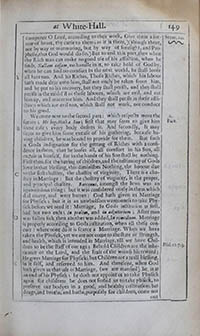 at White-Hall.
149
Serm.10.
compence O Lord, according to their work, Give them a sor-
at White-Hall.
149
Serm.10.
compence O Lord, according to their work, Give them a sor-row of heart, thy curse to them; as it is there,) (though there,
not by way of murmuring, but by way of foresight, and Pro-
phesie, that God would do so.) But to end this part, then when
the Rich man can make no good use of his affliction, when he
finds, Nullam ansam, no handle in it, to take hold of God by,
when he can find no comfort in the next world, he shall loose
all here too. And his Riches, Those Riches, which his labour
hath made dear unto him, shall not onely be taken from him,
and he put to his recovery, but they shall perish, and they shall
perish in the midd'st of those labours, which are evil, and eat
him up, and macerate him. And they shall perish in these affli-
ctions which are evil too, which shall not work, nor conduce
to his good. 2. Part.We come now to the second part: which respects more the
future; He begotteth a Son; first that may seem to give him
some ease; every body desires it. And secondly, It may
seem to give him some excuse of his gathering, because ha-
ving children, he was bound to provide for them. But such
is Gods indignation for the getting of Riches with a confi-
dence in them, that he looses all, all comfort in his Son, all
excuse in himself, for in the hands of his Son shall be nothing.
First then, for the having of children, and the testimony of Gods
love in that blessing, this diminishes Nothing, the honour due
to the first chastity, the chastity of virginity. There is a cha-
stity in Marriage: But the chastity of virginity, is the proper,
and principal chastity. Barcenus, amongst the Iews was an
ignominious thing; but it was considered onely in them which
did marry, and were barren: God hath given us Marriage
for Physick; but it is an unwholsom wantonness to take Phy-
sick before we need it: Marriage, In Gods institution at first,
had but two ends; In prolem, and in adjutorium; After man
was fallen sick, then another was added, In remedium. Marriage
is properly according to Gods institution, when all these con-
curr: where none do it is scarce a Marriage. When we have
taken the Physick, yet we are not come to the state of strength,
and health, which is intended in Marriage, till we have Chil-
dren to be the staff of our age; Psal. 12.7.3. Behold Children are the inhe-
ritance of the Lord, and the fruit of the womb his reward;
He gives Marriage for Physick; but Children are a reall blessing,
in it self, and reserved to him. And therefore, when God
hath given us that use of Marriage, (we are married) he is at
an end of his Physick; he doth not appoint us to take Physick
again for children: he does not forbid us to take phisick, to
preserve our bodyes in a good, and healthy costitution; but
drugs, and broths, and baths, purposely for children, come not out
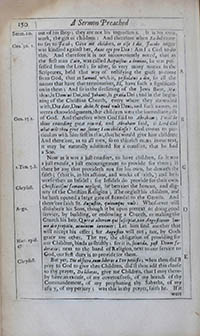 150
A Sermon Preachedpreached
Serm.10.Serm.9.
150
A Sermon Preachedpreached
Serm.10.Serm.9.
out of his shop; they are not his ingredients. It is his own
work, the gift of children: And therefore when Rachel came
to say to Jacob;Gen. 30.1. Give me children, or else I die, Jacobs anger
was kindled against her, Anne ego pro Deo: Am I a God to do
this. And therefore it is not inconveniently noted, that as
the first man Cain, was called Acquisitus a domino, he was pos-
sessed from the Lord; so after, so very many names in the
Scriptures, held that way of testifying the guift to come
from God, that as Samuel, wich is, postulatus a deo, so all the
names that have that termination, El, have such a significati-
on in them; And so in the declining of the Jews state, Ma-
theus, is Domini Dei, and Johanes, is gratia Dei; and in the begin-
ning of the Christian Church, every where they abounded
with, Deo date, Deus dedit, & quod vult Deus, and such names, as
werea cknowledgments were acknowledgments, that children were the immediate gift
of God. And therefore when God said to Abraham; Gen. 15.1.I will be
thine exceeding great reward, and Abraham said, O Lord God
what wilt thou give me, seeing I am childlesse? God comes to par-
ticulars with him first in that, that he would give him children:
And therefore, as to all men, so to this rich man; in our text,
it may be naturally admitted for a comfort, that he had
a Son. Now as it was a just comfort, to have children, so it was
a just excuse, a just encouragement to provide for them; 1.1 Tim. 5.8.If
there be any that provideth not for his own, he denieth the
faith; (that is, in his actions, and works of faith,) and he is
worse then an Infidel; for Infidels do provide for their own.
Chrysost. Christianismi famam negligit, he betraies the honour, and dig-
nity of the Christian Religion; if he neglect his children, and
he hath opened a large gate of Scandal to the Gentils. And
therefore saith St. Augustin, Augu.quicunque vult: Whosoever will
disinherit his Sons, though it be upon pretext of doing good
service, by building, or endowing a Church, or making the
Church his heir. Quærat alterum qui suscipiat, non Augustinum Im-
mo, deo propitio, neminem inveniet: Let him find another that
will accept his offer; for Augustin will not; nor, by Gods
grace any other. The tye, the obligation of providing for
our Children, binds us strictly; for it is, Hier. epist.
47.secunda, post Deum fæ-
deratio; next to the band of Religion, next to our service to
God, our first duty is to provide for them. But yet, Chrysost.Dic obsecro, cum liberos a Deo petiisti; when thou did'st
pray to God to give thee Children, did'st thou add this clause
to thy prayer, Da liberos, give me Children, that I may there-
by have an excuse, of my covetousness, of my breach of thy
Commandement, of my prophaning thy Sabaths, of my
usuy, of my perjury; was this in thy prayer, saith he. If it were
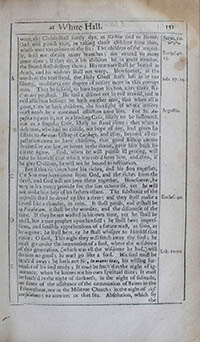 at White-Hall.
151
Serm.10.
at White-Hall.
151
Serm.10.
were, the Childe shall surely dye, as Nathan said to David:
God will panish thee, in taking those children from thee,
which were the colours of thy sin:Eccles. 40.
13.Eccles. 40.
15. The children of the ungod-
ly, shall not obtain many branches; not extend to many
generations; Iob. 27.14.If they do, if his children be in great number,
the sword shall destroy them; His remnant shall be buried in
death, and his widows shall not weep. Howsoever, as the
words of the text stand, the Holy Ghost hath left us at our
liberty, to observe one degree of misery more in this corrupt
man. That he is said, to have begot his Son, after those Ri-
ches are perished. He had a discomfort in evil travail, and in
evil affliction before; he hath another now, that when all is
gone, then he hath children, the foresight of whose misery
must needs be a continual affliction unto him.Augustin. For St. Au-
gustin reports it, not as a leading Case, likely to be followed,
but as a singular Case, likely to stand alone; that when a
rich man, who had no childe, nor hope of any, had given his
Estate to Auretius Bishop of Carthage, and after, beyond all ex-
pectation came to have children, that good Bishop uncon-
strained by any law, or intent in the donor, gave him back his
Estate again. God, when he will punish ill getting, will
take to himself that which was rob'd from him, and then, if
he give Children, he will not be bound to restitution. But if this rich man have his riches, and his Son together,
the Son may have come from God, and the riches from the
devil, and God will not joyn them together. Howsoever, he
may in his mercy provide for the son otherwise, yet he will
not make him heir of his fathers estate. Eccles. 40.The substance of the
ungodly shall be dryed up like a river; and they shall make a
sound like a thunder, in rain. It shall perish, and it shall be
in Parabolam, it shall be the wonder, and the discourse of the
time. If they be not wasted in his own time, yet he shall be
an ill, but a true prophet upon himself; he shall have impres-
sions, and sensible apprehensions of a future wast, as soon, as
he is gone: he shall hear, or he shall whisper to himself that
voice: Luk. 12.20.O fool, This night they will fetch away thy soul; he
must go under the imputation of a fool, where the wisdome
of this generation, (which was all the wisdome he had,) will
do him no good; he must go like a fool. His soul must be
fetch'd away; he hath not his, In manus tuas, his willing sur-
render of his soul ready; It must be fetch'd in the night of ig-
norance, when he knows not his own spiritual state; It must
be fetch'd in the night of darkness, in the night of solitude,
no sence of the assistance of the communion of Saints in the
Triumphant, nor in the Militant Church; in the night of dis-
consolatenes; no comfort in that sea. Absolution, which by the
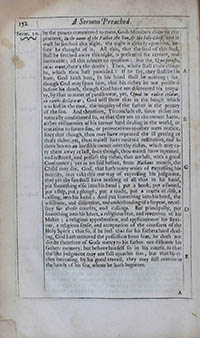 152
A Sermon Preachedpreached
Serm.10.Serm.9.
152
A Sermon Preachedpreached
Serm.10.Serm.9.
bythe power committed to them, Gods Ministers came to the
penitent, In the name of the Father, the Son, & the holy Ghost; and it
must be fetched this night, the night is already upon him, be-
fore he thought of it. All this, that the soul of this fool,
shall be fetched away this night, is presented for certain, and
inevitable; all this admits no question; but the, Qua perasti,
cujus erunt, there's the doubt; Then, whose shall those things
be, which thou hast provided? If he say, they shall be his
Sons, God saith here, In his hand shall be nothing; for,
though God may spare him, that his riches be not perished
before his death, though God have not discovered his iniqui-
ty, by that manner of punishment, yet, Quod in radice celatur,
in ramis declaratur; God will show that in the bough which
was hid in the root, the iniquity of the father in the penury
of the son. And therefore, To conclude all, since riches are
naturally conditioned so, as that they are to the owners harm,
either testimonies of his former hard dealing in the world, or
tentation to future sins, or provocations to other mens malice,
since that though, thou may have repented the ill getting of
those riches, yet, thou maiest have omitted restitution, and so
there hovers an invisible owner over thy riches, which may ca-
ry them away at last, since though, thou maiest have repented,
and restored, and possess thy riches, that are left, with a good
Conscience; yet as we said before, from Nathans mouth, the
Child may die, God, that hath many waies of expressing his
mercies, may take this one way of expressing his judgment,
that yet thy son shall have nothing of all that in his hand,
put something else into his hand; put a book, put a sword,
put a ship, put a plough, put a trade, put a course of life, a
calling, into his hand; And put something into his head, the
wisdome, and discretion, and understanding of a serpent, neces-
sary for those courses, and callings. But principally, put
something into his heart, a religious fear, and reverence of his
Maker; a religious apprehension, and application of his Savi-
our, a religious sense, and acceptation of the comforts of the
Holy Spirit; that so, if he feel, that for his fathers hard deal-
ing, God hath removed the possession from him, he doth not
doubt therefore of Gods mercy to his father, nor dishonor his
fathers memory, but behave himself so in his course, as that
the like judgment may not fall upon his son; but that his ri-
ches increasing, by his good travail, they may still remain in
the hands of his son, whom he hath begotten. A
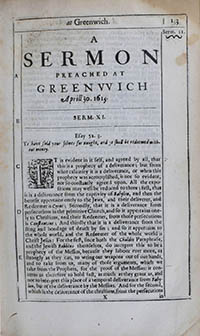 at Greenwich.
153
Serm.11.
A
at Greenwich.
153
Serm.11.
A SERMON
PREACHED AT
GREENVVICHGREENWICH
Aprill 30. 1615.
SERM. XI. Esay 52.3.
Ye have sold your selves for nought, and ye shall be redeemed with-
out money. ITIt is evident in it self, and agreed by all, that
this is a prophecy of a deliverance; but from
what calamity it is a deliverance, or when this
prophecy was accomplished, is not so evident,
nor so constantly agreed upon. All the expo-
sitions may well be reduced to three; first, that
it is a deliverance from the captivity of Babylon, and then the
benefit appertains onely to the Jews, and their deliverer, and
Redeemer is Cyrus; Secondly, that it is a deliverance from
persecutions in the primitive Church, and so it appertains one-
ly to Christians, and their Redeemer, from those persecutions
is Constantine; And thirdly that it is a deliverance from the
sting and bondage of death by sin; and so it appertains to
the whole world, and the Redeemer of the whole world is
Christ Jesus: For the first, since both the Chaldee Paraphrase,
and the Jewish Rabbins themselves, do interpret this to be a
prophecy of the Messias, because they labour ever more, as
strongly as they can, to wring our weapons out of our hands,
and to take from us, many of those arguments, which we
take from the Prophets, for the proof of the Messias: it con-
cerns us therefore to hold fast, as much as they grant us, and
not to interpret this place of a temporal deliverance from Baby-
lon, but of the deliverance by the Messias. And for the second,
which is the deliverance of the christians, from the persecutions Xin
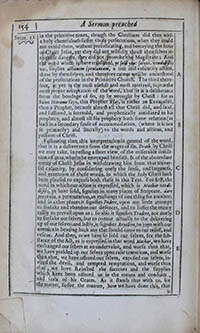 154
A Sermon preached
154
A Sermon preached
in the primitive times, though the Christians did then with
a holy cheerfulness suffer those persecutions, when they could
not avoid them, without prevaricating, and betraying the hour
of Christ Jesus, yet they did not wilfully thrust themselves in-
to those dangers, they did not provoke the Magistrate; And
the word which is here translated, ye sold your selves, vendidistis
vos, implies actionem spontaneam, a free and voluntary action,
done by themselves, and therefore cannot well be understood
of the persecutions in the Primitive Church. The third there-
fore, as yet is the most usefull, and most received, so it is the
most proper acceptation of the word, that it is a deliverancedeliverance
from the bondage of sin, to be wrought by Christ: for as
Saint Hierome says, this Prophet Esay, is rather an Evangelist,
than a Prophet, because almost all that Christ did, and said,
and suffered, is foretold, and prophetically antidated in his
prophecy, and almost all his prophecy hath some relation (at
least in a secondary sense of accommodation, (where it is not
so primarily) and literally) to the words and actions, and
passions of Christ. Following then this interpretation in general of the word,
that it is a deliverance from the wages of sin, Death, by Christ
we may take, in passing a short view, of the miserable condi-
tion of man, wherin he enwraped himself, & of the aboundant
mercy of Christ Jesus in withdrawing him from that univer-
sal calamity, by considering onely the sense, and largeness,
and extention of those words, in which the holy Ghost hath
been pleased to express both these in this Text. For first, the
word in which our action is expressed, which is Machar vendi-
distis, ye have sold, signifies in many places of Scripture, dare
proreatia, a permutation, an exchange of one thing for another;
and in other places it signifies Dedere, upon any little attempt
to forsake and abandon our defences, and to suffer the enemy
easily to prevail upon us; so also it signifies Tradere, not onely
to forsake our selves, but to concur actually to the delivering
up of our selves; and lastly, it signifies Repellere, to joyn with our
enemies in beating back any that should come to our relief, and
rescue. And then, as we have so sold our selves, for the sub-
stance of the Act, as is expressed in that word Machar, we have
exchanged our selves at an undervalue, and worse than that,
we have yeelded up our selves upon easie tentations, and worse
than that, we have offered our selves, exposed our selves, in-
vited the devil, and tempted temptations, and worse than
that, we have Rejected the succours and the supplies
which have been offered us in the means and conduits,
and seals of his Graces. As it stands thus with us, for
the matter, so for the manner, how we have done this, that is
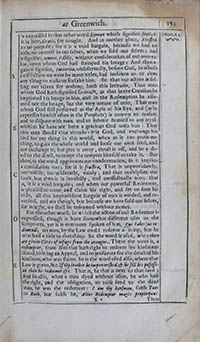 at Greenwich.
155
at Greenwich.
155
is expressed in that other word, kinnan which signifies fecit, as
it is here, Gratis, for nought. And in another place, Frustra,
to no purpose; for it is a void bargain, because we had no
title, no interest in our selves, when we sold our selves; and
it signifies, temere, rashly, without consideration of our own va-
lue, upon whom God had stamped his Image; And then a-
gain it signifies, Immerito, undeservedly, before God, in whose
jurisdiction we were by many titles, had forsaken us, or done
any thing to make us forsake him. So that our action in sel-
ling our selves for nothing, hath this latitude, That man
whom God hath dignified so much, as that in the Creation he
imprinted his Image in him, and in the Redemption he assu-
med not the Image, but the very nature of man, That man
whom God still preserved as the Aple of his Eye, and (as he
expresses himself often in the Prophets) is content to reason,
and to dispute with man, and to submit himself to any tryal
whither he have not been a gracious God unto him: That
this man should thus abandon this God, and exchange his
soul for any thing in this world, when as it can profit no-
thing, to gain the whole world and loose our own soul, and
not exchange it, but give it away, thrust it off, and be a de-
vil to the devil, to tempt the tempter himself to take it. But
then, as the word aggravates our condemnation, so it implies
a consolation too; for it is fructra, That is unprovidently,
unthriftily, inconsideratly, vainly, and that multiplies our
fault, but then it is invalidly, and uneffectually too; that
is, it is a void bargain; and when our powerful Redeemer,
is pleased to come, and claim his right, and set on foot his
title, all this improvident bargain of ours is voided, and re-
versed, and not though, but because we have sold our selves,
for nought, we shall be redeemed without money. For the other word, in which the action of our Redeemer is
expressed, though it have somewhat different uses in the
Scriptures, yet it is evermore spoken of him, Qui habet jus re
dimendi, no man, by the Law could redeem a thing, but he
who had a title to that thing. So the word is used, where there
are given Cities of refuge from the avenger... There the word is, a
redemptor, from him that hath right to redeem his kinsmans
blood, to bring an Appeal, and to prosecute for the death of his
kinsman, who was slaine. So is the word used also, where that
Law is given, &c. IfIf thy brother be impoverished, & he sell his possessi-
on then his redeemer &c. That is, he that is next to that land;
And so also, when a man dyed without issue, he who had
the right, and the obligation, to raise seed to the dead
man, he was the redeemer: I am thy kinsman, saith BoozBoaz
to Ruth, but saith he, Alius Redemptor magis propinquus. X2Thou
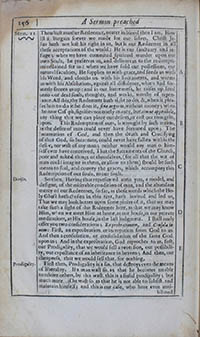 156
A Sermon preached
156
A Sermon preached
Serm.11.Thou hast another Redeemer, nearer in blood then I am. How
ill a bargain soever we made for our selves, Christ Je-
sus hath not lost his right in us, but is our Redeemer in all
these acceptations of the worldword: He is our sanctuary and re-
fuge; when we have commited spiritual murder upon our
own Souls, he preserves us, and delivers us to the redempti-
on ordained for us: when we have sold our possessions, our
natural faculties, He supplies us with grace, and feeds us with
his Word, and cloaths us with his Sacraments, and warms
us with his Absolutions, against all diffidence, which had for-
merly frozen us up: and in our barrenness, he raises up seed
unto our dead souls, thoughts, and works, worthy of repen-
tance. All this, thy Redeemer hath right to do; &, when it plea-
ses him to do it, he does it, sine argento, without money; when
the nownown Casaph, signifies not onely money, but, Omne appetibile,
any thing that we can place our desires, or cast our thougthsthoughts,
upon. This Redemption of ours, is wrought by such means,
as the desire of man could never have fortuned upon; The
Incarnation of God, and then the death and Crucifying
of that God, so Incarnate, could never have fallen within the
desire, nor wish of any man; neither would any man of him-
self ever have conceived, That the Sacraments of the Church,
poor and naked things of themselves, (for all that the wit of
man could imagine in them, or allow to them) should be such
means to seal, and convey the graces, which accompany this
Redemption of our souls, to our souls. Divisio.DivisioSo then, Having thus represented unto you, a model, and
designe, of the miserable condition of man, and the abundant
mercy of our Redeemer, so far, as those words which the Ho-
ly Ghost hath chosen in this text, hath invited and led us,
That we may look better upon some pieces of it, that we may
take such a sight of this Redeemer here, as that we may know
Him, when we meet Him at home, at our house, in our private
meditations, at His house, in the last judgment. I shall onely
offer you two considerations; Exprobrationem, and Consolatio-
nem: First, an exprobration, or increpation from God to us,
And then a consolation, or consolidation of the same God,
upon us; And in the exprobration, God reproches to us, first,
our Prodigality, that we would sell a reversion, our possibili-
ty, our expectance of an inheritance in heaven; And then, our
cheapness, that we would sell that, for nothing. ProdigaltyProdigality.First then, Prodigality is a sin, that destroys even the means
of liberality. If a man wast so, as that he becomes unable
to releive others, by this wast, this is a sinful prodigality; but
much more if he wast so as that he is not able to subsist, and
maintain himself; and this is our case, who have even anni- hilated
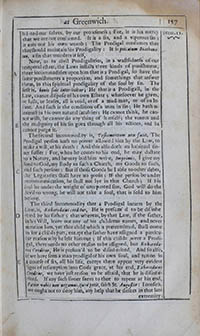 at Greenwich.
157
Serm.11.
at Greenwich.
157
Serm.11.
hilated our selves, by our profuseness; For, it is his mercy
that we are not consumed. It is a sin, and a viperous sin;
it eats out his own womb; The Prodigal consumes that
that should maintain his Prodigality: It is peccatum Biathana-
ton, a sin that murders it selfitself,. Now, as in civil Prodigalities, in a wastfulness of our
temporal estate, the LawsLaw inflicts three kinds of punishment,
three incommodities upon him that is a Prodigal, so have the
same punishments a proportion, and somethings that answer
them, in this spiritual prodigality of the soul by sin. The
first is, bonis suis interdicitur; He that is a Prodigall, in the
Law, cannot dispose of his own Estate; whatsoever he gives,
or sells, or leases, all is void, as of a mad-man, or of an In-
fant. And such is the condition of a man in sin; He hath no
interest in his own natural faculties; He cannot think, he can-
not wish, he cannot do any thing of himself; the venem and
the malignity of his sin goes through all his actions, and he
cannot purge it. The second incommodity is, Testamentum non facit, The
Prodigal person hath no power allowed him by the Law, to
make a will, at his death: And this also doth an habitual sin-
ner suffer: For, when he comes to his end, he may dictate
to a Notary, and he may bid him write, Imprimis, I give my
Soul to God, my Body to such a Church, my Goods to such,
and such persons: But if those Goods be liable to other debts,
the Legataries shall have no profit; If the person be under
excommunication, he shall not lye in that Church; If his
soul be under the weight of unrepented sins, God will do the
devil no wrong, he will not take a soul, that is sold to him
before. The third Incommodity that a Prodigal incurrs by the
Law, is, Exhæredatus creditur, He is presum'd to be disinhe-
rited by his father; that whereas, by that Law, if the father,
in his Will, leave out any of his childrens names, and never
mention him, yet that child which is pretermitted, shall come
in for a childs part, except the father have assigned a particu-
lar reason why he left him out; If this childe were a Prodi-
gal, there needs no other reason to be assigned, but Exhæreda-
tus Creditur, He is presum'd to be disinherited. And so also,
if we have seen a man prodigal of his own soul, and run on in
a course of sin, all his life, except there appear very evident
signs of resumption into Gods grace, at his end, Exhæredatus
Creditur, we have just reason to be afraid, that he is disinhe-
rited. If any such sinner seem to thee to repent at his end,
Fateor vobis non negamus, quod petit, saith St. Augustin: I confess,
we ought not to deny him, any help that he desires in that late extremity;
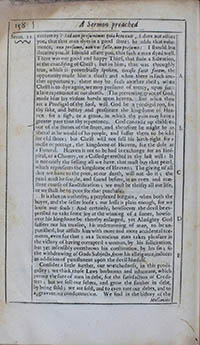 158
A Sermon preached
Serm.11.
158
A Sermon preached
Serm.11.
extremity?; Sed non præsumimus quia bene exit, I dare not assure
you, that that man dyes in a good state; he adds that vehe-
mence, non præsumo, non vos fallo, non præsumo: I should but
deceive you, if I should assure you, that such a man dyed well.
There was one good and happy Thief, that stole a Salvation,
at the crucifying of Christ; but in him, that was throughly
true, which is proverbially spoken, Occasio facit furem, the
opportunityopportunity made him a thief: and when there is such ano-
ther opportunity, there may be such another theif; when
Christ is to dye again, we may presume of mercy, upon such
a late repentance at our death. The preventing grace of God,
made him lay violent hands upon heaven. But when thou
art a Prodigal of thy soul, will God be a prodigal too, for
thy sake, and betray and prostitute the kingdome of Hea-
ven for a sigh, or a groan, in which thy pain may have a
greater part than thy repentance.? God can raise up children
out of the stones of the street, and therefore he might be as
liberal as he would of his people, and suffer them to be sold
for old shoes; but Christ will not sell his birth-right for a
messe of pottage, the kingdome of Heaven, for the dole at
a Funeral. Heaven is not to be had in exchange for an Hos-
pital, or a Chantry, or a Colledge erected in thy last will: It
is not onely the selling all we have, that must buy that pearl,
which represents the kingdome of Heaven; The giving of all
that we have to the poor, at our death, will not do it; the
pearl must be sought, and found before, in an even, and con-
stant course of Sanctification; we must be thrifty all our life,
or we shall be totoo poor for that purchase. It is then an unthrifty, a perplexed bargain, when both the
buyer, and the seller loose; our losse is plain enough, for we
loose our souls: And certainly, howsoever the devil be ex-
pressed to take some joy at the winning of a sinner, howso-
ever his kingdome be thereby enlarged, yet Almighty God
suffers not his treason, his undermining of man, to be un-
punished, but afflicts him with more and more accidental tor-
ments, even for that; as a licencious man takes pleasure in
the victory of having corrupted a woman, by his solicitation,
but yet insensibly overthrows his constitution by his sin; so
the withdrawing of Gods Subjects, from his alleigance, induces
an addition of punishment upon the devil himself. Consider a little further, our wretchedness, in this prodi-
gality; we think, those Laws barbarous and inhumane, which
permit the sute of men in debt, for the satisfaction of Credi-
tors; but we sell our selves, and grow the farther in debt,
by being sold; we are sold, and to even rate our debts, and to
aggravate our condemnation. We find in the history of the Muscovits
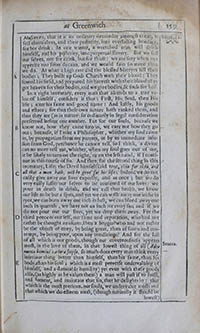 at Greenwich.
159
Serm.11.
at Greenwich.
159
Serm.11.
Muscovits, that it is an ordinary detainder amongst them, to
sell themselves, and their posterity, into everlasting bondage,
for hot drink: In one winter, a wretched man will drink
himself, and his posterity, into perpetual slavery. But we sell
our selves, not for drink, but for thirst: we are sory when our
appetite too soon decaies, and we would fain sin more than
we do. At what a high rate did the blessed Martyrs sell their
bodies; They built up Gods Church with their blood: They
sowed his field, and prepared his harvest with their blood: they
got heaven for their bodies, and we give bodies, & souls for hell. In a right inventary, every man that ascends to a true va-
lue of himself, considers it thus; First, His Soul, then His
life; after his fame and good name: And lastly, his goods
and estate; for thus their own nature hath ranked them, and
thus they are (as in nature) so ordinarily in legal consideration
preferred before one another. But for our souls, because we
know not, how they came into us, we care not how they go
out; because, if I aske a Philosopher, whither my soul came
in, by propagation from my parents, or by an immediate infu-
sion from God, perchance he cannot tell, so I think, a divine
can no more tell me, whither, when my soul goes out of me,
it be likely to turn on the right, or on the left hand, if I conti-
nue in this course of sin. And then, for the second thing in this
inventary, Life; the Devil himself said true, skin for skin, and
all that a man hath, will he give for his life; Indeed we do not
easily give away our lives expresly, and at once; but we do
very easily suffer our selves to be cousened of our lives: we
pour in death in drink, and we call that health, we know
our life to be but a span, and yet we can wash away one inche in
ryot, we can burn away one inch in lust, we can bleed away one
inch in quarrels, we have not an inch for every sin; and if we
do not pour out our lives, yet we drop them away. For the
third peece of our self, our fame and reputation, who had not
rather be thought an usurer, then a beggar? who had not rather
be the object of envy, by being great, than of scorn and con-
tempt, by being poor, upon any conditions? And for the last
of all which is our goods,Seneca. though our coveteousness appears
most, in the love of them, in that lowest thing of all (Adeo
omnia homini cariora seipso, so much does every man think every
inferiour thing better than himself, than his fame, than his
body, than his soul; which is a most perverse undervaluing of
himself, and a damnable humility) yet even with these goods
also, (as highly as he values them) a man will pastpart if to fuell,
and foment, and maintain that sin, that he delights in: that
which is the most precious, our souls, we undervalue most; and
that which we do esteem most, (though naturally it should be lowest)
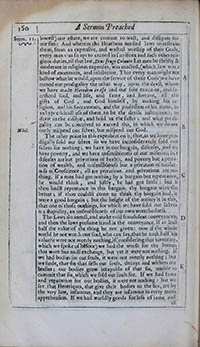 160
A Sermon Preachedpreached
Serm.11.
160
A Sermon Preachedpreached
Serm.11.
lowest) our estate, we are content to wast, and dissipate for
our sins: And whereas the Heathens needed laws to restrain
them, from an expensive, and wastful worship of their Gods,
every man was so apt to exceed in sacrifices and such other reli-
gious duties, til that law, Deus frugi Colunto Let men be thrifty &
moderate in religious expenses, was enacted, (which law was a
kind of mortmain, and inhibition, That every man might not
bestow what he would, upon the service of those Gods) we have
turned our prodigality the other way, upon the devil, whom
we have made Hæredem in esse and our sole executor, and sa-
crificed soul, and life, and fame, and fortune, all the
gifts of God, and God himself, by making his re-
ligion, and his Sacraments, and the profession of his name, in
an hypocriticall use of them, to be the devils instruments, to
draw us the easilyer, and hold us the faster; and what prodi-
gality can be conceived to exceed this, in which we do not
onely mispend our selves, but mispend our God. Nihil.The other point in this exprobration is, that, as we have pro-
digally sold our selves, so we have inconsiderately sold our
selves for nothing; we have in our bargain, diseases, and we
have poverty, and we have unsensibleness of our miseries; but
diseases are but privations of health, and poverty but a priva-
tion of wealth, and unsensibleness but a privation of tender-
ness of Conscience; all are privations, and privations are no-
thing. iIf a man had got nothing by a bargain but repentance,
he would think, and justly, he had got little: but if
thou hadst repentance in this bargain, thy bargain were the
better; if thou couldst come to think thy bargain bad, it
were a good bargain; but the height of the misery is in this,
that one of those nothings, for which we have sold our selves
is a stupidity, an unsensibleness of our own wretchedness. The Laws do annull, and make void fraudulent conveyances;
and then the laws presume fraud in the conveyance, if at least
half the value of the thing be not given: now if the whole
world be not worth one soul, who can say, that he hath half his
value? it were not meerly nothing, if (considering that inventary,
which we spoke of before) we had the worse for the better;
that were but an ill exchange, but yet it were not nothing. If
we had bodies for our souls, it were not meerly nothing; but
we finde, that sin that sells our souls, decays and withers our
bodies; our bodies grow incapable of that sin, unable to
commit that sin, which we sold our souls for. If we had fame
and reputation for our bodies, it were not nothing: but we
see, that Heretiques, that give their bodies to the fire, are by
the very law, infamous, and they are infamous in every mans
apprehension. If we had worldly goods for loss of fame, and of
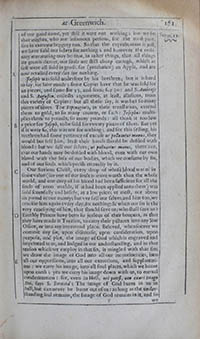 at Greenwich.
161
Serm.11.
at Greenwich.
161
Serm.11.
of our good name, yet still it were not nothing; but we see
that witches, who are infamous persons, for the most part,
live in extreme beggery too. So that the exprobration is just,
we have sold our selves for nothing; and however the ordi-
nary murmuring may be true, in other things, that all things
are grown dearer, our souls are still cheap enough, which at
first were all sold in gross, for (perchance) an Apple, and are
now retailed every day for nothing. Joseph was sold underfoot by his brethren; but it is hard
to say, for how much; some Copies have that he was sold for
20 pieces, and some for 25, and some for 30: and S. Ambrose
and S. Augustin, collectscollect arguments, at least, allusions, from
this variety of Copies: but all these say, it was but so many
pieces of silver. The Septuagints, in their translation, extend
them to gold, to so many crowns, or such: Josephus multi-
plies them to pounds, so many pounds: all think it too low
a price for Joseph, to be sold for twenty pieces of silver. But yet
if it were so, this was not for nothing; and for this selling, his
brethren had some pretence of excuse ne polluantur manus, they
would but sell him, least their hands should be defiled with
blood: but we sell our selves, ut polluantur manus, therefore,
that our hands may be defiled with blood, even with our own
blood, with the loss of our bodies, which we consume by sin,
and of our souls, which perish eternally by it. Our Saviour Christ, every drop of whose blood was of in-
finite value (for one of our souls is more worth than the whole
world, and one drop of his blood had been sufficient for all the
souls of 1000 worlds, if it had been applied unto them) was
sold scornfully and basely, at a low price; at most, not above
six pound of our money; but vvwe sell our selves, and him too, we
crucifie him again every day, for nothing: & when our sin is the
very crucifying of him, that should save us, who shall save us?
Earthly Princes have been so jealous of their honours, as that
they have made it Treason, to carry their pictures into any low
Office, or into any irreverend place. Beloved, whensoever we
commit any sin, upon discourse, upon consideration, upon
purpose, and plot, the image of God which is engraved and
imprinted in us, and lodged in our understanding, and in that
reason which we employ in that sin, is mingled with that sin;
we draw the image of God into all our incontinencies, into
all our oppressions, into all our extortions, and supplantati-
ons: we carry his image, into all foul places, which we haunt
upon earth; yea we carry his image down with us, to eternal
condemnation: for, even in Hell, uri potest, non exuri Imago
Dei, says S. BernardBernard; The image of God burns in us in
hell, but can never be burnt out of us: as long as the under-
standing soul remains, the Image of God remains in it, and so Ywe
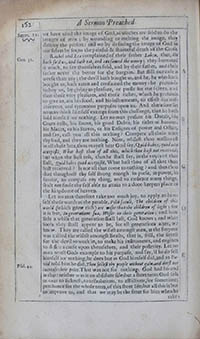 162
A Sermon Preachedpreached
Serm.11.
162
A Sermon Preachedpreached
Serm.11.
we have used the image of God, as witches are said to do the
images of men; by wounding or melting the image, they
destroy the person: and we by defacing the image of God in
our selves by sin, to the painful & shameful death of the Cross. Gen. 31. RachelRachel and Lea complained of their father Laban, thus, He
hath sold us, and hath eat, and consumed the money; they lamented
it much, to see themselves sold, and by their father, and their
father never the better for the bargain. But still our case is
worse than any; the devil hath bought us, and he, he who hath
bought us, hath eaten and consumed the money: he pretends
to buy us, by giving us pleasure, or profit for our selves, and
then those very pleasures, and those riches, which he pretends
to give us, are his food, and his instruments, to effect his mis-
chievous, and tyrannous purposes upon us. And therefore let
no man think himself exempt from this challenge, that he hath
sold himself for nothing. Let no man present his Dutals, his
Court-rolls, his BacusBaculus, his good Debts, his titles of honour,
his Maces, or his Staves, or his Ensignes of power and Office,
and say, call you all this nothing? Compare all these with
thy soul, and they are nothing. Now, whilest thou wallowest
in all these here, thou mayest hear God say, Quid habes, quod non
accepisti, What hast thou of all this, which thou hast not received;
but when the Bell tols, then he shall say, in the voyce of that
Bell, Quid habes quod accepisti, What hast thou of all that thou
hast received? Is not all that come to nothing? and then thou
that thoughtest thy self strong enonghenough in purse, in power, in
favour, to compass any thing, and to embrace many things,
shalt not finde thy self able to attain to a door-keepers place in
the kingdome of heaven. Let no man therefore take too much joy, to apply to him-
self those words of the parable, Filii sæculi, The children of this
world (which grow rich) are wiser than the children of light; for
it is but, In generatione sua, Wiser in their generation; and how
litle a while that generation shall last, God knows; and what
fools they shall appear to be, for all generations after, we
know. They are called the wisest amongst men, as the Serpent
was called the wisest amongst Beasts, that is, still, the fittest
for the devil to work in, to make his instruments, and engines
to desire a curse upon themselves, and their posterity. Let no
man wrest Gods example to his purpose, and say, if he do sell
himself for nothing, he does but as God himself did, and as Da-
vid told him he did,Psal. 44. Thou sellest thy people without gain, and doest not
increase their price. That was not for nothing; God had his end
in that: neither was it an absolute sale; but a short term: God sels
us over to sickness, to tribulations, to afflictions, for sometimesome time;
perchance for the whole term, of this short life; but all this is but
to improve us, and that we may be the fitter for him when he takes
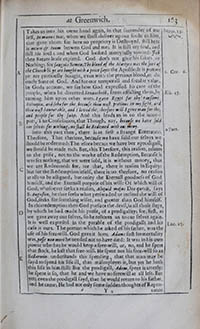 at Greenwich.
163
Serm.11.
at Greenwich.
163
Serm.11.
Takes us into his owne hand again, in that surrender of our
self, In manus tuas, when we shall deliver up our souls: to him,
that gave them: for here no propriety is Destroyed, still here
is meum & tuum betwenbetween God and me; It is still my soul, and
still his soul; and when God looked mercyfully towards Job
then Satans lease expired. God doth not give his saints for
Nothing; for sanguis Semen, The blood of the Martyrs was the seed of
the Church & ye are bought with a price sayes the Apostle;1. Cor. 6. It is pretiore
ye are pretiously bought, even with the pretious blood, of the
onely Sone of God. And for our temporall and secular value,
in Gods account, we see how God expressed his care of the
people, when he diverted Sennachrib, from afflicting them,Esa. 43. by
turning him upon other wars. I gave Egypt for thy ransome,
Ethiopia, and seba for the, because thou wast pretious in my sight, and
thou wast honourable, and I loved thethee; therfore will I give man for thethee,
and people for thy sake. And this leads us in to the second
part, The Consolation, that Though, nay, because we have sold
our selves for nothing, we shall be Redemed with out mony. Into this part then, there is at first a strange Enterance;
2 Part. Therfore, That therfore, because we have sold our selves we
should be redeemed; Therefore becausbecause we have bee nprodigalbeen prodigal,
we should be made rich. But, this Therfore, this reason, relates
to the prise, not to the worke of the Redemption, Because it
was for nothing, that we were sold, it is without money, that
we are Redeemed: for, for that, there is reason in Equity:
but for the Redemption itself, there is no therfore, no reason
at all: to be assigned, but onley the Eternall goodness of God
himself, and the Eternall purpose of his will: Of which will of
God, whosoever seeks a reason, Aliquid majus Deo quærit, says
S. Augustin, he that seeks what perswaded or inclind the will of
God, seeks for somthing wiser, and greater than God himself. In this redemption then God pursues the devil, in all those steps,
by which he had made his profit, of a prodigality; for, first, as
we gave away our selves, so he restores us to our selves again.
It is well expresed in the parable of the prodigall;Luc. 15. and his
case is ours. The portion which he asked of his father, was the
use of his free-will. God gave it him; Adams first Immortality
was, posse non mori he needed not to have died: It was in his own
power whether he would keep a free-will, or, no, and he spent
that stock, he lost that free-will. He spent not his free-will so as
Bellarmin understands this spending, that that man may be
sayd to spend his life ill, that misimployes it, but yet he hath
this life in him still: But the prodigall, Adam, spent ishis utterly:
he spent it so, that he and we have no freewill at all left. But
yet; even the prodigall sayd, that he would return to his father,
and he came; He had not only some sudden thoughts of Repen- Y2tance
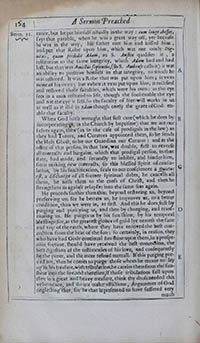 164
A Sermon Preachedpreached
Serm.11.
164
A Sermon Preachedpreached
Serm.11.
tance, but he put himself actually in the way: cum longe abesset,
says that parable, when he was a great way off, yet because
he was in the way, his father met him and kissed him,
and put that Robe upon him, which was not onely Dig-
nitas, quam perdidit Adam, as S. Austin qualifies it, a
restitution to the same integrity, which Adam had and had
lost, but that was Amictus sapientiæ, (so S. Ambrose calls it) it was
an ability to preserve himself in that integrity, to which he
was restored. It was a Robe that was put upon him; it vvaswas
none of his ovvnown; but vvhenwhen it waswas put upon him, it rectified
and restored those faculties, which were his own: as the eye
sees in a man restored to life, though the soul enable the eye
and not the eye it self, so the faculty of free-will works in us
as well as it did in Adam though onely the grace of God en-
able that faculty. When God hath wrought that first cure (which he does by
incorporating us, in the Church by baptisme) that we are our
selves again, then (as in the case of prodigals in the law) as
they had Tutors, and Curators appointed them, so he sends
the Holy Ghost, to be our Guardian our Curator: and as the
office of that person, in that law, was double, first to reverse
all contracts and bargains, which that prodigal person, in that
state, had made, and secondly to inhibit, and hinder him,
from making new contracts, so this blessed Spirit of conso-
lation, by his sanctification, seals to our consciences a Quietus
est, a discharge of all former spiritual debts, he cancells all
them, he nails them to the cross of Christ, and then he
strengthens us against relapses into the same sins again. He procedsproceeds farther than this; beyond restoring us, beyond
preserving us; for he betters us, he improves us, to a better
condition, than we were in, at first. And this he does, first by
purging and purifying us, and then by changing, and trans-
muting us. He purges us by his sun-shine, by his temporal
blessings; for, as the greatest globes of gold lye nearest the face
and top of the earth, where they have received the best con-
coction from the heat of the sun; so certainly, in reason, they
who have had Gods continual sun-shine upon them, in a prospe-
rous fortune, should have received the best concoction, the
best digestion of the testimonies of his love, and consequently
be the purer, and the more refined mettall. If this purging pre-
vail not, then he comes to purge those whom he means to lay
up in his treasure, with tribulation; he carries them from the sun-
shine into the fire, and therefore, if those tribulations fall upon
thee in a great and heavy measure, think thy dross needed this
vehemence, and do not make afflictions, Arguments of God
neglecting thee, for he that is presented to have suffered very much
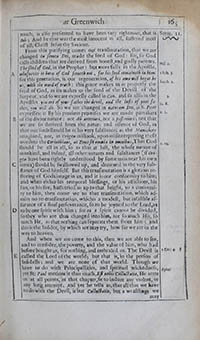 at Greenwich.
165
Serm.11.
at Greenwich.
165
Serm.11.
much, is also presented to have been very righteous, that is
Iob; And he that was the most innocent of all, suffered most
of all, Christ Jesus thy Saviour. From this purifying comes our transmutation, that we are
changed in semen Dei, made the seed of God: for, so God
calls children that are derived from honest, and godly parents,
Mal. 2. The seed of God, in the Prophet: but more fully in the Apostle,
whosoever is born of God sinneth not, for his seed remaineth in him:
1 Ioh. 3. for this generation, is our regeneration, of his own will begat he
Iacob. 1.us, with the word of truth: this grace makes us as properly the
seed of God, as sin makes us the seed of the Devill, of the
Serpent,3. and so we are expresly called in Gen. and so also in the
Apostles, you are of your father the devil,Io. 8. and the lusts of your fa-
ther, you will do. So we are changed in naturam Dei, as S. Peter
expresses: it it : 2.1. By his precious promises we are made partakers
of the divine nature: not Ab anteriori, nor a posteriori; not that
we are so derived from the nature and essence of God, as
that our souls should be of his very substance, as the Manichees
imagined, nor, as Origen mistook, upon misinterpreting these
words to the Corinthians, ut Deus sit omnia in omnibus,1.15. That God
should be all in all, so as that at last, the whole nature of
mankind, and indeed, all other natures and substances (if Ori-
gen have been rightly understood by some men near his own
times) should be swallowed up, and drowned in the very sub-
stance of God himself. But this transmutation is a glorious re-
storing of Gods image in us, and it is our conformity to him;
and when either his temporal blessings, or his afflictions, his
sun, or his fire, hath tried us up to that height, to a conformi-
ty to him, then come we to that transmutation, which ad-
mits no re-transmutation, which is a modest, but infalible as-
surance of a final perseverance, so to be joyned to the Lord, as
to be one spirit with him; for as a spirit cannot be divided,
so they who are thus changed into him, are so much His, so
much He, as that nothing can separate them from him; and
this is the ladder, by which we may try, how far we are in the
way to heaven. And when we are come to this, then we are able to see,
and to consider, the poverty, and the value of him, who had
before bought us, for nothing, and enthraled us.2 Cor. 4. The Devil is
called the Lord of the world; but that is, in the person of
Infidells; and we are none of that world. Though we
have to do with Principallities, and spiritual wickedness,
Ephes.Ephes. yet St:St. Paul motions it thus much, Est nobis Colluctatio, He arms
us at all points, in that chapter, fit to indure any violent, or
any long attempt, and yet he tells us, that all that we have
to do with the Devil, is but Colluctatio, but a wrestling; we may
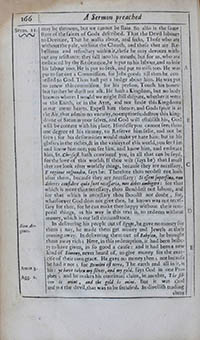 166
A Sermon preached
Serm.11.
166
A Sermon preached
Serm.11.
may be throwen, but we cannot be slain. So also is the same
state of the saints of GodsGod described. That the Devil labours
to Devoure, That he walks about, and seeks, Those who are
without the pale, without the Church, and these that are Re-
bellious and refractary within it, these he may devoure with-
out any resistance: they fall into his mouth; but for us, who are
embraced by thy Redemtion, he is put to his labour, and to lose
his labour too; He is put to seek, and put to miss too. He was
put to sue out a Commission, for Jobs good; till then he con-
fessed to God, Thou hast put a hedge about him. He was put
to renew this commision, for his person; Touch his bones?
but further he durst not ask. He hath a Kingdom, but no body
knowes where: I would we might still dispute, whether it were
in the Earth, or in the Ayre, and not finde this Kingdome
in our owne hearts. Expell him thence; and Gods spirit is as
the Air, that admits no vacuity, no emptiness: destroy this king-
dome of Satan in your selves, and God will establish his, God
will be content with his place. Himselfe you cannot see; thats
one degree of his tiranny, to Reserve him selfe, and not be
seen; for his deformities would make ye hate him: but in his
glases in the riches, & in the vanities of this world, you see him
and know him not; you see him, and know him, and embrace
him, St. Chrysost. hath convinced you, in all that can be sayd,
for the love of this world; If thou wilt (says he) that I must
therfore look after worldly things, because they are necessary,
E regione respendeo, says he: Therefore thou needest not look
after them, because they are necessary: Si essent superflua, non
deberes confidere quia sunt necessaria, non debes ambigere: for that
which is more than necessary, thou shouldest not labour, and
for that which is necessary thou shoudst not doubt, for,
whatsoever God does not give thee, he knows was not neces-
sary for thee, for he can make thee happy without these tem-
poral things, as his way in this text is, to redeem without
money, which is our last circumstance. Sine Ar-
gento.In delivering his people out of Egypt, he gave no money for
them; nay, he made them get money and Jewels at their
coming away. In delivering them out of Babylon, he brought
them away rich; Here, in this redemption, it had been bribe-
ry to have given, in so good a cause: and it had been a new
kind of Simony, never heard of, to give money for the exer-
cise of their own grace. He gave no money then; not because
he had it not;Amos 3. for Domini est terra, The earth and all in it, is
his: ye have taken my silver, and my gold, says God in one Pro-
phet;Agg. 2. and he makes his continual claim, in another, The sil-
ver is mine, and the gold is mine. But it was God
and not the devil, that was to be satisfied. In divillish trading there
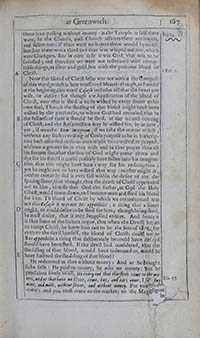 at Greenwich.
167
Serm.11.
at Greenwich.
167
Serm.11.
there is no passing without money: in the Temple it self there
were, In the Church, and Church affaires there are buyers,
and sellers too; if there were no buyers there would be no sel-
lers; but there was a third sort that was whiped out too; which
were Changers. But in oure case it was God, that was to be
satisfied; and therefore we were not redeemed with corrup-
table things, as silver and gold, but with the precious blood of
Christ.1 Pet. 1. Now this blood of Christ Iesus was not within the Compass
of this word, which is here translated Money: though, as I noted
at the begining, this word Casaph includes all that the heart can
wish, or desire: for though the Application of the blood of
Christ, now that is shed is to be wished by every sinner to his
own soul, Though the sheding of that blood might have been
wished by the patriarchs, to whom God had revealed, that in
the fullness of time it should be shed, at the second coming
of Christ, and the Resurrection may be wished for, by us now,
yet, if we take Rem integram, if we take the matter at first,
without any such revealing of Gods purpose as he in his Scrip-
ture hath afforded us; so no man might have wished, or prayed,
without a greater sin in that wish and in that prayer than all
his former sins, that the Son of God might come down and
dye for his sins: If it could possibly have fallen into his imagina-
tion, that this might have been a way for his redemption;
yet he ought not to have wished that way: neither might it,
neither certainly did it ever fall within the desire of any de-
sparing sinner, that thought, that the death of Christ appertaind
not to him, to wish that God the father, or God the Holy
Ghost, would come down, and become man and shed his blood
for him. ThThe blood of Christ by which we are redeemed was
not this Casaph it was not Res appetibilis, a thing that a sinner
might, or could desire to be shed for him, though being shed,
he must desire, that it may be applied to him. And hence it
is that some of the fathers argue, that when the Devill began
to tempt Christ, he knew him not to be the Son of God: for
even to the devil himself, the blood of Christ;Christ could not be
Res appetibilis, a thing that deliberately he could have desired
should have been shed. If the devil had considered, that the
shedding of that blood, would have redeemed us, would he
have hastned the shedding of that blood? He redeemed us then without money; And as he bought
so he sells: He paid no money, he asks no money: but he
proclaims freely to all,Esa. 55. Ho every one that thirsteth come to the wa-
ters, and ye that have no silver, come, buy, and eat; come, I say, buy
wine, and milk, without silver, and without money. But you must
come; and you must come to the market; to the Magazine of
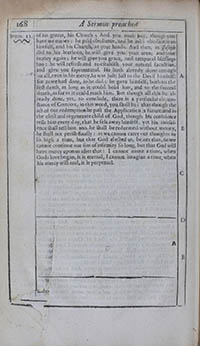 at Greenwich.
168
Serm.11.
at Greenwich.
168
Serm.11.
of his graces, his Church; And you must buy, though you
have no money: he paid obedience, and he asks obedience to
himself, and his Church, at your hands. And then, as Joseph
did to his brethren, he will give you your corn, and your
money again; he will give you grace, and temporal blessings
too: he will refresh and re-establish your natural faculties,
and give you supernatural. He hath already done enough
for all, even in his mercy, he was just; just to the Devil himself:
for as we had done, so he did; he gave himself; both to the
first death, as long as it could hold him, and to the second
death, as far as it could reach him. But though all this be al-
ready done, yet, to conclude, there is a particular circum-
stance of Comfort, in this word, you shall be: that though the
act of our redemption be past the Application is future: and in
the elect and regenerate child of God, though his conscience
tells him every day, that he sels away himself, yet his consci-
ence shall tell him too, he shall be redeemed without money,
he shall not perish finally: as we cannot carry our thoughts to
so high a time, but that God elected us, before that, so we
cannot continue our sins of infirmity so long, but that God will
have mercy upon us after that: I cannot name a time, when
Gods love began, it is eternal, I cannot imagine a time, when
his mercy will end, it is perpetual.
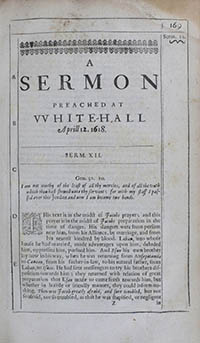 169
Serm.12.
A
169
Serm.12.
A SERMON
PREACHED AT
VVHITE-HALLWHITE-HALL
Aprill 12. 1618.
SERM. XII. Gen. 32.10.
I am not worthy of the least of all thy mercies, and of all the truth
which thou hast shewed unto thy servant; for with my staff I pas-
sed over this Jordan and now I am become two bands. THisThis text is in the midst of Jacobs prayer; and this
prayer is in the midst of Jacobs preparation in the
time of danger. His dangers were from persons
near him, from his Alliance, by marriage, and from
his nearest kindred by blood. LabanLaban, into whose
house he had married, made advantages upon him, deluded
him, oppressed him, pursued him. And Esau his own brother
lay now in his way, when he was returning from Mesopotamia
to Canaan, from his father-in-law, to his natural father, from,
to Isaac. He had sent messengers to try his brothers dis-
position towards him; they returned with relation of great
preparation that Esausau made to come forth towards him, but
whether in hostile or friendly manner, they could inform no-
thing. Then was Jacob greatly afraid, and sore troubled, but not
so afraid, nor so troubled, as that he was stupified, or negligent Z
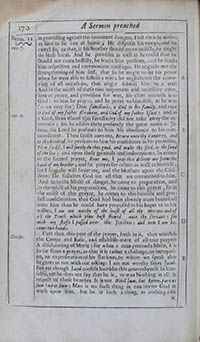 170
A Sermon preached
Serm.12.
170
A Sermon preached
Serm.12.
in providing against the imminent dangers. First then he makes
as sure as he can at home;ver. 7. He disposes his troops, and his
cattel so, as that, if his brother should come hostilly, he might
do least harm. And he provides as well as he could that he
should not come hostilly, he sends him presents, and he sends
him respective and ceremonious messages. He neglects not the
strengthening of him self, that so he might make his peace
when he were able to sustein a war; he neglects not the remo-
ving of all occasions, that might submit him to a war:
And in the midst of these two important and necessary cares,
love of peace, and provision for war, his chief recourse is to
God; to him he prays; and he prays to him first, as he was
(as we may say) Deus familiaris, a God to his familyDeus familiaris, a God to his family, and race
O God of my father Abraham,ver. 9. and God of my father IsaacIsaac; and as
a God, from whom this familiarity did not take away the re-
verence; for he addes there presently the great name of Je-
hova, the Lord he presents to him his obedience to his com-
mandment, Thou saidst unto me, Return unto thy Countrey, and
to thy kindred, he presents to him his confidence in his promises,
Thou saidst, I will surely do thee good, and make thy seed, as the sand
of the sea; and upon these grounds and inducements, he comes
to the formal prayer, Erue me, I pray thee deliver me from the
hand of my brother; and he prayes for others as well as himself;
for I fear he will smite me, and the Mothers upon the Chil-
dren: He solicites God for all that are committed to him.
And as in the Midst of danger, he came to preparation, and
in the midst of his preparations, he came to this prayer, so in
the midst of this prayer, he comes to this humble and grat-
full consideration, that God had been already more bountifull
unto him than he could have proposed to his hopes or to his
wishes, I am not worthy of the least of all thy Mercyes and of
all the Truth which thou hast shewed unto thy servant; for
with my staffe I passed over this Jordan; and now I am be-
come two bands. Divisio.First then this part of the prayer, hath in it, that which is
the Center and Basis, and establish-ment of all true prayers,
A disclaiming of Merit; for when a man pretends Merit, it is
so far from a prayer, as that it is rather a chalenge, an increpati-
on, an exprobration of his slacknes, to whom we speak that
he gives us not with out asking: I am not worthy sayes Jacob.
But yet though JacobJacob confess humblie this unworthyness in him-
selfe, yet he does not say that he is, or was Nothing at all, in
respect of these benefits. It is not Nihil sum, but katon, parvus
sum Impar Sum; Man is no such thing as can invite God to
work upon him, but he is such a thing, as nothing else
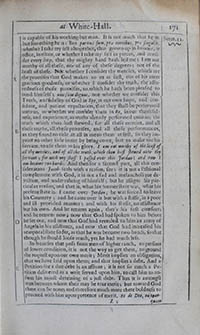 at White-Hall.
171
Serm.11.Serm.12.
at White-Hall.
171
Serm.11.Serm.12.
is capable of his working but man. It is not much that he is;
but something he is: But parvus sum, præ omnibus, præ singulis;
whether I take my self altogether, thus grown up in honour, in
office, in estate, or whether I take my self in pieces, and consi-
der every step, that thy mighty hand hath led me; I am not
worthy of all these, nornor of any of these degrees; not of the
least of these. Not whether I consider thy mercies, which are
the promises that God makes to us at first, out of his meer
gracious goodness, or whether I consider thy truth, the assu-
redness of those promises, to which he hath been pleased to
bind himself; non sum dignus, not whether we consider this
Truth, andand fidelity of God in Spe, in our own hope, and con-
fident, and patient expectation, that they shall be performed
unto us, or whether we consider them in Re, in our thankful-
ness, and experience, as truths already performed unto us; the
truth which thou hast shewed, for all these mercies, and all
these truths, all these promises, and all these performances,
as they found no title at all in me to them at first, so they im-
print no other title in me by being come, but to make me his
servant, to use them to his glory. I am not worthy of the least of
all thy mercies, and of all the truth, which thou hast shewed unto thy
servant; for with my staff I passed over this Jordan; and now I
am become two bands. And then for a second part, all this con-
sideration Jacob seals with a reason, for; it is not a fashional
complement with God, it is not a sad and melancholique de-
jection, and undervaluing of himself; but he assigns his par-
ticular reason, and that is, what his former state was, what his
present state is. I came over Jordan, he was forced to leave
his Countrey; and he came over it but with a staffe, in a poor
and ill provided manner; and with his staffe, no assistance
but his own. And he returns again, ther's his first comfort;
and he returns now; now that God had spoken to him before
he set out, and now that God had revealed to him an army of
Angels in his assistance, and now that God had increased his
temporal state so far, as that he was become two bands, so that
though he should loose much, yet he had much left. In benefits that pass from men of higher ranck, to persons
of lower condition, it is not the way to get them, to ground
the request upon our own merit; Merit implies an obligation,
that we have laid upon them; and that implies a debt. And a
Petition for a due debt is an affront; it is not so much a Pe-
tition delivered as a writ served upon him, to call him to an-
swer his injust deteining of a just debt. Thus it is amongst
men between whom theirthere may be true merit; but toward God
there can be none; and therefore much more there boldness to
proceed with him upon pretence of merit. Et de Deo, no tuantan-
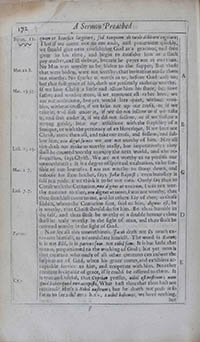 172
A Sermon PreachedpreachedSerm.11.Serm.12.
quam ac benefico largitore, sed tanquam de tardo debitore cogitare;
172
A Sermon PreachedpreachedSerm.11.Serm.12.
quam ac benefico largitore, sed tanquam de tardo debitore cogitare;
That if we come not to our ends, and preferment quickly,
we should give over considering God as a gratious, and free
giver in his time, and begin to consider him as a slack
pay master, and ill debtor, because he payes not at our time.
No Man was worthy to be biden to the supper;Mat. 22.8. But those
that were biden, were not worthy; that invitation made them
not worthy. No sparke of worth in us, before God call us;
but that first grace of his, doth not presently make us worthy.
If we love Christ a little and allow him his share,Mat. 13.37. but love
father and mother more, if we renounce all other love, we
are not ambitious, but yet would live quiet, without trou-
bles, without crosses, if we take not up our cross, or if we
take it, and sink under it, if we do not follow or if we take
it, and sink under it, if we do not follow, or if we follow a
wrong guide, bear our afflictions with the stupidity of a
Stoique, or with the pertinacy of an Heretique, If we love not
Christ, more then all, and take our cross, and follow, and fol-
low him, non digni sumus we are not worthy of him. Nay all
this doth not make us worthy really,Luk. 23.25. but imputatively; they
shall be counted worthy to enjoy the next world, and the re-
surrection, says Christ. We are not worthy as to profess our
unworthiness; It is a degree of spiritual exaltation, to be sen-
sible of our lowness;Mar. 1 7.Mar. 1.7 I am not worthy to stoop down, and
unloose his shoe latchet, says John Baptist; even humility it
self is a pride, if we think it to be our own. Onely say thus to
Christ with the Centurion, non dignus ut venirem, I was not wor-
thy to come to thee,Luk. 7.7. non dignus ut intres, I was not worthy, that
thou shouldest come to me, and let others say of thee, as those
Elders, whom the Centurion sent, said of him, dignus est, he
is worthy, that Christ should do for him. Be thou humble in
thy self, and thou shalt be worthy of a double honour; thou
shall be truly worthy in the sight of man, and thou shalt be
counted worthy in the sight of God. Parvus.Now for all this unworthiness, Jacob doth not so much ex-
tenuate himself, as to annihilate himself. The word is Katon;
it is not Elil, it is parvus sum not nihil sum. It is but little, that
man is, proportioned to the working of God; but yet man is
that creature, who onely of all other creatures can answer the
inspiration of God, when his grace comes, and exhibites ac-
ceptable service to him, and cooperate with him. No other
creature is capable of grace, if it could be offered to them. It
is true and useful,Cyp. that Cyprian presses, nihil est nostrum; nam
quid habes quod non accepisti, What hast thou that thou hast not
received? Her's a Nihil nostrum; but he doeth not press it so
far as to say nihil nos; her's a nihil habemus, we have nothing,
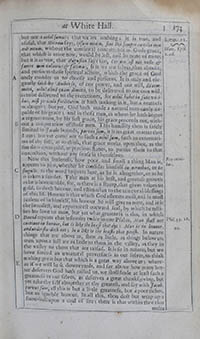 at White-Hall.
173
Serm.11.Serm.12.
at White-Hall.
173
Serm.11.Serm.12.
but not a nihil sumus; that we are nothing; it is true, and
useful, that Hierom says, ipsum meum,Hier.Hier. Epist.
1. ad. sine Dei semper auxilio non
erit meum, without the continual concurrence of Gods grace,
that which is mine now, would be lost, and be none of mine;
but it is as true, that Augustin says too, Cerum est nos velle &
facere um volumus & facimus, It is we our selves, that choose,
and perform those spiritual actions, which the grace of God
onely enables us to choose and perform. It is truly and ele-
gantly said by Ambrose, of our power, and out will, Ei com-
mitti, nihil aliud quam dimitti, to be delivered to our own will,
is to be delivered to the executioner, for nihil habet in suis vici-
bus, nisi periculi facilitatem, it hath nothing in it, but a nearness
of danger; but yet, God hath made a natural man onely ca-
pable of his grace; and in those men, in whom he hath begun
a regeneration, by his first grace, his grace proceeds not, with-
out a cooperation of those men. This humility then is safely
limited in Jacobs bounds, parvus sum, it is no great matter that
I am; but yet come not to such a nihil sum, such an extenuati-
on of thy self, as to think, that grace works upon thee, as the
sun does upon gold, or precious stones, to purifie them to that
concoction, without any sense in themselves. Now this littleness, how poor, and small a thing Man is,Præ omni-
bus.
appears to him, whether he consider himself in omnibus, or in
singulis, as the word imports here, as he is altogether, or as he
is taken a sunderasunder. Take man at his best, and greatest growth
as he is honourable, for, as there is a stamp, that gives values to
gold, so doth honour, and estimation to the temporal blessings
of this liflife. Honour is that which God esteems most, and is most
jealous of in himself, his honour he will give to none, and it is
the broadest, and apparantest outward seal, by which he testi-
fies his love to man, but yet what greatness is this, in which
David repeats that infirmity twice in one Psalm,Psal. 49. 12.
20. Man shall not
continue in honour, but is like the beast that dye: Man is in honour,
and understandeth not; he is like to the beasts that perish. In nature
things that are above us, shew as little, as things below us;
men upon a hill are as little to them in the valley, as they in
the valley to them that are raised. It is so in nature; but we
have forced an unnatural perversness in our selves, to think
nothing great but that which is a great way above us; where-
as if we will look downvvardsdownwards, and see above how many bet-
ter deservers God hath raised us, we shall finde at least such a
greatness in our selves, as deserves a great thanksgiving, but
yet take thy self altogether at thy greatest, and say with Jacob;
parvus sum, all this is but a little greatness, but a poor riches,
but an ignoble honour. In all this, thou dost but wrap up a
snow-ball upon a coal of fire; there is that within thee that
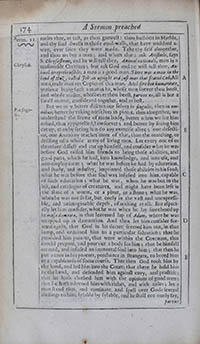 174
A Sermon preached
Serm.11.Serm.12.
174
A Sermon preached
Serm.11.Serm.12.
melts thee, as fast, as thou growest: thou buildest in Marble,
and thy soul dwells in those mud-walls, that have moldred a-
way, ever since they were made. Take thy self altogether,
and thou art but a man; and whats that: ask Aristotle, says
S. Chrysostome,Chrysost. and he will tell thee, Animal rationale, man is a
reasonable Creature; but ask God and he will tell thee, An-
imal irreprehensible; a man is a good man. There was a man in the
land of Huz, called Job; an upright and just man that feared God; All
men, truly men are Copies of this man. And sine hac humanitate,
without being such a man as he, whose man soever thou beest,
and whose master, whosoever thou beest, parvus es, all is but a
small matter, considered together, and at best. Præ singu-
lis.But we may better discern our selves in singulis, then in om-
nibus; better by taking ourselves in pieces, then altogether, we
understand the frame of mans body, better when we see him
naked, than apparrelled, howsoever; and better by seeing him
cut up, than by seeing him do any exercise alive; one desecti-
on, one Anatomy teaches more of that, than the marching, or
drilling of a whole army of living men. Let every one of us
therefore dissect and cut up himself, and consider what he was
before God raised him friends to bring those abilities, and
good parts, which he had, into knowledge, and into use, and
into employment; what he was before he had by education,
and study, and industry, imprinted those abilities in his soul;
what he was before that soul was infused into him, capable
of such education; what he was, when he was but in the
list, and catalogue of creatures, and might have been left in
the state of a worm, or a plant, or a stone; what he was,
when he was not so far, but onely in the vast and unexpressi-
ble, and unimaginable depth, of nothing at all. But especi-
ally let him consider, what he was when he lay smothered up
in massa damnata, in that leavened lap of Adam, where he was
wrapped up in damnation. And then let him consider for-
ward again, that God in his decree severed him out, in that
lump, and ordained him to a particular salvation; that he
provided him parents, that were within the Covenant, that
should prepare, and pour out a body for him; that he himself
created, and infused an immortal soul into him; that then he
put a care in his parents, perchance in strangers, to breed him
to a capableness of some course. That then God took him by
the hand, and led him into the Court; that there he held him
by the hand, and defended him against envy, and practise;
that he hath clothed him with the opinions of good men;
that he hath adorned him with riches, and with titles; let a
man stand thus, and ruminate, and spell over Gods several
blessings to him, sylable by sylable, and he shall not onely say,
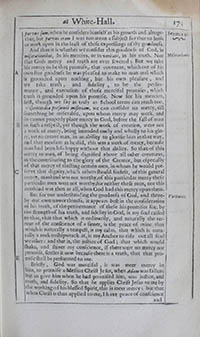 at White-Hall.
175
Serm.12.
at White-Hall.
175
Serm.12.
parvus sum, when he considers himself at his growth and altoge-
ther, but parvus eram I was too mean a subject for thee to look
or work upon in the least of these expressings of thy goodness. And thus it is whether we consider this goodness of God, in
miserationibus, In his mercies, or in veritate, in his truth.MiserationisMiserationis Not
that Gods mercy and truth are ever severed; But we take
his mercy to be that promise, that covenant, which out of his
own free goodness he was pleased to make to man and which
is grounded upon nothing, but his own pleasure, and
we take truth, and fidelity, to be the perfor-
mance, and execution of those merciful promises, which
truth is grounded upon his promise. Now for his mercies,
first, though we say as truly as School terms can reach tooto,
Miserecordia presumit miseriam, we can consider no mercy, till
something be miserable, upon whom mercy may work, and
so cannot properly place mercy in God, before the fall of man
in such a respect, yet though the work of creation, were not
a work of mercy, being intended onely and wholly to his glo-
ry, yet to create man, in an ability to glorifie him in that way,
and that measure as he did, this was a work of mercy, because
man had been less happy without that ability. So that of this
mercy to man, of being dignified above all other creatures,
in the contributing to the glory of the Creator, but especially
of that mercy of electing certain men, in whom he would pre-
serve that dignity, which others should forfeit, of this general
mercy, mankind was not worthy, of this particular mercy these
particular men were not worthy, for neither these men, nor this
mankind was then at all, when God had this mercy upon them. But for our understanding the goodness of God,Veritates. and there-
by our own unworthiness, it appears best in the consideration
of his truth, of the performance of these his promises for, by
the strength of his truth, and fidelity in God, is my soul raised
to that, that that which is ordinarily, and naturally the ter-
rour of the conscience of a sinner, is the peace of mine, that
which is naturally a tempest, is my calm, that which is natu-
rally a rock to shipwrack at, is my Anchor to ride out all foul
weather: and that is, the justice of God; that which would
shake, and shiver my conscience, if there were no mercy nor
promise, settles it now because there is a truth, that that pro-
mise shall be performed to me. Briefly, God was merciful, it was meer mercy in
him, to promise a Messias Christ Jesus, when Adam was fallen;
but to give him when he had promised him, was justice, and
truth, and fidelity. So that he applies Christ Jesus to me by
the working of his blessed Spirit, this is meer mercy; but that
when Christ is thus applied to me, I have peace of conscience
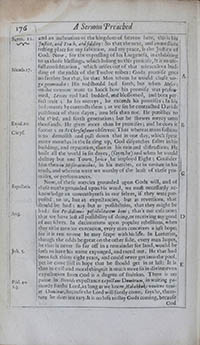 176
A Sermon Preachedpreached
Serm.12.
176
A Sermon Preachedpreached
Serm.12.
and an inchoation of the kingdom of heaven here, this is his
Justice, and Truth, and fidelity: So that the next, and immediate
resting place for my salvation, and my peace, is the Justice of
God. Now, for the expressing of his Largeness, in exhibiting
to us those blessings, which belong to this promise, It is an use-
full consideration,Numb. 17. which arises out of that miraculous bud-
ding of the rodds of the Twelve tribes: Gods promise goes
no farther but that, for that Man whom he would chuse vir-
ga germinabit: His rod should bud forth, but when Moses;
on the morrow went to loocklook how his promise was perfor-
med, LeviesLevi's rod had budded, and blossomed, and born per-
fect fruit; In his mercys, he exceeds his promises; In his
judgments he contracts them; as we see he contracted Davids
pestilence of three dayes, into less than one. He punishes to
the third, and forth generation; but he shewes mercy unto
thousands.Exod. 20. He gives more than he promises; and he does it
sooner;Chrys. as St Chrysostome observes: That whereas mans fashion
is to demolish and pull down that in one day, which spent
many monthes in the setting up, God dispatches faster in his
building, and reparation, than in his ruin and distruction; He
built all the world in six dayes, (sayes he) and when he would
destroy but one Town, JericoJerico, he imployd Eight; Consider
him then in Miserationibus, in his mercies, or in veritate in his
truth, and wherein were we worthy of the least of these pro-
mises, or performances. Expectatio.Now, of these mercies grounded upon Gods will, and of
these truths grounded upon his word, we must necessarily ac-
knowledge an unworthyness in our selves, if they were pro-
posed to us, but as expectancies, but as reversions, that
should be had; nay but as possibilities, that they might be
had:Aug. for Perdidimus possibilitatem boni; that's our case now;
that we have lost all possibility of doing, or receiving any good
of our selves. In decimations upon popular rebellions, when
they tithe men for execution, every man conceives a just hope;
for it is ten to one he may scape with his life. In Lotteries,
though the odds be great on the other side, every man hopes,
he that is never so far off in a remainder for land, would be
loth to have his name expunged,Joh. 5. and raced out. He that had
been sick thirty eight years, and could never get into the pool,
yet he came still in hope that he should get in at last: It is
thus in civil and moral things; it is much more so in divine; even
expectation from God is a degree of fruition. There is no
paine in Davids expectance expectam DominumDominum,Psal. 40.2.3. in waiting pa-
tiently for the Lord, as long as we know, Habakkuks veniens veni-
et Dominus, because the Lord will surely come, says he, there-
fore he does not tary. It is no loss to stay Gods coming, because
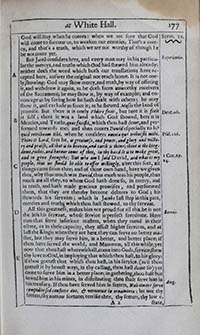 at White-Hall.
177
Serm.12.
at White-Hall.
177
Serm.12.
God will stay when he comes: when we are sure that God
will come to succour us, to weaken our enemies, That's a mer-
cy, and that's a truth, which we are not worthy of though he
be not come yet. But JacobJacob considers here,Experientia. and every man may in his particu-
lar the mercys, and truths which God had shewed him already;
neither doth the word which both our translations have ac-
cepted here, answer the original nor reach home. It is not one-
ly, showing; God may show mercy, and truth, by way of offering
it, and withdraw it again, as he doth from unworthy receivers
of the Sacrament; he may show it, by way of example; and en-
conrageen-
courage us by seeing how he hath dealt with others; he may
show it, and exclude us from it; as he shewed Moses the land of
promise. But there it is onely Videre fecit,Deut. ult. but here it is fecit
it self; there it was a land which God showed, here it is
Mercies, and Truths, quas fecisti,,, which thou hast done, and per-
formed towards me; and then comes David especially to his
quid retribuam tibi, when he considers omnia quæ tribuisti mihi.Psal. 116.
Thine O Lord, says he, is greatness, and power, and glory and victo-
ry and praise; all that is in heaven, and earth is thine; thine is the king-
dome, riches, and honour come of thee, in thy hand it is to make great,
1 Cor. 29.
24. and to give strengths: But who amBut who am I said David, and what is my
people, that we should be able to offer willingly, after this sort, all
things came from thee; and of thine own hand, have we given
thee, why thus much was David, thus much was his people, thus
much are all they, to whom God hath done so, in mercy, and
in truth, and hath made gracious promises, and performed
them, that they are thereby become debtors to God; his
stewards his servants; which is Jacobs last step in this part,
mercies and truths which thou hast showed, to thy servant. All this greatness, makes him not proud: for all this,Servus. he is not
the less his servant, whose service is perfect freedome. Here
men that serve inferiour masters, when they mend in their
estate, or in their capacity, they affect higher services, and at
last the Kings; when they are here, they can serve no better ma-
ster, but they may serve him, in a better, and better place; if
thou have served the world, and Mammon, all this while, yet
now that thou hast wherewithall, come into Gods, service; shew
thy love to God, in imploying that which thou hast, to his glory;
if thou gottest that which thou hast, in his service, (as if thou
gottest it by honest ways, in thy calling, thou hast done so) yet
come to serve him in a better place; in gathering, thou hast but
served him in his mines,Aug. in distributing thou shalt serve him in
his treasury. If thou have served him in fetters, Noli timere serve
compedite sed confitere duo & vertentus in ornamenta; let not thy
fetters, thy narrow fortune;, terrifie thee, thy fetters, thy low e-
Aa
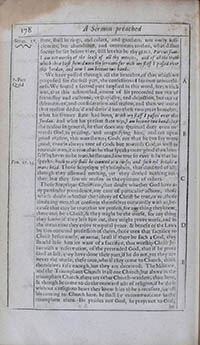 178
A Sermon preached
Serm.12.
state shall be rings, and colarscollars, and garthersgarters, not onely suffi-
178
A Sermon preached
Serm.12.
state shall be rings, and colarscollars, and garthersgarters, not onely suffi-ciencies, but abundance, and ornaments to thee, what dishes
soever he set before thee, still let this be thy grace, Parvus sum,
I am not worthy of the least of all thy mercies, and of all the truth
which thou hast shewed unto thy servant; for with my staff I passed over
this Jordan, and nowJordan, and now I am become two bands. 2. Part
QuidWe have passed through all the branches, of that which we
proposed for the first part, the confession of his own unworthi-
ness. We found a second part implied in this word, for; which
was, that this acknowledgement of his proceeded not out of
formality and custome, or stupidity, and dejection, but out of
debatement, and consideration and reason; and then we found
that reason deduc'd and deriv'd into these two great branches,
what his former state had been, With my staff I passed over this
Jordan, and what his present state was, I am become two bands, for
the reason in general, he that does any spiritual duty even to-
wards God, in praising, and magnifying him, and not upon
good reason, this man flatters God; not that he can say more
good, than is always true of God; but towards God, as well as
towards man, it is true, that he that speaks more good than him-
self believes to be true, he flatters, how true so ever it be that he
speaks.Pro. 27.14. Such praise shall be counted as a curse; and such oyl breaks a
mans head. Those Sceptique phylosophers, that doubted of all,
though they affirmed nothing, yet they denied nothing nei-
ther, but they saw no reason in the opinions of others. Those Sceptique Christians, that doubt whether God have a-
ny particular providence, any care of particular actions, those
which doubt, whether the history of Christ be true, or no, those
doubting men, that conform themselves outwardly with us, be-
cause that may be true, that we profess, for any thing they know,
there may be a Christ, & they might be the worse, for any
thing they know, if they left him out, they might prove worse, and in
the mean time they enjoy temporal peace, & benefit of the Laws
by this outward profession of theirs, those men that sacrifice to
Christ Jesus onely, ne noceat, leastlest if there be such a God, they
should lose him for want of a sacrifice, that worship Christ Je-
sus with a reservation, of the pretended God, that if he prove
God at last, they have done their part, if he do not, yet they are
never the worse, these men, who if they come to Church, think
themselves safe enough, but they are deceived; The Militant,
and the Triumphant Church is all one Church, but above in the
triumphant Church, there are other Church-wardens, than here,
& though he come to do the outward acts of religion, if he do it
without a religious heart, they know him to be a recusant, for all
his coming to Church here, he shall be excommunicate in the
triumphant there. He praises not God, he prays not to God,
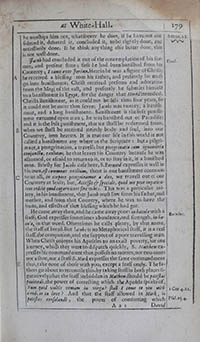 at White-Hall.
179
Serm.12.
at White-Hall.
179
Serm.12.
he worships him not, whatsoever he does, if he have not con-
sidered it, debated it, concluded it, to be rightly done, and
necessarily done. If he think any thing else better done, this
is not well done. Jacob had concluded it out of the contemplation of his for-
mer, and present state;Exul. first he had been banished from his
Countrey; I came over Jordan, Herein he was a figure of Christ;
he received a blessing from his father, and presently he must
go into banishment; Christ received presents and adoration
from the Magi of the east, and presently he submits himself
to a banishment in EgyptEgypt, for the danger that Herod intended.
Christs Banishment, as it could not be less then four years, so
it could not be more then seven; Jacobs was twenty, a banish-
ment, and a long banishment. Banishment is the first punish-
ment executed upon man; he was banished out of Paradise;
and it is the last punishment, that we shall be redeemed from,
when we shall be received intirely body and soul, into our
Countrey, into heaven. It is true our life in this world is not
called a banishment any where in the Scripture: but a pilgri-
mage, a peregrination, a travell; but peregrinatio cum ignominia
conjunctu, exilium; he that leaves his Countrey because he was
ashamed, or afraid to return to it, or to stay in it, is a banished
man. Briefly for Jacobs case here, S. Bernard expresses it well in
his own, est commune exilium, there is one banishment common
to us all, in corpore peregrinamur a duo, we travell out of our
Countrey at least; but, Accessit & speciale, quod me pene inpatien-
tem reddit quod cogarvicere sine vohisvobis. This was a particular mi-
sery, in his banishment, that JacobJacob must live from his father, and
mother, and from that Country, where he was to have the
fruits, and effects of that blessing which he had got. He came away then, and he came away poor:Baculus.Baculus. in baculo with a
staff; God expresses sometimes abundance, and strength, in ba-
culo, in that word. Oftentimes he calls plenty, by that name,
the staff of bread. But Jacobs is no Metaphorical staff, it is a real
staff, the companion, and the support of a poor travelling man.
When Christ enjoyns his Apostles to an exact poverty, for one
journey, which they were to dispatch quickly, S. Matthew ex-
presses his commandment thus, possess no monies; nor two coats
nor a shoe, nor a staff; S. Mark expresses the same commandment
thus, take none of those with you, except a staff onely. The fa-
thers go about to reconcile this, by taking staff in both places fi-
guratively; that the staff forbidden in Matthew, should be potestas
puniendi, the power of correcting which the Apostle speaks of,
Num quid vultis vemam in virga?1 Cor. 4.21. shall I come to you with
a rod, or in love? And that the staff allowed in Mark, is
potestas consolandi,Psal. 25.4. the power of comforting which
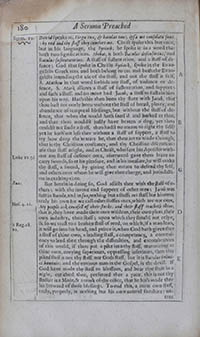 180
A Sermon Preachedpreached
Serm.12.
180
A Sermon Preachedpreached
Serm.12.
David speaks of, Virga tua, & baculus tuus, ipsa me consolata sunt,
Thy rod and thy staff they comfort me. Christ spoke this but once,
but in his language, the Syriack, he spoke it in a word that
hath two significations. Shebat, is both Baculus defensorius, and
Baculus sustentatorius. A staff of sustentation, and a staff of de-
fence; God that spoke in Christs Syriack, spoke in the Evan-
gelists Greek too; and both belong to us; and both the Evan-
gelists intending the use of the staff, and not the staff it self,
3.S. Matthew in that word forbids any staff, of violence or de-
fence, S. Mark allows a staff of sustentation, and support;
and such a staff, and no more had JacobJacob, a staff to sustain him
upon his way. Hath this then been thy state with JacobJacob, that
thou hast not onely been without the staff of bread, plenty, and
abundance of temporal blessings, but without the staff of de-
fence, that when the world hath snarl'd and barked at thee,
and that thou wouldst justly have beaten a dog, yet thou
couldst not finde a staff, thou hadst no means to right thy self?
yet he hath not left thee without a staff of support, a staff to
try how deep the waters be, that thou art to wade through,
that is thy Christian constancy, and thy Christian discretion:
use that staff aright, and as Christ, who sent his Apostles with-
out any staff of defence once, Luke 22.36. afterward gave them leave to
carry swords, so at his pleasure, and in his measure, he will make
thy staff, a sword, by giving thee means to defend thy self,
and others over whom he will give thee charge, and jurisdicti-
on in exalting thee. Suus.But herein in doing so, God assists thee with the staff of o-
thers; with the favour and support of other men; Jacob was
first in Baculo, and in suo, nothing but a staff; no staff but his own;
truly his own for we call other staffes ours,Hos. 4.12. which are not ours,
My people ask counsell of their stocks, and their staff teacheth them;
that is, they have made their own wisdom, their own plots, their
own industry, their staff; upon which they should not relye,
& so we trust to a broken staff of reed,2 Reg. 18.
21. on which, if a man lean,
it will go into his hand, and peirce it, when God hath given thee
a staff of thine own, a leading staff, a competency, a conveni-
ency to lead thee through the difficulties, and encombrances
of this world, if thou put a pike into thy staff, murmuring at
thine own, envying superiours, oppressing inferiours, then this
piked staff is not thy staff, nor Gods staff, but it is Baculus inimi-
ci hominis; and the envious man in the Gospel, is the devil. If
God have made thy staff to blossom, and bear ripe fruit in a
night, enriched thee, preferred thee a pace, this is not thy
staff; it is a Mace, & a mark of thy office, that he hath made thee
his Steward of those blessings. To end this, a mans own staff,
truly, properly, is nothing but his own natural faculties: na-
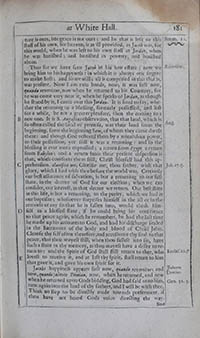 at White-Hall.
181
Serm.12.
ture is ours, but grace is not ours; and he that is left to this
at White-Hall.
181
Serm.12.
ture is ours, but grace is not ours; and he that is left to this
staff of his own, for heaven, is as ill provided, as Jacob was, for
this world, when he was left to his own staff at Jordan, when
he was banished; and banished in poverty, and banished
alone. Thus far we have seen Jacob in his low estate;Revertitur. now we
bring him to his happyness: in which it is always one degree
to make hast; and so we will; all is comprised in this that is,
was present. Now I am two bands, now; it was first now,
quando revertitur, now when he returned to his Countrey, for
he was come very near it, when he speaks of Jordan, as though
he stood by it, I came over this Jordan. It is hard to say, whe-
ther the returning to a blessing, formerly possessed, and lost
for a while, be not a greater pleasure, then the coming to a
new one. It is S. Augustins observation, that that land,Aug. which is
so often called the land of promise, was their land from the
beginning, from the beginning Sem, of whom they came, dwelt
there: and though God restored them by a miraculous power,
to their possession, yet still it was a returning: and so the
blessing is ever more expressed; a return from Egypt, a return
from Babylon; and a return from their present dispersion is
that, which comforts them still, Christ himself had this ap-
prehension, clarifica me, Glorifie me, thou father,Joh. 17.5. with that
glory, which I had with thee before the world was. Certainly
our best assurance of salvation, is but a returning to our first
state, in the decree of God for our election; when we can
consider, our interest, in that decree we return. Our best state
in this life, is but a returning, to the purity, which we had in
our baptism; whosoever surprises himself in the act or in the
remorse of any sin that he is fallen into, would think him-
self in a blessed state, if he could bring his conscience
to that peace again, which he remembers, he had the last time
he made up his accounts to God, and had his discharge sealed
in the Sacrament of the body and blood of Christ Jesus.
Cleanse thy self often therefore, and accustome thy soul to that
peace, that thou mayest still, when thou fallest into sin, have
such a state in thy memory, as thou mayest have a desire to re-
turn to: and the Spirit of God shall still return to thee,Eccles. 12.7. who
lovest to receive it, and at last thy spirit, shall return to him
that gave it, and gave his own spirit for it. Jacobs happiness appears first now, quando revertitur;Jubenre
Domino.Domino. and
now, quando jubente Domino, now, when he returned, and now
when he returned upon Gods bidding, God had said unto him,Gen. 31.3.
turn again into the land of thy fathers, and I will be with thee,
Think no step to be directly made towards preferment, if
thou have not heard Gods voice directing the way.
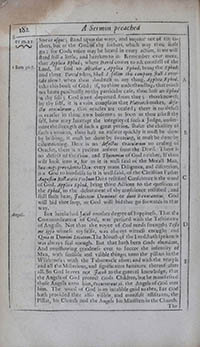 182
A Sermon preached
Serm.21.Serm.12.
182
A Sermon preached
Serm.21.Serm.12.
Stre in usque; stand upon the ways, and inquire not of thy fa-
thers, but of the God of thy fathers, which way thou shalt
go: for Gods voice may be heard in every action, if we will
stand still a little, and hearken to it. Remember ever more,
that Applica Ephod;1 Sam. 30.7. where David comes to ask counsell of the
Lord, he said to Abiathar, Applica Ephod; bring the Ephod;
and there David askes, Shall I follow this company, shall I over-
take them? when thou doubtest of any thing, Applica Ephod,
take this book of God: if, to thine understanding, that reach
not home punctually to thy particular case, thou hast an Ephod
in thy self; God is not departed from thee; thou knowest
by thy self, it is a vain complaint that PlutrarchPlutarch makes, defe-
ctu oraculorum, that oracles are ceased; there is no defect
of oracles in thine own bosome; as soon as thou askest thy
self, how may I corrupt the integrity of such a Judge, under-
mine the strength of such a great person, shake the chastity of
such a woman, thou hast an answer quickly it must be done
by bribing, it must be done by swearing, it must be done by
calumniating. Here is no defectus Oraculorum no ceasing of
Oracles, there is a present answer from the Devil. There is
no defect of the Vrim, and Thummim of God neither, If thou
wilt look into it, for as it is well said of the Morall Man,
Sua cuiq;cuique providentia Deus every mans Diligence, and discretion,
is a God to himselfe so it is well said, of the Christian Father
Augustin Rectaratio Verbum Dei a rectified Conscience is the word
of God. Applica Ephod, bring thine Actions to the question of
the Ephod, to the debatment of thy conscience rectified, and
still shalt hear, Jubentem Dominus or duni Revocantem, God
will bid thee stop, or God will bid thee go forwards in that
way. Angeli. But herein had Jacob another degree of happiness, That the
Commandement of God, was persued with the TestímonyTestimony
of Angells. Not that the voyce of God needs strength; Teste
me ipso witness my selfe, was always witness enough; and
Quia os Domini Locutum. The Mouth of the Lord: hath spoken it
was always seal enough. But that hath been Gods abundant,
Andand overflowing goodness ever to succor the infirmítyinfirmity of
Man, with sensible and visible things; unto the pillars in the
Wilderness; with the Tabarnacle after; and with the temple
and all the Misterious, and significative furniture thereof after
all. So God leaves not Jacob to the general knowledge, that
the Angels of God protect Gods Children, but he manifested
those Angels unto him, Occurrerunt ei., the Angels of God met
him. The word of God is an infalible guidguide to thee, Butbut God
hath provided thee also visible, and manifest assistants, the
Pillar, his Church and the Angels his Ministers in the Church.
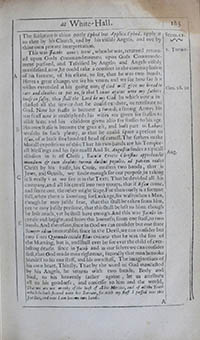 at White-Hall.
183
Serm.12.
at White-Hall.
183
Serm.12.
The Scripture is thine onely Ephod but Applica Ephod, apply it
to thee by his Church, and by his visible Angels, and not by
thine own private interpretation. This was Jacobs nunc; now, when he was returned,2. Turmæ. return-
ed upon Gods Commandement; upon Gods Commande-
ment pursued, and Testified by Angels; and Angels visibly
manifested, now, he could take a comfort in the contemplation
of his fortune, of his estate, to see, that he was two bands.
Heres a great change; we see his vowe; and we see how far his
wishes extended at his going out; Gen. 28.20. If God will give me bread to
eate, and cloathes to put on, so that I come againe unto my fathers
house in saftysafety, then shall the Lord be my GodLord be my God, Inin which vow is in-
cluded all the service that he could exhibite, or retribute to
God. Now his staffe is become a sword; a strong Army; his
one staff now is multiplyed; his wifes are given for staffes to
assist him; and his children given also for staffes to his age.
His own staffe is become the greatest, and best part of LabansLabans
wealth; In such plenty, as that he could spare a present to
Esau, of at least five hnndredhundred head of cattell. The fathers make
Morall expositions of this; That his two bands are his Tempor-
all blessings and his spiritualllspirituall. And St. Augustin findes a tipicall
allusion in it of Christ,Aug. Baculo Crucis Christus apprehendit
mundum & cum duabus turmis duobus populis, ad patrem rediit
Christ by his staffe, his CroseCross, musters two bands, that is
Jews, and Gentils. We finde enough for our purpose, in taking
it literally; as we see it in the Text; That he devideddivided all his
company, and all his cattell into two troups, that if Esau come,
and smite one, the other might scape. For then onely is a fortune
full, when there is somthing for Leakage, for wast; when a Man,
though he may justly fear, that this shall be taken from him,
yet he may justly presume, that this shall be left to him; though
he lose much, yet he shall have enough. And this was Jacobs in-
crease and height; and from this lowness; from one staff, to two
bands. And therefore, since in God we can consider but one state
Semper idem immutable; since in the Devil, we can consider but
two staesstates Quomodo cecidit filius Orientis that he was the son of
the Morning, but is, and shall ever be for ever the child of ever-
lasting death; since in Jacob and in our selves we can consider
first, that God made man righteous, secondly that man betooke
himself to his one staff, and his own staff, The imaginations of
his own heart, Thirdly, That by the word of God manifested
by his Angels, he retnrnsreturns with two bands, Body and
Soul, to his heavenly father againe, let us attribute
all to his goodness, and confesse to him and the world,
That we are not worthy of the least of all his Mercies, and of all the Truth
which he hath shewed unto his Servant, for with my staff I passed over this
Jordan, and now I am become two bands.
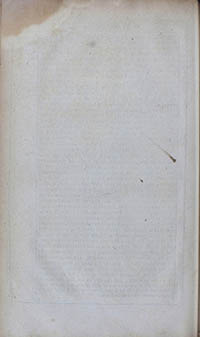
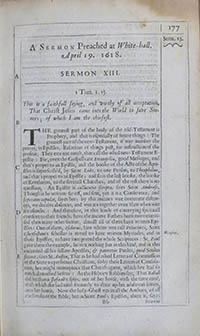 177
Serm.13.
A Sermon Preached at White-hall.
177
Serm.13.
A Sermon Preached at White-hall. April 19. 1618.
SERMON XIII. 1 Tim. 1.15.
This is a faithfull saying, and worthy of all acceptation,
That Christ Jesus came into the World to save Sin-
ners; of which I am the chiefest. THEThe greatest part of the body of the old-Testament is
Prophecy, and that is especially of future things: The
greatest part of the new-Testament, if wee number the
peeces, is Epistles, Relations of things past, for instruction of the
present. They erre not much, that call the whol new-Testament E-
pistle: For, even the Gospells are Evangelia, good Messages, and
that's proper to an Epistle, and the booke of the Acts of the Apo-
stles is superscrib'd, by Saint Luke, to one Person, to Theophilus,
and that's proper to an Epistle; and so is the last booke, the booke
of Revelation, to the severall Churches; and of the rest there is no
question, An Epistle is collucutio scripta, saies Saint Ambrose,
Though it be written far off, and sent, yet it is a Conference, and
seperatos copulat, sayes hee; by this meanes wee overcome distan-
ces, we deceive absences, and wee are together even then when wee
are asunder: And therefore, in this kinde of conveying spirituall
comfort to their friends, have the ancient Fathers been more exerci-
sed then in any other former, almost all of them have written Epi-
stles: One of them, Isidorus, him whom wee call Peluciotes, Saint
Chrysostom's schollar is noted to have written Myriades,Nicephor. and in
those Epistles, to have interpreted the whole Scriptures: St. Paul
gave them the example, he writ nothing but in this kind, and in this
exceeded all his fellow Apostles, & pateretur Paulus, quod Saulus
seceret, saies St. Austin, That as he had asked Letters of Commission
of the State to persecute Christians, so by these Letters of Consola-
tion, hee might recompence that Church againe, which hee had so
much damnified before: As the Hebrew Rabbins say, That Rahab
did let down JofuahJosuah's spies, out of her house, with the same cord,
with which she had used formerly to draw up her adultrous lovers,
into her house. Now the holy-Ghost was in all the Authors, of all
the books of the Bible, but in Saint Pauls Epistles, there is, says Bb
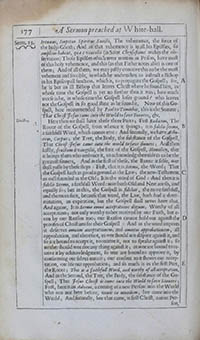 177
A Sermon preached at VVhite-hallWhite-hall.
Serm.13.
177
A Sermon preached at VVhite-hallWhite-hall.
Serm.13.
Irenæus, Impetus Spiritus Sancti, The vehemence, the force of
the holy-Ghost; And as that vehemence is in all his Epistles, so
amplius habent, quæ e vinculis (as Saint Chrysostome makes the ob-
servation) Those Epistles which were written in Prison, have most
of this holy vehemence, and this (as that Father notes also) is one of
them; And of all them, we may justly conceive this to be the most
vehement and forcible, in which he undertakes to instruct a Bishop
in his Episcopall function, which is, to propagate the Gospell; for,
he is but an ill Bishop that leaves Christ where he found him, in
whose time the Gospell is yet no farther then it was; how much
worse is he, in whose time the Gospell loses ground? who leaves
not the Gospell in so good state as he found it. Now of this Go-
spell, here recommended by Paul to Timothie, this is the Summe;
That Christ Jesus came into the World to save Sinners, &c. Division.Here then we shall have these three Parts; First Radicem, The
Roote of the Gospell, from whence it springs; it is fidelis sermo,
a faithfull Word, which cannot erre: And secondly, we have Arbo-
rem, Corpus; the Tree, the Body, the substance of the Gospell,
That Christ Jesus came into the world to save sinners; And then
lastly, fructum Evangelii, the fruit of the Gospell, Humility, that
it brings them who embrace it, to acknowledg themselves to be the
greatest sinners, And in the first of these, the Roote it selfe, wee
shall passe by these steps: First, that it is Sermo, the Word; That
the Gospell hath as good a ground as the Law; the new-Testament
as well founded as the Old; It is the word of God: And then it is
fidelis Sermo, a faithfull Word: now both Old and New are so, and
equally so; but in this, the Gospell is fidelior, the more faithfull,
and the more sure, because that word, the Law, hath had a deter-
mination, an expiration, but the Gospell shall never have that.
And againe, It is Sermo omni acceptatione dignus, Worthy of all
acceptation; not only worthy to bee received by our Faith, but e-
ven by our Reason too; our Reason cannot hold out against the
proofes of Christians for their Gospell: And as the word imports
it deserves omnem acceptationem, and omnem approbationem, all
approbation, and therefore, as wee should not dispute against it, and
so are bound to accept it, to receive it, not to speake against it; so
neither should wee doe any thing against it; as wee are bound to re-
ceive it by acknowledgment, so wee are bound to approve it, by
conforming our selves unto it; our consent to it shewes our accep-
tation, our life our approbation; and so much is in the first Part,
the Roote; This is a faithfull Word, and worthy of all acceptation.
And in the Second, the Tree, the Body, the substance of the Go-
spell; That Jesus Christ is come into the World to save Sinners;
First, here is an Advent, a coming of a new Person into the World
who was not here before, venit in mundum, hee came into the
World; And secondly, hee that came, is first Christ, a mixt Per-
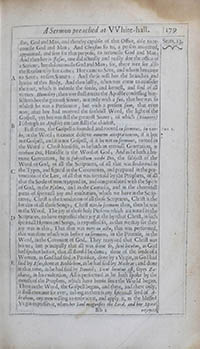 A Sermon preached at VVhite-HallWhite-Hall.
179
Serm.13.
son, God and Man, and thereby capable of that Office, able to re-
A Sermon preached at VVhite-HallWhite-Hall.
179
Serm.13.
son, God and Man, and thereby capable of that Office, able to re-concile God and Man; And Christus so to, a person anoynted,
appointed, and sent for that purpose, to reconcile God and Man;
And then hee is Jesus, one did actually and really doe the office of
a Saviour, hee did reconcile God and Man; for, there wee see also
the Reason why hee came; Hee came to Save, and whom hee came
to Save; to save Sinners: And these will bee the branches and
lymbs of this Body. And then lastly, when wee come to consider
the fruit, which is indeede the seede, and kernell, and soul of all
virtues Humility; then wee shall meete the Apostle confessing him-
selfe to bee the greatest Sinner, not only with a fui, that hee was so
whilest he was a Persecutor, but with a present sum, that even
now, after hee had received the faithfull Word, the light of the
Gospell, yet hee was still the greatest Sinner; of which (Sinners)
I (though an Apostle) am (am still) the chiefest,. First then, the Gospell is founded and rooted in sermone,Part 1. in ver-
bo, in the Word; it cannot deserve omnem acceptationem, if it bee
not Gospell, and it is not Gospell, if it be not in sermone, rooted in
the Word: Christ himselfe, as he hath an eternall Generation, is
verbum Dei, Himselfe is the Word of God; And as he hath a hu-
mane Generation, he is subjectum verbi Dei, the subject of the
Word of God, of all the Scriptures, of all that was shadowed in
the Types, and figur'd in the Ceremonies, and prepared in the pre-
ventions of the Law, of all that was foretold by the Prophets, of all
that the Soule of man rejoyced in, and congratulated with the Spirit
of God, in the Psalms, and in the Canticles, and in the cheerefull
parts of spirituall joy and exultation, which we have in the Scrip-
tures; Christ is the foundation of all those Scriptures, Christ is the
burden of all those Songs; Christ was in sermone then, then he was
in the Word. The joy of those holy Persons which are noted in the
Scriptures, to have expressed their joy at the byrth of Christ, in such
spirituall Hymns and Songs, is expressed so, as that we may see their
joy was in this, That that was now in actu, that was performed,
that was done which was before in sermone, in the Promise, in the
Word, in the Covenant of God. They rejoyced that Christ was
borne; but principally that all was done so, sicut locutus, as God
had spoken before, that all should be done; done of the seede of a
Woman, as God had said in Paradice, done by a Virgin, as God had
said by Esai, done at Bethlehem, as he had said by Micheas; and done
at that time, as he had said by Daniel; Sicut locutus est, sayes Za-
charie, in his exultation, All is performed as he hath spoke by the
mouth of the Prophets, which have beene since the World began.
There in the Word, the Gospell begins, and there, and there only,
it shall continue for ever, as long as there is any spirituall seed of A-
braham, any men willing to embrace it, and apply it, as the blessed
Virgin expresses it, when her Soul magnifies the Lord, and her Spirit
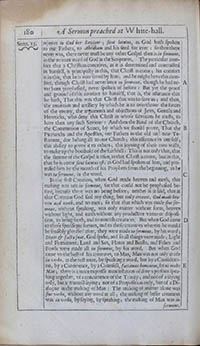 180
A Sermon preached at White-hall.
Serm.13.
180
A Sermon preached at White-hall.
Serm.13.
rejoyces in God her Saviour; sicut locutus, as God hath spoken
to our Fathers, to Abraham and his seed for ever: so then there
never was, there never must be any other Gospel then is in sermone,
in the written word of God in the Scriptures. The particular com-
fort that a Christian conceives, as it is determined and contracted
in himself, is principally in this, that Christ is come; his comfort
is in this, that he is now saved by him; and he might have this com-
fort, though Christ had never been in sermone, though he had ne-
ver been prophesied, never spoken of before: But yet the proof
and ground of this comfort to himself, that is, the assurance that
he hath, That this was that Christ that was to save us; and then,
the munition and artillery by which he is to overthrow the forces
of the enemy, the arguments and objections of Jews, GentilsGentiles and
Hereticks, who deny this Christ in whose salvation he trusts, to
have then any such Saviour: And then the Band of the Church,
the Communion of Saints, by which we should prove, That the
Patriarchs and the Apostles, our Fathers in the old and new Te-
stament, doe belong all to one Church; this assurance in our self;
this ability to prove it to others; this joyning of these two walls,
to make up the houshold of the faithfull: This is not only that, that
the summe of the Gospel is risen, in that Christ is come, but in this,
that he is come sicut locutus est, as God had spoken of him, and pro-
mised him by the mouth of his Prophets from the beginning, as he
was in sermone, in the word. In the first Creation, when God made heaven and earth, that
making was not in sermone, for that could not be prophesied be-
fore, because there was no being before; neither is it said, that at
that Creation God said any thing, but only creavit, God made hea-
ven and earth, and no men; so that that which was made sine ser-
mone, without speaking, was only matter without form, heaven
without light, and earth without any productive virtue or disposi-
tion, to bring forth, and to nourish creatures. But when God came
to those specifique formes, and to those creatures wherein he would
be sensibly glorified after, they were made in sermone, by his word;
Dixit & facta sunt, God spake, and so all things were made; Light
and Firmament, Land and Sea, Plants and Beasts, and Fishes and
Fowls were made all in sermone, by his word. But when God
came to the best of his creatures, to Man, Man was not only made
in verbo, as the rest were, by speaking a word, but by a Consultati-
on, by a Conference, by a Counsell, faciamus hominem, let us make
Man; there is a more expresse manifestation of divers persons spea-
king together, of a concurrence of the Trinity; and not of a saying
only, but a mutuall saying; not of a Proposition only, but of a Di-
alogue in the making of Man: The making of matter alone was
sine verbo, without any word at all; the making of lesser creatures
was in verbo, by saying, by speaking; the making of Man was in sermone,
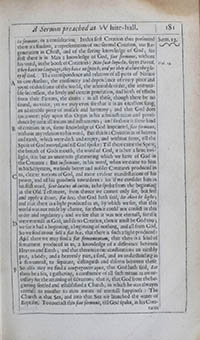 A Sermon preached at White-hall.
181
Serm.13.
A Sermon preached at White-hall.
181
Serm.13.
in sermonesermone, in a consultation. In this first Creation thus presented
there is a shadow, a representation of our second Creation, our Re-
generation in Christ, and of the saving knowledge of God; for
first there is in Man a knowledge of God, sine sermone, without
his word, in the book of Creatures: Non sunt loquelæ, sayes David,
Psal. 19. They have no language, they have no speech, and yet they declare the glo-
ry of God. The correspondence and relation of all parts of Nature
to one Author, the consinuityconcinnity and dependance of every piece and
joynt of this frame of the world, the admirable order, the immuta-
ble succession, the lively and certain generation, and birth of effects
from their Parents, the causes: in all these, though there be no
sound, no voice, yet we may even see that it is an excellent song,
an admirable piece of musick and harmony; and that God does
(as it were) play upon this Organ in his administration and provi-
dence by naturall means and instruments; and so there is some kind
of creation in us, some knowledge of God imprinted, sine sermone,
without any relation to his word. But this is a Creation as of heaven
and earth, which were dark and empty, and without form, till the
Spirit of God moved, and till God spoke: Till there came the Spirit,
the breath of Gods mouth, the word of God, it is but a faint twi-
light, it is but an uncertain glimmering which we have of God in
the Creature: But in sermone, in his word, when we come to him
in his Scriptures, we finde better and nobler Creatures produced in
us, clearer notions of God, and more evident manifestations of his
power, and of his goodness towards us: for if we consider him in
his first word, sicut locutus ab initio, as he spoke from the beginning
in the Old Testament, from thence we cannot only see, but feel
and apply a Dixit, fiat lux, that God hath said, let there be light;
and that there is a light produced in us, by which we see, that this
world was not made by chance, for then it could not consist in this
order and regularity; and we see that it was not eternall, for if it
were eternall as God, and so no Creature, then it must be God too;
we see it had a beginning, a beginning of nothing, and all from God.
So we find in our self a fiat lux, that there is such a light produced:
And there we may find a fiat firmamentum, that there is a kind of
firmament produced in us, a knowledge of a difference between
Heaven and Earth; and that there is in our constitutions an earthly
part, a body, and a heavenly part, a soul, and an understanding as
a firmament, to separate, distinguish and discern between these.
So also may we find a congregenter aquæ, that God hath said, Let
there be a sea, a gathering, a confluence of all such means as are ne-
cessary for the attaining of salvation; that is, that God from the be-
ginning settled and established a Church, in which he was alwayes
carefull to minister to man means of eternall happiness: The
Church is that Sea, and into that Sea we launched the water of
Baptism. To contract this sine sermone, till God spake, in his Crea-
A Sermon preached at VVhite-hallWhite-hall.
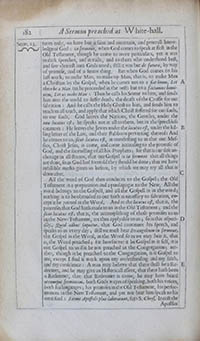 182
A Sermon preached at White-hall.
Serm.13.
tures only, we have but a faint and uncertain, and generall know-
182
A Sermon preached at White-hall.
Serm.13.
tures only, we have but a faint and uncertain, and generall know-ledge of God: in sermone, when God comes to speak at first in the
Old Testament, though he come to more particulars, yet it was
in dark speeches, and in vails, and to them who understood best,
and saw clearest into Gods word; still it was but de futuro, by way
of promise, and of a future thing. But when God comes to his
last work, to make Man, to make up Man, that is, to make Man
a Christian by the Gospel, when he comes not to a fiat homo, Let
there be a Man (as he proceeded in the rest) but to a faciamus homi-
nem, Let us make Man: Then he calls his Sonne to him, and sends
him into the world to suffer death, the death of the Crosse for our
salvation: And he calls the Holy Ghost to him, and sends him to
teach us all truth, and apply that which Christ suffered for our souls,
to our souls. God leaves the Nations, the Gentiles, under the
non locutus est; he speaks not at all to them, but in the speechless
creatures: He leaves the Jewes under the locutus est, under the kil-
ling letter of the Law, and their stubborn perverting thereof: And
he comes to us, sicut locutus est, in manifesting to us that our Mes-
sias, Christ Jesus, is come, and come according to the promise of
God, and the foretelling of all his Prophets; for that is our safe an-
chorage in all storms, that our Gospel is in sermone that all things
are done, so as God had foretold they should be done; that we have
infallible marks given us before, by which we may try all that is
done after. All the word of God then conduces to the Gospel; the Old
Testament is a preparation and a pœdagogie to the New. All the
word belongs to the Gospell, and all the Gospell is in the word;
nothing is to be obtruded to our faith as necessary to salvation, ex-
cept it be rooted in the Word. And as the locutus est, that is, the
promises that God hath made to us in the Old Testament; and the
sicut locutus est, that is, the accomplishing of those promises to us
in the New-Testament, are thus applyable to us; so is this especi-
ally, Quod adhuc loquitur, that God continues his speech, and
speaks to us every day; still we must hear Evangelium in sermone,
the Gospel in the Word, in the Word so as we may hear it, that
is, the Word preached; for howsoever it be Gospel in it self, it is
not Gospel to us if it be not preached in the Congregation; nei-
ther, though it be preached to the Congregation, is it Gospel to
me, except I find it work upon my understanding and my faith,
and my conscience: A man may believe that there shall be a Re-
deemer, and he may give an Historicall assent, that there hath been
a Redeemer, that that Redeemer is come, he may have heard
utrumque sermonem, both Gods wayes of speaking, both his voices,
both his languages; his promises in the Old Testament, his perfor-
mances in the New Testament, and yet not hear him speak to his
own soul: Ferme Apostoli plus laborarunt, says S. Chrys. It cost the
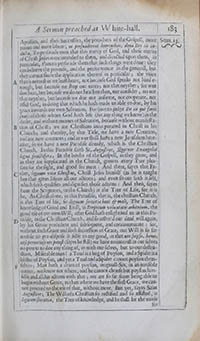 A Sermon preached at White-hall.
183
Serm.13.
A Sermon preached at White-hall.
183
Serm.13.
Apostles, and their Successors, the preachers of the Gospell, more
paines and more labour, ut persuaderent hominibus, dona Dei iis in-
dulta, To perswade men that this mercy of God, and these merits
of Christ Jesus were intended to them, and directed upon them, in
particular, then to perswade them that such things were done: they
can beleeve the promise, and the performance in the generall, but
they cannot finde the application thereof in particular; the voice
that is neerest us we least heare, not because God speaks not loud e-
nough, but because we stop our eares; nor that neyther; for wee
doe hear, but because we do not hearken then, nor consider; no nor
that neyther, but because we doe not answere, nor cooperate, nor
assist God, in doing that which he hath made us able to doe, by his
grace towards our own Salvation. For (not to judge De iis qui foris
sunt) of those whom God hath left (fotfor any thing we know) in the
darke, and without meanes of Salvation, because without manifesta-
tion of Christ; we are Christians incorporated in Christ in his
Church; and thereby, by that Title, we have a new Creation,
and are new creatures; and as wee shall have a new Jerusalem here-
after, so we have a new Paradise already, which is the Christian
Church. In this Paradise saith St. Augustine, Quatuor Evangelia
ligna fructifera; In the books of the Gospell, as they grow, and
as they are supplicated in the Church, growes every Tree plea-
sant for the sight, and good for meat: And there, sayes that Fa-
ther, lignum vitae Christus, Christ Jesus himself (as he is taught
hee that gives life to all our actions; and even so our faith it self,
which faith qualifies and dignifies those actions: And then, sayes
from the Scriptures, in the Church) is the Tree of Life, for it is
he, As Christ alone, in this Paradise, that is, the christian Church,
is this Tree of life, so lignum scientiæ boni & mali, The Tree of
knowledg of Good and Evill, is Proprium voluntatis arbitrium, the
good use of our own Will, after God hath enlightned us in this Pa-
radise, in the Christian Church, and so restor'd our dead will again,
by his Grace precedent and subsequent, and concommitant: for,
without such Grace and such succession of Grace, our Will is so far
unable to pre-dispose it selfe to any good, as that nec seipso, homo,
nisi perniciose uti potest (sayes he still) we have no interest in our selves
no power to doe any thing of, or with our selves, but to our destru-
ction. Miserable man! a Toad is a bag of Poyson, and a Spider is a
blister of Poyson, and yet a Toad and a Spider cannot poyson them-
selves; Man hath a dram of poyson, originall-Sin, in an invisible
corner, we know not where, and he cannot choose but poyson him-
selfe and all his actions with that; we are so far from being able to
begin without Grace, as then where we have the first Grace, we can-
not proceed to the use of that, without more. But yet, sayes Saint
Augustine; The Will of a Christian so rectified and so assisted, is
lignum scientiæ, the Tree of knowledge, and he shall be the worse
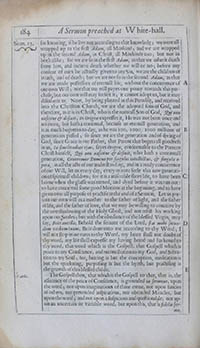 184
A Sermon preached at White-hall.
Serm.13.
184
A Sermon preached at White-hall.
Serm.13.
for knowing, if he live not according to that knowledg; we were all
wrapped up in the first Adam, all Mankind; and we are wrapped
up in the second Adam, in Christ, all Mankinde too; but not in
both alike; for we are so in the first Adam, as that we inherit death
from him, and incurre death whether we will or no; before any
consent of ours be actually given to any Sin, we are the children of
wrath, and of death; but we are not so in the second Adam, as that
we are made possessors of eternall life, without the concurrence of
our own Will; not that our will payes one penny towards this pur-
chase, but our own will may forfeit it; it cannot adopt us, but it may
disinherit us. Now, by being planted in this Paradise, and received
into the Christian Church, we are the adopted sons of God, and
therefore, as it is in Christ, who is the naturall Son of God, Qui non
nascitur & desinit, as Origen expresses it, He was not born once and
no more, but hath a continual, because an eternall generation, and
is as much begotten to day, as he was 100. 1000. 1000 millions of
generations passed; so since we are the generation and of-spring of
God, since Grace is our Father, that Parent that begets all goodness
in us, In similitudine ejus, sayes Origen, conformable to the Pattern
Christ himself, Qui non nascitur & desinit, who hath a continuall
generation, Generemur Domino per singulos intellectus, & singula o-
pera, in all the acts of our understanding, and in a ready concurrence
of our Will, let us every day, every minute feele this new generati-
on of spirituall children; for it is a miserable short life, to have been
borne when the glasse was turned, and dyed before it was run out:
to have conceived some good Motions at the beginning, and to have
given over all purpose of practise at the end of a Sermon. Let us pre-
sent our own will as a mother to the father of light, and the father
of life, and the father of love, that we may be willing to conceive by
the overshadowing of the Holy Ghost, and not resist his working
upon our Soules; but with the obedience of the blessed Virgin, may
say, Ecce ancilla, Behold the seruant of the Lord, fiat mihi secun-
dum verbum tuum, Be it done unto me according to thy Word; I
will not stop mine eares to thy Word, my heart shall not doubt of
thy word, my life shall expresse my having heard and harkened to
thy word, that word which is the Gospell, that Gospell which is
peace to my Conscience, and reconciliation to my God, and Salva-
tion to my Soul; for, hearing is but the conception, meditation is
but the quickning, purposing is but the byrth, but practising is
the growth of this blessed childe. Fidelis.The Gospell then, that which is the Gospell to thee, that is, the
assurance of the peace of Conscience, is grounded in sermone, upon
the word; not upon imaginations of thine owne, not upon fancies
of others, nor pretended inspirations, nor obtruded Miracles, but
upon the word; and not upon a suspicious and questionable, not up-
on an uncertain or variable word, but upon this, that is fidelis ser-
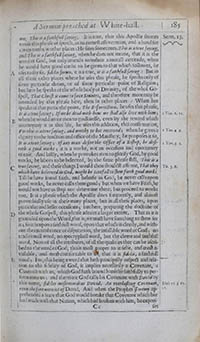 A Sermon preached at White-hall.
185
Serm.13.
mo, This is a faithfull saying. It is true, that this Apostle seemes
A Sermon preached at White-hall.
185
Serm.13.
mo, This is a faithfull saying. It is true, that this Apostle seemes
to use this phrase of speech, as an earnest asseveration, and a band for
divers truths in other places: He saies sometimes, This is a true saying,
and This is a faithfull saying, when he does not meane, that it is the
word of God, but only intends to induce a morall certitude, when
he would have good credit to be given to that which followes, he
uses to say so, fidelis sermo, it is a true, it is a faithfull saying: But in
all those other places where he uses this phrase, he speaks only of
some particular duties, or of some particular point of Religion;
but here he speaks of the whole body of Divinity, of the whol Go-
spell, That Christ is come to save Sinners, and therefore more may be
intended by this phrase here, then in other places: When hee
speaks of that particular point, The Resurrection, he uses this phrase,
It is a true saying; If we be dead with him we shall also live with him;2 Tim. 2.11.
when he would invite men to godlinesse, even by the reward which
accompany it in this life, he uses this addition, this confirmation,
For this is a true saying, and worthy to bee received;1 Tim. 4 9. when he gives a
dignity to the function and office of the Ministery, he proposes it so,
It is a true saying; If any man desire the Office of a Bishop,1 Tim. 3.5. he desi-
reth a good worke; it is a worke, not an occasion and oportunity
of ease. And lastly, when he provokes men to glorify God, by good
works, he labors to be beleeved, by the same phrase still, This is a
true saying, and these things I would thou shouldst affirme,Tit. 3.8. That they
which have beleeved in God, might be carefull to shew forth good works.
Till he have found faith, and beleefe in God, he never calls upon
good works, he never calls them good; but when we have Faith, he
would not have us stop nor determine there, but proceed to works
too. It is a phrase which the Apostle does frequently, and almost
proverbially use in these many places, but in all these places, upon
particular and lesser occasions; but here, preparing the doctrine of
the whole Gospell, this phrase admits a larger extent, That as it is
grounded upon the Word, that is, we must have somthing to shew for
it; so it is upon a faithfull word, upon that which is cleerly, and with-
out the encumbrance of disputation, the infallible word of God; no
traditionall word, no apocryphall word, but the cleere and faithfull
word. Now of all the attributes, of all the qualities that can be ascri-
bed to the word of God, this is most proper to it selfe, and most a-
vailable, and most comfortable to us, that it is fidelis, a faithfull
word; For, this being a word that hath principally respect and rela-
tion to the fidelity of God, it implies necessarily a Covenant, a
Contract with us, which God hath bound himselfe faithfully to per-
form unto us; and therefore God calls his Covenant with David by
this name, fideles miserecordias David, An everlasting Covenant,
Esai. 55.3 15.
11. even the sure mercies of David. And when the Prophet Jeremy ap-
prehended a feare that God would breake that Covenant which hee
had made with that Nation, which had broken with him, he expres-
Cc
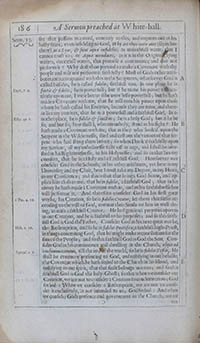 186
A Sermon preached at White-hall.
Serm.13.
ses that passion in a word, contrary to this, and imputes out of his
186
A Sermon preached at White-hall.
Serm.13.
ses that passion in a word, contrary to this, and imputes out of his
hasty feare, even infidelity to God, Why art thou unto mee (sayes hee
there) as a Lyar, & sicut aquæ infideles, as unfaithfull water, that I
cannot trust to; or Aquæ mendaces, as it is in the Originall, lying
waters, deceitfull waters, that promise a continuance and doe not
perform it? Why dost thou pretend to make a Covenant with thy
people and wilt not perform it faithfully? Most of Gods other attri-
butes are accompanied with this in the Scriptures, whatsoever God is
called besides, he is called fidelis, faithfull too. In one place he is
fortis & fidelis,Deut. 7. 9. he is powerfull; but if he turne his power vindica-
tively upon me, I were better if he were lesse powerfull; but he hath
made a Covenant with me, that he will turn his power upon those
whom he hath called his Enemies, because they are mine, and there-
in lies my comfort, that he is a powerfull and a faithfull God. In a-
nother place,Esay. 49. 7. he is fidelis & sanctus; he is a holy God; but if he be
so, and but so, how shall I, who am unholy, stand in his sight? He
hath made a Covenant with me, that as they who look'd upon the
Serpent in the Wildernesse, shed and cast out the venom of that ser-
pent who had stung them before; so when I look'd faithfully upon
my Saviour, all my unholinesse falls off as rags, and I shall be inve-
sted in his Righteousnesse, in his Holynesse; and so in that lies my
comfort, that he is a Holy and a Faithfull God. Howsoever wee
consider God in the Schools, in his other attributes, yet here is my
University and my Chair, here I must take my Degree, in my Heart,
in my Conscience; and this is that that brings God home, and ap-
plies him clossclose to me, that he is fidelis, a faithfull God; that in his
mercy he hath made a Covenant with us, and in his faithfulnesse hee
will performe it. And therefore consider God in his first great
worke,1 Pet. 4.19. his Creation, so he is fidelis Creator, let them that suffer ac-
cording to the will of God, commit their Souls to him in well do-
ing, as unto a faithfull Creator. He had gracious purposes upon
us in our Creation, and he is faithfull to his purposes; and so this faith-
full God is God the Father. Consider God in his next great worke,
the Redemption,Heb. 2.17. and so he is fidelis Pontifex, a faithfull high-Priest,
in things concerning God, that he might make reconciliation for the
sins of the People, and so this faithfull God is God the Son. Con-
sider God in his continuance and dwelling in the Church, usque ad
consummationem,Apocal. 1.5. till the end of the world, so he is fidelis Testis, He
shall be evermore presenting to God, and testifying in our behalfe,
the Covenant which he hath sealed to the Church in his blood, and
testifying to our spirit, that that seale belongs unto us; and so this
faithfull God is God the holy-Ghost; so that when we consider our
Creation, we are not to consider a Creation to condemnation; God
forbid: When we consider a Redemption, we are not to consi-
der it exclusively, as not intended to us; God forbid: And when
we consider Gods presence and government in the Church, we are
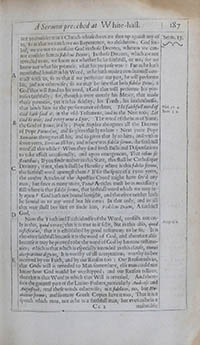 A Sermon preached at White-hall.
187
Serm.13.
A Sermon preached at White-hall.
187
Serm.13.
not to consider it in a Church whose dores are shut up against any of
us, so as that we can have no Repentance, no absolution; God for-
bid, we are not to consider God in those Decrees, wherein we can-
not consider him as fidelem Deum; In those Decrees, which are not
revealed to us, we know not whether he be faithfull, or no; for we
know not what his promise, what his purpose was: But as he hath
manifested himself in his Word, as he hath made a conditionall con-
tract with us, so as that if we performe our part, he will performe
his, and not otherwise; so we may be sure that he is fidelis Deus, a
God that will stand to his word, a God that will performe his pro-
mises faithfully; for, though it were meerly his Mercy, that made
those promises, yet it is his fidelity, his Truth, his faithfulnesse,
that binds him to the performance of them.Psal. 31.4.
Rom. 3.9. The faithfull word of
God hath said it; in the old-Testament, and in the New too; Let
God be true, and every man a Lyar. The word of the man of Sinne,
the God of Rome, is a ly; Pope Stephen abrogates all the Decrees
of Pope Formosus, and so gives that ly to him: Next yeere Pope
Romanus abrogates all his, and so gives that ly to him; and within
seven yeers, Servius all his; and where was fidelis sermo, the faithfull
word all this while? When they send forth Bulls and Dispensations
to take effect occasionally, and upon emergencies, That rebus sic
stantibus; If you finde matter in this State, this shall be Catholique
Divinity; if not, then it shall be Heresie; where is this fidelis sermo,
this faithfull word amongst them? If for the space of a 1500 yeers,
the twelve Articles of the Apostles Creed might have sav'd any
man, but since as many more, Trent Articles must be as necessary;
still where is that fidelis sermo, that faithfull word which we may re-
ly upon? God hath not bound himselfe, and therefore neither hath
he bound us to any word but his own; In that only, and in all
that wee shall bee sure to finde him, Fidelem Deum, A faithfull
God. Now the Truth and Faithfulnesse of the Word,Acceptatio. consists not on-
ly in this, quod verax, that it is true in it selfe, but in this also, quod
testificatus, that it is established by good testimony to be so. It is
therefore faithfull because it is the word of God, and therefore also
because it may be proved to be the word of God by humane testimo-
nies; which is that which is especially intended in this clause, Omni
acceptatione dignus, It is worthy of all acceptation; worthy to bee
received by our Faith, and by our Reason too: Our Reason tels us,
that Gods will is revealed to Man somewhere, else man could not
know how God would be worshipped; and our Reason tells us,
that this is that Word in which that Will is revealed. And there-
fore the greatest part of the Latine-Fathers, particularly Ambrose and
Augustine, read these words otherwise; not fideliter, no, but Hu-
manus sermo; and so many Greek Copies have it too, That it is a
speech which man, not as he is a faithfull man, but even as he is a
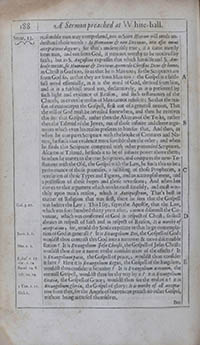 188
A Sermon preached at White-hall.
Serm.13.
188
A Sermon preached at White-hall.
Serm.13.
reasonable man may comprehend, not as Saint Hierom will needs un-
derstand those words: Si Humanus & non Divinus, non esset omni
acceptatione dignus; for that's undenyably true; if it came meerly
from man, and not from God, it were not worthy to be received by
faith; but as S. Augustine expresses that which himselfe and S. Am-
brose meant, sic Humanus & Divinus, quomodo Christus Deus & homo,
as Christ is God too, so as that he is Man too; so the Scriptures are
from God so, as that they are from Man too: the Gospel is a faith-
full word essentially, as it is the word of God, derived from him,
and it is a faithfull word too, declaratively, as it is presented by
such light and evidence of Reason, and such testimonies of the
Church, as even the reason of Man cannot refuse it: So that the rea-
son of man accepts the Gospell, first out of a generall notion, That
the will of God must be revealed somewhere, and then he receives
this for that Gospell, rather then the Alcoran of the Turks, rather
then the Talmud of the Jewes, out of those infinite and cleere argu-
ments which even his reason presents to him for that. And then, as
when he compares Scripture with the booke of Creatures and Na-
ture, he finds that evidence more forcible then the other; and when
he finds this Scripture compared with other pretended Scriptures,
Alcaron or Talmud, he finds it to be of infinite power above them;
so when he comes to the true Scriptures, and compares the new-Te-
stament with the Old, the Gospel with the Law, he finds this to be a
performance of those promises, a fullfiling of those Prophecies, a
revelation of those Types and Figures and an accomplishment, and
a possession of those hopes and those reversions; And when hee
comes to that argument which works most forcibly, and most wor-
thily upon man's reason, which is Antiquistrum, That's best in
matter of Religion that was first, there he sees the Gospell
was before the Law:Gal. 3.17. This I say, sayes the Apostle, that the Law,
which was four hundred thirty yeers after, cannot disannull the Co-
venant, which was confirmed of God in respect of Christ; so shall
alwaies in respect of faith and in respect of Reason, It is worthy of
acceptation; for, would thy Soule expatiate in that large contempla-
tion of God in generall? Rom. 1.1. It is Evangelium Dei, the Gospell of God:
wouldst thou contract this God into a narrower & more discernable
station? Mar. 1.1. It is Evangelium Jesu Christi, the Gospell of Jesus Christ:
wouldst thou draw it neerer to the consideration of the effects? It
is Evangelium pacis,Ephes. 6.15. the Gospell of peace,;; wouldst thou consider
it here? Here it is Evangelium Regni, the Gospell of the kingdom, Mar. 1.14.
wouldst thou consider it hereafter? It is Evangelium aternum, the Revel. 14.6.
eternall Gospell,Act. 20.24. wouldst thou see thy way by it? it is Evangelium
Gratiæ, the Gospell of Grace; wouldst thou see the end of it? it is
Evangelium gloriæ,1 Tim. 1.11. the Gospel of glory: It is worthy of all accepta-
tion from thee,Gal. 1. for the Angels of heaven can preach no other Gospel,
without being accursed themselves.
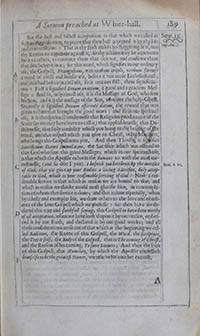 A Sermon preached at White-hall.
189
Serm.13.
But the best and fullest acceptation is that which we called at
A Sermon preached at White-hall.
189
Serm.13.
But the best and fullest acceptation is that which we called at
first an Approbation, to prove that thou hast accepted it by thy life
and conversation: That as thy faith makes no staggering at it,Approbatio. nor
thy Reason no argument against it, so thy actions may be arguments
for it to others, to convince them that doe not, and confirme them
that doe beleeve in it; for this word, which signifies in our ordinary
use; the Gospell, Evangelium, was verbum civile, verbum forense
a word of civill and secular use, before it was made Ecclesiasticall;
and as it had before in civil use, so it retaines still, three significati-
ons: First it signified Bonum nuntium, a good and a gracious Mes-
sage: And so, in spirituall use, it is the Message of God, who sent
his Son; and it is the message of the Son, who sent the holy-Ghost.
Secondly it signified Donum offerenti datum, the reward that was
given to him that brought the good news: and so in our spirituall
use, it is that spirituall tendernesse that Religious good nature of the
Soule (as we may have leave to call it) that appliablenesse, that Du-
ctilenesse, that holy credulity which you bring to the hearing of the
word, and that respect which you give to Christ, in his Ministers,
who brings this Gospel unto you. And then Thirdly, it signifies
Sacrificium Datori Immolatam, the Sacrifice which was offered to
that God who sent this good Message; which in our spirituall use,
is that which the Apostle exhorts the Romans to with the most ear-
nestnesse,Rom. 1.12. (and so doe I you) I beseech you brethern by the mercies
of God, that yee give up your Bodies a living Sacrifice, holy accep-
table to God, which is your reasonable serving of God: Now a rea-
sonable service is that which in reason we are bound to doe, and
which in reason we thinke would most glorifie him, in contempla-
tion of whom that service is done; and that is done especially, when
by a holy and exemplar life, we draw others to the love and obedi-
ence of the same Gospell which we professe: for then have we de-
clared this true and faithfull saying, this Gospell to have been worthy
of all acceptation, when we have look'd upon it by our reason, embra-
ced it by our Faith, and declared it by our good works; and all
these considerations arose out of that which at the beginning we cal-
led Radicem, the Roote of this Gospell, the Word, the Scripture,
the Tree it self, the Body of the Gospell, that is The coming of Christ,
and the Reason of his coming, To save Sinners; And then the fruit
of this Gospell, that Humility, by which the Apostle confesseth
himselfe to be the greatest Sinner, we reserve for another exercise.
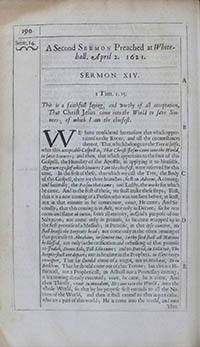 190
Serm.15.
A Second Sermon Preached at White-
190
Serm.15.
A Second Sermon Preached at White-hall. April 2. 1621.
SERMON XIV. 1 Tim. 1.15.
This is a faithfull saying, and worthy of all acceptation,
That Christ Jesus came into the World to save Sin-
ners; of which I am the chiefest. WEWe have considered heretofore that which apper-
tained to the Roote, and all the circumstances
thereof. That which belongs to the Tree it selfe,
what this acceptable CospellGospell is, That Christ Jesus came into the World,
to save Sinners; and then, that which appertains to the fruit of this
Gospell, the Humility of the Apostle, in applying it to himselfe,
Quorum ego, Of which Sinners I am the chiefest, were reserved for this
time. In the first of these, that which we call the Tree, the Body
of this Gospell, there are three branches; first an Advent, A coming;
and secondly, the Person that came; and Lastly, the worke for which
he came. And in the first of these, we shall make these steps; First,
that it is a new coming of a Person who was not here before, at least,
not in that manner as he comes now, venit, He came; And Se-
condly, that this coming is in Act, not only in Decree; so he was
come and slaine ab initio, from all eternity, in God's purpose of our
Salvation; nor come only in promise, so he came wrapped up in
the first promise of a Messiah; in Paradise, in that ipse conteret, He
shall bruise the Serpents head; nor come only in the often renuing of
that promise to Abraham, in semine tuo, In thy seed shall all Nations
be blessed, nor only in the ratification and refreshing of that promise
to Judah, Donec Silo, Till Silo come; and to David, in Solio tuo, The
Scepter shall not depart; nor as he came in the Prophets, in Isays virgo
concipiet, That he should come of a virgin, nor in Michæas, Et tu
Bethlem, That he should come out of that Towne; but this is a Hi-
storicall, not a Propheticall, an Actuall not a Promissary coming;
it is a coming already executed; venit, he came, he is come. And
then Thirdly, venit in mundum, He came into the World, into the
whole World, so that by his purpose first extends to all the Na-
tions of the World, and then it shall extend to thee in particular,
who art a part of this world; He is come into the world, and into
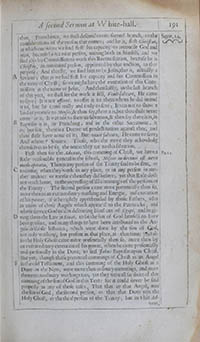 A second Sermon at White-hall.
191
Serm.14.
A second Sermon at White-hall.
191
Serm.14.
thee. From hence, we shall descend to our second branch, to the
considerations of the person that comes; and he is, first Christus,
in which one name we find first his capacity to reconcile God and
man, because he is a mixt person, uniting both in himself; and we
find also his Commission to work this Reconciliation, because he is
Christus, an annointed person, appointed by that unction, to that
purpose; And thirdly, we find him to be Jesus, that is, actually a
Saviour; that as we had first his capacity and his Commission in
the name of Christ, so we might have the execution of this Com-
mission in the name of Jesus. And then lastly, in the last branch
of this part, we shall see the work it self, Venit salvare, He came
to save; It is not offerre, to offer it to them whom he did intend
it to, but he came really and truly to save; It was not to show a
land of promise to Moyses, & then say, there it is, but thou shalt never
come at it; It was not to shew us salvation, & then say there it is, in
Baptism it is, in Preaching, and in the other Sacrament, it
is; but soft, there is a Decree of predestination against thee, and
thou shalt have none of it; But venit salvare, He came to save;
And whom? Sinners. Those, who the more they ackowledgacknowledge
themselves to be so, the nearer they are to this salvation. First then for the Advent, this comming of Christ,Part 1. we have a
Rule reasonable general in the school, Missio in divinis est novo
modo operatio, Then is any person of the Trinity said to be sent, or
to come, when they work in any place, or in any person in ano-
ther manner or measure then they did before; yet that Rule doth
not reach home, to the expressing of all commings of the persons of
the Trinity: The second person came more pretentially then so,
more then in an extraordinary working and Energie, and execution
of his power, if it be rightly apprehended by those Fathers, who
in many of those Angels which appear'd to the Patriarcks, and
whose service God us'd in delivering Israel out of Egypt, and in gi-
ving them the Law in Sinai, to be the son of God himself to have
been present, and many things to have been attributed to the An-
gels in those histories, which were done by the son of God,
not only working, but present in that place, at that time. So al-
so the Holy Ghost came more presentially then so, more then by
an extraordinary extention of his power, when he came presentially
and personally in the Dove, to seal Johns Baptism upon Christ.
But yet, though those pretential commings of Christ as an Angel
in the old Testament, and this comming of the Holy Ghost in a
Dove in the New, were more then ordinary commings, and more
then extraordinary workings too, yet they were all far short of this
comming of the son of God in this Text: for it could never be said
properly in any of those cases, That that or that Angel, was
the son of God, the second person, or that that Dove was the
Holy Ghost, or the third person of the Trinity; but in this Ad-
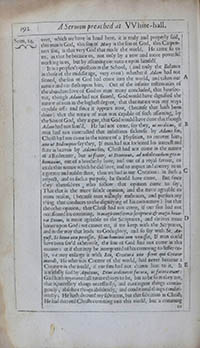 192
A Sermon preached at VVhite-hallWhite-Hall.
Serm.14.
vent, which we have in hand here, it is truly and properly said,
192
A Sermon preached at VVhite-hallWhite-Hall.
Serm.14.
vent, which we have in hand here, it is truly and properly said,
this man is God, this son of Mary is the son of God, this Carpen-
ters son, is that very God that made the world. He came so to
us, as that he became us, not only by a new and more powerful
working in us, but by assuming our nature upon himself. It is a perplex't question in the School, (and truly the Balance
in those of the middle age, very even) whether if Adam had not
sinned, the son of God had come into the world, and taken our
nature and our flesh upon him. Out of the infinite testimonies of
the abundant love of God to man many concluded, that howsoe-
ver, though Adam had not sinned, God would have dignified the
nature of man in the highest degree, that that nature was any ways
capable off: and since it appears now, (because that hath been
done) that the nature of man was capable of such assuming, by
the Son of God, they argue, that God would have done this though
Adam had not sinn'd. He had not come, say they, ut medicus, if
man had not contracted that infectious sickness by Adams sin;
Christ had not come in the nature of a Physitian, to recover him;
non ut Redemptor say they, If man had not forfeited his interest and
state in heaven by Adams sin; Christ had not come in the nature
of a Redeemer, but ut frater, ut Dominus, ad nobilitandum genus
humanus, out of a brotherly love, and out of a royal favour, to
exalt that nature which he did love, and to impart and convey to us
a greater and nobler state, then we had in our Creation: in such a
respect, and to such a purpose, he should have come. But since
they themselves who follow that opinion come to say,
That that is the more subtle opinion, and the more agreable to
mans reason, (because man willnglywillingly embraces, and pursues any
thing that conduces to the dignifying of his own nature) but that
the other opinion, that Christ had not come, if our sins had not
occasioned his comming, is magis conformis scripturis & magis hono-
rat Deum, is more agreable to the Scriptures, and derives more
honor upon God: we cannot err, if we keep with the Scriptures,
and in the way that leads to Gods glory, and so say with St. Au-
gust. Si homo non periisset, filius hominis non venisset, If man could
have been sav'd otherwise, the son of God had not come in this
manner: otor if that may be interpreted of his comming to suffer on-
ly, we may enlarge it with Leo, Creatura non fieret qui Creator
mundi, He who was Creator of the world, had never become a
Creature in the world, if our sins had not drawn him to it. It
is usefully said by Aquinus, Deus ordinavit futura, ut futura erant:
God hath appointed all future things to be, but to be so as they are,
that is, necessary things necessarily, and contingent things contin-
gently; absolute things absolutely, and conditional things conditi-
onally; He hath decreed my salvation, but that salvation in Christ;
He had decreed Christs comming into this world, but a comming
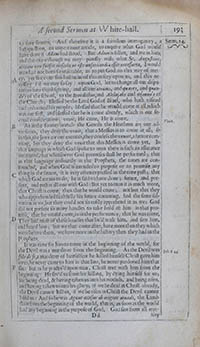 A second Sermon at White-hall.
193
Serm.14.
A second Sermon at White-hall.
193
Serm.14.
to save sinners. And therefore it is a frivolous interogatory, a
lost question, an impertinent article, to enquire what God would
have done if Adam had stood. But Adam is fallen, and we in him;
and therefore though we may piously wish what St. Augustine,
utinam non fuisset miseria ne iste misericordia esset necessaria, I would
man had not been so miserable, as to put God to this way of mer-
cy; yet since our sins had induced this misery upon us, and this ne-
cessity (if we may so say) upon God, let us change all our dispu-
tation into thanksgiving, and all our utrums, and quæres, and quan-
do's of the school, to the Benedictus, and Alelujahs and Osanna's of
the Church; Blessed be the Lord God of Israel, who hath visited
and redeemed his people; blessed that he would come at all, which
was our first, and blessed that he is come already, which is our se-
cond consideration; venit, He came, He is come.Venit. As in the former branch the Gentils the Heathens are our ad-
versaries, they deny the venit, that a Messias is to come at all; so
in this, the Jews are our enemies, they confess the veniet, a future com-
ming, but they deny the venit that this Messias is come yet. In
that language in which God spoke to man there is such an assurance
intimated, that whatsoever God promises shall be performed; that
in that language ordinarily in the Prophets, the times are con-
founded, and when God is intended to purpose or to promise any
thing in the future, it is very often expressed in the time past; that
which God means to do, he is said to have done; future, and pre-
sent, and past is all one with God: But yet to man it is much more,
that Christ is come, then that he would come; not but that they
who apprehended faithfully his future comming, had the same sal-
vation as we, but they could not so easily apprehend it as we: God
did not present so many handles to take hold of him in that pro-
mise, that he would come, as in the performance, that he was come.
They had most of these handles that liv'd with him, and saw him,
and heard him; but we that come after, have more then they which
were before them, we have more in the history then they had in the
Prophets. It was time for him to come in the beginning of the world, for
the Devil was a murderer from the beginning.Joh. 8 44. As the Devil was
felo de se, a murderer of himself; as he killed himself Christ gave him
over; he never came to him in that line, he never pardoned him that
sin: but as he practis'd upon man, Christ met with him from the
beginning: He sav'd us from his killing, by dying himself for us;
for being dead, & having taken us into his wounds, and being risen,
and having taken us into his glory; if we be dead in Christ already,
the Devil cannot kill us, if we be risen in Christ the Devil cannot
hold us: And so he was Agnus occisus ab origine mundi, the Lamb
slain from the beginning of the world, that is, as soon as the world
had any beginning in the purpose of God. God saw from all eter-
Dd
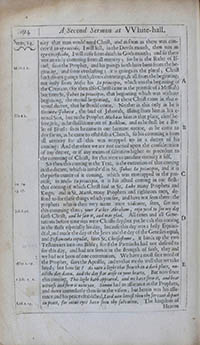 194
A Secondsecond Sermon at VVhite-hallWhite-Hall.
Serm.14.
nity that man would need Christ, and as soon as there was con-
194
A Secondsecond Sermon at VVhite-hallWhite-Hall.
Serm.14.
nity that man would need Christ, and as soon as there was con-ceiv'd an ego occido, I will kill, in the Devils mouth, then was an
ego vivificabo, I will raise from death in Gods mouth; and so there
was an early comming from all eternity; for he is the Ruler of Is-
rael, saies the Prophet, Mich. 5.2. and his goings forth have been from the be-
ginning, and from everlasting: it is goings in the plural; Christ
hath divers goings forth, divers commings, & all from the beginning;
not only from Moses his In principio, which was the beginning of
the Creation, (for then also Christ came in the promise of a Messiah)
but from St. Johns In principio, that beginning which was without
beginning, the eternal beginning, for there Christ came in that e-
ternal decree, that he should come. Neither is this only as he is
Germen Jehovæ, the bud of Jehovah, issuing from him as his e-
ternal Son,Esa. 4 2. but as the Prophet Michæas saies in that place, cited be-
fore, it is, as he shall come out of Bethlem, and as he shall be a Ru-
ler of Israel: so as he came in our humane nature, as he came to
dye for us, as he came to establish a Church, so his comming is from
all eternity for all this was wrapped up in a decree of his
coming: And therefore we are not carried upon the consideration
of any decree, or if any means of salvation higher or precedent to
the comming of Christ, for that were to antidate eternity it self. So then this coming in the Text, is the execution of that coming
in the decree, which is involv'd in St. Johns In principio, and it is
the performance of it coming, which was enwrapped in the pro-
mise, in Moses In principio,10.24. it is his actual coming in our flesh:
that coming of which Christ said in St. Luke many Prophets and
Kings;13.17. and in St. Matth. many Prophets and righteous men, de-
sired to see these things which you see, and have not seen them: the
prophets who in their very name were videntes, seen, saw not
this comining thus;Joh. 8.56. your Father Abraham, rejoyced to see my day
saith Christ, and he saw it, and was glad. All times and all Gene-
rations before time was were Christs day; but yet he cals this coming
in the flesh especially his day, because this day was a holy Equino-
ctial, and made the day of the Jews and the day of the Gentiles equal;
and Testamenta copulat, saies St. Chrisostome, it binds up the two
Testaments into one Bible; for if the Partriarks had not desired to
see this day, and had not seen it in the strength of faith, they and
we had not been of one communion. We have a most sure word of
the Prophet,2 Pet. 1.19. saies the Apostle, and to that we do well that we take
heed; but how far? As unto a light that shineth in a dark place, un-
til the day dawn, and the day star arise in your hearts. But now since
this coming,1 Joh. 1.2. This light hath appeared, and we have seen it, and bear
witness and shew it unto you. Simon had an assurance in the Prophets,
and more immediatly then so in the vision; but herein was his assu-
rance and his peace established, Lord now lettest thou thy servant depart
in peace,Luk. 2.19. for mine eyes have seen thy salvation. The kingdom of
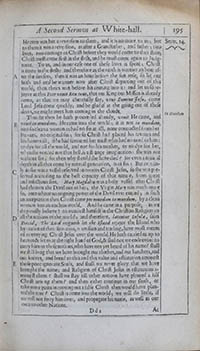 A Secondsecond Sermon at White-hall.
195
Serm.14.
A Secondsecond Sermon at White-hall.
195
Serm.14.
Heaven was but a reversion to them, and it is no more to us; but
to them it was a reversion, as after a Grandfather, and father; two
lives, two comings of Christ before they would come to their state;
Christ must come first in the flesh, and he must come again to Judg-
ment. To us, and in our case one of these lives is spent; Christ
is come in the flesh: and therefore as the earth is warmer an hour af-
ter the sun sets, then it was an hour before the sun rose, so let our
faith and zeal be warmer now after Christ departing out of this
world, then theirs was before his coming into it: and let us so re-
joyce at this Ecce venit Rex tuus, that our King our Missias is already
come, as that we may cherefully say, veni Domine Jesu, come
Lord Jesu come quickly, and be glad if at the going out of these
dores, we might meet him coming in the clouds. Thus far then he hath proceeded already, venit He came, and In Mundum
venit in mundum, He came into the world; it is not in mundam,
into so clean a woman as had no sin at all, none contracted from her
Parents, no original sin; for so Christ had placed his favours and
his honors ill, if he had favoured her most who had no need of him:
to dye for all the world, and not for his mother, or to dye for her,
when she needed not that hell, is a strange imagination: she was not
without sin; for then why should she have died? for even a natural
death in all that come by natural generation, is of sin: But certain-
ly as she was a vessel reserved to receive Christ Jesus, so she was pre-
served according to the best capacity of that nature, from great
and infectious sins. Mary Magdalen was a holy vessel after Christ
had thrown the Divel out of her; the Virgin Mary was much more
so, into whom no reigning power of the Devil ever entred; in such
an acceptation then Christ came per mundam in mundum, by a clean
woman into an unclean world. And he came in a purpose, as we
do piously believe) to manifest himself in the Christian Religion to
all the nations of the world; and therefore, lætentur Insulæ, saies
David, The Lord reigneth let the Island rejoyce the Island who
by reason of their situation, provision and trading, have most means
of conveying Christ Jesus over the world. He hath carried us up to
heaven & set us at the right hand of God, & shal not we endeavour to
carry him to those nations, who have not yet heard of his name? shall
we still brag that we have brought our clothes, and our hatchets, and
our knives, and bread to this and this value and estimation amongst
those poor ignorant Souls, and shall we never glory that we have
brought the name, and Religion of Christ Jesus in estimation a-
mongst them? shall we stay till other nations have planted a fals
Christ among them? and then either continue in our sloth, or
take more pains in rooting out a false Christ then would have plan-
ted the true? Christ is come into the world; we will do little, if
we will not ferry him over, and propagate his name, as well as our
own to other Nations.
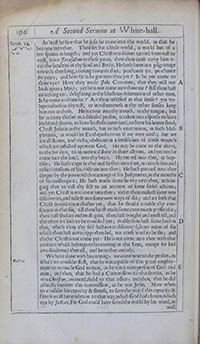 196
A Secondsecond Sermon at VVhite-hallWhite-Hall.
Serm.14.
196
A Secondsecond Sermon at VVhite-hallWhite-Hall.
Serm.14.
At least be sure that he is so far come into the world, as that he
become into thee. Thou art but a little world, a world but of a
few spanns in length;In te. and yet Christ was sooner carried from east to
west, from Jerusalem to these parts, then thou canst carry him o-
ver the faculties of thy Soul and Body; He hath been in a pilgrimage
towards thee long, coming towards thee, perchance 50, perchance
60 years; and how far is he got into thee yet? Is he yet come to
thine eye? Have they made Jobs Covenant, that they will not
look upon a Maid; yet he is not come into thine ear? still thou hast
an itching ear, delighting in the libellous defamation of other men.
Is he come to thine ear? Art thou rectified in that sense? yet vo-
luptousness in thy tast, or inordinateness in thy other senses keep
him out in those. He is come into thy mouth, to thy tongue; but
he is come thither as a diseased person, is taken into a spittle to have
his blood drawn, to have his flesh cauterized, to have his bones sawd;
Christ Jesus is in thy mouth, but in such execrations, in such blas-
phemies, as would he Earthquaks to us if we were earth; but we
are all stones, and rocks, obdurate in a senselesnes of those wounds
which are inflicted upon our God. He may be come to the skirts,
to the borders, to an outward show in thine actions, and yet not be
come into the land, into thy heart. He entred into thee, at bap-
tism; He hath crept farther and farther into thee, in catechisms and
other infusions of his doctrine into thee; He hath pierced into thee
deeper by the powerful threatnings of his Judgments, in the mouths
of his messengers; He hath made some survey over thee, in brin-
ging thee to call thy self to an account of some sinful actions;
and yet Christ is not come into thee; either thou makest some new
discoveries, and fallest into some new ways of sin; and art loth that
Christ should come thither yet, that he should trouble thy con-
science in that sin, till thou hadst made some convenient profit of it;
thou hast studied and must gain, thou hast bought and must sell, and
therefore art loth to be troubled yet; or else thou hast some land in
thee, which thou thy self hast never discover'd, some waies of sin
which thou hast never apprehended, nor considered to be sin; and
thither Christ is not come yet: He is not come into thee with that
comfort which belongs to his coming in this Text, except he had
overshadowed thee all, and be in thee intirely. Person.We have done with his coming; we come next to the person; in
which we consider first, that he was capable of this great employ-
ment to reconcile God to man, as he was a mixt person of God and
man; and then, that he had a Commission for this service, as he
was Christus, anointed, seald to that office; and then, that he did
actually execute this commission, as he was Jesus. Now when
we consider his capacity & fitness, to save the wotldworld this capacity &
fitness must have relation to that way, which God had chosen; which
was by Justice. For God could have saved the world by his word, as
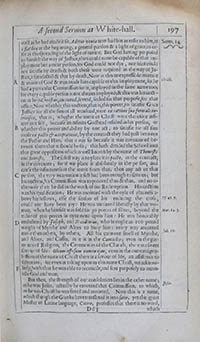 A second Sermon at White-hall.
197
Serm.14.
A second Sermon at White-hall.
197
Serm.14.
well as he had made it so. Adetur venia now had bin as easie to him, as
a fiat lux at the beginning; a general pardon & a light of grace, as ea-
sie as the spreading of the light of nature. But God having purposed
to himself the way of Justice, then could none be capable of that im-
ployment but a mixt person; for God could not dye, nor man could
not satisfie by death; & both these were required in the way of Ju-
stice, a satisfactiō & that by death. Now as this unexpressible mixture
& union of God & man made him capable of this imployment,Christi. so he
had a particular Commission for it, imployed in the same name too;
for every capable person is not alwaies imployed; & this was his uncti -
on as he is Christus, anointed, severd, sealed for that purpose, for that
office. Now whether this unction, that is, this power, to satisfie Gods
Justice for all the sins of all mankind, were ex ratione sua formali in-
trinsica, that is, whether the merit of Christ were therefore infi-
nite in it self, because an infinite Godhead resided in his person, or
whether this power and ability by one act, to satisfie for all sins
arose ex pacto & acceptatione, by the contract they had past between
the Father and Him, that it was so because it was covenanted be-
tween them that it should be so; this hath divided the School into
that great opposition which is well known by the name of Thomists
and Scotists. The safest way is to place it in pacto, in the contract,
in the covenant; for if we place it absolutely in the person, and
cause the infiniteness of the merit from that, then any act of that
person, the very incarnation it self had been enough to save us; but
his unction, his Commission was to proceed thus & thus, and no o-
therwise then be did in the work of our Redemption. His unction
was his qualification; He was anointed with the oyle of gladness a-
bove his fellows, else the season of his enduring the cross,Ps. 45.7.Ps. 45.7.
could nor have been joy: He was anointed liberally by that wo-
man, when he himself was sold for 30 peeces of silver,Mar. 14.3.Mar. 14. 3. beyond the
value of 300 peeces in oyntment upon him: He was honorably
embalmed by Joseph, and Nicodemus, who brought an 100 pound
weight of Myrrhe and Aloes to bury him: every way anointed
more then others, by others. All his garment smell of Myrrhe,Job. 19.Job. 19.
and Aloes, and Cassia, as it is in the Canticles; even in the gar-
ments of Religion, the Ceremonies of the Church, there is a sweet
savour of life: Oleum effusum nomen ejus, even in the outward pro-
fession of the name of Christ there is a savour of life, an assistance to
salvation; for even in taking upon us this name Christ, we acknow-
ledg, both that he was able to reconcile, and sent purposely to recon-
cile God and man. But then, the strength of our consolation lies in the other name;Jesus.
as he was Jesus, actually he executed that Commission, to which,
as he was Christ he was fitted and anointed. Now this is a name,
which though the Greeks have translated it into soter, yet the great
Master of Latine language, Cicero, professes that there is no word,
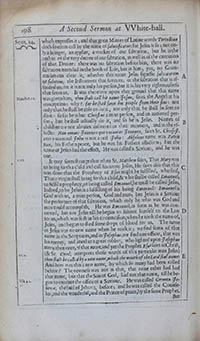 198
A Secondsecond Sermon at VVhite-hallWhite-Hall.
Serm.14.
198
A Secondsecond Sermon at VVhite-hallWhite-Hall.
Serm.14.
which expresses it; and that great Minter of Latine words Tertullian
doth so often call by the name of salutificator: for Jesus is so; not on-
ly a bringer, an applier, a worker of our salvation, but he is the
author of the very decree of our salvation, as well as of the execution
of that Decree: there was no salvation before him, there was no
salvation intended in the book of Life, but in him; yea, no Gram-
marian can clear it, whether this name Jesus signifie salvatorem
or salutem, the Instrument that saves us, or the salvation that is af-
forded us; for it is not only his person, but it is his very righteousness
that saves us. It was therefore upon that ground that this name
was given him,Matth. 1.21. thou shalt call his name Jesus, saies the Angel at his
conception: why? for he shall save his people from their sins: not
only that he shall be able to do it, nor only that he shall be sent to
do it: so far he is but Christus a mixt person, and an anointed per-
son; but he shall actually do it, and so he is Jesus. Names of
children are not alwaies answered in their manners, and in the ef-
fects: Non omnes Joannes qui vocantur Joannes, saies St. Chrisost.
every nominal John is not a real John: Absolons name was Patris
pax, his Fathers peace, but he was his Fathers affliction; but the
name of Jesus had the effect, He was called a Saviour, and he was
one. 1.21.It may seem strange that when St. Matthew saies, That Mary was
to bring forth a child and call his name Jesus, He saies also that this
was done that the Prophecy of Esai might be fulfilled, who said,
That a virgin shall bring forth a child, & who shalbe called Emanuel;
to fulfil a prophecy, of being called Emanuel, he must be called Jesus.
Indeed, to be Jesus is a fulfilling of his being Emanuel: Emanuel is
God with us, a mixt person, God and man; but Jesus is a Saviour
the performer of that salvation, which only he who was God and
man could accomplish. He was Emanuel, as soon as he was con-
ceived, but not Jesus till he began to submit himself to the Law
for us; which was first in his circumcision, when he took the name of,
Jesus, and began to shed some drops of blood for us. The name
of Jesus was no new name when he took it; we find some of that
name in the Scriptures, and in Josephus, we find one officer, that was
his enemy, and another a great robber, who lighted upon Josephus
more then once, of that name. and yet the Prophet Esai saies of Christ,
(& St. Cyril.62.2. interprets those words of this particular man Jesus)
thou shalt be called by a new name, which the mouth of the Lord shal name:
And how was this a new name, by which so many had been called
before? The newness was not in that, that none other had had
that name, but that the Son of God, had not that name, till he be-
gan to execute the office of a Saviour.Esa. 4.2. He was called Germen Je-
hovæ, the bud of Jehova, before;9. and he was called the Counse-
lor, and the wonderful, and the Prince of peace, by the same Prophet.
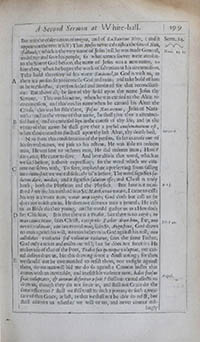 A Secondsecond Sermon at VVhite-hallWhite-Hall.
199
Serm.14.
A Secondsecond Sermon at VVhite-hallWhite-Hall.
199
Serm.14.
But it is the observation of Origen, and of Lactantius after, (and it
appears in the text it self) That Moses never cals Oshea the son of Nun,
Joshuah, (which is the very name of Jesus) till he was made General,Num. 13.17.
to deliver and save his people, so what names soever were attribu-attributed
to the Son of God before; the name of Jesus was a new name, to
him then, when he began the work of salvation in his circumcision.
Take hold therefore of his name Emanuel, as God is with us, as
there is a person fit to reconcile God and man; and take hold of him
as he is Christus, a person sealed and anointed for that reconciliati-
on: But above all, be sure of thy hold upon the name Jesus thy
Saviour. This was his name, when he was carried to the Altar to
circumcision, and this was his name when he carried his Altar the
Cross; this was his stile there, Jesus Nazarenus, Jesus of Naza-
reth: and in the virtue of that name, he shall give thee a circumci-
sed heart, and circumcised lips in the course of thy life; and in the
virtue of that name he shall give thee a joyful consummatum est,
when thou comest to finish all upon thy last Altar, thy death-bed. Now from this consideration of the person, so far as arose out of Servare.
his several names, we pass to his action, He was able to redeem
man, He was sent to redeem man, He did redeem man; How?
Servavit, He came to save. And here also is that word, which as
we said before, is above expressing; for the word which we con-
tent our selves with, To save, implies but a preserving from falling
into ruine; but we were absolutely fal'n before. The word signifies sa-
lutem dare, medici, and it signifies salutem esse; and Christ is truly
both, both the Physitian and the Physick.9. 13. But how is it mini-
stred? we see his method is in St. Matth. veni vocare, I came to call:
his way is a voice now, vocat non cogit; God doth but call us he
does not constrain us, He does not drive us into a pound; He cals
us as Birds do their young, and he would gather us as a Hen doth
her Chickins. It is true there is a Trahit, but there is no cogit; no
man comes to me, saies Christ, except the Father draw him, But,Joh 6 44.Joh. 6. 44. non
inviti trahimur, non inviti credimus, saies St. Augustine, God draws
no man against his will, no man believes in God against his will, non
adhibitus violentia sed voluntas exitatur, saies the same Father,
God only excites and exalts our will, but he does not force it: He
makes use of that of the Poet, Trahit sua quemque voluptas, our car-
nal desires draw us, but this drawing is not a constraining; for then
we should not be commanded to resist them, nor to fight against
them, for no man will bid me do so against a Cannon bullet that
comes with an inevitable, and irresistible violence now,August. habet sensus
suas voluptates, & animus deseritur a suis? shall our carnal affections
draw us, though they do not force us, and shall not Grace do the
same office too? shall we still trust to such a power, or such a mea-
sure of that Grace, at last, as that we shall not be able to resist, but
shall convert us whether we will or no, and never concur wil-
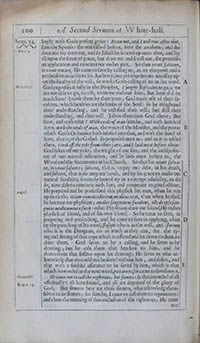 200
A Secondsecond Sermon at White-hall.
Serm.14.
lingly with Gods present grace? Draw me, and I will run after thee,
200
A Secondsecond Sermon at White-hall.
Serm.14.
lingly with Gods present grace? Draw me, and I will run after thee,
saies the Spouse:Cant. 1 4.Cant. 1. 4. she was called before, now she awakens; and she
does not say draw me, and so I shall be screwd up unto thee, and lay
all upon the force of grace, but draw me and I will run; she promises
an application and concurrence on her part. So then venit salvare,
is venit vocare, He came to save by calling us, as an eloquent and a
perswasive man draws his Auditory, but yet imprints no necessity up-
on the faculty of the will; so works Gods calling of us in his word.
God expresses it fully in the Prophet,Hose. 11.3. I sought Ephraim to go,; we
are not able to go, to rise, to move without him; But how did he
teach him? I took them by their arms; God made use of their fa-
culties, which faculties are the limbs of the Soul: so he enlightned
their understanding, and he rectified their will; but still their
underding, and their will. I drew them saies God there; But
how, and with what? With cords of man saies he, and with bands of
love; with the cords of man, the voice of the Minister, and the power
which Gods Ordinance hath infused into that, and with the band of
love, that is, of the Gospel so proposed unto us: and as it is added
there, I took off the yoke from their jaws, and I laid meat before them:
God takes off our yoke, the weight of our sins, and the indispositi-
on of our natural infirmities, and he laies meat before us, the
Word and the Sacraments in his Church. So that his venit salva-
re, is venit solvere; solvere, that is, to pay our debt, in his death,
and solvere, that is, to unty our bands, and by his grace to make our
natural faculties, formerly bound up in a corrupt inhability, to do
so, now able to concurre with him, and cooperate to good actions.
He prepared and he prescribed this physick for man,August. when he was
upon earth; etiam cum occideretur medicus erat, then when he died,
he became our physitian; medici sanguinem fundunt, ille de ipso san-
guine medicamenta facit: other Physitians draw our blood, He makes
physick of blood, and of his own blood. So he came to save, in
preparing and prescribing, and he came to save in applying, when
by the preaching of his word, Joseph who is in the well, and Jeremy
who is in the Dungeon, do as much as they can, for the ty-
ing and fitting of that rope which is offered and let down to them, to
draw them. God saves us by a calling, and he saves us by
drawing; but he cals them that hearken to him, and he
draws them that follow upon his drawing; He saves us who ac-
knowledg that we could not be saved without him, and desire, and
that with a faithful assurance to be saved by him; which is that
which is intended in the next word, peccatores, he came to savesinners. Peccatores.He came not to call the righteonsrighteous, but sinners: Is that intended of all
effectually? all have sinned, and all are deprived of the glory of
God;Rom. 2.23. But sinners here are those sinners, who ackowledgacknowledge them-
selves to be sinners; for saies he, I came to call them to repentance:
and thats the meaning of that exclusion of the righteous; He came
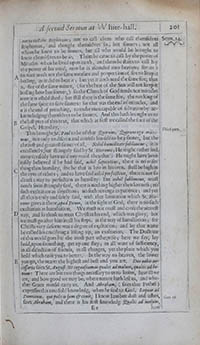 A second Sermon at White-hall.
201
Serm.14.
A second Sermon at White-hall.
201
Serm.14.
not to call the Righteous; not to call them who call themselves
Righteous, and thought themselves so, but sinners; not all
whom he knew to be sinners, but all who would be brought to
know themselves to be so. Them he came to call by the power of
Miracles when he lived upon earth, and them he staies to call by
the power of his word, now he is ascended into heaven; for as a
furnace needs not the same measure and proportion of fire to keep it
boiling, as it did to heat it; but yet it doth need the same fire, that
is, fire of the same nature, (for the heat of the Sun will not keep it
boiling how hot soever,) so the Church of God needs not miracles
now it is established; but still there is the same fire, the working of
the same spirit to save sinners: for that was the end of miracles, and
it is the end of preaching, to make men capable of salvation by ac-
knowledging themselves to be sinners. And this hath brought us to
the last part of this text, that which at first we called the fruit of the
Gospel, Humility. Third part.This brought St. Paul to be of that Quorum, Quorum ego maxi-
mus, not only to discern and confess himself to be a sinner, but the
cheifest and greatest sinner of all. Nihil humilitate sublimius; it is
excellently, but strangely said by St. Hierome; He might rather and
more credibly have us'd any word then that: He might have been
easily believed if he had said, nihil sapientius, there is no wiser
thing then humility, for he that is low in his own, shall be high
in the eyes of others; and to have said nihil perfective, there is not so
direct a way to perfection as humility: But nihil sublimius, must
needs seem strangely said, there is nothing higher then lowness; no
such exaltation as dejection; no such revenge as patience; and yet
all this is truly and safely said, with that limitation which St. Hie-
rome gives it there, apud Deum, in the sight of God, there is no such
exaltation as humiliation. We must not coast and cross the nearest
way, and so think to meet Christ in his end, which was glory, but
we must go after him in all his steps, in the way of humiliation; for
Christs very descent was a degree of exaltation; and by that name
he called his crucifying a lifting up, an exaltation. The Doctrine
of this world goes for the most part otherwise; here we say, lay
hold, upon something, get up one step; in all want of sufficiency,
in all defection of friends, in all changes, yet the place which you
hold which raise you to better. In the way to heaven, the lower
you go, the nearer the highest and best end you are. Duo nobis ne-
cessaria saies St. August. Ut cognoscamus quales ad malum, quales ad bo-
num: There are but two things necessary to us to know, how ill we
are, and how good we may be; where nature hath left us, and whe-
ther Grace would carry us. And Abraham, (saies that Father)
expresses this two fold knowledg, when he said to God, Loquar ad
Dominum, qui pulvis sum & cinis, I know I am but dust and ashes,
Gen. 18. saies Abraham, and there is his first knowledg Qualis ad molum, Ee
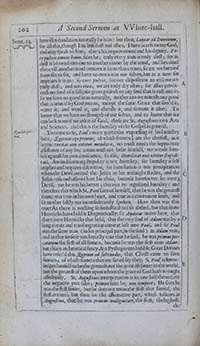 202
A Secondsecond Sermon at VVhite-hallWhite-Hall.
Serm.14.
202
A Secondsecond Sermon at VVhite-hallWhite-Hall.
Serm.14.
how ill a condition naturally he is in: but then, Loquar ad Dominum,
for all this, though I be but dust and ashes, I have access to my God,
and may speak to him; ther's his improvement and his dignity. Ve-
re pulvis omnis homo, saies he; truly every man is truly dust; for as
dust is blown from one to another corner by the wind, and lies dead
there till another wind remove it from that corner; so are we hurried
from sin to sin, and have no motion in our selves, but as a new sin
imprints it in us: so vere pulvis, for our disposition to evil we are
truly dust; and vere cinis, we are truly dry ashes; for ashes produ-
ceth no seed of it self, nor gives growth to any seed that is cast into it;
so we have no good in us naturally, neither can we nourish any good
that is infus'd by God into us, except the same Grace that sow'd it;
water it, and weed it, and cherish it, and so ment it after. To
know that we have no strength of our selves, and to know that we
can lack none if we ask it of God, these are St. Augustines two Arts
and Sciences, and this is the humility of the Gospel in general. Quorum pri-
mus.To come to St. Paul's more particular expressing of his humility
here, Quorum ego primus, of which sinners I am the cheifest, as it
is true veritas non nititur mendatio, no truth needs the support or
assistance of any lie; a man must not belie himself, nor accuse him-
self against his own conscience, so also, Humilitas non nititur stupidi-
tati, An undiscerning stupidity is not humility, for humility it self
implies and requires discretion, for humiliation is not precipitation
when the Devil inticed the Jesuit at his midnight studies, and the
Jesuit rose and offered him his chair, because howsoever he were a
Devil, yet he was his better; this was no regulated humility: and
therefore this which St. Paul saies of himself, that he was the greatest
sinner was true in his own heart, and true in a convenient sense, and
so neither falsly nor inconsiderately spoken. How then was this
true? As there is nothing so fantastical and so absurd, but that some
Hereticks have held it Dogmatically; so Aquinas notes here, that
there were Hereticks that held, that the very soul of Adam was by a
long circuit and transmigration come at last into Paul, and so Paul
was the same man (in his principal part, in the soul) as Adam was;
and in that sense it was literally true that he said, he was primus pec-
catorum the first of all sinners, because he was the first man Adam:
but this is an heretical fancy, & a Pythagorean bubble. Great Divines
have refer'd this Quorum ad salvendos, that Christ came to save
sinners; of which sinners that are saved say they, S. Paul acknow-
ledges himself to be the greatest; not the greatest sinner in the world,
but the greatest of them upon whom the grace of God hath wrought
effectually. St. Augustines interpretation is for one half thereof, for
the negative part sake; primus saies he, non tempore; He saies he
was the first sinner, but he does not mean the first that sinned, the
first in time; but then for the affirmative part, which follows in
Augustine, that he was primus malignitate, the first, the highest,
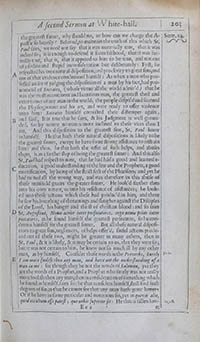 A second Sermon at White-hall.
203
Serm.14.
A second Sermon at White-hall.
203
Serm.14.
the greatest sinner, why should we, or how can we charge the A-
postle so heavily? Beloved, to maintain the truth of this which St.
Paul saies, we need not say that it was materially true, that it was
indeed so; it is enough to defend it from falshood, that it was for-
mally true, that is, that it appeard to him to be true, and not out
of a sodain and stupid inconsideration but deliberately: First, he
respected his own natural disposition, and proclivity to great sins, and
out of that evidence condemned himself: As when a man who pro-
fessed an art of judging the disposition of a man by his face, had pro-
nounced of Socrates, (whose virtue all the world admir'd) that he
was the most incontinent and licentious man, the greatest theif and
extortioner of any man in the world; the people despis'd and scorned
the Physiognomer and his art, and were ready to offer violence
unto him: Socrates himself corrected their distemper again,
and said, It is true that he saies, & his Judgment is well groun-
ded, for by nature no man is more inclined to these vices then I
am. And this disposition to the greatest sins, St. Paul knew
in himself. He that hath these natural dispositions is likely to be
the greatest sinner, except he have some strong assistance to restrain
him: and then, he that hath the offer of such helps, and abuses
them, is in a farther step of being the greatest sinner: And this also
St. Paul had respect to now, that he had had a good and learned e-
ducation, a good understanding of the law and the Prophets, a good
mortification, by being of the strict sect of the Pharisees; and yet he
had turned all the wrong way, and was therefore in this abuse of
these manifold graces the greater sinner. He look'd farther then
into his own nature, or into his resistance of asistances; he look-
ed into those actions which these had produc'd in him, and there
he saw his breathing of threatnings and slaugherslaughter against the Disciples
of the Lord, his hunger and thirst of christian blood: and so saies
St. Augustine, Nemo acrior inter persecutores, ergo nemo prior inter
peccatores, as he found himself the greatest persecutor, so he con-
demns himself for the greatest sinner. But all these natural disposi-
tions to great sins, negliences, of helps offer'd, sinful actions produ-
ced out of these two, might be greater in many others, then in
St. Paul; & it is likely, & it may be certain to us, that they were so;
but it was not certain to him, he knew not so much ill by any other
man, as by himself. Consider those words in the Proverbs,30.2. Surely
I am more foolish then any man, and have not the understanding of a
man in me: for though they be not the words of Salomon, yet they
are the words of a Prophet, and a Prophet who surely was not really
more foolish then any man, then in consideration of something which
he found in himself, saies so: he that considers himself, shall find such
degrees of sin, as that he cannot see than any man hath gone lower:
Or if he have in some particular and notorious sin, yet in quovis alio,
quid occultum esse potest; quo nobis superior sit:August. He that is fallen low-
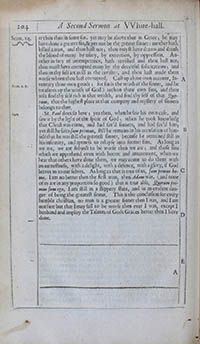 204
A Secondsecond Sermon at VVhite-hallWhite-Hall.
Serm.14.
er then thus in some sin, yet may be above thee in Grace; he may
204
A Secondsecond Sermon at VVhite-hallWhite-Hall.
Serm.14.
er then thus in some sin, yet may be above thee in Grace; he may
have done a greater sin, & yet not be the greater sinner: another hath
killed a man, and thou hast not; thou mayst have drawn and drunk
the blood of many by usury, by extortion, by oppression. An-
other in fury of intemperance, hath ravished and thou hast not;
thou maist have corrupted many by thy deceitful solicitations; and
then in thy self art as ill as the ravisher, and thou hast made them
worse whom thou hast corrupted. Cast up thine own account, In-
ventary thine own goods;Rom. 2.5. for sin is the wrath of the sinner, and he
treasures up the wrath of God) reckon thine own sins, and thou
wilt find thy self rich in that wealth, and find thy self of that Quo-
rum, that the highest place in that company and mystery of sinners
belongs to thee. Sum.St. Paul does so here; yea then, when he saw his own case, and
saw it by the light of the spirit of God; when he took knowledg
that Christ was come, and had sav'd sinners, had sav'd him;
yet still he saies sum primus, still he remains in his accusation of him-
self that he was still the greatest sinner, because he remained still in
his infirmity, and aptness to relapse into former sins. As long as
we are, we are subject to be worse then we are; and those sins
which we apprehend even with horror and amazement, when we
hear that others have done them, we may come to do them with
an earnestness, with a delight, with a defence, with a glory, if God
leaves us to our selves. As long as that is true of us, sum prmusprimus ho-
mo, I am no better then the first man, then Adam was, (and none
of us are in any proportion so good) that is true also, Quorum pri-
mus sum ego, I am still in a slippery state, and in an evident dan-
ger of being the greatest sinner. This is the conclusion for every
humble christian, no man is a greater sinner then I was, and I am
not sure but that I may fall to be worse then ever I was, except I
husband and imploy the Talents of Gods Graces better then I have
done.
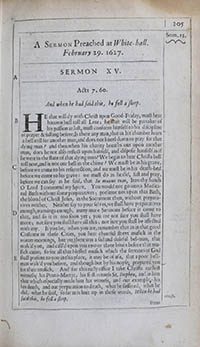 205
Serm.15.
A Sermon Preached at White-hall.
205
Serm.15.
A Sermon Preached at White-hall. February 29. 1627.
SERMON XV. Acts 7.60.
And when he had said this, he fell a sleepasleep. HEHe that will dy with Christ upon Good-Friday, must hear
his own bell toll all Lent; he that will be partaker of
his passion at last, must conform himself to his discipline
of prayer & fasting before. Is there any man, that in his chamber hears
a bell toll for another man, and does not kneel down to pray for that
dying man? and then when his charity breaths out upon another
man, does he not also reflect upon himself, and dispose himself as if
he were in the state of that dying man? We begin to hear Christs bell
toll now, and is not our bell in the chime? We must be in his grave,
before we come to his resurrection, and we must be in his death-bed
before we come to his grave: we must do as he did, fast and pray,
before we can say as he said, that In manus tuas, Into thy hands
O Lord I commend my Spirit. You would not go into a Medici-
nal Bath without some preparatives; presume not upon that Bath,
the blood of Christ Jesus, in the Sacrament then, without prepara-
tives neither. Neither say to your selves, we shall have preparatives
enough, warnings enough, many more Sermons before it come to
that, and so it is too soon yet; you are not sure you shall have
more; not sure you shall have all this; not sure you shall be affected
with any. If you be, when you are, remember that as in that good
Custome in these Cities, you hear cheerful street musick in the
winter mornings, but yet there was a sad and doleful bel-man, that
wak'd you, and call'd upon you two or three hours before that mu-
sick came; so for all that blessed musick which the servants of God
shall present to you in this place, it may be of use, that a poor bell-
man wak'd you before, and though but by his noyse, prepared you
for their musick. And for this early office I take Christs earliest
witness, his Proto-Martyr, his first witness St. Stephen, and in him
that which especially made him his witness, and our example, his
his death, and our preparation to death, what he suffered, what he
did, what he said, so far as is knit up in those words, When he had
said this, he fell a sleepasleep.Divisio.
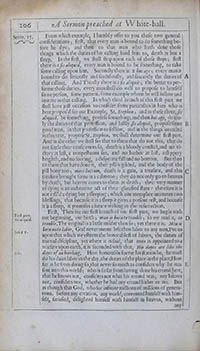 206
A Sermon preached at White-hall.
Serm.15.
206
A Sermon preached at White-hall.
Serm.15.
From which example, I humbly offer to you these two general
considerations; first, that every man is bound to do something be-
fore he dye; and then to that man who hath done those
things which the duties of his calling bind him to, death is but a
sleep. In the first, we shall stop upon each of those steps; first
there is a sis aliquid, every man is bound to be something, to take
some calling upon him. Secondly there is a hoc age; every man is
bound to do seriously and scedulously, and sincerely the duties of
that calling. And Thirdly there is a sis aliquis; the better to per-
forme those duties, every man shall do well to propose to himself
some person, some pattern, some example whom he will follow and
imitate in that calling. In which third branch of this first part we
shall have just occasion to consider some particulars in him who is
here propos'd for our Example, St. Stephen; and in these three, sis
aliquid, be something, profess something; and then hoc age, do tru-
ly the duties of that profession; and lastly, sis aliquis, propose some
good man, in that profession to follow, and in the things intended
in this text, propose St. Stephen, we shall determine our first part.
And in the other we shall see that to them that do not this, that do
not settle their consciences so, death is a bloody conflict, and no vi-
ctory at last, a tempestuous sea, and no harbor at last, a slippery
heighth, and no footing, a desperate fall and no bottom. But then
to them that have done it, their pill is gilded, and the body of the
pill hony too; mors lucrum, death is a gain, a treasure, and this
treasure brought some in a calm too; they do not only go to heaven
by death, but heaven comes to them in death; their very manner
of dying is an inchoative act of their glorified state: therefore it is
not call'd a dying but a sseepingsleeping; which one metaphor intimates two
blessings, that because it is a sleep it gives a present rest, and because
it is a sleep, it promises a future waking in the resurrection. First part.
Sis aliquid. First, Then for our first branch of our first part, we begin with
our beginning, our birth; man is born to trouble; so we read it, to
trouble. The original is a little milder then so; yet there it is, Man is
born unto labor,Job. 5 7. God never meant less then labor to any man. Put us
upon that which we esteem the honorablest of labors, the duties of
martial discipline, yet where it is said, that man is appointed to a
warfare upon earth, it is seconded with that, His dayes are like the
dayes of an hireling.7.1. How honorable soever his station be, he must
do his daies labor in the day, the duties of the place in the place. How
far is he from doing so, that never so much as considers why he was
sent into this world; who is so sarfar from having done his errand here,
that he knows not, considers not what his errand was; nay knows
not, considers not, whether he had any errand hither or no. But
as though that God, who for infinite millions of millions of genera-
tions, before any creation, any world, contented himself with him-
self, satisfied, delighted himself with himself in heaven, without
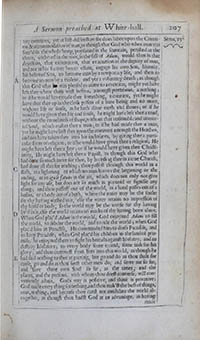 A Sermon preached at White-hall.
207
Serm.15.
A Sermon preached at White-hall.
207
Serm.15.
any creatures, yet at last did bestow six daies labor upon the Creati-
on & accommodation of man, as though that God who when man was
sour'd in the whole lump, poysoned in the fountain, perished at the
chore, withered in the root, in the fall of Adam, would then in that
dejection; that exinanition, that evacuation of the dignity of man,
and not in his sormerformer better estate, engage his own Son, his only,
his beloved Son, to become man by a temporary life, and then to
become no man by a violent, and yet a voluntary death; as though
that God who he was pleased to come to a creation, might yet have
left thee where thou wast before, amongst privations, a nothing;
or if he would have made thee something, a creature, yet he might
have shut thee up in the clossclose prison of a bare being and no more,
without life or sense, as he hath done earth and stones; or if he
would have given thee life and sense, he might have left thee a toad,
without the comeliness of shape, without that reasonable and immor-
tal Soul, which makes thee a man; or if he had made thee a man,
yet he might have lost thee upon the common amongst the Heathen,
and not have taken thee into his inclosures, by giving thee a parti-
cular form of religion; or if he would have given thee a religion, He
might have left thee a Jew; or if he would have given thee Christi-
anity, He might have left thee a Papist, as though this God who
had done so much more for thee, by breeding thee in a true Church,
had done all this for nothing; thou passest through this world as a
flash, as a lightning or which no man knows the beginning or the
ending, as an ignis fatuus in the air, which does not only not give
light for any use, but does not so much as portend or signifie any
thing; and thou passest out of the world, as a hand passes out of a
bason, or a body out of a bath, where the water may be the fouler
for thy having washed in it, else the water retains no impression of
thy hand or body, so the world may be the worse for thy having
liv'd in it, else the world retains no marks of thy having been there.
When God plac'd Adam in the world, God enjoyned Adam to fill
the world, to subdue the world, and to rule the world; when God
plac'd him in Paradise, He commanded him to dress Paradise, and
to keep Paradise; when God plac'd his children in the land of pro-
mise, he enjoyned them to fight his battails against Idolatry, and to
destroy Idolators; to every body some errand, some task for his
glory; and thou commest from him into this world, as though he
had said nothing to thee at parting, but go and do as thou shalt see
cause, go and do as thou seest other men do, and serve me so far,
and save thine owne Soul so far, as the times, and the
places, and the persons, with whom thou doest converse, will con-
veniently admit. Gods way is positive, and thine is privative:
God made every thing something, and thou mak'st the best of things,
man, nothing; and because thou canst not annihilate the world al-
together, as though thou hadst God at an advantage, in having
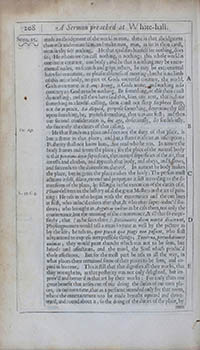 208
A Sermon preached at White-hall.
Serm.15.
208
A Sermon preached at White-hall.
Serm.15.
made an abridgment of the world in man, there in that abridgment
thou wilt undermine him, and make man, man, as far as thou canst,
man in thy self nothing. He that qualifies himself for nothing, does
so; He whom we can call nothing, is nothing: this whole world is
one intire creature, one body; and he that is nothing may be excre-
mental nailes, to scratch and gripe others, he may be excremental
hairs for ornament, or pleasurableness of meeting; but he is no limb
of this intire body, no part of Gods universal creature, the world.
Gods own name is I am: Being, is Gods name, and nothing is so
contrary to God as to be nothing. Be something, or else thou canst
do nothing; and till thou have said this, saies our text, that is, done
something in a lawful calling, thou canst not sleep Stephens sleep,
not die in peace. Sis aliquid, propose something, determine thy self
upon somehingsomething, be, profess something, that was our first; and then
our second consideration is, hoc age, do seriously, do scedulously,
do sincerely the duties of that calling. Hoc Age. He that stands in a place and does not the duty of that place, is
but a statue in that place; and but a statue without an inscription;
Posterity shall not know him, nor read who he was. In nature the
body frames and forms the place; for the place of the natural body
is that proxima arcis superficies, that inward superficies of the air, that
invests and clothes, and apparals that body, and obeys, and follows,
and succeeds to the dimensions thereof. In naturet henature the body makes
the place, but in grace the place makes the body: The person must
actuate it self, dilate, extend and propagate it self according to the di-
mensions of the place, by filling it in the execution of the duties of it.
Plinie delivers us the history of al the great Masters in the art of pain-
ting:L. 35. C. 3. He tels us who began with the extremities and the out lines
at first, who induc'd colors after that, & who after super-induc'd sha-
dows; who brought in Argutias vultus as he cals them, not only the
countenance, but the meaning of the countenance, & all that so exqui-
sitely, that (as he saies there) Divinantes diem mortis dixerunt,
Physiognomers would tell a mans fortune as well by the picture as
by the life; he tels us, quis pinxit quæ pingi non possunt, who first
adventured to express inexpressible things; Tonitrua, perturbationes
animas; they would paint thunder which was not to be seen, but
heard: and affections, and the mind, the Soul which produc'd
those affections. But for the most part he tels us all the way, in
what places there remained some of their pieces to be seen, and co-
pied in his time. This is still that that dignifies all their works, that
they wrought so, as that posterity was not only delighted, but im-
prov'd and better'd in that art by their works: For truly thats one
great benefit that arises out of our doing the duties of our own pla-
ces, in our own time, that as a perfume intended only for that room,
where the entertainment is to be made breaths upward and down-
ward, and round about it; so the doing of the duties of the place, by Ff
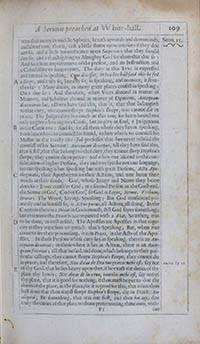 A Sermon preached at White-hall.
109209
Serm.15.
A Sermon preached at White-hall.
109209
Serm.15.
men that move in middle Sphears, breath upwards and downwards,
and about too, that is, cast a little shame upon inferiors if they doe
not so, and a little remembrance upon Superiors that they should
doe so, and a thanksgiving to Almighty God for them that doe so:
And so it is an improvement of the present, and an Instruction and
a Catechisme to future times. The duty in this Text is expressed
and limited in speaking. Cum dixisset, When hee had said this he fell
a sleepeasleepe, and truly so, literally so, in speaking, and no more, it stret-
ches far: Many duties, in many great places consist in speaking;
Ours doe so: And therefore, when Vices abound in matter of
Manners, and Schismes abound in matter of Opinions, Antequam
dixerimus hoc, till wee have said this, that is, that that belongeth
to that duty, wee cannot sleepe Stephen's sleepe, wee cannot die in
peace. The Judges duty lies much in this too, for hee is bound not
only to give a hearing to a Cause, but to give an End, a Judgement
in the Cause too: And so, for all them whose duty lies in speaking,
from him who is to counsell his friend, to him who is to counsell his
Master in the family (for Job professes that hee never refused the
counsell of his Servant) Antequam dixerint, till they have said this,
that is still, that that belongs to that duty, they cannot sleep Stephen's
sleepe, they cannot die in peace: and when wee ascend to the con-
sideration of higher Persons, they and wee speake not one language,
for our speaking is but speaking but with great Persons, Acta Apo-
thegmata, their Apothegms are their Actions, and wee heare their
words in their deeds. God, whose Image and Name they beare
does so: If wee consider God; as a second Person in the Godhead,
the Sonne of God, CodGod of God, so God is Logos, Sermo, Verbum,
Oratio; The Word, Saying, Speaking; But God considered pri-
marily and in himself so, is Actus purus, all Action, all doing. In the
Creation there is a Dixit in Gods mouth, still God sayes something;
but evermore the Dixit is accompanied with a Fiat, Somthing was
to be done, as well as said. The Apostles are Apostles in that capa-
city as they were sent to preach that's Speaking; But, when wee
come to see their proceeding, it is in Praxi, in the Acts of the Apo-
stles. In those Persons whose duty lies in speaking, there is an An-
tequam dixerint; in those where it lies in Action, there is an Ante-
quam fecerint; till that be said, and done, which belongs to their par-
ticular callings, they cannot sleepe Stephen's sleepe, they cannot die
in peace; and therefore, Non dicas de Deo tuo gravis mihi est,Ambro. Ep. 17. say not
of thy God, that he lies heavy upon thee, if he exact the duties of thy
plaatplace at thy hands; Nec dicas de loco tuo, inutilis mihi est, say not of
thy place, that it is good for nothing, if thou must be put to doe the
duties of the place, in the place; for it is good for this, that when thou
hast done that thou mayst sleepe Stephen's sleepe, die in Peace. Sis
aliquid, Be something, that was our first, and then hoc age, doe
truly the duties of that place without pretermitting thine own, with-
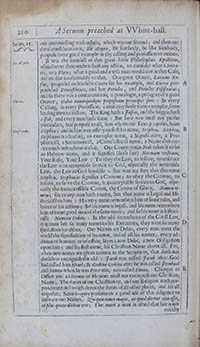 210
A Sermon preached at VVhite-hallWhite-Hall.
Serm.15.
210
A Sermon preached at VVhite-hallWhite-Hall.
Serm.15.
out intermedling with others, which was our second; and then our
third consideration is, Sis aliquis, Be sombody, be like sombody,
propose some good example in thy calling and profession to imitate. Sis aliquis.It was the counsell of that great little Philosopher Epictetus,
whensoever thou undertakest any action, to consider what a Socra-
tes, or a Plato; what a good and a wise man would doe in that Case,
and to doe conformably to that. One great Orator, Latinus Ru-
fus, proposed to himselfe Cicero for his example, and Cicero pro-
pounded Demosthenes, and hee Pericles, and Pericles Pisistratus;
and so there was a concatenation, a genealogie, a pedegree of a good
Orator;HieronHierom. Habet unumquodque propositum principes suos: In every
Calling, in every Profession, a man may finde some exemplar, some
leading men to follow. The King hath a Josias, and the beggar hath
a Job, and every man hath some: But here wee must not pursue
particulars, but propose to all, him whom our Text proposes, Saint
Stephen;Stephanus. and in him wee offer you first his name, Stephen. Stephen,
Stephanos is a leading, an exemplar name, a Significative, a Pro-
pheticall, a Sacramentall, a Catechisticall name; a Name that car-
ries much instruction with it. Our Countryman Bede takes it to be
an Hebrew name, and it signifies (saith hee) Normam vestram,
Your Rule, Your Law: To obey the Law, to follow, to embrace
the Law is an acceptable service to God, especially the invariable
Law, the Law of God himselfe: But wee are sure that this name
Stephen, Stephanos signifies a Crowne; to obey the Crowne, to
follow, to serve the Crowne, is an acceptable service to God, espe-
cially the immarcessible Crown, the Crown of Glory. Nomen O-
men; scarce any man hath a name, but that name is Legal and Hi-
storicall to him: His very name remembers him of some rules, and
lawes of his actions; So his name is legall, and his name remembers
him of some good men of the same name; and so his name is histori-
call. Nomina Debita: In the old formularies of the Civill Law,
if a man left so many names to his Executors, they were so many
specialties for debts. Our Names are Debts, every man owes the
world the signification of his name, and of all his names; every ad-
dition of honour, or of office, layes a new Debt, a new Obligation
upon him; and his first name, his Christian-Name above all. For,
when new names are given to men in the Scriptures, that doth not
abolish or extinguish the old: Jacob was called Jacob after God
had called him Israel; & Gedeon Gedeon after he was called Jerubaal
and Simon when he was Peter too, was called Simon. Changes of
Office and additions of Honour must not extinguish our Christian,
Name; The duties of our Christianity, and our Religion must pre-
ponderate and weigh down the duties of all other places, and for all
together. Saint Gregory presents us a good use of this diligence to
answere our Names, Quo quis timet magis, ne quod dicitur non esset,
eo plus quam dicitur erit; The more a man is afraid that hee is not
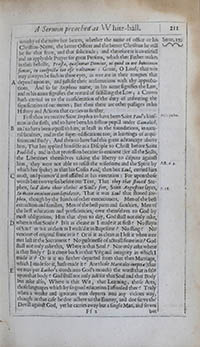 A Sermon preached at White-hall.
211
Serm.15.
A Sermon preached at White-hall.
211
Serm.15.
worthy of the name hee beares, whether the name of office or his
Christian-Name, the better Officer and the better Christian he will
be for that feare, and that solicitude; and therefore it is an usefull
and an applyable Prayer for great Persons, which that Father makes
in their behalfe, Præsta, quæsumus Domine, ut quod in ore hominum
sumus, in conspectu tuo esse valeamus: Grant, O Lord, that wee
may alwayes be such in thine eyes, as wee are in their tongues that
depend upon us, and justifie their acclamations with thy approba-
tions. And so far Stephens name, as his name signifies the Law,
and as his name signifies the reward of fulfilling the Law; a Crown
hath carried us to the consideration of the duty of answering the
signification of our names; But then there are other passages in his
History and Actions that carries us farther. First then we receive Saint Stephen to have been Saint Paul's kins-
man in the flesh, and to have been his fellow pupill under Gamaliel,
Discipulus. and to have been equall to him, at least in the foundations, in natu-
ral faculties, and in the super-edifications too, in learnings of acqui-
sition and study; And then to have had this great advantage above
him, That hee applied himselfe as a Disciple to Christ before Saint
Paul did; and in that profession became so eminent (for all the Sects,
the Libertines themselves taking the liberty to dispute against
him,Act. 6.9. they were not able to resist the wisedome and the Spirit by
which hee spake) as that his Cosin Paul, then but Saul, envied him
most, and promov'd and assisted at his execution: For upon those
words but two verses before our Text, That they that stoned Ste-
phen, laid down their clothes at Saul's feet, Saint Augustine sayes,
7.58. In manu omnium eum lapidavit, That it was Saul that stoned Ste-
phen, though by the hands of other executioners. Men of the best
extraction and families, Men of the best parts and faculties, Men of
the best education and proficiencies, owe themselves to God by
most obligations. Him that dyes to day, God shall not only aske,
where is that Soule? Is it as cleane as I made it at first? No stayn
of Sin? or is it as clean as I wash'd it in Baptisme? No sting? No
venome of original sinne in it? Or is it as clean as I left it when wee
met last at the Sacrament? No guiltinesse of actuall sinne in it? God
shall not only aske this, Where is that Soul? Nor only aske where
is that Body? Is it come back in that Virginal integrity in which I
made it? Or is it no farther departed from that then Marriage,
which I made for it, hath made it? Are those Maritales ineptiæ (that
we may put Luther's words into God's mouth) the worst that is faln
upon that body? God shall not only ask for that Soul and that Body
but aske also, Where is that Wit, that Learning, those Arts,
those languages which by so good education I afforded thee? Truly
when a weake and ignorant man departs into any vicious way,
though in that case he doe adhere to the Enemy, and doe serve the
Devill against God, yet he carries away but a single Man, and serves
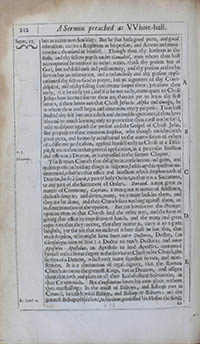 212
A Sermon preached at VVhite-hallWhite-Hall.
Serm.15.
212
A Sermon preached at VVhite-hallWhite-Hall.
Serm.15.
but as a common Souldier: But he that hath good parts, and good
education, carries a Regiment in his person, and Armies and muni-
tion for a thousand in himself. Though then thy kinsmen in the
flesh, and thy fellow pupils under Gamaliel, men whom thou hast
accompanied heretofore in other waies, think thy present fear of
God, but a childishness and pusilanimity, and thy present zeal to his
service but an infatuation, and a melancholy and thy present appli-
cation of thy self to God in prayer, but an argument of thy Court-
dispaire, and of thy falling from former hopes there; yet come thou
early, if it be early yet; and if it be not early, come apace to Christ
Jesus: how learned soever thou art, thou art yet to learn thy first
letters, if thou know not that Christ Jesus is Alpha and Omega, he
in whom thou must begin and determine every purpose: Thou hast
studied thy self but into a dark and damnable ignorance, if thou have
labored for much learning only to prove that thou canst not be sav'd,
only to dispute against the person and the Gospel of Christ Jesus.
But propose to thine imitation Stephen, who though enriched with
great parts, and formerly accustomed to the conversation of others
of a different perswasion, applied himself early to Christ as a Disci-
ple,v. 5. & more then in that general application, in a particular function
and office as a Deacon, as is expressed in the former Chapter. Diaconus.The Roman Church that delights in irresolutions and gains, and
makes profit in holding things in suspence, holds up this question un-
determind, whether that office and function which Stephen took of
Deacon, be so è sacris, a part of holy Orders, as that it is a Sacrament,
or any part of the Sacrament of Orders. Durand. a man great in
matter of Ceremony, Cajetan, a man great in matter of substance,
do both deny it; and divers, many, very many besides them; and
they are let alone, and their Church saies nothing against them, or
in determination of the opinion. But yet howsoever the stronger
opinion even in that Church lead the other way, and the form of
giving that office by imposition of hands, and the many and great
capacities that they receive, that they receive it, carry it to a great
heighth, yet the use that we make of it here shall be but this, that
even Stephen, who might have been inter Doctores, Doctor, (as
Chrysologus saies of him) a Doctor to teach Doctors; and inter
Apostolos Apostolus, an Apostole to lead Apostles, contented
himself with a lower degree in the service of Christ in his Church, the
service of a Deacon, which very name signifies service, and mini-
stration. It is a diminution of regal dignity, that the Roman
Church accounts the greatest Kings, but as Deacons, and assigns
them that rank and place in all their Ecclesiastical Solemnities, in
their Ceremonials. But Constantine knew his own place without
their marshalling: In the midst of Bishops, and Bishops met in
Council, he cals himself Bishop, and Bishop of Bishops: and the
greatest Bishop of this land,St. Dunstan. in his time, professed his Master the King,
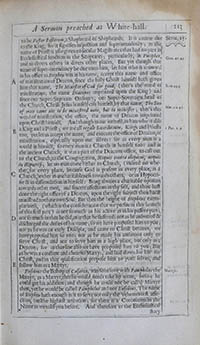 A Sermon preached at White-hall.
213
Serm.15.
A Sermon preached at White-hall.
213
Serm.15.
to be Pastor Pastorum, a Shepheard of Shepheards. It is a name due
to the King, for it signifies inspection and superintendency; as the
name of Priest is also given to secular Magistrates that had no part in
Ecclesiastical function in the Scriptures; particularly, in Putipher,
Gen. 41.45. and to divers others in divers other places. But yet though that
name of super-intendancy be due unto him, let him who is crown'd
in his office as Stephen was in his name, accept this name and office
of ministration of Deacon, since the holy Ghost himself hath given
him that name, The Minister of God for good,Rom. 13.4 (ther's the word of
ministration, the name Diaconos imprinted upon the King) and
since our Super-Supream Ordinary, our Super-Soveraign head of
the Church, Christ Jesus himself cals himself, by that name, The Son
of man came not to be ministred unto, but to minister;Mar. 10.45. ther's this
word of ministration, the office, the name of Deacon imprinted
upon Christ himself. And though in our interest, in him who is also
a King and a Priest; we are all regale Sacerdotium,1 Pet. 2.9. Kings and Priests
too, yet let us accept the name, and execute the office of Deacon, of
ministration, especially upon our selves: for as every man is a
world in himself, so every man is a Church in himself too: and in
the ancient Church, it was a part of the Deacons office, to call out
to the Church, to the Congregation, Nequis contra aliquem, nequis
in Hipocrisi; let no man come hither to Church, (indeed no whe-
ther, for every place, because God is present in every place, is a
Church,) either in uncharitableness towards others, or in Hypocri-
sie & in dissimulation in himself: Bring alwaies a charitable opinion
towards other men, and sincere affections in thy self, and thou hast
done the right office of a Deacon, upon the right subject thou hadst
ministred to thine own Soul. But then the height of Stephens exem-
plariness, (which is the consideration that we pursue in this branch
of this first part) is not so much in his active as in his passive part;
not so much in that he did, as in that he suffered; not as he answered &
discharged the duties of his name; so we have proposed him to you;
nor as he was an early Disciple, and came to Christ betimes, we
have proposed him so too; nor as he made his ambition only to
serve Christ, and not to serve him in a high place, but only as a
Deacon; for in that line also we have proposed him to you; But
as he was a constant and chearful Martyr, and laid down his life for
Christ, and in that qualification propose him to your selves, and
follow him as a Martyr. Eusebius the Bishop of Cæsarea,Martyr. was so in love with Pamphilus the
Martyr, as a Martyr, that he would needs take his name, before he
could get his addition; and though he could not be call'd Martyr
then, yet he would be called Pamphilus and not Eusebius. The name
of Stephen hath enough in it to serve not only the vehementest affe-
ction, but the highest ambition; for there is a Coronation in the
Name as we told you before. And therefore in the Ecclesiastical
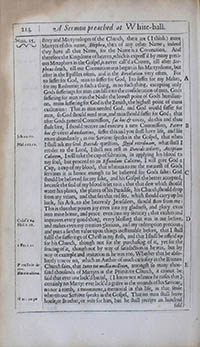 214
A Sermon preached at White-hall.
Serm.15.
214
A Sermon preached at White-hall.
Serm.15.
story and Martyrologes of the Church, there are (I think) more
Martyrs of this name, Stephen, then of any other Name; indeed
they have all that Name, for the Name is a Coronation. And
therefore the Kingdome of heaven, which is express'd by many preci-
ous Metaphors in the Gospel, is never call'd a Crown, till after Ste-
phens death, till our Coronation was begun in his Martyrdome, but
after in the Epistles often, and in the Revelation very often. For
to suffer for God, man to suffer for God, I to suffer for my Maker,
for my Redeemer is such a thing, as no such thing, excepting only
Gods sufferings for man can fall into the consideration of man. Gods
suffering for man was the Nadir the lowest point of Gods humiliati-
on, mans suffering for God is the Zenith, the highest point of mans
exaltation: That as man needed God, and God would suffer for
man, so God should need man, and man should suffer for God; that
after Gods general Commission, fac hoc & vives, do this and thou
shalt live, I should receive and execute a new Commission, Patere
hoc & vives abundantius, suffer this and you shall have life, and life
more abundantly;Joh. 10.10. as our Saviour speaks in the Gospel, that when
I shall ask my soul Davids question,Psal. 116.12. Quid retribuam, what shall I
render to the Lord, I shall not rest in Davids answer, Accipiam
Calicem, I will take the cup of salvation, in applying his blood to
my soul, but proceed to an Effundam Calicem, I will give God a
Cup, a cup of my blood, that whereas to me the meanest of Gods
servants it is honor enough to be believed for Gods sake: God
should be believed for my sake, and his Gospel the better accepted,
because the feal of my blood is set to it; that that dew which should
water his plants, the plants of his Paradise, his Church, should drop
from my veines, and that sea that red sea, which should carry up his
bark, his Ark, to the heavenly Jerusalem, should flow from me:
This is that that poures joy even into my gladness, and glory even
into mine honor, and peace even into my security; that exaltes and
improves every good thing, every blessing that was in me before,Colos. 1. 24.
and makes even my creation glorious, and my redemption precious;Phil 2.17.
and puts a farther value upon things inestimable before, that I shall
fulfil the sufferings of Christ in my flesh, and that I shall be offerd up
for his Church,1 Pet. 2.21 though not for the purchasing of it, yet for the
fencing of it, though not by way of satisfaction as he was, but by
way of example and imitation as he was too. Whether that be abso-
lutely true or no, which an Author of much curiosity in the Roman
Church saies,Prrecta in le-
gem.
Notatio ultima. that Inter tot millia millium, amongst so many thou-
sand thousands of Martyrs in the Primitive Church, it cannot be
said that ever one lack'd burial, (I know not whence he raises that)
certainly no Martyr ever lack'd a grave in the wounds of his Saviour,
no nor a tomb, a monument, a memorial in this life, in that sense
wherein our Saviour speaks in the Gospel, That no man shall leave
house,Mar. 10.30 or Brother, or wife for him, but he shall receive an hundred
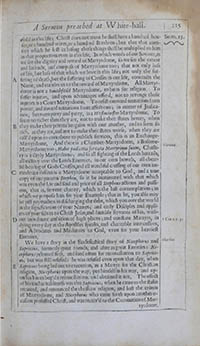 A Sermon preached at White-hall.
215
Serm.15.
A Sermon preached at White-hall.
215
Serm.15.
fold in this life; Christ does not mean he shall have a hundred hou-
ses, or a hundred wives, or a hundred Brethren; but that that com-
fort which he lost in losing those things shall be multiplied to him
in that proportion even in this life. In which words of our Saviour, as
we see the dignity and reward of Martyrdome, so we see the extent
and latitude, and compass of Martyrdome too; that not only loss
of life, but loss of that which we love in this life; not only the suf-
fering of death, but the suffering of Crosses in our life, contracts the
Name, and entitles us to the reward of Martyrdome. All Martyr-
dome is not a Smithfeild Martyrdome, to burn for religion. To
suffer injuries, and upon advantages offerd, not to revenge those
injuries is a Court Martyrdome. To resist outward tentations from
power, and inward tentations from affections; in matter of Judica-
ture, between party and party, is a Westminster Martyrdome. To
seem no richer then they are, not to make their states better, when
they make their private bargains with one another, and to seem so
rich, as they are, and not to make their states worse, when they are
call'd upon to contribute to publick services, this is an Exchange-
Martyrdome. And there is a Chamber-Martyrdome, a Bosome-
Martyrdome too; Habet pudicitia servata Martyrium suum,Hierome. Chasti-
ty is a dayly Martyrdome; and so all fighting of the Lords battails,
all victory over the Lords Enemies, in our own bowels, all chear-
ful bearing of Gods Crosses, and all watchful crossing of our own im-
moderate desires is a Martyrdome acceptable to God, and a true
copy of our pattern Stephen, so it be inanimated with that which
was even the life and soul and price of all Stephens actions and passi-
ons, that is, fervent charity, which is the last contemplation; in
which we propose him for your Example; that as he, you also may
be just paymasters in discharging the debt, which you owe the world
in the signification of your Names; and early Disciples and appli-
ers of your selves to Christ Jesus, and humble servants of his, with-
out inordinate ambition of high places; and constant Martyrs,1 Cor. 15.31 in
dying every day as the Apostles speaks, and charitable intercessors,
and Advocates and Mediators to God, even for your heaviest
Enemies. We have a story in the Ecclesiastical story of Nicephorus and
Sapricius, formerly great friends, and after as great Enemies:Charitas Ni-
cephorus relented first, and sued often for reconciliation to Saprici-
us, but was still refused: he was refused even upon that day, when
Sapricius being led out to execution, as a Martyr for the Christian
religion, Nicephorus upon the way, put himself in his way, and up-
on his knees beg'd a reconciliation, and obtained it not. The effect
of his uncharitableness was this Sapricius, when he came to the stake
recanted, and renounced the christian religion, and lost the crown
of Martyrdome, and Nicephorus who came forth upon another o-
casion professed Christ, and was receiv'd to the Coronation of Mar-Martyr-
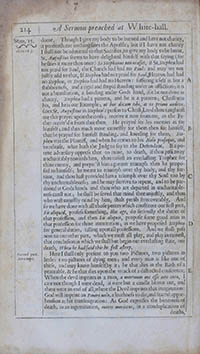 214216
A Sermon preached at White-hall.
Serm.15.
214216
A Sermon preached at White-hall.
Serm.15.
dome. Though I give my body to be burned and have not charity,
it profiteth me nothing saies the Apostle; but if I have not charity
I shall not be admitted to that Sacrifice, to give my body to be burnt.
St. Augustine seems to have delighted himself with that saying (for
he saies it more then once) Si Stephanus non orasset, if St. Stephen had
not praid for Saul, the Church had had no Paul: and may we not
justly add to that, If Stephen had not praid for Saul, Heaven had had
no Stephen, or Stephen had had no Heaven: suffering it self is but a
stubborness, and a rigid and stnpidstupid staudingstanding under an affliction; it is
not a humiliation, a bending under Gods hand, if it be not done in
charity. Stephen had a pattern, and he is a pattern; Christ was
his, and he is our Example; ut hoc dicam tibi, at te primo audivi,
saies St. Augustine in Stephen's person to Christ, Lord thou taughtest
me this prayer upon the cross; receive it now from me, as the Fa-
ther receiv'd it from thee then. He prayed for his enemies as for
himself; and thus much more earnestly for them then for himself,
that he prayed for himself standing, and kneeling for them. Ste-
phen was the Plantiff, and when he comes to his Nolo prosequi, and
to release, what hath the Judg to say to the Defendant. If a po-
tent adversary oppress thee to ruine, to death, if thou pass away
uncharitably towards him, thou raisest an everlasting Trophee for
thine enemy, and prepar'st him a greater triumph then he propo-
sed to himself; he meant to triumph over thy body, and thy for-
tune, and thou hast provided him a triumph over thy Soul too by
thy uncharitableness; and he may survive to repent, and to be par-
doned at Gods hands and thou who art departed in uncharitable-
ness canst not; he shall be saved that ruind thee unjustly, and thou
who wast unjustly ruind by him, shalt perish irrecoverably. And
so we have done with all those peeces which constitute our first part,
Sis aliquid, profess something, Hoc age, do seriously the duties of
that profession, and then Sis aliquis, propose some good man in
that profession for thine immitation; as we have proposed Stephen
for general duties, falling upon all professions. And we shall pass
now to our other part, which we must all play, and play in earnest,
that conclusion in which we shall but begin our everlasting state, our
death, When he had said this he fell asleep. Second part.
Mors impii.Here I shall only present to you two Pictures, two pictures in
little: two pictures of dying men; and every man is like one of
these, and may know himself by it; he that dies in the Bath of a
peaceable, & he that dies upon the wrack of a distracted conscience.
When the devil imprints in a man, a mortuum me esse non curo, I
care not though I were dead, it were but a candle blown out, and
there were an end of all, where the Devil imprints that imagination:
God will imprint an Emori nolo, a loathness to die, and fearful appre-
hension at his transmigration: As God expresses the bitterness of
death, in an ingemination, morte morietur, in a conduplication of
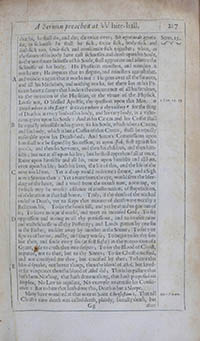 A Sermon preached at White-hall.
217
Serm.15.
A Sermon preached at White-hall.
217
Serm.15.
deaths, he shall die, and die, die twice over; So ægrotando ægrota-
bit, in sicknesse he shall be sick, twice sick, body-sick and
soul-sick too, sense-sick and conscience-sick together; when, as
the sinnes of his body have cast sicknesses and death upon his Soule,
so the inordinate sadnesse of his Soule, shall aggravate and actuate the
sicknesse of his body. His Physitian ministers, and wonders it
works not; He imputes that to flegme, and ministers against that,
and wonders again that it works not: He goes over all the humors,
and all his Medicines, and nothing works, for there lies at his Pa-
tients heart a dampe that hinders the concurrence of all his faculties,
to the intention of the Physitian, or the virtue of the Physick.
Loose not, O blessed Apostle, thy question upon this Man.1 Cor. 15.55 O
Death where is thy sting? O Grave where is thy victory? for the sting
of Death is in every limb of his body, and his very body, is a victo-
rious grave upon his Soule: And as his Carcas and his Coffin shall
lie equally insensible in his grave, so his Soule, which is but a Carcas,
and his body, which is but a Coffin of that Carcas, shall be equally
miserable upon his Death-bed; And Satan's Commissions upon
him shall not be signed by Succession, as upon Job, first against his
goods, and then his Servants, and then his children, and then him-
selfe; but not at all upon his life; but he shall apprehend all at once,
Ruine upon himselfe and all his, ruine upon himselfe and all him,
even upon his life; both his lives, the life of this, and the life of the
next world too. Yet a drop would redeeme a shoure, and a Sigh
now a Storme then: Yet a teare from the eye, would save the blee-
ding of the heart, and a word from the mouth now, a roaring, or
(which may be worse) a silence of consternation, of stupefaction,
of obduration at that last houre. Truly, if the death of the wicked
ended in Death, yet to scape that manner of death were worthy a
Religious life. To see the house fall, and yet be afraid to goe out of
it; To leave an injur'd world, and meet an incensed God; To see
oppression and wrong in all thy professions, and to foresee ruine
and wastefulnesse in all thy Posterity; and Lands gotten by one sin
in the Father, molder away by another in the Sonne; To see true
figures of horror, and ly, and fancy worse; To begin to see thy sins
but then, and finde every sin (at first sight) in the proportion of a
Gyant, able to crush thee into despair; To see the Blood of Christ,
imputed, not to thee, but to thy Sinnes; To see Christ crucified,
and not crucifyed for thee, but crucified by thee; To heare this
blood speake, not better things, then the blood of Abel, but lowd-
er for vengeance then the blood of Abel did; This is his picture that
hath been Nothing, that hath done nothing, that hath proposed no
Stephen, No Law to regulate, No example to certifie his Consci-
ence: But to him that hath done this, Death is but a Sleepe. Many have wondred at that note of Saint Chrysostom's,Mors Piorum. That till
Christ s time death was called death, plainly, literally death, but Gg
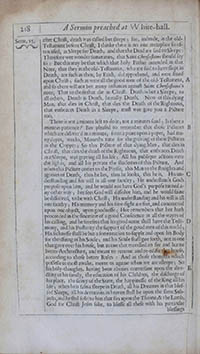 218
A Sermon preached at White-hall.
Serm.15.
218
A Sermon preached at White-hall.
Serm.15.
after Christ, death was called but sleepe; for, indeede, in the old-
Testament before Christ, I thinke there is no one metaphor so of-
ten used, as Sleepe for Death, and that the Dead are said to Sleepe:
Therefore wee wonder sometimes, that Saint Chrysostome should say
so: But this may be that which that holy Father intended in that
Note, that they in the old-Testament, who are said to have slept in
Death, are such as then, by Faith, did apprehend, and were fixed
upon Christ; such as were all the good men of the old-Testament,
and so there will not bee many instances against Saint Chrysostome's
note, That to those that die in Christ, Death is but a Sleepe; to
all others, Death is Death, literally Death. Now of this dying
Man, that dies in Christ, that dies the Death of the Righteous,
that embraces Death as a Sleepe, must wee give you a Picture
too. TheseThere is not a minute left to do it; not a minutes sand; Is there a
minutes patience? Bee pleased to remember that those Pictures
which are deliver'd in a minute, from a print upon a paper, had ma-
ny dayes, weeks, Moneths time for the graving of those Pictures
in the Copper; So this Picture of that dying Man, that dies in
Christ, that dies the death of the Righteous, that embraces Death
as a Sleepe, was graving all his life; All his publique actions were
the lights, and all his private the shadowes of this Picture. And
when this Picture comes to the Presse, this Man to the streights and
agonies of Death, thus he lies, thus he looks, this he is. His un-
derstanding and his will is all one faculty; He understands Gods
purpose upon him, and he would not have God's purpose turned a-
ny other way; hee sees God will dissolve him, and he would faine
be dissolved, to be with Christ; His understanding and his will is all
one faculty; His memory and his fore-sight are fixt, and concentred
upon one object, upon goodnesse; Hee remembers that hee hath
proceeded in the sinceritie of a good Conscience in all the wayes of
his calling, and he foresees that his good name shall have the Testi-
mony, and his Posterity the support of the good men of this world;
His sicknesse shall be but a fomentation to supple and open his Body
for the issuing of his Soule; and his Soule shall goe forth, not as one
that gave over his house, but as one that travelled to see and learne
better Architecture, and meant to returne and re-edifie that house,
according to those better Rules: And as those thoughts which
possesse us most awake, meete us againe when we are asleepe; So
his holy-thoughts, having been alwaies conversant upon the dire-
cting of his family, the education of his Children, the discharge of
his place, the safety of the State, the happinesse of the King all his
life; when he is faln a sleepeasleepe in Death, all his Dreames in that bles-
sed Sleepe, all his devotions in heaven shall be upon the same Sub-
jects, and he shal solicite him that sits upon the Throne, & the Lamb,
God for Christ Jesus sake, to blesse all these with his particular
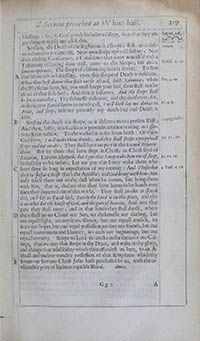 A Sermon preached at White-hall.
219
Serm.16.Serm.15.
A Sermon preached at White-hall.
219
Serm.16.Serm.15.
blessings: for, so God giveth his beloved sleep, so as that they en-
joy the next world and assist this. So then, the Death of the Righteous is a sleepe; first,Ps. 127.2. as it deli-
vers them to a present rest. Now men sleepe not well fasting; Nor Somnus.
does a fasting Conscience, a Conscience that is not nourish'd with a
Testimony of having done well, come to this Sleepe;Eccles. 5.11. but dulcis
somnus operanti, The sleepe of a labouring man is sweete. To him
that laboureth in his calling, even this sleepe of Death is welcome.
When thou lyest downe thou shalt not be afraid, saith Salomon;Pro. 3.24. when
thy Physician sayes, Sir, you must keepe your bed, thou shalt not be
afraid of that sick-bed; And then it followes, And thy sleepe shall
be sweet unto thee; Thy sicknesse welcome, and thy death too; for,
in those two David seems to involve all,Ps. 4.8. I will both lay me downe in
Peace, and sleep; imbrace patiently my death-bed and Death it
selfe. So then this death is a sleepe, as it delivers us to a present Rest;Expergesactie.
And then, lastly, it is so also as it promises a future waiting in a glo-
rious Resurrection. To the wicked it is far from both: Of them
God sayes, I will make them drunke,Jer. 51.39. and they shall sleepe a perpetuall
sleepe and not awake; They shall have no part in the Second Resurre-
ction. But for them rhat have slept in Christ, as Christ sayd of
Lazarus, Lazarus Sleepeth, but I goe that I may wake him out of sleep,
Jo. 11.11. he shall say to his father; Let me goe that I may wake them who
have slept so long in expectation of my coming:1 Thes. 4.14. And Those that
sleep in Jesus Christ (saith the Apostle) will God bring with him; not
only fetch them out of the dust when he comes, but bring them
with him, that is, declare that they have beene in his hands ever
since they departed out of this world. They shall awake as Jacob
did, and say as Jacob said, Surely the Lord is in this place, and this
is no other but the house of God, and the gate of heaven, And into that
gate they shall enter, and in that house they shall dwell, where
there shall be no Cloud nor Sun, no darkenesse nor dazling, but
one equall light, no noyse nor silence, but one equall musick, no
fears nor hopes, but one equal possession, no foes nor friends, but andan
equall communion and Identity, no ends nor beginnings; but one
equall eternity. Keepe us Lord so awake in the duties of our Cal-
lings, that we may thus sleepe in thy Peace, and wake in thy glory,
and change that infallibility which thou affordest us here, to an A-
ctuall and undeterminable possession of that Kingdome which thy
Sonne our Saviour Christ Jesus hath purchased for us, with the in-
estimable price of his incorruptible Blood. Amen.
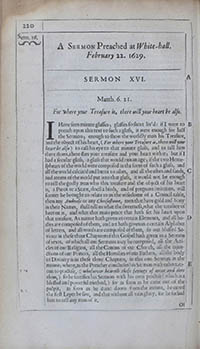 220
Serm.16.
A SERMON Preached at White-hall.
220
Serm.16.
A SERMON Preached at White-hall.
February 22. 1629.
SERMON XVI. Matth. 6.21.
For where your Treasure is, there will your heart be also. I Havehave seen minute glasses; glasses so short liv'd: if I were to
preach upon this text to such a glass, it were enough for half
the Sermon; enough to show the worldly man his Treasure,
and the object of his heart, (For where your Treasure is, there will your
heart be also) to call his eye to that minute glass, and to tell him
there flows, there flies your treasure and your heart with it; but if I
had a secular glass, a glass that would run an age; if the two Heme-
sphears of the world were composed in the form of such a glass, and
all the world calcin'd and burnt to ashes, and all the ashes and sands,
and atoms of the world put into that glass, it would not be enough
to tell the godly man who this treasure and the object of his heart
is, a Parot or a Stare, docil a birds, and of pregnant imitation, will
sooner be brought to relate to us the wisedome of a Council table,
then any Ambrose or any Chrisostome, men that have gold and hony
in their Names, shall tell us what the sweetness, what the treasure of
heaven is, and what that mans peace that hath set his heart upon
that treasure. As nature hath given us certain Elements, and all bo-
dies are composed of them, and art hath given us a certain Alphabet
of letters, and all words are composed of them, so our blessed Sa-
viour in these three Chapters of this Gospel hath given us a Sermon
of texts, of which all our Sermons may be composed, all the Arti-
cles of our Religion, all the Canons of our Church, all the injun-
ctions of our Princes, all the Homilies of our Fathers, all the body
of Divinity is in these three Chapters, in this one Sermon in the
mount; where, as the Preacher concludes his Sermon with exhortati-
ons to practise,7.24. (whosoever heareth these sayings of mine and does
them,) so he fortifies his Sermon with his own practise (which is a
blessed and powerful method,) for as soon as he came out of the
pulpit,8.1. as soon as he came down from the mount, he cured
the first Leper he saw, and that without all vain glory, for he forbad
him to tell any man of it.
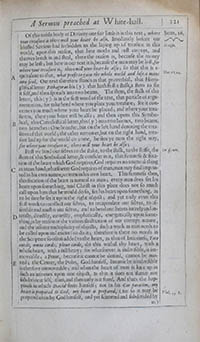 A Sermon preached at White-hall.
221
Serm.16.Serm.16.
A Sermon preached at White-hall.
221
Serm.16.Serm.16.
Of this noble body of Divinity one fair limb is in this text; where
your treasure is there will your heart be also. Imediately before our
blessed Saviour had forbidden us the laying up of treasure in this
world, upon this reason, that here moths and rust corrupt,Divisio. and
theeves break in and steal, there the reason is, because the money
may be lost; but here in our text it is, because the man may be lost, for
where your treasure is, there will your heart be also; so that this is e-
quivalent to that,Mar. 15.26.Mat. 16.26. what profit to gain the whole world and lose a mans
own soul. Our text therefore stands as that proverbial, that Hiero-
glifical letter Pithagoras his (y) that hath first a stalk, a stem to fix
it self, and then spreads into two beams. The stem, the stalk of this
letter, this (y) is in the first word of the text, that particle of argu-
mentation, for take heed where you place your treasure; for it con-
cernes you much where your heart be placed; and where your trea-
sure is, there your heart will be also; and then opens this Symbo-
lical, this Catechistical letter, this (y) into two hornes, two beams,
two branches: One broader, but on the left hand denoting the trea-
sures of this world; the other narrower, but on the right hand, trea-
sure laid up for the world co come, be sure ye turn the right way,
for where your treasure is, there will your heart be also;. First we bind our selves to the stake, to the stalk, to the staffe, Cor fixum. the
stem of this Simbolical letter, & consider in it, that firmness & fixa-
tion of the heart which God requires; God requires no unatural thing
at mans hand; whatsoever God requires of man, man may find imprin-
ted in his own nature, written in his own heart. This firmness then,
this fixation of the heart is natural to man; every man does set his
heart upon something, and Christ in this place does not so much
call upon him that he would do so, set his heart upon something, as
to be sure he set it upon the right object; and yet truly even this
first work to recollect our selves, to recapitulate our selves, to as-
semble and muster our selves, and to bend our hearts intirely and in-
tensly, directly, earnestly, emphatically, energetically upon some-
thing, is by reason of the various fluctuation of our corrupt nature,
and the infinite multiplicity of objects, such a work as man needs to
be called upon and excited to do it; therefore is there no words in
the Scripture so often added to the heart, as that of Intireness, Toto
corde, omni corde, pleno corde, do this withal thy heart, with a
whole heart, with a full heart; for whatsoever is indivisible, is im-
moveable; a Point, because it cannot be denied, cannot be mo-
ved; the Center, the Poles, God himself, because he is indivisible
is therfore immoveable; and when the heart of man is knit up in
such an intirenes upon one object, as that it does not flatter nor
subdivide it self, then, and then only is it fixed. And thats the hap-
piness in which David fixes himself; not in his Cor paratim, my
heart is preparad O God, my heart is prepared,Psal. 57 7. (for so it may be
prepared even by God himself, and yet scattered and subdivided by
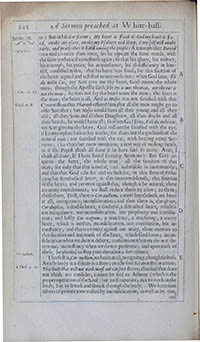 A Sermon preached at White-hall.
222
Serm.16.Serm.16.
A Sermon preached at White-hall.
222
Serm.16.Serm.16.
us) But in his Cor fixum; My heart is fixed O God my heart is fix-
ed, awake my glory, awake my Psaltery and Harp, I my self will awake
early,Psal 108 1. and praise thee O Lord among the people: A triumph that David
returned to more then once, for he repeats the same words, with
the same pathetical earnestness again; so that his glory, his victory,
his triumph, his peace, his acquiescence, his al-sufficiency in him-
self, consisted in this, that his heart was fixed; for this fixation of
the heart argued and testified an intireness in it; when God saies, fili
da mihi Cor, my Son give me thy heart, God means the whole
man;1 Cor. 12.17. though the Apostle saith, The eye is not the man, nor the ear is
not the man; he does not say the heart is not the man; the heart is
the man; the heart is all. And as Moses was not satisfied with that
Commission that Pharaoh offered him,Exod. 10 8. that all the men might go to
offer Sacrifice; but Moses would have all their young and all their
old, all their Sons and all their Daughters, all their flocks and all
their heards, he would have all; so when God saies, Fili da mihi cor,
my Son give me thy heart, God will not be satisfied with the eye,
if I contemplate him in his works, (for thats but the godliness of the
natural man) nor satisfied with the ear, with hearing many Ser-
mons; (for thats but a new invention, a new way of making beads,
as if the Papist think all done if he have said so many Aves, I
think all done, If I have heard so many Sermons) But God re-
quires the heart, the whole man, all the faculties of that
man; for only that that is entire, and indivisible is immoveable;
and that that God cals for and we seek for, in this stem of Pitha-
goras his Symbolical letter, is this immoveableness, this fixation
of the heart; and yet even against this, though it be natural, there
are many impediments; we shall reduce them to a few; to three;
these three, First, there is Cor nullum, a meer heartlesness, no heart
at all, incogitancy, inconsideration; and then there is, Cor & cor,
Cor duplex, a double heart, a doubtful, a distracted heart, which is
not incogitancy, nor inconsideration, but purplexity and irresolu-
tion; and lastly Cor vagum, a wandring, a wayfaring, a weary
heart, which is neither, inconsideration, nor irresolution, but in-
constancy; and this is a trinity against our unity, three enemies to
that fixation and intireness of the heart, which God loves; incon-
sideration when we do not debate, irresolution when we do not de-
termine, inconstancy when we do not persevere; and upon each of
these,Cor nullum. be pleased to stop your devotion a few minutsminutes. This first is, Cor nullum, no heart at all, incogitancy, thoughtlesness.
An idle body is a disease in a state; an idle soul is a monster in a man;
That body that will not work must not eat,2 Thes. 3.10. but starve; that soul that does
not think nor consider, cannot be said to Actuate (which is the
proper operation of the Soul) but to Evaporate; not to work in the
body, but to breath and smoak through the body. We have seen
estates of private men wasted by inconsideration, as well as by riot,
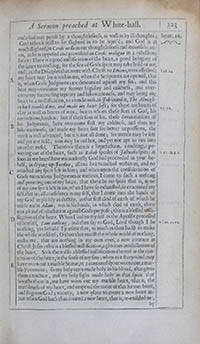 A Sermon preached at White-hall.
223
Serm.16.Serm.16.
A Sermon preached at White-hall.
223
Serm.16.Serm.16.
and a soul may perish by a thoughtlesness, as well as by ill thoughts;
God takes it as ill to be slighted as to be injur'd; and God is as
much slighted, in Corde nullo in our thoughtlesness and inconsiderati-
on, as he is opposed and provoked in Corde maligno in a rebellious
heart: There is a good nullification of the heart, a good bringing of
the heart to nothing, for the fire of Gods spirit may take hold of me,
and (as the Disciples that went with Christ to Emaus,Luk. 24. were affected)
my heart may burn within me, when the Scriptures are opened, that
is, when Gods Judgments are denounced against my sin; and this
heat may overcome my former frigidity and coldness, and over-
come my succeeding tepidity and lukewarmness, and may bring my
heart to a mollification, to a tenderness, as Job found it, The Almigh-
ty hath troubled me, and made my heart soft; for there are hearts of
clay as well as hearts of wax; hearts whom these fires of God,23.16. his
corrections, harden: but if these fires of his, these denuntiations of
his Judgments, have overcome first my coldness, and then my
lukewarmness, and made my heart soft for better impressions, the
work is well advanced, but it is not all done; for mettle may be soft
and yet not fusil; iron may be red hot, and yet not apt to run into
an other mold. Therefore there is a liquefaction, a melting, a po-
wering out of the heart, such as Rahab speaks of Joshuahs spies:2.11. & 5.1. as
soon as we heard how miraculously God had proceeded in your be-
half, in drying up JurdanJordan, all our hearts melted within us, and no
man had any spirit left in him; and when upon the consideration of
Gods miraculous Judgments or mercies, I come to such a melting
and pouering out of my heart, that there be no spirit that is, none
of my one spirit left in me, when I have so exhausted, so evacuated my
self, that is; all confidence in my self, that I come into the hands of
my God as pliably as ductily, as that first clod of earth of which he
made me in Adam, was in his hands, in which clod of earth, there
was a kind of reluctation against Gods purpose; this is a blessed nulli-
fication of the heart. When I said to my self as the Apostle professed
of himself, I am nothing, and then say to God,2 Cor. 12.11. Lord though I be
nothing, yet behold I present thee, as much as thou hadst to make
the whole world of; O thou that madst the whole world of nothing,
make me, that am nothing in my own eyes, a new creature in
Christ Jesus; this is a blessed nullification, a glorious annihillation of
the heart. So is there also a blessed nullification thereof in the con-
trition of the heart, in the sense of my sins; when as a sharp wind may
have worn out a marble Statue, or a continual spout worne out a mar-
ble Pavement; so my holy tears made holy in his blood, that gives
them a tincture, and my holy sighs made holy in that spirit that
breaths them in me, have worn out my marble heart, that is, the
marbleness of my heart, and emptied the room of that former heart,
and so given God a vacuity, a new place to create a new heart in:
but when God hath thus created a new heart, that is, re-enabled me,
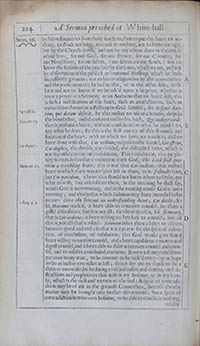 A Sermon preached at White-hall.
224
Serm.16.Serm.16.
A Sermon preached at White-hall.
224
Serm.16.Serm.16.
by his ordinance to some holy function, then to put this heart to no-
thing, to think nothing, to consider nothing, not to know our age,
but by the Church-book, and not by any action done in the course
of our lives, for our God, for our Prince, for our Country, for
our Neighbour, for our selves, (our selves are our Souls,) not to
know the seasons of the year but by the fruits; which we eat, and not
by observation of the publick and national blessings which he hath
successively given us; not to know religion but by the conveniency
and the preferments to he had in this, or in the other side; to sit
here and not to know if we be ask'd upon a surprize, whether it
were a prayer or a Sermon, or an Antheme that we heard last, this
is such a nullification of the heart, such an annihillation, such an
exinanition thereof as reflects upon God himself; for Respuit dato-
rem,TurtullianTertullian. qui datum deserit, he that makes no use of a benefit, despises
the benefactor,Pro. 10.13. and therefore a rod for his back, Qui indiget corde
that is, without a heart, without consideration what he should do,
nay what he does; for this is the first enemy of this firmness and
fixation of the heart, without which we have no treasure; and we
have done with that, Cor nullum, and pass to the second, Cor & cor,
Cor duplex, Cor duplex. the double, the divided, the distracted heart, which is
not inconsideration but irresolution. This irresolution, this perple-
xity is intended in that comination from God, The Lord shall give
them a trembling heart;Deut. 28.65. this is not that Cor nullum, that melted
heart in which there was no spirit left in them, as in Joshuahs time,
but Cor pavidum, a heart that should not know where to settle, nor
what to wish, but as it follows there, in the morning he shall say,
would God it were evening, and in the evening would God it were
morning; and this is that which Salomon may have intended in his
prayer:1 Reg. 3.9. Give thy servant an understanding heart; Cor docile; So
St. Hierome reads it, a heart able to conceive counsel; for thats a
good disposition, but it is not all; for the original is, leb. shemeany,
that is, Cor audiens, a heart willing to hearken to counsel; but all
that is, not all that is asked: Solomon askes there a heart to discern
between good and evil; so that it is a prayer for the spirit of discre-
tion, of conclusion, of resolution; that God would give him a
heart willing to receive counsel, and a heart capable to conceive and
digest counsel, and a heart able to discern between counsel and coun-
sel, and to resolve, concluded, etermineconclude, determine. It were a strange ambitious
patience in any man, to be content to be rack'd every day in hope
to be an inch or two taller at last; so is it for me to think to be a
dram or two wiser, by harkning to all jealousies and doubts, and di-
stractions and perplexities that arise in my bosome, or in my fami-
ly, which is the rack and torture of the soul: A spirit of contradi-
ction may be of use in the greatest Councellers, because thereby
matter may be brought into further debatement; but a spirit of
contradiction in mine own bosome, to be able to conclude nothing,
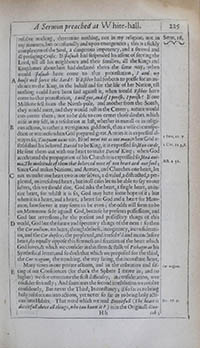 A Sermon preached at White-hall.
225
Serm.16.Serm.16.
A Sermon preached at White-hall.
225
Serm.16.Serm.16.
resolve nothing, determine nothing, not in my religion, not in
my manners, but occasionally and upon emergencies; this is a sickly
complexion of the Soul, a dangerous impotency, and a shrewd and
ill presaging Crisis. If Josuah had suspended his assent of serving the
Lord, till all his neighbours and their families, all the Kings and
Kingdomes about him had declared theirs the same way, when
would Josuah have come to that protestation, I and my
house will serve the Lord? If Esther had forborn to presse for an au-
dience to the King, in the behalf and for the life of her Nation, till
nothing could have been said against it, when would Esther have
come to that protestation, I will goe, and if I perish, I perish? If one
Milstone fell from the North-pole, and another from the South,
they would meet, and they would rest in the Center; nature would
con-center them; not to be able to con-center those doubts which
arise in my self, in a resolution at last, whether in morall or in religi-
ous actions, is rather a vertiginous giddiness, than a wise circumspe-
ction or wariness: when God prepared great Armies it is expressed al-
wayes so, Tanquam unus vir, Israel went out as one man;1 Sam. 11.7. when God e-
stablished his beloved David to be King, it is expressed so, Uno corde,
1 Cor. 12.3, 8. He sent them out with one heart to make David King; when God
accelerated the propagation of his Church it is expressed so, Una ani-
ma, The multitude of them that believed were of one heart and one soul;
Act. 4.32. Since God makes Nations, and Armies, and Churches one heart, let
not us make one heart two in our selves, a divided, a distracted, a per-
plexed, an irresolved heart; but in all cases let us be able to say to our
selves, this we should doe. God asks the heart, a single heart, an in-
tire heart, for whilst it is so, God may have some hope of it; but
when it is a heart, and a heart, a heart for God and a heart for Mam-
mon; howsoever it may seem to be even; the odds will seem to be
on Mammons side against God, because he presents possessions, and
God but reversions; he the present and possessory things of this
world, God but the future and speratory things of the next: so then
the Cor nullum, no heart, thoughtlesness, incogitancy, inconsiderati-
on, and the Cor duplex, the perplexed, and irresolv'd and inconclusive
heart, do equally oppose this firmness and fixation of the heart which
God loves, & which we consider in this stem & stalk of Pithagoras his
Symbolical letter; and so doth that which we proposed for the third,
the Cor vagum, the wandring the way faring, the inconstant heart. Many times in our private actions,Cor vagum. and in the cribration and sif-
ting of our Consciences (for thas's the Sphere I move in, and no
higher) we doe overcome the first difficulty, in consideration, wee
consider seriously; And somtimes the second irresolution we resolve
confidently, But never the Third, In constancy; if so far as to bring
holy resolutions into actions, yet never so far as to bring holy acti-
ons into Habits.Jer. 17.9. That word which we read Deceitfull (The heart is
deceitfull above all things, who can know it?) is in the Originall Gna-
Hh
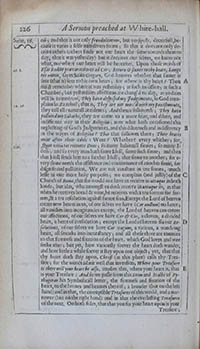 A Sermon preached at White-hall.
226
Serm.16.Serm.16.
cob; and that is not only fraudulentum, but versipelle, deceitfull, be-
A Sermon preached at White-hall.
226
Serm.16.Serm.16.
cob; and that is not only fraudulentum, but versipelle, deceitfull, be-cause it varies it selfe into divers forms; so that it does not only de-
ceive others (others finde not our heart the same towards them to
day, that it was yesterday) but it deceives our selves, we know not
what, nor where our heart will be hereafter. Upon those words of
Esai Redite praevaricatores ad Cor;46.8. Return O sinner to thy heart, Longe
eos mittit, sayes Saint Gregory, God knowes whether that sinner is
sent (that is) sent to his own heart; for where is thy heart? Thou
maist remember where it was yesterday; at such an office; at such a
Chamber; but yesterdaies affections are chang'd to day, as to daies
will be to morrow, They have despised my Judgements, so God com-
plains in Ezechiel;20.16. that is, They are not mov'd with my punishments,
they call all: naturall accidents; And then it followeth; They have
polluted my Sabaths, they are come to a more faint, and dilute, and
indifferent way in their Religion; now what hath occasioned this
neglecting of God's Judgements, and this diluteness and indifferency
in the wayes of Religion? That that followes there; Their hearts
went after their Idols: Went? Whether? every whither; for,
Quot vitia tot recentes Deos;Hier. so many habituall sinnes; so many I-
dols; and so every man hath some Idoll, some such sinne; and then
that Idoll sends him to a further Idoll; that sinne to another; for e-
very sinne needs the assistance and countenance of another sinne, for
disguise and palliation. We are not constant in our sinnes, much
lesse in our more holy purposes; we complain (and justly) of the
Church of Rome, that she would not have us receive in utraque in both
kinds; but alas, who amongst us doth receive in utraque so, as that
when he receives bread & wine, he receives with a tru sorrow for for-
mer, & a tru resolution against future sins; Except the Lord of heaven
create new hearts in us, of our selves we have (Cor nullum) no heart;
all vanishes into incogitancies except, the Lord of heaven can center
our affections, of our selves we have Cor & Cor, a cloven, a divided
heart, a heart of irresolution; except the Lord of heaven fix our Re-
solutions, of our selves we have Cor vagum, a various, a wandring
heart, all smoaks into inconstancy; and all these three are enemies
to that firmness and fixation of the heart, which God loves and wee
seeke after; but yet, how variously soever the heart doth wander,
and how little a while soever it stay upon one object; yet, that that
thy heart doth stay upon, Christ (in this place) calls thy Trea-
sure; for the words admit well that inversion, Where your Treasure
is there will your heart be also, implies this, where your heart is, that
is your Treasure: And so we passe from this Stem and Stalke of Py-
thagoras his Symbolicall letter, the firmness and fixation of the
heart, to the hornes and beames thereof; a broader (but on the left
hand) and in that, the corruptible Treasures of this world, and a nar-
rower (but on the right hand) and in that the everlasting Treasures
of the next. On both sides, that that you fix your heart upon is your
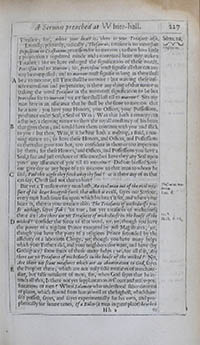 A Sermon preached at White-hall.
227
Serm.16.Serm.16.
A Sermon preached at White-hall.
227
Serm.16.Serm.16.
Treasure; for, where your heart is, there is your Treasure also. Literally, primarily, radically; Thesaurus, treasure is no more,Thesaurus. but
Depositum in Crastinum, provision for to morrow; to shewshow how little
a proportion a regulated minde and a contented heart may make a
Treasure: but we have enlarged the signification of these words,
Provision and to Morrow; for, provision must signifie all that can any
way be compassed; and to morrow must signifie as long as there shall
be a to morrow, till Time shall be no more: but waiving these infi-
nite extensions and perpetuities, is there any thing of that nature as
(taking the word Treasure in the narrowest signification to be but
provision for to morrow) we are sure shall last till to morrow? Sits any
man here in an assurance that he shall be the same to morrow that
he is now: you have your Honors, your Offices, your Possessions,
perchance under Seal, a Seal of Wax; Wax that hath a tenacity, an
adhering, a cleaving nature to shew the royall constancy of his heart
that gives them; and would have them continue with you and stick
to you: but then, Wax, if it be heat hath a melting, a fluid, a run-
ning nature to; so have these Honors, and Offices, and Possessions
to them that grow too hot, too confident in them or too imperious
by them; for these Honors, and Offices, and Possessions you have a
Seal, a fair and just evidence of assurance; but have they any Seal upon
yonyou? any assurance of you till to morrow? Did our blessed Savi-
our give day or any hope of a to morrow to that man to whom he
said, Fool this night they fetch away thy soul? or is there any of us that
can say, Christ said not that to him? But yet a Treasure every man hath,Thesaurus ma-
lorum.
Luc. 6. An evil man out of the evil trea-
sure of his heart bringeth forth that which is evill, sayes our Saviour,
every man hath some sin upon which his heart is set, and where your
heart is, there is your treasure also: The Treasures of wickednesse pro-
fit nothing, sayes Job: 'tis true, but yet treasures of wickedness
there are:10.2.
Mich. 6.10. Are there not yet Treasures of wickedness in the house of the
wicked? consider the force of that word, yet, yet, though you have
the power of a vigilant Prince executed by just Magistrates, yet,
though you have the piety of a religious Prince seconded by the
assiduity of a laborious Clergy, yet, though you have many helps
which your Fathers did, and your neighbors doe want, and have (by
Gods grace) some fruits of those many helps; yet, for all this, Are
there not yet Treasures of wickedness in the house of the wicked? No,
Are there not scant measures which are an abomination to God, sayes
the Prophet there; which are not only false measures of merchant-
dize, but false measures of men; for, when God sayes that he in-
tends all this, Is there not yet supplantation in Court and misre-pre-
sentations of men? When Salomon who understood subordination
of places, which flowed from him as well as the highest, which him-
self possest, sayes, and sayes experimentally for his own, and pro-
phetically for future times, If a Ruler (a man in great place) hearken
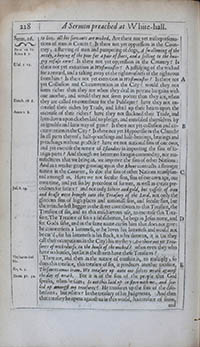 A Sermon preached at White-hall.
228
Serm.16.Serm.16.
A Sermon preached at White-hall.
228
Serm.16.Serm.16.
to lies, all his servants are wicked, Are there not yet misrepresenta-
tions of men in Courts? Is there not yet oppression in the Coun-
trey; a starving of men and pampering of dogs, A swallowing of theProv. 29.12.
Amos 8.5.needy, a buying of the poor for a pair of shoes, and a selling to the hun-
gry refuse corn? Esai. 5.23. Is there not yet oppression in the Country? Is
there not yet extortion in Westminster? A justifying of the wicked
for a reward, and a taking away of the righteousness of the righteous
from him? Is there not yet extortion in Westminster? Is there not
yet Collusion and Circumvention in the City? would they not
seem richer than they are when they deal in private bargains with
one another, and would they not seem poorer than they are, when
they are called to contribute for the Publique? Exech. 28.5.Ezech. 28.5. have they not en-
creased their riches by Trade, and lifted up their hearts upon the
encrease of their riches? Amos 2 8. have they not slackned their Trade, and
lyen down upon clothes laid to pledge, and ennobled themselves by
an ignoble and lazie way of gain? Is there not yet collusion and cir-
cumvention in the City? Is there not yet Hypocrisie in the Church?
In all parts thereof; half-preachings and half-hearings, hearings and
preachings without practise? have we not national sins of our own,
and yet exercise the nature of Islanders in importing the sins of fo-
raign parts? And though we better no foragin commodity, nor ma-
nufactures that we bring in, we improve the sins of other Nations:
And as a weaker grape growing upon the Rhene contracts a stronger
nature in the Canaries, so doe the sins of other Nations transplan-
ted amongst us. Have we not secular sins, sins of our own age, our
own time, and yet sin by precedent of former, as well as create pre-
cedents for future? Jos. 6.19. and not only Silver and gold, but vessels of iron
and brasse were brought into the Treasury of the Lord, not only the
glorious sins of high places and nationall sins, and secular sins, but
the wretchedest begger in the street contributes to this Treasure, the
Treasure of sin, and to this mischievous use, to encrease this Trea-
sure. The Treasure of sin is a subsidieman, he begs in Jesus name, and
for Gods sake, and in the same name curses him that does not give:
he counterfeits a lameness, or he loves his lameness and would not
be cur'd; for his lameness is his stock, it is his demean, it is (as they
call their occupations in the City) his mystery: Are there not yet Trea-
sures of wickedness in the house of the wicked? when even they who
have no houses, but lie in the streets have these Treasures? Thesaurus Dei
hic.There are, and then as the nature of treasure is, to multiply; so
does this treasure, this treasure of sin, it produces another treasure,
Thesaurizamus iram,Ro. 2.5. We treasure up unto our selves wrath against
the day of wrath.Deut. 32.34. For it is of the sins of the people that God
speaks, when he saies; Is not this laid up in store with me, and sea-
led up amongst my treasures? He treasures up the sins of the diso-
bedient; but where? In the treasury of his Judgments. And then
that treasury he opens against us in this world, his treasure of snow,
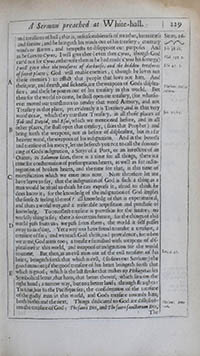 A Sermon preached at White-hall.
229
Serm.16.Serm.16.
A Sermon preached at White-hall.
229
Serm.16.Serm.16.
and treasures of hail; that is, unseasonableness of weather, barrenness
and famine; and he bringeth his winds out of his treasury; contrary
winds or storms, and tempests to disappoint our purposes:Job 38.22. And
as he saies to Cyrus, I will give thee (even thee Cyrus, though God
car'd not for Cyrus,Psal. 135.7. otherwise then as he had made Cyrus his scourge)
I will give thee the treasures of darkness,Esa. 45.3. and the hidden treasures
of secret places; God will enable enemies, (though he loves not
those enemies) to afflict that people that love not him. And
these, war, and dearth, and sickness, are the weapons of Gods displea-
sure; and these he poures out of his treasury in this world.Thesaur. Dei in
futuro. But
then for the world to come, he shall open our treasury, (for whatso-
ever moved our translators to render that word Armory, and not
Treasury in that place, yet evidently it is Treasury, and in that very
word Otzar, which they translate Treasury,Jer. 50.25. in all those places of
Job and David, and Esai, which we mentioned before, and in all
other places,) he shall open that treasury, (saies that Prophet) and
bring forth the weapons, not as before of displeasure, but in a far
heavier word, the weapons of his indignation. And in the bowels
and treasure of his mercy, let me beseech you not to call the denoun-
cing of Gods indignation, a Satyr of a Poet, or an invective of an
Orator; as Salomon saies, there is a time for all things, there is a
time for consternation of presumptuous hearts, as well as for redin-
tegration of broken hearts, and the time for that, is this time of
mortification which we enter into now. Now therefore let me
have leave to say, that the indignation of God is such a thing as a
man would be afraid to think he can express it, afraid to think he
does know it; for the knowledg of the indignation of God imples
the sense & feeling thereof? all knowledg of that is experimental,
and thats a woful way, and a miserable acquisition and purchase of
knowledg. To recollect treasure is provision for the future; no
worldly thing is so; there is no certain future, for the things of this
world pass from us; we pass from them; the world it self passes
away to nothing. Yet a way wee have found to make a treasure, a
treasure of sin; and we teach God thrift, and providence; for when
we arme, God arms too; a treasure furnished with weapons of dis-
pleasure for this world, and weapons of indignation for the world
to come. But then,Luc. 6.45. as an evil man out of the evil treasure of his
heart, bringeth forth that which is evil, (so saies our Saviour) the
good man out of the good treasure of his heart bringeth forth that
which is good; which is the last stroke that makes up Pithagoras his
Symbolical letter, that horn, that beam thereof, which lies on the
right hand; a narrow way, but to a better land; through straights:
Tis true, but to the Pacifique sea; the consideration of the treasure
of the godly man in this world, and Gods treasure towards him,
both in this and the next. Things dedicated to God are called of-
ten the treasure of God; Thesauri Dei, and Thesauri sanctorum Dei,Thesaur. bono-
rum.
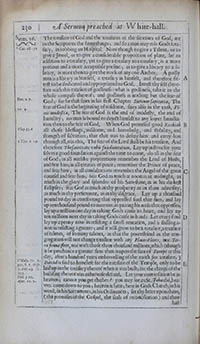 A Sermon preached at White-hall.
230
Serm.16.Serm.16.
A Sermon preached at White-hall.
230
Serm.16.Serm.16.
The treasure of God and the treasures of the servants of God, are
in the Scriptures the same things; and so a man may rob Gods trea-
sury, in robbing an Hospital.1 Cor. 28.12. Now though to give a Talent, or to
give a Jewel, or to give a considerable proportion of plate, be an
addition to a treasury, yet to give a treasury to a treasury, is a more
pretious and a more acceptable present; as to give a library to a li-
brary, is more then to give the work of any one Author. A godly
man is a library in himself, a treasury in himself, and therefore fit-
test to be dedicated and appropriated to God. Invest thy self there-
fore with this treasure of godliness: what is godliness, take it in the
whole compass thereof; and godliness is nothing but the fear of
God;Pro. 1.7. for he that saies in his first Chapter Initium sapientiæ, The
fear of God is the beginning of wisdome,22.4. saies also in the 22th. Fi-
nis modestiæ, The fear of God is the end of modesty, the end of
humility; no man is bound to deject himself to any lower humilia-
tion then to the fear of God. When God promised good Ezekiah
all those blessings,Esay. 33.6. wisdome, and knowledg, and stability, and
strength of salvation; that that was to defray him and carry him
through all,1 Tim. 6.19. was this, The fear of the Lord shall be his treasure. And
therefore Thesaurizate vobis fundamentum, Lay up in store for your
selves a good foundation against the time to come, do all in the fear
of God; in all warlike preparations remember the Lord of Hosts,
and fear him; in all treaties of peace; remember the Prince of peace,
and fear him; in all consultations remember the Angel of the great
counsel and fear him; fear God as much at noon as at midnight, as
much in the glory and splendor of his Sun-shine, as in his darkest
Eclipses; fear God as much in thy prosperity as in thine adversity,
as much in thy preferment, as in thy disgrace. Lay up a thousand
pound to day in comforting that oppressed soul that sues, and lay
up ten thousand pound to morrow, in pairing his nails that oppresses;
lay up a million one day in taking Gods cause to heart, and lay up
ten millions next day in taking Gods cause in hand: Let every soul
lay up a penny now in resisting a small tentation, and a shilling a-
non in resisting a greater; and it will grow to be a treasure, a treasure
of talents, of so many talents, as that the poorest soul in the con-
gregation will not change treasure with any Place-Fleets, nor Ter-
ra firma fleet, nor with those three thousand millions, which (though
it be perchance a greater sum then is upon the face of Europe at this
day, after a hundred years embowelling of the earth for treasure,)
David is said to have left for the treasure of the Temple,Villalp. To. 2.
par. li. 5. Disp.
3. cap. 43. so.
503.
Phil. 3.20.
Apoc. 21.2. only to be
laid up in the treasury thereof when it was built; for the charge of the
building thereof was otherwise defraid. Let your conversation be in
heaven; cannot you get thither? you may see, as St. John did, hea-
ven come down to you; heaven is here; here in Gods Church, in his
word, in his Sacraments, in his Ordinances; set thy heart upon them,
(the promises of the Gospel, the seals of reconciliation) and thou
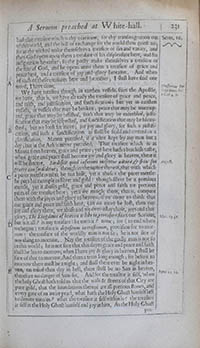 A Sermon preached at White-hall.
231
Serm.16.Serm.16.
A Sermon preached at White-hall.
231
Serm.16.Serm.16.
hast that treasure which is thy viaticum, for thy transmigration out
of this world, and the bill of exchange for the world thou goest to;
for as the wicked make themselves a treasure of sin and vanity, and
then God opens upon them a treasure of his displeasure here, and his
indignation hereafter; so the godly make themselves a treasure of
the fear of God, and he opens unto them a treasure of grace and
peace here, and a treasure of joy and glory hereafter. And when
of each of these treasures here and hereafter; I shall have said one
word, I have done. We have treasure though in earthen vessels, saies the Apostle, Thesaurus Dei
Erga bonos hic.
we have, that is, we have already the treasure of grace and peace,2 Cor 4.7.
and faith, and justification, and sanctification; but yet in earthen
vessels, in vessels that may be broken; peace that may be interrup-
ted, grace that may be resisted, faith that may be enfeebled, justi-
fication that may be suspected, and sanctification that may be blemi-
shed; but we look for more; for joy and glory, for such a justifi-
cation, and such a sanctification as shall be seald and riveted in a
glorification. Manna putrified, if it were kept by any man but a
day; but in the Ark it never putrified. That treasure which is as
Manna from heaven, grace and peace; yet here hath a brackish taste,
when grace and peace shall become joy and glory in heaven, there it
will be sincere. Sordescit quod inferiori miscetur nature,August. & si in suo
genere non sordidetur; though in the nature thereof, that with which
a purer mettle is mixt be not base, yet it abases the purer mettle:
he puts his example in silver and gold: though silver be a pretious
mettle, yet it abases gold, grace and peace and faith are pretious
parts of our treasure here; yet if we mingle them, that is, compare
them with the joyes and glory of heaven; if we come to think that
our grace and peace and faith here, can no more be lost, then our
joy and glory there, we abase and we over-allay those, joys and that
glory. The Kingdome of heaven is like to a treasure, saies our Saviour,
Mar. 13.44. but is it all? is any treasure like unto it? none; for (to end where
we begun) treasure is depositum in crastinum, provision for to mor-
row: the treasure of the worldly man is not so; he is not sure of
any thing to morrow. Nay the treasure of the godly man is not so
in this world; he is not sure that this dayes grace and peace and faith
shall be his to morrow; when I have joy & glory in heaven, I shall be
sure of that to morrow. And thats a term long enough; for before to
morrow there must be a night; and shall there ever be night in hea-
ven, no more then day in hell, there shall be no Sun in heaven,
Apoc 21.23. therefore no danger of Sun-set. And for the treasure it self, when
the holy Ghost hath told us that the wals & streets of that City are
pure gold, that the foundations thereof are all pretious stones, and
every gate of an intire pearl, what hath the Holy Ghost himself left
to denote unto us? what the treasure it self within is? the treasure
it self is the Holy Ghost himself and joy in him, As the Holy Ghost
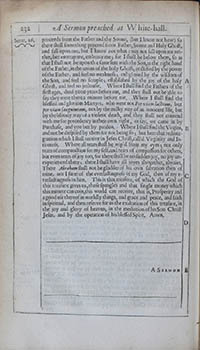 A Sermon preached at White-hall.
232
Serm.16.Serm.16.
A Sermon preached at White-hall.
232
Serm.16.Serm.16.
proceeds from the Father and the Sonne, (but I know not how) so
there shall something proceed from Father, Sonne and Holy Ghost,
and fall upon me, but I know not what: nay not fall upon me nei-
ther, but enwrap me, embrace me; for I shall be below them, so as
that I shall not be upon the same seat with the Son, at the right hand
of the Father, in the union of the holy Ghost; rectified by the power
of the Father, and feel no weakness; enlightned by the wisdom of
the Son, and feel no scruple; established by the joy of the holy
Ghost, and feel no jealousie. Where I shall find the Fathers of the
first ages, dead 5000 years before me, and they shall not be able to
say they were there a minute before me. Where I shall find the
blessed and glorious Martyrs, who went not Per viam lacteam, but
per viam sanguineam, not by the milky way of an innocent life, but by the bloody way of a violent death, and they shall not contend
with me for precedency in their own right, or say, we came in by
Purchase, and you but by pardon. Where I shall find the Virgins,
and not be despised by them for not being so; but hear that redinte-
gration which I shall receive in Jesus Christ, call'd Virginity and In-
tireness. Where all tears shall be wip'd from my eyes; not only
tears of compunction for my self, and tears of compassion for others,
but even tears of joy too, for there shall be no sudden joy, no joy un-
experienced there; there I shall have all joyes altogether, alwaies.
There Abraham shall not be gladder of his own salvation then of
mine, nor I surer of the everlastingness of my God, then of my e-
verlastingness in him. This is that treasure, of which the God of
this treasure gives us, those spangles and that single money which
this minute can coin, this world can receive, that is, Prosperity and
a good use thereof in worldly things, and grace and peace, and faith
in spiritual, and then reserve for us the exaltation of this treasure, in
the joy and glory of heaven, in the mediation of his Son Christ
Jesus, and by the operation of his blessed Spirit.Amen.
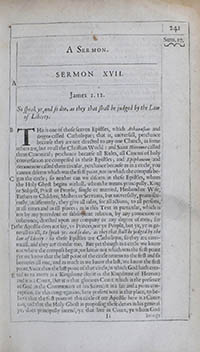 241
Serm.17.
A Sermon.
241
Serm.17.
A Sermon. SERMON XVII. James 2.12.
So speak ye, and so doe, as they that shall be judged by the Law
of Liberty. THisThis is one of those seaven Epistles, which Athanasius and
Origen called Catholique; that is, universall, perchance
because they are not directed to any one Church, as some
others are, but to all the Christian World: and Saint Hierome called
them Canonical; perchance because all Rules, all Canons of holy conversation are comprised in these Epistles; and Epiphanius and
Oecumenius called them circular, perchance because as in a circle, you
cannot discern which was the first point, nor in which the compass be-
gan the circle; so neither can we discern in these Epistles, whom
the Holy Ghost begins withall, whom he means principally, King
or Subject, Priest or People, single or married, Husband or Wife,
Fathers or Children, Masters or Servants, but universally, promiscu-
ously, indifferently, they give all rules, for all actions, to all persons,
at all times and in all places; as in this Text in particular, which is
not by any precedent or subsequent relation, by any connexion or
coherence, directed upon any company or any degree of men; for
the Apostle does not say, ye Princes, nor ye People, but ye, ye in ge-
nerall to all, So speak ye, and so doe, as they that shall be judged by the
law of liberty: so these Epistles are Catholique, so they are cano-
nicall, and they are circular too. But yet though in a circle we know
not where the compass began, we know not which was the first point
yet we know that the last point of the circle returns to the first and so
becomes all one, and as much as we know the last, we know the first
point. Since then the last point of that circle, in which God hath crea-
ted us to move is a Kingdome (for it is the Kingdome of Heaven)
and it is a Court, (for it is that glorious Court which is the presence
of God in the Communion of his Saints) it is a fair and a pious con-
ception; for this congregation, here present now in this place, to be-
lieve that the first point of this circle of our Apostle here is a Court
too, and that the Holy Ghost in proposing these duties in his general
ye, does principally intend, ye that live in Court, ye whom God Ii
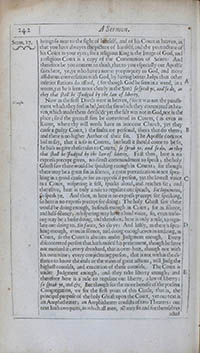 A Sermon.
242
Serm.17.
A Sermon.
242
Serm.17.
brings so near to the sight of himself, and of his Court in heaven, as
that you have alwayes the picture of himself, and the portracture of
his Court in your eyes; for a religious King is the Image of God, and
a religious Court is a copy of the Communion of Saints: And
therefore be you content to think, that to you especially our Apostle
saies here, ye, ye who have a neerer propinquity to God, and more
assiduous conversation with God, by having better helps then other
inferior stations do afford, (for though God be seen in a weed, in a
worm, yet he is seen more clearly in the Sun) so speak ye, and so do, as
they that shall be Judged by the law of liberty. Divisio.Now as the first Divels were in heaven, (for it was not the punish-
ment which they feel in hel, but the sin which they committed in hea-
ven, which made them devils) & yet the falt was not in God, nor in the
place; so if the greatest sins be committed in Courts, (as even in
Rome, where thy will needs have an innocent Church, yet they
cause a guilty Court,) the faults are personal, theirs that do them;
and there is no higher Author of their sin. The Apostle does not
bid us say; that it is so in Courts, but least it should come to be so,
he bids us give these rules to Courts, so speak ye, and so do, as they
that shall be Judged by the law of liberty. First then, here is no
express precept given, no direct commandment to speak; the holy
Ghost saw there would be speaking enough in Courts; for though
there may be a great sin in silence, a great prevarication in not spea-
king in a good cause, or for an oppress'd person, yet the lowest voice
in a Court, wispering it self, speaks aloud, and reaches far; and
therefore, hear is only a rule to regulate our speach, Sic loquimini,
so speak ye. And then, as here is no express precept for speaking,
so here is no express precept for doing: The holy Ghost saw there
would be doing enough, business enough in Court; for as silence,
and half-silence; whispering may have a loud voice, so, even undo-
ing may be a busie doing, and therefore, here is only a rule, to regu-
late our doing to, Sic facite, So do ye: And lastly, as there is spea-
king enough, even in silence, and doing enough, even in undoing, in
Court, so the Court is alwaies under Judgment enough. Every
discontented person that hath miss'd his preferment, though he have
not merited it; every drunkard, that is over-heat, though not with
his own wine; every conjecturing person, that is not within the di-
stance to know the ends or the waies of great actions, will Judg the
highest counsels, and execution of those counsels. The Court is
under Judgment enough, and they take liberty enough; and
therefore here is a rule to regulate our liberty, a law of liberty:
so speak ye, and &c. But though for the more benefit of the present
Congregation, we fix the first point of this Circle, that is, the
principal purpose of the holy Ghost upon the Court, yet our text is
an Amphitheater; an Amphitheater consists of two Theaters: our
text hath two parts, in which all men, all may sit and see themselves
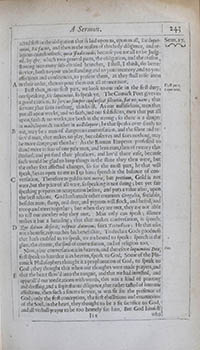 A Sermon.
243
Serm.17.
A Sermon.
243
Serm.17.
acted first in the obligation that is laid upon us, upon us all, Sic loqui-
mini, Sic facite, and then in the reason of this holy diligence, and re-
ligious cautelousness, quia Judicandi; because you are all to be Judg-
ed, by &c. which two general parts, the obligation, and the reason,
flowing into many sub-divided branches, I shall, I think, do better
service, both to your understanding and to your memory, and to your
affections and consciences, to present them, as they shall arise anon
in their order, then to pour them out all at once now. First then, in our first part, we look to our rule in the first duty,
First part.
Loquimini. our speaking, Sic loquimini, so speak ye. The Comick Poet gives us
a good caution, Si servus semper consuescat silentio, fiat nequam; that
servant that saies nothing, thinks ill. As our nullifidians, men that
put all upon works, and no faith, and our solifidians, men that put all upon, faith & no works, are both in the wrong; so there is a danger
in multiloquio, & another in nulliloquio; he that speaks over-freely to
me, may be a man of dangerous conversation, and the silent and re-
serv'd man, that makes no play, but observes and saies nothing, may
be more dangerous then he: As the Roman Emperor professed to
stand more in fear of one pale man, and lean man, then of twenty that
studied, and pursued their pleasures, and lov'd there ease, because
such would be glad to keep things in the state they then were, but
the other sort affected changes, so for the most part, he that will
speak, lies as open to me as I to him; speech is the balance of con-
versation. Therefore as gold is not merx, but pretium, Gold is not
ware, but the price of all ware, so speaking is not doing; but yet fair
speaking prepares an acceptation before, and puts a value after, upon
the best actions. God hath made other creatutes Gregalia, sociable,
besides man; sheep, and deer, and pigeons will flock, and heard, and
troop and meet together; but when they are met, they are not able
to tell one another why they met. Man only can speak; silence
makes it but a hearding; that that makes conversation, is speech.
Qui datum deserit, respuit datorem, saies Tertullian; He that uses
not a benefit, reproaches his benefactor. To declare Gods goodness
that hath enabled us to speak, we are bound to speak: speech is the
glue, the ciment, the soul of conversation, and of religion too. Now, your conversation is in heaven; and therefore loquimini Deo,Deo.
first speak to him that is in heaven, speak to God. Some of the Pla-
tonick Philosophers thought it a prophanation of God, to speak to
God; they thought that when our thoughts were made prayers, and
that the heart slow'd into the tongue, and that we had invested, and
apparall'd our meditations with words, this was a kind of painting
and dressing, and a superfluous diligence, that rather tasted of humane
affections, then such a sincere service, as was fit for the presence of
God; only the first conception, the first ebullitions and emanations
of the Soul, in the heart, they thought to be a fit sacrifice to God,
and all verball prayer to be too homely for him. But God himself
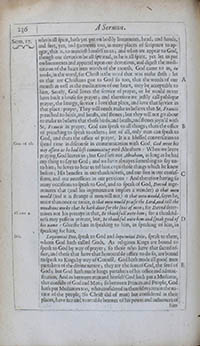 A Sermon.
236
Serm.17.
A Sermon.
236
Serm.17.
who is all spirit, hath yet put on bodily lineaments, head, and hands,
and feet, yea, and garments too, in many places of scripture to ap-
pear, that is, to manifest himself to us; and when we appear to God,
though our devotion be all spiritual, as he is all spirit, yet let us put
on lineaments and apparrel upon our devotions, and digest the medi-
tations of the heart into words of the mouth. God came to us, in
verbo, in the word, for Christ is the word that was make flesh: let
us that are Christians goe to God so too, that the words of our
mouth as well as the meditations of our heart, may be acceptable to
him. Surely, God loves the service of prayer, or he would never
have built a house for prayer; and therefore we justly call publique
prayer, the liturgy, service: love that place, and love that service in
that place: prayer, They will needs make us believe that St. Francis
preached to birds, and beasts, and stones; but they will not go about
to make us believe that those birds, and beasts, and stones joyn'd with
St. Francis in prayer. God can speak to all things; thats the office
of preaching to speak to others; but of all, only man can speak to
God, and thats the office of prayer. It is a blessed conversation to
spend time in discourse in communication with God.Gen. 18. ult. God went his
way assoon as he had left communing with Abraham: When we leave
praying, God leaves us; but God left not Abraham, as long as he had
any thing to say to God; and we have alwayes something to say un-
to him; he loves to hear us tel him even those things which he knew
before; His benefits in our thankfulness, and our sins in our confes-
sions, and our necessities in our petitions: And therefore having so
many occasions to speak to God, and to speak of God, David inge-
minates that (and his ingemination implies a wonder) O that men
would (and it is strange if men will not) O that men would, sayes he,
more than once or twice, O that men would praise the Lord, and tell the
wondrous works that he hath done for the sons of men; for David deter-
mines not his precept in that,Ps. 100 4. Be thankfull unto him; for a thankful-
ness may passe in private, but, Be thankful unto him and speak good of
his name: Glorifie him in speaking to him, in speaking of him, in
speaking for him. Diis.Loquimini Deo, speak to God and loquimini Diis, speak to them,
whom God hath called Gods. As religious Kings are bound to
speak to God by way of prayer; so those who have that sacred of-
fice, and those that have that honourable office to do so, are bound
to speak to Kings by way of Counsil. God hath made all good men
partakers of the divine nature; they are the sons of God, the seed of
God; but God hath made kings partakers of his office and admini-
stration. And as between man and himself God hath put a Mediator,
that consists of God and Man; so between Princes and People, God
hath put Mediators too, who considered in themselves retain the na-
ture of the people, (so Christ did of man) but considered in their
places, have fair and venerable beames of his power and influences of
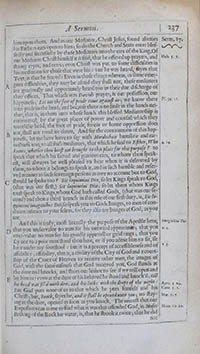 A Sermon.
237
Serm.17.
A Sermon.
237
Serm.17.
him upon them. And as our Mediator, Christ Jesus, found alwaies
his Fathers ears open to him; so do the Church and State enter bles-
sedly and succesfully by these Mediators into the ears of the King. Of
our Mediator Christ himself it is said, that he offered up prayers,Heb. 5.7. and
strong cryes, and tears; even Christ was put to some difficulties in
his mediation for those that were his: but he was heard, sayes that
Text, in that he feared: Even in those things wherein, in some emer-
gent difficulties, they may be afraid they shall not, these mediators
are graciously and opportunely heard too in their due discharge of
their offices. That which was Davids prayer, is our possession, our
happiness; Let not the foot of pride come against us;Ps. 36.11. we know there
is no pride in the head; and because there is no fault in the hands nei-
ther, that is, in them into whose hands this blessed Mediatorship is
committed, by the great places of power and counsail which they
worthilie hold, the foot of pride, forein or home oppression does
not, shall not tread us down. And for the continuation of this hap-
piness, let me have leave to say with Mordechais humilitie and ear-
nestness too, to all such mediators, that which he said to Esther,4.14. Who
knows, whether thou beest not brought to this place for this purpose? to
speak that which his sacred and gratious ears, to whom thou speak-
est, will alwayes be well pleased to hear when it is delivered by
them, to whom it belongs to speak it, and in such humble and reser-
ved manner as such soveraign persons as owe no account but to God,
should be spoke too? Sic loquimini Deo, so let Kings speak to God,
(that was our first,) Sic loquimini Diis, so let them whom Kings
trust speak to Kings, whom God hath called Gods, (that was our se-
cond) and then a third branch in this rule of our first duty, is, Sic lo-
quimini imaginibus Dei, so speak you to Gods Images, to men of con-
dition inferior to your selves, for they also are Images of God, as you
are. And this is truly, most literally the purpose of the Apostle here,Imaginibus Dei
that you undervalue no man for his outward appearance;v. 2. that you
over-value no man for his goodly apparrell or gold rings; that you
say not to a poor man stand thou here, or if you admit him to sit, sit
here under my footstool:v. 3. but it is a precept of accessibleness and of
affability; affability, that is, a civility of the City of God and a court-
ship of the Court of Heaven to receive other men, the images of
God, with the same easiness that God received you. God stands at
the dore and knocks, and staies our leisure to see if we will open and
let him in: even at the dore of his beloved he stood and knock'd, till
his head was fil'd mith dew, and his locks with the drops of the night:
Apoc. 3.20.
Cant. 5.2. But God puts none of us to that which he puts himself and his
Christ; but, knock, sayes he, and it shall be opened unto you;Mat. 7.7. no stay-
ing at the dore, opened as soon as you knock. The neerest that our
Expositors can come to find what it was that offended God,Num. 20.10. in Moses
striking of the Rock for water, is, that he strook it twice; that he did
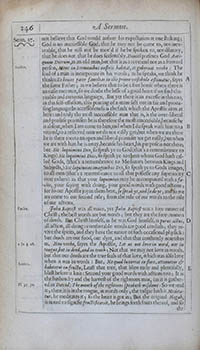 A Sermon.
246
Serm.17.
A Sermon.
246
Serm.17.
not believe that God would answer his expectation at one striking;
God is no inaccessible God, that he may not be come to, nor inex-
orable, that he will not be mov'd if he be spoken to, nor dilatory,
that he does not that he does seasonably. Daniel presents God Anti-
quum Dierum, as an old man; but that is as a reverend not as a froward
person,Ambro. Mens in Sermonibus nostris habitat, et gubernat verba: The
soul of a man is incorporate in his words; as he speaks, we think he
thinks: Et bonus pater familias in illo primo vestibulo æstimatur, sayes
the same Father; as we believe that to be a free house where there is
an easie entrance, so we doubt the lesse of a good heart if we find cha-
ritable and curteous language. But yet there is an excesse in this too,
in this self-effusion, this pouring of a mans self out in fair and promi-
sing language: In accessibleness is the fault which the Apostle aims at
here: and truly the most inaccessible man that is, is the over-liberal
and profuse promiser: he is therefore the most inaccessible, because he
is absent, when I am come to him, and when I do speak with him: to a
retired, to a reserved man we do not easily get; but when we are there
he is there too: to an open and liberal promiser we get easily, but when
we are with him he is away, because his heart, his purpose is not there;
but Sic loquimini Deo, so speak ye to God (that's a remembrance to
Kings) Sic loquimini Diis, so speak ye to them whom God hath cal-
led Gods, (that's a remembrance to Mediators between Kings and
Subjects,) Sic loquimini imaginibus Dei, so speak ye to Gods images,
to all men (that's a remembrance to all that possesse any superiority
over others) as that your loquimini may be accompanied with a fa-
cite, your saying with doing, your good words with good actions;
for so our Apostle joyns them here, so speak ye, and so do ye; and so we
are come to our second rule; from the rule of our words to the rule
of our actions. Facite.John Baptist was all voice, yet John Baptist was a fore-runner of
Christ; the best words are but words; but they are the fore-runners
of deeds. But Christ himself, as he was God himself, is purus actus,
all action, all doing: comfortable words are good cordials; they re-
vive the spirits, and they have the nature of such occasional physick:
but deeds are our food, our dyet, and that that constantly nourishes
us.1 Jo. 3.18. Non verbo, sayes the Apostle, Let us not love in word, nor in
tongue, but in deed, and in truth; Not that we may not love in words,
but that our deeds are the true seals of that love, which was also love
when it was in words:Ambro. But, Ne quod luxuriat in flore, attenuetur &
habetetur in fructu, Least that tree, that blew early and plentifully,
blast before it knit: Second your good words with actions too; It is
the husbandry and the harvest of the righteous man, (as it is gather-
ed in David) The mouth of the righteous speaketh wisdome:Ps. 37.30. So we read
it; there it is in the tongue, in words only; the vulgar hath it Medita-
tur, he meditates it; so the heart is got in; But the original Hagah,
is noted to signifie fructificavit, he brings forth fruits thereof, and so
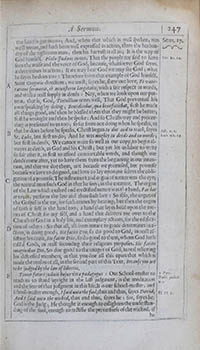 A Sermon.
247
Serm.17.
A Sermon.
247
Serm.17.
the hand is got in too; And, when that which is well spoken, was
well meant, and hath been well expressed in action, thats the husban-
dry of the righteous man; then his harvest is all in; It is the way of
God himself. Philo Judæus notes,Exo 20.10. That the people are said to have
seen the noise and the voice of God, because, whatsoever God sayes,
it determines in action; If we may hear God we may see God; what
he sayes he does too: Therefore from that example of God himself,
Saint Gregorie directs us; we must, sayes he, shew our love, Et vane-
ratione sermonis, et ministerio largitatis, with a fair respect in words,
and with a reall supply in deeds: Nay, when we look upon our pat-
tern, that is, God, Tertullian notes well, That God prevented his
own speaking by doing; Benedicebat, quæ benefaciebat, first he made
all things good, and then he blessed them that they might be better;
first he wrought and then he spoke: And so Christs way and procee-
ding is presented to us too; so far from not doing when he speaks, as
that he does before he speaks. Christ began to doe and to teach,Act. 1.1.
Luk. ult. 19. sayes
St. Luke, but first to do; And he was mighty in deeds and in words;
but first in deeds. We cannot write so well as our copy, to begin al-
wayes at deeds, as God and his Christ; but yet let us labor to write
so fair after it, as first to afford comfortable words, and though our
deeds come after, yet to have them from the beginning in our inten-
tion, and that we doe them, not because we promised, but promise
because we love to do good, and love to lay upon our selves the obli-
gation of a promise. The instrument and organ of nature was the eye;
the natural man finds God in that he sees; in the creature. The organ
of the Law which exalted and erectified nature was the hand; Fac hoc
et vives, perform the law and thou shalt live: So also, the organ of
the Gospel is the ear, for faith comes by hearing; but then the organ
of faith it self is the hand too; a hand that layes hold upon the me-
rits of Christ for my self, and a hand that delivers me over to the
Church of God in a holy life, and exemplary actions, for the edifica-
tion of others: So that all, all from nature to grace determines in a-
ction, in doing good; Sic facite Deo, so do good to God, in reall as-
sisting his cause, Sic facite Diis, so do good to them, whom God hath
call'd Gods, in reall seconding their religious purposes, Sic facite
imaginibus Dei, So doe good to the images of God, in real relieving
his distressed members, as that you doe all this upon that which is
made the reason of all, in the second part of this Text, Because you are
to be judged by the law of libertie. Timor futuri judicii hujus vitæ pædagogus:2. Part. Our School-master to
teach us to stand upright in the last judgment, is the meditation Basil. judici-
um.
and the fear of that judgment in this life. It is our school-master, and
school-master enough, I said unto the fool, thus and thus, sayes David,
Ps. 75.5. And I said unto the wicked, thus and thus, sayes he: for, sayes he,
God is the Judg; He thought it enough to enlighten the understan-
ding of the fool, enough to rectifie the perversness of the wicked, if
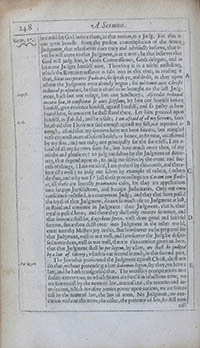 A Sermon.
248
Serm.17.
A Sermon.
248
Serm.17.
he could set God before them, in that notion, as a Judg. For this is
one great benefit from the present contemplation of the future
Judgment, that whosoever does truly and advisedly believe, that e-
ver he will come to that Judgment, is at it now; he that believes that
God will judg him, is Gods Commissioner, Gods delegate, and in
his name Judges himself now. Therefore it is a useful mistaking,
which the Roman translator is faln into in this text; in reading it
thus, Sicut incepientes Judicari, so speak ye, and so do, as they upon
whom the Judgment were already begun; for qui timet ante Christi
tribunal præsentari,August. he that is afraid to be brought to the last Judg-
ment, hath but one refuge, but one Sanctuary; Ascendat tribunal
mentis suæ, et constituat se ante seipsum, let him cite himself before
himself, give evidence himself, against himself; and so guilty as he is
found here, so innocent he shall stand there. Let him proceed upon
himself,9.28. as Job did, and he is safe; I am afraid of all my sorrows, saies
he, afraid that I have not said enough against my self, nor repented e-
nough; afraid that my sorrows have not been sincere, but mingled
with circumstances of loss of health, or honor, or fortune, occasioned
by my sins, and not only, not principally for the sin it self; I am a-
fraid of all my sorrows saies he, but how much more then, of my
mirths and pleasures? to judg our selves by the Judgment of flatte-
rers, that depend upon us; to judg our selves by the event and suc-
cess of things, (I am enrich'd, I am preferd by this course, and there-
fore all's well) to judg our selves by example of others, (others
do thus, and why not I?) all these proceedings are Coram non Judi-
ce, all these are literally præmunire cases, for they are appellations
into faraign Jurisdictions, and foraign Judicatures. Only our own
conscience rectified, is a competent Judg; and they that have pass'd
the tryal of that Judgment, do not so much rise to Judgment at last,
as stand and continue in Judgment: their Judgment, that is, their
tryal is pass'd here; and there they shall only receive sentence, and
that sentence shall be, Euge bone serve, well done good and faithful
servant, since thou didst enter into Judgment in the other world,
enter into thy Masters joy in this. But howsoever we be prepared for
that Judgment, well or not well, and howsoever the Judg be despo-
sed towards us, well or not well, there is this comfort given us here,
that that Judgment shall be per legem, by a law, we shall be judged
by a law of liberty; which is our second branch, in this second part. Per legem.The Jews that prosecuted the Judgment against Christ, durst not
do that, without pretending a law: habemus legem, say they, we have a
law, and he hath transgress'd that. The necessary precipitations into
sodain executions, to which States are forc'd in rebellious time, we
are fain to call by the name of law, martial law; the torrents and in-
undations, which invasive armies power upon nations, we are fain to
call by the name of law, the law of arms. No Judgment, no exe-
cution without the name, the color, the pretence of law, for still men
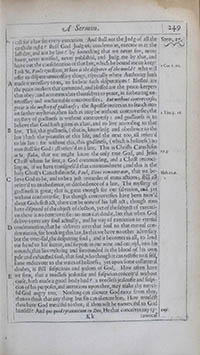 A Sermon.
249
Serm.17.
A Sermon.
249
Serm.17.
call for a law for every execution. And shall not the Judg of all the
earth do right? shall God Judg us, condemn us, execute us at the
last day, and not by law? by something that we never saw, never
knew, never notified, never publish'd, and Judg me by that, and
leave out the consideration of that law, which he bound me to keep-
1 Cor. 1.20. I ask St. Pauls question, Where is the disputer of the world? who will
offer to dispute unnecessary things, especially where Authority hath
made it necessary to us, to forbear such disputations? Blessed are
the peace-makers that command, and blessed are the peace-keepers
that obey, and accommodate themselves to peace, in forbearing un-
necessary and uncharitable controversies; But without controversie,
great is the mystery of godliness; the Apostle invites us to search into
on farther mysteries, then such as may be without controversie;1 Tim. 3.16. the
mystery of godliness is without controversy: and godliness is to
believe that God hath given us a law, and to live according to that
law. This, this godliness, (that is, knowledg and obedience to the
law) hath the promises of this life, and the next too, all referr'd
to his law: for without this, this godliness, (which is holiness) no
man shall see God: all referr'd to a law. This is Christs Catechism
in St. John, that we might know the only true God,17.3. and Jesus
Christ whom he sent, a God commanding, and a Christ reconci-
ling us, if we have transgress'd that commandment; and this is the
holy Ghost's Catechism in St. Paul, Deus remunerator,Heb. 11.6. that we be-
lieve God to be, and to be a just rewarder of mans actions; still all
referr'd to an obedience, or disobedience of a law. The mystery of
godliness is great, that is, great enough for our salvation, and yet
without controversie. For though controversies have been mov'd
about Gods first act, there can be none of his last act; though men
have disputed of the object of election, yet of the subject of executi-
on there is no controversie: no man can doubt, but that when God
delivers over any soul actually, and by way of execution to eternal
condemnation, that he delivers over that soul to that eternal con-
demnation, for breaking this law. In this we have no other adversary
but the over-sad, the despairing soul; and it becomes us all, to lend
our hand to his succor, and so pour in our wine and our oyl, into his
wounds, that lies weltring and surrounded in the blood of his own
pale and exhausted soul; that soul, who though it can testifie to it self,
some endeavour to the waies of holiness; yet upon some collatteral
doubts, is still suspicious and jealous of God. How often have
we seen, that a needless jealousie and suspicion conceiv'd without
cause, hath made a good body bad? a needless jealousie and suspi-
cion of his purposes, and intentions upon thee, may make thy merci-
ful God angry too. Nothing can alienate God more from thee,
then to think that any thing but sin can alienate him. How wouldst
thou have God merciful to thee, if thou wilt be unmerciful to God
himself? And qui quid tyrannicum in Deo,Basil. He that conceives any ty-
Kk
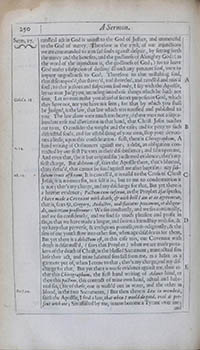 A Sermon.
250
Serm.17.
rannical act in God is unjust to the God of Justice, and unmerciful
A Sermon.
250
Serm.17.
rannical act in God is unjust to the God of Justice, and unmerciful
to the God of mercy. Therefore in the 17th. of our injunctions
we are commanded to arm sad souls against despair, by setting forth
the mercy and the benefits, and the godliness of Almighty God: (as
the word of the injunction is, the godliness of God;) for to leave
God under a suspicion of dealing ill with any penitent soul, were to
impute ungodliness to God. Therefore to that mistaking soul,
that discompos'd, that shiver'd, and shriveled, and ravell'd and ruin'd
soul, to that jealous and suspicious soul only, I say with the Apostle,
let no man Judg you, intruding into those things which he hath not
seen.Colos. 2.18. Let no man make you afraid of secret purposes in God, which
they have not, nor you have not seen; for that by which you shall
be Judged, is the law, that law which was notified and published to
you. The law alone were much too heavy, if there were not a supra-
bundant ease and alleviation in that hand, that Christ Jesus reaches
out to us. O consider the weight and the ease; and for pitty to such
distrustful souls, and for establishing of your own, stop your devoti-
ons a little, upon this consideration: first, there is ChirograpbumChirographum, A
hand writing of Ordinances against me;v. 14. a debt, an obligation con-
tracted by our first Parents in their disobedience; and faln upon me.
And even that, (be it but original sin) is shrewd evidence; ther's my
first charge. But deletum est, saies the Apostle there, that's blotted,
thats defac'd, that cannot be sued against me after baptism: nay sub-
latum cruci affixum,28.15. It is cancell'd, it is naild to the Cross of Christ
Jesus, it is no more sin, in it self it is; but to me to condemnation it
is not; ther's my charge, and my discharge for that. But yet there is a
heavier evidence; Pactum cum inferno, as the Prophet Isai speaks;
I have made a Covenant with death, & with hell I am at an agreement;
that is, saies St. Gregory, Audacter, indesinentur peccamus, et diligen-
do, amicitiam profitemur: We sin constantly, and we sin continually,
and we sin confidently, and we find so much pleasure and profit in
sin, as that we have made a league, and sworn a friendship with sin; &
we keep that perverse, & irreligious promise, over-religiously; & the
sins of our youth flow into other sins, when age disables us for them.
But yet there is a delectum est, in this case too, our Covenant with
death is disannull'd, (saies that Prophet) when we are made parta-
kers of the death of Christ, in the blessed Sacrament; mine actual sins
lose their act, and mine habitual sins fall from me, as a habit as a
garment put of, when I come to that; ther's my charge, and my dis-
charge for that. But yet there is worse evidence against me, then ei-
ther this Chirographum, the first hand writing of Adams hand, or
then this pactum, this contract of mine own hand, actual and habi-
tual sin, (for of these, one is wash'd out in water, and the other in
blood,Ro. 7.20. in the two Sacraments.) But then there is Lex in membris,
saith the Apostle, I find a law, that when I would do good, evil is pre-
sent with me; Sin assisted by me, is now become a Tyrant over me;
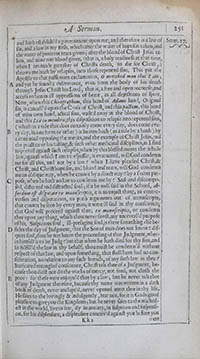 A Sermon.
251
Serm.17.
A Sermon.
251
Serm.17.
and hath establish'd a government upon me, and therefore is a law of
sin, and a law in my flesh, which after the water of baptism taken, and
the water of penitent tears given; after the blood of Christ Jesus ta-
ken, and mine oneown blood given, (that is, a holy readiness at that time,
when I am made partaker of Christs death, to die for Christ,)
throws me back by relapses, into those repented sins. This put the
Apostle to that passionate exclamation, O wretched man that I am;
and yet he found a deliverance, even from the body of his death
through Jesus Christ his Lord, that is, a free and open recourse, and
access to him in all oppressions of heart, in all dejections of spirit.
Now, when this Chirographum, this band of Adams hand, Original
sin, is cancell'd upon the Cross of Christ, and this pactum, this band
of mine own hand, actual sins, wash'd away in the blood of Christ,
and this Lex in membris, this disposition to relapse into repented sins,
(which as a tide that does certainly come every day, does come eve-
ry day, in one form or other) is beaten back (as a tide by a bank) by
a continual opposing the merits, and the example of Christ Jesus, and
the practice of his fasting, & such other medicinal disciplines, as I find
to prevail against such relapses, when by this blessed means the whole
law, against which I am a trespasser, is evacuated, will God condemn
me for all this, and not by a law? when I have pleaded Christ, &
Christ, and Christ baptism, and blood and tears, will God condemn
me an oblique way, when he cannot by a direct way? by a secret pur-
pose, when he hath no law to condemn me by? Sad and discompo-
sed, distorted and distracted soul; if it be well said in the School, ab-
surdum est disputare ex manuscriptis, it is an unjust thing, in contro-
versies and disputations, to press arguments out of manuscripts,
that cannot be seen by every man; it were ill said in thy conscience,
that God will proceed against thee, ex manuscriptis, or condemn
thee upon any thing, which thou never sawst, any unreveal'd purpose
of his. Suspicious soul, ill-presaging soul, is there something else be-
sides the day of Judgment, that the Son of man does not know? dis-
quiet soul, does he not know the proceeding of that Judgment, wher-
in himself is to be Judg? but that when he hath died for thy sins, and
so fulfill'd the law in thy behalf, thou maist be condemn'd without
respect of that law, and upon something, that shall have had no con-
sideration, no relation to any such breach, of any such law in thee?
Intricated entangled conscience, Christ tels thee of a Judgment, be-
cause thou didst not do the works of mercy, not feed, not cloth the
poor: for these were enjoyn'd thee by a law; but he never tels thee
of any Judgment therefore, because thy name was written in a dark
book of death, never unclaps'dunclasp'd, never opened unto thee in thy life.
He saies to the lovingly & indulgently, fear not, for it is Gods good
pleasure to give you the Kingdom; but he never saies to the wicked-
est in the world, live in fear, dy in anxiety, in suspition and suspensi-
on, for his displeasure; a displeasure conceiv'd against you before you
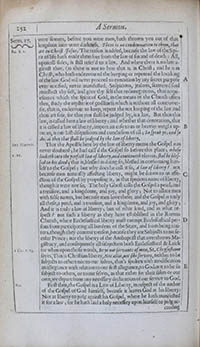 A Sermon.
252
Serm.17.
A Sermon.
252
Serm.17.
were sinners, before you were men, hath thrown you out of that
kingdom into utter darkness. There is no condemnation to them, that
Ro. 8. 1.are in Christ Jesus, The reason is added, because the law of the Spi-
rit of life hath made them free from the law of sin and of death: All,
upon all sides, is still refer'd to a law. And where there is no law a-
gainst thee, (as there is not to him that is in Christ; and he is in
Christ, who hath endeavoured the keeping or repented the breaking
of the law) God wil never proceed to execution by any secret purpose
ever notified, never manifested. Suspicious, jealous, scattered soul
recollect thy self, and give thy self that redintegration, that acqui-
escence which the spirit of God, in the means of the Church offers
thee, study the mysterie of godliness which is without all controver-
sie, that is, endeavour to keep, repent the not keeping of the law and
thou art safe, for that you shall be judged by, is a law. But then this
law, is called here a law of liberty; and whether that denotation, that
it is called a law of liberty, import an ease to us or heavier weight up-
on us, is our last disquisition and conclusion of all; So speak ye, and so
do, as they that shall be judged by the law of liberty. Lex libertatis.That the Apostle here by the law of liberty means the Gospel was
never doubted; he had call'd the Gospel so before this place; whoso
looketh into the perfect law of liberty,1.25. and continueth therein, shal be bles-
sed in his deed; that is, blessed in doing so, blessed in conforming him-
self to the Gospel; but why does he call it so, A law of liberty? not
because men naturally affecting liberty, might be drawn to an affe-
ction of the Gospel by proposing it, in that specious name of liberty,
though it were not so. The holy Ghost calls the Gospel a pearl, and
a treasure, and a kingdome, and joy, and glory; Not to allure men
with false names, but because men love these; and the Gospel is truly
all these, a pearl, and a treasure, and a kingdome, and joy, and glory;
And it is truly a law of liberty; but of what kind, and in what re-
spect? not such a liberty as they have established in the Roman
Church, where Ecclesiastical liberty must exempt Ecclesiastical per-
sons from participating all burdens of the State, and from being trai-
tors, though they commit treason, because they are Subjects to no se-
cular Prince; nor the liberty of the Anabaptist that overthrows Ma-
gistracy, and consequently all subjection both Ecclesiastical & Laick
for when upon those words,1 Cor. 7.23. Be ye not servants of men, St. Chrysostome
sayes, This is Christian liberty, Nec aliis, nec sibi servire, neither to be
subjects to others nor to our selves, that's spoken with modification
an allegiance with relation to our first allegiance, to God; not to be so
subject to others, or to our selves, as that either for their sakes or our
own, we depart from any necessary declaration of our service to God. Deo.First then, the Gospel is a Law of Liberty, in respect of the author
of the Gospel of God himself, because it leaves God at his liberty:
Not at liberty to judg against his Gospel, where he hath manifested
it for a law; for he hath laid a holy necessity upon himself to judg ac-
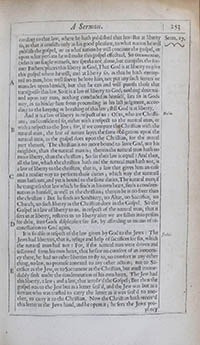 A Sermon.
253
Serm.17.
cording to that law, where he hath published that law: But at liberty
A Sermon.
253
Serm.17.
cording to that law, where he hath published that law: But at liberty
so, as that it consists only in his good pleasure, to what nation he will
publish the gospel, or in what nation he will continue the gospel, or
upon what persons he wil make this gospel effectual. So Oecumenius,
(who is no single witness, nor speaks not alone, but compiles the for-
mer Fathers) places this liberty in God, That God is at liberty to give
this gospel where he will, and at liberty so, as that he hath exemp-
ted no man, how well soever he love him, nor put any such fetters or
manicles upon himself, but that he can and will punish those that
transgresse this law. So it is a law of liberty to God; nothing determi-
ned upon any man, nothing concluded in himself, lies so in Gods
way, as to hinder him from proceeding in his last judgment, accor-
ding to the keeping or breaking of this law; still God is at liberty. And it is a law of liberty in respect of us: Of us,Nobis. who are Christi-
ans; and considered so, either with a respect to the natural man, or
with a respect to the Jew; for, if we compare the Christian with the
natural man, the law of nature layes the same obligation upon the
natural man, as the gospel does upon the Christian, for the moral
part thereof. The christian is no more bound to love God, nor his
neighbor, than the natural man is; therein the natural man hath no
more liberty, than the christian; So far their law is equal: And then,
all the law, which the christian hath and the natural man hath not, is
a law of liberty to the christian, that is, a law that gives him an ease
and a readier way to perform those duties; which way the naturall
man hath not, and yet is bound to the same duties. The natural man, if
he trangress that law which he finds in his own heart, finds a condem-
nation in himself, as well as the christian; therein he is no freer than
the christian: But he finds no Sanctuary, no Altar, no Sacrifice, no
Church, no such liberty as the Christian does in the Gospel. So the
Gospel is a law of liberty to us, in respect of the natural man, that it
sets us at liberty, restores us to liberty after we are fallen into prison
for debt, into Gods displeasure for sin, by affording us means of re-
conciliation to God again. It is so also in respect of the law given by God to the Jews: TheJudæi.
Jews had liberties, that is, refuge and help of sacrifices for sin, which
the natural man had not: For, if the natural man were driven and
followed from his own heart, that he saw no comfort of an innocen-
cy there, he had no other liberties to fly to, no comfort in any other
thing, no law, no promise annexed to any other action; not to Sa-
crifice as the Jew, or to Sacrament as the Christian, but must irreme-
diably sink under the condemnation of his own heart. The Jew had
this liberty, a law; and a law, that involv'd the Gospel; But then the
gospel was to the Jew but as a letter seal'd, and the Jew was but as a
servant who was trusted to carry the letter as it was seal'd to ano-
ther, to carry it to the Christian. Now the Christian hath receiv'd
this letter at the Jews hand, and he opens it; he sees the Jews pro-
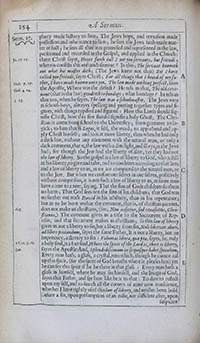 A Sermon.
254
Serm.17.
phecy made history to him; The Jews hope, and reversion made
A Sermon.
254
Serm.17.
phecy made history to him; The Jews hope, and reversion made
possession and inheritance to him; he sees the Jews faith made mat-
ter of fact; he sees all that was promised and represented in the law,
performed and recorded in the Gospel, and applied in the Church:
there Christ sayes,Jo. 15.15. Hence forth call I not you servants, but friends;
wherein consists this enfranchisement? In this; The servant knoweth
not what his master doth; (The Jews knew not that) But I have
called you friends, sayes Christ; For all things that I heard of my fa-
ther, I have made known unto you.Heb. 7.17. The law made nothing perfect, saies
the Apostle,Gal. 4.24. Where was the defect? He tels us that, The old cove-
nant (that is the law) gendreth to bondage; what bondage? he tels us
that too,3.23.3.24. when he sayes, The law was a schoolmaster. The Jews were
as school-boys, alwayes spelling and putting together types and fi-
gures, with things typified and figured: How this Lamb should sig-
nifie Christ, how this fire should signifie a holy Ghost. The Chri-
stian is come from school to the University; from grammer to lo-
gick; to him that is Logos, it self, the word; to apprehend and ap-
ply Christ himself; and so is at more liberty, than when he had only
a dark law, without any comment with the natural man, or only a
dark comment, that is, the law with a dim light, and ill eys, as the Jews
had; for though the Jew had the liberty of alawa law, yet they had not
the law of liberty. So the gospel is a law of liberty to God, who is still
at his liberty, to give and take, and to condemn according to that law;
and a law of liberty to us, as we are compared to the natural man, or
to the Jew. But when we confine our selves in our selves, positively
without comparison, it is not such a law of liberty to us, as some men
have come to a neer, saying, That the sins of Gods children do them
no harm; That God sees not the sins of his children; that God was
no farther out with David in his adultery, than in his repentance;
but as to be born within the covenant, that is, of christian parents,
does not make us christians,Aug. (for, Non nascitur, sed renascitur, Chri-
stianus,) The covenant gives us a title to the Sacrament of Bap-
tism, and that sacrament makes us christians; so this law of liberty
gives us not a liberty to sin, but a liberty from sin, Noli libertate abuti,
ad libere peccandum, sayes the same Father, It is not a liberty, but an
impotency, a slavery to sin: Voluntas libera, quæ pia, sayes, he, only
a holy soul,2 Cor. 3.17. is a free soul, Where the spirit of the Lord is, there is liberty,
sayes the Apostle:Leo. And, Splendidissimum in se quisque habet speculum,
Every man hath, a glass, a crystal, into which, though he cannot cal
up this spirit, (for the spirit of God breaths where it pleases him) yet
he can see this spirit if he be there in that glass: Every man hath a
glass in himself, where he may see himself, and the Image of God,
sayes that Father, and see how like he is to that: To dare to reflect
upon my self, and to search all the corners of mine own conscience,
whether I have rightly used this law of liberty, and neither been bold
before a sin, upon presumption of an easie, nor diffident after, upon
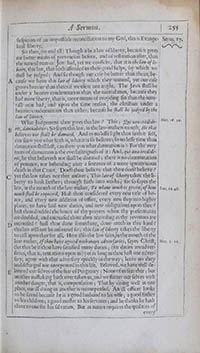 A Sermon.
255
Serm.17.
A Sermon.
255
Serm.17.
suspicion of an impossible reconciliation to my God, this is Evange-
lical liberty. So then, (to end all) Though it be a law of liberty, because it gives
me better means of prevention before, and of restitution after, than
the natural man or Jew had, yet we consider, that it is the law of li-
berty, this law, that hath afforded us these good helps, by which we
shall be judged; And so though our case be better than theirs, be-
cause we have this law of liberty which they wanted, yet our case
grows heavier than theirs if we use it not aright. The Jews shall be
under a heavier condemnation than the natural man, because they
had more liberty, that is, more means of avoyding sin than the natu-
rall man had, and upon the same reason, the christian under a
heavier condemnation than either, because he shall be judged by the
law of liberty. What Judgement then gives this law? This;Mar. 16.16. Qui non credide-
rit, damnabitur; So sayes this law, in the law-makers mouth, He that
believes not shall be damned. And as no lesse light than faith it self,
can shew you what faith is, what it is to believe; so no lesse time than
damnation shall last, can shew you what damnation is: For the very
form of damnation is the everlastingness of it: And, qui non credide-
rit, he that believeth not shall be damned; there is no commutation
of penance, nor beheading after a sentence of a more ignominious
death in that Court. Doest thou believe that thou doest believe?
yet this law takes not that answer; This law of liberty takes the li-
berty to look farther; through faith into works; for so sayes the
law, in the mouth of the law-maker, To whom much is given,Luc. 12.48. of him
much shall be required. Hast thou considered every new title of ho-
nor, and every new addition of office, every new step into higher
places, to have laid new duties, and new obligations upon thee?
hast thou doubled the hours of thy prayers when thy preferments
are doubled, and encreased thine alms according as thy revenues are
encreased? hast thou done something, done much in this kind?
this law will not be answered so; this law of liberty takes the liberty
to call upon thee for all. Here also the law saies, in the mouth of the
law-maker, If thou have agreed with many adversaries, sayes Christ,
Mat. 5.25. (let that be if thou have satisfied many duties; (for duties are adver-
saries, that is, tentations upon us) yet as long as thou hast one adver-
sary, agree with that adversary quickly in the way; leave no duty
undischarged nor unrepented in this life. Beloved, we have well de-
livered our selves of the fear of Purgatory; None of us fear that; but
another mistaking hath overtaken us, and we flatter our selves with
another danger, that is, compensation; That by doing well in one
place, our ill doing in another is recompensed. An ill officer looks
to be saved because he is a good husband to his wife; a good father
to his children; a good master to his servants; and he thinks he hath
three to one for his salvatien. But as nature requires the qualities of
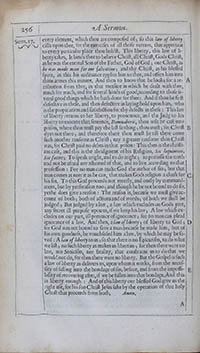 A Sermon.
256
Serm.17.
A Sermon.
256
Serm.17.
every element, which thou art composed of; so this law of liberty
calls upon thee, for the exercises of all those vertues, that appertain
to every particular place thou holdst. This liberty, this law of li-
berty takes, It binds thee to believe Christ, all Christ, Gods Christ,
as he was the eternal Son of the Father, God of God; our Christ, as
he was made man for our salvation; and thy Christ, as his blessed
spirit, in this his ordinance applies him to thee, and offers him into
thine armes this minute. And then to know that he looks for a re-
tribution from thee, in that measure in which he dealt with thee,
much for much; and for several kinds of good, according to those se-
veral good things which he hath done for thee: And if thou be first
defective in these, and then defective in laying hold upon him, who
is the propitiation and satisfaction for thy defects in these: This law
of liberty returns to her liberty, to pronounce, and the Judg to his
liberty to execute that sentence, Damnaberis, thou wilt be cast into
prison, where thou must pay the last farthing; thou must; for Christ
dyes not there; and therefore there thou must lie till there come
such another ransome as Christ; nay a greater ransome than Christ
was, for Christ paid no debts in that prison: This then is the christi-
ans case, and this is the abridgment of his Religion, Sic loquimini,
Sic facite; To speak aright, and to do aright; to professe the truth
and not be afraid nor ashamed of that, and to live according to that
profession: For no man can make God the author of sin; but that
man comes as neer it as he can, that makes Gods religion a cloak for
his sin. To this God proceeds not meerly, and onely by command-
ment, but by perswasion too; and though he be not bound to do so,
yetheyet he does give a reason: The reason is, because we must give ac-
count of both; both of actions and of words; of both we shall be
judged; But judged by a law, a law which excludes on Gods part,
any secret ill purpose upon us, if we keep his law; A law which ex-
cludes on our part, all pretence of ignorance; for no man can plead
ignorance of a law. And then, a law of liberty; of liberty to God;
for God was not bound to save a man because he made him, but of
his own goodness, he vouchsafed him a law, by which he may be sa-
ved: A law of liberty to us; so that there is no Epicurism, to do what
we list; no such liberty as makes us libertins; for then there were no
law, nor Stoicism, nor fatality, that constrains us to do that we
would not do, for then there were no liberty. But the Gospel is such
a law of liberty as delivers us, upon whom it works, from the neces-
sity of falling into the bondage of sin, before, and from the impossi-
bility of recovering after, if we be fallen into that bondage. And this
is liberty enough: And of this liberty our blessed God give us the
right use, for his son Christ Jesus sake by the operation of that holy
Ghost that proceeds from both. Amen.
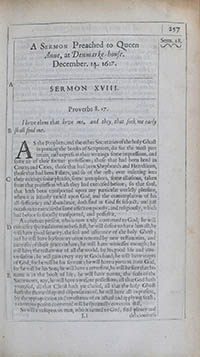 257
Serm.18.
A Sermon Preached to Queen
257
Serm.18.
A Sermon Preached to Queen Anne, at Denmarke-house.
December. 14. 1617.
SERMON XVIII. Proverbs 8.17.
I love them that love me, and they that seek me early
shall find me. ASAs the Prophets, and the other Secretaries of the holy Ghost
in penning the books of Scriptures, do for the most part
retain, and express in their writings some impressions, and
some air of their former professions; those that had been bred in
Courts and Cities, those that had been Shepheards and Heardsmen,
those that had been Fishers, and so of the rest; ever inserting into
their writings some phrases, some metaphors, some allusions, taken
from that profession which they had exercised before; so that soul,
that hath been transported upon any particular worldly pleasure,
when it is intirely turn'd upon God, and the contemplation of his
all-sufficiency and abundance, doth find in God fit subject, and just
occasion to exercise the same affection piously, and religiously, which
had before so sinfully transported, and possest it. A covetous person, who is now truly converted to God, he will
exercise a spiritual covetousness still, he will desire to have him all, he
will have good security, the seal and assurance of the holy Ghost;
and he will have his security often renewed by new testimonies, and
increases of those graces in him; he will have witnesses enough; he
will have the testimonie of all the world, by his good life and con-
versation; he will gain every way at Gods hand, he will have wages
of God, for he will be his servant; he will have a portion from God,
for he will be his Son; he will have a reversion, he will be sure that his
name is in the book of life; he will have pawns, the seals of the
Sacraments, nay, he will have a present possession; all that God hath
promised, all that Christ hath purchased, all that the holy Ghost
hath the stewardship and dispensation of, he will have all in present,
by the appropriation and investiture of an actual and applying faith;
a covetous person converted will be spiritually covetous still. So will a voluptuous man, who is turned to God, find plenty and Ll
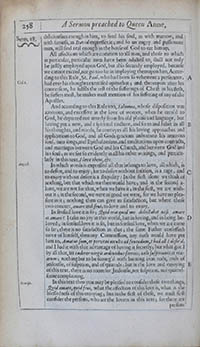 A Sermon preached to Queen Anne,
258
Serm.18.
A Sermon preached to Queen Anne,
258
Serm.18.
deliciousnes enough in him, to feed his soul, as with marrow, and
with fatness, as David expresses it; and so an angry and passionate
man, will find zeal enough in the house of God to eat him up. All affections which are common to all men, and those to which
in particular, particular men have been adicted to, shall not only
be justly employed upon God, but also securely employed, because
we cannot exceed, nor go too far in imploying them upon him. Accor-
ding to this Rule,Col. 1. St. Paul, who had been so vehement a persecutor,
had ever his thoughts exercised upon that; and thereupon after his
conversion, he fulfils the rest of the sufferings of Christ in his flesh,
he suffers most, he makes most mention of his suffering of any of the
Apostles. And according to this Rule too, Salomon, whose disposition was
amorous, and excessive in the love of women, when he turn'd to
God, he departed not utterly from his old phrase and language, but
having put a new, and a spiritual tincture, and form and habit in all
his thoughts, and words, he conveyes all his loving approaches and
applications to God, and all Gods gracious answers to his amorous
soul, into songs, and Epithalamians, and meditations upon contracts,
and marriages between God and his Church, and between God and
his soul; as we see so evidently in all his other writings, and particu-
larly in this text, I love them, &c. August.In which words is expressed all that belongs to love, all which, is
to desire, and to enjoy; for to desire without fruition, is a rage, and
to enjoy without desire is a stupidity: In the first alone we think of
nothing, but that which we then would have; and in the second a-
lone, we are not for that, when we have it; in the first, we are with-
out it; in the second, we were as good we were, for we have no plea-
sure in it; nothing then can give us satisfaction, but where those
two concurr, amare and frui, to love and to enjoy. In sensual love it is so; Quid erat quod me delectabat nisi amare
et amari? I take no joy in this world, but in loving, and in being be-
loved; in sensual love it is so, but in sensual love, when we are come
so far; there is no satisfaction in that; the same Father confesseth
more of himself, then any Commission, any oath would have put
him to, Amatus sum, et perveni occulte ad fruendum, I had all I desir'd,
and I had it with that advantage of having it secretly; but what got I
by all that, Ut cæderer virgis ardentibus ferreis, zeli suspicionis et rix-
arum; nothing but to be scourg'd with burning iron rods, rods of
jealousie, of suspition, and of quarrels; but in the love and enjoying
of this text, there is no room for Jealousie, nor suspition, nor quarrel-
some complaining. DevisioDivisio.In this text then you may be pleased to consider these two things,
Quid amare, quid frui, what the affection of this love is, what is the
blessedness of this enjoying; but in the first of these, we must first consider the persons, who are the lovers in this text; for there are
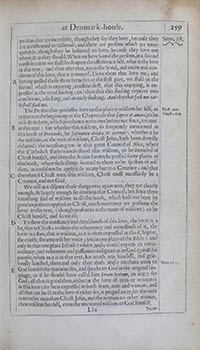 at Denmark-house.
259
Serm.18.
at Denmark-house.
259
Serm.18.
persons that are incredible, though they say they love, because they
are accustomed to falshood; and there are persons which are unre-
quitable, though they be believed to love, because they love not
where, & as they should. When we have found the persons, in a second
consideration we shall look upon the affection it self, what is the love
in this text; and then after that, upon the bond, and union and con-
dition of this love, that it is mutual, I love them that love me; and
having passed those three branches of the first part, we shall in the
second, which is enjoying, consider first, that this enjoying, is ex-
pressed in the word finding; and then that this finding requires two
conditions, a seeking, and an early seeking, And they that seek me ear-
ly shall find me. The Person that professes love in this place is wisdom her self,First part.
The Person. as
appears at the beginning of the Chapter; so that sapere et amare, to be
wise & to love, which perchance never met before nor since, are met
in this text: but whether this wisdom, so frequently mentioned in
this book of Proverbs, be sapientia creata or increata, whether it be
the wisdom, or the root of wisdom, Christ Jesus, hath been diversly
debated: the occasion grew in that great Councel of Nice, where
the Catholick Fathers understood this wisdom, to be intended of
Christ himself, and then the Arrian hereticks pressed some places of
this book, where such things seemed to them to be spoken of wis-
dom, as could not be applyable to any but to a Creature; and that
therefore if Christ were this wisdom, Christ must necessarily be a
Creature, and not God. We will not dispute those things over again now, they are clearly
enough, & largely enough set down in that Councel; but since there
is nothing said of wisdom in all this book, which hath not been by
good expositors applied to Christ, much more may we presume the
lover in this text, (though presented in the name of wisdom) to be
Christ himself, and so we do. To shew the constancy and durableness of this love, the lover is a
he, that is Christ; to shew the vehemency and earnestness of it, the
lover is a shee, that is wisdom, as it is often expressed in this Chapter,
she crieth, she uttereth her voice; yea in one place of the Bible (and
only in that one place I think) where Moses would express an extra-
ordinary, and vehement and passionate indignation in God against his
people, when as it is in that text, his wrath was kindled, and grie-
vously kindled,Num. 11.15. there and only their doth Moses attribute even to
God himself the feminine sex, and speaks to God in the original lan-
guage, as if he should have call'd him Deam Iratam, an angry she
God; all that is good then, either in the love of man or woman is
in this love; for he is expressed in both sexes, man and woman; and
all that can be ill in the love of either sex, is purged away, for the man
is no other man then Christ Jesus, and the woman no other woman,
then wisdom her self, even the uncreated wisdom of God himself.
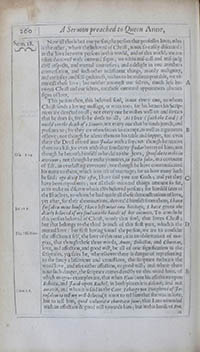 A Sermon preached to Queen Anne,
260
Serm.18.
A Sermon preached to Queen Anne,
260
Serm.18.
Now all this is but one person, the person that professes love; who
is the other, who is the beloved of Christ, is not so easily discern'd:
in the love between persons in this world, and of this world, we are
often deceived with outward signs; we often mis-call and mis-judg
civil respects, and mutual courtesies; and a delight in one anothers
conversation, and such other indifferent things, as only malignity,
and curiosity, and self-guiltiness, makes to be misinterpretable, we of-
ten call these love; but neither amongst our selves, much less be-
tween Christ and our selves, are these outward appearances alwaies
signs of love. This person then, this beloved soul, is not every one, to whom
Christ sends a loving message, or writs too; for his letters his Scrip-
tures are directed to all; not every one he wishes well to and swears
that he does so, for so he doth to all; As I live (saith the Lord) I
would not the death of a Sinner; not every one that he sends jewels, and
presents to; for they are often snares to corrupt, as well as arguments
of love; not though he admit them to his table and supper, for even
there the Devil entred into Judas with a sop; not though he receive
them to a kiss, for even with that familarity Judas betrayed him; not
though he betroth himself as he did to the Jews,Ose. 2.14. sponsabo te mihi in
æternum; not though he make jointures, in pacto salis, in a covenant
of salt, an everlasting covenant; not though he have communicated
his name to them, which is an act of marriage; for to how many hath
he said: ego dixit Dii estis, I have said you are Gods; and yet they
have been reprobates; not all these outward things amount so far,
as to make us discern who is this beloved person; for himself saies of
the Israelites, to whom he had made all these demonstrations of love,
yet after, for their abominations, devorc'd himself from them, I have
forsaken mine house,Jer. 12.7. I have left mine own heritage, I have given the
dearly beloved of my soul into the hands of her enemies. To conclude
this person beloved of Christ, is only that soul, that loves Christ;
but that belongs to the third branch of this first part, which is the
mutual love:The Affection. but first having found the person, we are to consider
the affection it self, the love of this text; it is an observation of Ori-
gens, that though these three words, Amor, Dilectio, and Charitas,
love, and affection, and good will, be all of one signification in the
sctiptures, yet saies he, wheresoever there is danger of representing
to the fancy a lascivious and carnal love, the scripture forbears the
word love, and uses either affection, or good will; and where there
is no such danger, the scripture comes directly to this word love, of
which Origens examples are, that when Isaac bent his affections upon
Rebecca, and Jacob upon Rachel, in both places it is dilexit, and not
amavit;Cant 5.8. and when it is said in the Cant. I charge you Daughters of Je-
rusalem to tell my well-beloved, it is not to tel him that she was in love,
but to tell him, quod vulneratæ charitatis sum; that I am wounded
with an affection & good will towards him; but in this book of Pro.
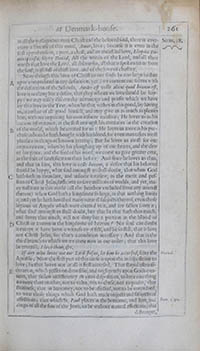 at Denmark-house.
261
Serm.18.
at Denmark-house.
261
Serm.18.
in all the passages between Christ and the beloved soul, there is ever-
more a free use of this word, Amor, love; because it is even in the
first apprehension, a pure, a chast, and an undefiled love, Eloquia Do-
minis casta, sayes David, All the words of the Lord, and all their
words that love the Lord, all discourses, all that is spoken to or from
the soul, is all full of chast love, and of the love of chastity. Now though this love of Christ to our souls be too large to shut
up or comprehend in any definition, yet if we content our selves with
the definition of the Schools, Amare est velle alicui quod bonum est,
love is nothing but a desire, that they whom we love should be hap-
py: we may easily discern the advantage and profit which we have
by this love in the Text, when he that wishes us this good, by loving
us, is author of all good himself, and may give us as much as pleases
him, without impairing his own infinite treasure; He loves us as his
ancient inheritance, as the first amongst his creatures in the creation
of the world, which he created for us: He loves us more as his pur-
chase, whom he hath bought with his blood; for even man takes most
pleasure in things of his own getting; But he loves us most for our
improvement, when by his ploughing up of our hearts, and the dew
of his grace, and the seed of his word, we come to give greater cent,
in the fruit of sanctification than before. And since he loves us thus,
and that in him, this love is velle bonum, a desire that his beloved
should be happy, what soul amongst us shall doubt, that when God
hath such an abundant, and infinite treasure, as the merit and pas-
sion of Christ Jesus, sufficient to save millions of worlds, and yet, ma-
ny millions in this world (all the heathen excluded from any interest
therein) when God hath a kingdome so large, as that nothing limits
it, and yet he hath banished many natural subjects thereof, even those
legions of Angels which were created in it, and are fallen from it;
what soul amongst us shall doubt, but that he that hath thus much,
and loves thus much, will not deny her a portion in the blood of
Christ or a room in the kingdome of heaven? No soul can doubt
it except it have been a witness to it self, and be so still, that it love
not Christ Jesus, for that's a condition necessary: And that is the
third branch to which we are come now in our order; that this love
be mutuall, I love them, &c. If any man loves not our Lord Jesus, let him be accursed,Mutual. saies the
Apostle; Now the first part of this curse is upon the indisposition to
love; he that loves not at all is first accursed. That stupid inconsi-
deration, which passes on drowsilie, and negligently upon Gods crea-
tures, that sullen indifferency in ones disposition, to love one thing
no more than another, not to value, not to chuse, not to prefer, that
stoniness, that in humanity, not to be affected, not to be entendred,
to wear those things which God hath made objects and subjects of
affections; that which St. Paul places in the bottome, and lees,Rom. 1.30. and
dregs of all the sins of the Jews, to be without natural affections, this
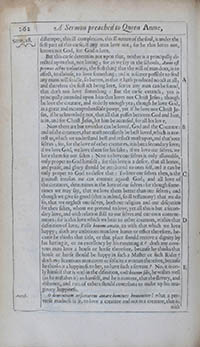 A Sermon preached to Queen Anne,
262
Serm.18.
A Sermon preached to Queen Anne,
262
Serm.18.
distemper, this ill complexion, this ill nature of the soul, is under the
first part of this curse, if any man love not; for he that loves not,
knows not God, for God is love. But this curse determins not upon that, neither is it principally di-
rected upon that, not loving; for as we say in the schools, Amor est
primus actus voluntatis, the first thing that the will of man does, is to
affect, to choose, to love something; and it is scarce possible to find
any mans will so idle, so barren, as that it hath produced no act at all;
and therefore the first act being love, scarce any man can be found,
that doth not love something: But the curse extends, yea is
principally intended upon him that loves not Christ Jesus; though
he love the creature, and orderly enough yea; though he love God,
as a great and incomprehensible power, yet if he love not Christ Je-
sus, if he acknowledg not, that all that passes between God and him,
is in, and for Christ Jesus, let him be accursed, for all his love. Now there are but two that can be loved, God and the Creature:
and of the creatures, that must necessarily be best loved, which is nee-
rest us, which we understand best and reflect most upon, and that's our
selves; for, for the love of other creatures, it is but a secondary love;
if we love God, we love them for his sake; if we love our selves, we
love them for our sakes: Now to love our selves is only allowable,
only proper to God himself; for this love is a desire, that all honor,
and praise, and glory should be attributed to ones self, and it can be
only proper to God to desire that: To love our selves then, is the
greatest treason we can commit against God; and all love of
the creatures, determines in the love of our selves: for though some-
times we may say, that we love them better than our selves; and
though we give so good (that is indeed, so ill testimony) that we do
so, that we neglect our selves, both our religion and our discretion
for their sakes, whom we pretend to love, yet all this is but a secon-
dary love, and with relation still to our selves and our own content-
ments: for is this love which we bear to other creatures, within that
definition of love, Velle bonum amato, to wish that which we love
happy; doth any ambitious man love honor or office therefore, be-
cause he thinks that title, or that place should receive a dignity by
his having it, or an excellency by his executing it? doth any cove-
tous man love a house or horse therefore, because he thinks that
house or horse should be happy in such a Master or such Rider?
doth any licentious man covet or solicite a woman therefore, because
he thinks it a happiness to her, to have such a servant? No, it is on-
ly himself that is within the difinition, vult bonum sibi, he wishes well
(as he mistakes it) to himself, and he is content, that the slavery, and
dishonor, and ruin of others should contribute to make up his ima-
ginary happiness. August.O dementiam nescientem amare homines humaniter! what a per-
verse madness is it, to love a creature and not as a creature, that is,
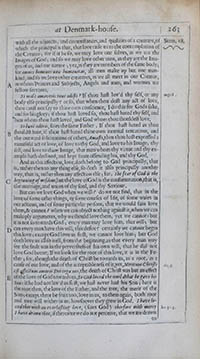 at Denmark-house.
263
Serm.18.
at Denmark-house.
263
Serm.18.
with all the adjuncts, and circumstances, and qualities of a creature, of
which the principal is that, that love raise us to the contemplation of
the Creator; for if it be so, we may love our selves, as we are the
Images of God; and so we may love other men, as they are the Ima-
ges of us, and our nature; yea, as they are members of the same body;
for omnes homines una humanitas, all men make up but one man-
kind, and so we love other creatures, as we all meet in our Creator,
in whom Princes and Subjects, Angels and men, and wormes are
fellow servants. Si malè amaveris tunc odisti? If thou hast lov'd thy self,August. or any
body else principally? or so, that when thou dost any act of love,
thou canst not say to thine own conscience, I do this for Gods sake,
and for his glory; if thou hast loved so, thou hast hated thy self, and
him whom thou hast loved, and God whom thou shouldest love. Si bonè oderis, saies the same Father, If thou hast hated as thou
shouldst hate, if thou hast hated thine own internal tentations, and
the outward solicitations of others, Amasti, then thou hast expressed a
manifold act of love, of love to thy God, and love to his Image, thy
self, and love to thine Image, that man whom thy virtue and thy ex-
ample hath declined, and kept from offending his, and thy God. And as this affection, love, doth belong to God principally, that
is, rather then to any thing else, so doth it also principally another
way, that is, rather then any affection else; for, the fear of God is the
beginning of wisdom, but the love of God is the consummation, that is,
the marriage, and union of thy soul, and thy Saviour. But can we love God when we will? do we not find, that in the
love of some other things, or some courses of life, of some waies in
our actions, and of some particular persons, that we would fain love
them, & cannot? when we can object nothing against it, when we can
multiply arguments, why we should love them, yet we cannot: but
it is not so towards God; every man may love him, that will; but
can every man have this will, this desire? certainly we cannot begin
this love; except God love us first, we cannot love him; but God
doth love us all so well, from the beginning, as that every man may
see the fault was in the perversness of his own will, that he did not
love God better. If we look for the root of this love, it is in the Fa-
ther; for, though the death of Christ be towards us, as a root, as a
cause of our love, and of the acceptableness of it, yet,Augst. Meritum Christi
est affectum amoris Dei erga nos, the death of Christ was but an effect
of the love of God towards us, So God loved the worl dthatworld that he gave his
Son: if he had not lov'd us first, we had never had his Son; here is
the root then, the love of the Father, and the tree, the merit of the
Son; except there be fruit too, love in us, to them again, both root
and tree will wither in us, howsoever they grew in God. I have lo-
ved thee with an everlasting love,Jer. 31.3. (saies God) therfore with mercy
I have drawn thee, if therefore we do not perceive, that we are drawn
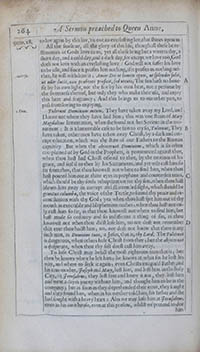 A Sermon preached to Queen Anne,
264
Serm.18.
A Sermon preached to Queen Anne,
264
Serm.18.
to lov again by this lov, 'tis not an everlasting lov, that shines upon us All the sunshine, all the glory of this life, though all these be te-
stimonies of Gods love to us, yet all these bring but a winters day, a
short day, and a cold day, and a dark day, for except we love too, God
doth not love with an everlasting love: God will not suffer his love
to be idle, and since it profits him nothing, if it profits us nothing nei-
ther,Ambrose. he will withdraw it; Amor Dei ut lumen ignis, ut splendor solis,
ut odor lucis, non præbenti proficit, sed utenti, The sun hath no bene-
fit by his own light, nor the fire by his own heat, nor a perfume by
the sweetness thereof, but only they who make their use, and enjoy
this heat and fragrancy; And this brings us to our other part, to
pass from loving to enjoying. 2 Part.Tulerunt Dominum meum, They have taken away my Lord, and
I know not where they have laid him; this was one strain of Mary
Magdalens lamentation, when she found not her Saviour in the mo-
nument: It is a lamentable case to be fain to cry so, Tulerunt, They
have taken, other men have taken away Christ, by a dark and cor-
rupt education, which was the state of our Fathers to the Roman
captivity. But when the abjecerunt Dominum, which is so often
complained of by God in the Prophets, is pronounced against thee,
when thou hast had Christ offered to thee, by the motions of his
grace, and seal'd to thee by his Sacraments, and yet wilt cast him so
far from thee, that thou knowest not where to find him, when thou
hast poured him out at thine eyes in prophane and counterfeit tears,
which should be thy souls rebaptization for thy sins, when thou hast
blown him away in corrupt and ill intended sighs, which should be
gemitus columbæ, the voice of the Turtle, to sound thy peace and re-
conciliation with thy God; yea when thou hast spit him out of thy
mouth in execrable and blaphemous oathes; when thou hast not on-
ly cast him so far, as that thou knowest not where to find him, but
hast made so ordinary and so indifferent a thing of sin, as thou
knowest not when thou didst lose him, no nor dost not remember
that ever thou hadst him; no, nor dost not know that there is any
such man, as Dominus tuus, a Jesus, that is, thy Lord. The Tulerunt
is dangerous, when others hide Christ from thee; but the abjecerunt
is desperate, when thou thy self doest cast him away. To lose Christ may befall the most righteous man that is; but
then he knows where he left him; he knows at what sin he lost his
way, and where to seek it again; even Christs imagin'd Father and
his true mother, Joseph and Mary, lost him, and lost him in the holy
City, at Jerusalem; they lost him and knew it not, they lost him
and went a dayes journy without him, and thought him to be in the
company; but as soon as they deprehended their error, they sought
and they found him, when as his mother told him, his father and she
had sought with a heavy heart: Alas we may lose him at Jerusalem,
even in his own house, even at this present, whilst we pretend to doe
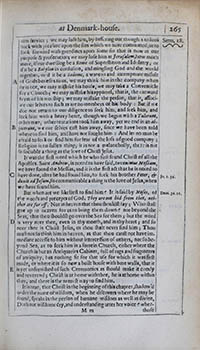 at Denmark-house.
265
Serm.18.
at Denmark-house.
265
Serm.18.
him service; we may lose him, by snfferingsuffering our thoughts to look
back with pleasure upon the sins which we have committed, or to
look forward with greedines upon some sin that is now in our
purpose & prosecution; we may lose him at Jerusalem, how much
more, if our dwelling be a Rome of Superstition and Idolatry, or
if it be a Babylon in confusion, and mingling God and the world
together, or if it be a Sodome, a wanton and intemperate misuse
of Gods benefits to us, we may think him in the company when
he is not, we may mistake his house, we may take a Conventicle
for a Church; we may mistake his apparrel, that is, the outward
form of his worship; we may mistake the person, that is, associ-
ate our selves to such as are no members of his body: But if we
doe not return to our diligence to seek him, and seek him, and
seek him with a heavy heart, though we begun with a Tulerunt,
other men, other tentations took him away, yet we end in an ab-
jecerunt, we our selves cast him away, since we have been told
where to find him, and have not sought him: And let no man be
afraid to seek or find him for fear of the loss of good company;
Religion is no sullen thing, it is not a melancholly, there is not
so sociable a thing as the love of Christ Jesus. It was the first word which he who first found Christ of all the
Apostles, Saint Andrew, is noted to have said, Invenimus Messiam,
we have found the Messias, and it is the first act that he is noted to
have done, after he had found him, to seek his brother Peter,Jo. 1.34. &
duxit ad Jesum, so communicable a thing is the love of Jesus, when
we have found him. But when are we likeliest to find him? It is said by Moses,Deut. 30.11. of
the words and precepts of God. They are not hid from thee, nei-
ther are far off, Not in heaven that thou shouldst say; Who shall
goe up to heaven for us to bring them down? nor beyond the
Seas, that thou shouldst go over the Sea for them; but the word
is very neer thee, even in thy mouth, and in thy heart; and so
neer thee is Christ Jesus, or thou shalt never find him; Thou
must not so think him in heaven, as that thou canst not have im-
mediate accesse to him without intercession of others, nor so be-
yond Sea, as to seek him in a forrein Church, either where the
Church is but an Antiquaries Cabinet, full of rags and fragments
of antiquity, but nothing fit for that use for which it was first
made, or where it is so new a built house with bare walls, that it
is yet unfurnished of such Ceremonies as should make it comly
and reverend; Christ is at home with thee, he is at home within
thee, and there is the neerest way to find him. It is true, that Christ in the beginning of this chapter, shadow'd
under the name of wisdom, when he discovers where he may be
found, speaks in the person of humane wisdom as well as divine,
Doth not wisdome cry, and understanding utter her voice? wher- Mm
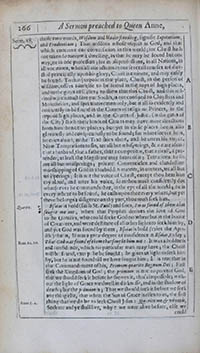 A Sermon preached to Queen Anne,
266
Serm.18.
A Sermon preached to Queen Anne,
266
Serm.18.
those two words, Wisdom and Understanding, signifie Sapientiam,
and Prudentiam; That wisdom whose object is God, and that
which concerns our conversation in this world; for Christ hath
not taken so narrow a dwelling, as that he may be found but one
way, or in one profession; for in all professions, in all Nations, in
all vocations, when all our actions in our severall courses are dire-
cted principally upon his glory, Christ is eminent, and may easily
be found. To that purpose in that place, Christ, in the person of
wisdom, offers himselfe to be found in the tops of high places,
and in the gates of Cities; to shew that this Christ, and this wis-
dom which must save our Soules, is not confined to Cloysters and
Monasteries, and speculative men only, but is all so evidently and
eminently to be found in the Courts of religious Princes, in the
tops of high places, and in the Courts of Justice (in the gates of
the City) Both these kinds of Courts may have more directions
from him then other places; but yet in these places hee is also
gloriously and conspicuously to be found; for wheresoever he is,
he cries aloud, as the Text saies there, and he utters his voyce.
Now Temptations to sin, are all but whisperings, & we are afraid
that a husband, that a father, that a competitor, that a rivall, a pre-
tender, at least the Magistrate may heare of it: Tentations to sin
are all but whisperings; private Conventicles and clandestine
worshipping of God in a forbidden manner, in corners, are all but
whisperings; It is not the voice of Christ, except thou hear him
cry aloud, and utter his voice, so as thou maist confidently doe
whatsoever he commands thee, in the eye of all the world; he is
every where to be found, he calls upon thee every where, but yet
there belongs a diligence on thy part, thou must seek him. Quærere.Esaias is bold (saith St. Paul) and saies, I was found of them that
sought me not, when that Prophet derives the love of God
to the Gentiles, who could seeke God no where but in the booke
of Creatures, and were destitute of all other lights to seek him by,
and yet God was found by them; Esaias is bold (cries the Apo-
stle) that is, It was a great degree of confidence in Esaias, to say;
That God was found of them that sought him not:Rom. 10.20. It was a boldness
and confidence, which no particular man may have; that Christ
will be found, except he be sought; he gives us light to seek him
by, but he is not found till we have sought him; It is true that in
that Commandement of his, Primum quærite Regnum Dei; First
seek the Kingdom of God; the primum is not to prevent God,
that we should seek it before he shewes it, that's impossible; with-
out the light of Grace we dwell in darknesse, and in the shadow of
death; but the primum is; That we should seek it before we seek
any thing else, that when the Sun of Grace is risen to us, the first
thing that we do be to seek Christ Jesus:Amos 5.4. Quærite me & vivetis,
Seek me and ye shall live, why? we were alive before, else we
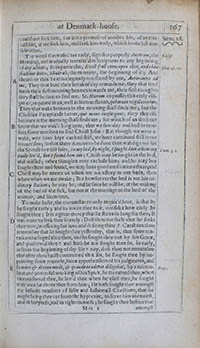 at Denmark-house.
267
Serm.18.
at Denmark-house.
267
Serm.18.
could not seek him, but it is a promise of another life, of an eter-
nall life, if we seek him, and seek him early, which is our last con-
sideration. The word there used for early, signifies properly Auroram,Early. the
Morning, and is usually transfer'd in Scriptures to any beginning
of any action; so in particular, Evill shall come upon thee,Esay 47.11. and thou
shalt not know, Shakrah, the morning, the beginning of it; And
therefore this Text is elegantly translated by one, Aurorantes ad
me, They that have their break of day towards me, they that send
forth their first morning beames towards me, their first thoughts
they shall be sure to find me. St. Hierom expresses this early dili-
gence, required in us, well in his translation, qui mane vigilaverint;
They that wake betimes in the morning shall finde me; but the
Chaldee Paraphrase better, qui mane consurgunt, they that rise
betimes in the morning shall finde me; for which of us doth not
know that we wak'd long agoe, that we saw day and had hereto-
fore some motions to find Christ Jesus: But though we were a-
wake, wee have kept our bed still, we have continued still in our
former sins; so that there is more to be done then waking: we see
the Spouse her self saies, In my bed, by night,Cant. 3.1. I sought him whom my
Soule lov'd, but I found him not; Christ may be sought in the bed,
and missed; other thoughts may exclude him; and he may bee
sought there and found, we may have good meditations there; and
Christ may be neerer us when we are asleep in our beds, then
when whenwhen we are awake; But howsoever the bed is not his or-
dinary station; he may be, and he saies he will be, at the making
of the bed of the sick, but not at the marriage of the bed of the
wanton, and licentious. To make haste, the circumstance only requir'd here, is that he
be sought early; and to invite thee to it, consider how early he
sought thee; It is a great mercy that he staies so long for thee; It
was more to seek thee so early: Dost thou not feele that he seeks
thee now, in offering his love and desiring thine? Canst not thou
remember that he sought thee yesterday, that is, that some ten-
tations besieged thee then, and he sought thee out by his Grace,
and preserved thee? and hath he not sought thee so, so early,
as from the beginning of thy life? nay, dost thou not remember
that after thou hadst committed that sin, he sought thee by im-
printing some remorse, some apprehension of his judgments, and
so miro & divino modo, & quando te oderat diligebat,Grego. by a miracu-
lous and powerful working of his Spirit, he threatned thee, when
he comforted thee, he lov'd thee when he chid thee, he sought
thee wen he drove thee from him; He hath sought thee amongst
the infinite numbers of false and fashionall Christians, that he
might bring thee out from the hypocrite, to serve him in earnest,
and in holyness, and in righteousness; he sought thee before that
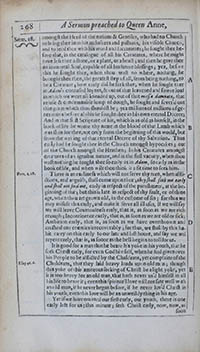 A Sermon preached to Queen Anne,
268
Serm.18.
A Sermon preached to Queen Anne,
268
Serm.18.
amongst the Herd of the nations & Gentiles, who had no Church
to bring thee into his inclosures and pastures, his visible Church,
and to feed thee with his word and sacraments; he sought thee be-
fore that, in the catalogue of all his Creatures, where he might
have left thee a stone, or a plant, or a beast; and then he gave thee
an immortal Soul, capable of all his future blessings; yea, before
this he sought thee, when thou wast no where, nothing, he
brought thee then, the greatest step of all, from being nothing, to
be a Creature; how early did he seek thee, when he sought thee
in Adam's confused loynes, & out of that leavened and sowre loaf
in which we were all kneaded up, out of that massa damnata, that
refuse & condemnable lump of dough, he sought and sever'd out
that grain which thou shouldst be; yea millions of millions of ge-
nerations before al this he sought thee in his own eternal Decree;
And in that first Scripture of his, which is as old as himself, in the
book of life he wrote thy name in the blood of that Lamb which
was slain for thee, not only from the beginning of this world, but
from the writing of that eternal Decree of thy Salvation. Thus
early had he sought thee in the Church amongst hypocrites; out
of the Church amongst the Heathen; In his Creatures amongst
creatures of an ignoble nature, and in the first vacuity, when thou
wast nothing he sought thee so early as in Adam, so early as in the
book of life, and when wilt thou think it a fit time to seek him. Prov. 1.28.There is an earliness which will not serve thy turn, when affli-
ctions, and anguish, shall come upon thee; they shall seek me early
and shall not find me, early in respect of the punishment, at the be-
ginning of that; but this is late in respect of thy fault, or of thine
age, when thou art grown old, in the custome of sin; for thus we
may misuse this early, and make it serve all ill uses, if we will say
we will leave Covetousness early, that is, as soon as we are rich
enough; Incontinence early, that is, as soon as we are old or sick;
Ambition early, that is, as soon as we have overthrown and
crushed our enemies irrecoverably; for thus, we shall by this ha-
bit carry on this early to our late and last houre, and say we wil
repent early, that is, as soone as the bell begins to toll for us. It is good for a man that he beare his yoke in his youth, that he
seek Christ early, for even God himself, when he had given over
his People to be afflicted by the Chaldeans, yet complains of the
Chaldeans,Esay 46.6. that they laid heavy loads upon old men; though
this yoke of this amorous seeking of Christ be a light yoke, yet
it is too heavy for an old man, that hath never us'd himself in all
his life to beare it; even this spirituall love will not sute well with
an old man, if he never began before, if he never lov'd Christ in
his youth, even this love will be an unweildy thing in his age. Yet if we have omitted our first early, our youth, there is one
early left for us; this minute; seek Christ early, now, now, as
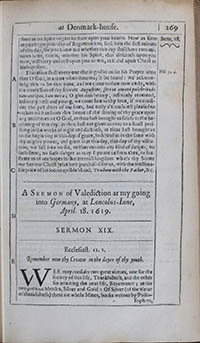 at Denmark-house.
269
Serm.18.
at Denmark-house.
269
Serm.18.
soon as his Spirit begins to shine upon your hearts. Now as soon
as you begin your day of Regeneration, seek him the first minute
of this day, for you know not whether this day shall have two mi-
nutes or no, that is, whether his Spirit, that descends upon you
now, will tarry and rest upon you or not, as it did upon Christ at
his baptisme. Therefore shall every one that is godlie make his Prayer untoPsal. 32.6.
thee O God, in a time when thou may'st be found: we acknow-
ledg this to be that time, and we come to thee now early, with
the confession of thy servant Augustine, sero te amavi pulchritudo
tam antiqua, tam nova; O glorious beauty, infinitely reverend,
infinitely fresh and young, we come late to thy love, if we consi-
der the past daies of our lives, but early if thou beest pleased to
reckon with us from this houre of the shining of thy grace upon
us; and therefore O God, as thou hast brought us safely to the be-
ginning of this day, as thou hast not given us over to a finall peri-
shing in the works of night and darkness, as thou hast brought us
to the beginning of this day of grace, so defend us in the same with
thy mighty power, and grant that this day, this day of thy visita-
tion, we fall into no sin, neither run into any kind of danger, no
such sinne, no such danger as may separate us from thee, or fru-
strate us of our hopes in that eternall kingdom which thy Sonne
our Saviour Christ Jesus hath purchased for us, with the inestima-
ble price of his incorruptible blood. To whom with the Father, &c. A Sermon of Valediction at my going
into Germany, at Loncolns-Inne,
April. 18. 1619.
SERMON XIX. Ecclesiast. 12.1.
Remember now thy Creator in the dayes of thy youth. WEEWe may considerconsider two great virtues, one for the
society of this life, Thankfulness, and the other
for attaining the next life, Repentance; as the
two pretious Mettles, Silver and Gold: Of Silver (of the virtue
of thankfulness) there are whole Mines, books written by Philo-
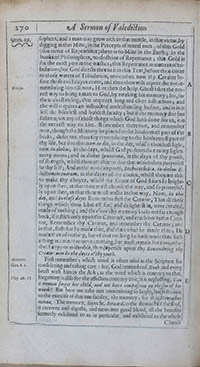 A Sermon of Valediction
270
Serm.19.
A Sermon of Valediction
270
Serm.19.
sophers, and a man may grow rich in that mettle, in that virtue, by
digging in that Mine, in the Precepts of moral men; of this Gold
(this virtue of Repentance) there is no Mine in the Earth; in the
books of Philosophers, no doctrine of Repentance; this Gold is
for the most part in the washes; this Repentance in matters of tri-
bulation; but God directs thee to it in this Text, before thou come
to those waters of Tribulation, remember now thy Creator be-
fore those evill dayes come, and then thou wilt repent the not re-
membring him till now.Divisio. Here then the holy-Ghost takes the nee-
rest way to bring a man to God, by awaking his memory; for, for
the understanding, that requires long and cleer instruction; and
the will requires an instructed understanding before, and is in it
self the blindest and boldest faculty; but if the memory doe but
fasten upon any of those things which God hath done for us, it is
the neerest way to him. Remember therefore, and remember
now, though the Memory be placed in the hindermast part of the
brain, defer not thou thy remembring to the hindermost part of
thy life, but doe that now in die, in the day, whil'st thou hast light,
now in diebus, in the days, whilst God presents thee many lights,
many means; and in diebus juventatis, in the days of thy youth,
of strength, whilst thou art able to doe that which thou purposest
to thy self; And as the word imports, Bechucocheica, in diebus E-
lectionum tuarum, in the dayes of thy choice, whilst thou art able
to make thy choyce, whilst the Grace of God shines so bright-
ly upon thee, as that thou maist choose the way, and so powerful-
ly upon thee, as that thou maist walke in that way. Now, in this
day, and in these dayes Remember first the Creator, That all these
things which thou laborest for, and delightest in, were created,
made of nothing; and therfore thy memory looks not far enough
back, if it stick only upon the Creature, and reach not to the Crea-
tor, Remember thy Creator, and remember thy Creator; and
in that, first that he made thee, and then what he made thee; He
made thee of nothing, but of that nothing he hath made thee such
a thing as cannot return to nothing, but must remain for ever; whe-
ther happy or miserable, that depends upon thy Remembring thy
Creator now in the dayes of thy youth. Momento. First remember; which word is often used in the Scripture for
Gen. 8.1.considering and taking care: for, God remembred Noah and every
beast with him in the Ark; as the word which is contrary to that,
forgetting is also for the affection contrary to it,Esay. 48.15.Esay. 48.15. it is neglecting, Can
a woman forget her child, and not have compassion on the son of her
womb? But here we take not remembring so largly, but restrain it
to the exercise of that one faculty, the memory; for it is Stomachus
animae. The memory, sayes St. Bernard, is the stomach of the soul,
it receives and digests, and turns into good blood, all the benefits
formerly exhibited to us in particular, and exhibited to the whole
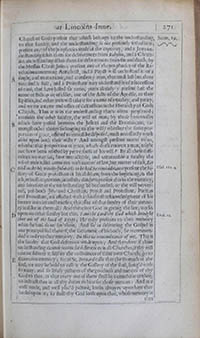 at Lincolns-Inne.
271
Serm.19.
at Lincolns-Inne.
271
Serm.19.
Church of God: present that which belongs to the understanding,
to that faculty, and the understanding is not presently setled in it;
present any of the prophecies made in the captivity, and a Jews un-
derstanding takes them for deliverances from Babylon, and a Christi-
ans understanding takes them for deliverances from sin and death, by
the Messias Christ Jesus; present any of the prophecies of the Re-
velation concerning Antichrist, and a Papist will understand it of a
single, and momentane, and transitory man, that must last but three
yeer and a half; and a Protestant may understand it of a succession
of men, that have lasted so 1000. yeers already: present but the
name of Bishop or of elder, out of the Acts of the Apostle, or their
Epistles, and other men will take it for a name of equality, and parity,
and we for a name and office of distinction in the Hierarchy of Gods
Church. Thus it is in the understanding that's often perplexed;
consider the other faculty, the will of man, by those bitternesses
which have passed between the Jesuits and the Dominicans, (a-
mongst other things belonging to the will) whether the same pro-
portion of grace, offered to men alike disposed, must necessarily work
alike upon both their wills? And amongst persons neerer to us,
whether that proportion of grace, which doth convert a man, might
not have been resisted by perversness of his will? By all these diffi-
culties we way see, how untractable, and untameable a faculty the
wil of man is. But come not with matter of law, but matter of fact, Let
God make his wonderful works to be had in remembrance:Psal. 111.4. present the hi-
story of Gods protection of his children, from the beginning, in the
ark, in both captivities, in infinite dangers; present this to the memory,
and howsoever the understanding be beclouded, or the will perver-
ted, yet both Jew and Christian, Papist and Protestant, Puritan
and Protestant, are affected with a thankfull acknowledgment of his
former mercies and benefits, this issue of that faculty of their memo-
ry is alike in them all: And therefore God in giving the law, works
upon no other faculty but this,Exod. 20. I am the Lord thy God which brought
thee out of the land of Egypt; He only presents to their memory
what he had done for them. And so in delivering the Gospel in
one principal seal thereof, the sacrament of his body, he recommen-
ded it only to their memory, Do this in remembrance of me. This is
the faculty that God desires to work upon; And therefore if thine
understanding cannot reconcile differences in all Churches, if thy will
cannot submit it self to the ordinances of thine own Church, go to
thine own memory; for as St. Bernard calls that the stomach of the
soul, we may be bold to call it the Gallery of the soul, hang'd with
so many, and so lively pictures of the goodness and mercies of thy
God to thee, as that every one of them shall be a catachism to thee,
to instruct thee in all thy duties to him for those mercies: And as a
well made, and well plac'd picture, looks alwayes upon him that
looks upon it; so shall thy God look upon thee, whose memory is
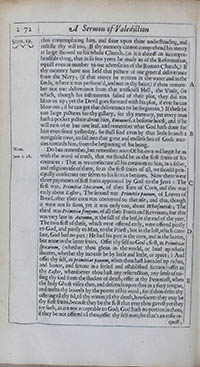 A Sermon of Valediction
272
Serm.19.
A Sermon of Valediction
272
Serm.19.
thus contemplating him, and shine upon thine understanding, and
rectifie thy will too. If thy memory cannot comprehend his mercy
at large shewed to his whole Church, (as it is almost an incompre-
hensible thing, that in so few yeers he made us of the Reformation,
equall even in number to our adversaries of the Roman Church,) If
thy memory have not held that picture of our general deliverance
from the Navy; (if that mercy be written in the water and in the
sands, where it was perform'd, and not in thy heart) if thou remem-
ber not our deliverance from that artificiall Hell, the Vault, (in
which, though his instruments failed of their plot, they did not
blow us up; yet the Devil goes forward with his plot, if ever he can
blow out; if he can get that deliverance to be forgotten.) If these be
too large pictures for thy gallery, for thy memory, yet every man
hath a pocket picture about him, Emanuel, a bosome book, and if he
will turn over but one leaf, and remember what God hath done for
him even since yesterday, he shall find even by that little branch a
navigable river, to sail into that great and endless Sea of Gods mer-
cies towards him, from the beginning of his being. Nunc.Do but remember, but remember now: Of his own wil begat he us
with the word of truth,Jam. 1.18. that we should be as the first fruits of his
creatures: That as we consecrate all his creatures to him, in a sober,
and religious use of them, so as the first fruits of all, we should prin-
cipally consecrate our selves to his service betimes. Now there were
three payments of first fruits appointed by God to the Jews: The
first was, Primitiæ Spicarum, of their Ears of Corn, and this was
early about Easter; The second was Primitiæ panum, of Loaves of
Bread, after their corn was converted to that use; and this, though
it were not so soon, yet it was early too, about Whitsontide; The
third was Primitiæ frugum, of all their Fruits and Revenues; but this
was very late in Autumn, at the fall of the leaf, in the end of the yeer.
The two first of these, which were offered early, were offered partly
to God, and partly to Man, to the Priest; but in the last, which came
late, God had no part: He had his part in the corn, and in the loaves,
but none in the latter fruits. Offer thy self to God; first, as Primitias
spicarum, (whether thou glean in the world, or bind up whole
sheaves, whether thy increase be by little and little, or apace;) And
offer thy self, as primitias panum, when thou hast kneaded up riches,
and honor, and favour in a setled and established fortune) offer at
thy Easter, whensoever thou hast any resurrection, any sense of rai-
sing thy soul from the shadow of death; offer at thy Pentecost, when
the holy Ghost visits thee, and descends upon thee in a fiery tongue,
and melts thy bowels by the power of his word; for if thou defer thy
offering til thy fal, til thy winter, til thy death, howsoever they may be
thy first fruits, because they be the first that ever thou gavest yet they
are such, as are not acceptable to God; God hath no portion in them,
if they be not offered til then; offer thy self now; for that's an easie re-
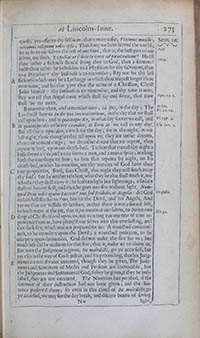 at Lincolns-Inne.
273
Serm.19.
at Lincolns-Inne.
273
Serm.19.
quest; yea offer to thy self now, that's more easie; Viximus mundo;
vivamus reliquum nobis ipsis; Thus long we have served the world;
Basil. let us serve our selves the rest of our time, that is, the best part of our
selves, our souls, Expectas ut febris te vocet ad pœnitentiam? Hadst
thou rather a sickness should bring thee to God, than a sermon?
Idem. hadst thou rather be beholden to a Physitian for thy salvation, than
to a Preacher? thy business is to remember; stay not for thy last
sickness, which may be a Lethargy in which thou mayest forget thine
own name, and his that gave thee the name of a Christian, Christ
Jesus himself: thy business is to remember, and thy time is now;
stay not till that Angel come which shall say and swear,Apo. 10 6. that time
shall be no more. Remember then, and remember now; In Die, in the day;In Die. The
Lord will hear us In die qua invocaverimus, in the day that we shall Ps. 20.10.
call upon him; and in quacunque dei, in what day soever we call,Ps. 137.4. and
in quacunque die velociter exaudiet, as soon as we call in any day.Psa. 101.1
But all this is Opus diei, a work for the day; for in the night, in our
last night, those thoughts that fall upon us, they are rather dreams,
then true remembrings; we do rather dream that we repent, then
repent indeed, upon our death-bed. To him that travails by night a
bush seems a tree, and a tree seems a man, and a man a spirit; nothing
hath the true shape to him; to him that repents by night, on his
death-bed, neither his own sins, nor the mercies of God have their
true proportion. Fool, saies Christ, this night they will fetch away
thy soul; but he neither tels him, who they be that shall fetch it, nor
whether they shall carry it; he hath no light but lightnings; a sodain
flash of horror first, and then he goes into fire without light. Num-
quid Deus nobis ignem pacavit? non, sed Diabolo, et Angelis:Chrysosto. did God
ordain hell fire for us? no, but for the Devil, and his Angels. And
yet we that are vessels so broken, as that there is not a sheard left,
to fetch water at the pit, that is, no means in our selves,Esa. 30. to derive one
drop of Christs blood upon us, nor to wring out one tear of true re-
pentance from us, have plung'd our selves into this everlasting, and
this dark fire, which was not prepared for us: A wretched covetous-
ness, to be intruders upon the Devil; a wretched ambition, to be
usurpers upon damnation. God did not make the fire for us; but
much less did he make us for that fire; that is, make us to damn us.
But now the Judgment is given, Ite maledicti, go ye accursed; but
yet this is the way of Gods justice, and his proceeding, that his Judg-
ments are not alwaies executed, though they be given. The Judg-
ments and Sentences of Medes and Persians are irrevocable, but
the Judgments and Sentences of God, if they be given, if they be pub-
lished, they are not executed. The Ninevites had perished, if the
sentence of their destruction had not been given; and the sen-
tence preserv'd them; so even in this cloud of Ite maledicti, go
ye accursed, we may see the day break, and discern beams of saving Nn
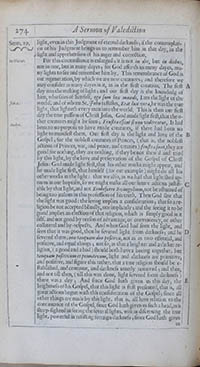 A Sermon of Valediction
274
Serm.19.
A Sermon of Valediction
274
Serm.19.
light, even in this Judgment of eternal darkness; if the contemplati-
on of his Judgment brings us to remember him in that day, in the
light and apprehension of his anger and correction. In Diebus.For this circumstance is enlarged; it is not in die, but in diebus,
not in one, but in many dayes; for God affords us many dayes, ma-
ny lights to see and remember him by. This remembrance of God is
our regeneration, by which we are new creatures; and therefore we
may consider as many dayes in it, as in the first creation. The first
day was the making of light; and our first day is the knowledg of
him, who saies of himself, ego sum lux mundi, I am the light of the
world,Joh. 1. and of whom St. John testifies, Erat lux vera, he was the true
light, that lighteth every man into the world. This is then our first
day the true passion of Christ Jesus. God made light first, that the o-
ther creatures might be seen;Ambro. Frustra essent si non viderentur, It had
been to no purpose to have made creatures, if there had been no
light to manifest them. Our first day is the light and love of the
Gospel; for the noblest creatures of Princes, (that is, the noblest
actions of Princes, war, and peace, and treaties) frustra sunt, they are
good for nothing, they are nothing, if they be not shew'd and tried
by this light, by the love and preservation of the Gospel of Christ
Jesus: God made light first, that his other works might appear, and
he made light first, that himself (for our example) might do all his
other works in the light: that we also, as we had that light shed up-
on us in our baptism, so we might make all our future actions justifi-
able by that light, and not Erubescere Evangelium, not be ashamed of
being too jealous in this profession of his truth. Then God saw that
the light was good: the seeing implies a consideration; that so a re-
ligion be not accepted blindly, nor implicitly; and the seeing it to be
good implies an election of that religion, which is simply good in it
self, and not good by reason of advantage, or conveniency, or other
collateral and by-respects. And when God had seen the light, and
seen that it was good, then he severed light from darkness; and he
severed them, non tanquam duo positiva, not as as two essential, and
positive, and equal things; not so, as that a brighter and a darker re-
ligion, (a good and a bad) should both have a beeing together, but
tanquam positivum et primitivum, light and darkness are primitive,
and positive, and figure this rather, that a true religion should be e-
stablished, and continue, and darkness utterly removed; and then,
and not till then, (till this was done, light severed from darkness)
there was a day; And since God hath given us this day, the
brightness of his Gospel, that this light is first presented, that is, all
great actions begun with this consideration of the Gospel; since all
other things are made by this light, that is, all have relation to the
continuance of the Gospel, since God hath given us such a head, as is
sharp-sighted in seeing the several lights, wise in discerning the true
light, powerful in resisting forraign darkness; since God hath given
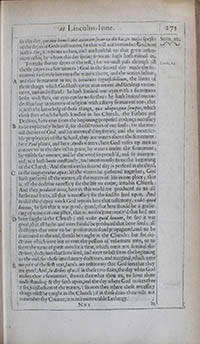 at Lincolns-Inne.
275
Serm.20.Serm.19.
at Lincolns-Inne.
275
Serm.20.Serm.19.
us this day, qui non humiliabit animam suam in die hac, as Moses speaks
of the dayes of Gods institution, he that will not remember God now
in this day, is impious to him; and unthankful to that great instru-
ment of his, by whom this day spring from an high hath visited us. To make shorter dayes of the rest,Levit. 23. (for we must pass through all
the six dayes in a few minuts) God in the second day made the fir-
mament to divide between the waters above, and the waters below;
and this firmament in us, is terminus cognoscibilium, the limits of
those things which God hath given man means and faculties to con-
ceive, and understand: he hath limited our eyes with a firmament
beset with stars, our eyes can see no farther: he hath limited our un-
derstanding in matters of religion with a starry firmament too; that
is, with the knowledg of those things, quæ ubique, quæ semper, which
those stars which he hath kindled in his Church, the Fathers and
Doctors, have ever from the beginning proposed as things necessary
to be explicitely believ'd, for the salvation of our souls; for the eter-
nal decrees of God, and his unreveal'd mysteries, and the inextrica-
ble perplexities of the School, they are waters above the firmament:
here Paul plants, and here Apollo waters; here God raises up men to
convey to us the dew of his grace, by waters under the firmament;
by visible sacraments, and by the word so preach'd, and so interpre-
ted, as it hath been constantly, and unanimously from the beginning
of the Church. And therefore this second day is perfited in the third,
in the congregentur aquæ, let the waters be gathered together; God
hath gathered all the waters, all the waters of life in one place; that
is, all the doctrine necessary for the life to come, into his Church:
And then producet terra, here in this world are produced to us all
herbs and fruits, all that is necessary for the soul to feed upon. And
in this third daies work God repeats here that testimony, videt quod
bonum, he saw that it was good; good, that here should be a gathe-
ring of waters in one place, that is, no doctrine receiv'd that had not
been taught in the Church; and videt quod bonum, he saw it was
good, that all herbs and trees should be produced that bore seed; all
doctrines that were to be proseminated and propagated, and to be
continued to the end, should be taught in the Church: but for do-
ctrines which were but to vent the passion of vehement men, or to
serve the turns of great men for a time, which were not seminal do-
ctrines, doctrines that bore seed, and were to last from the beginning
to the end; for these interlineary doctrines, and marginal, which were
no part of the first text, here's no testimony that God sees that they
are good. And, In diebus istis, if in these two daies, the day when God
makes thee a firmament, shewes thee what thou art, to limit thine
understanding & thy faith upon, and the day where God makes thee
a sea, a collection of the waters, (showes thee where these necessary
things must be taught in the Church) if in those daies thou wilt not
remember thy Creator, it is an irrecoverable Lethargy.
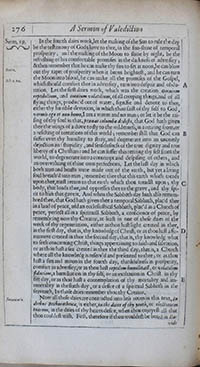 A Sermon of Valediction
276
Serm.19.
A Sermon of Valediction
276
Serm.19.
In the fourth daies work, let the making of the Sun to rule the day
be the testimony of Gods love to thee, in the sunshine of temporal
prosperity, and the making of the Moon to shine by night, be the
refreshing of his comfortable promises in the darkness of adversity;
& then remember that he can make thy sun to set at noon, he can blow
out thy taper of prosperity when it burns brightest,Amos. and he can turn
the Moon into blood,Act. 2.20. he can make all the promises of the Gospel,
which should comfort thee in adversity, turn into despair and obdu-
ration. Let the firstfifth daies work, which was the creation Omnium
reptibilium, and omnium volatilium, of all creeping things, and of all
flying things, produc'd out of water, signifie and denote to thee,
either thy humble devotion, in which thou saist of thy self to God,
vermis ego et non homo, I am a worm and no man; or let it be the rai-
sing of thy soul in that, pennas columbæ dedisti, that God hath given
thee the wings of a dove to fly to the wilderness, in a retiring from, or
a resisting of tentations of this world; remember still that God can
suffer even thy humility to stray, and degenerate into an uncomly
dejection and stupidity, and senselesness of the true dignity and true
liberty of a Christian: and he can suffer this retiring thy self from the
world, to degenerate into a contempt and despising of others, and
an overvaluing of thine own perfections. Let the last day in which
both man and beasts were made out of the earth, but yet a living
soul breath'd into man; remember thee that this earth which treads
upon thee, must return to that earth which thou treadst upon; thy
body, that loads thee, and oppresses thee to the grave, and thy spi-
rit to him that gave it. And when the Sabbath day hath also remem-
bred thee, that God hath given thee a temporal Sabbath, plac'd thee
in a land of peace, and an ecclesiastical Sabbath, plac'd in a Church of
peace, perfect all in a spirituall Sabbath, a conscience of peace, by
remembring now thy Creator, at least in one of these daies of the
week of thy regeneration, either as thou hast light created in thee,
in the first day, that is, thy knowledg of Christ; or as thou hast a fir-
mament created in thee the second day, that is, thy knowledg what
to seek concerning Christ, things appertaining to faith and salvation;
or as thou hast a sea created in thee the third day, that is, a Church
where all the knowledg is reserv'd and presented to thee; or as thou
hast a sun and moon in the fourth day, thankfulness in prosperity,
comfort in adversity, or as thou hast reptilem humilitate?, or volatilem
fiduciam, a humiliation in thy self, or an exaltation in Christ in thy
fiftfifth day, or as thou hast a contemplation of thy mortality and im-
mortality in the sixth day, or a desire of a spiritual Sabbath in the
seaventh, In those daies remember thou thy Creator. JuventutisNow all these daies are contracted into less room in this text, In
diebus Bechurotheica, is either, in the daies of thy youth, or electionem
tuarum, in the daies of thy hearts desire, when thou enjoyest all that
thou couldest wish. First, therefore if thou wouldest be heard in Da-
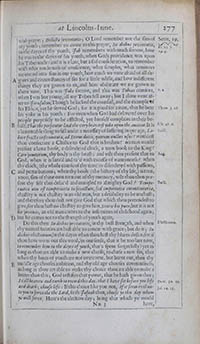 at Lincolns-Inne.
277
Serm.19.
vids prayer; Delicta juventutis; O Lord remember not the sins of
at Lincolns-Inne.
277
Serm.19.
vids prayer; Delicta juventutis; O Lord remember not the sins of
Ps. 25.7.my youth; remember to come to this prayer, In diebus juventutis,
29.4.in the dayes of thy youth. Job remembers with much sorrow, how
he was in the dayes of his youth, when Gods providence was upon
his Tabernacle: and it is a late, but a sad consideration, to remember
with what tenderness of conscience, what scruples, what remorces
we entred into sins in our youth, how much we were afraid of all de-
grees and circumstances of sin for a little while, and how indifferent
things they are grown to us, and how obdurate we are grown in
them now. This was Jobs sorrow, and this was Tobias comfort,
1.4. when I was but young, all my Tribes fell away; but I alone went af-
ter to Jerusalem. Though he lacked the counsail, and the example of
his Elders, yet he served God; for it is good for a man,Thren. 3.27. that he bear
his yoke in his youth: For even when God had delivered over his
people purposely to be afflicted, yet himself complains in their be-
half, That the persecutor laid the very heaviest yoke upon the ancient:Esa. 47.6. It is
a lamentable thing to fall under a necessity of suffering in our age,Basil. La-
bore fracta instrumenta, ad Deum ducis, quorum nullus usus? wouldest
thou consecrate a Chalice to God that is broken? no man would
present a lame horse, a disordered clock, a torn book to the King?
Caro jumentum, thy body is thy beast;Aug. and wilt thou present that to
God, when it is lam'd and tir'd with excesse of wantonness? when
thy clock, (the whole course of thy time) is disordered with passions,
and perturbations; when thy book (the history of thy life,) is torn,
1000. sins of thine own torn out of thy memory, wilt thou then pre-
sent thy self thus defac'd and mangled to almighty God?Basil. Tempe-
rantia non est temperantia in senectute, sed impotentia incontinentiæ,
chastity is not chastity in an old man, but a desability to be unchast;
and therefore thou dost not give God that which thou pretendest to
give, for thou hast no chastity to give him. Senex bis puer; but it is not
bis juvenis, an old man comes to the infirmities of childhood again;
but he comes not to the strength of youth again,. Do this then In diebus juventutis, in thy best strength,Electionum. and when
thy natural facutiesfaculties are best able to concur with grace; but do it; In
diebus electionum, in the dayes when thou hast thy hearts desire; for if
thou have worn out this word, in one sense, (that it be too late now,
to remember him in the dayes of youth, that's spent forgetfully) yet as
long as thou art able to make a new choise, to chuse a new sin, that
when thy heats of youth are not overcome, but burnt out, then thy
middle age chooses ambition, and thy old age chooses covetousness;
as long as thou art able to make thy choice thou art able to make a
better than this; God testifies that power, that he hath given thee;
I call heaven and earth to record this day,Deut. 30.19. that I have set before you life
and death; choose life: If this choice like you not,Jos. 14.15.Jos. 24.15. If it seem evil un-
to you to serve the the Lord, saith Josuah then, choose ye this day whom
ye will serve. Here's the election day; bring that which ye would
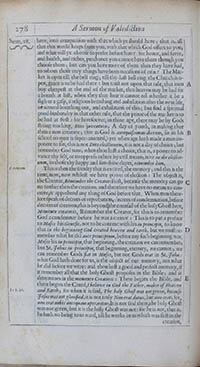 A Sermon of Valediction
278
Serm.18.Serm.19.
A Sermon of Valediction
278
Serm.18.Serm.19.
have, into comparison with that which ye should have; that is, all
that this world keeps from you, with that which God offers to you;
and what will ye choose to prefer before him? for honor, and favor,
and health, and riches, perchance you cannot have them though you
choose them; but can you have more of them than they have had,
to whom those very things have been occasions of ruin? The Mar-
ket is open till the bell ring; till thy last bell ring the Church is o-
pen, grace is to be had there: but trust not upon that rule, that men
buy cheapest at the end of the market, that heaven may be had for
a breath at last, when they that hear it cannot tel whether it be a
sigh or a gasp, a religious breathing and anhelation after the next life,
or natural breathing out, and exhalation of this; but find a spiritual
good husbandry in that other rule, that the prime of the market is to
be had at first: for howsoever, in thine age, there may be by Gods
strong working, Dies juventutis, A day of youth, in making thee
then a new creature; (for as God is antiquissimus dierum, so in his
school no man is super-annated,) yet when age hath made a man im-
potent to sin, this is not Dies electionum, it is not a day of choice; but
remember God now, when thou hast a choice, that is, a power to ad-
vance thy self, or to oppress others by evil means; now in die electio-
num, in those thy happy and sun-shine dayes, remember him. Creatorem.This is then the faculty that is excited, the memory; and this is the
time, now, now whilest we have power of election: The object is,
the Creator, Remember the Creator: First, because the memory can go
no farther then the creation; and therefore we have no means to con-
ceive, or apprehend any thing of God before that. When men there-
fore speak of decrees of reprobation, decrees of condemnation, before
decrees of creation; this is beyond the counsail of the holy Ghost here,
Memento creatoris, Remember the Creator, for this is to remember
God a condemner before he was a creator: This is to put a preface
to Moses his Genesis, not to be content with his in principio, to know
that in the beginning God created heaven and earth, but we must re-
member what he did ante principium, before any such beginning was.
Moses his in principio, that beginning, the creation we can remember;
but St. Johns in principio, that beginning, eternity, we cannot; we
can remember Gods fiat in Moses, but not Gods erat in St. John:
what God hath done for us, is the object of our memory, not what
he did before we were: and thou hast a good and perfect memory, if
it remember all that the holy Ghost proposes in the Bible; and it
determines in the memento Creatoris: There begins the Bible, and
there begins the Creed, I believe in God the Father, maker of Heaven
and Earth;Jo 7.39. for when it is said, The holy Ghost was not given, because
Jesus was not glorified, it is not truly Non erat datus, but non erat; for,
non erat nobis antequam operaretur; It is not said there, the holy Ghost
was not given, but it is the holy Ghost was not: for he is not, that is,
he hath no being to us ward, till he works in us which was first in the
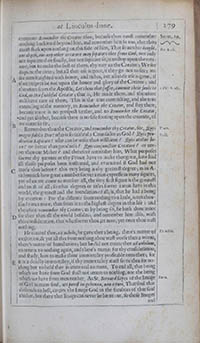 at Lincolns-Inne.
279
Serm.19.
at Lincolns-Inne.
279
Serm.19.
creation: Remember the Creator then, because thou canst remember
nothing backward beyond him, and remember him so too, that thou
maist stick upon nothing on this side of him, That so neither height,
Ro. 8. ult. nor depth, nor any other creature may separate thee from God; not only
not separate thee finally, but not separate so, as to stop upon the crea-
ture, but to make the best of them, thy way to the Creator; We see
ships in the river; but all their use is gone, if they go not to sea; we
see men fraighted with honor, and riches, but all their use is gone, if
their respect be not upon the honor and glory of the Creator; and
therefore sayes the Apostle, Let them that suffer,1 Pet 4. ult. commit their souls to
God, as to a faithful Creator; that is, He made them, and therefore
will have care of them. This is the true contracting, and the true
extending of the memory, to Remember the Creator, and stay there,
because there is no prospect farther, and to Remember the Creator,
and get thither, because there is no safe footing upon the creature, til
we come so far. Remember then the Creator, and remember thy Creator, for,Tuum. Quis
magis fidelis Deo? who is so faithful a Counsailor as God? Basil. Quis pru-
dentior Sapiente? who can be wiser than wisdome? Quis utilior bo-
no? or better than goodness? Quis conjunctior Creatore? or nee-
rer then our Maker? and therefore remember him. What purposes
soever thy parents or thy Prince have to make thee great, how had
all those purposes been frustrated, and evacuated if God had not
made thee before? this very being is thy greatest degree; as in A-
rithmatick how great a number soever a man expresse in many figures,
yet when we come to number all, the very first figure is the greatest
and most of all; so what degrees or titles soever a man have in this
world, the greatest and the foundation of all, is, that he had a being
by creation: For the distance from nothing to a little, is ten thou-
sand times more, than from it to the highest degree in this life: and
therefore remember thy Creator, as by being so, he hath done more
for thee than all the world besides; and remember him also, with
this consideration, that whatsoever thou art now, yet once thou wast
nothing. He created thee, ex nihilo, he gave thee a being,Ex nihilo. there's matter of
exaltation, & yet all this from nothing; thou wast worse then a worm,
there's matter of humiliation; but he did not create thee ad nihilum,
to return to nothing again, and there's matter for thy consideration,
and study, how to make thine immortality profitable unto thee; for
it is a deadly immortality, if thy immortality must serve thee for no-
thing but to hold thee in immortal torment. To end all, that being
which we have from God shall not return to nothing, nor the being
which we have from men neither.Bern. As St. Bernard sayes of the Image
of God in mans soul, uti potest in gehenna, non exuri, That soul that
descends to hell, carries the Image God in the faculties of that soul
thither, but there that Image can never be burnt out, so those Images
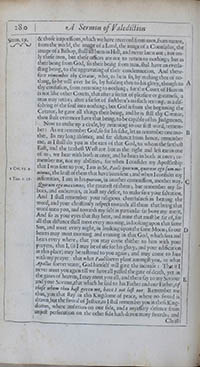 A Sermon of Valediction
280
Serm.19.
A Sermon of Valediction
280
Serm.19.
& those impressions, which we have received from men, from nature,
from the world, the image of a Lord, the image of a Counsailor, the
image of a Bishop, shall all burn in Hell, and never burn out; not on-
ly these men, but these offices are not to return to nothing; but as
their being from God, so their being from man, shal have an everla-
sting being, to the aggravating of their condemnation. And there-
fore remember thy Creator, who, as he is so, by making thee of no-
thing, so he will ever be so, by holding thee to his glory, though to
thy confusion, from returning to nothing; for the Court of Heaven
is not like other Courts, that after a surfet of pleasure or greatness, a
man may retire; after a surfet of sin there's no such retiring, as a dis-
solving of the soul into nothing; but God is from the beginning the
Creator, he gave all things their being, and he is still thy Creator,
thou shalt evermore have that being, to be capable of his Judgments. Now to make up a circle, by returning to our first word, remem-
ber: As we remember God, so for his sake, let us remember one ano-
ther. In my long absence, and far distance from hence, remember
me, as I shall do you in the ears of that God, to whom the farthest
East, and the farthest West are but as the right and left ear in one
of us; we hear with both at once, and he hears in both at once; re-
member me, not my abilities; for when I consider my Apostleship
that I was sent to you, I am in St. Pauls quorum, quorum ego sum mi-
nimus,1 Cor. 15.9. the least of them that have been sent; and when I consider my
infirmities,1 Tim. 1.15. I am in his quorum, in another commission, another way,
Quorum ego maximus; the greatest of them; but remember my la-
bors, and endeavors, at least my desire, to make sure your salvation.
And I shall remember your religious cheerfulness in hearing the
word, and your christianly respect towards all them that bring that
word unto you, and towards my self in particular far bove my merit.
And so as your eyes that stay here, and mine that must be far of, for
all that distance shall meet every morning, in looking upon that same
Sun, and meet every night, in looking upon the same Moon; so our
hearts may meet morning and evening in that God, which sees and
hears every where; that you may come thither to him with your
prayers, that I, (if I may be of use for his glory, and your edification
in this place) may be restored to you again; and may come to him
with my prayer, that what Paul soever plant amongst you, or what
Apollos soever water, God himself will give the increase: That if I
never meet you again till we have all passed the gate of death, yet in
the gates of heaven, I may meet you all, and there say to my Saviour
and your Saviour, that which he said to his Father and our Father, Of
those whom thou hast given me, have I not lost one. Remember me
thus, you that stay in this Kingdome of peace, where no sword is
drawn, but the sword of Justice, as I shal remember you in those King-
domes, where ambition on one side, and a necessary defence from
unjust persecution on the other side hath drawn many swords; and
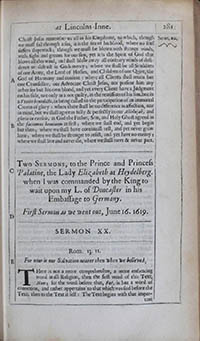 at Lincolns-Inne.
281
Serm.20.
at Lincolns-Inne.
281
Serm.20.
Christ Jesus remember us all in his Kingdome, to which, though
we must sail through a sea, it is the sea of his blood, where no soul
suffers shiprwack; though we must be blown with strange winds,
with sighs and groans for our sins, yet it is the Spirit of God that
blows all this wind, and shall blow away all contrary winds of diffi-
dence or distrust in Gods mercy; where we shall be all Souldiers
of one Army, the Lord of Hostes, and Children of one Quire, the
God of Harmony and consent: where all Clients shall retain but
one Counsellor, our Advocate Christ Jesus, nor present him any
other fee but his own blood, and yet every Client have a Judgment
on his side, not only in a not guilty, in the remission of his sins, but in
a Venite benedicti, in being called to the participation of an immortal
Crown of glory: where there shall be no difference in affection, nor
in mind, but we shall agree as fully & perfectly in our Allelujah, and
gloria in exelcis, as God the Father, Son, and Holy Ghost agreed in
the faciamus hominem at first; where we shall end, and yet begin
but then; where we shall have continuall rest, and yet never grow
lazie; where we shall be stronger to resist, and yet have no enemy;
where we shall live and never die, where we shall meet & never part. TWO Sermons, to the Prince and Princess
Palatine, the Lady Elizabeth at Heydelberg.
when I was commanded by the King to
wait upon my L. of Doncaster in his
Embassage to Germany.
First Sermon as we went out, June 16. 1619.
SERMON XX. Rom. 13.11.
For now is our Salvation nearer then when we believed,. THereThere is not a more comprehensive, a more embracing
word in all Religion, then the first word of this Text,
Now; for the word before that, For, is but a word of
connexion, and rather appertains to that which was said before the
Text, then to the Text it self: The Text begins with that impor-
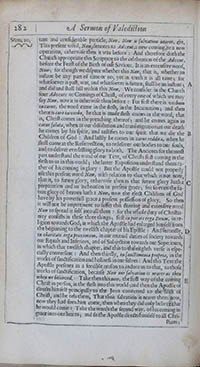 A Sermon of ValedictionA Sermon preached to the Prince
282
Serm.20.
tant and considerable particle, Now, Now is salvation nearer, &c.
A Sermon of ValedictionA Sermon preached to the Prince
282
Serm.20.
tant and considerable particle, Now, Now is salvation nearer, &c.
This present word, Now, denotes an Advent, a new coming, or a new
operation, otherwise then it was before: And therefore doth the
Church appropriate this Scripture to the celebration of the Advent,
before the Feast of the Birth of our Saviour. It is an extensive word,
Now; for though we dispute whether this Now, that is, whether an
instant be any part of time or no, yet in truth it is all time; for
whatsoever is past, was, and whatsoever is future, shall be an instant;
and did and shall fall within this Now. We consider in the Church
four Advents or Comings of Christ, of every one of which we may
say Now, now it is otherwise then before: For first there is verbum
in carne, the word came in the flesh, in the Incarnation; and then
there is caro in verbo, he that is made flesh comes in the word, that
is, Christ comes in the preaching thereof; and he comes again in
carne saluta, when at our dissolution and transmigration; at our death
he comes by his spirit, and testifies to our spirit that we die the
Children of God: And lastly he comes in carne reddita, when he
shall come at the Resurrection, to redeliver our bodies to our souls,
and to deliver everlasting glory to both. The Ancients for the most
part understand the word of our Text, of Christs first coming in the
flesh to us in this world; the latter Exposition understand them ra-
ther of his coming in glory: But the Apostle could not properly
use this present word Now, with relation to that which is not now,
that is, to future glory, otherwise then as that future glory hath a
preparation and an inchoation in present grace; for so even the fu-
ture glory of heaven hath a Now, now the elect Children of God
have by his powerfull grace a present possession of glory. So then
it will not be impertinent to suffer this flowing and extensive word
Now to spread it self into all three: for the whole duty of Christia-
nity consists in these three things; first in pietate erga Deum, in re-
ligion towards God; in which the Apostle had enlarged himself from
the beginning to the twelfth chapter of his Epistle: And secondly,
in charitate erga proximum, in our mutual duties of society towards
our Equals and Inferiors, and of Subjection towards our Superiours,
in which that twelfth chapter, and this to the eitghth verse is espe-
cially conversant: And then thirdly, in sanctimonia propria, in the
works of sanctification and holiness in our selves: And this Text the
Apostle presents as a forcible reason to induce us to that, to those
works of sanctification, because Now our salvation is nearer us then
when we believed. Take then this now, the first way of the coming
Christ in person, in the flesh into this world; and then the Apostle of
directs himself principally to the Jews converted to the faith of
Christ, and he tels them, That their salvation is nearer them now,
now they had seen him come, then when they did only believe that
he would come: Take the words the second way, of his coming in
grace into our hearts; and so the Apostle directs himself to all Chri-
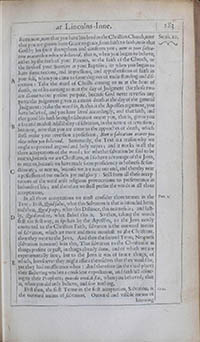 at Lincolns-Inne.and Princesse Palatine.
283
Serm.20.
stians; now, now that you have bin bred in the Christian Church, now
at Lincolns-Inne.and Princesse Palatine.
283
Serm.20.
stians; now, now that you have bin bred in the Christian Church, now
that you are grown from Grace to grace, from faith to faith, now that
God by his spirit strengthens and confirms you; now is your salva-
tion nearer then when ye believed, that is, when you began to believe,
either by the faith of your Parents, or the faith of the Church, or
the faith of your Sureties at your Baptism; or when you began to
have some notions, and impressions, and apprehensions of faith in
your self, when you came to some degrees of understanding and dis-
cretion: Take the word of Christs coming to us at the hour of
death, or of his coming to us at the day of Judgment (for those two
are all one to our present purpose, because God never reverses any
particular judgement given at a mans death at the day of the general
Judgment:) take the word so, & this is the Apostles argument, you
have believed, and you have lived accordingly, and that faith, and
that good life hath brought salvation nearer you, that is, given you
a fair and modest infallibility of salvation, in the nature of reversion;
but now, now that you are come to the approches of death, which
shall make your reversion a possession; Now is salvation nearer you
then when you believed. Summarily, the Text is a reason why we
ought to proceed in good and holy wayes; and it works in all the
three acceptations of the word; for whether salvation be said to be
near us, because we are Christians, and so have advantage of the Jews,
or near us, because we have made some proficiency in holiness & san-
ctimony; or near us, because we are near our end, and thereby near
a possession of our endless joy and glory: Still from all these accep-
tations of the word arise religious provocations to perseverance in
holiness of life; and therefore we shall pursue the words in all three
acceptations. In all three acceptations we must consider three termes in the
Text; First, Quid salus, what this Salvation is that is intended here;
Part. 1. and then, Quid prope, what this Distance, this nearness is; and last-
ly, Quid credere, what Belief this is. So then, taking the words
first the first way, as spoken by the Apostles, to the Jews newly
converted to the Christian Faith, salvation is the outward means
of salvation, which are more and more manifest to the Christians,
then they were to the Jews. And then the second Term, Nearness
(salvation is nearer) is in this, That salvation to the Christian is in
things present or past, in things already done, and of which we are
experimentally sure; but to the Jews it was of future things, of
which, howsoever they might assure themselves that they would be,
yet they had no assurance when: And therefore (in the third place)
their Believing was but a confident expectation, and faithfull assent-
ing to their Prophets; quando credidistis, when you believed, that
is, when you did only believe, and saw nothing. First then, the first Terme in the first acceptation, Salvation,Salus. is
the outward means of salvation. Outward and visible means of
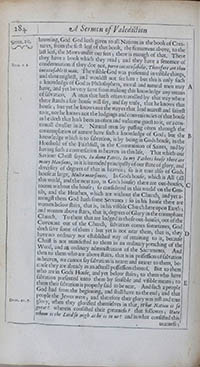 A Sermon of Valediction.A Sermon preached to the Prince
284
Serm.20.
A Sermon of Valediction.A Sermon preached to the Prince
284
Serm.20.
knowing, Godknowing God, God hath given to all Nations in the book of Crea-
tures, from the first leaf of that book, the firmament above, to the
last leaf, the Mines under our feet; there is enough of that. There
they have a book which they read; and they have a sentence of
condemnation if they doe not,Rom. 2.1. porro inexcusabilis, Therefore art thou
inexcusable O man. The visible God was presented in visible things,
and thou mightst, and wouldst not see him: but this is only such
a knowledge of God as Philosophers, moral and natural men may
have, and yet be very farre from making this knowledge any means
of salvation. A man that hath often travelled by that way where
there stands a fair house will say, and say truly, that he knows that
house; but yet he knows not the wayes that lead nearest and fairest
to it, nor he knows not the lodgings and conveniencies of that house
as he doth that hath been an often and welcome guest to it, or a con-
tinuall dweller in it. Natural men by passing often through the
contemplation of nature have such a knowledge of God; but the
knowledge which is to salvation, is by being in Gods house, in the
Houshold of the Faithfull, in the Communion of Saints, and by
having such a conversation in heaven in this life. That which our
Saviour Christ sayes, In domo Patris, In my Fathers house there are
many Mansions, as it is intended principally of our state of glory, and
diversity of degrees of that in heaven; so is it true also of Gods
house at large, Multæ mansiones. In Gods house, which is All (all
this world, and the next too, is Gods house) there are out-houses,
rooms without the house; so considered in this world on the Gen-
tils, and the Heathen, which are without the Church, and yet a-
mongst them God hath some Servants: so in his house there are
women below stairs, that is, in his visible Church here upon Earth;
and women above stairs, that is, degrees of Glory in the triumphant
Church. To them that are lodged in those out-houses, out of the
Covenant out of the Church, salvation comes sometimes, God
doth save some of them: but yet is not near them, that is, they
have no ordinary nor established way of attaining to it, because
Christ is not manifested to them in an ordinary preaching of the
Word, and an ordinary administration of the Sacraments. And
then to them who are above stairs, that is in possession of salvation
in heaven, we cannot say salvation is nearer and nearer to them, be-
cause they are already in an actuall possession thereof. But to them
who are in Gods House, and yet below stairs; to them who have
salvation presented unto them by sensible and visible means; to
them their salvation is properly said ioto be near. And such a people
God had from the beginning, and shall have to the end; and that
people the Jewes were; and therefore their glory was just and true
glory,Deut. 41.7. when they glorified themselves in that, What Nation is so
great? wherein consisted their greatness? that followes; Unto
whom is the Lord so nigh as he is to us? and in what consisted this Oo
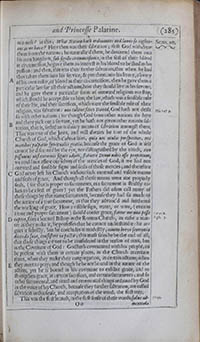 and Princesse Palatine.
(285)
Serm.20.
and Princesse Palatine.
(285)
Serm.20.
nearness? in this; What Nation hath ordinances and lawes so righte-
ous as we have? Here then was their salvation; first God withdrew
them from the nations; he naturaliz'd them, he denizend them into
his own kingdom, sub sigillo circumcisionis, in the seal of their blood
in circumcision, he gave them an interest in his blood to be shed in his
passion: and then, this was their farther salvation, that when he had
thus taken them into his service, & put them into his livery, a livery
of his own color, of blood in their circumcisioucircumcision, then he gave them a
particular law for all their actions, how they should live in his favour;
and he gave them a particular form of outward religious worship,
which should be acceptable to him; the law, which was a sensible rule
of their life, and their sacrifices, which were the sensible rule of their
religion, was salvation: non taliter, saies David,Psa. 147.9. God hath not dealt
so with other nations; for though God from other nations do here
and there pick out a servant, yet he hath not given other nations sal-
vation, that is, setled an ordinary means of salvation amongst them.
That was true of the Jews, and will alwaies be true of the whole
Church of God, which Calvin saies, quia nec oculis perspicitur, nec
manibus palpatur spiritualis gratia, because the grace of God it self
cannot be discerned by the eye, nor distinguished by the touch, non
possumus nisi externis signis adjuti, statuere Deum nobis esse propitium,
we could not assure our selves of the mercies of God, if we had not
outward and sensible signs and seals of those mercies; and therefore
God never left his Church without such external and visible means
and seals of grace. And though all those means were not properly
seals, (for that is proper to sacraments, as a sacrament is strictly ta-
ken to be a seal of grace) yet the Fathers did often call many of
these things by that name sacraments, because they had so much of
the nature of a true sacrament, as that they advanc'd and furthered
the working of grace. How a visible sign, water, or wine, (even in
a true and proper sacrament) should confer grace, Catarin. fateor me non posse
capere, Eph. 5.saies a learned Bishop in the Roman Church; as easie a mat-
ter as they make it, he professes that he cannot understand it: he ar-
gues it subtilly, but he concludes it modestly; omnio brevi sententia
dicenda sunt, consistere in pactis; this must saies he be the end of all,
that these things are not to be considered in the reason of man, but
in the Covenant of God: God hath covenanted with his people, to
be present with them in certain places, in the Church at certain
times, when they make their congregation, in certain actions, when
they meet to pray; and though he be not bound in the nature of the
action, yet he is bound in his covenant to exhibit grace, and to
strengthen grace, in certain sacrifices, and certain sacraments; and so
other sacramental, and ritual and ceremonial things ordained by God
in the voice of his Church, because they further salvation, are called
salvation in this sense, and acceptation of the word, the first way. This was the first branch, in the first sense of these words;Prope. salus ad-
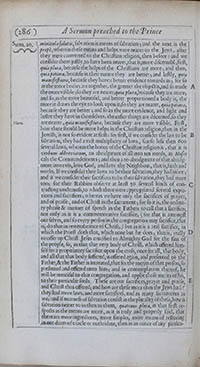 A Sermon preached to the Prince
(286)
Serm.20.
minicula salutis, salvation is means of salvation; and the next is the
A Sermon preached to the Prince
(286)
Serm.20.
minicula salutis, salvation is means of salvation; and the next is the
propè, wherein these means and helps were nearer to the Jews, after
they were converted to the Christian religion, then before: and we
consider them justly, to have been nearer, that is, more discernabl; first,
quia plura, because the helps of the Christians are more; and then,
quia potiora, because in their nature they are better; and lastly, quia
manifestiora, because they have a better evidence towards us; for so
as the more bodies are together, the greater the object is, and so made
the more visible; so they are nearer, quia plura, because they are more;
and so, as the more beautiful, and better proportioned a body is, the
more it draws the eye to look upon it; so they are nearer, quia potiora,
because they are better; and so as the more evidence, and light and
lustre they have in themselves, the easier things are discerned, so they
are nearer,Plura. quia manifestiora, because they are more visible. First,
how there should be more helps in the Christian religion, then in the
Jewish, is not so evident at first: for first, if we consider the law to be
salvation, they had a vast multiplicity of laws, scarse less then 600
several laws; whereas the honor of the Christian religion is, that it is
verbum abbreviatum, an abridgment of all into ten words, as Moses
cals the Commandements; and then a re-abridgment of that abridg-
ment into two, love God, and love thy Neighbour, that is, faith and
works. If we consider their laws to be their salvation, they had more;
and if we consider their sacrifices to be their salvation, they had more
too; for their Rabbins observe at least 50 several kinds of con-
tracting uncleaness, to which there were appropriated several expia-
tions and sacrifices; whereas we have only the sacrifices of prayer,
and of praise, and of Christ in the sacrament; for so it is, the ordina-
ry phrase & manner of speech in the Fathers to call that a sacrifice;
not only as it is a commemorative sacrifice, (for that is amongst
our selves, and so every person in the congregation may sacrifice, that
is, do that in remembrance of Christ,) but as it is a real sacrifice, in
which the Priest doth that, which none but he does; that is, really
to offer up Christ Jesus crucified to Almighty God for the sins of
the people, so, as that that very body of Christ, which offered him-
self for a propitiatory sacrifice upon the cross, once for all, that body,
and all that that body suffered, is offered again, and presented to the
Father, & the Father is intreated, that for the merits of that person, so
presented and offered unto him; and in contemplation thereof, he
will be merciful to that congregation, and applie those merits of his,
to their particular souls. These are our sacrifices, prayer and praise,
and Christ thus offered; and how are these more then the Jews had?
they had more laws, and more sacrifices, and as many sacraments as
we; and if nearness of salvation consist in the plurality of these, how is
salvation nearer to us then to them, quatenus plura, in that first re-
spects as the means are more, as it is truly and properly said, that
there are more ingredients, more simples, more means of restoring
in our dram of triacle or mithridate, then in an ounce of any particu-
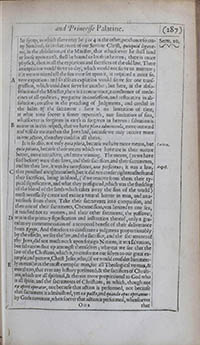 and Princesse Palatine.
(287)
Serm.20.
lar syrup, in which there may be 3 or 4 in the other, perchance so ma-
and Princesse Palatine.
(287)
Serm.20.
lar syrup, in which there may be 3 or 4 in the other, perchance so ma-ny hundred; so in that receit of our Saviour Christ, quicquid ligave-
ris; in the absolution, of the Minister, that whatsoever he shall bind
or loose upon earth, shall be bound or loose in heaven; there is more
physick, then in all the expiations and sacrifices of the old law. There
an expiation would serve to day, which would not serve to morrow;
if it were omitted till the sun were set upon it, it required a more se-
vere expiation: and so also an expiation would serve for one trans-
gression, which would not serve for another; but here, in the abso-
solution of the Minister, there is a concurrence, a confluence of mede-
cines of all qualities; purgative in confession, and restorative in ab-
solution; corasive in the preaching of Judgments, and cordial in
the balm of the sacrament: here is no limitation of time,
at what time soever a sinner repenteth, nor limitation of sins,
whatsoever is forgiven in earth is forgiven in heaven: salvation is
nearer us in this respect, that we have plura adminicula, more outward
and visible means then the Jews had, because we may receive more
in one action, then they could in all theirs. It is so also, not only quia plura, because we have more means,Potiora. but
quia potiora, because those means which we have are in their nature
better, more attractive, and more winning. The means, (as we have
said before) were their laws, and their sacrifices, and their sacraments,
and for their law, it was lex interficiens, non perficiens; it was a law,
August. that punished unrighteousness, but it did not confer righteousness: and
their sacrifices, being in blood, (if we remove from them their ty-
pical signification, and what they prefigured, which was the shedding
of the blood of the lamb which takes away the sins of the world)
must necessarily create and excite a natural horror in man, and an a-
versness from them. Take their sacraments into comparison, and
then one of their sacraments, Circumcision, was limited to one sex,
it reached not to women; and their other sacrament, the passover,
was in the primary signification and institution thereof, only a gra-
tulatory commemoration of a temporal benefit of their deliverance
from Egypt. And therefore to constitute a judgment proportionably
by the effects, we see the law, and the sacrifice, and the sacraments of
thy Jews, did not much work upon foraign Nations; it was salvation,
but salvation shut up amongst themselves; whereas we see that the
law of the Chrstians, which is, to conforme our selves to our great ex-
ample and pattern, Christ Jesus, who, (if we would consider him meer-
ly as man) was the most exemplar man, for all Theological vertues, &
moral too, that ever any history presented; & the sacrifices of Christi-
ans, which are all spiritual, & therein more proportional to God who
is all spirit; and the sacraments of Christians, in which, though not
ex opere operator, not because that action is performed, not because
that sacrament is administred, yet ex pacto, and quando opus operamur:
by Gods covenant, when soever that action is performed, whensoever
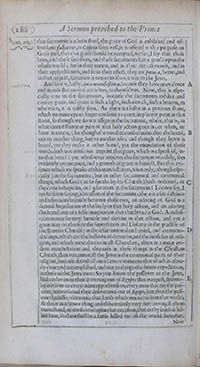 A Sermon preached to the Prince
(288)
Serm.20.
A Sermon preached to the Prince
(288)
Serm.20.
that sacrament is administred, the grace of God is exhibited and of-
fered; nec fallaciter, as Calvin saies well, it is offered with a purpose on
Gods part, that that grace should be accepted, we see, I say that these
laws, and these sacrifices, and these sacraments have gain'd upon the
whole world; for in their nature, and in their attractiveness, and in
their applyableness, and so in their effect, they are potiora, better, and
in that respect, salvation is nearer us then it was to the Jews. Manifestiora.And so it is, lastly, quia manifestiora, because they have an evidence
and manifestation of themselves, in themselves. Now, this is espe-
cially true in the sacraments, because the sacraments exhibit and
convey grace; and grace is such a light, such a torch, such a beacon, as
where it is, it is easily seen. As there is a lustre in a precious stone,
which no mans eye or finger can limit to a certain place or point in that
stone, so though we do not assign in the sacrament, where, that is, in
what circumstance or part of that holy action grace is; or when, or
how it enters, (for though the word of consecration alter the bread,
not to another thing, but to another use; and though they leave it
bread, yet they make it other bread, yet the enunciation of those
words doth not infuse nor imprint this grace, which we speak of, in-
to that bread) yet whosoever receives this sacrament worthily, sees
evidently an entrance, and a growth of grace in himself. But this evi-
dence which we speaks of this manifestation, is not only, (though espe-
cially) in the sacraments, but in other sacramental and ceremonial
things, which God (as he speaks by his Church) hath ordained, as
the cross in baptism, and adoration at the sacrament (I do not say, I
am far from saying, adoration of the sacrament; there is a fair distance
and a spacious latitude between those two, an adoring of God in a
devout humiliation of the body in that holy action, and an adoring
the bread, out of a false imagination that that bread is God: A rectifi-
ed man may be very humble and devout in that action, and yet a
great way on this side the superstition and Idolatry in the practise of
the Roman Church) in these sacramental and ritual, and ceremoni-
al things, which are the bellows of devotion, and the subsidies of reli-
gion, and which were alwaies in all Churches, there is a more evi-
dent manifestation and clearness in these things in the Christian
Church, then was amongst the Jews in the ceremonial parts of their
religion, because almost all ours have reference to that which is alrea-
dy done and accomplished, and not to things of a future expectation,
as those of the Jews were: So you know the passover of the Jews,
had a relation to their comming out of Egypt; that was past, & there-
by obvious to every mans apprehension; every man that eat the pas-
over, remembered their deliverance out of Egypt; but then the pass-
over had also relation to that lamb which was to redeem that world;
& this was a future thing; and this certainly very few amongst them
understood, or considered upon that occasion, that as thy lamb is kil-
led here, so there shall be a lamb killed for all the world hereafter.
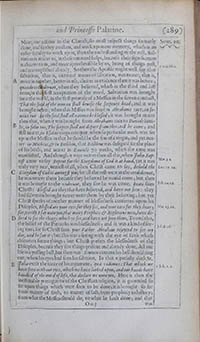 and Princesse Palatine.
(289)
Serm.20.
and Princesse Palatine.
(289)
Serm.20.
Now, our actions in the Church, do most respect things formerly
done, and so they awaken, and work upon our memory, which is an
easier faculty to work upon, then the understanding or the will. Sal-
vation is nearer us, in these outward helps, because their signification
is clearer to us, and more apprehensible by us, being of things past,
Credidistis. and accomplished already. So then the Apostle might well say that
salvation, that is, outward means of salvation, was nearer, that is,
more in number, better in use, clearer in evidence then it was before;
quando crediderunt, when they believed, which is the third and last
term, in this first acceptation of the word. Salvation was brought
into the world, in the first promise of a Messias in the semen contract,
That the seed of the woman shall bruise the serpents head; and it was
brought nearer, when this Missias was fixed in Abrahams race, in se-
mine tuo In thy seed shall all nations be blessed; it was brought nearer
then that, when it was brought from Abrahams race to Davids fami-
ly, in solio tuo, The scepter shall not depart from thee, till he come; and
still nearer, in Esaias virgo concipiet when so particular mark was set
upon the Messias as that he should be the son of a virgin; and yet nea-
rer in Micheas, & tu Bethlem, that Bethlem was design'd for the place
of his birth; and nearer in Daniels 70 weeks, when the time was
manifested. And though it were nearer then all this, when John Bap-
tist came to say Repent for the Kingdome of God is at hand,Mat. 3.2. yet it was
truly very near, nearest of all, when Christ came to say,Luc. 17.21. Behold the
Kingdom of God is amongst you; for all the rest were in the crediderunt,
he was nearer them because they believed he would come; but then
it was brought to the viderunt, they saw he was come.Joh. 20.29. Beati saies
Christ: Blessed are they that have believed, and have not seen: they
had salvation brought nearer unto them by their believing; but yet
Christ speaks of another manner of blessedness conferred upon his
Disciples, Blessed are your eyes for they see, and your ears for they hear;
Mat. 13.16. for, verily I say unto you, that many Prophets & Righteous men, have de-
sired to see the things which ye see, and have not seen them. To end this,
the belief of the Patriarks was blessedness;Joh. 8.56. and it was a kind of see-
ing too; for so Christ saies your Father Abraham rejoyced to see my
day, and he saw it; but this was a seeing with the eye of faith which
discovers future things; but Christ prefers the blessedness of the
Disciples, because they saw things present and already done. All our
life is a passing bell, but then was Simeon content his bell should ring
out, when his eyes had seen his salvtionsalvation. In that especially doth St.
John exalt the force of his argument; quæ vidimus:1 Joh. 1.1. That which we
have seen with our eyes, which we have looked upon, and our hands have
handled of the word of life, that declare we unto you. Here is then the
inestimable prerogative of the Christian religion, it is grounded so
far upon things which were seen to be done; it is brought so far
from matter of faith, to matter of fact; from prophecy to history;
from what the Messias should do, to what he hath done; and that
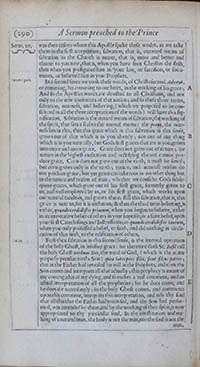 A Sermon preached to the Prince
(290)
Serm.20.
A Sermon preached to the Prince
(290)
Serm.20.
was their case to whom this Apostle spake these wodrswords, as we take
them in the first acceptation; salvation, that is, outward means of
salvation in the Church is nearer, that is, more and better and
clearer to you now, that is, when you have seen Christin the flesh,
then when you prefigured him in your law, or sacrifices, or sacra-
ments, or believed him in your Prophets. Second part.In a second sence we took these words, of Christs second Advent,
or comming, his comming to our heart, in the working of his grace;
And so the Apostles words are directed to all Christians, and not
only to the new convertits of that nation; and so these three terms,
salvation, nearness, and believing, (which we proposed to be con-
sidered in all the three acceptations of the words) will have this sig-
nification. Salvation is the inward means of salvation, the working of
the spirit, that sets a seal to the eternal means: the prope, the near-
ness lies in this, that this grace which is this salvation in this sense,
grows out of that which is in you already; not out of any thing
which is in you naturally, but Gods first graces that are in you, grows
into more and more grace. Grace does not grow out of nature; for
nature in the highest exaltation and rectifying thereof cannot pro-
duce grace. Corn does not grow out of the earth, it must be sowd;
but corn grows only in the earth; nature, and naturall reason do
not produce grace, but yet grace can take root in no other thing but
in the nature and reason of man; whether we consider Gods subse-
quent graces, which grow out of his first grace, formerly given to
us, and well employed by us, or his first grace, which works upon
our natural faculties, and grows there; still this salvation, that is, this
grace is near us, for it is within us; & then the third term believing, is
either, quando credidistis primum, when you began to believe, either
in an imputative belief of others in your baptism, or a faint belief, upon
your first Catechisings and Instrustions; or quando credidistis tantum,
when you only professed a belief, or faith, and did nothing in decla-
ration of that faith, to the edification of others. Salus.First then salvation in this second sense, is the internal operation
of the holy Ghost, in infusing grace: for therefore doth St. Basil call
the holy Ghost verbum Dei, the word of God, (which is the name
properly peculiar to the Son) quia interpres filii, sicut filius patris;
that as the Father had revealed his will in the Prophets, and then the
Son comes and interprets all that actually; this prophecy is meant of
my coming, this of my dying, and so makes a real comment, and an
actual interpretation of all the prophecies; for he does come, and
he does die accordingly; so the holy Ghost comes, and comments
upon this comment, interprets this interpretation, and tels thy soul
that all this that the Father had promised, and the Son had perfor-
med, was intended by them, and by the working of their spirit, is now
appropriated to thy particular soul. In the constitution and ma-
king of a natural man, the body is not the man, nor the soul is not the
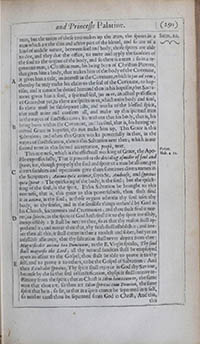 and Princesse Palatine.
(291)
Serm.20.
and Princesse Palatine.
(291)
Serm.20.
man, but the union of these two makes up the man; the spirits in a
man which are the thin and active part of the blood, and so are of a
kind of middle nature, between soul and body, those spirits are able
to doe, and they doe the office, to unite and apply the faculties of
the soul to the organs of the body, and so there is a man: so in a re-
generate man, a Christian man, his being born of Christian Parents,
that gives him a body, that makes him of the body of the Covenant,
it gives him a title, an interest in the Covenant, which is jus ad rem;
thereby he may make his claim to the seal of the Covenant, to bap-
tism, and it cannot be denied him: and then in his baptism, that Sacra-
ment gives him a soul, a spiritual seal, jus in re, an actual possession
of Grace; but yet, as there are spirits in us, which unite body and soul,
so there must be subsequent acts, and works of the blessed spirit,
that must unite and confirm all, and make up this spiritual man
in the wayes of sanctification; for without that his body, that is, his
being born within the Covenant, and his soul, that is, his having re-
ceived Grace in baptism, do not make him up. This Grace is this
Salvation; and when this Grace works powerfully in thee, in the
wayes of sanctification, then is this Salvation neer thee; which is our
second term in this second acceptation, propè, neer. This neerness, which is the effectuall working of Grace,Prope. the Apo-
stle expresses fully, That it Heb. 4.12.pierceth to the dividing asunder of soul and
spirit; for, though properly the soul and spirit of a man be all one, yet
divers faculties and operations give them somtimes divers names in
the Scriptures; Anima quia animat, sayes St. Ambrose, and spiritus
quia spirat: The quickning of the body, is the soul; but the quick-
ning of the soul, is the spirit. If this Salvation be brought to this
neerness, that is, this grace to this powerfulness, thou shalt find
it in anima, in thy soul; in those organs wherein thy soul uses thy
body, in thy senses, and in the sensible things ordain'd by God in
his Church, Sacraments and Ceremonies; and thou shalt find it nee-
rer, in spiritu, as the spirit of God hath seal'd it to thy spirit invisibly,
inexpressibly: It shall be neer to thee, so as that thy reason shall ap-
prehend it; and neerer then that, thy faith shall establish it; and nee-
rer then all this, it shall create in thee a modest and sober, but yet an
infallible assurance, that thy salvation shall never depart from thee:
Magnificabit anima tua Dominum, as the B. Virgin speaks, Thy soul
shall magnifie the Lord; all thy natural faculties shall be employed
upon an assent to the Gospel, thou shalt be able to prove it to thy
self, and to prove it to others, to be the Gospel of Salvation: And
then Exultabit spiritus, Thy spirit shall rejoyce in God thy Saviour,
because by the farther seal of sanctification, thy spirit shall receive te-
stimony from the spirit; that as Christ is Idem homo cum te, the same
man that thou art, so thou art Idem spiritus cum Domino, the same
spirit that he is; so far, as that as a spirit cannot be separated in it self,
so neither canst thou be separated from God in Christ; And this,
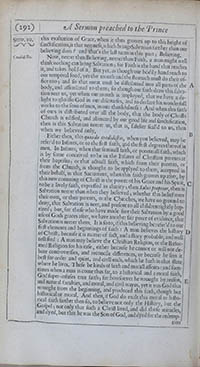 A Sermon preached to the Prince
(292)
Serm.20.
A Sermon preached to the Prince
(292)
Serm.20.
this exaltation of Grace, when it thus growes up to this height of
sanctification, is that neerness, which brings Salvation farther than our
believing does? and that's the last term in this part; Believing. Credidistis.Now, neerer then Believing, neerer than Faith, a man might well
think nothing can bring Salvation; for Faith is the hand that reaches
it, and takes hold of it. But yet, as though our bodily hand reach to
our temporal food, yet the mouth and the stomach must do their of-
fice too; and so that meat must be distributed into all parts of the
body, and assimilated to them; so though our faith draw this salva-
tion neer us, yet when our mouth is imployed, that we have a de-
light to glorifie God in our discourses, and to declare his wonderfull
works to the sons of men, in our thankfulness: And when this faith
of ours is distributed over all the body, that the body of Christs
Church is edified, and alienated by our good life and sanctification,
then is this Salvation neerer us, that is, safelier seal'd to us, then
when we believed only. Either then, this quando credidistis, when you believed, may be
refer'd to Infants, or to the first faith, and the first degrees thereof in
men. In Infants, when that seminall faith, or potentiall faith, which
is by some conceived to be in the Infants of Christian parents at
their baptism; or that actuall faith, which from their parents, or
from the Church, is thought to be applyed to them, accepted in
their behalf, in that Sacrament, when this faith growes up after, by
this new comming of Christ in the power of his Grace and his Spirit,
to be a lively faith, expressed in charity; then Salus proprior, then is
Salvation neerer than when they believed; whether this belief were
their own, or their parents, or the Churches, we have no ground to
deny, that Salvation is neer, and present to all children rightly bap-
tized; but, for those who have made sure their Salvation by a good
use of Gods graces after, we have another fair peece of evidence, that
Salvation is neerer them. It is so to, if this believing be refer'd to our
first elements and beginnings of faith: A man believes the history
of Christ, because it is matter of fact, and a story probable, and well
testified: A man may believe the Christian Religion, or the Refor-
med Religion for his ease, either because he cannot or will not de-
bate controversies, and reconcile differences, or because he sees it
best for order and quiet, and civll ends, which he hath in that state
where he lives. These be kinds of faith and morall assents: and som-
times when a man is come thus far, to a historical and a moral faith,
God super-infuses true faith; for howsoever he wrought by reason,
and natural faculties, and moral, and civil wayes, yet it was God that
wrought from the beginning, and produced this faith, though but
historical or moral. And then, if God do exalt this moral or histo-
rical faith farther then so, to believe not only the History, but the
Gospel; not only that such a Christ lived, and did those miracles,
and dyed, but that he was the Son of God, and dyed for the redemp-
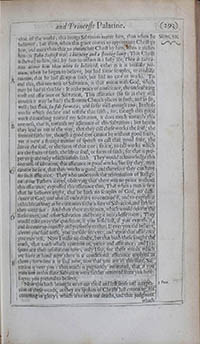 and Princesse Palatine.
(293)
Serm.20.
tion of the world; this brings Salvation neerer him, than when he
and Princesse Palatine.
(293)
Serm.20.
tion of the world; this brings Salvation neerer him, than when he
believed; but then, when this grace comes to appropriate Christ to
him, and more than that, to annunciate Christ by him, when it makes
him (as John Baptist was) a burning and a shining lamp; That Christ
is shewed to him, and by him to others in a holy life, Then is Salva-
tion neerer him than when he believed, either as it is credidit pri-
mum, when he began to believe, but had some scruples, or credidit
tantum, that he laid all upon faith, but had no care of works. To
end this, this neerness of Salvation, is that union with God, which
may be had in this life: It is the peace of conscience, the undoubting
trust and assurance of Salvation. This assurance (so far as they will
confess it may be had) the Roman Church places in faith, and so far,
well; but then, In fide formata; and so far well enough too; In those
works which declare and testifie that faith; for, though this good
work do nothing toward my Salvation, it does much towards this
neerness, that is, towards my assurance of this Salvation; but herein
they lead us out of the way, that they call these works the soul, the
form of faith: for, though a good tree cannot be without good fruits,
yet it were a strange manner of speech to call that good fruit, the
life or the soul, or the form of that tree; so is it, to call works which
are the fruits of faith, the life or soul, or form of faith; for that is pro-
per to grace only which infuses faith. They would acknowledge this
neerness of salvation, this assurance in good works; but say they, man
cannot be sure, that their works is good, and therefore they can have
no such assurance. They who undertook the reformation of Religi-
on in our Fathers dayes, observing that there was no peace without
this assurance, expressed this assurance thus, That when a man is sure
that he believes aright, that he hath no scruples of God, no diffi-
dence in God, and uses all endeavors to continue it, and to express it
in his life, as long as he continues so, he is sure of Salvation; and farther
they went not: And then there arose men, which would reform the
Reformers, and refine Salvation and bring it into a lesse room; They
would take away the condition, if you hold fast, if you express it;
and so came up roundly and presently to that; If ever you did believe,
if ever you had faith, you are safe for ever, and upon that assurance
you may rest. Now I make no doubt, but that both these sought the
truth, that truth which concerns us, peace and assurance; and I di-
spute not their resolutions now; only I say, for these words which
we have in hand now there is a conditional assurance implyed in
them; for when it is said now, now that you are in this state, Sal-
vation is neer you: thus much is pugnantly intimated, that if you
were not in this state, Salvation were farther removed from you how-
soever you pretend to believe. Now this hath brought us to our third and last sense and accepta-
tion of these words, as they are spoken of Christs last comming,3 Part. his
comming in glory; which is to us at our deaths, and that judgment
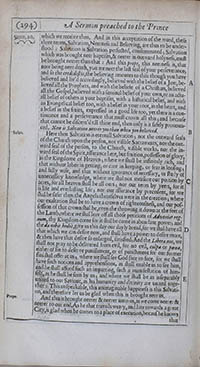 A Sermon preached to the Prince
(294)
Serm.20.
A Sermon preached to the Prince
(294)
Serm.20.
which we receive then. And in this acceptation of the word, these
three terms, Salvation, Neerness and Believing, are thus to be under-
stood: Salvation is Salvation perfected, consummated; Salvation
which was brought neer baptism, & neerer in outward holyness, must
be brought neerer than that: And this prope, this neerness is, that
now being neer death, you are neer the last seal of your perseverance;
and so the credidistis, the believing amounts to this: though you have
believed and liv'd accordingly, believed with the belief of a Jew, be-
lieved all the Prophets, and with the beliefe of a Christian, believed
all the Gospel, believed with a seminal belief of your own, or an actu-
all belief of others at your baptism, with a historical belief, and with
an Evangelical belief too, with a belief in your root, in the heart, and
a belief in the fruits, expressed in a good life too, yet there is a con-
tinuance and a perseverance that must crown all this; and because
that cannot be discern'd till thine end, then only is it safely pronoun-
ced, Now is Salvation neerer you than when you believed. Salus.Here then Salvation is eternall Salvation; not the outward seals
of the Church upon the person, not visible Sacraments, nor the out-
ward seal of the person, to the Church, visible works, nor the in-
ward seal of the Spirit, assurance here, but fruition, possession of glory,
in the Kingdome of Heaven; where we shall be infinitely rich, and
that without labor in getting, or care in keeping, or fear in loosing;
and fully wise, and that without ignorance of necessary, or study of
unnecessary knowledge, where we shal not measure our portion by
acres, for all heaven shall be all ours; nor our term by yeers, for it
is life and everlasting life; nor our assurance by precedent, for we
shal be safer then the Angels themselves were in the creation; where
our exaltation shal be to have a crown of righteousness, and our pos-
session of that crown shal be, even the throwing it down at the feet of
the Lamb; where we shal leav off all those petitions of Adveniat reg-
num, thy Kingdom come for it shal be come in abundant power; and
the da nobis hodiè, give us this day our dayly bread, for we shal have all
that which we can desire now, and shall have a power to desire more,
& then have that desire so enlarged, satisfied; And the Libera nos, we
shall not pray to be delivered from evil, for no evil, culpæ or pœnæ,
either of sin to deserve punishment, or of punishment for our former
sins shal offer at us; where we shall see God face to face, for we shall
have such notions and apprehensions, as shall enable us to see him,
and he shall afford such an imparting, such a manifestation of him-
self, as he shall be seen by us; and where we shall be as inseparably
united to our Saviour, as his humanity and divinity are united toge-
ther: This unspeakable, this unimaginable happiness is this Salvati-
on, and therefore let us be glad when this is brought neer us. Prope.And this is brought neerer & neerer unto us, as we come neerer &
neerer to our end. As he that travails weary, and late towards a great
City, is glad when he comes to a place of execution, becausbecause he knows
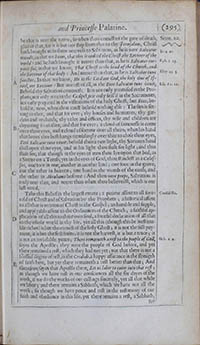 and Princesse Palatine.
(295)
Serm.20.
and Princesse Palatine.
(295)
Serm.20.
be that is neer the town; so when thou comest to the gate of death,
glad of that, for it is but one step from that to thy Jerusalem. Christ
hath brought us in some neerness to Salvation, as he is vere Salvator
mundi, in that we know, that this is indeed the Christ,Jo. 4.42. the Saviour of the
world: and he hath brought it neerer than that,Eph. 5.23. as he is Salvator cor-
poris sui, in that we know, That Christ is the head of the Church, and
the Saviour of that body: And neerer than that,Esay. 43.3. as he is Salvator tuus
sanctus, In that we know, He is the Lord our God, the holy One of Is-
rael, our Saviour: But neerest of all, in the Ecce Salvator tuus venit,
Esa. 61.11. Behold thy Salvation commeth. It is not only promised in the Pro-
phets, nor only writ in the Gospel, nor only seal'd in the Sacraments,
nor only prepared in the visitations of the holy Ghost, but Ecce, be-
hold it, now, when thou canst behold nothing else: The sun is set-
ting to thee, and that for ever; thy houses and furnitures, thy gar-
dens and orchards, thy titles and offices, thy wife and children are
departing from thee, and that for ever; a cloud of faintnesse is come
over thine eyes, and a cloud of sorrow over all theirs; when his hand
that loves thee best hangs tremblingly over thee to close thine eyes,
Ecce Salvator tuus venit, behold then a new light, thy Saviours hand
shall open thine eyes, and in his light thou shalt see light; and thus
shalt see, that though in the eyes of men thou lye upon that bed, as
a Statue on a Tomb, yet in the eyes of God, thou standest as a Colos-
sus, one foot in one, another in another land; one foot in the grave,
but the other in heaven; one hand in the womb of the earth, and
the other in Abrahams bosome: And then vere prope, Salvation is
truly neer thee, and neerer than when thou believedst, which is our
last word. Take this Belief in the largest extent;Credidistis. a patient assent to all fore-
told of Christ and of Salvation by the Prophets; a historical assent
to all that is written of Christ in the Gospel; an humble and supple,
and applyable assent to the Ordinances of the Church; a faithful ap-
plication of all this to thine own soul, a fruitful declaration of all that
to the whole world in thy life, yet all this (though this be inestima-
ble riches) is but the earnest of the holy Ghost; it is not the full pay-
ment, it is but the first fruits; it is not the harvest, it is but a truce; it
is not an inviolable peace; There remaineth a rest to the people of God,
Heb. 4.9. sayes the Apostle; they were the people of God before, and yet
there remained a rest, which they had not yet; not that there is not a
blessed degree of rest, in the Credidi, a happy assurance in the strength
of faith here, but yet there remaineth a rest better than that; And
therefore sayes that Apostle there, Let us labor to enter into that rest;
as though we have rest in our consciences all the six dayes of the
week, if we do the works of our callings sincerely, yet all that while
we labor; and there remains a Sabbath, which we have not all the
week; so though we have peace and rest in the testimony of our
faith and obedience in this life, yet there remains a rest, a Sabbath,
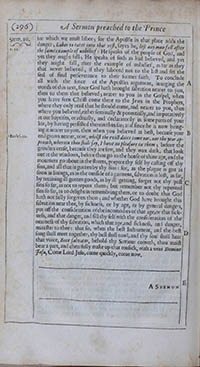 A Sermon preached to the Prince
(296)
Serm.20.
A Sermon preached to the Prince
(296)
Serm.20.
for which we must labor; for the Apostle in that place adds the
danger; Labor to enter into that rest, sayes he, lest any man fall after
the same example of unbelief:v. 11. He speaks of the people of God, and
yet they might fall; He speaks of such as had believed, and yet
they might fall, after the example of unbelief, as far as they
that never believed, if they labored not to the last and set the
seal of final perseverance to their former faith. To conclude
all with the force of the Apostles argument, in urging the
words of this text, since God hath brought salvation nearer to you,
then to them that believed; nearer to you in the Gospel, when
you have seen Christ come there to the Jews in the Prophets,
where they only read that he should come, and nearer to you, then
where you believed, either seminally & potentially, and imputatively
at our baptism, or actually, and declaratorily in some parts of your
life, by having persisted therein thus far; and since he is now bring-
ing it nearer to you, then when you believed at best, because your
end grows nearer,Eccles. 12. now, whilst the evill daies come not, nor the year ap-
proach, wherein thou shalt say, I have no pleasure in them; before the
grinders cease, because they are few, and they wax dark, that look
out at the windows, before thou go to the house of thine age, and the
mourners go about in the streets, prepare thy self by casting off thy
sins, and all that is gotten by thy sins: for, as the plague is got as
soon in linings, as in the outside of a garment, salvation is lost, as far,
by retaining ill gotten goods, as by ill getting, forget not thy past
sins so far, as not to repent them; but remember not thy repented
sins so far, as to delight in remembring them, or to doubt that God
hath not fully forgiven them; and whether God have brought this
salvation near thee, by sickness, or by age, or by general dangers,
put off the consideration of the incomodies of that age, or that sick-
ness, and that danger, and fill thy self with the consideration of the
nearness of thy salvation, which that age, and sickness, and danger,
minister to thee: that so, when the best Instrument, and the best
song shall meet together, thy bell shall towl, and thy soul shall hear
that voice, Ecce salvator, behold thy Saviour cometh, thou maist
bear a part, and chearfully make up that musick, with a veni Domine
Jesu, Come Lord Jesu, come quickly, come now. Ppp
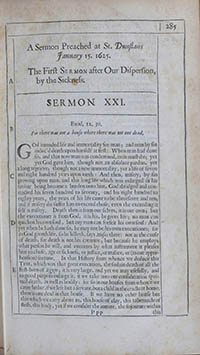 285
A Sermon Preached at St. Dunstans January 15. 1625. The First Sermon after Our Dispersion, by the Sickness. SERMON XXI.
Exod. 12.30.
285
A Sermon Preached at St. Dunstans January 15. 1625. The First Sermon after Our Dispersion, by the Sickness. SERMON XXI.
Exod. 12.30. For there was not a house where there was not one dead. GOdGod intended life and immortality for man; and man by sin
induc'd death upon himself at first: When man had done
so, and that now man was condemned, man must die; yet yetyet
God gave him, though not an absolute pardon, yet
a long reprieve; though not a new immortality, yet a life of seven
and eight hundred years upon earth: And then, misery, by sin
growing upon man, and this long life which was enlarged in his
favour being become a burden unto him, God abridged and con-
tracted his seven hundred to seventy, and his eight hundred to
eighty years, the years of his life came to be threescore and ten;
and if misery do suffer him to exceed those, even the exceeding it
self is misery. Death then is from our selves, it is our own; but
the executioner is from God, it is his, he gives life; no man can
quicken his own soul, but any man can forfeit his own soul: And
yet when he hath done so, he may not be his own executioner; for
as God giveth life, so he killeth, says Moses there: not as the cause
of death, for death is not his creature; but because he employs
what person he will, and executes by what instrument it pleases
him to chuse, age or sickness, or justice, or malice, or (in our appre-
hension) fortune. In that History from whence we deduce this
Text, which was that great execution, the sodain death of all the
first-born of Egypt; it is very large, and yet we may usefully, and
to good purpose enlarge it, if we take into our consideration spiri-
tual death, as well as bodily: for so in our houses from whence we
came hither, if we left but a servant, but a child in the cradle at home,
there is one dead in that house. If we have no other house but
this which we carry about us, this house of clay, this tabernacle of
flesh, this body, yet if we consider the inmate, the sojourner within
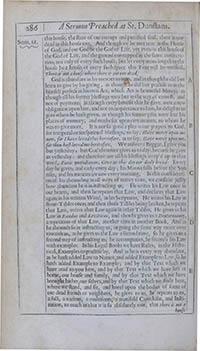 A Sermon Preached at St. Dunstans.
286
Serm.21.
A Sermon Preached at St. Dunstans.
286
Serm.21.
this house, the state of our corrupt and putrified soul, there is one
dead in this house too. And though we be met now in the House
of God, and our God be the God of Life, yet even in this house of
the God of Life, and the ground enwrapped in the same consecra-
tion; not only of every such house, but let every mans length in the
house be a house; of every such space this Text will be verified,
There is not a house where there is not one dead. God is abundant in his mercies to man, and as though he did but
learn to give by his giving, as though he did but practise to make
himself perfect in his own Art, which Art is bountiful Mercy; as
though all his former blessings were but in the way of earnest, and
not of payment; as though every benefit that he gave, were a new
obligation upon him, and not an acquittance to him; he delights to
give where he hath given, as though his former gifts were but his
places of memory, and marks set upon certain men, to whom he
was to give more. It is not so good a plea in our prayers to God,
for temporal or for spiritual blessings, to say, Have mercy upon me
now, for I have loved thee heretofore, as to say, Have mercy upon me,
for thou hast loved me heretofore. We answer a Beggar, I gave you
but yesterday; but God therefore gives us to day, because he gave
us yesterday: and therefore are all his blessings wrap'd up in that
word, Panis quotidianus, Give us this day our daily bread: Every
day he gives; and early every day; his Manna falls before the Sun
rises, and his mercies are new every morning. In this considerati-
on of his abounding in all ways of mercy to us, we consider justly
how abundant he is in instructing us. He writes his Law once in
our hearts, and then he repeats that Law, and declares that Law
again in his written Word, in his Scriptures. He writes his Law in
stone-Tables once; and then those Tables being broken, he repeats
that Law, writes that Law again in other Tables. He gives us his
Law in Exodus and Leviticus, and then he gives us a Deuteronomy,
a repetition of that Law, another time in another Book. And as
he abounds so in instructing us, in going the same way twice over
towards us, as he gives us the Law a second time, so he gives us a
second way of instructing us; he accompanies, he seconds his Law
with examples. In his Legal Books we have Rules; in the Histo-
rical, Examples to practise by. And as he is every way abundant,
as he hath added Law to Nature, and added Example to Law, so he
hath added Example to Example; and by that Text which we
have read to you here, and by that Text which we have left at
home, our house and family, and by that Text which we have
brought hither, our selves, and by that Text which we finde here,
where we stand, and sit, and kneel upon the bodies of some of
our dead friends or neighbors, he gives to us, he repeats to us,
a full, a various, a multiform, a manifold Catechism, and Insti-
tution, to teach us that it is so absolutely true, that there is not a
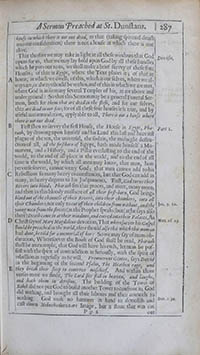 A Sermon Preached at St. Dunstans.
287
Serm.21.
A Sermon Preached at St. Dunstans.
287
Serm.21.
house in which there is not one dead, as that (taking spiritual death
into our consideration) there is not a house in which there is one
alive. That therfore we may take in light at all these windows that God
opens for us,Divisio. that we may lay hold upon God by all these handles
which he puts out to us, we shall make a brief survey of these four
Houses; of that in Egypt, where the Text places it; of that at
home, in which we dwell; of this, which is our selves, where we al-
ways are, or always should be within; and of this in which we are met,
where God is in so many several Temples of his, as are above and
under ground: So that this Sermon may be a general Funeral Ser-
mon, both for them that are dead in the flesh, and for our selves,
that are dead in our sins; for of all these four houses it is true, and by
useful accommodation, applyable to all, There is not a house where
there is not one dead. First then to survey the first House, the House in Egypt,Part 1. Pha-
raoh, by drawing upon himself and his Land this last and heaviest
plague of the ten, the universal, the sodain, the midnight destru-
ction of all, all the first born of Egypt, hath made himself a Mo-
nument, and a History, and a Pillar everlasting to the end of the
world, to the end of all place in the world, and to the end of all
time in the world, by which all men may know, that man, how
perverse soever, cannot weary God; that man cannot add to his
Rebellions so many heavy circumstances, but that God can add as
many, as heavy degrees to his Judgements. First, God turns their
Rivers into blood; Pharaoh sits that proces, and more, many more;
and then in this bloody massacre of all their first-born, God brings
blood out of the channels of their Rivers, into their chambers, into all
their Chambers; not only to cut off their children from without,Jer. 9.21. and the
young men from the streets (as the Prophet speaks) but (as he says also
there) Death came in at their windows, and entred into their Palaces.Matt. 26.13. As
Christ says of Mary Magdalens devotion, That wheresoever his Gospel
should be preached in the world, there should also this which this woman
had done, be told for a memorial of her: So we may say of mans ob-
duration, Wheresoever the Book of God shall be read, Pharaoh
shall be an example, that God will have his ends, let man be pos-
sest with the spirit of contradiction as furiously, with the spirit of
rebellion as ragefully as he will. Fremuerunt Gentes, says David
in the beginning of the second Psalm, The Heathen rage, and
they break their sleep to contrive mischief. And within three
verses more we finde, The Lord sits still in heaven, and laughs,
and hath them in derision. The building of the Tower of
Babel did not put God to build another Tower to confront it; God
did nothing, and brought all their labours and their councels to
nothing.Dan. 2.34. God took no hammer in hand to demolish and
cast down Nebuchadnezzars Image, but a stone that was cut
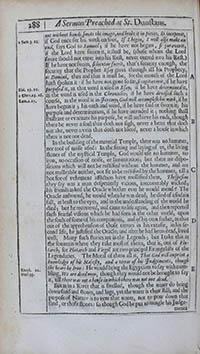 A Sermon Preached at St. Dunstans.
288
Serm.21.
A Sermon Preached at St. Dunstans.
288
Serm.21.
out without hands, smote the image, and broke it in pieces. Si inceperit,
if God once set his work on foot,1 Sam. 3.12. If I begin, I will also make an
end, says God to Samuel; if he have not begun, si juraverit,
if the Lord have sworn it, it shall be, (those whom the Lord
swore should not enter into his Rest, never entred into his Rest.)
If he have not sworn, si locutus fuerit, that's security enough, the
security that the Prophet Esay gives through all his Prophecy,
os Domini, thus and thus it must be, for the mouth of the Lord
hath spoken it: if he have not gone so far, si cogitaverit, if he have
purposed it,Isai. 19.12. as that word is used in Esay; if he have determined it,
2 Chro. 25.16.as the word is used in the Chronicles; if he have devised such a
Lam. 2.17.course, as the word is in Jeremy; God will accomplish his work, if he
have begun it; his oath and word, if he have said or sworn it; his
purpose and determination, if he have intended it; nothing shall
frustrate or evacuate his purpose, he will atchieve his ends, though
there be never a soul that doth not sigh, never a heart that doth
not ake, never a vein that doth not bleed, never a house in which
there is not one dead. In the building of the material Temple, there was no hammer,
nor tool of noise used: In the fitting and laying of us, the living
stones of the mystical Temple, God would use no hammer, no
iron, no occasion of noise, or lamentation; but there are dispo-
sitions which will not be rectified without the hammer, and are
not malleable neither, not fit to be rectified by the hammer, till a
hot fire of vehement affliction have mollified them. Thespesius
they say was a man desperately vicious, irrecoverably wicked;
his friends asked the Oracle whether ever he would mend? The
Oracle answered, he would when he was dead; he died of a sodain
fall, at least to the eyes, and in the understanding of the world he
died; but he recovered, and came to life again, and then reported
such fearful visions which he had seen in the other world, upon
the souls of some of his companions, and of his own father, as that
out of the apprehension of those terrors in his extasie, in his se-
cond life, he justified the Oracle; and after he had been dead, lived
well. Many such stories are in the Legends; but I take this at
the fountain where they take most of theirs, that is, out of Plu-
tarch; for Plutarch and Virgil are two principal Evangelists of the
Legendaries. The Moral of them all is, That God will imprint a
knowledge of his Majesty, and a terror of his Judgements, though
the heart be Iron:Exod. 12.
Vers. 33. He would bring the Egyptians to say with trem-
bling, We are dead men, though they would not be brought to say
it, till there was not a house in which there was not one dead. But as in a River that is swelled, though the water do bring
down sand and stones, and logs, yet the water is there still; and the
purpose of Nature is to vent that water, not to pour down that
sand, or those stones: so though God be put to mingle his Judge-
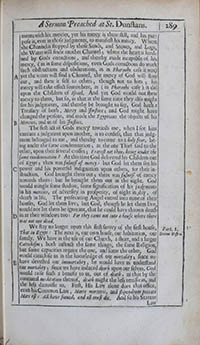 A Sermon Preached at St. Dunstans.
289
Serm.21.
ments with his mercies, yet his mercy is there still, and his pur-
A Sermon Preached at St. Dunstans.
289
Serm.21.
ments with his mercies, yet his mercy is there still, and his pur-pose is, ever in those judgments, to manifest his mercy. Where
the Channel is stopped by those Sands, and Stones, and Logs,
the Water will finde another Channel; where the heart is hard-
ned by Gods corrections, and thereby made incapable of his
mercy, (as in some dispositions, even Gods corrections do work
such obstructions and obdurations, as in Pharaohs case it was)
yet the water will find a Channel, the mercy of God will flow
out, and shew it self to others, though not to him; his
mercy will take effect somewhere, as (in Pharaohs case) it did
upon the Children of Israel. And yet God would not shew
mercy to them, but so, as that at the same time they also might
see his judgments, and thereby be brought to say, God hath a
Treasury of both, Mercy and Justice; and God might have
changed the persons, and made the Egyptians the objects of his
Mercies, and us of his Justice. The first act of Gods mercy towards me, when I see him
execute a judgment upon another, is to confess, that that judg-
ment belonged to me, and thereby to come to a holy fear, be-
ing under the same condemnation; as the one Thief said to the
other, upon their several crosses; Fearest not thou, being under the
same condemnation? At this time God delivered his Children out
of Egypt; then was fulness of mercy: but God let them see his
power and his powerful indignation upon others, for their in-
struction. God brought them out; there was fulness of mercy
towards them: but he brought them out in the night. God
would mingle some shadow, some signification of his judgments
in his mercies, of adversity in prosperity, of night in day, of
death in life. The persecuting Angel entred into none of their
houses, God let them live; but God, though he let them live,
would not let them be ignorant, that he could have thrown death
in at their windows too: For they came not into a house where there
was not one dead. We stay no longer upon this first survey of the first house,Part. 1.
That in Egypt: The next is, our own house, our habitation, our Domus Nostra.
family. We have in the use of our Church, a short, and a larger
Catechism; both instruct the same things, the same Religion,
but some capacities require the one, and some the other. God
would catechise us in the knowledge of our mortality; since we
have devested our immortality, he would have us understand
our mortality; since we have induced death upon our selves, God
would raise such a benefit to us, out of death, as that by the
continual meditation thereof, death might the less terrifie us, and
the less damnifie us. First, His Law alone does that office,
even his Common Law, Morte morieris, and stipendium peccati
Mors est: All have sinned, and all must die. And so his Statute
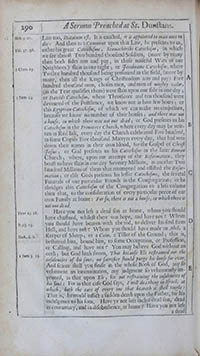 A Sermon Preached at St. Dunstans.
290
Serm.21.
A Sermon Preached at St. Dunstans.
290
Serm.21.
Law too,Heb. 9.27. Statutum est, It is enacted, it is appointed to man once to
die: And then as a Comment upon that Law, he presents to us,
either his great Catechisms,Isai. 37.36. Sennacheribs Catechism, in which
we see almost Two hundred thousand Soldiers, (more by many
then both sides arm and pay, in these noiseful Wars of our
Neighbors) slain in one night;2 Chro. 13. or Jeroboams Catechism, where
Twelve hundred thousand being presented in the field, (more by
many, then all the Kings of Christendom arm and pay) Five
hundred thousand men, chosen men, and men of mighty valor,
(as the Text qualifies them) were slain upon one side in one day;
or Davids Catechism,2 Sam. 24. where Threescore and ten thousand were
devoured of the Pestilence, we know not in how few hours; or
this Egyptian Catechism, of which we can make no conjecture,
because we know no number of their houses; and there was not
a house, in which there was not one dead; or God presents us his
Catechism in the Primitive Church, where every day may be writ-
ten in Red Ink, every day the Church celebrated Five hundred,
in some Copies Five thousand Martyrs every day, that had writ
down their names in their own blood, for the Gospel of Christ
Jesus; or God presents us his Catechism in the later Roman
Church; where, upon our attempt of the Reformation, they
boast to have slain in one day Seventy Millions, in another Two
hundred Millions of them that attempted and assisted the Refor-
mation; or else GodsGod presents his lesser Catechisms, the several
Funerals of our particular Friends in the Congregation; or he
abridges this Catechism of the Congregation to a less volume
then that, to the consideration of every particular peece of our
own Family at home: For so, there is not a house, in which there is
not one dead. Prov. 19.18.Have you not left a dead son at home, whom you should
have chastned, whilest there was hope, and have not? Whom
you should have beaten with the rod,& 23.13. to deliver his soul from
Hell, and have not? Whom you should have made an Abel, a
Keeper of Sheep;Gen. 4.2. or a Cain, a Tiller of the Ground; that is,
bestowed him, bound him, to some Occupation, or Profession,
or Calling, and have not? You may believe God without an
oath;1 Sam 3.13. but God hath sworn, That because Eli restrained not the
insolencies of his sons, no sacrifice should purge his house for ever.
And scarce shall you finde in the whole Book of God, any so
vehement an intermination, any judgment so vehemently im-
printed, as that upon Eli, for not restraining the insolencies of
his sons: For in that case God says, I will do a thing in Israel, at
which, both the ears of every one that heareth it shall tingle:
That is, he would inflict a sudden death upon the Father, for his
indulgence to his sons. Have ye not left such a dead son, dead
in contumacy, and in disobedience, at home? Have you not left
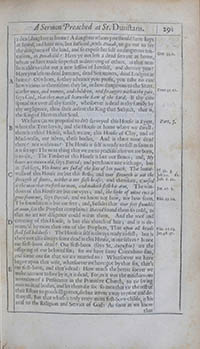 A Sermon Preached at St. Dunstans.
291
Serm.21.
A Sermon Preached at St. Dunstans.
291
Serm.21.
a dead daughter at home? A daughter whom you should have kept
at home, and have not; but suffered, with Dinah, to go out to see
the daughters of the land, and so expose her self to dangerous ten-
tations, as Dinah did? Have ye not left a dead servant at home,Gen. 34.1.
whom ye have made so perfect in deceiving of others, as that now
he is able to take out a new lesson of himself, and deceive you?
Have you left no dead Inmates, dead Sojourners, dead Lodgers at
home? Of whom, so they advance your profit, you take no care
how vicious in themselves they be, or how dangerous to the State.Deut. 31.12.
Gather men, and women, and children, and strangers within thy gate,
says God, that they may all learn the Law of the Lord. If thy care
spread not over all thy family, whosoever is dead in thy family by
thy negligence, thou shalt answer the King that Subject, that is,
the King of Heaven that Soul. We have (as we proposed to do) surveyed this House in Egypt,Part. 3.
where the Text lays it, and the House at home where we dwell;
there is a third House, which we are, this House of Clay, and of
Mud-walls, our selves, these bodies. And is there none dead
there? not within us? The House it self is ready to fall as soon as
it is set up: The next thing that we are to practise after we are born,
is to die. The Timber of this House is but our Bones; and, My
bones are waxen old, says David; and perchance not with age, but Ps. 32.3.
as Job says, His bones are full of the sins of his youth.Job 20.11.
Job. 6.12. The lome-
walls of this House are but this flesh; and Our strength is not the
strength of stones, neither is our flesh brass; and therefore, Cursed
is the man that trusteth in man, and maketh flesh his arm. The win-
dows of this House are but our eyes; and, the light of mine eyes is Jer. 17.5.
gone from me, says David; and we know not how, nor how soon.Esai. 59.10.
The foundation is but our feet; and, besides that Our feet stumble
at noon, (as the Prophet complains) David found them so cold, as
that no art nor diligence could warm them. And the roof and
covering of this House, is but this thatch of hair; and it is de-
nounc'd by more then one of the Prophets,Esai. 15.23. That upon all heads
shall fall baldness: The House it self is always ready to fall; but is Jer. 48.37.
there not also always some dead in this House, in our selves? Is not
our first-born dead? Our first-born (says St. Augustin) are the
offspring of our beloved sin; for we have some Concubine-
sins, and some one sin that we are married to: Whatsoever we have
begot upon that wife, whatsoever we have got by that sin, that's
our first-born, and that's dead: How much the better soever we
make account to live by it, it is dead. For, as it was the mischievous
invention of a Persecutor in the Primitive Church, to tie living
men to dead bodies, and let them die so; so men that tie the rest of
their Estate to goods ill gotten, do but invent a way to ruine and de-
stroy all. But that which is truly every mans first-born-childe, is his
zeal to the Religion and Service of God: As soon as we know
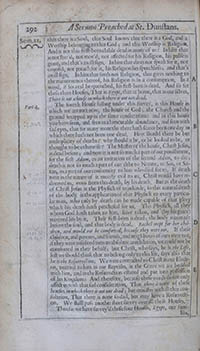 A Sermon Preached at St. Dunstans.
292
Serm.21.
A Sermon Preached at St. Dunstans.
292
Serm.21.
that there is a Soul, that Soul knows that there is a God, and a
Worship belonging to that God; and this Worship is Religion.
And is not this first-born childe dead in many of us? In him that
is not stirr'd, not mov'd, not affected for his Religion, his pulse is
gone, and that's an ill sign. In him that dares not speak for it, not
counsel, not preach for it, his Religion lies speechless; and that's
an ill sign. In him that feeds not Religion, that gives nothing to
the maintenance thereof, his Religion is in a consumption. In a
word, if his zeal be quenched, his first-born is dead. And so for
these three Houses, That in Egypt, that at home, that in our selves,
There is not a house in which there is not one dead. Part 4.The fourth House falling under this survey, is this House in
which we are met now, the house of God; the Church and the
ground wrapped up in the same consecration: and in this house
you have seen, and seen in a lamentable abundance, and seen with
sad eyes, that for many moneths there hath scarce been one day in
which there hath not been one dead. How should there be but
multiplicity of deaths? why should it be, or be looked to be, or
thought to be otherwise? The Master of the house, Christ Jesus,
is dead before; and now it is not so much a part of our punishment,
for the first Adam, as an imitation of the second Adam, to die;
death is not so much a part of our debt to Nature, or Sin, or Sa-
tan, as a part of our conformity to him who died for us. If death
were in the nature of it meerly evil to us, Christ would have re-
deemed us, even from this death, by his death. But as the death
of Christ Jesus is the Physick of mankinde, so this natural death
of the body is the application of that Physick to every particu-
lar man, who only by death can be made capable of that glory
which his death hath purchased for us. This Physick, all they
whom God hath taken to him, have taken, and (by his grace)
received life by it. Their first-born is dead; the body was made
before the soul, and that body is dead. Rachel wept for her chil-
dren, and would not be comforted, because they were not. If these
children, and parents, and friends, and neighbours of ours were not,
if they were resolved into an absolute annihilation, we could not be
comforted in their behalf; but Christ, who says, he is the Life,
lest we should think that to belong only to this life, says also that
he is the Resurrection. We were contracted to Christ in our Electi-
on, married to him in our Baptism, in the Grave we are bedded
with him, and in the Resurrection estated and put into possession
of his Kingdom: And therefore, because these words do not only
affect us with that sad consideration, That there is none of these
houses in whiehwhich there is not one dead; but minister withall that con-
solation, That there is none so daddead, but may have a Resurrecti-
on, We shall pass another short survey over all these Houses. Thus far we have survey'd these four Houses, Egypt, our fami-
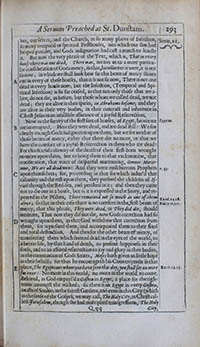 A Sermon Preached at St. Dunstans.
293
Serm.21.
lies, our selves, and the Church, as so many places of Infection,
A Sermon Preached at St. Dunstans.
293
Serm.21.
lies, our selves, and the Church, as so many places of Infection,
so many temporal or spiritual Pesthouses, into which our sins had
heaped powder, and Gods indignation had cast a match to kindle
it. But now the very phrase of the Text, which is, That in every
house there was one dead, There was, invites us to a more particu-
lar consideration of Gods mercy, in that, howsoever it were, it is not
so now; in which we shall look how far this beam of mercy shines
out in every of these houses, that it is not so now, There is not one
dead in every house now; but the Infection, (Temporal and Spi-
ritual Infection) is so far ceased, as that not only those that are a-
live, do not die, as before; but those whom we called dead, are not
dead; they are alive in their spirits, in Abrahams bosome; and they
are alive in their very bodies, in their contract and inherence in
Christ Jesus in an infallible assurance of a joyful Resurrection. Now in the survey of the first sort of houses, of Egypt,Egyptus. herein we
are interrupted. Here they were dead, and are dead still: We see
clearly enough Gods indignation upon them; but we see neither of
those beams of mercy, either that there die no more, or that we
have the comfort of a joyful Resurrection in them who are dead:
For this fearful calamity of the death of their first-born wrought
no more upon them, but to bring them to that exclamation, that
vociferation, that voice of despairful murmuring, Omnes Morie-
mur, We are all dead men:v. 33. And they were mischievous Prophets
upon themselves; for, proceeding in that sin which induc'd that
calamity and the rest upon them, they pursued the children of Is-
rael through the Red-sea, and perished in it; and then they came
not to die one in a house, but as it is expressed in the Story, and re-
peated in the Psalms,Exod. 14.28. There remained not so much as one of them
alive; so that in their case there is no comfort in the first beam of Psal. 106.10.
mercy, that this phrase, They were dead, or They did die, should
intimate, That now they did not die, now Gods correction had so
wrought upon them, as that God withdrew that correction from
them, for it pursued them, and accompanied them to their final
and total destruction. And then for the other beam of mercy, of
transferring them which seemed dead in the eyes of the world, to
a better life, by that hand of death, to present happiness in their
souls, and to an assured resurrection to joy and glory in their bodies,
in the communion of Gods Saints, Moses hath given us little hope
in their behalf; for thus he encourageth his Countreymen in that
place, The Egyptians whom you have seen this day,Exod. 14.13. you shall see no more
for ever: No more in this world, no more in the world to come.
Beloved, as God empayl'd a Goshen in Egypt, a place for the righ-
teous amongst the wicked; so there is an Egypt in every Goshen,
neasts of Snakes in the fairest Gardens, and even in this City (which
in the sense of the Gospel, we may call, The Holy City; as Christ cal-
led Jerusalem, though she had multiplied transgressions, The Holy Qqq
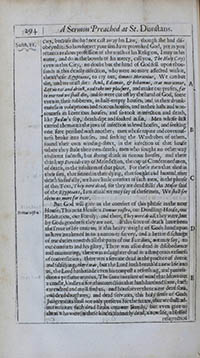 A Sermon Preached at St. Dunstans.
294
Serm.21.
A Sermon Preached at St. Dunstans.
294
Serm.21.
City, because she had not cast away his Law, though she had dis-
obeyed it: So howsoever your sins have provoked God, yet as you
retain a zealous profession of the truth of his Religion, I may in his
name, and do in the bowels of his mercy, call you, The Holy City)
even in this City, no doubt but the hand of God fell upon thou-
sands in this deadly infection, who were no more affected with it,
then those Egyptians, to cry out, Omnes Moriemur, We can but
die, and we must die: And, Edamus, & bibamus, cras moriemur,
Let us eat and drink, and take our pleasure, and make our profits, for
to morrow we shall die, and so were cut off by the hand of God, some
even in their robberies, in half-empty houses; and in their drunk-
enness in voluptuous and riotous houses; and in their lusts and wan-
tonness in licentious houses; and so took in infection and death,
like Judas's sop, death dipt and soaked in sin. Men whose lust
carried them into the jaws of infection in lewd houses, and seeking
one sore perished with another; men whose rapine and covetous-
ness broke into houses, and seeking the Wardrobes of others,
found their own winding-sheet, in the infection of that house
where they stole their own death; men who sought no other way
to divert sadness, but strong drink in riotous houses, and there
drank up Davids cup of Malediction, the cup of Condemned men,
of death, in the infection of that place. For these men that died in
their sins, that sinned in their dying, that sought and hunted after
death so sinfully, we have little comfort of such men, in the phrase
of this Text, They were dead; for they are dead still: As Moses said
of the Egyptians, I am afraid we may say of these men, We shall see
them no more for ever. But God will give us the comfort of this phrase in the next
House;Domus nostra. This next House is Domus nostra, our Dwelling-House, our
Habitation, our Family; and there, They were dead; they were, but
by Gods goodness they are not. If this savor of death have been
the savor of life unto us; if this heavy weight of Gods hand upon
us have awakened us to a narrower survey, and a better discharge
of our duties towards all the parts of our Families, we may say, to
our comforts and his glory, There was a son dead in disobedience
and murmuring; there was a daughter dead in a dangerous easiness
of conversation; there was a servant dead in the practice of deceit
and falsifying; there was, but the Lord hath breath'd a new life into
us, the Lord hath made even his tempest a refreshing, and putrefa-
ction a perfume unto us. The same measure of wind that blows out
a candle, kindles a fire; this correction that hath hardned some, hath
entendred and mollified us; and howsoever there were dead sons,
and dead daughters, and dead servants, this holy sense of Gods
Judgements shall not only preserve for the future, that we shall ad-
mit no more such dead limbs into our Family, but even give to
them who were (in these kindes) formerly dead, a new life, a blessed
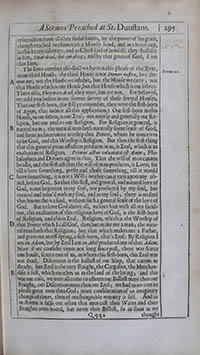 A Sermon Preached at St. Dunstans.
295
Serm.21.
A Sermon Preached at St. Dunstans.
295
Serm.21.
resurrection from all their sinful habits, by the power of his grace,
though reached to them with a bloody hand, and in a bitter cup,
in this heavy calamity; and as Christ said of himself, they shall say
in him, I was dead, but am alive; and by that grace of God, I am
that I am. The same comfort also shall we have in this phrase of the Text,
in our third House; the third House is not Domus nostra,Domus nos. but Do-
mus nos, not the House we inhabit, but the House we carry; not
that House which is our House, but that House which is our selves:
There also, They were dead; they were, but are not. For beloved,
we told you before in our former survey of these several Houses,
That our first-born, (for still ye remember, they were the first-born
of Egypt, that induce all this application;) Our first-born in this
House, in our selves, is our Zeal; not meerly and generally our Re-
ligion, but our zeal to our Religion. For Religion in general, is
natural to us; the natural man hath naturally some sense of God,
and some inclination to worship that Power, whom he conceives
to be God, and this Worship is Religion. But then the first thing
that this general pious affection produces in us, is Zeal, which is an
exaltation of Religion. Primus actus voluntatis est Amor; Phi-
losophers and Divines agree in that, That the will of man cannot
be idle, and the first act that the will of man produces, is Love; for
till it love something, prefer and chuse something, till it would
have something, it is not a Will; neither can it turn upon any ob-
ject, before God. So that this first, and general, and natural love of
God, is not begotten in my soul, nor produced by my soul, but
created and infus'd with my soul, and as my soul; there is no soul
that knows she is a soul, without such a general sense of the love of
God. But to love God above all, to love him with all my facul-
ties, this exaltation of this religious love of God, is the first-born
of Religion, and this is Zeal. Religion, which is the Worship of
that Power which I call God, does but make me a man; the natu-
ral man hath that Religion; but that which makes me a Father,
and gives me an off-spring, a first-born, that's Zeal: By Religion I
am an Adam, but by Zeal I am an Abel produced out of that Adam.
Now if we consider times not long since past, there was scarce
one house, scarce one of us, in whom this first-born, this Zeal was
not dead. Discretion is the ballast of our Ship, that carries us
steady; but Zeal is the very Fraight, the Cargason, the Merchan-
dise it self, which enriches us in the land of the living; and this
was our case, we were all come to esteem our Ballast more then our
Fraight, our Discretion more then our Zeal; we had more care to
please great men then God; more consideration of an imaginary
change of times, then of unchangeable eternity it self. And as
in storms it falls out often that men cast their Wares and their
Fraights over-board, but never their Ballast, so as soon as we
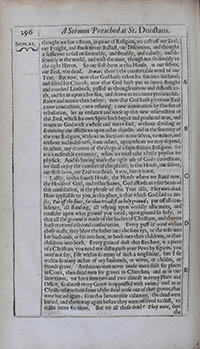 A Sermon Preached at St. Dunstans.
296
Serm.21.
A Sermon Preached at St. Dunstans.
296
Serm.21.
thought we saw a storm, in point of Religion, we cast off our Zeal,
our Fraight, and stuck to our Ballast, our Discretion, and thought
it sufficient to sail on smoothly, and steadily, and calmly, and di-
screetly in the world, and with the time, though not so directly to
the right Haven. So our first-born in this House, in our selves,
our Zeal, was dead. It was; there's the comfortable word of our
Text. But now, now that God hath taken his fan into his hand,
and sifted his Church, now that God hath put us into a straight
and crooked Limbeck, passed us through narrow and difficult tri-
als, and set us upon a hot fire, and drawn us to a more precious sub-
stance and nature then before; now that God hath given our Zeal
a new concoction, a new refining, a new inanimation by this fire of
tribulation, let us embrace and nurse up this new resurrection of
this Zeal, which his own Spirit hath begot and produced in us, and
return to God with a whole and entire soul, without dividing or
scattering our affections upon other objects; and in the sincerity of
the true Religion, without inclinations in our selves, to induce; and
without inclinableness, from others, upon whom we may depend,
to admit, any dramms of the dregs of a superstitious Religion; for
it is a miserable extremity, when we must take a little poyson for
physick. And so having made the right use of Gods corrections,
we shall enjoy the comfort of this phrase, in this House, our selves,
our first-born, our Zeal was dead; it was, but it is not. Lastly, in this fourth House, the House where we stand now,
the House of God, and of his Saints, God affords us a fair beam of
this consolation, in the phrase of this Text also, They were dead.
How appliable to you, in this place, is that which God said to Mo-
ses, Put off thy shoes, for thou treadest on holy ground; put off all con-
fidence, all standing, all relying upon worldly assurances, and
consider upon what ground you tread; upon ground so holy, as
that all the ground is made of the bodies of Christians, and therein
hath received a second consecration. Every puff of wind within
these walls, may blow the father into the sons eys, or the wife into
her husbands, or his into hers, or both into their childrens, or their
childrens into both. Every grain of dust that flies here, is a piece
of a Christian; you need not distinguish your Pews by figures; you
need not say, I sit within so many of such a neighbour, but I sit
within so many inches of my husbands, or wives, or childes, or
friends grave. Ambitious men never made more shift for places
in Court, then dead men for graves in Churches; and as in our
later times, we have seen two and two almost in every Place and
Office, so almost every Grave is oppressed with twins; and as at
Christs resurrection some of the dead arose out of their graves, that
were buried again; so in this lamentable calamity, the dead were
buried, and thrown up again before they were resolved to dust, to
make room for more. But are all these dead? They were, says
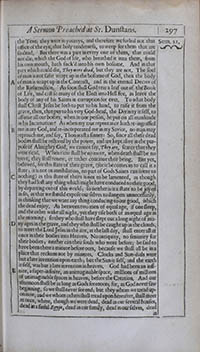 A Sermon Preached at St. Dunstans.
297
Serm.21.
A Sermon Preached at St. Dunstans.
297
Serm.21.
the Text; they were in your eys, and therefore we forbid not that
office of the eye, that holy tenderness, to weep for them that are
so dead. But there was a part in every one of them, that could
not die; which the God of life, who breathed it into them, from
his own mouth, hath suck'd into his own bosome. And in that
part which could die, They were dead, but they are not. The soul
of man is not safer wrapt up in the bosome of God, then the body
of man is wrapt up in the Contract, and in the eternal Decree of
the Resurrection. As soon shall God tear a leaf out of the Book
of Life, and cast so many of the Elect into Hell fire, as leave the
body of any of his Saints in corruption for ever. To what body
shall Christ Jesus be loth to put to his hand, to raise it from the
grave, then, that put to his very God-head, the Divinity it self, to
assume all our bodies, when in one person, he put on all mankinde
in his Incarnation? As when my true repentance hath re-ingraffed
me in my God, and re-incorporated me in my Savior, no man may
reproach me, and say, Thou wast a sinner: So, since all these dead
bodies shall be restored by the power, and are kept alive in the pur-
pose of Almighty God, we cannot say, They are, scarce that they
were dead. When time shall be no more, when death shall be no
more, they shall renew, or rather continue their being. But yet,
beloved, for this state of their grave, (for it becomes us to call it a
state; it is not an annihilation, no part of Gods Saints can come to
nothing) as this state of theirs is not to be lamented, as though
they had lost any thing which might have conduced to their good,
by departing out of this world; so neither is it a state to be joyed
in so, as that we should expose our selves to dangers unnecessarily,
in thinking that we want any thing conducing to our good, which
the dead enjoy. As between two men of equal age, if one sleep,
and the other wake all night, yet they rise both of an equal age in
the morning; so they who shall have slept out a long night of ma-
ny ages in the grave, and they who shall be caught up in the clouds,
to meet the Lord Jesus in the aire, at the last day, shall enter all at
once in their bodies into Heaven. No antiquity, no seniority for
their bodies; neither can their souls who went before, be said to
have been there a minute before ours, because we shall all be in a
place that reckons not by minutes. Clocks and Sun-dials were
but a late invention upon earth; but the Sun it self, and the earth
it self, was but a late invention in heaven. God had been an infi-
nite, a super-infinite, an unimaginable space, millions of millions
of unimaginable spaces in heaven, before the Creation. And our
afternoon shall be as long as Gods forenoon; for, as God never saw
beginning, so we shall never see end; but they whom we tread up-
on now, and we whom others shall tread upon hereafter, shall meet
at once, where, though we were dead, dead in our several houses,
dead in a sinful Egypt, dead in our family, dead in our selves, dead
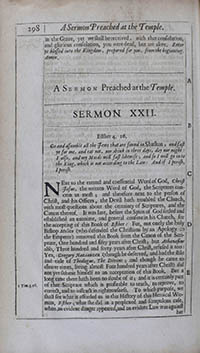 A Sermon Preached at the Temple.
298
Serm.22.
A Sermon Preached at the Temple.
298
Serm.22.
in the Grave, yet we shall be received, with that consolation,
and glorious consolation, you were dead, but are alive. Enter
ye blessed into the Kingdom, prepared for you, from the beginning. Amen. A Sermon Preached at the Temple.
SERMON XXII. Esther 4.16.
Go and assemble all the Jews that are found in Shushan, and fast
ye for me, and eat not, nor drink in three days, day nor night:
I also, and my Maids will fast likewise; and so I will go in to
the King, which is not according to the Law: And if I perish,
I perish. NExtNext to the eternal and coessential Word of God, Christ
Jesus, the written Word of God, the Scriptures con-
cern us most; and therefore next to the person of
Christ, and his Offices, the Devil hath troubled the Church,
with most questions about the certainty of Scriptures, and the
Canon thereof. It was late, before the Spirit of God setled and
established an unanime, and general consent in his Church, for
the accepting of this Book of Esther: For, not onely the holy
Bishop Melito (who defended the Christians by an Apology to
the Emperor) removed this Book from the Canon of the Scri-
pture, One hundred and fifty years after Christ; but Athanasius
also, Three hundred and forty years after Christ, refused it too:
Yea, Gregory Nazianzen (though he deserved, and had the stile
and title of Theologus, The Divine; and though he came to
clearer times, living almost Four hundred years after Christ) did
not yet submit himself to an acceptation of this Book. But a
long time there hath been no doubt of it; and it is certainly part
of that Scripture which is profitable to teach,2 Tim. 3.16. to reprove, to
correct, and to instruct in righteousness. To which purpose, we
shall see what is afforded us in this History of this Heroical Wo-
man, Esther; what she did in a perplexed and scrupulous case,
when an evident danger appeared, and an evident Law was against
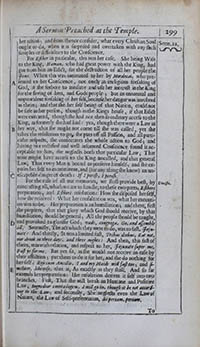 A Sermon Preached at the Temple.
299
Serm.22.
A Sermon Preached at the Temple.
299
Serm.22.
her action; and from thence consider, what every Christian Soul
ought to do, when it is surprised and overtaken with any such
scruples or difficulties to the Conscience. For Esther in particular, this was her case. She being Wife
to the King, Haman, who had great power with the King, had
got from him an Edict, for the destruction of all her people the
Jews. When this was intimated to her by Mordecai, who pre-
sented to her Conscience, not onely an irreligious forsaking of
God, if she forbore to mediate and use her interest in the King
for the saving of hers, and Gods people; but an unnatural and
unprovident forsaking of her self, because her danger was involved
in theirs; and that she her self being of that Nation, could not
be safe in her person, though in the Kings house, if that Edict
were executed, though she had not then so ordinary access to the
King, as formerly she had had: yea, though there were a Law in
her way, that she might not come till she was called, yet she
takes the resolution to go, she puts off all Passion, and all parti-
cular respects, she consecrates the whole action to God; and
having in a rectified and well informed Conscience found it ac-
ceptable to him, she neglects both that particular Law, That
none might have access to the King uncalled, and that general
Law, That every Man is bound to preserve himself; and she ex-
poses her self to an imminent, and (for any thing she knew) an un-
escapable danger of death: If I perish, I perish. For the ease of all our memories, we shall provide best,Divisio. by
contracting all, which we are to handle, to these two parts; Esthers
preparation, and Esthers resolution: How she disposed her self,
how she resolved: What her consultation was, what her executi-
on was to be. Her preparation is an humiliation; and there, first
she prepares, that that glory which God should receive, by that
humiliation, should be general; All the people should be taught,
and provoked to glorifie God; vade, congrega, Go, and assemble
all. Secondly, The act which they were to do, was to fast, Jeju-
nate: And thirdly, It was a limited fast, Tribus diebus, Eat not,
nor drink in three days, and three nights: And then, this fast of
theirs, was with relation, and respect to her, Jejunate super me,
Fast ye for me. But yet so, as she would not receive an ease by
their affliction; put them to do it for her, and she do nothing for
her self; Ego cum Ancillis, I and my Maids will fast too; and si-
militer, likewise, that is, As exactly as they shall. And so far
extends her preparation: Her resolution derives it self into two
branches. First, That she will break an Humane and Positive
Law, Ingrediar contra legem, I will go in, though it be not accord-
ing to the Law; and secondly, She neglects even the Law of
Nature, the Law of Self-preservation, Si peream, peream.
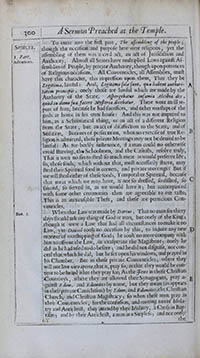 A Sermon Preached at the Temple.
300
Serm.22.
A Sermon Preached at the Temple.
300
Serm.22.
To enter into the first part, The assembling of the people;
though the occasion and purpose here were religious, yet the
assembling of them was a civil act,1. Part.
Assemblies. an act of Jurisdiction and
Authority. Almost all States have multiplied Laws against As-
semblies of People, by private Authority, though upon pretences
of Religious occasions. All Conventicles, all Assemblies, must
have this character, this impression upon them, That they be
Legitima, lawful: And, Legitima sola sunt, qu habent authori-
tatem principis, onely those are lawful which are made by the
Authority of the State. Aspergebatur infamia Alcibia des,
qu d in domo sua facere Mysteria dicebatur. There went an ill re-
port of him, because he had sacrifices, and other worships of the
gods at home in his own house: And this was not imputed to
him, as a Schismatical thing, or an act of a different Religion
from the State, but an act of disaffection to the State, and of
Sedition. In times of persecution, when no exercise of true Re-
ligion is admitted, these private Meetings may not be denied to be
lawful: As for bodily sustenance, if a man could nonot otherwise
avoid starving, the Schoolmen, and the Casuists, resolve truly,
That it were no sin to steal so much meat as would preserve life;
so, those souls, which without that, must necessarily starve, may
steal their Spiritual food in corners, and private meetings: But if
we will steal either of these foods, Temporal or Spiritual, because
that meat which we may have, is not so dressed, so dished, so
sauced, so served in, as we would have it; but accompanied
with some other ceremonies then are agreeable to our taste;
This is an inexcusable Theft, and these are pernicious Con-
venticles. Dan. 6.When that Law was made by Darius, That no man for thirty
days should ask any thing of God or man, but onely of the King;
though it were a Law that had all circumstances to make it no
Law, yet Daniel took no occasion by this, to induce any new
manner of worshipping of God; he took no more company with
him to affront the Law, or exasperate the Magistrate; onely he
did as he had used to do before; and he did not disguise, nor con-
ceal that which he did, but he set open his windows, and prayed in
his Chamber. But in these private Conventicles, where they
will not live voto aperto, that is, pray so, as that they would be con-
tent to be heard what they pray for; As the Jews in those Christian
Countreys, where they are allowed their Synagogues, pray a-
gainst Edom, and Edomites by name, but they mean (as appears
in their private Catechisms) by Edom, and Edomites, the Christian
Church, and Christian Magistracy; so when these men pray in
their Conventicles, for the confusion, and rooting out of Idola-
try and Antichrist, they intend by their Idolatry, a Cross in Bap-
tism; and by their Antichrist, a man in a Surpless; and not onely
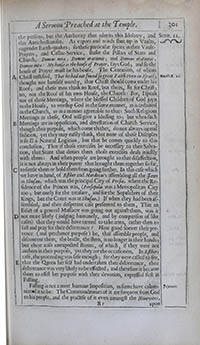 A Sermon Preached at the Temple.
301
Serm.22.
A Sermon Preached at the Temple.
301
Serm.22.
the persons, but the Authority that admits this Idolatry, and
this Antichristianism. As vapors and winds shut up in Vaults,
engender Earth-quakes; so these particular spirits in their Vault-
Prayers, and Cellar-Service, shake the Pillars of State and
Church. Domus mea, Domus orationis; and Domus orationis,
Domus mea: My house is the house of Prayer, says God; and so the
house of Prayer must be his house. The Centurion, of whom
Christ testified, That he had not found so great Faith even in Israel;Matth. 8.10.
thought not himself worthy, that Christ should come under his
Roof; and these men think no Roof, but theirs, fit for Christ;
no, not the Roof of his own House, the Church: For, I speak
not of those Meetings, where the blessed Children of God joyn
in the House, to worship God in the same manner, as is ordained
in the Church, or in a manner agreeable to that: Such Religious
Meetings as these, God will give a blessing to; but when such
Meetings are in opposition, and detestation of Church Service,
though their purpose, which come thither, do not always intend
sedition, yet they may easily think, that none of those Disciples
is so ill a Natural Logician, but that he comes quickly to this
conclusion, That if those exercises be necessary to their Salva-
tion, that State that denies them those exercises deals injustly
with them: And when people are brought to that disaffection,
it is not always in their power that brought them together so far,
to settle them or hold them from going farther. In this case which
we have in hand, of Esther and Mordecai's assembling all the Jews
in Shusan, which was the principal City of Persia, where the Re-
sidence of the Princes was, (Persepolis was a Metropolitan City
too; but onely for the treasure, and for the Sepulchres of their
Kings, but the Court was at Shusan.) If when they had been as-
sembled, and their desperate case presented to them, That an
Edict of a general Massacre was going out against them, was it
not more likely (judging humanely, and by comparison of like
cases) that they would have turned to take arms, rather then to
fast and pray for their deliverance? How good soever their pre-
tence (and perchance purpose) be, that assemble people, and
discontent them, the bridle, the stern, is no longer in their hands;
but there arise unexpected storms, of which, if they were not
authors in their purpose, yet they are the occasioners. In Esthers
case, the proceeding was safe enough; for they were called to see,
that the Queen her self had undertaken their deliverance, their
deliverance was very likely to be effected; and therefore it became
them to assist her purpose with their devotion, expressed first in
Fasting. Fasting is not a meer humane Imposition,Jejunate. as some have calum-
niated it to be: The Commandments of it are frequent from God
to his people, and the practise of it even amongst the Ninevites, Rr
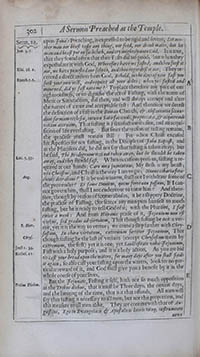 A Sermon Preached at the Temple.
302
Serm.22.
A Sermon Preached at the Temple.
302
Serm.22.
upon Jona's Preaching, is expressed to be rigid and severe, Let nei-
ther man nor beast taste any thing, nor feed, nor drink water, but let
man and beast put on sackcloth,Jon. 3.7. and cry mightily unto God. It is true,
that they found often that their Fasts did no good; but when they
expostulate it with God, Wherefore have we fasted, and thou seest it
not,Esai. 58.2. we have punished our selves, and thou regardest it not; They re-
ceived a direct answer from God, Behold, in the days of your fast you
seek your own will, Ezech. 7.5. and require all your debts; when ye fasted and
mourned, did ye fast unto me? To place therefore any part of our
righteousness, or to dignifie the act of Fasting, with the name of
Merit or Satisfaction, did then, and will always corrupt and alter
the nature of a true and acceptable fast: And therefore we detest
the definition of a fast in the Roman Church, & Abstinentia secun-
dum formam ecclesi, intuitu Satisfaciendi, pro peccatis, & acquirendi
vitam ternam; That fasting is a satisfaction for sins, and an acqui-
sition of life everlasting. But since the reason of fasting remains,
the practise must remain still: For when Christ excused
his Apostles for not fasting, as the Disciples of John Baptist, and
as the Pharisees did, he did not say that fasting is taken away; but
he said,Luc. 5.33. The Bridegroom was not taken away; but he should be taken
away, and they should fast. When occasions press us, fasting is re-
quired at our hands: Caro mea jumentum, My flesh is my beast;
via Christus, and Christ is the way I am to go; Nonne cibaria fero-
cienti detraham? Aug. If it be too wanton, shall not I withdraw some of
the provender? Et fame Domem, quem ferre non possum, If I can-
not govern him, shall I not endeavour to tame him? And there-
fore, though by reason of former abuses, it be a slippery Doctrine,
the practise of Fasting, (for scarce any man puts himself to much
fasting, but he is ready to tell God of it, with the Pharisee, I fast
twice a week: And from Hieroms praise of it, Jejunium non est
virtus,S. Hier. sed gradus ad virtutem, That though fasting be not a ver-
tue, yet it is the way to vertue; we come a step farther with Chry-
sostom,Chrys. In choro virtutum, extremum sortitur Jejunium, That
though fasting be the last of vertues (except Chrysostom mean by
extremum,Joel 1.34. the first) yet it is one; yet Sanctificate vobis Jejunium,
Fast with a holy purpose; and it is a holy action. As you are bid Eccles. 11.
to cast your bread upon the waters, for many days after you shall finde
it again; so also cast your fasting upon the waters, look for no par-
ticular reward of it, and God shall give you a benefit by it in the
whole course of your lives. Tribus Diebus.But the Jejunate, Fasting it self, hath not so much opposition
as the Tribus diebus, that it must be Three days; the certain days,
and the limiting of the time, that is it that offends. All men will
say that fasting is necessary to all men; but not this proportion, and
this measure to all men alike. They are content with that of Au-
gustine, Ego in Evangelicis & Apostolicis literis totoq;que instrumento
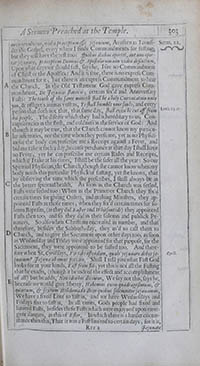 A Sermon Preached at the Temple.
303
Serm.22.
A Sermon Preached at the Temple.
303
Serm.22.
novo revolvens, video pr ceptum esse jejunium, As often as I consi-
der the Gospel, every where I finde Commandments for fasting;
but they will have the rest too: Quibus diebus oportet, aut non opor-
tet jejunare, pr ceptum Domini & Apostolorum non video definitum,
Upon what days we should fast, says he, I see no Commandment
of Christ or the Apostles: And it is true, there is no express Com-
mandment for it; but there is an express Commandment to hear
the Church. In the Old Testament God gave express Com-
mandment, De Jejuniis stativis; certain fix'd and Anniversary
Fasts: The tenth of the same moneth shall be a holy Convocation unto
you, & affligetis animas vestras, Ye shall humble your souls; and every
person that doth not that, that same day,Levit. 23.27. shall even be cut off from
his people. The disease which they had is hereditary to us; Con-
cupiscencies in the flesh, and coldness in the service of God: And
though it may be true, that the Church cannot know my particu-
lar infirmities, nor the time when they press me; yet as no Physici-
an for the body can prescribe me a Receipt against a Fever, and
bid me take it such a day, because perchance at that day I shall have
no Fever; yet he can prescribe me certain Rules and Receipts,
which if I take at his times, I shall be the safer all the year: So our
Spiritual Physician, the Church, though she cannot know when my
body needs this particular Physick of fasting, yet she knows, that
by observing the time which she prescribes, I shall always be in
the better spiritual health. As soon as the Church was setled,
Fasts were setled too: When in the Primitive Church they fix'd
certain times for giving Orders, and making Ministers, they ap-
pointed Fasts at those times; when they fix'd certain times for so-
lemn Baptism, (as they did Easter and Whitsontide) they appointed
Fasts then too; and so they did in their solemn and publick Pe-
nances. So also when Christians encreased in number, and that
therefore, besides the Sabbath-day, they us'd to call them to
Church, and to give the Sacrament upon other days too; as soon
as Wednesday and Friday were appointed for that purpose, for the
Sacrament, they were appointed to be fasted too. And there-
fore when St. Cyril says,Cyril. Vis tibi ostendam, quale jejunare debes je-
junium? Jejuna ab omni peccato. Shall I tell you what Fast God
looks for at your hands, Fast from sin; yet this is not all the Fasting
that he exacts, (though it be indeed the effect and accomplishment
of all) but he adds, Non ideo hoc dicimus, We say not this, says he,
because we would give liberty, Habemus enim quadragesimum, &
quartum, & sextum Hebdomad diem quibus solemniter jejunamus,
We have a fixed Lent to fast in, and we have Wednesdays and
Fridays fixt to fast in. In all times, Gods people had fixed and
limited Fasts, besides these Fasts which were enjoyned upon emer-
gent dangers, as this of Ester. In which there is a harder circum-
stance then this, That it was a Fast limited to certain days; for it is,
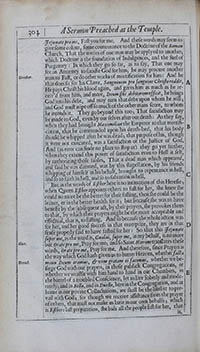 A Sermon Preached at the Temple.
304
Serm.22.
A Sermon Preached at the Temple.
304
Serm.22.
Jejunate pro me, Fast you for me. And these words may seem to
give some colour, some countenance to the Doctrine of the Roman
Church, That the merits of one man may be applyed to another;
which Doctrine is the foundation of Indulgences, and the fuel of
Purgatory: In which they go so far, as to say, That one may
fee an Attorney to satisfie God for him; he may procure another
man to Fast,Grether. or do other works of mortification for him: And he
that does so for his Client, Sanguinem pro sanguine Christo reddit,
He pays Christ his blood again, and gives him as much as he re-
ceiv'd from him; and more, Deum sibi debitorem efficit, he brings
God into his debt, and may turn that dept upon whom he will;
and God must wipe off so much of the other mans score, to whom
he intends it. They go beyond this too; That satisfaction may
be made to God, even by our selves after our death: As they say,
when they had brought Maximilian the Emperor to that mortifi-
cation, that he commanded upon his death-bed, that his body
should be whipped after he was dead; that purpose of his, though
it were not executed, was a satisfaction of the Justice of God.
And (as error can finde no place to stop at) they go yet farther,
when they extend this power of satisfaction even to Hell it self,
by authorizing those fables, That a dead man which appeared,
and said he was damned, was by this flagellation, by his friends
whipping of himself in his behalf, brought to repentance in hell,
and so to faith in hell, and so to salvation in hell. But in the words of Esther here is no intimation of this Heresie;
when Queen Esther appoints others to fast for her, she knew she
could no more be the better for their fasting, then she could be the
leaner, or in the better health for it; but because she was to have
benefit by the subsequent act, by their prayers, she provokes them
to that, by which their prayers might be the more acceptable and
effectual, that is, to fasting. And so because the whole action was
for her, and her good success in that enterprize, they are in that
sense properly said to have fasted for her: So that this Jejunate
super me, as the word is, Gnalai, super me, in my behalf, is no more
but Orate pro me,Hier. Pray for me; and so Saint Hierom translates these
words, Orate pro me, Pray for me. And therefore, since Prayers is
the way which God hath given us to batter Heaven, whether facta
manu Deum oramus,Tertul. & vim gratam ei facimus, whether we be-
siege God with our prayers, in these publick Congregations, or
whether we wrastle with him hand to hand in our Chambers, in
the battel of a troubled Conscience, let us live soberly and mode-
rately; and in Bello, and in Duello, here in the Congregation, and at
home in our private Colluctations, we shall be the likelier to pre-
vail with God; for though we receive assistance from the prayer
of others, that must not make us lazie in our own behalfs; which
is Esthers last preparation, she bids all the people fast for her, that
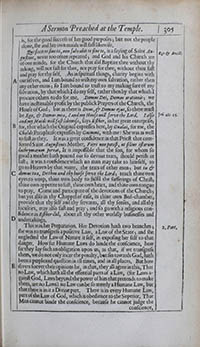 A Sermon Preached at the Temple.
305
Serm.22.
A Sermon Preached at the Temple.
305
Serm.22.
is, for the good success of her good purposes; but not the people
alone, she and her own maids will fast likewise. Qui fecit te sine te, non salvabit te sine te,Ego & Ancill. is a saying of Saint Au-
gustine, never too often repeated; and God and his Church are
of one minde; for the Church that did Baptize thee without thy
asking, will not fast for thee, nor pray for thee, without thou fast
and pray for thy self. As in spiritual things, charity begins with
ourselves, and I am bound to wish my own salvation, rather then
any other mans; so I am bound to trust to my making sure of my
salvation, by that which I do my self, rather then by that which I
procure others to do for me. Domus Dei, Domus orationis; we
have inestimable profit by the publick Prayers of the Church, the
House of God; but as there is Deus, & Domus ejus, so there must
be Ego, & Domus mea, I and my House will serve the Lord.Jos. ult. 15. I also
and my Maids will fast likewise, says Esther, in her great enterprise;
for, that which the Original expresses here, by Gnalai, for me, the
Chalde Paraphrase expresses by Gnimmi, with me: She was as well
to fast as they. It was a great confidence in that Priest that com-
forted Saint Augustines Mother, Fieri non potest, ut filius istarum
lachrymarum pereat, It is impossible that the son, for whom so
good a mother hath poured out so devout tears, should perish at
last; it was a confidence which no man may take to himself, to
go to Heaven by that water, the tears of other men; but tu &
domus tua, Do thou and thy house serve the Lord; teach thine own
eyes to weep, thine own body to fulfil the sufferings of Christ;
thine own appetite to fast, thine own heart, and thine own tongue
to pray. Come and participate of the devotions of the Church;
but yet also in thy Chappel of ease, in thine own Bed-chamber,
provide that thy self and thy servants, all thy senses, and all thy
faculties, may also fast and pray; and so go with a religious con-
fidence as Esther did, about all thy other worldly businesses and
undertakings. This was her Preparation. Her Devotion hath two branches;2. Part.
she was to transgress a positive Law, a Law of the State; and she
neglected the Law of Nature it self, in exposing her self to that
danger. How far Humane Laws do binde the conscience, how
far they lay such an obligation upon us, as that, if we transgress
them, we do not only incur the penalty, but sin towards God, hath
been a perplexed question in all times, and in all places. But how
divers soever their opinions be, in that, they all agree in this, That
no Law, which hath all the essential parts of a Law, (for Laws a-
gainst God, Laws beyond the power of him that pretends to make
them, are no Laws) no Law can be so meerly a Humane Law, but
that there is in it a Divine part. There is in every Humane Law,
part of the Law of God, which is obedience to the Superior. That
Man cannot binde the conscience, because he cannot judge the
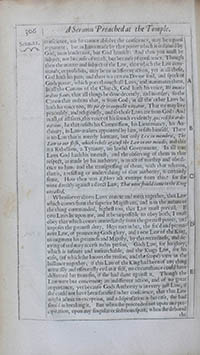 A Sermon Preached at the Temple.
306
Serm.22.
A Sermon Preached at the Temple.
306
Serm.22.
conscience, nor he cannot absolve the conscience, may be a good
argument; but in Laws made by that power which is ordained by
God, man bindes not, but God himself: And then you must be
subject, not because of wrath, but because of conscience. Though
then the matter and subject of the Law, that which the Law com-
mands, or prohibits, may be an indifferent action, yet in all these,
God hath his part; and there is a certain Divine soul, and spark of
Gods power, which goes through all Laws, and inanimates them.
In all the Canons of the Church, God hath his voice, Ut omnia
ordine fiant; that all things be done decently, and in order; so the
Canon that ordains that, is from God; in all the other Laws he
hath his voice too, Ut pi & tranquill vivatur, That we may live
peaceably, and religiously, and so those Laws are from God: And
in all, of all sorts, this voice of his sounds evidently, qui resistit ordi-
nationi, he that resists his Commission, his Lieutenancy, his Au-
thority, in Law-makers appointed by him, resists himself. There
is no Law that is meerly humane, but only Lex in membris, The
Law in our flesh, which rebels against the Law in our minde; and this
is a Rebellion, a Tyranny, no lawful Government. In all true
Laws God hath his interest; and the observing of them in that
respect, as made by his authority, is an act of worship and obedi-
ence to him; and the transgressing of them, with that relation,
that is, a resisting or undervaluing of that authority, is certainly
sinne. How then was Esthers act exempt from this? for she
went directly against a direct Law, That none should come to the King
uncalled. Whensoever divers Laws concur and meet together, that Law
which comes from the superior Magistrate, and is in the nature of
the thing commanded, highest too, that Law must prevail. If
two Laws lie upon me, and it be impossible to obey both, I must
obey that which comes immediately from the greatest power, and
imposes the greatest duty. Here met in her, the fix'd and perma-
nent Law, of promoting Gods glory, and a new Law of the King,
to augment his greatness and Majesty, by this retiredness, and de-
nying of ordinary access to his person. Gods Law, for his glory,
which is infinite and unsearchable, and the Kings Law, for his
ease, (of which she knows the reason, and the scope) were in the
ballance together; if this Law of the King had been of any thing
naturally and essentially evil in it self, no circumstance could have
delivered her from sin, if she had done against it. Though the
Law were but concerning an indifferent action, and of no great
importance, yet because Gods Authority is in every just Law, if
she could not have been satisfied in her conscience, that that Law
might admit an exception, and a dispensation in her case, she had
sinn'd in breaking it. But when she proceeded not upon any pre-
cipitation, upon any singular or seditious spirit, when she debated
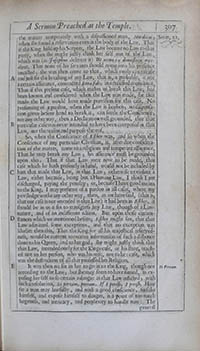 A Sermon Preached at the Temple.
307
Serm.22.
A Sermon Preached at the Temple.
307
Serm.22.
the matter temperately with a dispassioned man, Mordecai;
when she found a reservation even in the body of the Law, That
if the King held up his Scepter, the Law became no Law to that
party, when she might justly think her self out of the Law,
which was (as Josephus delivers it) Ut nemo ex domesticis acce-
deret, That none of his servants should come into his presence
uncalled; she was then come to that, which onely can excuse
and justifie the breaking of any Law, that is, a probable, if not
a certain assurance, contracted Bona fide, in a rectified conscience,
That if this present case, which makes us break this Law, had
been known and considered when the Law was made, he that
made the Law would have made provision for this case. No
presuming of a pardon, when the Law is broken; no dispensa-
tion given before hand to break it, can settle the Conscience;
nor any other way, then a Declaration well grounded, that that
particular case was never intended to have been composed in that
Law, nor the reason and purpose thereof. So, when the Conscience of Esther was, and so when the
Conscience of any particular Christian, is, after due considera-
tion of the matter, come to a religious and temperate assurance,
That he may break any Law; his assurance must be grounded
upon this, That if that Law were now to be made, that
case which he hath presently in hand, would not be included by
him that made that Law, in that Law; otherwise to violate a
Law, either because, being but a Humane Law, I think I am
discharged, paying the penalty; or, because I have good means
to the King, I may presume of a pardon in all cases, where my
priviledge works any other way, then, as we have said, (that is,
that our case is not intended in that Law) it had been in Esther, it
should be in us a sin to transgress any Law, though of a Law-
nature, and of an indifferent action. But upon those circum-
stances which we mentioned before, Esther might see, that that
Law admitted some exceptions, and that no exception was
likelier then this, That the King for all his majestical reserved-
ness, would be content to receive information of such a dishonor
done to his Queen, and to her god; she might justly think that
that Law, intended onely for the Kings ease, or his state, reach-
ed not to her person, who was his wife, nor to her case, which
was the destruction of all that professed her Religion. It was then no sin in her to go in to the King,Si Peream. though not
according to the Law; but she may seem to have sinned, in ex-
posing her self to so certain a danger as that Law inflicted; with
such a resolution, Si peream, peream, If I perish, I perish. How
far a man may lawfully, and with a good conscience, forsake
himself, and expose himself to danger, is a point of too much
largeness, and intricacy, and perplexity to handle now: The
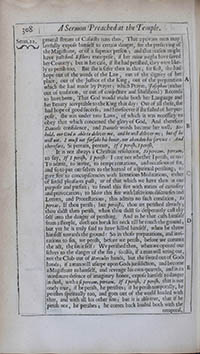 A Sermon Preached at the Temple.
308
Serm.22.
A Sermon Preached at the Temple.
308
Serm.22.
general stream of Casuists runs thus, That a private man may
lawfully expose himself to certain danger, for the preserving of
the Magistrate, or of a superior person; and that reason might
have justified Esthers enterprise, if her ruine might have saved
her Country; but in her case, if she had perished, they were like-
ly to perish too. But she is safer then in that; for first, she had
hope out of the words of the Law, out of the dignity of her
place, out of the Justice of the King, out of the preparation
which she had made by Prayer; which Prayer, Josephus (either
out of tradition, or out of conjecture and likelihood) Records
to have been, That God would make both her Language and her
Beauty acceptable to the King that day: Out of all these, she
had hope of good success; and howsoever if she failed of her pur-
pose, she was under two Laws, of which it was necessary to
obey that which concerned the glory of God. And therefore
Daniels confidence, and Daniels words became her well, Be-
hold, our God is able to deliver me, and he will deliver me; but if he
will not, I must not forsake his honor, nor abandon his service: And
therefore, Si peream, peream, If I perish, I perish. It is not always a Christian resolution, Si peream, peream,
to say, If I perish, I perish: I care not whether I perish, or no:
To admit, to invite, to tempt tentations, and occasions of sin,
and so to put our selves to the hazard of a spiritual perishing; to
give fire to concupiscencies with licentious Meditations, either
of sinful pleasures past, or of that which we have then in our
purpose and pursuit; to fewel this fire with meats of curiosity
and provocation; to blow this fire with lascivious discourses and
Letters, and Protestations, this admits no such condition, Si
pereas, If thou perish; but periisti, thou art perished already;
thou didst then perish, when thou didst so desperately cast thy
self into the danger of perishing. And as he that casts himself
from a steeple, doth not break his neck till he touch the ground;
but yet he is truly said to have killed himself, when he threw
himself towards the ground: So in those preparations, and invi-
tations to sin, we perish, before we perish, before we commit
the act, the sin it self: We perished then, when we opened our
selves to the danger of the sin; so also, if a man will wring out,
not the Club out of Hercules hands, but the sword out of Gods
hands; if a man will usurpe upon Gods jurisdiction, and become
a Magistrate to himself, and revenge his own quarrels, and in an
inordinate defence of imaginary honor, expose himself to danger
in duel, with a si peream, peream, If I perish, I perish, that is not
onely true, if he perish, he perishes; if he perish temporally, he
perishes spiritually too, and goes out of the world loaded with
that, and with all his other sins; but it is also true, that if he
perish not, he perishes; he comes back loaded both with the
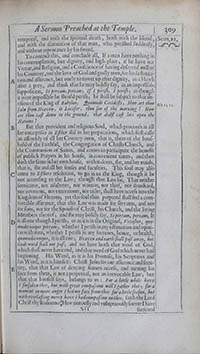 A Sermon Preached at the Temple.
309
Serm.22.
A Sermon Preached at the Temple.
309
Serm.22.
temporal, and with the spiritual death, both with the blood,
and with the damnation of that man, who perished suddenly,
and without repentance by his sword. To contract this, and conclude all, If a man have nothing in
his contemplation, but dignity, and high place; if he have not
Vertue, and Religion, and a Conscience of having deserved well of
his Countrey, and the love of God and godly men, for his sustenta-
tion and assurance, but onely to tower up after dignity, as a Hawk
after a prey, and think that he may boldly say, as an impossible
supposition, Si peream, peream, If I perish, I perish; as though
it were impossible he should perish; he shall be subject to that de-
rision of the King of Babylon, Quomodo Cecidisti,Esa. 14.12. How art thou
faln from Heaven, O Lucifer, thou son of the morning! How
art thou cast down to the ground, that didst cast lots upon the
Nations! But that provident and religious Soul, which proceeds in all
her enterprises as Esther did in her preparations, which first calls
an assembly of all her Country-men, that is, them of the hous-
hold of the Faithful, the Congregation of Christs Church, and
the Communion of Saints, and comes to participate the benefit
of publick Prayers in his house, in convenient times; and then
doth the same in her own house, within doors, she, and her maids,
that is, she and all her senses and faculties, This soul may also
come to Esthers resolution, to go in to the King, though it be
not according to the Law; though that Law be, That neither
fornicator, nor adulterer, nor wanton, nor thief, nor drunkard,
nor covetous, nor extortioner, nor railer, shall have access into the
Kingdom of Heaven; yet this soul thus prepared shall feel a com-
fortable assurance, that this Law was made for servants, and not
for sons, nor for the Spouse of Christ, his Church, and the living
Members thereof; and she may boldly say, Si peream, peream; It
is all one though I perish; or as it is in the Original, Vecasher, quo-
modocunque peream; whether I perish in my estimation and opini-
on with men, whether I perish in my fortunes, honor, or health,
quomodocunque, it is all one; Heaven and earth shall pass away, but
Gods word shall not pass; and we have both that word of God,
which shall never have end, and that word of God which never had
beginning. His Word, as it is his Promise, his Scriptures and
his Word, as it is himself: Christ Jesus for our assurance and secu-
rity, that that Law of denying sinners access, and turning his
face from them, is not a perpetual, not an irrevocable Law; but
that that himself says, belongs to us: For a little while have
I forsaken thee, but with great compassion will I gather thee; for a
moment in mine anger I hid my face from thee for a little season, but
with everlasting mercy have I had compassion on thee, saith the Lord
Christ thy Redeemer, How riotously and voluptuously soever I have Sss
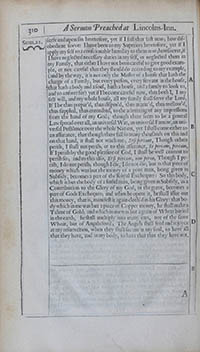 A Sermon Preached at Lincolns-Inn.A Sermon Preached at the Temple.
310
Serm.22.
A Sermon Preached at Lincolns-Inn.A Sermon Preached at the Temple.
310
Serm.22.
surfeited upon sin heretofore, yet if I fast that fast now; how dis-
obedient soever I have been to my Superiors heretofore, yet if I
apply my self to a conscionable humility to them now; howsoever, if
I have neglected necessary duties in my self, or neglected them in
my Family, that either I have not been careful to give good exam-
ple, or not careful that they should do according to my example,
(and by the way, it is not only the Master of a house that hath the
charge of a Family, but every person, every servant in the house,
that hath a body and a soul, hath a house, and a family to look to,
and to answer for) yet if I become careful now, that both I, I my
self will, and my whole house, all my family shall serve the Lord;
If I be thus prepar'd, thus dispos'd, thus matur'd, thus mellow'd,
thus suppled, thus entendred, to the admitting of any impressions
from the hand of my God; though there seem to be a general
Law spread over all, an universal War, an universal Famine, an uni-
versal Pestilence over the whole Nation, yet I shall come either to
an assurance, that though there fall so many thousands on this and
on that hand, it shall not reach me; Et si pereant, Though others
perish, I shall not perish; or to this assurance, Si peream, peream,
If I perish by the good pleasure of God, I shall be well content to
perish so; and to this also, Et si peream, non pereo, Though I pe-
rish, I do not perish; though I die, I do not die; but as that piece of
money which was but the money of a poor man, being given in
Subsidy, becomes a part of the Royal Exchequer: So this body,
which is but the body of a sinful man, being given in Subsidy, as a
Contribution to the Glory of my God, in the grave, becomes a
part of Gods Exchequer; and when he opens it, he shall issue out
this money, that is, manifest it again cloth'd in his Glory: that bo-
dy which in me was but a piece of Copper money, he shall make a
Talent of Gold; and which in me was but a grain of Wheat buried
in the earth, he shall multiply into many ears, not of the same
Wheat, but of Angels food; The Angels shall feed and rejoyce
at my resurrection, when they shall see me in my soul, to have all
that they have, and in my body, to have that that they have not.
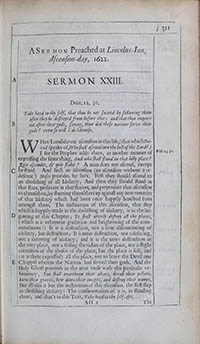 311
A Sermon Preached at Lincolns-Inn,
311
A Sermon Preached at Lincolns-Inn,
Ascension-day, 1622.
SERMON XXIII. Deut. 12. 30.
Take heed to thy self, that thou be not snared by following them
after they be destroyed from before thee; and that thou inquire
not after their gods, saying, How did those nations serve their
gods? even so will I do likewise. WHenWhen I consider our ascension in this life, (that which Da-
vid speaks of, Who shall ascend into the hill of the Lord?)
I see the Prophet adds there,Psal. 24.30. as another manner of
expressing the same thing, And who shall stand in that holy place?
Quis ascendet, & quis stabit? A man does not ascend, except
he stand. And such an ascension (an ascension without a re-
descent) Moses provides for here. First they should ascend to
an abolishing of all Idolatry; And then they should stand in
that state, persevere in that station, and perpetuate that ascension
to themselves, by shutting themselves up against any new reentries
of that Idolatry which had been once happily banished from
amongst them. The inchoation of this ascension, that step
which is happily made in the abolishing of idolatry, is in the be-
ginning of this Chapter; Ye shall utterly destroy all the places,
(which is a vehement gradation and heightening of the com-
mandment:) It is a destruction, not a faint discontinuing of
idolatry, but destruction; It is utter destruction, not a defacing,
not a deferring of idolatry; and it is the utter destruction of
the very place, not a seising the riches of the place, nor a slight
correction of the abuses of the place, but the place it self, and
(as is there expressed) all the place, not to leave the Devil one
Chappel wherein the Nations had served their gods. And the
Holy Ghost proceeds in the next verse with this particular ve-
hemency, You shall overthrow their altars, break their pillars,
burn their groves, hew down their images, and destroy their names.
But all this is but the inchoation of this ascension, the first step
in abolishing idolatry: The consummation of it is, in standing
there; and that's in this Text, Take heed to thy self, &c.
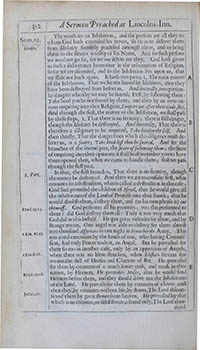 A Sermon Preached at Lincolns-Inn.
312
Serm.23.
The words are an Inhibition, and the persons are all they to
A Sermon Preached at Lincolns-Inn.
312
Serm.23.
The words are an Inhibition, and the persons are all they to
whom God hath extended his favors, so far as to deliver them Divisio.
from Idolatry formerly practised amongst them, and to bring
them to the sincere worship of his Name. And for such persons
we need not go far, for we our selves are they. God hath given
us such a deliverance heretofore in the reformation of Religion;
so far we are ascended, and so the Inhibition lies upon us, that
we slide not back again. It hath two parts; 1. The main matter
of the Inhibition, That we be not snared by Idolaters, after they
have been destroyed from before us. And secondly, two particu-
lar dangers whereby we may be snared; First, by following them:
Take heed you be not snared by them; and then by an over-cu-
rious enquiring into their Religion, Enquire not after their Gods, &c.
And through the first, the matter of the Inhibition, we shall pass
by these steps, 1. That there is no security; there is still danger,
though the Idolater be destroyed. And secondly, That there is
therefore a diligence to be required, Take heed to thy self. And
then thirdly, That the danger from which this diligence must de-
liver us, is a snare; Take heed lest thou be snared. And for the
branches of the second part, the snare of following them; the snare
of enquiring into their opinions; it shall least incumber you to have
them opened then, when we come to handle them; first we pass
through the first part. 1. Part.In that, the first branch is, That there is no security, though
the enemy be destroyed. And there we are to consider first, what
amounts to a destruction, what is called a destruction in this case;
God had promised the children of Israel, that he would give all
the inhabitants of the Land of Promise into their hands; that he
would abolish them, destroy them, and (as his own phrase is) cut
them off.Exod. 23.23. God performs all his promises; was this performed to
them? did God destroy them all? Truly it was very much that
God did in this behalf. He got great victories for them, and by
strange means. One angel was able to destroy for them almost
200 thousand Assyrians in one night in Senacheribs Army.2 Kin. 19.35. This
was a real execution by the hands of one, who having Commis-
sion, had truly Power to do it, an Angel. But he prevailed for
them so too in another case, only by an apparition of Angels,
when there was no blow strucken,2 Kin. 6.16. when Elisha's servant saw
mountains full of Horses and Chariots of fire. He prevailed
for them by creatures of a much lower rank, and weak in their
nature,Exod. 23.28. by Hornets. He promises Moses, that he would send
Hornets before them, and they should drive out the Inhabitants
of the Land. He prevails for them by creatures of a lower rank
then they,Jos. 10.10. by creatures without life, by stones. The Lord discom-
feited them by great stones from heaven. He prevailed by that
which is no creature, no subsistence, a sound only, The Lord thun-
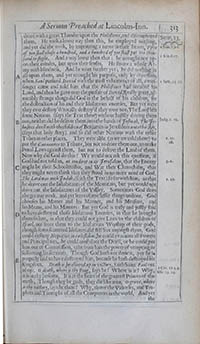 A Sermon Preached at Lincolns-Inn.
313
Serm.23.
dered with a great Thunder upon the Philistines, and discomfeited
A Sermon Preached at Lincolns-Inn.
313
Serm.23.
dered with a great Thunder upon the Philistines, and discomfeited
them. He took a lower way then this, he employed nothing,
and yet did the work, by imprinting a terror in their hearts,1 Sam. 7.10. Five
of you shall chase a hundred, and a hundred of you shall put ten thou-
sand to flight. And a way lower then that;2 Kin. 6.17. he wrought not up-
on their mindes, but upon their senses. He smote a whole Ar-
my with blindness. And he went further yet; he did nothing at
all upon them, and yet wrought his purpose, only by diversion;
when Saul pursued David with the most vehemence of all,1 Sam. 23.27. a mes-
senger came and told him that the Philistines had invaded his
Land, and then he gave over the pursuit of David. Really great, ad-
mirably strange things did God in the behalf of his children, for
the destruction of his and their Idolatrous enemies. But yet were
they ever destroy'd? totally destroy'd they were not; The Lord left
some Nations (says the Text there) without hastily driving them
out; neither did he deliver them into the hands of Joshuah.Judg. 2.23. The Je-
busites dwell with the children of Benjamin in Jerusalem unto this day,
(says that holy story) and so did other Nations with the other
Tribes in other places.1.21 They were able (as we are told there) to
put the Canaanites to Tribute, but not to drive them out; to make 28.
Penal Laws against them, but not to deliver the Land of them.
Now why did God do this? We would not ask this question, if
God had not told us, ut erudiret in iis Jerusalem,3.2. that the Enemy
might be their Schoolmaster, and War their Chatechism, that
they might never think that they stood in no more need of God.
The Lord was with Judah, (saith the Text) so far with him,1.19. as that
he drave out the Inhabitants of the Mountain, but yet would not
drive out the Inhabitants of the Valley. Sometimes God does
the greater work, and yet leaves some lesser things undone. God
chooses his Matter and his Manner, and his Measure, and
his Means, and his Minutes: But yet God is truly and justly said
to have destroyed those Idolatrous Enemies, in that he brought
them so low, as that they could not give Laws to the children of
Israel, nor force them to the Idolatrous Worship of their gods,
though some scattered Idolaters did still live amongst them. God
could destroy Nequitias in cælestibus, he could evacuate all Powers
and Principalities, he could annihilate the Devil, or he could put
him out of Commission, take from him the power of tempting or
solliciting his servants. Though God hath not done it, yet he is
properly said to have destroyed him, because he hath destroyed his
Kingdom. Death is swallowed up in victory, saith Saint Paul out
of Ose. O death, where is thy sting, says he! Where is it! Why,
1 Cor. 15.54. it is in thy bosome. It is at the heart of the greatest Princes of the
Ose. 13.14.earth; Though they be gods, they die like men. O grave, where
is thy victory, says he there! Why, above the Victories, and Tro-
phies and Triumphs of all the Conquerors in the world. And yet
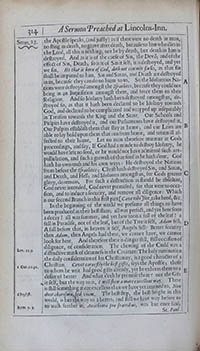 A Sermon Preached at Lincolns-Inn.
314
Serm.23.
A Sermon Preached at Lincolns-Inn.
314
Serm.23.
the Apostle speaks, (and justly) as if there were no death in man,
no sting in death, no grave after death, because to him who dies in
the Lord, all this is nothing; not he by death, but death in him is
destroyed. And as it is of the cause of Sin, the Devil; and of the
effect of Sin, Death; so is it of Sin it self; it is destroyed, and yet
we sin. He that is born of God, doth not commit sin so, as that sin
shall be imputed to him. Sin and Satan, and Death are destroyed
in us, because they can do no harm to us. So the Idolatrous Na-
tions were destroyed amongst the Israelites, because they could not
bring in an Inquisition amongst them, and force them to their
Religion. And so Idolatry hath been destroyed amongst us, de-
stroyed so, as that it hath been declared to be Idolatry towards
God, and declared to be complicated and wrapped up inseparably
in Treason towards the King and the State. Our Schools and
Pulpits have destroyed it, and our Parliaments have destroyed it.
Our Pulpits establish them that stay at home; and our Laws are
able to lay hold upon them that run from home, and return ill af-
fected to their home. Let no man therefore murmur at Gods
proceedings, and say, If God had a minde to destroy Idolatry, he
would have left no seed, or he would not have admitted such are-
pullulation, and such a growth of that seed as he hath done. God
hath his own ends and his own ways: He destroyed the Nations
from before the Israelites; Christ hath destroyed Sin, and Satan,
and Death, and Hell; and Idolaters amongst us, for Gods greater
glory, do remain. For such a destruction as should be absolute,
God never intended, God never promised; for that were to occa-
sion, and to induce a security, and remove all diligence: Which
is our second Branch in this first part [Cave tibi] see, take heed, &c. In the beginning of the world we presume all things to have
been produced in their best state; all was perfect, and yet how soon
a decay! all was summer, and yet how soon a fall of the leaf! a
fall in Paradise, not of the leaf, but of the Tree it self, Adam fell;
A fall before that, in heaven it self, Angels fell: Better security
then Adam, then Angels had there, we cannot have, we cannot
look for here. And therefore there is danger still, still occasion of
diligence,Lev. 11.3. of consideration. The chewing of the Cudd was a
distinctive mark of cleanness in the Creature: The holy rumination
the daily consideration of his Christianity, is a good character of a
Christian.1 Cor. 12.31. Covet earnestly the best gifts, says the Apostle; those
to whom he writ had good gifts already, yet he exhorts them to a
desire of better And what doth he promise them? not the Gift
it self, but the way to it, I will shew a more excellent way. There
is still something more excellent then we have yet attained to. Non
dicit charisma,Chrysost. sed viam. The best step, the best height in this
world, is but the way to a better; and still we have way before us
to walk further in. Anathema pro fratribus,Rom. 9.3. was but once said;
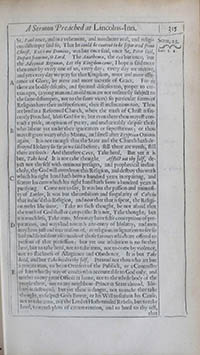 A Sermon Preached at Lincolns-Inn.
315
Serm.23.
A Sermon Preached at Lincolns-Inn.
315
Serm.23.
St. Paul once, and in a vehement, and inordinate zeal, and religi-
ous distemper said so, That he could be content to be separated from
Christ. Exi me Domine, was but once said, once St. Peter said,
Luc. 5.8. Depart from me, O Lord. The Anathema, the exi but once; but
the Adveniat Regnum, Let thy Kingdom come, I hope is said more
then once by every one of us, every day; every day we receive,
and yet every day we pray for that Kingdom, more and more assu-
rance of Glory, by more and more increase of Grace. For as
there are bodily diseases, and spiritual diseases too, proper to cer-
tain ages, (a yong man and an old man are not ordinarily subject to
the same distempers, nor to the same vices) so particular forms of
Religion have their indispositions, their ill inclinations too. Thou
art bred in a Reformed Church, where the truth of Christ is sin-
cerely Preached, bless God for it; but even there thou mayest con-
tract a pride, an opinion of purity, and uncharitably despise those
who labour yet under their ignorances or superstitions; or thou
mayest grow weary of thy Manna, and smell after Egyptian Onions
again. It is not enough that the State and the Church hath de-
stroyed Idolatry so far as we said before; still there are weeds, still
there are seeds: And therefore Cave, Take heed. But yet it is
but, Take heed. It is not take thought. Afflict not thy self, de-
ject not thy self with ominous presages, and prophetical melan-
choly, thy God will overthrow this Religion, and destroy this work
which his right hand hath been a hundred years in repairing, and
scatter his corn which his right hand hath been a hundred years in
purifying. Come not to say, It was but the passion and animosi-
ty of Luther, It was but the ambition and singularity of Calvin
that induc'd this Religion, and now that that is spent, the Religi-
on melts like snow. Take no such thought, be not afraid that
the truth of God shall or can perish: It is not, Take thought; but
it is much less, Take arms. Men may have false conceptions of pre-
parations, and ways laid towards a re-entry of Idolatry; and men
may have just and true reasons of, or religious indignation to see so
bad and so insolent uses made of those favours which are offered to
persons of that profession; but yet our inhibition is no further
here, but to take heed, not to take arms, not to come by violence,
not to slackness of Allegiance and Obedience. It is but Take
heed, and but Take heed to thy self. Pretend not thou who art but
a private man, to be an Overseer of the Publick, or a Controller
of him who (by way of coaction) is accountable to God only, and
neither to any great Officer at home, nor to the whole body of the
people there, nor to any neighbour-Prince or State abroad. Ido-
latry is destroyed; but yet there is danger, not to make thee take
thought, to suspect Gods Power, or his Will to sustain his Cause;
not to take arms, as if the Lord of Hosts needed Rebels; but to take
heed, to watch plots of circumvention, and to heed to thy self,
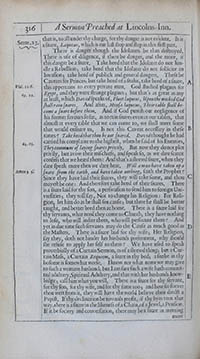 A Sermon Preached at Lincolns-Inn.
316
Serm.23.
A Sermon Preached at Lincolns-Inn.
316
Serm.23.
that is, to all under thy charge, for thy danger is not evident. It is
a snare, Laqueus, which is our last stop and step in this first part. There is danger though the Idolaters be thus destroyed.
There is use of diligence, if there be danger, and the more, if
this danger be a snare. Take heed that the Idolater do not kin-
dle a Rebellion; take heed that the Idolater do not sollicite an
Invasion; take heed of publick and general dangers. These be
Caveats for Princes; but take heed of a snake, take heed of a snare,
this appertains to every private man.Psal. 11.6. God studied plagues for
Egypt,69.21. and they were strange plagues; but that's as great as any
at least, which David speaks of, Pluet laqueos, Upon the wicked God
shall rain snares. And after, Mensa laqueus, Their table shall be-
come a snare before them. And if God punish our negligence of
his former favours so far, as to rain snares even at our tables, that
almost at every table that we can come to, we shall meet some
that would ensnare us, Is not this Caveat necessary in these
times? Take heed that thou be not snared. David thought he had
carried his complaint to the highest,64.65. when he said of his Enemies,
They commune of laying snares privily. But now they do not plot
privily, but avow their mischiefs, and speak so, as we dare scarce
confess that we heard them: And that's a shrewd snare, when they
dare speak more then we dare hear. Will a man have taken up a
snare from the earth,Amos 3.5. and have taken nothing, saith the Prophet?
Since they have laid their snares, they will take some, and thou
mayest be one: And therefore take heed of their snares. There
is a snare laid for thy son, a perswasion to send him to foreign Uni-
versities; they will say, Not to change his Religion: For Reli-
gion, let him do as he shall see cause; but there he shall be better
taught, and better bred then at home. There is a share laid for
thy servants, what need they come to Church, they have nothing
to lose, who will indite them, who will persecute them? And
yet in due time such servants may do the Cause as much good as
the Masters. There is a snare laid for thy wife; Her Religion,
say they, doth not hinder her husbands preferment, why should
she refuse to apply her self to them? We have used to speak
proverbially of a Curtain Sermon, as of a shrewd thing; but a Cur-
tain Mass, a Curtain Requiem, a snare in thy bed; a snake in thy
bosome is somewhat worse. I know not what name we may give
to such a womans husband; but I am sure such a wife hath commit-
ted adultery, Spiritual Adultery, and that with her husbands know-
ledge; call him what you will. There is a snare for thy servant,
for thy son, for thy wife, and for thy fame too; and how far soever
thou wert from it, they will have the world believe thou diedst a
Papist. If thy declination be towards profit, if thy byas turn that
way, there is a snare in the likeness of a Chain, of a Jewel, a Pension.
If it be society and conversation, there may be a snare in meeting
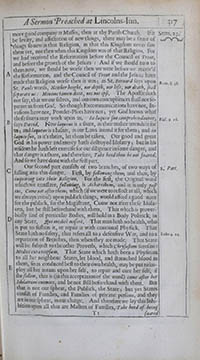 A Sermon Preached at Lincolns-Inn.
317
Serm.23.
A Sermon Preached at Lincolns-Inn.
317
Serm.23.
more good company at Masses, then at thy Parish Church. If it
be levity, and affectation of new things, there may be a snare of
things so new in that Religion, as that this Kingdom never saw
them yet, not then when this Kingdom was of that Religion. For
we had received the Reformation before the Council of Trent,
and before the growth of the Jesuits: And if we should turn to
them now, we should be worse then we were before we receiv'd
the Reformation; and the Council of Trent and the Jesuits have
made that Religion worse then it was;Rom. 8.38. as St. Bernard says upon
St. Pauls words, Neither height, nor depth, nor life, nor death, shall
separate us: Minime tamen dicit, nec nos ipsi. The Apostle doth
not say, that we our selves, and our own concupisences shall not se-
parate us from God. So though Excommunications have not, In-
vasions have not, Powder-Plots have not; yet God knows what
those snares may work upon us. In laqueo suo comprehendantur,
Psal. 9.16. says David. Now laqueus is a snare, as their malice intends it for
us; and laqueus is a halter, as our Laws intend it for them; and in
laqueo suo, as it's theirs, let them be taken. Our good and great
God in his power and mercy hath destroyed Idolatry; but in his
wisdom he hath left exercise for our diligence in some danger, and
that danger is a snare, and therefore, Take heed thou be not snared.
And so we have done with the first part. Our second part consists of two branches,2. Part. of two ways of
falling into this danger. First, by following them; and then, by
inquiring into their Religion. For the first, the Original word
which we translate, following, is Achareihem, and it is only post
eos, Come not after them; which (if we were to reflect at all, which
we always avoid) upon publick things, would afford a good note
for the publick, for the Magistrate, Come not after these Idola-
ters, but be still beforehand with them. That which is prover-
bially said of particular Bodies, will hold in a Body Politick, in
any State. Qui medic miser. That man hath no health, who
is put to sustain it, or repair it with continual Physick. That
State hath no safety, that refers all to a defensive War,Luke 4.24. and to a
reparation of Breaches, then when they are made. That State
will be subject to the other Proverb, which Chrysostom foresaw:
Medice cura teipsum. That State which hath been a Physitian
to all her neighbour States, let blood, and staunched blood in
them, so as conduced best to their own health, may be put to im-
ploy all her means upon her self, to repair and cure her self, if
she follow, that is (in this acceptation of the word) come after her
Idolatrous enemies, and be not still beforehand with them. But
that is not our sphear, the Publick, the State; but yet States
consist of Families, and Families of private persons, and they
are in our sphear, in our charge. And therefore we lay this Inhi-
bition upon all that are Masters of Families, Take heed of being Tt
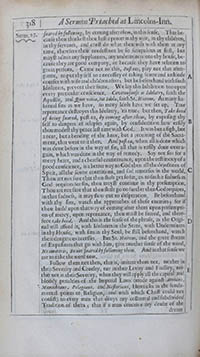 A Sermon Preached at Lincolns-Inn.
318
Serm.23.
A Sermon Preached at Lincolns-Inn.
318
Serm.23.
snared by following, by coming after them, in this sense. That be-
cause thou thinkest thou hast a power in thy wife, in thy children,
in thy servants, and canst do what thou wilt with them at any
time, therefore thou needest not be so scrupulous at first, but
mayst admit any supplanters, any underminers into thy house, be-
cause they are good company, or because they have relation to
great persons. Come not to this, Post eos, play not that after-
game, to put thy self to a necessity of taking sowre and unkinde
courses with wife and children after; but be beforehand with such
Idolaters, prevent their snare. We lay this Inhibition too upon
every particular conscience. Covetousness is Idolatry, saith the
Apostle, and Quot vitia, tot Idola, saith St. Hierom. As many ha-
bitual sins as we have, so many Idols have we set up. True
repentance destroyes this Idolatry, 'tis true; but then, Take heed
of being snared, post ea, by coming after them, by exposing thy
self to dangers of relapses again, by consideration how easily
thou madest thy peace last time with God. It was but a sigh, but
a tear, but a bending of the knee, but a receiving of the Sacra-
ment, that went to it then. And post ea, when all is done which
was done before in the way of sin, all that is easily done over a-
gain, which was done in the way of remedy. Say not so: for a
merry heart, and a chearful countenance, upon the testimony of a
good conscience, is a better way to God then all the dejections of
Spirit, all the sowre contritions, and sad remorses in the world.
Thou art not sure that thou shalt get so far, as to such a sadness as
God requires for sin, thou mayst continue in thy presumption.
Thou art not sure that thou shalt go no further then God requires,
in that sadness, it may flow out to desperation. Be beforehand
with thy sins, watch the approaches of those enemies; for if
thou build upon that way of coming after them upon presumpti-
on of mercy, upon repentance, thou maist be snared, and there-
fore take heed. And this is the sense of the phrase, as the Origi-
nal will afford it, with Idolaters in the State, with Underminers
in thy House, with sins in thy Soul, be still beforehand, watch
their dangerous accesses. But St. Hierom, and the great stream
of Expositors that go with him, give another sense of the word,
Ne imiteris, Be not snared by following them. And in that sense
we are to take the word now. Follow them not then, that is, imitate them not, neither in
their Severity and Cruelty, nor in their Levity and Facility, nei-
ther not in their Severity, when they will apply all the capital and
bloody penalties of the Imperial Laws (made against Arrians,
Manicheans, Pelagians, and Nestorians, Hereticks in the funda-
mental points of Religion, and with which Christ could not
consist) to every man that denys any collateral and subdivided
Tradition of theirs; that if a man conceive any doubt of the
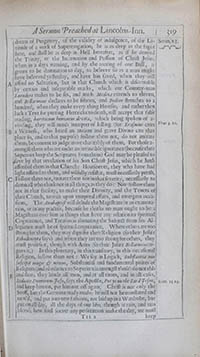 A Sermon Preached at Lincolns-Inn.
319
Serm.23.
A Sermon Preached at Lincolns-Inn.
319
Serm.23.
dream of Purgatory, of the validity of indulgence, of the La-
titude of a work of Supererogation, he is as deep in the fagot
here, and shall be as deep in Hell hereafter, as if he denyed
the Trinity, or the Incarnation and Passion of Christ Jesus;
when in a days warning, and by the roaring of one Bull, it
grows to be damnation to day, to beleeve so as a man might
have beleeved yesterday, and have bin saved, when they will
afford no Salvation, but in that Church which is discernable
by certain and inseparable marks, which our Country-man
Saunders makes to be six, and Mich. Medina extends to eleven,
and Bellarmine declares to be fifteen, and Bodius stretches to a
hundred, when they make every thing Heresie; and rather then
lack a Text for putting Hereticks to death, will accept that false
reading, haereticum hominem devita, which being spoken of a-
voiding,Titus 3.10. they will needs interpret of killing (for Erasmus cites
a Witness, who heard an antient and grave Divine cite that
place so, and to that purpose) follow them not, do not imitate
them; be content to judge more charitably of them. For those a-
mongst them who are under an invincible ignorance (because their
Superiors keep the Scriptures from them) God may be pleased to
save by that revelation of his Son Christ Jesus, which he hath
afforded them in that Church: Howsoever, they who have had
light offered to them, and wilfully resist it, must necessarily perish.
Follow them not, imitate them not in that severity, necessarily to
damn all who think not in all things as they do: Nor follow them
not in that facility, to make their Divinity, and the Tenets of
their Church, to wait upon temporal affairs, and emergent occa-
sions. The Anabaptist will delude the Magistrate in an examina-
tion, or in any practise, because he thinks no man ought to be a
Magistrate over him in things that have any relation to spiritual
Cognizance, and Treason in alienating the Subject from his Al-
legiance must be of spiritual cognizance, Where others are too
strong for them, they may dignifie their Religion (so their Jesuit
Ribadineyra says) and where they are too strong for others, they
must profess it, though with Arms (so their Jesuit Bellarmine ar-
gues it.) In this planetary, in this transitory, in this occasional
Religion, follow them not: We say in Logick, Substantia non
suscipit magis & minus, Substantial and fundamental points of
Religion (and obedience to Superiors is amongst those) do not ebb
and flow; they binde all men, and at all times, and in all cases.
Rom. 13.14.Induite Dominum Jesu, says the Apostle, Put ye on the Lord Jesus,
and keep him on, put him not off again. Christ is not only the
Stuff, but the Garment ready made; he will not be translated and
turn'd, and put into new fashions, nor laid up in a Wardrobe, but
put on all day, all the days of our life; though it rain, and rain
blood; how foul soever any persecution make the day, we must
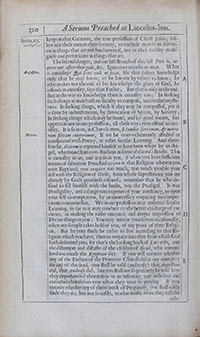 A Sermon Preached at Lincolns-Inn.
320
Serm.23.
A Sermon Preached at Lincolns-Inn.
320
Serm.23.
keep on that Garment, the true profession of Christ Jesus; fol-
low not these men in their severity, to exclude men from salvati-
on in things that are not fundamental, nor in their facility to dis-
guise and prevaricate in things that are. The second danger, and our last Branch of this last Part is, in-
quire not after their gods, &c. Ignorance excuses no man. What
is curiosity? Augustine. Qui scire vult ut sciat, He that desires knowledge
only that he may know, or be known by others to know; he
who makes not the end of his knowledge the glory of God, he
offends in curiosity, says that Father; But that is only in the end.
But in the way to knowledge there is curiosity too; In seeking
such things as man hath no faculty to compass, unrevealed myste-
ries c; In seeking things, which if they may be compassed, yet it
is done by indirect means, by Invocation of Spirits, by Sorcery;
In seeking things which may be found, and by good means, but
appertain not to our profession; all these ways men offend in curi-
osity. It is so in us, in Church-men, si Iambos servemus, & metro-
rum silvam congerimus,HieronHierom. If we be over-vehemently affected or
transported with Poetry, or other secular Learning. And there-
fore St. Hierom is reported himself to have been whipt by an An-
gel, who found him over-studious in some of Cicero's Books. This
is curiosity in us, and it is so in you, if when you have sufficient
means of salvation Preached to you in that Religion wherein you
were Baptized, you enquire too much, too much trouble your
self with the Religion of those, from whose superstitions you are
already by Gods goodness rescued; remember that he who de-
sired to fill himself with the husks, was the Prodigal. It was
Prodigality, and a dangerous expence of your constancy, to open
your self to temptation, by an unnecessary enquiring into imper-
tinent controversies. We in our profession may embrace secular
Learning, so far as it may conduce to the better discharge of our
duties, in making the easier entrance, and deeper impression of
Divine things in you: You may inform your selves occasionally,
when any scruple takes hold of you, of any point of their Religi-
on. But let your study be rather to live according to that Re-
ligion which you have, then to enquire into that from which God
hath delivered you; for that's the looking back of Lots wife, and
the distemper and distaste of the children of Israel, who remem-
bred too much the Egyptian diet. If you will enquire whether
any of the Fathers of the Primitive Church did at any time pray
for any of the dead, you shall be told (and truly) that Augustine
did, that Ambrose did; but you shall not so presently be told how
they deprehended themselves in an infirmity, and collected and
corrected themselves ever when they were so praying? If you
enquire whether any of them speak of Purgatory, you shall easily
finde they do; but not so easily, in what sense; when they call the
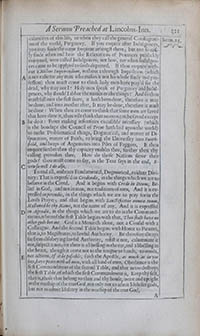 A Sermon Preached at Lincolns-Inn.
321
Serm.23.
A Sermon Preached at Lincolns-Inn.
321
Serm.23.
calamities of this life, or when they call the general Conflagrati-
on of the world, Purgatory. If you enquire after Indulgences,
you may finde the name frequent amongst them; but not so easi-
ly finde when and how the Relaxations of Penances publickly
enjoyned, were called Indulgences; nor how, nor when Indulgen-
ces came to be applyed to souls departed. If thou enquire with-
out a Melius Inquirendum, without a through Inquisition (which
is not easie for any man who makes it not his whole study and pro-
fession) thou maist come to think holy men have pray'd for the
dead, why may not I? Holy men speak of Purgatory and Indul-
gences, why should I abhor the names or the things? And so thou
maist fall into the first snare, it hath been done, therefore it may
be done; and into another after, It may be done, therefore it must
be done: When thou art come to think that some men are saved
that have done it, thou wilt think that no man can be saved except
he do it: From making infirmities excusable necessary (which
is the bondage the Council of Trent hath laid upon the world)
to make Problematical things, Dogmatical; and matter of Di-
sputation, matter of Faith; to bring the University into Smith-
field, and heaps of Arguments into Piles of Faggots. If thou
enquire further then thy capacity enables thee, further then thy
calling provokes thee; How do those Nations serve their
gods? thou maist come to say, as the Text says, in the end, E-
ven so will I do also. To end all, embrace Fundamental, Dogmatical, evident Divi-
nity: That is express'd in Credendis, in the things which we are to
believe in the Creed. And it begins with Credo in Deum, Be-
lief in God, and not in man, nor traditions of men. And it is ex-
pressed in petendis, in the things which we are to pray for in the
Lords Prayer; and that begins with Sanctificetur nomen tuum,
Hallowed be thy Name, not the name of any. And it is expressed
in Agendis, in the things which we are to do in the Command-
ments; whereof the first Table begins with that, Thou shalt have no
other gods but me. God is a Monarch alone, not a Consul with a
Colleague. And the second Table begins with Honor to Parents,
that is, to Magistrates, to lawful Authority. Be therefore always
far from disobeying lawful Authority, resist it not, calumniate it
not, suspect it not; for there is a libelling in the ear, and a libelling in
the heart, though it come not to the tongue or hands, to words,
nor actions. If it be possible, saith the Apostle, as much as in you
lies, have peace with all men, with all kind of men. Obedience is the
first Commandment of the second Table, and that never destroys
the first Table, of which the first Commandment is, Keep thy self,
that is, those that belong to thee and thy house, intire and upright
in the worship of the true God, not only not to admit Idols for gods,
but not to admit Idolatry in the worship of the true God.
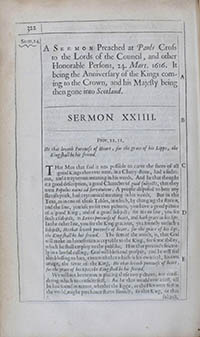 322
Serm.24.
A Sermon Preached at Pauls Cross
322
Serm.24.
A Sermon Preached at Pauls Cross
to the Lords of the Council, and other
Honorable Persons, 24. Mart. 1616. It
being the Anniversary of the Kings com-
ing to the Crown, and his Majesty being
then gone into Scotland.
SERMON XXIIII. Prov. 22.11.
He that loveth Pureness of Heart, for the grace of his Lipps, the
King shall be his friend. THatThat Man that said it was possible to carve the faces of all
good Kings that ever were, in a Cherry-stone, had a sediti-
ous, and a trayterous meaning in his words. And he that thought
it a good description, a good Character of good subjects, that they
were Populus natus ad servitutem, A people disposed to bear any
slavish yoak, had a tyrannical meaning in his words. But in this
Text, as in one of those Tables, in which, by changing the station,
and the line, you use to see two pictures, you have a good picture
of a good King, and of a good subject; for in one line, you see
such a subject, as Loves pureness of heart, and hath grace in his lips.
In the other line, you see the King gracious, yea friendly to such a
subject, He that loveth pureness of heart, for the grace of his lips,
the King shall be his friend. The sum of the words, is, that God
will make an honest man acceptable to the King, for some ability,
which he shall employ to the publike. Him that proceeds sincere-
ly in a lawful calling, God will bless and prosper, and he will seal
this blessing to him, even with that which is his own seal, his own
image, the favor of the King, He that loveth pureness of heart,
for the grace of his lips, the King shall be his friend. We will not be curious in placing these two pictures, nor consi-
dering which to consider first. As he that would vow a fast, till
he had found in nature, whether the Egge, or the Hen were first in
the world, might perchance starve himself; so that King, or that
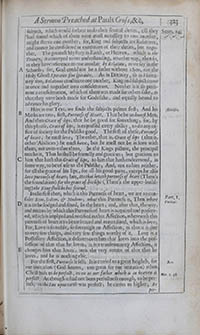 A Sermon Preached at Pauls Cross, &c,&c.
323
Serm.24.
A Sermon Preached at Pauls Cross, &c,&c.
323
Serm.24.
subject, which would forbear to do their several duties, till they
had found which of them were most necessary to one another,
might starve one another; for, King and subjects are Relatives,
and cannot be considered in execution of their duties, but toge-
ther. The greatest Mystery in Earth, or Heaven, which is the
Trinity, is conveyed to our understanding, no other way, then so,
as they have reference to one another by Relation, as we say in the
Schools; for, God could not be a father without a Son, nor the
Holy Ghost Spiratus sine spirante. As in Divinity, so in Huma-
nity too, Relations constitute one another, King and subject come
at once and together into consideration. Neither is it so perti-
nent a consideration, which of them was made for others sake, as
that they were both made for Gods sake, and equally bound to
advance his glory. Here in our Text, we finde the subjects picture first;Divisio. And his
Marks are two; first, Pureness of Heart, That he be an honest Man;
And then Grace of lips, that he be good for something; for, by
this phrase, Grace of lips, is expressed every ability, to do any of-
fice of society for the Publike good. The first of these, Pureness
of heart, he must love; The other, that is, Grace of lips (that is,
other Abilities) he must have, but he must not be in love with
them, nor over-value them. In the Kings picture, the principal
marke is, That he shall be friendly and gracious; but gracious to
him that hath this Grace of lips, to him that hath endeavored, in
some way, to be of use to the Publike; And, not to him neither,
for all the grace of his lips, for all his good parts, except he also
love pureness of heart; but, He that loveth pureness of heart (There's
the foundation) for the grace of his lips (There's the upper-build-
ing) the King shall be his friend. In the first then, which is this Pureness of heart, we are to con-
sider Rem, sedem, & Modum; what this Pureness is,Part. 1.
Puritas. Then where
it is to be lodged and fixed, In the heart; and, after that, the way,
and means by which this Pureness of heart is acquired and preserv-
ed, which is implyed and notified in that Affection, wherewith this
pureness of heart is to be embraced and entertained, which is love;
For, Love is so noble, so soveraign an Affection, as that it is due
to very few things, and very few things worthy of it. Love is a
Possessory Affection, it delivers over him that loves into the pos-
session of that that he loves; it is a transmutatory Affection, it
changes him that loves, into the very nature of that that he
loves, and he is nothing else. For the first, Pureness it self; It is carried to a great heighth,Res. for
our imitation (God knows, too great for our imitation) when
Christ bids us be perfect,Mat. 5. 48. even as our father which is in heaven is
perfect. As though it had not been perfectness enough, to be per-
fect, as the Son upon earth was perfect; he carries us higher, Be
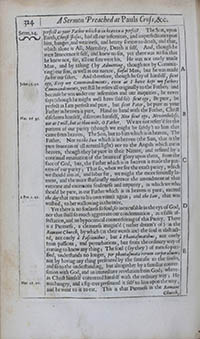 A Sermon Preached at Pauls Cross, &c.
324
Serm.24.
A Sermon Preached at Pauls Cross, &c.
324
Serm.24.
perfect as your Father which is in heaven is perfect. The Son, upon
Earth, Christ Jesus, had all our infirmities, and imperfections upon
him, hunger, and weariness, and hearty sorrow to death, and that,
which alone is All, Mortality, Death it self. And, though he
were Innocence it self, and knew no sin, yet there was no sin that
he knew not, for, all our sins were his. He was not onely made
Man, and by taking (by Admitting, though not by Commit-
ting) our sins, as well as our nature, sinful Man; but he was made
sin for our sakes. And therefore, though he say of himself, John 15.10.sicut
ego, Keep my Commandements, even as I have kept my fathers
Commandements, yet still he refers all originally to the Father; and
because he was under our infirmities and our iniquities, he never
says (though he might well have said so) sicut ego, Be pure, be
perfect as I am perfect and pure, but sicut Pater, be pure as your
Father in heaven is pure. Hand to hand with the Father, Christ
disclaims himself, disavows himself, Mat. 26. 39.Non sicut ego, Nevertheless,
not as I will, but as thou wilt, O Father. We are not referr'd for the
pattern of our purity (though we might be safely) to him that
came from heaven, The Son, but to him which is in heaven, The
Father. Nor to the Sun which is in heaven (the Sun, that is the
pure fountain of all natural light) nor to the Angels which are in
heaven, though they be pure in their Nature, and refined by a
continual emanation of the beams of glory upon them, from the
face of God, but, the Father which is in heaven is made the pat-
tern of our purity; That so, when we see the exact purity, which
we should aim at, and labor for, we might the more seriously la-
ment, and the more studiously endeavor the amendment of that
extreme and enormous fouleness and impurity, in which we who
should be pure, as our Father which is in heaven is pure, exceed
the dog that turns to his own vomit again;2 Pet. 2. 22. and the Sow, that was
washed, to her wallowing in the mire. Yet there is no foulness so foul, so inexcusable in the eys of God,
nor that shall so much aggravate our condemnation, as a false af-
fectation, and an hypocritical counterfeiting of this Purity. There
is a Pureness, a cleanness imagin'd (rather dream't of) in the
Romane Church, by which (as their words are) the soul is abstract-
ed, not onely á Passionibus, but â Phantasmatibus, not onely
from passions, and perturbations, but from the ordinary way of
coming to know any thing; The soul (say they) of men so puri-
fied, understands no longer, per phantasmata rerum corporalium;
not by having any thing presented by the fantasie to the senses,
and so to the understanding, but altogether by a familiar conver-
sation with God, and an immediate revelation from God; where-
as Christ himself contented himself with the ordinary way; He
was hungry,Mat. 21. 20. and a fig-tree presented it self to him upon the way,
and he went to it to eat. This is that Pureness in the Romane
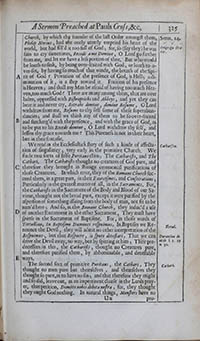 A Sermon Preached at Pauls Cross, &c,&c.
325
Serm.24.
A Sermon Preached at Pauls Cross, &c,&c.
325
Serm.24.
Church, by which the founder of the last Order amongst them,
Philip Nerius, had not onely utterly emptied his heart of the
world, but had fill'd it too full of God; for,Congrega. Ora-
tor. so (say they) he was
fain to cry sometimes, Recede ame Domine, O Lord go farther
from me, and let me have a less portion of thee. But who would
be loath to sink, by being over-fraited with God, or loath to o-
ver-set, by having so much of that winde, the breath of the Spi-
rit of God? Privation of the presence of God, is Hell; a di-
minution of it, is a step toward it. Fruition of his presence
is Heaven; and shall any Man be afraid of having too much Hea-
ven, too much God? There are many among them, that are over
laden, oppressed with Bishropricks and Abbeys, and yet they can
bear it and never cry, Retrahe domine, domine Resume, O Lord
withdraw from me, Resume to thy self some of these superabun-
dancies; and shall we think any of them to be so over-fraited
and surcharg'd with the presence, and with the grace of God, as
to be put to his Recede domine, O Lord withdraw thy self, and
lessen thy grace towards me? This Pureness is not in their heart,
but in their fantasie. Catharsitæ.We read in the Ecclesiastick story of such a kinde of affecta-
tion of singularity, very early in the primitive Church. We
finde two sorts of false Puritans then; The Catharists, and The
Cathari. The Catharists thought no creatures of God pure, and
therefore they brought in strange ceremonial purifications of
those Creatures. In which error, they of the Romane Church suc-
ceed them, in a great part, in their Exorcismes, and Consecrations;
Particularly in the greatest matter of all, in the Sacraments. For,
the Catharists in the Sacrament of the Body and Blood of our Sa-
viour, thought not the bread pure, except it were purified by the
aspersion of something issuing from the body of man, not fit to be
nam'd here; And so, in the Romane Church, they induc'd a use
of another Excrement in the other Sacrament, They must have
spittle in the Sacrament of Baptisme. For, in those words of
Tertullian,Tertul. In Baptismo Dæmones respuimus, In Baptism we Re-
nounce the Devil, they will admit no other interpretation of the
Respuimus, but that Respuere, is sputo detestari,Durantius de
citib l. 1. 19
n. 30. That we can
drive the Devil away, no way, but by spitting at him; Their pre-
decessors in this, the Catharists, thought no Creatures pure,
and therefore purified them, by abhominable, and detestable
ways. The second sort of primitive Puritans, the Cathari,Cathari. They
thought no men pure but themselves, and themselves they
thought so pure, as to have no sin; and that therefore they might
and so did, leave out, as an impertinent clause in the Lords pray-
er, that petition, Dimitte nobis debita nostra, for, they thought
they ought God nothing. In natural things, Monsters have no
Uu
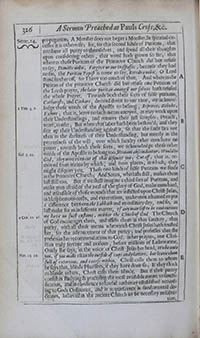 A Sermon Preached at Pauls Cross, &c.
326
Serm.24.
A Sermon Preached at Pauls Cross, &c.
326
Serm.24.
propagation; A Monster does not beget a Monster. In spiritual ex-
cesses it is otherwise; for, for this second kinde of Puritans, that
attribute all purity to themselves, and spend all their thoughts
upon considering others, that weed hath grown so far, that
whereas those Puritans of the Primitive Church did but refuse
to say, Dimitte nobis, Forgive us our trespasses, because they had
no sin, the Puritan Papist is come to say, Recede a nobis, O Lord
stand farther off, for I have too much of thee. And whereas the
Puritan of the primitive Church did but refuse one Petition of
the Lords prayer, the later puritan amongst our selves hath refused
the whole Prayer. Towards both these sorts of false puritans,
Catharists, and Cathari, derived down to our time, we acknow-
ledge those words of the Apostle to belong,2 Tim. 4. 2. Reprove, Rebuke,
Exhort; that is, leave no such means untryed, as may work upon
their Understandings, and remove their just scruples; Preach,
write, confer; But when that labor hath been bestow'd, and they
fear up their Understanding against it, so that the fault lies not
then in the darkness of their Understanding, but meerly in the
perversness of the will, over which faculty other men have no
power, towards both these sorts, we acknowledge those other
words of the Apostle to belong too,Gal. 5. 12. Utinam abscindantur, Would to
God, they were even cut off that disquiet you; Cut off, that is, re-
moved from means by which, and from places, in which, they
might disquiet you. These two kinds of false Puritans we finde
in the Primitive Church; And Satan, who lasts still, makes them
last still too. But if we shall imagine a third sort of Puritans, and
make men afraid of the zeal of the glory of God, make men hard,
and insensible of those wounds that are inflicted upon Christ Jesus,
in blasphemous oaths, and execrations, make men ashamed to put
a difference between the Sabbath and an ordinary day, and so, at
last make sin an indifferent matter, If any man list to be contentious
we have no such custome,1 Cor. 11. 16. neither the ChuchChurch of God. The Church
of God encourages them, and assists them in that sanctity, that
purity, with all those means wherewith Christ Jesus hath trusted
her, for the advancement of that purity; and professes that she
prefers in her recommendations to God, in her prayers, one Chri-
stian truly fervent and zealous, before millions of Lukewarme.
Onely she says, in the voice of Christ Jesus her head, Wo be unto
you,Mat. 23 25. if you make clean the outside of cups and platters, but leave them
full of extortion, and excess within. Christ calls them to whom
he says that, blinde Pharisees, if they have done so; If they think
to blinde others, Christ calls them blinde. But if their purity
consist in studying & practising the most available means to sancti-
fication, and in obedience to lawful authority established accord-
ing to Gods Ordinance, and in acquiescence in fundamental do-
ctrines, believed in the ancient Church to be necessary to salva-
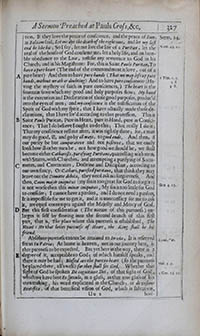 A Sermon Preached at Pauls Cross, &c,&c.
327
Serm.24.
tion, If they love the peace of conscience, and the peace of Sion,
A Sermon Preached at Pauls Cross, &c,&c.
327
Serm.24.
tion, If they love the peace of conscience, and the peace of Sion,
as Balaam said, Let me dye the death of the righteous, and let my last
end he like his; So I say, let me live the life of a Puritan,Num. 23. 10. let the
zeal of the house of God consume me, let a holy life, and an hum-
ble obedience to the Law, testifie my reverence to God in his
Church, and in his Magistrate: For, this is Saint Pauls Puritan, To
have a pure heart (The end of the commandment is love, out of a
pure heart) And then to have pure hands1 Tim. 1.5.
2 8.
3 8. (That we may lift up pure
hands, without wrath or doubting) And to have pure consciences (Ha-
ving the mystery of faith in pure consciences.) The heart is the
fountain from which my good and holy purposes flow; My hand
is the execution and Declaration of those good purposes, produc'd
into the eyes of men; and my conscience is the testification of the
Spirit of God with my spirit, that I have actually made those de-
clarations, that I have liv'd according to that profession. This is
Saint Pauls Puritan, Pure in Heart, pure in Hand, pure in Consci-
ence; That I do believe I ought to do this; That really I do it;
TharThat my conscience tell me after, it was rightly done; for, a man
may do good, ill, and go by ill ways, to good ends. And then, if
our purity be but comparative and not positive, that we onely
look how ill other men be, not how good we should be, we shall
become either Catharists, purifying Puritans, quarrelling with men,
with States, with Churches, and attempting a purifying of Sacra-
ments, and Ceremonies, Doctrine and Discipline, according to
our own fancy; Or Cathari, purified puritans, that think they may
leave out the Dimitte debita, they need ask no forgiveness. And
then, Cains major iniquitas (my sin is too great for God to forgive)
is not worse then this minor iniquitas,Gen. 4. 13. My sin is too little for God
to consider; I cannot have a pardon, and I do not need a pardon,
It is impossible for me to get it, and it is unnecessary for me to ask
it, are equal contempts against the Majesty and Mercy of God.
But this first consideration (The nature of this pureness) en-
larges it self by flowing into the second branch of this first
part, that is, The place where this pureness is established, The
Heart: He that loves pureness of Heart, the King shall be his
friend. Absolute pureness cannot be attained to In via,Locus. Cor. It is reserved
for us In Patria; At home in heaven, not in our journey here, is
that pureness to be expected. But yet here in the way, there is a
degree of it, acceptable to God; of which himself speaks, and
there it may be had; Blessed are the pure in heart (so the pureness
be placed there, all's well) for they shall see God.Mat. 5.9. Whether that
sight of God be spoken De cognitione Dei, of that sight of God,1 Cor. 13.12.
which we have here In speculo, in a glass, in that true glass of his
own making, his word explicated in the Church; or de visione
Beatifica, of that beatifical vision of God, which is salvation,
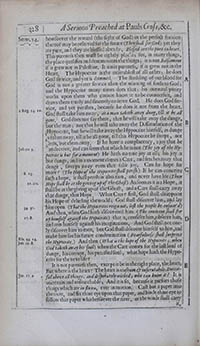 A Sermon Preached at Pauls Cross, &c.
328
Serm.24.
A Sermon Preached at Pauls Cross, &c.
328
Serm.24.
howsoever the reward (the sight of God) in the perfect fruition
thereof may be reserved for the future (They shall see God) yet they
are pure, and they are blessed already, Blessed are the pure in heart.
This pureness then must be rightly plac'd; for, in many things,
the place qualifies and denominates the things; it is not Balsamum
if it grew not in Palestine. It is not pureness, if it grew not in the
Heart. The Hypocrite is the miserablest of all other; he does
God service, and yet is damned. The shedding of our blood for
God is not a greater service then the winning of souls to God;
and the Hypocrite many times does that; his outward purity
works upon them who cannot know it to be counterfeit, and
draws them truely and sincerely to serve God. He does God ser-
vice, and yet perishes,1 Reg. 14.10. because he does it not from the heart.
God shall take him away, as a man taketh away dung, till it be all
gone. God does not say there, that he will take away the dunge,
but the man; not that he will take away the Dissimulation of the
Hypocrite, but he will take away the Hypocrite himself, as dunge
is taken away, till it be all gone, till this Hypocrite be swept, not
clean, but clean away. If he have a complacency, a joy that he
can deceive,Job 20.5. and can seem that which he is not (The joy of the Hy-
pocrite is but for a moment) He hath no true joy at all; his joy is
but dunge, and in a moment comes a Cart, and fetches away that
dunge, sweeps away even that false joy. Can he hope for 8.13.
more? (The Hope of the Hypocrite shall perish) If he can conceive
such a hope, it shall perish in abortion, and never have life (Their
Hope shall be as the giving up of the Ghost) As soon as it is a Hope,11.20. it
shall be as the giving up of the Ghost, and a Cart shall carry away
that dunge, that Hope. What Cart? first, God shall disappoint
his Hope of deluding the world; God shall discover him, and lay
him open (That the Hypocrites reign not, lest the people be ensnar'd) 34.30.
And then, when God hath discovered him (The innocent shall stir
up himself against the Hypocrite) that is,17.8. consider him, observe him,
and arm himself against his imaginations. And God shall not one-
ly discover him to men, but God shall discover himself to him, and
make him see his future condemnation Esa. 33.14.(Fearfulness shall surprize
the Hypocrite). And then Job 27.8.(What is the hope of the Hypocrite, when
God taketh away his soul) when the Cart comes for the last load of
dunge, his corrupt, his putrified soul, what hope hath the Hypo-
crite for the next life? It is not pureness then, except it be in the right place, the heart;
But where is the heart? The heart is vafrum & inscrutabile, Deceit-
ful above all things,Jer. 17.9. and desperately wicked, who can know it? It is
uncertain and unsearchable; And it is so, because it pursues those
things which are in fluxu, ever in motion. Cast but a paper into
the river, and fix thine eye upon that paper, and binde thine eye to
follow that paper whithersoever the river, or the winde shall carry
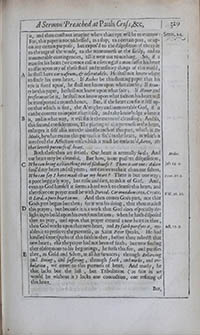 A Sermon Preached at Pauls Cross, &c,&c.
329
Serm.24.
it, and thou canst not imagine where thine eye will be to morrow:
A Sermon Preached at Pauls Cross, &c,&c.
329
Serm.24.
it, and thou canst not imagine where thine eye will be to morrow:
For, this paper is not addressed, as a ship, to a certain port, or up-
on any certain purpose, but expos'd to the disposition of the tyde
to the rage of the winde, to the wantonness of the Eddy, and to
innumerable contingencies, till it wear out to nothing. So, if a
man set his heart (we cannot call it a setting) if a man suffer his heart
to issue upon any of these fluid and transitory things of this world,
he shall have cor vafrum, & inscrutabile, He shall not know where
to finde his own heart. If Riches be this floating paper that his
eye is fixed upon, he shall not know upon what course; If Beau-
ty be this paper, he shall not know upon what face; If Honor and
preferment be it, he shall not know upon what faction his heart will
be transported a month hence. But, if the heart can fix it self up-
on that which is fixt, the Almighty and immoveable God, if it
can be content to inquire after it self, and take knowledge where it
is, and in what way, it will finde the means of cleansing; And so,
this second consideration, The placing of this pureness in the heart,
enlarges it self also into the third branch of this part, which is De
Modo, by what means this pureness is fix'd in the heart, in which is
involved the Affection with which it must be embrac'd, Love, He
that loveth pureness of heart. Both these then are setled; Our heart is naturally foul;Modus. And
our heart may be cleansed. But how, is our present disquisition,
Who can bring a clean thing out of filthiness? There is not one:Job 14.4. Adam
foul'd my heart and all yours; nor can we make it clean our selves,
Who can say I have made clean my heart? There is but one way;Prov. 20.9.
a poor beggarly way, but easie and sure, to ask it of God. And,
even to God himself it seems a hard work to cleanse this heart; and
therefore our prayer must be with David, Cor mundum crea, Create,Psal. 51.12.
O Lord, a pure heart in me. And then comes Gods part, not that
Gods part begun but then; for it was his doing, that thou madest
this prayer; but because it is a work that God does especially de-
light in, to build upon his own foundations; when he hath disposed
thee to pray, and upon that prayer created a new heart in thee,
then God works upon that new heart, and By faith purifyes it,Act. 15.9. en-
ables it to preserve the pureness, as Saint Peter speaks. He had
kindled some sparks of this faith in thee, before thou askedst that
new heart; else the prayer had not been of faith; but now finding
thee obsequious to his beginnings, he fuels this fire, and purifies
thee, as Gold and Silver, in all his furnaces; through Believing
and Doing, and suffering, through faith, and works, and tri-
bulation, we come to this pureness of heart. And truely, he
that lacks but the last, but Tribulation (as fain as we
would be without it) lacks one concoction, one refining of
this heart.
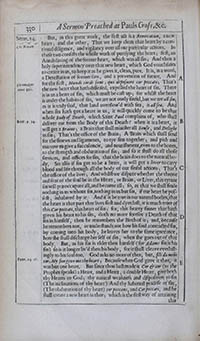 A Sermon Preached at Pauls Cross, &c.
330
Serm.24.
But, in this great work, the first act is a Renovation, a new
A Sermon Preached at Pauls Cross, &c.
330
Serm.24.
But, in this great work, the first act is a Renovation, a new
heart;Cor Novum and the other, That we keep clean that heart by a con-
tinual diligence, and vigilancy over all our particular actions. In
these two consists the whole work of purifying the heart; first, an
Annihilating of the former heart, which was all sin; And then a
holy superintendency over that new heart, which God vouchsafes
to create in us, to keep it as he gives it, clean, pure. It is, in a word,
a Detestation of former sins, and a prevention of future. And
for the first,Chromakus
Anno 390. Mundi corde sunt, qui deposuere cor peccati; That's
the new heart that hath disseised, expelled the heart of sin. There
is in us a heart of sin, which must be cast up; for whilst the heart
is under the habits of sin, we are not onely sinful, but we are all sin;
as it is truly said, that land overflow'd with sea, is all sea. And
when sin hath got a heart in us, it will quickly come to be that
whole Body of Death,Rom. 7.24. which Saint Paul complains of, who shall
deliver me from the Body of this Death? when it is a heart, it
will get a Braine; a Brain that shall minister all Sense, and Delight
in sin; That's the office of the Brain; A Brain which shall send
for the sinews and ligaments, to tye sins together; and pith and
marrow to give a succulencie, and nourishment, even to the bones,
to the strength and obduration of sin; and so it shall do all those
services, and offices for sin, that the brain does to the natural bo-
dy. So also if sin get to be a heart, it will get a liver to carry
blood and life through all the body of our sinful actions; That's
the office of the liver; And whilst we dispute whether the throne
and seat of the soul be in the Heart, or Brain, or Liver, this tyrant
sin will præoccupate all, and become all; so, as that we shall finde
nothing in us without sin, nothing in us but sin, if our heart be pos-
sest, inhabited by it. And if it be true in our natural bodies, that
the heart is that part that lives first and dyes last, it is much truer of
this Cor peccati, this heart of sin; for, this hearty sinner that hath
given his heart to his sin, doth no more foresee a Death of that
sin in himself, then he remembers the Birth of it; and, because
he remembers not, or understands not how his soul contracted sin,
by coming into his body, he leaves her to the same ignorance,
how she shall discharge her self of sin, when she goes out of that
body. But, as his sin is elder then himself (for Adams sin is his
sin) so is it longer liv'd then his body, for it shall cleave everlast-
ingly to his soul too. God asks no more of thee, but, fili da mihi
cor,Prov. 23.26. My son give me thy heart; Because when God gave it thee, it
was but one heart. But since thou hast made it Cor & cor (as the
Prophet speaks) a Heart, and a Heart, a double Heart, give both
thy Hearts to God; thy natural weakness and disposition to sin
(The inclinations of thy heart) And thy habitual practise of sin,
(The obduration of thy heart) cor peccans, and Cor peccati, and he
shall create a new heart in thee; which is the first way of attaining
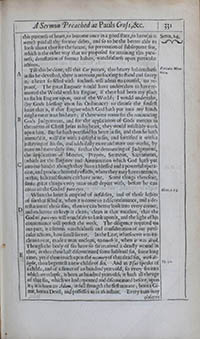 A Sermon Preached at Pauls Cross, &c,&c.
331
Serm.24.
A Sermon Preached at Pauls Cross, &c,&c.
331
Serm.24.
this pureness of heart, to become once in a good state, to have (as it
were) paid all thy former debts, and so to be the better able to
look about thee for the future, for prevention of subsequent sins,
which is the other way that we proposed for attaining this pure-
ness, detestation of former habits, watchfulness upon particular
actions. Till this be done, till this Cor peccati,Peccata Minu-
tiora. this hearty habitualness
in sin be devested, there is no room, no footing to stand and sweep
it; a heart so filled with foulness will admit no counsel, no re-
proof. The great Engineir would have undertaken to have re-
moved the World with his Engine, if there had been any place
to fix his Engine upon, out of the World; I would undertake,
(by Gods blessing upon his Ordinance) to cleanse the foulest
heart that is, if that Engine which God hath put into my hands
might enter into his heart; if there were room for the renouncing
Gods Judgements, and for the application of Gods mercies in
the merits of Christ Jesus in his heart, they would infallibly work
upon him. But he hath petrified his heart in sin, and then he hath
immur'd it, wall'd it with a delight in sin, and fortified it with a
justifying of his sin, and adds daily more and more out-works, by
more and more daily sins; so that the denouncing of Judgement,
the application of Mercies, Prayers, Sermons, Sacraments,
(which are the Engines and Ammunition which God hath put
into our hands) though they have a blessed and a powerful opera-
tion, and produce heavenly effects, where they may have entrance;
in this, habitual sinners can have none. Some things therefore,
some great things every man must depart with, before he can
come to the God of pure eyes.Abac. 1.13. When the heart is emptied of infidelity, and of those habits
of sin that filled it, when it is come to a discontinuance, and a de-
testation of those sins, then we can better look into every corner,
and endeavor to keep it clean; clean in that measure, that the
God of pure eyes will vouchsafe to look upon it, and the light of his
countenance will perfect the work. The diligence required on
our part, is a serious watchfulness and consideration of our parti-
cular actions, how small soever. In the Law, whatsoever was un-
clean to eat, made a man unclean, to touch it, when it was dead.
Though the body of sin have so far received a deadly wound in
thee, as that thou hast discontinued some habitual sin, some long
time; yet if thou touch upon the memory of that dead sin, with de-
light, thou begettest a new childe of sin.65.20. And as Esai speaks of
a childe, and of a sinner of an hundred years old, so every sin into
which we relapse, is born an hundred years old; it hath all the age
of that sin, which we had repented and discontinued before, upon
it; it is born an Adam, in full strength the first minute; born a Gi-
ant, born a Devil, and possesses us in an instant. Every man may
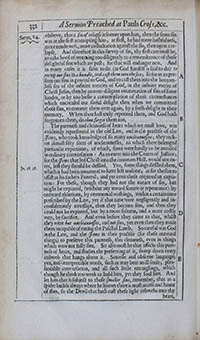 A Sermon Preached at Pauls Cross, &c.
332
Serm.24.
A Sermon Preached at Pauls Cross, &c.
332
Serm.24.
observe, that a sin of relapse is sooner upon him, then the same sin
was at the first attempting him; at first, he had more bashfulness,
more tenderness, more colluctation against the sin, then upon a re-
lapse. And therefore in this survey of sin, thy first care must be,
to take heed of returning too diligently to a remembrance of those
delightful sins which are past; for that will endanger new. And
in many cases it is safer to do (as God himself is said to do) to
tie up our sins in a bundle, and cast them into the sea; so for us to pre-
sent our sins in general to God, and to cast them into the bottom-
less sea of the infinite mercies of God, in the infinite merits of
Christ Jesus; then by an over-diligent enumeration of sins of some
kindes, or by too busie a contemplation of those circumstances
which encreased our sinful delight then when we committed
those sins, to commit them over again, by a fresh delight in their
memory. When thou hast truly repented them, and God hath
forgotten them, do thou forget them too. The pureness and cleanness of heart which we must love, was
evidently represented in the old Law, and in the practise of the
Jews, who took knowledge of so many uncleannesses; they reck-
on almost fifty sorts of uncleannesses, to which there belonged
particular expiations; of which, some were hardly to be avoided
in ordinary conversation: As to enter into the Courts of Justice;
for the Jews that led Christ into the common Hall, would not en-
ter, lest they should be defiled.Jo. 18.28. Yea, some things defiled them,
which it had been unnatural to have left undone; as for the son to
assist at his fathers Funeral; and yet even these required an expia-
tion: For these, though they had not the nature of sin, but
might be expiated, (without any inward sorrow or repentance) by
outward ablutions, by ceremonial washings, within a certain time
prescribed by the Law, yet if that time were negligently and in-
considerately overslipt, then they became sins, and then they
could not be expiated, but by a more solemn, and a more costly
way, by sacrifice. And even before they came to that, whilst
they were but uncleannesses, and not sins, yet even then they made
them incapable of eating the Paschal Lamb. So careful was God
in the Law, and the Jews in their practise (for these outward
things) to preserve this pureness, this cleanness, even in things
which were not fully sins. So also must he that affects this pure-
ness of heart, and studies the preserving of it, sweep down every
cobweb that hangs about it. Scurrile and obscene language;
yea, mis-interpretable words, such as may bear an ill sense; plea-
sureable conversation, and all such little entanglings, which
though he think too weak to hold him, yet they foul him. And
let him that is subject to these smaller sins, remember, that as a
spider builds always where he knows there is most access and haunt
of flies, so the Devil that hath cast these light cobwebs into thy
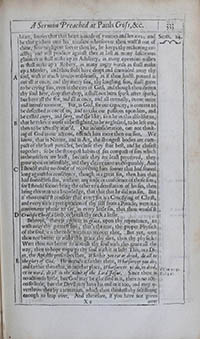 A Sermon Preached at Pauls Cross, &c,&c.
333
Serm.24.
A Sermon Preached at Pauls Cross, &c,&c.
333
Serm.24.
heart, knows that that heart is made of vanities and levities; and
he that gathers into his treasure whatsoever thou wast'st out of
thine, how negligent soever thou be, he keeps thy reckoning ex-
actly, and will produce against thee at last as many lascivious
glaunces as shall make up an Adultery, as many covetous wishes
as shall make up a Robery, as many angry words as shall make
up a Murder; and thou shalt have dropt and crumbled away thy
soul, with as much irrecoverableness, as if thou hadst poured it
out all at once; and thy merry sins, thy laughing sins, shall grow
to be crying sins, even in the ears of God; and though thou drown
thy soul here, drop after drop, it shall not burn spark after spark,
but have all the fire, and all at once, and all eternally, in one intire
and intense torment. For, as God, for our capacity, is content to
be described as one of us, and to take our passions upon him, and
be called angry, and sorry, and the like; so is he in this also like us,
that he takes it worse to be slighted, to be neglected, to be left out,
then to be actually injur'd. Our inconsideration, our not think-
ing of God in our actions, offends him more then our sins. We
know, that in Nature, and in Art, the strongest bodies are com-
pact of the least particles, because they shut best, and lie closest
together; so be the strongest habits of sin compact of sins which
in themselves are least; because they are least perceived, they
grow upon us insensibly, and they cleave unto us inseparably. And
I should make no doubt of recovering him sooner that had sinned
long against his conscience, though in a great sin, then him that
had sinned less sins, without any sense or conscience of those sins;
for I should sooner bring the other to a detestation of his sin, then
bring this man to a knowledge, that that that he did was sin. But
if thou could'st consider that every sin is a Crucifying of Christ,
and every sin is a precipitation of thy self from a Pinacle; were it a
convenient phrase to say, in every little sin, that thou would'st
Crucifie Christ a little, or break thy neck a little. Beloved, there is a power in grace, upon thy repentance, to
wash away thy greatest sins; that's the true, the proper Physick
of the soul, it is the only means to recover thee. But yet, wert
thou not better to make this grace thy diet, then thy physick?
Wert thou not better to nourish thy soul with this grace all the
way, then to hope to purge thy soul with it at last? This, as a Di-
et, the Apostle prescribes thee, Whether you eat or drink, do all to
the glory of God. He intends it farther there, 1 Cor. 10.31.Whatsoever you do;
and farther then that, in another place, Whatsoever ye do, in deed,Col. 3.17.
or in word, do all in the name of the Lord Jesus. Since there is
no action so little, but God may be glorified in it, there is no acti-
on so little, but the Devil may have his end in it too, and may o-
verthrow thee by a tentation, which thou thinkest thy self strong
enough to leap over. And therefore, if you have not given Xx
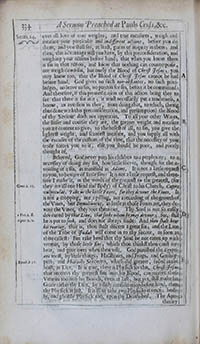 A Sermon Preached at Pauls Cross, &c.
334
Serm.24.
A Sermon Preached at Pauls Cross, &c.
334
Serm.24.
over all love of true weights, and true measures, weigh and
measure your particular and indifferent actions, before you do
them, and you shall see, at least, grains of iniquity in them; and
then, this advantage will you have, by this preconsideration, and
weighing your actions before hand; that when you know there
is sin in that action, and know that nothing can counterpoise,
nor weigh down sin, but onely the Blood of Christ Jesus; you
may know too, that the Blood of Christ Jesus cannot be had
before hand. God gives no such non-obstantes, no such privi-
ledges, no leave to sin, no pardon for sin, before it be committed:
And therefore, if this premeditation of this action bring thee to
see that there is sin in it; it must necessarily put a tenderness, a
horror, an aversion in thee, from doing that, to which, (being
thus done with this preconsideration, and presumption) the Blood
of thy Saviour doth not appertain. To all your other Wares,
the baser and courser they are, the greater weight and measure
you are content to give; to the basest of all, to sin, you give the
lightest weight, and scantest measure, and you supply all with
the excuses of the custom of the time, that the necessity of your
trade forces you to it, else you should be poor, and poorly
thought of. Beloved, God never puts his children to a perplexity; to a
necessity of doing any sin, how little soever, though for the a-
voiding of a sin, as manifold as Adams. It is not a little request
to you, to beware of little sins: It is not a little request, and there-
fore I make it, in the words of the greatest to the greatest, (for
they are all one Head and Body) of Christ to his Church,Cant. 2.15. Capite
vulpeculas, Take us the little Foxes, for they devour the Vines. It
is not a cropping, not a pilling, nor a retarding of the growth of
the Vines, but Demoliuntur, as little as those Foxes are, they de-
vour the Vines, they root them out. Thy Soul is not so easily
devoured by that Lion,1 Pet. 5.8. that seeks whom he may devour; for, still
Apoc. 5.5.he is put to seek, and does not always finde: And thou shalt hear
his roaring, that is, thou shalt discern a great sin; and the Lion
of the Tribe of Judah will come in to thy succor, as
soon as thou callest: But take heed that thy Soul be not eaten up with
vermin, by those little sins, which thou thinkst thou canst for-
bear, and give over when thou wilt. God punished the Egypti-
ans most, by little things; Hailstones, and Frogs, and Grashop-
pers; and Pharaohs Sorcerers,Exod. 8.16. which did greater, failed in the
least, in Lice. It is true, there is Physick for this, Christ Jesus
that receives thy greatest sins into his Blood, can receive these
Vermin too into his Bowels, even at last; but yet, still make his
Grace rather thy Diet, by a daily consideration before hand, then
thy Physick at last. It is ill to take two Physicks at once; bodi-
ly, and ghostly Physick too, upon thy Death-bed. The Apo-
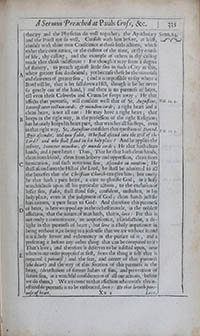 A Sermon Preached at Pauls Cross, &c,&c.
335
Serm.24.
thecary and the Physician do well together; the Apothecary
A Sermon Preached at Pauls Cross, &c,&c.
335
Serm.24.
thecary and the Physician do well together; the Apothecary
and the Priest not so well. Consult with him before, at least,
consult with thine own Conscience in those little actions, which
either their own nature, or the custom of the time, or thy course
of life, thy calling, and the example of others in thy calling
made thee think indifferent: For though it may seem a degree
of flattery, to preach against little sins in such a City as this,
where greater sins do abound; yet because these be the materials
and elements of greater sins, (and it is impossible to say where a
Bowl will lie, that is let fall down a Hill, though it be let never
so gently out of the hand,) and there is no pureness of heart,
till even these Cobwebs and Crums be swept away; He that
affects that pureness, will consider well that of St. Augustine,Psal. 24.4.
Interest inter rectum corde, & mundum corde; a right heart
and a clean heart, is not all one: He may have a right heart, that
keeps in the right way, in the profession of the right Religion;
but he onely keeps his heart pure, that watches all his steps, even
in that right way. St. Augustine considers that question of David,Psal. 24.3.
Quis ascendet, and quis stabit, Who shall ascend into the Hill of the
Lord? and who shall stand in his holy place? And he applies the
answer, Innocens manibus, & mundo corde; He that hath clean
hands, and a pure heart: Thus, That he that hath clean hands,
clean from blood, clean from bribery and oppression, clean from
fornication, and such notorious sins, Ascendet in montem, He
shall ascend into the Hill of the Lord, he shall be admitted to all
the benefits that the Christian Church can give him; but onely
he that hath a pure heart, a care to glorifie God, in a holy
watchfulness upon all his particular actions, to the exclusion of
lesser sins, stabit, shall stand safe, confident, unshaken, in his
holy place, even in the judgment of God; clean hands justifie
him to men, a pure heart to God: And therefore this pureness
of heart, is here wrapped up in the richest mantle, in the noblest
affection, that the nature of man hath, that is, love: For this is
not onely a contentment, an acquiescence, a satisfaction, a de-
light in this pureness of heart, but love is a holy impatience in
being without it, or being in a jealousie that we are without it; and
it is a holy fervor and vehemency in the pursuit of it, and a
preferring it before any other thing that can be compared to it:
That's love; and therefore it deserves to be insisted upon, now
when in our order proposed at first, from the thing it self that is
required (pureness) and the seat, and center of that pureness
(the heart) and the way of this fixation of this pureness in the
heart, (detestation of former habits of sins, and prevention of
future sins, in a watchful consideration of all our actions, before
we do them,) We are come to that affection wherewith this in-
estimable pureness is to be embraced, love: He that loveth pure-
ness of heart.
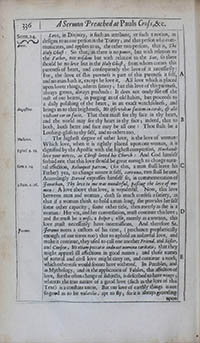 A Sermon Preached at Pauls Cross, &c.
336
Serm.24.
Love, in Divinity, is such an attribute, or such a notion, as
A Sermon Preached at Pauls Cross, &c.
336
Serm.24.
Love, in Divinity, is such an attribute, or such a notion, as
designs to us one person in the Trinity; and that person who com-
municates, and applies to us,Amor. the other two persons, that is, The
Holy Ghost: So that, as there is no power, but with relation to
the Father, nor wisdom but with relation to the Son, so there
should be no love but in the Holy Ghost, from whom comes this
pureness of heart, and consequently the love of it necessarily:
For, the love of this pureness is part of this pureness it self,
and no man hath it, except he love it. All love which is placed
upon lower things, admits satiety; but this love of this pureness,
always grows, always proceeds: It does not onely file off the
rust of our hearts, in purging us of old habits, but proceeds to
a daily polishing of the heart, in an exact watchfulness, and
brings us to that brightness,Augustine. Ut ipse videas faciem in corde, & alii
videant cor in facie. That thou maist see thy face in thy heart,
and the world may see thy heart in thy face; indeed, that to
both, both heart and face may be all one: Thou shalt be a
Looking-glass to thy self, and to others too. Mulieres.The highest degree of other love, is the love of woman:
Which love, when it is rightly placed upon one woman, it is
dignified by the Apostle with the highest comparison,Ephes. 5.25. Husbands
love your wives, as Christ loved his Church: And God himself
forbad not that this love should be great enough to change natu-
ral affection,Gen. 2.24. Relinquet patrem, (for this, a man shall leave his
Father) yea, to change nature it self, caro una, two shall be one.
Accordingly David expresses himself so, in commemoration of
Jonathan,2 Sam. 1.26. Thy love to me was wonderful, passing the love of wo-
men: A love above that love, is wonderful. Now, this love
between man and woman, doth so much confess a satiety, as
that if a woman think to hold a man long, she provides her self
some other capacity, some other title, then meerly as she is a
woman: Her wit, and her conversation, must continue this love;
and she must be a wife, a helper; else, meerly as a woman, this
love must necessarily have intermissions. And therefore St.
Jerome notes a custom of his time,Jerome. (perchance prophetically
enough of our times too) that to uphold an unlawful love, and
make it continue, they used to call one another Friend, and Sister,
and Cousen, Ut etiam peccatis induant nomina caritatis, that they
might apparel ill affections in good names; and those names
of natural and civil love might carry on, and continue a work,
which otherwise would sooner have withered. In Parables, and
in Mythology, and in the application of Fables, this affection of
love, for the often change of subjects, is described to have wings;
whereas the true nature of a good love (such as the love of this
Text) is a constant union. But our love of earthly things is not
so good as to be volatilis, apt to fly; for it is always groveling
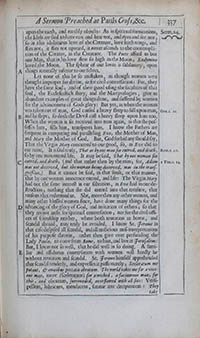 A Sermon Preached at Pauls Cross, &c,&c.
337
Serm.24.
A Sermon Preached at Pauls Cross, &c,&c.
337
Serm.24.
upon the earth, and earthly objects: As in spiritual fornications,
the Idols are said to have ears and hear not, and eyes and see not;
so in this idolatrous love of the Creature, love hath wings, and
flies not; it flies not upward, it never ascends to the contempla-
tion of the Creator, in the Creature. The Poets afford us but
one Man, that in his love flew so high as the Moon; Endymion
loved the Moon. The sphear of our loves is sublunary, upon
things naturally inferior to our selves. Let none of this be so mistaken, as though women were
thought improper for divine, or for civil conversation: For, they
have the same soul; and of their good using the faculties of that
soul, the Ecclesiastick story, and the Martyrologies, give us
abundant examples of great things done, and suffered by women
for the advancement of Gods glory: But yet, as when the woman
was taken out of man, God caused a heavy sleep to fall upon man,Gen. 2.22.
and he slept; so doth the Devil cast a heavy sleep upon him too.
When the woman is so received into man again, as that she pos-
sesses him, fills him, transports him. I know the Fathers are
frequent in comparing and paralleling Eve, the Mother of Man,
and Mary the Mother of God. But, God forbid any should say,
That the Virgin Mary concurred to our good, so, as Eve did to
our ruine. It is said truly, That as by one man sin entred, and death,Rom. 5.12.
so by one man entred life. It may be said, That by one woman sin
entred, and death, (and that rather then by the man; for,1 Tim. 2.14. Adam
was not deceived, but the woman being deceived, was in the trans-
gression.) But it cannot be said, in that sense, or that manner,
that by one woman innocence entred, and life: The Virgin Mary
had not the same interest in our salvation, as Eve had in our de-
struction; nothing that she did entred into that treasure, that
ransom that redeemed us. She, more then any other woman, and
many other blessed women since, have done many things for the
advancing of the glory of God, and imitation of others; so that
they are not unfit for spiritual conversation; nor for the civil offi-
ces of friendship neither, where both tentation at home, and
scandal abroad, may truly be avoided. I know St. Jerome in
that case despised all scandal, and all malicious mis-interpretations
of his purpose therein, rather then give over perswading the
Lady Paula, to come from Rome, to him, and live at Jerusalem:
But, I know not so well, that he did well in so doing. A fami-
liar and assiduous conversation with women will hardly be
without tentation and scandal. St. Jerome himself apprehended
that scandal tenderly, and expresses it passionately; Sceleratum me
putant, & omnibus peccatis obrutum. The world takes me for a vici-
ous man, more (sceleratum) for a wicked, a facinorous man, for
this, and obrutum, surrounded, overflowed with all sins: Versi-
pellem, lubricum, mendacem, satanæ arte decipientem: They
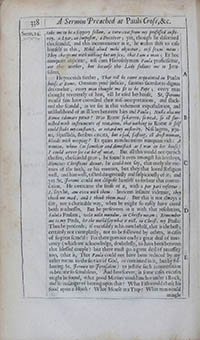 A Sermon Preached at Pauls Cross, &c.
338
Serm.24.
A Sermon Preached at Pauls Cross, &c.
338
Serm.24.
take me to be a slippery fellow, Serm. 24. a turn-coat from my professed auste-
rity, a Lyar, an Impostor, a Deceiver; yet, though he discerned
this scandal, and this inconvenience in it, he makes shift to ease
himself in this, Nihil aliud mihi objicitur, nisi sexus meus:
They charge me with nothing but my sex, that I am a man; Et hoc
nunquam objicitur, nisi cum Hierosolymam Paula proficiscitur,
nor that neither, but because this Lady follows me to Jeru-
salem. He proceeds farther, That till he came acquainted in Paulas
house at Rome, Omnium penè judicio, summo sacerdotio dignus
decernebar, every man thought me fit to be Pope; every man
thought reverently of him, till he used her house. St. Jerome
would fain have corrected their mis-interpretations, and slack-
ned the scandal, as we see in that vehement expostulation, and
unlikelihood of an ill love between him and Paula; Nulla alia me
Romæ edomare potuit? Was Rome so barren, so weak, so ill fur-
nished with instruments of tentation, that nothing in Rome it self
could shake my constancy, or retard my austerity, Nisi lugens, jeju-
na, squallida, fletibus cæcata, but a sad, fasting, ill drest woman,
blinde with weeping? Et quam manducantem nunquam vidi: A
woman, whom (as familiar and domestick as I was in her house)
I could never see eat bit of meat. But all this would not quench
the fire, the scandal grew; he found it even amongst his brethren,
Homines Christiani dicunt, he could not say, that onely the ene-
mies of the faith, or his enemies, but they that loved Religion
well, and him well, talked dangerously and suspiciously of it; and
yet St. Jerome could not dispose himself to forbear that conver-
sation. He overcame the sense of it, with a par pari refertur:
I, says he, am even with them: Invicem insanire videmur, they
think me mad, and I think them mad: But this is not always a
safe, nor a charitable way, when he might so easily have cured
both madnesses. But he perseveres in it with that resolution,
Saluta Paulam, velit nolit mundus, in Christo meam; Remember
me to my Paula, let the world say what it will, in Christ, my Paula:
Thus he proceeds; if excusably in his own behalf, that is the best;
certainly not exemplarily, not to be followed by others, in cases
of so great scandal: For there goes not onely a great deal of inno-
cency (which we acknowledge, doubtlesly, to have been between
that blessed couple) but there must go a great deal of necessity
too, (that is, That Paula could not have been reduced by any
other means to the service of God, or continued in it, but by fol-
lowing St. Jerome to Jerusalem) to justifie such a conversation
as became so scandalous. And howsoever, in some cases excuses
might be found, what good Mariner would anchor under a Rock,
and lie in danger of beating upon that? What Fish would chuse his
food upon a Hook? What Mouse at a Trap? What man would
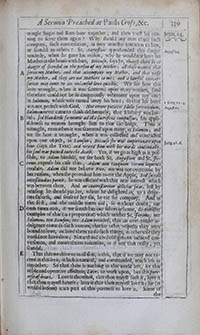 A Sermon Preached at Pauls Cross, &c,&c.
339
Serm.24.
A Sermon Preached at Pauls Cross, &c,&c.
339
Serm.24.
mingle Sugar and Rats-bane together, and then trust his cun-
ning to sever them again? Why should any man chuse such
company, such conversation, as may minister tentation to him,
or scandal to others?Augustine,. St. Augustine apprehended this danger
tenderly, when he gave his reason, why he would not have his
Mother in the house with him, Because, says he, though there be no
danger of scandal in the person of my Mother? all those women that
serve my Mother, and that accompany my Mother, and that visit
my Mother, all they are not Mothers to me; and a lawful conver-
sation may come to an unlawful love quickly. We see how this
love wrought, when it was scattered upon many women, (and
therefore could not be so dangerously vehement upon any one)
in Solomon, whose wife turned away his heart;1 King 11.4. so that his heart
was not perfect with God. Nec errore putavit Idolis serviendum, Augustine.
Solomon never came to think deliberately, that Idolatry was law-
ful; sed blanditiis fœmineis ad illa sacrificia compulsus, his appli-
ableness to women brought him to that sacriledge. Thus it
wrought, even when it was scattered upon many, in Solomon; and
we see how it wrought, when it was collected and contracted
upon one object, in Samson;Judg. 16.6. Because she was importunate upon
him (says the Text) and vexed him with her words continually,
his soul was pained unto the death. Yea, if we go as high as is pos-
sible, to Adam himself, we see both St. Augustine and St. Je-
rome express his case thus, Adam non tanquam verum loquenti
credidit, Adam did not believe Eve, nor was not overcome by
her reasons, when she provoked him to eat the Apple, Sed sociali
necessitudini paruit, he was affected with that near interest which
was between them. And ne contristaretur delicias suas, lest by
refusing he should put her, whom he delighted in, to a despe-
rate sadness, and sense of her sin, he eat for company. And as
the first, and the middle times did, so without doubt, our
own times too, if we search but our selves at home, do minister
examples of this (in a proportion) which neither St. Jerome, nor
Solomon, nor Samson, nor Adam avoided, that an over-tender in-
dulgence towards such women, that for other respects they were
bound to love, inclined them to do such things, as otherwise they
would not have done; Natural and civil obligations induced con-
versation, and conversation tentation, or if not that really, yet
scandal. That that we drive to in all this, is this, that if we may not ex-
ceed in this love, which is natural, and commanded, much less in
any other. So that there is nothing in this world left, for this
noble and operative affection, Love, to work upon, but this pure-
ness of heart. Love it therefore, that thou mayst seek it, love it
that thou mayest have it; love it that thou mayest love it; for (as
we said before) it is a part of this pureness to love it. Some of
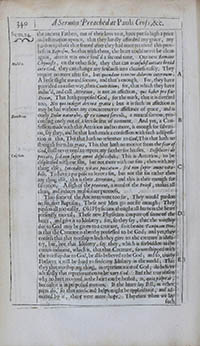 A Sermon Preached at Pauls Cross, &c.
340
Serm.24.
A Sermon Preached at Pauls Cross, &c.
340
Serm.24.
the ancient Fathers, out of their love to it, have put so high a price
and estimation upon it, that they hardly afforded any grace, any
pardon to those that sinned after they had once received this pure-
ness in Baptism. So that with them, the heart could never be clean
again, after it was once foul'd a second time. Our new Romane
Chymists,Maldon. on the other side, they that can transubstantiate bread
into God, they can change any foulness into cleaness easily. They
require no more after sin, but quendam tenuem dolorem internum,
A little slight inward sorrow, and that's enough. For, they have
provided an easier way, then Contrition; for, that which they have
induc'd, and call Attrition, is not an affection, qui habet pro sine
Deum, That hath proposed God, for the mark, that it is directed
too; Nec qui indiget divina gratia; but it is such an affection as
may be had without any concurrence or assistance of grace, and is
onely Dolor naturalis,Zambran. & ex timore servili,, a natural sorrow, pro-
ceeding onely out of a servile fear of torment. And yet, a Con-
fession made with this Attrition and no more, is enough for salvati-
on, say they; and he that hath made a confession with such a disposi-
tion as this, This that hath no reference to God, This that hath no
strength from his grace, This that hath no motive from the fear of
God, shall never need to repent any farther for his sins. Displiceri de
peccato,Cajetan. sed non super omni displicibili; This is Attrition, to be
displeased with our sins, but not more with our sins, then with any
thing else; Intendere vitare peccatum, sed non super omne vita-
bile, To have a purpose to leave a sin, but not the sin rather then
any thing else, this is their Attrition, and this is their enough for
salvation. A sigh of the penitent, a word of the Priest, makes all
clean, and induces an absolute pureness. Thus some of the Ancients went too far, They would pardon
no sin after Baptism; These new Men go not far enough; They
pardon all too easily. Old Physicians thought all hurts in the heart
presently mortal; These new Physitians can pare off some of the
heart, and give it to Idolatry; for, so they say, that the worship
due to God may be given to a creature, so it be not Tanquam Deo,
as that the Creature is thereby professed to be God; and yet, they
confess that that worship which they give to the creature is idola-
try, but, not that Idolatry, say they, which is forbidden in the
commandment, which is, that that Creature, so worshipped with
the worship due to God, be also believed to be God; and so, truely
I believe it will be hard to finde any Idolatry in the world; That
they that worship any thing, in representation of God, do believe
advisedly that representation to be very God. But the true reason
why no hurt received in the heart can be healed, is, quia palpitat,
because it is in perpetual motion. If the heart lay still, as other
parts do, so that medicinal helps might be applied to it, and ad-
mitted by it, there were more hope. Therefore when we lay
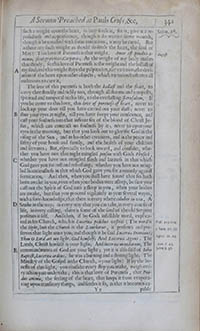 A Sermon Preached at Pauls Cross, &c,&c.
341
Serm.24.
A Sermon Preached at Pauls Cross, &c,&c.
341
Serm.24.
such a weight upon the heart, as may settle it, fix it, give it a re-
posedness and acquiescence, though it do receive some wounds,
though it be touched with some tentations, it may be cured. But
is there any such weight as should so settle the heart, the soul of
Man? This love of Pureness is that weight.AugnstAugust. Amor est pondus a-
nimæ; sicut gravitas, Corporis; As the weight of my body makes
that steady, so this love of Pureness is the weight and the ballast of
my soul; and this weight stays the palpitation, the variation, the devi-
ation of the heart upon other objects; which variation frustrates all
endeavors to cure it. The love of this pureness is both the ballast and the frait, to
carry thee steadily and richly too, through all storms and tempests,
spiritual and temporal in this life, to the everlasting Jerusalem. If
you be come to this love, this love of pureness of heart, never to
lock up your door till you have carried out your dust; never to
shut your eyes at night, till you have swept your conscience, and
cast your foulness into that infinite sea of the blood of Christ Je-
sus, which can contract no foulness by it; never to open your
eyes in the morning, but that you look out to glorifie God in the
rising of the Sun, and in his other creatures, and in the peace and
safety of your house and family, and the health of your children
and servants; But, especially to look inward, and consider, whe-
ther you have not that night mingled poyson with Gods Physick,
whether you have not mingled sloth and laziness in that which
God gave you for rest and refreshing; whether you have not ming-
led licentiousness in that which God gave you for a remedy against
fornication. And then, when you shall have found that sin hath
been awake in you, even when your bodies were asleep, be sure you
cast not the Spirit of God into a sleep in you, when your bodies
are awake, but that you proceed vigilantly in your several wayes,
with a fore-knowledge, that there is every where coluber in via, A
Snake in the way; in every way that you can take, in every course of
life, in every calling, there is some of the seed of the old Serpent
presents it self. And then, if by Gods infallible word, explica-
ted in his Church,Psal. 119.104. which is Lucerna pedibus vestris (The word is
the light, but the Church is the Lanthorne,2 Sam. 22.29. it presents and pre-
serves that light unto you; and though it be said Lucerna Dominus,
Thou O Lord art my light, God himself; And Apoc. 21.23.Lucerna Agnus, The
Lamb, Christ himself is your light; And lucerna mandatum,Prov. 6.23. The
commandments of God are your light; yet it is also said of John 5.35.Iohn
Baptist, Lucerna ardens, he was a burning and a shining light; The
Ministry of the Gospel in the Church, is your light) If by the be-
nefit of this light, you consider every step you make, weigh eve-
ry action you undertake, this is that love of Pureness, that Pon-
dus animæ, the setling of the heart, that keeps it from evapora-
ting upon transitory things, and settles it so, as that it becomes ca-
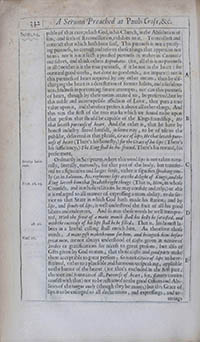 A Sermon Preached at Pauls Cross, &c.
342
Serm.24.
pable of that cure, which God, in his Church, in the Absolution
A Sermon Preached at Pauls Cross, &c.
342
Serm.24.
pable of that cure, which God, in his Church, in the Absolution
of sins, and seals of Reconciliation, exhibits to it. To recollect and
contract that which hath been said, This pureness is not a purify-
ing pureness, to correct and reform those things that appertain not
to us; nor it is not such a purified pureness as makes us Canonize
our selves, and think others Reprobates (for, all this is no pureness
at all:) neither is it the true pureness, if it be not in the heart (for
outward good works, not done to good ends, are impure:) nor is
this pureness of heart acquired by any other means, then by dis-
charging the heart in a detestation of former habits, and a sedulous
watchfulness in preventing future attempts; nor can this pureness
of heart, though by these means attain'd to, be preserved, but by
this noble and incorruptible affection of Love, that puts a true
value upon it, and therefore prefers it above all other things. And
this was the first of the two marks which we found to be upon
that person that should be capable of the Kings friendship, He
that loveth pureness of heart. And the other is, that he have by
honest industry fitted himself, in some way, to be of use to the
publike, delivered in that phrase, Grace of lips; He that loveth pure-
ness of heart (There's his honesty;) for the Grace of his lips (There's
his sufficiency;) The King shall be his friend, There's his reward, his
preferment. Gratia labio-
rum.Ordinarily in Scriptures, where this word lips is not taken natu-
rally, literally, narrowly, for that part of the body, but transfer-
red to a figurative and larger sense, either it signifies speaking one-
ly (as in Solomon, As, righteous lips are the delight of Kings, and the
King loveth him that speaketh right things (That is, Him, in whose
Counsels,Prov. 16.13. and in whose relations he may confide and rely;) or else
it is enlarged to all manner of expressing a mans ability, to do ser-
vice to that State in which God hath made his station; and by
lips, and fruits of lips, is well understood the fruit of all his good
labors and endeavors. And so may those words be well interpre-
ted, With the fruit of a mans mouth shall his belly be satisfied, and
with the encrease of his lips shall he be filled;18.20. That is, his honest la-
bors in a lawful calling shall enrich him. As therefore those
words,Vers. 16. A mans gift maketh room for him, and bringeth him before
great men, are not always understood of Gifts given in nature of
Bribes or gratifications for access to great persons, but also of
Gifts given by God to men, that those Gifts and good parts make
them acceptable to great persons; so is not Grace of lips to be re-
strained, either to a plausible and harmonious speaking, appliable
to the humor of the hearer (for that's excluded in the first part,
the root and fountain of all, Pureness of heart, for, flattery cannot
consist with that) nor to be restrained to the good Offices and Abi-
lities of the tongue onely (though they be many;) but this Grace of
lips is to be enlarged to all declarations, and expressings, and ut-
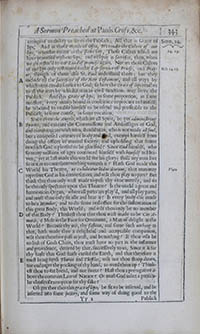 A Sermon Preached at Pauls Cross, &c.
343
Serm.24.
terings of an ability to serve the Publick; All that is Grace of
A Sermon Preached at Pauls Cross, &c.
343
Serm.24.
terings of an ability to serve the Publick; All that is Grace of
lips. And in those words of Osea, We render the Calves of our
lips, is neither meant as the Jews say,14.13. Those Calves which we
have promised with our lips, and will pay in sacrifice, then, when
we are restor'd to our Land of promise again. Nor are those Calves
of our lips only restrained to the Lip-service of Praise,Heb. 14.15. and Pray-
er, though of them also St. Paul understand them; but they
include all the sacrifices of the New Testament, and all ways by
which man can do service to God; so here the Grace of lips reaches
to all the ways by which a man in civil functions may serve the
Publick. And this Grace of lips, in some proportion, in some
measure, every man is bound in conscience to procure to himself;
he is bound to enable himself to be useful and profitable to the
Publick, in some course, in some vocation. Since even the Angels, which are all Spirit, be yet administring
Spirits, and execute the Commissions and Ambassages of God,
and communicate with men; should man, who is not made all soul,
but a composed creature of body and soul, exempt himself from
doing the offices of mutual society, and upholding that frame
in which God is pleased to be glorified? Since God himself, who
so many millions of ages contented himself with himself in Hea-
ven, yet at last made this world for his glory; shall any man live
so in it as to contribute nothing towards it? Hath God made this
World his Theatre, ut exhibeatur ludus deorum,Plato. that man may
represent God in his conversation; and wilt thou play no part? But
think that thou only wast made to pass thy time merrily, and to
be the only spectator upon this Theatre? Is the world a great and
harmonious Organ, where all parts are play'd, and all play parts;
and must thou only sit idle and hear it? Is every body else made
to be a Member, and to do some real office for the sustentation of
this great Body, this World; and wilt thou only be no member
of this Body? Thinkest thou that thou wast made to be Cos A-
moris, a Mole in the Face for Ornament, a Man of delight in the
World? Because thy wit, thy fashion, and some such nothing as
that, hath made thee a delightful and acceptable companion,
wilt thou therefore pass in jeast, and be nothing? If thou wilt be
no link of Gods Chain, thou must have no part in the influence
and providence, derived by that, successively to us. Since it is for
thy fault that God hath cursed the Earth, and that therefore it
must bring forth Thorns and Thistles, wilt not thou stoop down,
nor endanger the pricking of thy hand, to weed them up? Think-
est thou to eat bread, and not sweat? Hast thou a prerogative a-
bove the common Law of Nature? Or must God insert a particu-
lar clause of exemption for thy sake? Oh get thee then this grace of lips; be fit to be inserted, and be
inserted into some society, and some way of doing good to the Yy
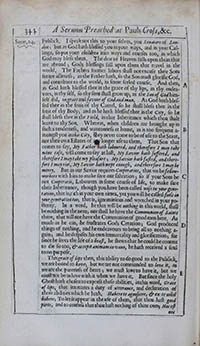 A Sermon Preached at Pauls Cross, &c.
344
Serm.24.
A Sermon Preached at Pauls Cross, &c.
344
Serm.24.
Publick. I speak not this to your selves, you Senators of Lon-
don; but as God hath blessed you in your ways, and in your Cal-
lings, so put your children into ways and courses too, in which
God may bless them. The dew of Heaven falls upon them that
are abroad; Gods blessings fall upon them that travel in the
world. The Fathers former labors shall not excuse their Sons
future idleness; as the Father hath, so the Son must glorifie God,
and contribute to the world, in some setled course. And then,
as God hath blessed thee in the grace of thy lips, in thy endea-
vors, in thy self, so thy sons shall grow up, as the Son of God him-
self did, in grace and favour of God and man. As God hath bles-
sed thee in the fruit of thy Cattel, so he shall bless thee in the
fruit of thy Body; and as he hath blessed thee in the City, so he
shall bless thee in the Field, in that Inheritance which thou shalt
leave to thy Son. Whereas, when children are brought up in
such a tenderness, and wantonness at home, as is too frequent a-
mongst you in this City, they never come to be of use to the State,
nor their own Estates of any longer use to them. That Son that
comes to say, My Father hath laboured, and therefore I may take
mine ease, will come to say at last, My Savior hath suffered, and
therefore I may take my pleasure; My Savior hath fasted, and there-
fore I may riot, My Savior hath wept enough, and therefore I may be
merry. But as our Savior requires Cooperarios, that we be fellow-
workers with him to make sure our salvation; so if your Sons be
not Cooperarii, Labourers in some course of life, to make sure
their Inheritance, though you have been called wise in your gene-
ration, that is; rich in your own times, yet you will be called fools in
your generation too; that is, ignominious and wretched in your po-
sterity. In a word, he that will be nothing in this world, shall
be nothing in the next; nor shall he have the Communion of Saints
there, that will not have the Communion of good men here. As
much as he can, he frustrates Gods Creation; God produced
things of nothing, and he endeavours to bring all to nothing a-
gain; and he despises his own immortality and glorification; for
since he lives the life of a beast, he shews that he could be content
to die so too, & accepit animam in vano, he hath received a soul
to no purpose. This grace of lips then, this ability to do good to the Publick,
we are bound to have; but we are not commanded to love it, as
we are the pureness of heart; we must love to have it, but we
must not be in love with it when we have it. But since the holy
Ghost hath chosen to express these abilities, in this word, Grace
of lips, that intimates a duty of utterance, and declaration of
those abilities which he hath. Habere te agnoscere, & ex te nihil
habere; To let it appear in the use of them, that thou hast good
parts, and to confess that thou hast nothing of thine own; Hoc est
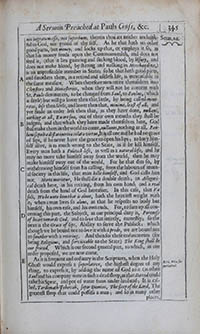 A Sermon Preached at Pauls Cross, &c.
345
Serm.24.
A Sermon Preached at Pauls Cross, &c.
345
Serm.24.
Serm. 24. nec ingratum esse, nec superbum; therein thou art neither unthank-
ful to God, nor proud of thy self. As he that hath no other
good parts, but money; and locks up that, or employs it so, as
that his money feeds upon the Commonwealth, and does not
feed it, (that it lies gnawing and sucking blood, by Usury, and
does not make blood, by stirring and walking in Merchandize,)
is an unprofitable member in State; so he that hath good parts,
and smothers them, in a retired and useless life, is inexcusable in
the same measure. When therefore men retire themselves into
Cloysters and Monasteries, when they will not be content with
St. Pauls diminution, to be changed from Saul, to Paulus, (which
is little) but will go lower then that little, by being called mino-
rites, less then little, and lower then that, minims, least of all; and
yet finde an order less then that, as they have done, nullani,
nothing at all, Ex ore suo, out of their own mouths they shall be
judged; and that which they have made themselves here, God
shal make them in the world to come, nullanos, nothing at all. Pau-
lum sepultæ distatinertiæ celata virtus, It is all one as if he had no grace
of lips, if he never have the grace to open his lips; to bury him-
self alive, is as much wrong to the State, as if he kill himself.
Every man hath a Politick life, as well as a natural life; and he
may no more take himself away from the world, then he may
make himself away out of the world. For he that dies so, by
withdrawing himself from his calling, from the labours of mutu-
al society in this life, that man kills himself, and God calls him
not. Morte morietur, He shall die a double death; an Allegori-
cal death here, in his retiring, from his own hand; and a real
death from the hand of God hereafter. In this case, that Væ
soli, Wo be unto him that is alone, hath the heaviest weight with
it; when a man lives so alone, as that he respects no body but
himself, his own ease, and his own ends. For, to sum up all con-
cerning this part, the Subject, as our principal duty is, Pureness
of heart towards God, and to love that intirely, earnestly; so the
next is the Grace of lips, Ability to serve the Publick; which
though we be bound not to love it with a pride, we are bound not
to smother with a retiring. And then for these endowments (for
being Religious, and serviceable to the State). The King shall be
our friend. Which is our second general part, to which, in our
order proposed, we are now come. As it is frequent and ordinary in the Scriptures, when the Holy
Ghost would express a superlative,Rev, nota su-
perlativi. the highest degree of any
thing, to express it, by adding the name of God to it (as when
Saul and his company were in such a dead sleep, as that David could
take his Spear, and pot of water from under his head; It is cal-
led Tardemath Jehovah, sopor Domini, The sleep of the Lord, The
greatest sleep that could possess a man; and so in many other
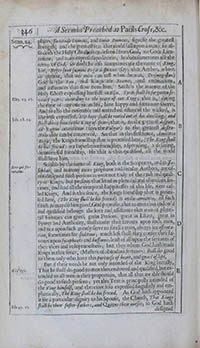 A Sermon Preached at Pauls Cross, &c.
346
Serm.24.
A Sermon Preached at Pauls Cross, &c.
346
Serm.24.
places, fortitudo Domini, and timor Domini, signifie the greatest
strength, and the greatest fear that could fall upon a man) so al-
so doth the Holy Ghost often descend from God, to Gods Lieu-
tenant; and as to express superlatives, he does sometimes use the
name of God; so doth he also sometimes use the name of King.
For, Reges sunt summi Regis defluxus (says that Author, who is
so antient, that no man can tell when he was, Trismegistus)
God is the Sun, and Kings are Beams, and emanations,
and influences that flow from him. Such is the manner of the
Holy Ghost expressing himself in Esai. Tyrus shall be forgotten se-
venty years,Esay. 23.15. according to the years of one King; that is, during
the time of any one mans life, how happy and fortunate soever.
And so also the miserable and wretched estate of the wicked, is
likewise expressed,Job. 18.14. His hope shall be rooted out of his dwelling, and
shall drive him to the King of fears; that is, to the greatest despair;
ad Regem interituum (says the Vulgar) to the greatest destru-
ction that can be conceived. So that in this first sence, Amicitia
Regis, the Kings friendship that is promised here, (The King shall
be his friend) is a superlative friendship, a spreading, a delating,
an universal friendship. He that is thus qualified, all the world
shall love him. Rex qui for-
tunatus.So also by the name of King, both in the Scriptures, and in Jo-
sephus, and in many more prophane and secular Authors, are of-
ten designed such persons as were not truly of the rank and quali-
ty of Kings; but persons that lived in plentiful and abundant for-
tunes, and had all the temporal happinesses of this life, were cal-
led Kings. And in this sence, the Kings friendship that is promi-
sed here, (The King shall be his friend) is utilis amicitia, all such
frindsfriends as may do him good. God promises, that to men thus endow'd
and qualified belongs the love and assistance that men of plenti-
ful fortunes can give; great Persons, great in Estate, great in
Power and Authority, shall confer their favours upon such men,
and not upon such as only serve to swell a train, always for ostenta-
tion, sometimes for sedition; much less shall they confer their fa-
vours upon sycophants and buffoons; least of all upon the servants of
their vices and voluptuousness; but they whom God hath made
Kings in that sence, (Masters of abundant fortunes) shall do good
to them only who have this pureness of heart, and grace of lips. Rex Ipse.But if these words be not only intended of the King literally,
That he shall do good to men thus endowed and qualified, but ex-
tended to all men in their proportion, that all that are able should
do good to such persons; yet this Text is principally intended of
the King himself, and therefore is so expressed singularly and em-
phatically, The King shall be his friend. As God hath appointed
it for a particular dignity to his Spouse, the Church, That Kings
shall be their foster-fathers,Esa. 49.23. and Queens their nurses; so God hath
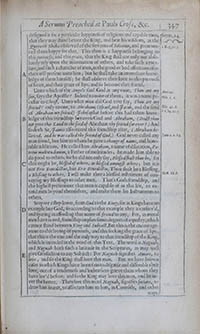 A Sermon Preached at Pauls Cross, &c.
347
Serm.24.
A Sermon Preached at Pauls Cross, &c.
347
Serm.24.
designed it for a particular happiness of religious and capable men,
that they may stand before the King, and hear his wisdom, as the
Queen of Sheba observed of the servants of Solomon,1 Reg,. 10. 9. and pronoun-
ced them happy for that. This then is a happiness belonging to
this pureness, and this grace, that the King shall not only nor abso-
lutely rely upon the information of others, and take such a mea-
sure, and such a character of men, as the good or bad affections of o-
thers will present unto him; but he shall take an immediate know-
ledge of them himself; he shall observe their love to this pureness
of heart, and their grace of lips, and so become their friend. Unto which of the Angels said God at any time,Amicus. Thou art my
son, says the Apostle? Indeed to none of them;Heb. 1.5. it was a name pe-
culiar to Christ. Unto what man did God ever say, Thou art my
friend? only to one, to Abraham; (Israel, and Jacob,Esa. 41.8. and the seed
of Abraham my friend) Jehosaphat2 Chr. 20.7. before this had taken know-
ledge of this friendship between God and Abraham, (Didst thou
not give this Land to the seed of Abraham thy friend for ever?) And
so doth St. James also record this friendship after, (Abraham be-
lieved, and he was called the friend of God.)James 2.23. God never called any
man friend, but him to whom he gave a change of name, and hono-
rable additions. He called him Abraham, a name of dilatation, Pa-
trem multitudinum, a Father of multitudes; he made him able to
do good to others; for he did not only say, Blessed shalt thou be, for
that might be, blessed of others, or blessed amongst others; but it is
not Eris Benedictus, but Eris Benedictio, Thou shalt be a Blessing,Gen. 12.2.
a Blessing to others. I will make thee a blessed instrument of con-
veying my Blessings to other men. That's Gods friendship, and
the highest preferment that man is capable of in this life, to ex-
tend men beyond themselves, and make them his Instruments to
others. Step we a step lower, from God to the King; for as Kings have no
example but God, so according to that example they are reserv'd,
and sparing in affording that name of friend to any. For, as moral
men have noted, friendship implies some degrees of equality, which
cannot stand between King and Subject. But this is the encourage-
ment to this loving of pureness, and this seeking the grace of lips;
that this is the true and the only way to that friendship of the King,
which is intended in the word of this Text. The word is Nagnah;
and Nagnah hath such a latitude in the Scriptures, as may well
give satisfaction to any Subject: For Nagnah signifies Amare, to
love; and so the King shall love this man. But we have known
cases in which Kings have been fain to disguise and dissemble their
love, out of a tenderness and lothness to grieve them whom they
have lov'd before; and so the King may love this man, and he ne-
ver the better. Therefore this word Nagnah, signifies sociare, to
draw him nearer, to associate him to him, in Counsels, and other
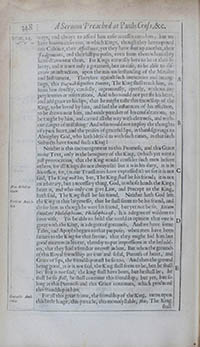 A Sermon Preached at Pauls Cross, &c.
348
Serm.24.
A Sermon Preached at Pauls Cross, &c.
348
Serm.24.
ways, and always to afford him easie accesses unto him; but we
have known cases too, in which Kings, though they have opened
one Cabinet, their Affections, yet they have shut up another, their
Judgements, and their last purposes, even from them whom they
have drawn near them. For Kings naturally love to be at their li-
berty; and it is not only a greatness, but an ease, to be able to dis-
avow an instruction, upon the mis-understanding of the Minister
and Instrument. Therefore against such intricacies and intang-
lings, this Dagnah signifies Docere, The King shall teach him, in-
form him directly, candidly, ingenuously, apertly, without any
perplexities or reservations. And who would not purifie his heart,
and add grace to his lips, that he might taste this friendship of the
King, to be loved by him; and feel the influences of his affection,
to be drawn near him; and made partaker of his consultations; to
be taught by him, and carried all the way with clearness, and with-
out danger of mistaking? And who would not imploy the thoughts
of a pure heart, and the praises of graceful lips, in thanksgivings to
Almighty God, who hath bless'd us with such times, as that such
Subjects have found such a King! Neither is this encouragement to this Pureness, and this Grace
in our Text, only in the benignity of the King, (which yet were a
just provocation, that the King would consider such men before
others; for all Kings do not always so) but it is in his duty, it is in
his office; for, (as our Translators have expressed it) we see it is not
said, The King will be; but, The King shall be his friend; it is not
an arbitrary, but a necessary thing. God, in whose hands the Kings
heart is,Non Arbitra-
rium. and who only can give Law, and Precept to the King,
hath said, The King shall be his friend. Neither hath God left
the King at that largenesse, that he shall seem to be his friend, and
do for him as though he were his friend, but yet not be so. Etiam
simulare Philosophiam, Philosophia est; It is a degree of wisdom to
seem wise.Veritas Amici-
tiæ. To be able to hold the world in opinion that one is
great with the King, is a degree of greatness. And we have some
Tales, and Apophthegms to that purpose; when men have been
suiters to the King for that favour, that they might bid him but
good morrow in his ear, thereby to put impressions in the behold-
ers, that they had a familiar interest in him. But when the grounds
of this Royal friendship are true and solid, PurenssPureness of heart, and
Grace of lips, the friendship must be so too. And then the ground
being good, as it is not said, the King shall seem to be, but he shall
be; so it is not said, the king shall have been, but he shall be; he
shall be so still, he shall continue this friendship; but yet, but so
long as this Pureness and this Grace continues, which produced
this friendship in him. Duratio Ami-
citiæ.For all this great frame, the friendship of the King, turns upon
this little hinge, this particle, this monosyllable, His; The King
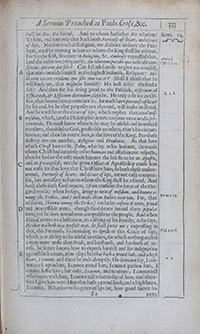 A Sermon Preached at Pauls Cross, &c.
333
Serm.24.
A Sermon Preached at Pauls Cross, &c.
333
Serm.24.
shall be His, His friend. And to whom hath that His relation?
To him, and him only that hath both Pureness of heart, and Grace
of lips. Neither truth in Religion, nor abilities to serve the Pub-
lique, must be wanting in him to whom the King shall be a friend.
For for the first, sincerity in Religion, St. Ambrose expressed that,Ambros.
Offic. l. 2.22.
(and the other too) elegantly; An idoneum putabo qui mihi det con-
silium, qui non dat sibi? Can I think him fit to give me counsel,
that mis-counsels himself in the highest business, Religion? Mi-
hi eum vacare credam, qui sibi non vacat? Shall I think that he
will study me, that neglects himself? His best self? the soul it
self? And then for his doing good to the Publick,L. 1. 8. Officium ab
Efficiendo, & Efficium dicendum, says he. He only is fit for an Of-
fice, that knows how to execute it; he must have pureness of heart
for his end; for he that proposes not that end, will make an ill end.
And he must have this Grace of lips, which implies that civil-wis-
wisdom, which, (as the Philosopher notes) versatur circa media per-
veniendi; He must know wherein he may be useful and beneficial
to others, thankful to God, profitable to others; that's his circum-
ference; and then his centre here, is the love of the King. For these
destroy not one another, Religion and Prudence. As that love
which Christ bare to St. John, who lay in his bosome, (towards
whom Christ had certainly other humane and affectionate respects,
then he had to the rest) made him not the less fit to be an Apostle,
and an Evangelist; nor the great Office of Apostleship made him
not unfit for that love that Christ bare him; so both these endow-
ments, Pureness of heart, and Grace of lips, are not only compati-
ble, but necessary to him to whom the King shall be a friend. And
both these doth God require, (if we consider the force of the Ori-
ginal words) when he says, Bring ye men of wisdom, and known a-
mong the Tribes, and I will make them Rulers over you. For,Deut 1.13. that
addition, (known among the Tribes) excludes reserv'd men, proud
and inaccessible men; though God do not intend there popular
men, yet he does intend men acceptable to the people. And when
David comes to a lustration, to a sifting of his Family, as he says,
He that walketh in a perfect way, he shall serve me; expressing in
that, this Pureness; so intending to speak of this Grace of lips,Psal. 101.6.
which is an ability to be useful to others, for which nothing makes
a man more unfit then Pride, and harshness, and hardness of ac-
cess, he scarce knows how to express himself and his indignation
against such a man; Him (says he) that hath a proud look, and a high
heart, I cannot; and there he ends abruptly; He does not say,v. 5. I can-
not work upon him, I cannot mend him, I cannot pardon him, I
cannot suffer him; but only, I cannot, and no more; I cannot tell
what to do with him, I cannot tell what to say of him; and there-
fore I give him over: Him that hath a proud look, and a high heart,
I cannot. Whatsoever his grace of lips be, how good soever his Zz
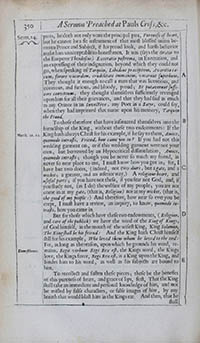 A Sermon Preached at Pauls Cross, &c.
350
Serm.24.
A Sermon Preached at Pauls Cross, &c.
350
Serm.24.
parts, he doth not only want the principal part, Pureness of heart,
but he cannot be a fit instrument of that most blessed union be-
tween Prince and Subject, if his proud look, and harsh behavior
make him unacceptable to honest men. It was (says the Orator to
the Emperor Theodosius) Execratio postrema, an Execration, and
an expressing of their indignation, beyond which they could not
go, when speaking of Tarquin, Libidine præcipitem, Avaritia cæ-
cum, furore væcordem, crudelitate immanem, vocarunt superbum,
They thought it enough to call a man that was licentious, and
covetous, and furious, and bloody, proud; Et putaverunt suffi-
cere convitium, they thought themselves sufficiently revenged
upon him for all their grievances, and that they had said as much
as any Orator in an Invective, any Poet in a Satyr, could say,
when they had imprinted that name upon his memory, Tarquin
the Proud. To those therefore that have insinuated themselves into the
friendship of the King, without these two endowments: If the
King hath always Christ for his example,Matth. 22.12. if he say to them, Amice,
quomodo intrasti, Friend, how came you in? If you had not this
wedding garment on, or if this wedding garment were not your
own, but borrowed by an Hypocritical dissimulation, Amice,
quomodo intrasti; though you be never so much my friend, in
never so near place to me, I must know how you got in; for, I
have but two doors, (indeed, not two doors, but a gate, and a
wicket; a greater, and an inferior way.) A religious heart, and
useful parts; if you have not these, if you fear not God, and, if
you study not, (as I do) the welfare of my people; you are not
come in at my gate, (that is, Religion) nor at my wicket, (that is,
the good of my people:) And therefore, how near so ever you be
crept, I must have a review, an inquiry, to know, quomodo in-
trasti, how you came in. But for those which have these two endowments, (Religion,
and care of the publick) we have the word of the King of Kings,
of God himself, in the mouth of the wisest King, King Solomon,
The King shall be his friend: And the King hath Christ himself
still for his example, Who loved them whom he loved to the end:
For, as long as the reason, upon which he grounds his word, re-
mains,Demosthenes. Regis verbum Regi Rex est, the Kings word, the Kings
love, the Kings favor, Regi Rex est, is a King upon the King, and
bindes him to his word, as well as his subjects are bound to him. To recollect and fasten these pieces; these be the benefits
of this pureness of heart, and grace of lips, first, That the King
shall take an immediate and personal knowledge of him, and not
be misled by false characters, or false images of him, by any
breath that would blast him in the Kings ear. And then, that he
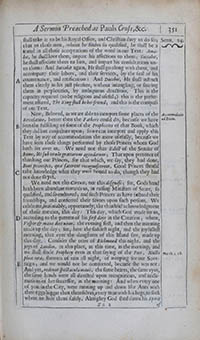 A Sermon Preached at Pauls Cross, &c.
351
Serm.24.
A Sermon Preached at Pauls Cross, &c.
351
Serm.24.
shall take it to be his Royal Office, and Christian duty to do so;
that to those men, whom he findes so qualified, he shall be a
friend in all those acceptations of the word in our Text: Ama-
bit, he shall love them, impart his affections to them; Sociabit,
he shall associate them to him, and impart his consultations un-
to them: And Sociabit again, He shall go along with them, and
accompany their labors, and their services, by the seal of his
countenance, and ratification: And Docebit, He shall instruct
them clearly in his just pleasure, without intangling, or snaring
them in perplexities, by ambiguous directions. This is the
capacity required (to be religious and useful;) this is the prefer-
ment assured, The King shall be his friend; and this is the compass
of our Text. Now, Beloved, as we are able to interpret some places of the
Revelation, better then the Fathers could do,Accommodatio
ad Diem. because we have
seen the fulfilling of some of the Prophecies of that Book, which
they did but conjecture upon; so we can interpret and apply this
Text by way of accommodation the more usefully, because we
have seen these things performed by those Princes whom God
hath set over us. We need not that Edict of the Senate of
Rome, Ut sub titulo gratiarum agendarum; That upon pretence of
thanking our Princes, for that which, we say, they had done,
Boni principes, quæ facerent recognoscerent, Good Princes should
take knowledge what they were bound to do, though they had
not done so yet. We need not this Circuit, nor this disguise; for, Gods hand
hath been abundant towards us, in raising Ministers of State, so
qualified, and so endowed; and such Princes as have fastned their
friendships, and conferred their favors upon such persons. We
celebrate, seasonably, opportunely, the thankful acknowledgment
of these mercies, this day: This day, which God made for us,
according to the pattern of his first days in the Creation; where,
Vesper & mane dies unus, the evening first, and then the morning
made up the day; for, here the saddest night, and the joyfullest
morning, that ever the daughters of this Island saw, made up
this day. Consider the tears of Richmond this night, and the
joys of London, at this place, at this time, in the morning; and
we shall finde Prophecy even in that saying of the Poet, Nocte
pluit tota, showers of rain all night, of weeping for our Sove-
raign; and we would not be comforted, because she was not:Matth. 2.18.
And yet, redeunt spectacula manè, the same hearts, the same eyes,
the same hands were all directed upon recognitions, and accla-
mations of her successor, in the morning: And when every one
of you in the City were running up and down like Ants with
their eggs bigger then themselves, every man with his bags, to seek
where to hide them safely, Almighty God shed down his Spirit
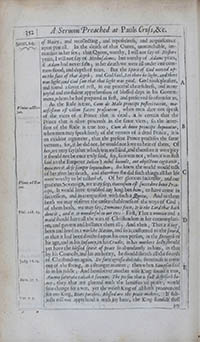 A Sermon Preached at Pauls Cross, &c.
352
Serm.24.
A Sermon Preached at Pauls Cross, &c.
352
Serm.24.
Serm. 24. of Unity, and recollecting, and reposedness, and acquiescence,
upon you all. In the death of that Queen, unmatchable, im-
mitable in her sex; that Queen, worthy, I will not say of Nestors
years, I will not say of Methusalems, but worthy of Adams years,
if Adam had never faln; in her death we were all under one com-
mon flood, and depth of tears. But the Spirit of God moved up-
on the face of that depth; and God said, Let there be light, and there
was light, and God saw that that light was good. God took pleasure,
and found a savor of rest, in our peaceful chearfulness, and in our
joyful and confident apprehension of blessed days in his Govern-
ment, whom he had prepared at first, and preserved so often for us. Plinius ad Tra-
jan.As the Rule is true, Cum de Malo principe posteri tacent, ma-
nifestum est vilem facere præsentem, when men dare not speak
of the vices of a Prince that is dead, it is certain that the
Prince that is alive proceeds in the same vices; so the inver-
sion of the Rule is true too, Cum de bono principe loquuntur,
when men may speak freely of the vertues of a dead Prince, it is
an evident argument, that the present Prince practises the same
vertues; for, if he did not, he would not love to hear of them. Of
her, we may say (that which was well said, and therefore it were pity
it should not be once truly said, for, so it was not, when it was first
said to the Emperor Iulian) nihil humile, aut abjectum cogitavit,
quia novit de se semper loquendum; she knew the world would talk
of her after her death, and therefore she did such things all her life
were worthy to be talked of. Of her glorious successor, and our
gracious Soveraign,Plinus ad Tra-
jan. we may say; Onerosum est succedere bono Prin-
cipi, It would have troubled any king but him, to have come in
succession, and in comparison with such a Queen. And in them
both we may observe the unsearchableness of the ways of God;
of them both, we may say, Dominus fecit, It is the Lord that hath
done it,Psal. 118.23. and it is wonderful in our eyes: First, That a woman and a
maid should have all the wars of Christendom in her contemplati-
on, and govern and ballance them all; And then, That a King,
born and bred in a warlike Nation, and so accustomed to the sword,
as that it had been directed upon his own person, in the strength of
his age, and in his Infancy, in his Cradle, in his mothers belly, should
yet have the blessed spirit of peace so abundantly in him, as that
by his Councils, and his authority, he should sheath all the swords
of Christendom again. De forti egressa dulcedo, sweetness is come
out of the strong,Judg. 14.24. in a stranger manner, then when Sampson said
so in his riddle; And howsoever another wise King found it true,
Anima saturata calcab it favum, The person that is full despiseth ho-
ney,Prov. 27.7. they that are glutted with the benefits of peace, would
fain change for a war; yet the wisest King of all hath pronounced
for our King,Mat. 5.9. Beati pacifici, Blessed are the peace-makers. If sub-
jects will not apprehend it with joy here, the King himself shall
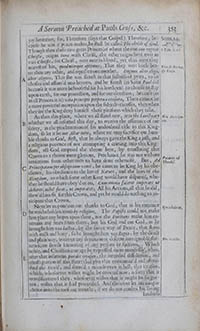 A Sermon Preached at Pauls Cross, &c.
353
Serm.24.
A Sermon Preached at Pauls Cross, &c.
353
Serm.24.
joy hereafter, for, Therefore (says that Gospel) Therefore, be-
cause he was a peace-maker, he shall be called The childe of God.2 Tim. 2.12.
Though then these two great Princes (of whom the one con-regnat
Christo, reigns now with Christ, the other reigns here over us
vice Christi, for Christ, were near in blood, yet thus were they
Plin. de Nerva,
& Traja.nearest of kin, quod uterque optimus, That they were both bet-
ter then any other, and equal to one another. Dignus alter eligi,
alter eligere, That she was fittest in that fullness of years, to be
chosen and assum'd into heaven; and he fittest (as Saint Paul did
because it was more behoofeful for his brethren) to choose to stay
upon earth, for our protection, and for our direction; because
(as in all Princes it is) vita principis perpetua censura, There cannot be
a more powerful increpation upon the subjects excesses, then when
they see the King deny himself those pleasures which they take. As then this place, where we all stand now,Non Anticipa-
vit. was the Sanctuary
whither we all resorted this day, to receive the assurance of our
safety, in the proclamation of his undoubted title to this King-
dom, so let it be our Altar now, where we may sacrifice our hum-
ble thanks to God, first, that he always gave the King a just, and
a religious patience of not attempting a coming into this King-
dom, till God emptied the throne here, by translating that
Queen to a throne more glorious. Perchance he was not without
tentations from other men to have done otherwise. But,Pacatus ad
Theodos. Ad
Principatum per obsequium venit, he came to be King by his obe-
dience, his obedience to the law of Nature, and the laws of this
Kingdom, to which some other King would have disputed, whe-
ther he should have obey'd or no. Cum omnia faceret imperare ut
deberet, nihil fecit, ut imperaret; All his Actions, all that he did,
shew'd him fit for this Crown, and yet he would do nothing to an-
ticipate that Crown. Next let us pour out our thanks to God,Non adulatus. that in his entrance
he was beholden to no by-religion. The Papists could not make
him place any hopes upon them, nor the Puritans make him en-
tertain any fears from them; but his God and our God, as he
brought him via lactea, by the sweet way of Peace, that flows
with milk and hony, so he brought him via Regia, by the direct
and plain way, without any deviation or descent into ignoble flat-
teries, or servile humoring of any persons or factions.Non occulte. Which
noble, and Christian courage he expressed more manifestly, when,
after that infamous powder treason, the intended dissolution, and
conflagration of this state (that plot that even amaz'd and astoni-
shed the Devil, and seem'd a miracle even in hell, that treason,
which, whosoever wishes might be covered how, is sorry that it
was discovered then, whosoever wishes that it might be forgot-
ten, wishes that it had proceeded; And therefore let our tongue
cleave unto the roof our mouths, if we do not confersconfess his loving
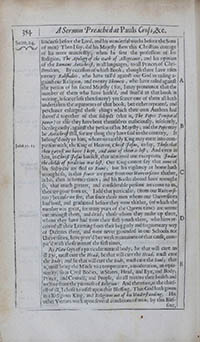 A Sermon Preached at Pauls Cross, &c.
354
Serm.24.
A Sermon Preached at Pauls Cross, &c.
354
Serm.24.
kindness before the Lord, and his wonderful works before the Sons
of men) Then I say, did his Majesty shew this Christian courage
of his more manifestly, when he sent the profession of his
Religion, The Apology of the Oath of Allegeance, and his opinion
of the Romane Antichrist, in all languages, to all Princes of Chri-
stendom. By occasion of which Book, though there have risen
twenty Rabshakes, who have rail'd against our God in railing a-
gainst our Religion, and twenty Shemeis, who have raised against
the person of his sacred Majesty (for, I may pronounce that the
number of them who have bark'd, and snarl'd at that book in
writing, is scarceless then fourty) yet scarce one of them all hath
undertaken the arguments of that book, but either repeated, and
perchance enlarged those things which their own Authors had
shovel'd together of that subject (that is, The Popes Temporal
power) or else they have bent themselves maliciously, insolently,
sacrilegiously, against the person to his Majesty; and the Pope may
be Antichrist still, for any thing they have said to the contrary. It
belong'd only to him, whom no earthly King may enter into com-
parison with,John 17.12. the King of Heaven, Christ Jesus, to say, Those that
thou gavest me have I kept, and none of them is lost; And even in
him, in Christ Jesus himself, that admitted one exception; Judas
the childe of perdition was lost. Our King cannot say that none of
his Subjects are fled to Rome; but his vigilancy at home hath
wrought so, as that fewer are gone from our Universities thither,
in his, then in former times; and his Books abroad have wrought
so, that much greater, and considerable persons are come to us,
then are gone from us. I add that particular, (from our Universi-
ties) because we see, that since those men whom our Universities
had bred, and graduated before they went thither, (of which the
number was great, for many years of the Queens time) are worne
out amongst them, and dead; those whom they make up there,
whom they have had from their first youth there, who have re-
ceived all their Learning from their beggarly and fragmentary way
of Dictates there, and were never grounded in our Schools nor
Universities, have prov'd but weak maintainers or that cause, com-
par'd with those men of the first times. As Plato says of a particular natural body, he that will cure an
ill Eye, must cure the Head; he that will cure the Head, must cure
the Body; and he that will cure the Body, must cure the Soul; that
is, must bring the Minde to a temperature, a moderation, an equa-
nimity; so in Civil Bodies, in States, Head, and Eye, and Body;
Prince, and Council, and People, do all receive their health and
welfare from the pureness of Religion: And therefore, as the chief-
est of all, I chose to insist upon that Blessing, That God hath given
us a Religious King, and Religious out of his Understanding. His
other Vertues work upon several conditions of men; by this Bles-
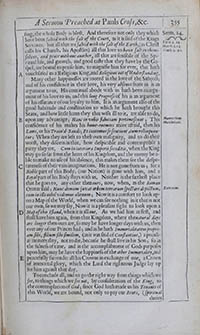 A Sermon Preached at Pauls Cross, &c.
355
Serm.24.
sing, the whole Body is blest. And therefore not only they which
A Sermon Preached at Pauls Cross, &c.
355
Serm.24.
sing, the whole Body is blest. And therefore not only they which
have been salted with the salt of the Court, as it is said of the Kings Ezra 4.24.
Servants; but all that are salted with the salt of the Earth,Matth. 5.13. (as Christ
calls his Church, his Apostles) all that love to Mark 9.50.have salt in them-
selves, and peace with one another, all that are sensible of the Spi-
ritual life, and growth, and good taste that they have by the Go-
spel, are bound to praise him, to magnifie him for ever, that hath
vouchsafed us a Religious King, and Religious out of Understanding. Many other happinesses are rooted in the love of the Subject;
and of his confidence in their love, his very absence from us is an
argument to us. His continual abode with us hath been an argu-
ment of his love to us; and this long Progress of his is an argument
of his assurance of our loyalty to him. It is an argument also of the
good habitude and constitution to which he hath brought this
State, and how little harm they that wish ill to it, are able to do,
upon any advantage; Hanc in vobis fiduciam pertimescunt; This Mamertinus.
Maximiano.
confidence of his makes his home-enemies more afraid, then his
Laws, or his Train'd-Bands; Et contemnise sentiunt, cum relinquun-
tur; When they are left to their own malignity, and to do their
worst, they discern in that, how despicable and contemptible a
party they are. Cum in interiora Imperii seceditis, when the King
may go so far from the heart of his Kingdom, and the enemy be a-
ble to make no use of his absence, this makes them see the despe-
rateness of their vain imaginations. He is not gone from us; for a
Noble part of this Body, (our Nation) is gone with him, and a
Royal part of his Body stays with us. Neither is the farthest place
that he goes to, any other then ours, now, when, as the Roman
Orator said; Nunc demum juvat orbem terrarum spectare depictum,Eumenius.
cum in illo nihil videmus alienum; Now it is a comfort to look up-
on a Map of the World, when we can see nothing in it that is not
our own; so we may say, Now it is a pleasant sight to look upon a
Map of this Island, when it is all one. As we had him at first, and
shall have him again, from that Kingdom, where the natural days
are longer then ours are, so may he have longer days with us, then
ever any of our Princes had; and as he hath Immortalitatem propri-
am sibi, filium sibi similem, (as it was said of Constantine,) a peculi-
ar immortality, not to die, because he shall live in his Son; so in
the fulness of time, and in the accomplishment of Gods purposes
upon him, may he have the happiness of the other Immortality, and
peacefully surrender all his Crowns in exchange of one, a Crown
of immortal glory, which the Lord the righteous Judge lay up
for him against that day. To conclude all, and to go the right way from things which we
see, to things which we see not, by consideration of the King, to
the contemplation of God; since God hath made us his Tenants of
this World, we are bound, not only to pay our Rents, (spiritual
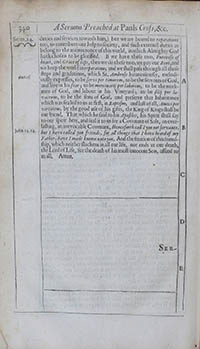 A Sermon Preached at Pauls Cross, &c.
240
Serm.24.
A Sermon Preached at Pauls Cross, &c.
240
Serm.24.
duties and services towards him,) but we are bound to reparations
too, to contribute our help to society, and such external duties as
belong to the maintenance of this world, in which Almighty God
hath chosen to be glorified. If we have these two, Pureness of
heart, and Grace of lips, then we do these two; we pay our Rent, and
we keep the world in reparation; and we shall pass through all those
steps and gradations,Ambros. which St. Ambrose harmoniously, melodi-
ously expresses, to be servi per timorem, to be the servants of God,
and live in his fear; to be mercinarij per laborem, to be the work-
men of God, and labour in his Vineyard; to be filij per la-
vacrum, to be the sons of God, and preserve that Inheritance
which was sealed to us at first, in Baptism; and last of all, Amici per
virtutem, by the good use of his gifts, the King of Kings shall be
our friend. That which he said to his Apostles, his Spirit shall say
to our spirit here, and seal it to us for a Covenant of Salt, an ever-
lasting,John 15.14. an irrevocable Covenant, Henceforth call I you not servants,
but I have called you friends, for all things that I have heard of my
Father, have I made known unto you. And the fruition of this friend-
ship, which neither slackens in all our life, nor ends at our death,
the Lord of Life, for the death of his most innocent Son, afford to
us all. Amen.
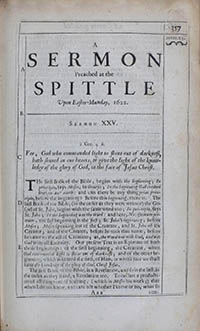 357
Serm.25.
A
357
Serm.25.
A Sermon
Preached at the
Spittle
Upon Easter-Munday, 1662.
Sermon XXV. 2 Cor. 4.6.
For, God who commanded light to shine out of darkness,
hath shined in our hearts, to give the light of the know-
ledge of the glory of God, in the face of Jesus Christ. THeThe first Book of the Bible, begins with the beginning; In
principio, says Moses, in Genesis; In the beginning God created
heaven and earth: and can there be any thing prius prin-
cipio, before the beginning? Before this beginning, there is. The
last Book of the Bible, (in the order as they were written) the Go-
spel of St. John, begins with the same word too; In principio, says
St. John; In the beginning was the Word: and here, Novissimum pri-
mum, the last beginning is the first; St. John's beginning, before
Moses; Moses speaking but of the Creature, and St. John of the
Creator; and of the Creator, before he took that name, before
he came to the act of Creation; as, the Word was with God, and was
God from all Eternity. Our present Text is an Epitome of both
those beginnings: of the first beginning, the Creation, when
God commanded light to shine out of darkness; and of the other be-
ginning, which is indeed the first, of Him, in whose face we shall
have the knowledge of the glory of God, Christ Jesus. The first Book of the Bible, is a Revelation, and so is the last, in
the order as they stand, a Revelation too. To declare a producti-
on of all things out of nothing, (which is Moses his work;) that
when I do not know, and care not whether I know or no, what so Aaa
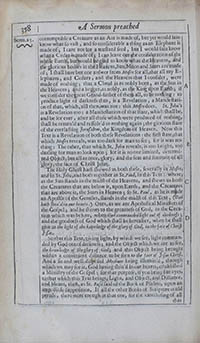 A Sermon preached
358
Serm.25.
A Sermon preached
358
Serm.25.
contemptible a Creature as an Ant is made of, but yet would fain
know what so vast, and so considerable a thing as an Elephant is
made of; I care not for a mustard seed, but I would fain know
what a Cedar is made of; I can leave out the consideration of the
whole Earth, but would be glad to know what the Heavens, and
the glorious bodies in the Heavens, Sun, Moon and Stars are made
of; I shall have but one answer from Moses for all, that all my E-
lephants, and Cedars, and the Heavens that I consider, were
made of nothing; that a Cloud is as nobly born, as the Sun in
the Heavens; and a begger, as nobly, as the King upon Earth; if
we consider the great Grand-father of them all, to be nothing: to
produce light of darkness thus, is a Revelation, a Manifestati-
on of that, which, till then, was not: this Moses does. St. John's
is a Revelation too: a Manifestation of that state, which shall be,
and be for ever, after all those which were produced of nothing,
shall be return'd and ressolv'd to nothing again; the glorious state
of the everlasting Jerusalem, the Kingdom of Heaven. Now this
Text is a Revelation of both these Revelations: the first state, that
which Moses reveals, was too dark for man to see; for it was no-
thing: The other, that which St. John reveals, is too bright, too
dazling for man to look upon; for it is no one limited, determi-
ned Object, but all at once, glory, and the seat and fountain of all
glory, the face of Christ Jesus. The Holy Ghost hath shewed us both these, severally in Moses,
and in St. John, and both together in St. Paul, in this Text: where,
as the Sun stands in the midst of the Heavens, and shews us both
the Creatures that are below it, upon Earth, and the Creatures
that are above it, the Stars in Heaven; so St. Paul, as he is made
an Apostle of the Gentiles, stands in the midst of this Text, (God
hath shin'd in our hearts:) Ours, as we are Apostolical Ministers of
the Gospel; and he shows us the greatness of God, in the Crea-
tion which was before, when God commanded light out of darkness;
and the goodness of God which shall be hereafter, when he shall
give us the light of the knowledge of the glory of God, in the face of Christ
Jesus. So that this Text, giving light, by which we see, light comman-
ded by God out of darkness; and the Object which we are to see,
the knowledge of the glory of God; and this Object being brought
within a convenient distance to be seen in the face of Jesus Christ.
And a fit and well-disposed Medium being illumin'd, through
which we may see it, God having shin'd in our hearts, established
a Ministry of the Gospel: for that purpose, if you bring but eyes,
to that which this Text brings, Light, and Object, and Distance,
and Means, then, as St. Basil said of the Book of Psalms, upon an
impossible supposition, If all the other Books of Scripture could
perish, there were enough in that one, for the catechising of all
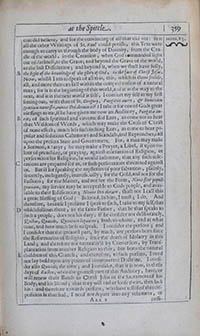 at the Spittle.
359
Serm.25.
at the Spittle.
359
Serm.25.
that did believe, and for the convincing of all that did not: so if
all the other Writings of St. Paul could perish, this Text were
enough to carry us through the body of Divinity, from the Cra-
dle of the world, in the Creation, when God commanded light
out of darkness, to the Grave; and beyond the Grave of the world,
to the last Dissolution; and beyond it, when we shall have fully,
the light of the knowledge of the glory of God, in the face of Christ Jesus.
Now, whilst I am to speak of all this, this, which is Omne scibile,
all, and more then can fall within the comprehension of a natural
man; for it is the beginning of this world, and it is the way to the
next, and it is the next world it self, I comfort my self at my first
setting out, with that of St. Gregory, Purgatas aures, & hominum
gratiam nancisci, nonne Dei donum est? I take it for one of Gods great
blessings to me, if he have given me now an Auditory, Purgatæ au-
ris, of such spiritual and circumcised Ears, as come not to hear
that Wisdom of Words, which may make the Cross of Christ
of none effect; much less such itching Ears, as come to hear po-
pular and seditious Calumnies and Scandals, and Reproaches, cast
upon the present State and Government. For, a man may make
a Sermon, a Satyr; he may make a Prayer, a Libel, if upon co-
lour of preaching, or praying, against toleration of Religion, or
persecution for Religion, he would insinuate, that any such tole-
rations are prepared for us, or such persecutions threatned against
us. But if for speaking the mysteries of your salvation, plainly,
sincerely, inelegantly, inartificially; for the Gold, and not for the
Fashion; for the Matter, and not for the Form, Nanciscor populi
gratiam, my service may be acceptable to Gods people, and avai-
lable to their Edification; Nonne Dei donum, shall not I call this
a great Blessing of God? Beloved, in him, I must; I do. And
therefore, because I presume I speak to such, I take to my self, that
which follows there, in the same Father, that he that speaks to
such a people, does not his duty, if he consider not deliberately,
Quibus, Quando, Quantum loquatur; both to whom, and at what
time, and how much he is to speak. I consider the persons; and
I consider that the greatest part, by much, are persons born since
the Reformation of Religion, since the death of Idolatry in this
Land; and therefore not naturaliz'd by Conversion, by Trans-
plantation from another Religion to this, but born the natural
children of this Church; and therefore, to such persons, I need
not lay hold upon any points of controverted Doctrine. I consi-
der also Quando, the time; and I consider, that it is now, in these
days of Easter, when the greatest part of this Auditory, have, or
will renew their Bands to Christ Jesus in the Sacrament of his
Body, and his Blood; that they will rather loose theirs, then lack
his: and therefore towards persons, who have testified that dis-
position in that seal, I need not depart into any vehement, or
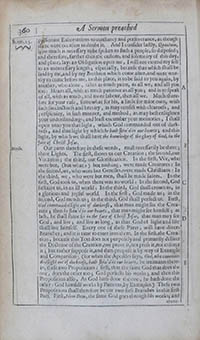 A Sermon preached
360
Serm.25.
A Sermon preached
360
Serm.25.
passionate Exhortations to constancy and perseverance, as though
there were occasion to doubt it. And I consider lastly, Quantum,
how much is necessary to be spoken to such a people, so disposed;
and therefore, farther then the custom, and solemnity of this day,
and place, lays an Obligation upon me, I will not extend my self
to an unnecessary length; especially, because that which shall be
said by me, and by my Brethren which come after, and were wor-
thy to come before me, in this place, is to be said to you again, by
another, who alone, takes as much pains, as all we, and all you
too: Hears all, with as much patience as all you; and is to speak
of all, with as much, and more labour, then all we. Much there-
fore for your ease, somewhat for his, a little for mine own, with
such succinctness and brevity, as may consist with clearness, and
perspicuity, in such manner, and method, as may best enlighten
your understandings, and least encumber your memories, I shall
open unto you that light, which God commanded out of dark-
ness, and that light by which he hath shin'd in our hearts; and this
light, by which we shall have the knowledge of the glory of God, in the
face of Christ Jesus. Divisio.Our parts therefore in these words, must necessarily be three; three
Lights. The first, shows us our Creation; the second, our
Vocation; the third, our Glorification. In the first, We, who
were but, (but what?) but nothing, were made Creatures: In
the second, we, who were but Gentiles, were made Christians: In
the third, we, who were but men, shall be made saints. In the
first, God took us, when there was no world: In the second, God
sustains us, in an ill world: In the third, God shall crown us, in
a glorious and joyful world. In the first, God made us; in the
second, God mends us; in the third, God shall perfect us. First,
God commanded light out of darkness, that man might see the Crea-
ture; then he shin'd in our hearts, that man might see himself; at
last, he shall shine so in the face of Christ Jesus, that man may see
God, and live; and live as long, as that God of light and life
shall live himself. Every one of these Parts, will have divers
Branches; and it is time to enter into them. In the first, the Crea-
tion, because this Text does not purposely and primarily deliver
the Doctrine of the Creation, not prove it, not press it, not enforce
it; but rather suppose it, and then propose it by way of Example
and Comparison; (for when the Apostles says, God, who comman-
ded light out of darkness, hath shin'd in our hearts, he intimates there-
in, these two Propositions: first, that the same God that does the
one, does the other too; God perfects his works; and then this
Proposition also, As God hath done the one, he hath done the
other: God himself works by Patterns, by Examples.) These two
Propositions shall therefore be our two first Branches in this first
Part. First, Idem Deus, the same God goes through his works; and
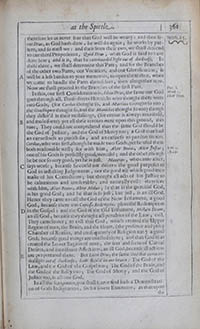 at the Spittle.
361
Serm.25.
at the Spittle.
361
Serm.25.
therefore let us never fear that God will be weary: and then Si-
cut Deus, as God hath done, he will do again; he works by pat-
tern, and so must we: and then from these two, we shall descend
to our third Proposition, Quid Deus, what God is said to have
done here; and it is, that he commanded light out of darkness. In
these three, we shall determine this Part; and for the Branches
of the other two Parts, our Vocation, and our Glorification, it
will be a less burden to your memories, to open them then, when
we come to handle the Parts themselves, then altogether now.
Now we shall proceed in the Branches of the first Part. Part 1.
Memb. 1.
Idem Deus.In this, our first Consideration is, Idem Deus, the same our God
goes through all. Those divers Hereticks who thought there were
two Gods, (for Cordon thought so, and Marcion thought so too;
the Gnostiques thought so, and the Maniches thought so too) though
they differ'd in their mistakings, (for errour is always manifold,
and multiform) yet all their errours were upon this ground, this
root, They could not comprehend that the same God should be
the God of Justice, and the God of Mercy too; a God that had
an earnestness to punish sin, and an easiness to pardon sin too.
Cordon, who was first, though he made two Gods, yet he used them
both reasonable well; for with him, Alter Bonus, Alter Justus;
Iren. 1.
28.29. one of his Gods is perfectly good, merciful; and the other, though
he be not so very good, yet he is just. Marcion, who came after,
says worse; because he could not discern the good purposes of
God in inflicting Judgements, nor the good use which good men
make of his Corrections; but thought all acts of his Justice to
be calamitous and intolerable, and naturally evil: therefore
with him, Alter Bonus, Alter Malus; he that is the merciful God,
is his good God; and he that is so just, but just, is an ill God.
Hence they came to call the God of the New Testament, a good
God, because there was Copiosa Redemptio, plentiful Redemption
in the Gospel: and the God of the Old Testament, Malum Deum,
an ill God, because they thought all penalties of the Law, evil.
They came lower; to call that God, which created the Upper
Region of man, the Brain, and the Heart, (the presence and privy
Chamber of Reason, and consequently of Religion too) a good
God, because good things are enacted there; and that God that
created the Lower Region of man, the seat and scene of Carnal
Desires, and inordinate Affections, an ill God, because ill actions
are perpetrated there. But Idem Deus, the same God that comman-
ded light out of darkness, hath shin'd in our hearts: The God of the
Law, and the God of the Gospel too; The God of the Brain, and
the God of the Belly too; The God of Mercy, and the God of
Justice too, is all one God. In all the Scriptures, you shall scarce find such a Demonstrati-
on of Gods Indignation, such a severe Execution, as that upon
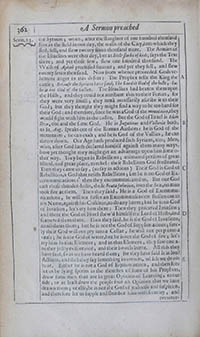 A Sermon preached
362
Serm.25.
A Sermon preached
362
Serm.25.
the Syrians; when, after the slaughter of one hundred thousand
foot in the field in one day, the walls of the City, into which they
fled, fell, and slew twenty seven thousand more. The Armies of
the Israelites were that day, but as little flocks of kids, says the Text
there; and yet those few, slew one hundred thousand. The
Walls of Aphak promised succour; and yet they fell, and slew
twenty seven thousand. Now from whence proceeded Gods ve-
hement anger in this defeat? The Prophet tells the King the
cause; Because the Syrians have said, The Lord is God of the hills, but
he is not God of the vallies. The Israelites had beaten them upon
the Hills, and they could not attribute this to their Forces, for
they were very small; they must necessarily ascribe it to their
God; but they thought they might find a way to be too hard for
their God: and therefore, since he was a God of the mountains, they
would fight with him in the vallies. But the God of Israel is Idem
Deus, one and the same God. He is Jugatinus and Vallonia both,
as St. Aug. speaks out of the Roman Authors: he is God of the
mountains, he can exalt; and he is God of the Vallies, he can
throw down. Our Age hath produced such Syrians, too; Men,
who, after God hath declared himself against them many ways,
have yet thought they might get an advantage upon him some o-
ther way. They begun in Rebellions; animated persons of great
blood, and great place, to rebel: their Rebellions God frustrated.
Then they came to say, (to say in actions) Their God is God of
Rebellions, a God that resists Rebellions; but he is no God of Ex-
communications: then they excommunicated us. But our God
cast those thunder-bolts, those Bruta fulmina, into the Sea, no man
took fire at them. Then they said, He is a God of Excommu-
nications, he will not suffer an Excommunication stollen out in
his Name, against his Children, to do any harm; but he is no God
of Invasion, let's try him there: Then they procured Invasion;
and there the God of Israel shew'd himself the Lord of Hosts, and
scattered them there. Then they said, he is the God of Invasions,
annihilates them; but he is not the God of Supplantations; sure-
ly their God will not pry into a Cellar, he will not peep into a
vault; he is the God of water, but he is not the God of fire; let's
try him in that Element; and in that Element, they saw one a-
nother justly eviscorated, and their bowels burnt. All this they
have said, so as we have heard them; for they have said it in loud
Actions, and still they say something in corners, which we do not
hear. Either he is not a God of Equivocations, and therefore
let us be lying spirits in the mouthes of some of his Prophets,
draw some men that are in great Opinion of Learning, to our
side, or at least draw the people into an Opinion that we have
drawn them; or else, he is not the God of jealousie and suspition,
and therefore let us supple and slumber him with security, and
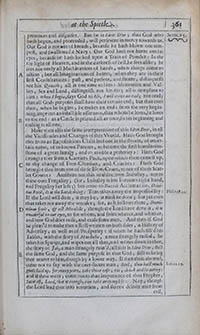 at the Spittle.
261
Serm.25.
at the Spittle.
261
Serm.25.
pretences and disguises. But he is Idem Deus; that God who
hath begun, and proceeded, will persevere in mercy towards us.
Our God is not out of breath, because he hath blown one tem-
pest, and swallowed a Navy: Our God hath not burnt out his
eyes, because he hath looked upon a Train of Powder: In the thethe
light of Heaven, and in the darkness of hell, he sees alike; he
sees not onely all Machinations of hands, when things come to
action; but all Imaginations of hearts, when they are in their
first Consultations: past, and present, and future, distinguish
not his Quando; all is one time to him: Mountains and Val-
lies, Sea and Land, distinguish not his Ubi; all is one place to
him: When I begin, says God to Eli, I will make an end; not onely
that all Gods purposes shall have their certain end, but that even
then, when he begins, he makes an end: from the very begin-
ning, imprints an infallible assurance, that whom he loves, he loves
to the end: as a Circle is printed all at once, so his beginning and
ending is all one. Make thou also the same interpretation of this Idem Deus, in all
the Vicissitudes and Changes of this World. Hath God brought
thee from an Exposititious Child laid out in the streets, of uncer-
tain name, of unknown Parents, to become the first foundation-
stone of a great family, and to enoble a posterity? Hath God
brought thee from a Carriers Pack, upon which thou camest up,
to thy change of Foot-Cloathes, and Coaches? Hath God
brought thee from one of these Blew-Coats, to one of those Scar-
let Gowns? Attribute not this to thine own Industry, nor to
thine own Frugality; (for, Industry is but Fortunes right hand,
and Frugality her left;) but come to Davids Acclamation, Domi-
nus Fecit, It is the Lords doing: That takes away the impossibility:
Psal. 118.22. If the Lord will do it, it may be, it must be done; but yet even
that takes not away the wonder; for, as it follows there, Domi-
minus fecit, & est Mirabile, though the Lord have done it, it is
wonderful in our eyes, to see whom, and from whence, and whither,
and how God does raise, and exalt some men. And then if God
be pleas'd to make thee a Roll written on both sides, a History of
Adversity, as well as of Prosperity: if when he hath fill'd his
Tables, with the story of Mardoche, a man strangely raised, he
takes his Spunge, and wipes out all that, and writes down in thee,
the story of Job, a man strangely ruin'd, all this is Idem Deus, still
the same God, and the same purpose in that God, still to bring
thee nearer to him, though by a lower way. If then thou abound,
Luk. 12.19. come not to say with the over-secure man, Soul, thou hast much
goods laid up, for many years, take thine ease, eat, drink and be merry:
and if thou want, come not to that impatience of that Prophet,
Satis est, Lord, this is enough, now take away my life: Nay, though
the Lord lead thee into tentation, and do not deliver thee from
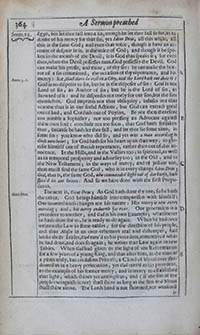 A Sermon preached
364
Serm.25.
A Sermon preached
364
Serm.25.
Egypt, but let thee fall into a sin, though he let thee fall so far, as to
doubt of his mercy for that sin, yet Idem Deus, all this while, all
this is the same God; and even that voice, though it have an ac-
count of despair in it, is the voice of God; and though it be spo-
ken in the mouth of the Devil, it is God that speaks it; for even
then, when the Devil possesses man, God possesses the Devil. God
can make his profit, and thine, of thy sin: he can make the hor-
ror of a sin committed, the occasion of thy repentance, and his
mercy:Amos 3.6. for, Shall there be evil in a City, and the Lord hath not done it?
God is no disposer to sin, but he is the disposer of sin: God is not
Lord of sin, as Author of sin; but he is the Lord of sin, as
Steward of it: and he dispenses not onely for our sins, but the sins
themselves. God imprints not that obliquity, infuses not that
venome that is in our sinful Actions, but God can extract good
out of bad, and Cordials out of Poyson. Be not thou therefore
too nimble a Sophister, nor too pressing an Advocate against
thine own soul: conclude not too soon, that God hath forsaken
thee, because he hath let thee fall, and let thee lie some time, in
some sin: you know who did so, and yet was a man according to
Gods own heart; for God hath set his heart upon that way, to glo-
rifie himself out of Davids repentance, rather then out of his in-
nocence. In the Hills, and in the Vallies too; in spiritual, as well
as in temporal prosperity and adversity too; in the Old, and in
the New Testament; in the ways of mercy, and of justieejustice too,
thou maist find the same God, who is in every change Idem Deus;
God, that is, the same God, who commanded light out of darkness, hath
shin'd in our hearts: And so we have done with the first Propo-
sition. Sicut Deus.The next is, Sicut Deus; As God hath done the one, so he hath
the other. God brings himself into comparison with himself:
Our unworthiness changes not his nature: His mercy is new every
morning; and, his mercy endureth for ever. One generation is a
precedent to another, and God is his own Example; whatsoever
he hath done for us, he is ready to do again. When he had once
written the Law in stone-tables, for the direction of his people,
and that Moses in an over-vehement zeal and distemper, had
broke those Tables, God turn'd to his precedent, remembred what
he had done, and does so again; he writes that Law again in new
Tables. When God had given us the light of the Reformation
for a few years of a young King, and that after him, in the time of
a pious truly, but credulous Princess, a Cloud of blood over-sha-
dowed us in a heavy persecution, yet God turn'd to his precedent,
to the example of his former mercy, and in mercy re-established
that light, which shines yet amongst us; and (if the sins of the
people extinguish it not) shall shine as long as the Sun and Moon
shall shine above. The Lords hand is not shortned, nor weakned
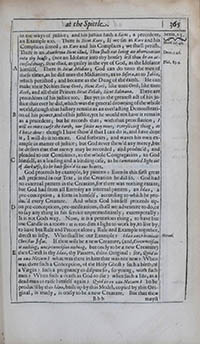 at the Spittle.
365
Serm.25.
at the Spittle.
365
Serm.25.
in the ways of justice; and his justice hath a Sicut, a precedent,
an Example too. There is Sicut Kore, If we sin as Kore and his
Complices sinned, as Kore and his Complices, we shall perish.
Num. 16.40. There is an Anathema Sicut illud, Thou shalt not bring an abomination
into thy houseDeut. 7.26., (not an Idolator into thy house) lest thou be an ac-
cursed thing, Sicut illud, as guilty in the eye of God,Psal. 83.9. as the Idolator
himself. There is Sicut Midian; God can do unto the men of
these times, as he did unto the Midianites, as to Sisera, as to Jabin,
which perished, and became as the Dung of the earth. He can
make their Nobles Sicut Oreb, Sicut Zeeb, like unto Oreb, like unto
Zeeb, and all their Princes Sicut Zebah, Sicut Salmana. There are
precedents of his justice too. But yet in the greatest act of his ju-
stice that ever he did, which was the general drowning of the whole
world, though that history remain as an everlasting Demonstrati-
on of his power, and of his justice, yet he would not have it remain
as a precedent; but he records that, with that protestation, I
will no more curse the earth, nor smite any more, every living thing, as
I have done: though I have show'd that I can do it, and have done
it, I will do it no more. God forbears, and waves his own ex-
ample in matter of justice; but God never shew'd any mercy, but
he desires that that mercy may be recorded, and produc'd, and
pleaded to our Conscience, to the whole Congregation, to God
himself, as a leading and a binding case, as he commanded light out
of darkness, so he hath shin'd in our hearts. God proceeds by example, by pattern: Even in this first great
act presented in our Text, in the Creation he did so. God had
no external pattern in the Creation, for there was nothing extant;
but God had from all Eternity an internal pattern, an Idæa, a
pre-conception, a form in himself, according to which he pro-
duc'd every Creature. And when God himself proceeds up-
on pre-conceptions, pre-meditations, shall we adventure to do, or
to say any thing in his service unpremeditately, extemporally?
It is not Gods way. Now, it is a penurious thing, to have but
one Candle in a room: it is too dim a light to work by, to live by,
to have but Rule and Precept alone; Rule and Example together,
direct us fully. Who shall be our Example?Hierom. Idæa novi hominis
Christus Jesus. If thou wilt be a new Creature, (and, Circumcision
is nothing, uncircumcision nothing, but onely to be a new Creature)
then Christ is thy Idæa, thy Pattern, thine Original: for, Quid in
eo non Novum? what was there in him that was not new? When
was there such a Conception, of the Holy Ghost? such a birth, of
a Virgin? such a pregnancy to dispute so, so young, with such
men? When such a death as God to die? when such a life, as a
dead man to raise himself again? Quid in eo non Novum? To be
produc'd by this Idæa, built up by this Model, copied by this Ori-
ginal, is truely, is onely to be a new Creature. But that thou Bbb
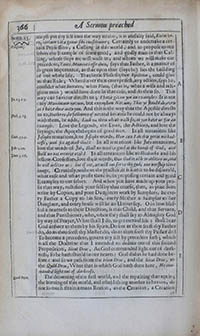 A Sermon preached
366
Serm.25.
A Sermon preached
366
Serm.25.
mayst put thy self into the way to this, it is usefully said, Enim ve-
ro, certum vitæ genus sibi constituere; Certainly to undertake a cer-
tain Profession,Nazianz. a Calling in this world, and to propose to our
selves the Example of some good, and godly man in that Cal-
ling, whose steps we will walk in, and whom we will make our
precedent, Tanti Momenti esse duco, says that Father, is a matter of
so great importance, as that upon that (says he) lies the building
of our whole life. That little Philosopher Epictetus, could give
us that Rule; Whensoever thou enterprisest, any action, says he,
consider what Socrates, what Plato, (that is, what a wise and reli-
gious man) would have done in that case, and do thou so. This
way our Saviour directs us;Ja. 13.15. I have given you an example: It is not
only Mandatum novum, but exemplum Novum, That ye should do, even
as I have done unto you. And this is the way that the Apostle directs
us to,Phil. 3.13. Brethren, be followers of me: and because he could not be always
with them, he adds, Look on them which walk so, as you have us for an
example. Love the Legends, the Lives, the Actions, and love the
sayings, the Apopththegms of good men. In all tentations like
Josephs tentations,Gen. 39.9. love Josephs words, How can I do this great wicked-
ness, and sin against God? In all tentations like Jobs tentations,
love the words of Job,Job 2.10. Shall we receive good at the hands of God, and
shall we not receive evil? In all tentations like to Shidrachs and his
fellow-Confessors,Dan 3.17. love their words, Our God is able to deliver us, and
he will deliver us: but if not, we will not serve thy god, nor worship thine
image. Certainly, without the practise, it is scarce to be discern'd,
what ease and what profit there is, in proposing certain and good
Examples to our selves. And when you have made up your pro-
fit that way, rectified your self by that course, then, as your Sons
write by Copies, and your Daughters work by Samplars, be eve-
ry Father a Copy to his Son, every Mother a Samplar to her
Daughter, and every house will be an University. O in how bles-
sed a nearness to their Direction, is that Child, and that Servant,
and that Parishioner, who, when they shall say to Almighty God,
by way of Prayer, What shall I do, to get eternal life? shall hear
God answer to them by his Spirit, Do but as thou seest thy Father
do, do as thou seest thy Master do, do as thou seest thy Pastor do!
To become a precedent, govern thy self by precedent first; which
is all the Doctrine that I intended to deduce out of this second
Proposition, Sicut Deus, As God commanded light out of dark-
ness, so he hath shin'd in our hearts: God did as he had done be-
fore: and so we pass from the Idem Deus, and the Sicut Deus, to
the Quid Deus, What that is which God hath done here, He com-
manded light out of darkness. Quid Deus.The drowning of the first world, and the repairing that again;
the burning of this world, and establishing another in heaven, do
not so much strain a mans Reason, as the Creation, a Creation
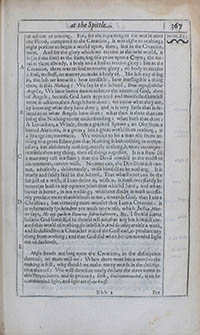 at the Spittle.
367
Serm.25.
at the Spittle.
367
Serm.25.
of all out of nothing. For, for the repairing of the world after
the Flood, compared to the Creation, it was eight to nothing;
eight persons to begin a world upon, then; but in the Creation,
none. And for the glory which we receive in the next world, it
is (in some sort) as the stamping of a print upon a Coyn; the me-
tal is there already, a body and a soul to receive glory: but at the
Creation, there was no soul to receive glory, no body to receive
a soul, no stuff, no matter, to make a body of. The less any thing
is, the less we know it: how invisible, how intelligible a thing
then, is this Nothing! We say in the School, Deus cognoscibilior
Angelis, We have better means to know the nature of God, then
of Angels, because God hath appeared and manifested himself
more in actions, then Angels have done: we know what they are,
by knowing what they have done; and it is very little that is re-
lated to us what Angels have done: what then is there that can
bring this Nothing to our understanding? what hath that done?
A Leviathan, a Whale, from a grain of Spawn; an Oke from a
buried Akehorn, is a great; but a great world from nothing, is
a strange improvement. We wonder to see a man rise from no-
thing to a great Estate; but that Nothing is but nothing in compa-
rison; but absolutely nothing, meerly nothing, is more incompre-
hensible then any thing, then all things together. It is a state (if
a man may call it a state) that the Devil himself in the midst of
his torments, cannot wish. No man can, the Devil himself can-
not, advisedly, deliberately, wish himself to be nothing. It is
truely and safely said in the School, That whatsoever can be the
subject of a wish, if I can desire it, wish it, it must necessarily be
better (at least in my opinion) then that which I have; and what-
soever is better, is not nothing; whithout doubt it must necessa-
rily produce more thankfulness in me, towards God, that I am a
Christian; but certainly more wonder that I am a Creature: it
is vehemently spoken, but yet needs no excuse, which Justin Mar-
ter says, Ne ipsi quidem Domino fidem haberem, &c. I should scarce
believe God himself, if he should tell me, that any but himself cre-
ated this world of nothing; so infallible, and so inseparable a work,
and so distinctive a Character is it of the Godhead, to produce any
thing from nothing; and that God did when he commanded light
out of darkness. Moses stands not long upon the Creation, in the description
thereof; no more will we: When there went but a word to the
making it self, why should we make many words in the descrip-
tion thereof? We will therefore onely declare the three terms in
this Proposition, and so proceed; first, God commanded, then he
commanded light, and light out of darkness.
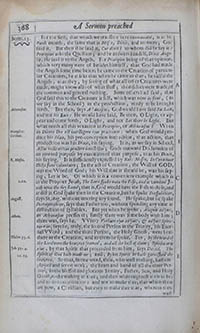 A Sermon preached
368
Serm.25.
A Sermon preached
368
Serm.25.
For the first, that which we translate here commanded, is in St.
Pauls mouth, the same that is Moses, Dixit, and no more; God
said it. But then if he said it, Cui dixit? to whom did he say it?
Procopius asks the Question; and he answers himself, Dixit Ange-
lis, He said it to the Angels. For Procopius being of that opinion,
which very many were of besides himself, that God had made
the Angels some time before he came to the Creation of particu-
lar Creatures, he thinks that when he came to that, he call'd the
Angels, that they, by seeing of what all other Creatures were
made, might know also of what stuff; themselves were made, of
the common and general nothing. Some others had said, that
God said this to the Creature it self, which was now in fieri, (as
we say in the School) in the production, ready to be brought
forth.Athanasius. But then, says Athanasius, God would have said Sis Lux,
and not Sit Lux: He would have said, Be thou, O Light, or ap-
pear and come forth, O Light, and not Let there be Light. But
what needs all this vexation in Procopius, or Athanasius? When
as Dicere Dei est intelligere ejus practicum:Dionysius.
Carthus. when God would pro-
duce his Idæa, his pre-conception into action, that action, that
production was his Dixit, his saying. It is, as we say in School,
Actus indicativus practici intellectus; Gods outward Declaration of
an inward purpose by execution of that purpose, that his Dixit,
his saying.R. Moses. It is sufficiently expressed by Rab: Moses, In Creatione
Dicta sunt voluntates; In the act of Creation, the Will of GOD,
was the Word of God; his Will that it should be, was his say-
ing, Let it be. Of which it is a convenient example which is
in the Prophet Jonah,2.10. The Lord spake unto the Fish, and it vomited Jo-
nah upon the dry Land; that is, God would have the Fish to do it, and
it did it. God spake then in the Creation, but he spake Ineffabiliter,
says St. Aug.August. without uttering any sound. He spake, but he spake
Intemporaliter, says that Father too, without spending any time in
distinction of syllables. But yet when he spoke, Aliquis ad fuit,
as Athanasius presses it;Athan. surely there was some body with him;
there was, says he. VVhoWho? Verbum ejus ad fuit, & ad fuit Spiri-
tus ejus, says he, truly, the second Person in the Trinity, his Eter-
nal VVordWord; and the third Person, the Holy Ghost, were both
there at the Creation, and to them he spoke.Psalm 33.6. For, By the Word of
the Lord were the heavens framed, and all the host of them; Spiritu oris
ejus,Job 33.4. by that Spirit that proceeded from him, says David. The
Spirit of God hath made me;26. 13. and, By his Spirit he hath garnished the
heavens. So that, in one word, thou, who wast nothing, hast em-
ployed and set on work, the heart and hand of all the three Per-
sons, in the blessed and glorious Trinity, Father, Son, and Holy
Ghost, to the making of thee; and then what oughtest thou to be,
and to do in retribution? and not to make thee, that which thou
art now, a Christian, but even to make thee that, wherein thou
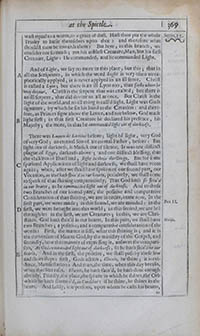 at the Spittle.
369
Serm.25.
at the Spittle.
369
Serm.25.
wast equal to a worm, to a grain of dust. Hast thou put the whole
Trinity to busie themselves upon thee? and therefore what
shouldst thou be towards them? But here, in this branch, we
consider not so much; not his noblest Creature, Man, but his first
Creature, Light: He commanded, and he commanded Light. And of Light, we say no more in this place, but this; that in
all the Scriptures, in which the word Light is very often meta-
phorically applyed, it is never applyed in an ill sence. Christ
is called a Lyon; but there is an ill Lyon too, that seeks whom he
may devour. Christ is the serpent that was exalted; but there is
an ill serpent, that did devour us all at once. But Christ is the
light of the world, and no ill thing is call'd light. Light was Gods
signature, by which he set his hand to the Creation: and there-
fore, as Princes signe above the Letter, and not below, God made
light first; in that first Creature he declared his presence, his
Majesty; the more, in that he commanded light out of darkness. There was Lumen de Lumine before; light of light, very God
of very God; an eternal Son of an eternal Father, before: But
light out of darkness, is Musick out of silence. It was one distinct
plague of Egypt, darkness above; and one distinct blessing, that
the children of Israel had, light in their dwellings. But for some
spiritual Applications of light and darkness, we shall have room
again; when, after we shall have spoken of our second part, our
Vocation, as God hath shin'd in our hearts, positively, we shall come
to speak of that shining comparatively, That God hath so shin'd
in our hearts, as he commanded light out of darkness. And to those
two Branches of our second part, the positive and comparative
Consideration of that shining, we are in order, come now. In the
first part, we were made; in this second, we are mended:Part II. in the
first, we were brought into this world; in this second, we are led
through it: in the first, we are Creatures; in this, we are Chri-
stians. God hath shin'd in our hearts. In this part,Divisio. we shall have
two Branches; a positive, and a comparative consideration of the
words: First, the matter it self, what this shining is; and it is
the conversion of Man to God, by the ministry of the Gospel; and
secondly, how this manner of expressing it, answers the compari-
son, As God commanded light out of darkness, so he hath shin'd in our
hearts. And in the first, the positive, we shall pass by these few
and short steps: first, Gods action, Illuxit, he shine; it is evi-
dence, Manifestation: And then, the time, when this day breaks,
when this Sun rises. Illuxit, he hath shin'd, he hath done enough
already. Thirdly, the place, the sphere in which he shines, the Orb
which he hath illumin'd, in Cordibus: if he shine, he shines in the
heart. And lastly, the persons, upon whom he casts his beams,
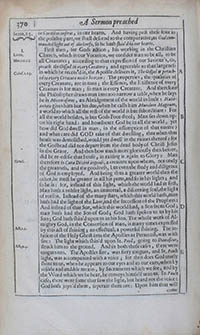 A Sermon preached
370
Serm.25.
A Sermon preached
370
Serm.25.
in Cordibus nostris, in our hearts. And having past these four in
the positive part, we shall descend to the comparative; as God com-
manded light out of darkness, so he hath shin'd in our hearts. I.First then, for Gods action, his working in the Christian
Church, which is our Vocation, we consider man to be all, to be Lucet.
all Creatures;Mar. 16.15. according to that expression of our Saviour's, Go,
preach the Gospel to every Creature; and agreeable to that largeness
in which he receiv'd it,Colos. 1.23. the Apostle delivers it, The Gospel is preach-
ed to every Creature under heaven: The properties, the qualities of
every Creature, are in man; the Essence, the Existence of every
Creature is for man; so man is every Creature. And therefore
the Philosopher draws man into too narrow a table, when he says
he is Microcosmos, an Abridgement of the world in little: Nazi-
anzen gives him but his due, when he calls him Mundum Magnum,
a world to which all the rest of the world is but subordinate: For
all the world besides, is but Gods Foot-stool; Man sits down up-
on his right hand: and howsoever God be in all the world, yet
how did God dwell in man, in the assumption of that nature?
and what care did GOD take of that dwelling, that when that
house was demolished, would yet dwell in the ruines thereof? for
the Godhead did not depart from the dead body of Christ Jesus
in the Grave. And then how much more gloriously then before,
did he re-edifie that house, in raising it again to Glory? Man
therefore is Cura Divini ingenii,Tertul. a creature upon whom, not onely
the greatness, and the goodness, but even the study and diligence
of God is employed. And being thus a greater world then the
other, he must be greater in all his parts, and so in his lights; and
so he is: for, instead of this light, which the world had at first,
Man hath a nobler light, an immortal, a discerning soul, the light
of reason. Instead of the many stars, which this world hath, man
hath had the light of the Law, and the succession of the Prophets:
And instead of that Sun, which this world had, a Son from God;
man hath had the Son of God; God hath spoken to us by his
Son; God hath shin'd upon us in his Son. The whole work of Al-
mighty God, in the Conversion of man, is many times expressed
by this act of shining;Act. 2.2. an effectual, a powerful shining. The in-
fusion of the Holy Ghost into the Apostles at Pentecost, was with
fire: The light which shin'd upon St. Paul, going to Damascus,
struck him to the ground.Act,Act. 9.4. And in both those cases, there were
tongues too. The Apostles fire, was fiery tongues, and St. Pauls
light, was accompanied with a voice; for then does God truely
shine to us, when he appears to our eyes and to our ears, when by
visible and audible means, by Sacraments which we see, and by
the Word which we he hear, he conveys himself unto us. In Pauls
case, there were some that saw the light, but heard not the voice:
God hath joyn'd them, seperate them not: Upon him that will
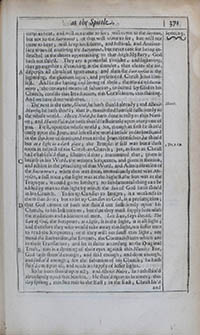 at the Spittle.
371
Serm.25.
at the Spittle.
371
Serm.25.
come to hear, and will not come to see; will come to the Sermon,
but not to the Sacrament; or that will come to see, but will not
come to hear; will keep his solemn, and festival, and Anniver-
sary times of receiving the Sacrament, but never care for being in-
structed in the duties appertaining to that high Mystery, God
hath not shin'd. They are a powerful thunder, and lightning,
that go together: Preaching is the thunder, that clears the air,
disperses all clouds of ignorance; and then the Sacrament is the
lightning, the glorious light, and presence of Christ Jesus him-
self. And in the having and loving of these, the Word and Sacra-
ments, the outward means of salvation, ordained by God in his
Church, consists this Irradiation, this Coruscation, this shining.
And we have done with that. The next is the time, Illuxit, he hath shin'd already;Illuxit. and Illuxit
Mundo, he hath shin'd; that is, manifested himself sufficiently to
the whole world. Illuxit Nobis, he hath done it fully to this Nati-
on; and Illuxit Vobis, he hath shin'd sufficiently upon every one of
you. First, upon the whole world; for, though at first he shin'd
onely upon the Jews, and left all the world beside in darkness, and
in the shadow of death; and even to the Jews themselves, he shin'd
but as a light in a dark place; the Temple it self was but a dark
room in respect of the Christian Church; yet,2 Pet. 1.19. as soon as Christ
had establish'd that, illumin'd that, inanimated that, given it
breath in his Word, the written Scriptures, and given it motion,
and action in the preaching of that Word, and Administration of
the Sacraments, when this was done, immediately there was Me-
ridies, a full noon; the light was at the highest, the Sun was at the
Tropique, it could go no further; no fundamental thing can be
added by man to this light by which the Son of God hath shin'd
in his Church. To set up Candles to Images, is a weakness in
them that do it; but to set up Candles to God, is a presumption;
that God cannot or hath not shin'd out sufficiently upon his
Church, in his Institutions, but that they must supply him with
the traditions and additions of men. Lex Lux, says David, The
Law of God, the Scripture, is a light, it is the light, it is all light;
and therefore they who would take away this light, not suffer men
to read the Scriptures; or if they will not snuff this light, not
mend the Barbarisms, the Errours, the Contradictions which are
in their Translation, and let it shine according to the Original
Truth, this is a shutting of their eyes against this Illuxit: For,
God hath show'd enough, and said enough, and done enough,
and suffer'd enough, for the salvation of his Church; he hath
shin'd out upon all, and needs no supply of lesser lights. So he hath shin'd upon all; and Illuxit Nobis, he hath shin'd
abundantly upon this Nation. He shin'd upon us betimes; this
day sprung, this Sun rose in the East; in the East, Christ liv'd
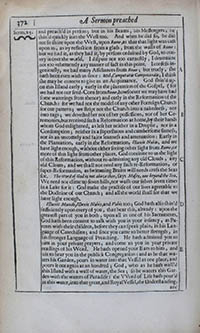 A Sermon preached
372
Serm.25.
A Sermon preached
372
Serm.25.
and preach'd in person; but in his Beams, his Messengers, he
shin'd quickly into the West too. And when he did so, he did
not so shine upon the West, upon Rome, as that that light was cast
upon us, as by reflection from a glass, from the walls of Rome:
but we had it, as they had it, by persons ordained by God, to con-
vey it over the world. I dispute not too earnestly, I determine
not too vehemently any matter of fact in this point. I confess in-
geniously, we had many Assistances from Rome; but truely, she
hath been even with us since: and, Computatis Computandis, I think
she may be content to give us an Acquittance. God shin'd up-
on this Island early; early in the plantation of the Gospel, (for
we had not our seed-Corn from Rome, howsoever we may have had
some waterings from thence) and early in the Reformation of the
Church: for we had not the model of any other Forreign Church
for our pattern; we stript not the Church into a nakedness, nor
into rags; we devested her not of her possessions, nor of her Ce-
remonies, but received such a Reformation at home, by their hands
whom God enlightned, as left her neither in a Dropsie, nor in a
Consumption; neither in a superfluous and cumbersome fatness,
nor in an uncomely and faint leanness and attenuation: Early in
the Plantation, early in the Reformation, Illuxit Nobis, and we
have light enough, without either seeing other light from Rome, or
more of this light from other places. God continue to us the light
of this Reformation, without re-admitting any old Clouds, any
old Clouts, and we shall not need any such re-Reformation, or
super-Reformation, as swimming Brains will needs cross the Seas
for. The Word of God is not above thee, says Moses, nor beyond the Sea.
We need not clime up seven hills, nor wash our selves seven times
in a Lake for it: God make the practise of our lives agreeable to
the Doctrine of our Church; and all the world shall see that we
have light enough. Illuxit Mundo, Illuxit Nobis, and Vobis too; God hath also shin'd
sufficiently upon every of you, that hear this, already: upon the
greatest part of you in both, upon all in one of his Sacraments.
God hath been content to talk with you in your infancy, as Pa-
rents with their children, before they can speak plain, in his Lan-
guage of Catechisms; and since you came to better strength, in
his stronger Language of Preaching. He hath admitted you to
him in your private prayers, and come to you in your private
readings of his Word. He hath opened your Ears to him, and
his to hear you in the publick Congregation: and as he that wa-
ters his Garden, pours in water into that Vessel at one place, and
pours it out again at an hundred; God, who as he hath wall'd
this Island with a wall of water, the Sea; so he waters this Gar-
den with the waters of Paradise: the VVordWord of Life hath pour'd
in this water, into that great, and Royal Vessel, the Understanding,
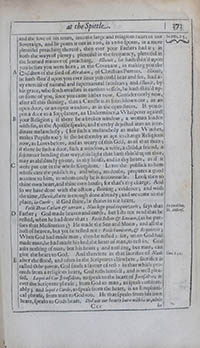 at the Spittle.
373
Serm.25.
at the Spittle.
373
Serm.25.
and the love of his truth, into the large and religious heart of our
Soveraign, and he pours it out in 100, in 1000 spouts, in a more
plentiful preaching thereof, then ever your Fathers had it; in
both the ways of plenty; plentiful in the frequency, plentiful in
the learned manner of preaching. Illuxit, he hath shin'd upon
you before you were born, in the Covenant, in making you the
Children of the seed of Abraham, of Christian Parents. Illuxit,
he hath shin'd upon you ever since you could hear and see, had a-
ny exercise of natural and supernatural faculties; and Illuxit, by
his grace, who sends treasure in earthen vessels, he hath shin'd up-
on some of you, since you came hither now. Consider onely now,
after all this shining, that a Candle is as soon blown out, at an
open door, or an open window, as in the open street. If you o -
pen a door to a Supplanter, an Underminer, a Whisperer against
your Religion; if there be a broken window, a woman loaden
with sin, as the Apostle speaks, and thereby dejected into an inor-
dinate melancholy, (for such a melancholy as make Witches,
makes Papists too) if she be thereby as apt to change Religions
now, as Loves before, and as weary of this God, as of that man;
if there be such a door, such a window, a wife, a child, a friend, a
sojourner bending that way, this light that hath shin'd upon thee,
may as absolutely go out, in thy house, and in thy heart, as if it
were put out in the whole Kingdom. Leave the publick to him
whose care the publick is; and who, no doubt, prepares a good
account to him, to whom onely he is accountable. Look then to
thine own heart, and thine own house; for that's thy charge. And
so we have done with the action, shining, evidence; and with
the time, Illuxit, there is enough done already; and we come to the
place, in Corde; if God shine, he shines in the heart. Fecit Deus Cœlum & terram, Non lego quod requieverit,In Cordibus.
St. Ambros. says that
Father; God made heaven and earth, but I do not read that he
rested, when he had done that: Fecit Solem & Lunam, (as he pur-
sues that Meditation;) He made the Sun and Moon, and all the
host of heaven, but yet he rested not: Fecit hominem, & Requievit;
When God had made man, then he rested: for, when God had
made man, he had made his bed, the heart of man, to rest in. God
asks nothing of man, but his heart; and nothing, but man, can
give the heart to God.Geu.Gen. 8.21. And therefore in that sacrifice of Noah
after the flood, and often in the Scriptures elsewhere, sacrifice is
called Odor quietis, God smelt a savour of rest: in that which pro-
ceeds from a religious heart, God rests himself, and is well plea-
sed. Loqui ad Cor Jerusalem, to speak to the heart of Jerusalem, is
ever the Scripture phrase, from God to man, to speak comfort-
ably; and loqui e Corde, to speak from the heart, is an Emphati-
cal phrase, from man to God too. He that speaks from his own
heart, speaks to Gods heart. Did not our hearts burn within us, while Ccc
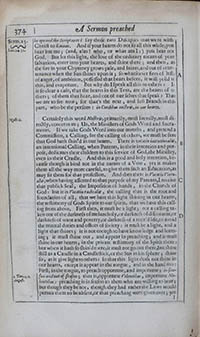 A Sermon preached
374
Serm.25.
A Sermon preached
374
Serm.25.
he opened the Scriptures? say those two Disciples that went with
Christ to Emaus. And if your hearts do not so all this while, you
hear but me;Luc. 24.32. (and, alas! who, or what am I?) you hear not
God. But let this light, the love of the ordinary means of your
salvation, enter into your hearts, and shine there; and then, as
the fire in your Chymney grows pale, and faints, and out of coun-
tenance when the Sun shines upon it; so whatsoever fires of lust,
of anger, of ambition, possessed that heart before, it will yeild to
this, and evaporate. But why do I speak all this to others? Is
it so clear a case, that the hearts in this Text, are the hearts of o-
thers; of them that hear, and not of our selves that speak? That
we are to see now; for that's the next, and last Branch in this
part, who be the persons: in Cordibus nostris, in our hearts. Nostris.Certainly this word Nostris, primarily, most literally, most di-
rectly, concerns us; Us, the Ministers of Gods Word and Sacra-
ments. If we take Gods Word into our mouths, and pretend a
Commission, a Calling, for the calling of others, we must be sure
that God hath shin'd in our hearts. There is vocatio intentionalis,
an intentional Calling, when Parents, in their intention and pur-
pose, dedicatesdedicate their children to this service of God, the Ministry,
even in their Cradle. And this is a good and holy intention, be-
cause though it bind not in the nature of a Vow, yet it makes
them all the way more careful, to give them such an Education, as
may fit them for that profession. And then there is Vocatio Virtu-
alis, when having assented to that purpose of my Parents, I receive
that publick Seal, the Imposition of hands, in the Church of
God: but it is Vocatio radicalis, the calling that is the root and
foundation of all, that we have this light shining in our hearts,
the testimony of Gods Spirit to our spirit, that we have this call-
ing from above. First then, it must be a light; not a calling ta-
ken out of the darkness of melancholy, or darkness of discontent, or
darkness of want and poverty, or darkness of a retir'd life, to avoid
the mutual duties and offices of society: it must be a light, and a
light that shines; it is not enough to have knowledge and learn-
ing; it must shine out, and appear in preaching; and it must
shine in our hearts, in the private testimony of the Spirit there:
but when it hath so shin'd there, it must not go out there, but shine
still as a Candle in a Candlestick, or the Sun in his sphere; shine
so, as it give light to others: so that this light doth not shine in
our hearts, except it appear in the tongue, and in the hand too:
First, in the tounge, to preach opportune, and importune; in sea-
son and out of season;2 Tim. 4.2.
August. that is, opportune Volentibus, importune No-
lentibus: preaching is in season to them who are willing to hear;
but though they be not, though they had rather the Laws would
permit them to be absent, or that preaching were given over; yet
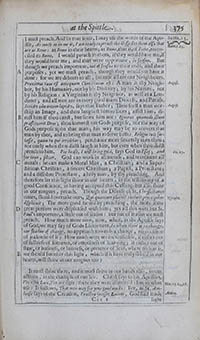 at the Spittle.
375
Serm.25.
at the Spittle.
375
Serm.25.
I must preach. And in that sense, I may use the words of the Apo-
stle, As much as in me is, I am ready to preach the Gospel to them also that
are at Rome: at Rome in their hearts; at Rome, that is, of Rome,Rom. 1.15. recon-
ciled to Rome. I would preach to them, if they would have me, if
they would hear me; and that were opportune, in season. But
though we preach importune, out of season to their ends, and their
purposes, yet we must preach, though they would not have it
done: for we are debters to all, because all are our Neighbours.
Proximus tuus est antequam Christianus est:August. A man is thy Neigh-
bor, by his Humanity, not by his Divinity; by his Nature, not
by his Religion: a Virginian is thy Neighbor, as well as a Lon-
doner; and all men are in every good mans Diocess, and Parish.
Irrides odorantem lapides, says that Father;August. Thou seest a man wor-
ship an Image, and thou laughest him to scorn; assist him, di-
rect him if thou canst, but scorn him not: Ignoras quomodo illum
præsciverit Deus; thou knowest not Gods purpose, nor the way of
Gods purpose upon that man; his way may be to convert that
man by thee, and to bring that man to serve him? Religio tuis for-
tasse, quam tu qui irridebas; perchance more sincerely then thou;
not onely when thou didst laugh at him, but even when thou didst
preach to him. For brass, I will bring gold, says God in Esay; and
for iron, silver.60.17. God can work in all metals, and transmute all
metals: he can make a Moral Man, a Christian; and a Super-
stitious Christian, a sincere Christian; a Papist, a Protestant;
and a dissolute Protestant, a holy man, by thy preaching. And
therefore let this light shine in our hearts, in the testimony of a
good Conscience, in having accepted this Calling, but also shine
in our tongues, preach. Though the Disease of St. Chrysostomes
times, should overtake ours,Nicepho. Qui quantum placuit tantum principibus
displicuit; The more good he did by preaching, the more some
great persons were displeased with him; yet all this were but St.
Paul's importune, a little out of season: but out of season we must
preach. How much more now, now, when, as the Apostle says
of God, we may say of Gods Lieutenant, In whom there is no change,
nor shadow of change, no approach towards a change, no occasion
of jealousie of it? How much were we inexcuseable, if either out
of fullness of fortunes, or emptiness of learning; if either out of
state, or business, or laziness, or pretence of fear, where no fear is,
we should smother this light, which if it have truly shin'd in our
hearts, will shine in our tongues too? It must shine there, and it must shine in our hands also, in our
actions, in the example of our life. Christ says to his Apostles,
Vos estis Lux, You are light: there they were illumin'd':Mat. 15.14, 16. but to what
use? It follows, That men may see your good works: For, as St. Am-
brose says of the Creation, Frustra fecisset Lucem,Ambro. God had made
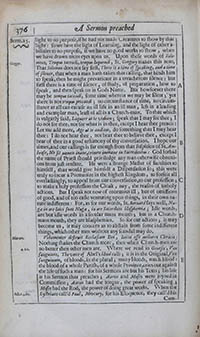 A Sermon preached
376
Serm.25.
A Sermon preached
376
Serm.25.
light to no purpose, if he had not made Creatures to show by that
light: so we have the light of Learning, and the light of other a-
bilities to no purpose, if we have no good works to show, when
we have drawn mens eyes upon us. Upon those words of Solo-
mons,Gregor. Tempus tacendi, tempus loquendi, St. Gregory makes this note,
That Solomon does not say first, There is a time of speaking, and a time
of silence, that when a man hath taken that calling, that binds him
to speak, then he might prevaricate in a treacherous silence: but
first there is a time of silence, of study, of preparation, how to
speak, and then speak on in Gods Name. But howsoever there
may be tempus tacendi, some time wherein we may be silent; yet
there is not tempus peccandi; no circumstance of time, no circum-
stance at all can excuse an ill life in an ill man, less in a leading
and exemplar man, least of all in a Church-man. To that which
is vulgarly said, Loquere ut te vidiam; speak that I may see thee; I
do not see thee, not see what is in thee, except I hear thee preach:
Let me add more, Age ut te audiam, do something that I may hear
thee: I do not hear thee, not hear thee to believe thee, except I
hear of thee in a good testimony of thy conversation. I hope our
times, and our callings is far enough from that suspition of St. Am-
brose, Ne sit nomen inane, crimen immane in Sacerdotibus: God forbid
the name of Priest should priviledge any man otherwise obnoxi-
ous from just censure. He were a strange Master of faculties to
himself, that would give himself a Dispensation so; this were
truly to incur a Premunire in the highest Kingdom, to forfeit all
everlastingly; to appeal from our conversation, to our profession;
to make a holy profession the Cloak, nay, the reason of unholy
actions. But I speak not now of enormous ill, but of omissions
of good, and of too easie venturing upon things, in their own na-
ture indifferent: For, as for our words, St. Bernard says well, Nu-
gæ in ore laici sunt Nugæ, in ore Sacerdotis blasphemiæ; Idle words,
are but idle words in a secular mans mouth; but in a Church-
mans mouth, they are blasphemies. So for our actions; it may
become us, it may concern us to abstain from some indifferent
things, which other men without any scandal may do. Hierom.Vehementer destruit Ecclæsiam Dei, laicos esse meliores Clericis:
Nothing shakes the Church more, then when Church-men are
no better then other men are.4. 10. Where we read in Genesis, Vox
sanguinis, The voice of Abel's blood calls; it is in the Original, Vox
sanguinum, of bloods, in the plural; many bloods, much blood:
the blood of a whole Parish, of a whole Province, cries out against
the life of such a man: for his Sermons are but his Texts; his life
is his Sermon that preaches; Aaron and Moses were joyned in
Commission; Aaron had the tongue, the power of speaking;
Moses had the Rod, the power of doing great works. When the
Lystrians call'd Paul,Act. 14.12. Mercury, for his Eloquence, they call'd his
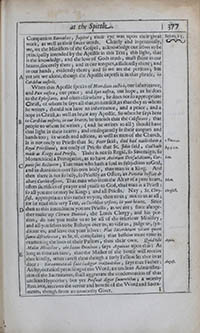 at the Spittle.
377
Serm.25.
at the Spittle.
377
Serm.25.
Companion Barnabas, Jupiter; their eye was upon their great
work, as well as their sweet words. Clearly and ingenuously,
we, we the Ministers of the Gospel, acknowledge our selves to be
principally intended by the Apostle in this Text; this light, that
is the knowledge, and the love of Gods truth, must shine in our
hearts, sincerely there; and in our tongues, assidiously there; and
in our hands, evidently there; and so we are the persons; but
yet not we alone, though the Apostle express it in that phrase, in
Cordibus nostris. When this Apostle speaks of Hereditas nostra, our inheritance;
and Pax nostra, our peace; and Spes nostra, our hope, as he does
to the Ephesians, and often elsewhere, he does not so appropriate
Christ, of whom he says all that, to himself, as that they to whom
he writes, should not have an inheritance, and a peace, and a
hope in Christ, as well as he, or any Apostle. So when he says here
in Cordibus nostris, in our hearts, he intends that the Colossians, that
people to whom he writes, (and he writes to all) should have
that light in their hearts, and consequently in their tongues and
hands too; in words and actions, as well as men of the Church.
It is not onely to Priests that St. Peter said,1 Pet. 2.9. God had made them a
Royal Priesthood; not onely of Priests that St. John said, God hath
made us Kings and Priests. There is not so Regal, so Soveraign,Ap. 5.10. so
Monarchical a Prerogative, as to have Animum Deosubditum,Leo. Cor-
poris sui Rectorem; That man who hath a soul in subjection to God,
and in dominion over his own body, that man is a King. And
then there is not so holy, so Priestly an Office, as Pietatis hostias de
altari Cordis offerre. That man who from the Altar of a pure heart, Idem.
offers sacrifices of prayer and praise to God, that man is a Priest:
so all you are or may be Kings; and all Priests. Nay,Chrysost. St. Chry-
sost. appropriates this rather to you, then to us; not to us at all;
for he read this very Text, in Cordibus vestris, in your hearts. Since
then to this intendment you are Priests, as we are; since altoge-
ther make up Clerum Domini, the Lords Clergy, and his por-
tion, do not you make us to be all of the inferiour Ministry,
and all you selves to be Bishops over us, to visit us, judge us, syn-
dicate us, and leave out your selves: Plus Sacerdotum vitam quam
suum discutientes, as St. G. complains; that bestow more time in
examining the lives of their Pastors, then their own.Aquin. Quid tibi
Malus Minister, ubi bonus Dominus, says Aquinas upon this: As
long as thou art sure, that the Master of the house will receive
thee kindly, what carest thou though a surly Fellow let thee in at
door? Sacramenta ab sunt indigne tractantibus, says that Father:
August. An hypocritical preaching of the Word, an unclean Administra-
tion of the Sacraments, shall aggravate the condemnation of that
unclean Hypocrite; but yet Prosunt digne sumentibus; a worthy
Receiver, receives the vertue and benefit of the Word and Sacra-
ments, though from an unworthy Giver.
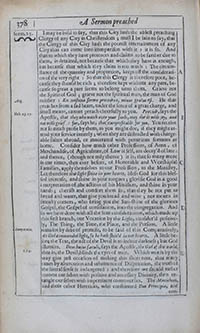 A Sermon preached
378
Serm.25.
A Sermon preached
378
Serm.25.
I may be bold to say, that this City hath the ablest preaching
Clergy of any City in Christendom; must I be fain to say, that
the Clergy of this City hath the poorest intertainment of any
City that can come into comparison with it? it is so. And
that to which they have pretences and claims to be farther due to
them, is detained, not because that which they have is enough,
but because that which they claim is too much: The circum-
stance of the quantity and proportion, keeps off the considerati-
on of the very right: So that this Clergy is therefore poor, be-
cause they should be rich; therefore kept without any part, be-
cause so great a part seems to belong unto them. Grieve not
the Spirit of God; grieve not the spiritual man, the man of God
neither:Aug. Ex tristitia sermo procedens, minus gratus est. He that
preaches from a sad heart, under the sence of a great charge, and
small means, cannot preach cheerfully to you. Provide, says the
Apostle,Heb. 13.17. that they who watch over your souls, may doe it with joy, and
not with grief: for, says he, that's unprofitable for you. You receive
not so much profit by them, as you might doe, if they might at-
tend your service intirely; when they are distracted with charge-
able suites abroad, or macerated with penurious fortunes at
home. Consider how much other Professions, of Arms, of
Merchandise, of Agriculture, of Law it self, are decay'd of late:
and thence, (though not only thence) it is, that so many more
in our times, then ever before, of Honorable and Worshipful
Families, apply themselves to our Profession, to the Ministry.
Let therefore this light shine in your hearts, bless God for this bles-
sed increase, and shine in your tongues; glorifie God in a good
interpretation of the actions of his Ministers, and shine in your
hands; cherish and comfort them so, that they be not put to
bread and water, that give you bread and wine; nor mourn in
smoaky corners, who bring you the Sun-shine of the glorious
Gospel, the Gospel of consolation, into the congregation. And
so we have done with all the four considerations, which made up
this first branch, our Vocation by this Light, consider'd positive-
ly, The Thing, the Time, the Place, and the Persons. A little
remains by debt of promise,Comparatio. to be said of this Comparatively,
As God commanded light, so he hath shin'd in our hearts. A little be-
fore the Text, the act of the Devil is to induce darkness; but God
illumins. Deus hujus sæculi, says the Apostle, the God of this world,
that is,1. 14. the Devil, blinds the eyes of men. Which words by the
way give just occasion of making this short note, that many
times by altercation and vehemence of Disputation, the truth of
the literal sense is indangered: and therefore we should rather
content our selves with positive and necessary Divinity, then en-
tangle our selves with impertinent controversies. The Manichees,
and those other Hereticks, who constituted Duo Principia, and
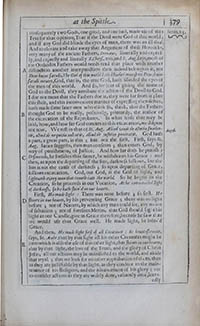 at the Spittle.
379
Serm.25.
at the Spittle.
379
Serm.25.
consequently two Gods, one good, and one bad, made use of this
Text for that opinion; That if the Devil were God of this world,
and if any God did blinde the eyes of man, there was an ill God.
And to elevate and take away that Argument of those Hereticks,
very many of the ancient Fathers, Irenæus, litterally and expres-
ly, and expresly and literally S. Chrys. too, and S. Aug. says, most of
the Orthodox Fathers would needs read that place with another
distinction another interpunction then indeed belongs to it, not
Deus hujus sæculi, The God of this world hath blinded man; but Deus, hujus
sæculi mentes, God, that is, the true God, hath blinded the eyes of
the men of this world. And so, for fear of giving the name of
God to the Devil, they attribute the action of the Devil to God.
I doe not mean that the Fathers doe it, they were far from it; but
this shift, and this inconvenient manner of expressing themselves,
hath made some later men who think so, think, that the Fathers
thought God to be really, positively, primarily, the author of
the excæcation of the Reprobates. In what sense that may be
said, how, and how far God concurs to this excæcation, we dispute
not now. We rest in that of St. Aug. Aliud venit de astutia suaden-
tis, aliud de nequitia nolentis, aliud de justitia punientis.August. God hath
a part, a great part, in this; but not the first. First, says St.
Aug. Satan suggests, then man consents; then enters God, by
way of punishment, of Justice. And how far doth he punish?
Deserendo, he forsakes that sinner, he withdraws his Grace: and
then, as upon the departing of the Sun, darkness follows, but the
Sun is not the cause of darkness; so upon departing of Grace,
follows excæcation. God, our God, is the God of light, and
lightneth every man that cometh into the world. So he begun in the
Creation, so he proceeds in our Vocation, As he commanded light
of darkness, so he hath shin'd in our hearts. First, He made light: There was none before; so first, He
shines in our hearts, by his preventing Grace; there was no light
before; not of Nature, by which any man could see, any means
of salvation; not of foreseen Merits, that God should light his
light at our Candle, give us Grace therefore, because he saw that
we would use that Grace well. He made light, he infus'd
Grace. And then, He made light first of all Creatures: Ut innotescerent,
says, St. Ambr. that by that light all his other Creatures might be
seen: which is also the use of this other light, that shines in our hearts,
that by that light, the love of the Truth, and the glory of Christ
Jesus, all our actions may be manifested to the world, and abide
that tryal; that we look for no other approbation of them, then
as they are justifiable by that light, as they conduce to the main-
tenance of his Religion, and the advancement of his glory: not
to consider actions as they are wisely done, valiantly done, learn-
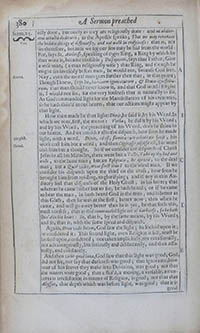 A Sermon preached
380
Serm.25.
edly done, but onely as they are religiously done: and ut abdice-
A Sermon preached
380
Serm.25.
edly done, but onely as they are religiously done: and ut abdice-mus occulta dedecoris,v. 2. as the Apostle speaks; That we may renounce
the hidden things of dishonesty, and not walk in craftiness: that is, not
sin therefore, because we see our sins may be hid from the world:
For, says St. Ambrose, speaking of Gyges Ring, a Ring by which he
that wore it, became invisible; Da sapienti; says that Father, Give
a wise man, (a man religiously wise) that Ring, and though he
might sin invisibly before men, he would not, because God sees.
Nay,Seneca. even the moral man goes further then that, in that point;
Though I knew, says he, hominem ignoraturum, & Deum ignoscitu-
rum, that man should never know it, and that God would forgive
it, I would not sin, for the very foulness that is naturally in sin.
As God commanded light for the Manifestation of his creatures,
so he hath shin'd in our hearts, that our actions might appear by
that light. How then made he that light? Dixit, he said it, by his Word. In
which we note, first, the means: Verbo; he did it by his Word;
and by his Word, the preaching of his Word, doth he shine in
our hearts. And we consider also the dispatch, how soon he made
light,Chrysost. with a word. Dixit, id est, summa cum celeritate fecit, his
work cost him but a word;Tertul. and then Cogitasse jussisse est, his word
cost him but a thought. So if we consider the dispatch of Christ
Jesus in all his Miracles, there went but a Tolle, Take up thy bed and
walk, to the lame man; but an Ephptata, Be opened, to the deaf
man; but a Quid vides, What seest thou? to the blind man. If we
consider his dispatch upon the thief on the cross, how soon he
brought him from reviling, to glorifying; and if any in this Au-
ditory feel that dispatch of the Holy Ghost, in his heart; that
whereas he came hither but to see, he hath heard; or if he came
to hear the man, he hath heard God in the man, and is better at
this Glass, then he was at the first; better now, then when he
came, and will go away better then he is yet, he that feels this,
must confess, that as God commanded light out of darkness, so he hath
shin'd in his heart: So, that is, by the same means, by his Word;
and so, that is, with the same speed and dispatch. Again, Deus vidit lucem, God saw the light; he looked upon it;
he considered it: This second light, even Religion it self, must be
looked upon, considered; not taken implicitely, nor occasionally,
not advantageously, but seriously and deliberately, and then assu-
redly, and constantly. And then vidit quod bona, God saw that this light was good; God
did not see, nor say that darkness was good; that ignorance, how
near of kin soever they make it to Devotion, was good; nor that
the waters were good; that a flui'd, a moving, a variable, an un-
certain irresolution in matter of Religion, is good; nor that that
Abyssus, that depth which was before light, was good; that it is
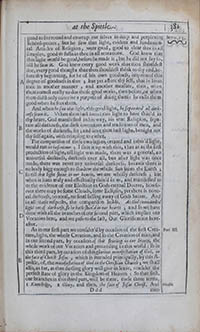 at the Spittle.
381
Serm.25.
at the Spittle.
381
Serm.25.
good to surround and enwrap our selves in deep and perplexing
School-points, but he saw that light, evident and fundamen-
tal Articles of Religion, were good, good to clear thee in all
scruples, good to sustain thee in all tentations. God knew that
this light would be good, before he made it; but he did not say so,
till he saw it. God knew every good work that thou shouldest
doe, every good thought that thou shouldest think to thy end, be-
fore thy beginning, for he of his own goodness, imprinted this
degree of goodness in thee; but yet assure thy self, that he loves
thee in another manner, and another measure, then, when
thou comest really to doe those good works, then before, or when
thou didst only conceive a purpose of doing them: he calls them
good when he sees them. And when he saw this light, this good light, he separated all dark-
ness from it. When thou hast found this light to have shin'd in
thy heart, God manifested in his way, his true Religion, sepa-
rate all darkness, the dark inventions and traditions of men, and
the works of darkness, sin; and since thou hast light, benight not
thy self again, with relapsing to either. The comparison of these two lights, created and infus'd light,
would run in infinitum; I shut it up with this, that as at the first
production of light, till light was made, there was a general, an
universal darkness, darkness over all, but after light was once
made, there was never any universal darkness, because there is
no body bigg enough to shadow the whole Sun from the Earth;
so till this light shine in our hearts, we are wholly darkness; but
when it hath truly and effectually shin'd in us, and manifested to
us the evidence of our Election in Gods eternal Decree, howso-
ever there may be some Clouds, some Eclipses, yet there is no to-
tal darkness, no total, no final falling away of Gods Saints. And
in all these respects, the comparison holds. As God commanded
light out of darkness, so he hath shin'd in our hearts; and so we have
done with all the branches of our second part, which implies our
Vocation here, and we pass to the last, Our Glorification here-
after. Part III.As in our first part we consider'd by occasion of the first Crea-
ture, light, the whole Creation, and so the Creation of man; and
in our second part, by occasion of this shining in our hearts, the
whole work of our Vocation and proceeding in this world: so in
this third part, by occasion of this glorious manifestation of God, in
the face of Christ Jesus, which is intended principally, by this A-
postle, of, the manifestation of God in the Christian Church; we shall
also, as far, as that dazling glory will give us leave, consider the
perfect state of glory in the Kingdom of Heaven: So that first,
our branches in this third part, will be three, these three terms,
1 Knowledge, 2 Glory, and then, the face of Jesus Christ.Divisio. And Ddd
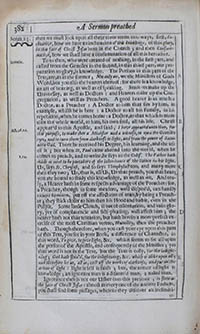 A Sermon preached
382
Serm.25.
A Sermon preached
382
Serm.25.
then we must look upon all these three terms two ways, first, In-
choative, how we have an inchoation of this knowledge, of this glory,
in this face of Christ Jesus here in the Church; and then Consum-
mative, how we shall have a consummation of all this hereafter. Scientia.To us then, who were created of nothing, in the first part, and
called from the Gentiles in the second, in this third part, our pre-
paration to glory, is knowledge. The Persons in this part of the
Text, are, as in the former; Not only we, we the Ministers of Gods
Word, but you also the hearers thereof: for there is a knowledge,
an art of hearing, as well as of speaking. Students make up the
University, as well as Doctors: and Hearers make up the Con-
gregation, as well as Preachers. A good hearer is as much a
Doctor, as a Preacher: A Doctor to him that sits by him, in
example, whilst he is here: a Doctor to all his Family, in his
repetition, when he comes home: a Doctor, to that which is more
then the whole world, to him, his own soul, all his life. Christ
appear'd to this Apostle,Act. 26.16. and said, I have appeared unto thee, for
this purpose, to make thee a Minister and a witness, to open the Gentiles
eyes, and to turn them from darkness to light, and from the power of Satan
unto God. There he received his Degree, his learning, and the use
of it; but when St. Paul came abroad into the world, when he
comes to preach,1.12. and to write, he says to the Colos. The Father hath
made us meet to be partakes of the inheritance of the Saints in his light.
Us, says St. Chrysost, and so says Theophylact too, and many more
then they two; Us, that is, all Us, Us that preach, you that hear;
you are bound to study this knowledge, as well as we. And tru-
ly, a Hearer hath in some respects advantage of the Preacher: for,
a Preacher, though in some measure, well dispos'd, can hardly
exuere hominem, put off the affections of man, by being a Preach-
er; they stick closer to him then his Hood and habit, even in the
Pulpit. Some little Clouds, if not of ostentation, and vain glo-
ry, yet of complacencie and self-pleasing, will affect him; the
hearer hath not that tentation, but hath herein a more perfect ex-
ercise of the most Christian vertue, Humility, then the preacher
hath. Though therefore, when you cast your eye upon this part
of this Text, you see in your Book, a difference of Character, in
this word, To give, to give light, &c. which seems to fix all upon
the person of the Apostle, and consequently of the Minister; yet
that word is not in the Text, but the Text is only, for the inlight-
ning; God hath shin'd, for the inlightning, &c. which is alike upon all;
and therefore let us, all us, cast off the works of darkness, and put on the
armor of light: light it self is faith; but, the armor of light is
knowledge; an ignorant man is a disarm'd man, a naked man. Ignorance then is not our Usher into this presence, to shew us
the face of Christ Jesus: almost in every one of the ancient Fathers,
you shall find some passages, wherein they discover an inclinati-
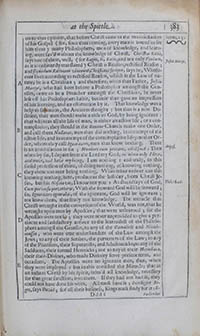 at the Spittle.
383
Serm.25.
on to that opinion, that before Christ came in the manifestation
at the Spittle.
383
Serm.25.
on to that opinion, that before Christ came in the manifestation
of his Gospel (for, since that coming, every man is bound to see
him there) many Philosophers, men of knowledge, and learn-
ing, were sav'd without the knowledge of Christ. Christus Ratio,
says one of them, well, (for Logos, is, Ratio, and not only Verbum,
Justin Martyr. as it is ordinarily translated) Christ is Reason, rectified Reason;
and secundum Rationem vixerunt, Christiani semper, says he, Whoso-
ever lives according to rectified Reason, which is the Law of na-
ture, he is a Christian; and therefore, when that Father, Justin
Martyr, who had been before a Philosopher amongst the Gen-
tiles, came to be a Preacher amongst the Christians, he never
left off his Philosophers habit, because that gave an impression
of his learning, and an estimation by it. That knowledge was a
help to salvation, the Ancients thought: but that is a new Do-
ctrine, that men should make a title to God, by being ignorant:
that whereas all the life of man, is either an active life, or a con-
templative, they should in the Romane Church make one Order,
and call them Nullanos, men that did nothing, in contempt of the
active life, and in contempt of the contemplative life; another Or-
der, whom they call Ignorantes, men that know nothing. There
is an annihilation in sin; Homines cum peccam, nihil sunt:August. Then
when by sin, I depart from the Lord my God, in whom only I live,
and move, and have my being, I am nothing: and truly, in this
sinful profession of thine, of doing nothing, of knowing nothing,
they come too neer being nothing. What other answer can this
knowing nothing, here, produce at the last day, from Christ Je-
sus, but his Nescio vos, I know not you? As David says of God,
Psal. 18.26. Cum perverso perverteris, With the froward God will be froward;
so, Ignorantes ignorabit, of the ignorant, God will be ignorant;
not know them, that study not knowledge. The miracle that
Christ wrought in the conversion of the World, was not, that he
wrought upon men by Apostles, that were unlearned; for the
Apostles were not so; they were never unprovided to give a per-
tinent and satisfactory answer to the learnedest of the Philoso-
phers amongst the Gentiles, to any of the Gamaliels and Nicode-
musses, who were true understanders of the Law amongst the
Jews; to any of their Scribes, the perverters of the Law; to any
of the Pharisees, their Separatists, and Schismaticks; to any of the
Sadduces, their formal Hereticks; nor to any of their Herodians,
their State-Divines, who made Divinity serve present turns, and
occasions. The Apostles were no ignorant men, then, when
they were imployed: but in this consisted the Miracle, that in
an instant Christ by his Spirit, infus'd all knowledge, necessary
for that great function, into them. If they had not had it, they
could not have done his work. All must have it; Intelligite Re-
ges, says David; for all their business, Kings must study for it: E-
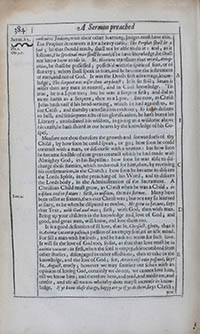 A Sermon preached
384
Serm.25.
rudimini Judices; with their other learning, Judges must have this.
A Sermon preached
384
Serm.25.
rudimini Judices; with their other learning, Judges must have this.
The Prophet denounces it for a heavy curse, Psa. 2.
Ose 9.7.The Prophet shall be a
fool; he that should teach, shall not be able to do it: and, as it
follows, The spiritual man shall be mad; if he have knowledge, he shall
not know how to use it. St. Hierome translates that word, Arrep-
titius, he shall be possessed; possess'd with the spirit of fear, or of
flattery; others shall speak in him, and he become the instrument
of men, and not of God. It was the Devils first advantage, know-
ledge, The Serpent was wiser then any beast: It is so still; Satan is
wiser then any man in natural, and in Civil knowledge. 'Tis
true, he is a Lyon too; but he was a Serpent first; and did us
more harm as a Serpent, then as a Lyon. But now, as Christ
Jesus hath nail'd his hand-writing, which he had against us, to
the Cross, and thereby cancelled his evidence; so in his descent
to hell, and subsequent acts of his glorification, he hath burnt his
Library, annihilated his wisdom, in giving us a wisdome above
his craft; he hath shin'd in our hearts by the knowledge of his Go-
spel. Measure not thou therefore the growth and forwardness of thy
Child, by how soon he could speak, or go; how soon he could
contract with a man, or discourse with a woman: but how soon
he became sensible of that great contract which he had made with
Almighty God, in his Baptism: how soon he was able to dis-
charge those sureties, which undertook for him, then, by receiving
his confirmation, in the Church: how soon he became to discern
the Lords Spirit, in the preaching of his Word, and to discern
the Lords body, in the Administration of the Sacrament. A
Christian Child must grow, as Christ when he was a Child, in
wisdom and in stature:Luc. 2. first, in wisdom, then in stature. Many have
been taller at sixteen, then ever Christ was; but not any so learned
at sixty, as he when he disputed at twelve. He grew in favour, says
that Text, with God and man; first, with God, then with man.
Bring up your children in the knowledge and love of God; and
good, and great men, will know, and love them too. It is a good definition of ill love, that St. Chrysost. gives, that it
is Animæ vacantis passio, a passion of an empty soul, of an idle mind.
For fill a man with business, and he hath no room for such love.
It will fit the love of God too, so far, as that that love must be in
anima vocante: at first, when the soul is empty, disencumbred from
other studies, disengaged in other affections, then to take in the
knowledge, and the love of God; for, Amari nisi nota possunt, says
St. August. truely; however we may slumber our selves with an
opinion of loving God, certainly we do not, we cannot love him,
till we know him; and therefore hear, and read, and meditate, and
confer, and use all means whereby thou mayst increase in know-
ledge. If ye know these things, happy are ye if ye do them, says Christ;
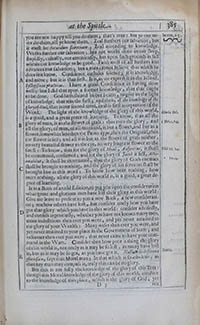 at the Spittle.
385
Serm.25.
at the Spittle.
385
Serm.25.
you are not happy till you do them; that's true: but ye can ne-
ver do them, till ye know them. Zeal furthers our salvation; but
it must be Secundum scientiam, Zeal according to knowledge.
Works further our salvation; but not works done in our sleep,
stupidly, casually, nor erroniously, but upon such grounds as fall
within our knowledge to be good. Faith most of all furthers and
advances our salvation; but a man cannot believe that which he
does not know. Conscience includes science; it is knowledge,
and more; but it is that first. It is, as we express it in the School,
Syllogismus practicus. I have a good Conscience in having done
well; but I did that upon a former knowledge, that that ought
to be done. God hath shined in our hearts, to give us the light
of knowledge, that was the first; and then, of the knowledge of the
glory of God,Gloria Dei. that is our second term, in this first acceptation of the
Word. The light of the knowledge of the glory of this world,
is a good, and a great peece of learning. To know, that all the
glory of man, is as the flower of grass: that even the glory,1 Pet. 1.24. and
all the glory, of man, of all mankind, is but a flower, and but as a
flower, somewhat less then the Proto-type, then the Original, then
the flower it self; and all this but as the flower of grass neither,
no very beautiful flower to the eye, no very fragrant flower to the
smell: To know, that for the glory of Moab, Auferetur,Esai 16.24. it shall
be contemned, consumed; and for the glory of Jacob it self, Atte-
nuabitur, It shall be extenuated,17...4. that the glory of Gods enemies
shall be brought to nothing, and the glory of his servants shall be
brought low in this word: To know how near nothing, how
meer nothing, all the glory of this world is, is a good, a great de-
gree of learning. It is a Book of an old Edition, to put you upon the consideration
what great and glorious men have lost their glory in this world:
Give me leave to present to you a new Book, a new considerati-
on; not how others have lost, but consider onely how you have
got that glory which you have in this world: consider advisedly,
and confess ingeniously, whether you have not known many men,
more industrious then ever you were, and yet never attained to
the glory of your Wealth? Many wiser then ever you were, and
yet never attained to your place in the Government of State; and
valianter then ever you were, that never came to have your com-
mand in the Wars. Consider then how poor a thing the glory
of this world is, not onely as it may be so lost, as many have lost
it, but as it may be so got, as you have got it.Seneca. Nullum indifferens
gloriosum, says that Moral man; In that which is so obvious, as
that any man may compass it, truly this can be no glory. But this is not fully the knowledge of the glory of this Text:
though this Moral knowledge of the glory of this world, conduce
to the knowledge of this place, which is the glory of God; yet
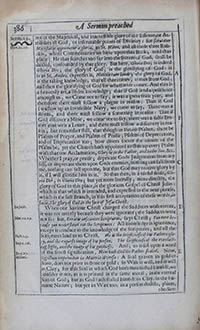 A Sermon preached
386
Serm.25.
A Sermon preached
386
Serm.25.
not of the Majestical, and inaccessible glory of the Essence, or At-
tributes of God, of inscrutable points of Divinity: for scrutator
Majestatis opprimetur a gloria,Prov. 25.27. as St. Hiero. and all those three Rab-
bins, whose Commentaries we have upon that Book, read that
place: He that searches too far into the secrets of God, shall be
dazled, confounded hyby that glory. But here, Gloria Dei, is indeed
Gloria Deo; the glory of God, is the glorifying of God: it
is as St. Ambro. expresses it, Notitia cum laude; the glory of God,
is the taking knowledge, that all that comes, comes from God,
and then the glorifying of God for whatsoever comes. And this is
a heavenly art, a divine knowledge; that if God send a pestilence
amongst us, we Come not to say, it was a great fruit year, and
therefore there must follow a plague in reason: That if God
swallow up an invincible Navy, we come to say, There was a
storm, and there must follow a scattering in reason: That if
God discover a Mine, we come not to say, there was a false Bro-
ther that writ a Letter, and there must follow a discovery in rea-
son; but remember still, that though in Davids Psalms, there be
Psalms of Prayer, and Psalms of Praise; Psalms of Deprecation,
and of Imprecation too; how divers soever the nature of the
Psalm be, yet the Church hath appointed to shut up every Psalm
with that one Acclamation, Glory be to the Father, and to the Son, &c.
Whether I pray, or praise; depricate Gods Judgements from my
self, or imprecate them upon Gods enemies, nothing can fall from
me, nothing can fall upon me, but that God may receive glory by
it, if I will glorifie him in it. So that then, in a useful sense, Glo-
ria Dei, is Gloria Deo; but yet more literally, more directly, the
glory of God in this place, is the glorious Gospel of Christ Jesus:
which is that which is intended, and expressed in the next phrase,
which is the last Branch, in this first acceptation of these words, in
facie, The glory of God in the face of Jesus Christ. In facie.When our Saviour Christ charged the Sadduces with errour,
it was not meerly because they were ignorant; the Sadduces were
not so:Mat. 22.29. but, Erratis nescientes Scripturas, says Christ; You erre be-
cause you understand not the Scriptures: All knowledge is ignorance,
except it conduce to the knowledge of the Scriptures, and all the
Scriptures lead us to Christ.Heb. 1.3. He is the brightness of his Fathers glo-
ry,Sap. 2. 26. and the express image of his person. The brightness of the everlast-
ing light, and the image of his goodness. And, to insist upon a word
of the fittest signification,Jo. 6. 27.
Hillari. Him hath God the Father sealed. Now,
Sigillum imprimitur in Materia diversa: A Seal graven in gold or
stone, does not print in stone or gold: in Wax it will, and it will
in Clay; for this Seal in which God hath manifested himself, we
consider it not, as it is printed in the same metal, in the eternal
Son of God; but as God hath sealed himself in Clay, in the hu-
mane Nature; but yet in Wax too, in a person ductile, pliant,
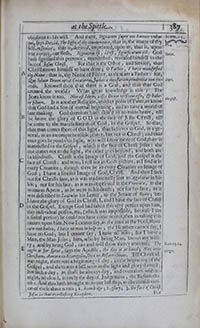 at the Spittle.
387
Serm.25.
at the Spittle.
387
Serm.25.
obedient to his will. And there, Signatum super nos Lumen vultus
tui, says David, The light of thy countenance, that is, the image of thy
self, is sealed; that is, derived, imprinted, upon us, that is,Ps. 4. upon
our nature, our flesh. Signatum est, id est, significatum est:Tertul. God
hath signified this pretence, manifested, revealed himself in the
face of Jesus Christ. For that is the Office, and service, that
Christ avows himself to have done; O Father, I have manifested
thy Name: that is, thy Name of Father, as thou art a Father: for,
Qui Solum Deum novit Creatorem,Cipri. Judaicæ mensuram prudentiæ non ex-
cedit. Knowest thou that there is a God, and that that God
created the world? What great knowledge is this? The
Jews know it too. Non est Idem, nosce Deum opificem esse, & habe-
re filium. It is another Religion, another point of Faith,Chrysost. to know
that God had a Son of eternal begetting, and to have a world of
late making. God therefore hath shin'd in no mans heart, till
he know the glory of GOD in the face of Jesus Christ, till
he come to the manifestation of God, in the Gospel. So that,
that man comes short of this light, that believes in God, in a ge-
neral, in an incomprehensible power, but not in Christ; and that
man goes beyond this light, who will know more of God, then is
manifested in the Gospel, which is the face of Christ Jesus: the
one comes not to the light, the other goes beyond, and both are
in blindness. Christ is the Image of God, and the Gospel is the
face of Christ: and now, I rest nor in Gods picture, as I find it in
every Creature; though there be in every Creatare an Image of
God; I have a livelier Image of God, Christ. And then I seek
not for Christs face, as it was traditionally sent to Agabarus in his
life; nor for his face, as it was imprinted in the Veronica, in the
womans Apron, as he went to his death; nor for his face, as it
was described in Lentulus his Letter, to the Senate of Rome; but
I have the glory of God in Christ, I, and I have the face of Christ
in the Gospel. Except God had taken this very person upon him,
this individual person, me, (which was impossible, because I am
a sinful person) he could not have come nearer, then in taking this
nature upon him. Now I cannot say, as the man at the Pool, Homi-
nem non habeo, I have no man to help me; the Heathen cannot say, I
have no God; but I cannot say, I have no man; for I have a
Man, the Man Jesus; him, who by being Man, knows my mise-
ry; and by being God, can and will show mercy unto me.Rom. 13.12. The
night is far spent, says the Apostle, the day is at hand;Gregor. Nox ante
Christum, Aurora in Evangelio, Dies in Resurrectione. Till Christ all
was night, there was a beginning of day, in the beginning of the
Gospel, and there was a full noon in the light and glory thereof;
but such a day, as shall be always day, and overtaken with no
night, no cloud, is onely the day of Judgement, the Resurrecti-
on: And this hath brought us to our last step, to the considerati-
on of these three terms; 1. knowledge; 2. glory; 3. the face of Christ
Jesus in that everlasting Kingdom.
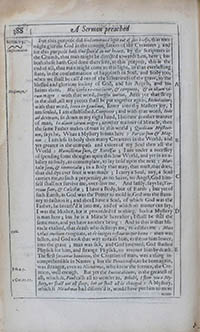 A Sermon preached
388
Serm.25.
A Sermon preached
388
Serm.25.
For this purpose did God command light out of darkness, that men
might glorifie God in the contemplation of the Creatures;Consummative. and
for this purpose hath God shin'd in our hearts, by the Scriptures in
the Church, that man might be directed towards him, here; but
both these hath God done therefore, to this purpose, this is the
end of all, that man might come to this light, in that everlasting
state, in the consummation of happiness in Soul, and body too,
when we shall be call'd out of the solitariness of the grave, to the
blessed and glorious society of God, and his Angels, and his
Saints there.Nazianzen. Hoc verbo re-concinnor, & componor, & in alium vi-
rum migro: with that word, Surgite mortui, Arise yee that sleep
in the dust, all my peeces shall be put together again, Reconcinnor;
with that word, Intra in gaudium, Enter into thy Masters joy, I
am settled, I am established, Componor; and with that word, Sede
ad dextram, sit down army right hand, I become another manner
of man, In alium virum migro; another manner of Miracle, then
the same Father makes of man in this world; Quodnam Mysteri-
um, says he, What a Mystery is man here? Parvus sum & Mag-
nus: I am less in body then many Creatures in the World, and
yet greater in the compass and extent of my Soul then all the
World: Humillimus sum, & Excelsus; I am under a necessity
of spending some thoughts upon this low World, and yet in an a-
bility to study, to contemplate, to lay hold upon the next: Mor-
talis sum, & immortalis; in a Body that may, that must, that does,
that did dye ever since it was made; I carry a Soul, nay, a Soul
carries me, to such a perpetuity, as no Saint, no Angel, God him-
self shall not survive me, over-live me. And lastly, says he, Ter-
renus sum, & Cœlestis; I have a Body, but of Earth; but yet of
such Earth, as God was the Potter to mold it, God was the statu-
ary to fashion it; and then I have a Soul, of which God was the
Father, he breath'd it into me, and of which no matter can say,
I was the Mother, for it proceeded of nothing. Such a Mystery
is man here; but he is a Miracle hereafter; I shall be still the
same man, and yet have another being: And in this is that Mi-
racle exalted, that death who destroys me, re-edifies me: Mors
veluti medium excogitata,Cyril. ut de integro restauraretur homo: man was
fallen, and God took that way to raise him, to throw him lower,
into the grave; man was sick, and God invented, God studied
Physick for him, and strange Physick, to recover him by death.
The first faciamus hominem, the Creation of man, was a thing in-
comprehensible in Nature; but the Denuo nasci, to be born again,
was stranger, Joh. 4.3.Joh. 3.4.even to Nicodemus, who knew the former, the Cre-
ation, well enough. But yet the Immutabimur, is the greatest of
all,1 Cor. 15.57. which St. Paul calls all to wonder at, Behold, I shew you a My-
stery, we shall not all sleep, but we shall all be changed: A Mystery,
which if Nicodemus had discern'd it, would have put him to more
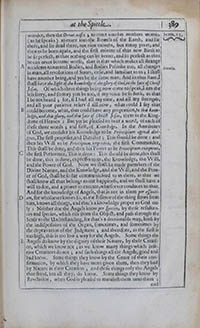 at the Spittle.
389
Serm.25.
at the Spittle.
389
Serm.25.
wonder, then the Denuo nasci; to enter into his mothers womb,
(as he speaks) to enter into the Bowels of the Earth, and lie
there, and lie dead there, not nine months, but many yeers, and
then to be born again, and the first minute of that new Birth to
be so perfect, as that nothing can be better, and so perfect as that
he can never become worse, that is that which makes all strange
accidents to natural Bodies, and Bodies Politike too,Scientia. all changes
in man, all revolutions of States, easie, and familiar to us; I shall
have another being, and yet be the same man. And in that state, I
shall have the light of the knowledge of the glory of God, in the face of Christ
Jesus. Of which three things being now come to speak, I am the
less sorry, and so may you be too, if my voice be so sunk, as that
I be not heard; for, if I had all my time, and all my strength,
and all your patience reserv'd till now, what could I say that
could become, what, that could have any proportion, to this know-
ledge, and this glory, and this face of Christ Jesus, there in the King-
dome of Heaven? But yet be pleased to hear a word, of each of
these three words; and first, of Knowledge. In the Attributes
of God, we consider his Knowledge to be Principium agendi diri-
gens, The first proposer, and Director; This should be done: and
then his Will to be Principium imperans, the first Commander,
This shall be done; and then his Power to be Principium exequens,
the first Performer, This is done: This should be done, this shall
be done, this is done, expresses to us, the Knowledge, the Will,
and the Power of God. Now we shall be made partakers of the
Divine Nature, and the Knowledge, and the Will, and the Pow-
er of God, shall be so far communicated to us there, as that we
shall know all that belongs to our happiness, and we shall have a
will to doe, and a power to execute, whatsoever conduces to that.
And for the knowledge of Angels, that is not in them per essenti-
am, for whosoever knows so, as the Essence of the thing flows from
him, knows all things, and that's a knowledge proper to God on-
ly: Neither doe the Angels know per species, by those resultan-
ces and species, which rise from the Object, and pass through the
Sense to the Understanding, for that's a deceiveable way, both by
the indisposition of the Organ, sometimes, and sometimes by
the depravation of the Judgment; and therefore, as the first is
too high, this is too low a way for the Angels. Some things the
Angels do know by the dignity of their Nature, by their Creati-
on, which we know not; as we know many things which infe-
rior Creatures do not; and such things all the Angels, good and
bad know. Some things they know by the Grace of their con-
firmation, by which they have more given them, then they had
by Nature in their Creation; and those things only the Angels
that stood, but all they, do know. Some things they know by
Revelation, when God is pleased to manifest them unto them;
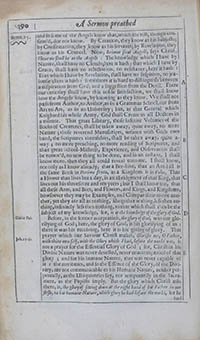 A Sermon preached
390
Serm.25.
A Sermon preached
390
Serm.25.
and so some of the Angels know that, which the rest, though con-
firm'd, doe not know. By Creation, they know as his Subjects;
by Confirmation, they know as his servants; by Revelation, they
know as his Councel. Now, Erimus sicut Angeli, says Christ,
There we shall be as the Angels: The knowledge which I have by
Nature, shall have no Clouds; here it hath: that which I have by
Grace, shall have no reluctation, no resistance; here it hath:
That which I have by Revelation, shall have no suspition, no jea-
lousie; here it hath: sometimes it is hard to distinguish between
a respiration from God, and a suggestion from the Devil. There
our curiosity shall have this noble satisfaction, we shall know
how the Angels know, by knowing as they know. We shall not
pass from Author, to Author, as in a Grammar School, nor from
Art to Art, as in an University; but, as that General which
Knighted his whole Army, God shall Create us all Doctors in
a minute. That great Library, those infinite Volumes of the
Books of Creatures, shall be taken away, quite away, no more
Nature; those reverend Manuscripts, written with Gods own
hand, the Scriptures themselves, shall be taken away, quite a-
way; no more preaching, no more reading of Scriptures, and
that great School-Mistress, Experience, and Observation shall
be remov'd, no new thing to be done, and in an instant, I shall
know more, then they all could reveal unto me. I shall know,
not only as I know already, that a Bee-hive, that an Ant-hill is
the same Book in Decimo sexto, as a Kingdom is in Folio, That
a Flower that lives but a day, is an abridgment of that King, that
lives out his threescore and ten yeers; but I shall know too, that
all these Ants, and Bees, and Flowers, and Kings, and Kingdoms,
howsoever they may be Examples, and Comparisons to one ano-
ther, yet they are all as nothing, altogether nothing, less then no-
thing, infinitely less then nothing, to that which shall then be the
subject of my knowledge, for, it is the knowledge of the glory of God. Gloria Dei.Before, in the former acceptation, the glory of God, was our glo -
rifying of God; here, the glory of God, is his glorifying of us:
there it was his receiving, here it is his giving of glory. That
prayer which our Saviour Christ makes, Glorifie me, O Father,
with thine own self,Joh. 17.5. with the Glory which I had, before the world was, is
not a prayer for the Essential Glory of God; for, Christ in his
Divine Nature was never devested, never unaccompanied of that
glory; and for his humane Nature, that was never capable of
it: the attributes, and so the Essence of the Glory, of the Divi-
nity, are not communicable to his Humane Nature, neither per-
petually, as the Ubiquitaries say, nor temporarily in the Sacra-
ment, as the Papists imply. But the glory which Christ asks
there, is, the glory of sitting down at the right hand of his Father in our
flesh, in his humane Nature, which glory he had before the world, for he
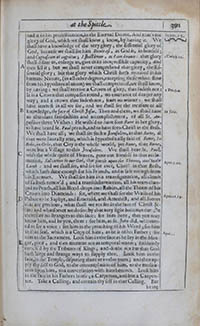 at the Spittle.
391
Serm.25.
at the Spittle.
391
Serm.25.
had it in his predestination, in the Eternal Decree. And that's the
glory of God, which we shall know; know, by having it. We
shall have a knowledge of the very glory, the Essential glory of
God, because we shall see him Sicuti est, as God is, in himself;
and Cognoscam ut cognitus; I shall know, as I am known:1 Cor. 13.12. that glory
shall dilate us, enlarge us, give us an inexpressible capacity, and
then fill it; but we shall never comprehend that glory, the Es-
sential glory; but that glory which Christ hath received in his
humane Nature, (in all other degrees, excepting those which flow
from his hypostatical union) we shall comprehend, we shall know,
by having: 1 Pet. 5.4.we shall receive a Crown of glory, that fadeth not:
It is a Crown that compasses round, no enterance of danger any
way; and a crown that fadeth not, fears no winter: we shall
have interest in all we see, and we shall see the treasure of all
knowledge, the face of Christ Jesus. Then and there,In facie. we shall have
an abundant satisfaction and accomplishment, of all St. Au-
gustines three Wishes: He wish'd to have seen Rome in her glory,
to have heard St. Paul preach, and to have seen Christ in the flesh.
We shall have all; we shall see such a Jerusalem, as that Rome, if
that were literally true, which is hyperbolically said of Rome, In
Urbe, in Orbe, that City is the whole world, yet Rome, that Rome,
were but a Village to this Jerusalem. We shall hear St. Paul,
with the whole quire of Heaven, pour our himself in that accla-
mation, Salvation to our God, that sitteth upon the Throne,Apoc. 7.10. and to the
Lamb: and we shall see, and see for ever, Christ in that flesh,
which hath done enough for his Friends, and is safe enough from
his Enemies. We shall see him in a transfiguration, all clouds
of sadness remov'd; and a transubstantiation, all his tears chan-
ged to Pearls, all his Blood-drops into Rubies, all the Thorns of his
Crown into Diamonds: for, where we shall see the Walls of his
Palace to be Saphyr, and Emerald, and Amethist;Apoc. 21.19. and all Stones
that are precious, what shall we not see in the face of Christ Je-
sus? and whatsoever we do see, by that very sight becomes our. Be
therefore no strangers to this face: see him here, that you may
know him, and he you, there: see him, as St. John did, who turn-
ed to see a voice: see him in the preaching of his Word; see him
in that seal, which is a Copy of him, as he is of his Father;Apoc. 1. see
him in the Sacrament. Look him in the face as he lay in the Man-
ger, poor, and then murmur not at temporal wants; suddainly
enrich'd by the Tributes of Kings, and doubt not but that God
hath large and strange ways to supply thee. Look him in the
face, in the Temple, disputing there at twelve years; and then ap-
ply thy self to God, to the contemplation of him, to the medita-
tion upon him, to a conversation with him betimes. Look him
in the face in his Fathers house; a Carpenter, and but a Carpen-
ter. Take a Calling, and contain thy self in that Calling. But
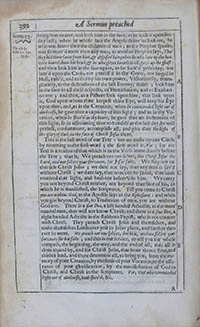 A Sermon preached
392
Serm.25.
A Sermon preached
392
Serm.25.
bring him nearer, and look him in the face, as he look'd upon Fri-
day last; when he whose face the Angels desire to look on, he
who was fairer then the children of men,Psa. 45.3.
Esai 52.14.
53.3. as the Prophet speaks,
was so marr'd more then any man, as another Prophet says, That
they hid their faces from him, & despised him; when he who bore up the hea-
vens bowed down his head, & he who gives breath to all, gave up the ghost:
and then look him in the face again, as he look'd yesterday, not
lam'd upon the Cross, not putrifi'd in the Grave, not singed in
Hell, rais'd, and raised by his own power, Victoriously, trium-
phantly, to the destruction of the last Enemy, death; look him
in the face in all these respects, of Humiliation, and of Exaltati-
on too; and then, as a Picture look upon him, that look upon
it, God upon whom thou keepest thine Eye, will keep his Eye
upon thee, and, as in the Creation, when he commanded light out of
darkness, he gave thee a capacity of this light; and as in thy Vo-
cation, when he shin'd in thy heart, he gave thee an inchoation of
this light, so in associating thee to himself at the last day, he will
perfect, consummate, accomplish all, and give thee the light of
the glory of God, in the face of Christ Jesus there. This is the last word of our Text: but we make up our Circle
by returning to the first word; the first word is, For; for the
Text is reason of that which is in the Verse immediately before
the Text; that is, We preach not our selves, but Christ Jesus the
Lord, and our selves your servants, for Jesus sake. We stop not on
this side Christ Jesus; we dare not say, that any man is sav'd
without Christ; we dare say, that none can be saved, that hath
received that light, and hath not beleev'd in him. We carry
you not beyond Christ neither, not beyond that face of his, in
which he is manifested, the Scriptures. Till you come to Christ
you are without God, as the Apostle says to the Ephesians: and when
you goe beyond Christ, to Traditions of men, you are without
God too. There is a sine Deo, a left handed Atheism, in the meer
natural man, that will not know Christ; and there is a sine Deo, a
right handed Atheism in the stubborn Papist, who is not content
with Christ. They preach Christ Jesus and themselves, and
make themselves Lords over you in Jesus place, and farther then
ever he went. We preach not our selves, but him, and our selves your
servants for his sake; and this is our service, to tell you the whole
compass, the beginning, the way, and the end of all, that all is
done in, and by, and for Christ Jesus, that from thence flow, and
thither lead, and there determine all, to bring you, from the me-
mory of your Creation, by the sense of your Vocation, to the assu-
rance of your glorification, by the manifestation of God in
Christ, and Christ in the Scriptures. For, God who commanded
light out of darkness, hath shin'd, &c.
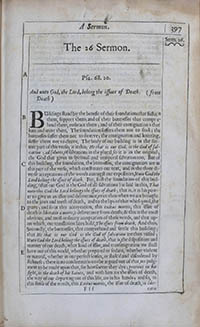 A Sermon.
397
Serm.26.
The 26 Sermon.
Psa. 68.20.
A Sermon.
397
Serm.26.
The 26 Sermon.
Psa. 68.20. And unto God, the Lord, belong the issues of Death. (from
Death). BUildingsBuildings stand by the benefit of their foundations that sustain
them, support them; and of their buttresses that compre-
hend them, embrace them; and of their contignations that
knit and unite them. The foundation suffers them not to sink; the
buttresses suffer them not to swerve; the contignation and knitting,
suffer them not to cleave. The body of our building is in the for-
mer part of this verse; it is this; He that is our God, is the God of sal-
vation; ad salutes, of salvations in the plural, so it is in the original;
the God that gives us spiritual and temporal salvation too. But of
this building, the foundation, the buttresses, the contignation are in
this part of the verse, which constitutes our text, and in the three di-
verse acceptations of the words amongst our expositors, Unto God the
Lord belong the issues of death. For, first the foundation of this buil-
ding, (that our God is the God of all salvations) is laid in this, That
unto this God the Lord belongs the issues of death; that is, it is his pow-
er to give us an issue and deliverance, even then when we are brought
to the jaws and teeth of death, and to the lips of that whirl-pool, the
grave; and so in this acceptation, this exitus mortis, this issue of
death is liberatio a morte, a deliverance from death; & this is the most
obvious, and most ordinary acceptation of these words, and that up-
on which, our translation laies hold, The issues from death. And then,
Secondly, the buttresses, that comprehend and settle this building;
that He that is our God is the God of salvation are thus raised;
Unto God the Lord belong the issues of death, that is, the disposition and
manner of our death, what kind of issue, and transmigration we shall
have out of this world, whether prepared or sodain, whether violent
or natural, whether in our perfect senses, or shak'd and disordered by
sickness; there is no condemnation to be argued out of that, no judg-
ment to be made upon that, for howsoever they dye; precious in his
sight, is the death of his Saints, and with him are the issues of death,
the way of our departing out of this life, are in his hands; and so, in
this sense of the words, this Exitus mortis, the issue of death, is libe-
Fff
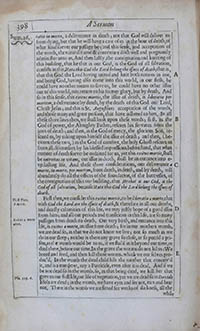 A Sermon
398
Serm.26.
ratio in morte, a deliverance in death; not that God will deliver us
A Sermon
398
Serm.26.
ratio in morte, a deliverance in death; not that God will deliver us
from dying, but that he will have a care of us in the hour of death, of
what kind soever our passage be; and this sense, and acceptation of
the words, the natural frame & contexture doth well and pregnantly
administer unto us. And then lastly, the contignation and knitting of
this building, that he that is our God, is the God of all salvation,
consists in this, Unto this God the Lord belong the issues of death, that is,
that this God the Lord having united and knit both natures in one,
and being God, having also come into this world, in our flesh, he
could have no other means to save us, he could have no other issue
out of this world, nor return to his former glory, but by death. And
so in this sense, this exitus mortis, the issue of death, is liberatio per
mortem, a deliverance by death, by the death of this God our Lord,
Christ Jesus; and this is St. Augustines acceptation of the words,
and those many and great persons, that have adhered to him. In all
these three lines then, we shall look upon these words; first, as the
God of power, the Almighty Father, rescues his servants from the
jaws of death; and then, as the God of mercy, the glorious Son, re-
scued us, by taking upon himself the issue of death; and then, (be-
tween these two,) as the God of comfort, the holy Ghost rescues us
from all discomfort by his blessed impressions before hand, that what
manner of death soever be ordained for us, yet this exitus mortis,
shall be introitus in vitam, our issue in death, shall be an entrance into e-
verlasting life. And these three considerations, our deliverance a
morte, in morte, per mortem, from death, in death, and by death, will
abundantly do all the offices of the foundation, of the buttresses, of
the contignation of this our building, that He that is our God, is the
God of all salvation, because Unto this God the Lord belong the issues of
death. First Part.
A morte.First then, we consider this exitus mortis, to be liberatio a morte; that
with God the Lord are the issues of death, & therefore in all our deaths,
and deadly calamities of this life, we may justly hope of a good issue
from him; and all our periods and transitions in this life, are so many
passages from death to death.Exitus a morte
uteri. Our very birth, and entrance into this
life, is exitus a morte, an issue from death; for in our mothers womb,
we are dead so, as that we do not know we live; not so much as we
do in our sleep; neither is there any grave so close, or so putrid a pri-
son, as the womb would be to us, if we stai'd in it beyond our time, or
died there, before our time. In the grave the worms do not kil us: We
breed and feed, and then kill those worms, which we our selves pro-
duc'd. In the womb the dead child kils the mother that conceiv'd
it, and is a murderer, nay a Parricide, even after it is dead. And if we
be not dead so in the womb, so, as that being dead, we kill her that
gave us our first life, our life of vegetation, yet we are dead so as Davids
Idols are dead;Psa. 115.6. in the womb, we have eyes and see not, ears and hear
not. There in the womb we are fitted for works of darkness, all the
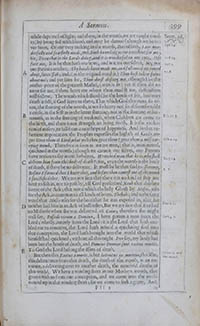 A Sermon.
399
Serm.26.
A Sermon.
399
Serm.26.
while deprived of light; and there, in the womb, we are taught cruel-
ty, by being fed with blood; and may be damned though we be ne-
ver born. Of our very making in the womb, David saies,139. 14. I am won-
derfully and fearfully made, and, Such knowledg is too excellent for me;
for, Even that is the Lords doing, and it is wonderful in our eyes.118. 23. Ipse
fecit nos, It is he that hath made us, and not we our selves, no,200. 3. nor
our Parents neither. Thy hands have made me, and fashioned me round
about, saies Job; and,10. 8. (as the original word is) Thou hast taken pains
about me; and yet saies he, Thou doest destroy me: though I be the
master-peice of the greatest Master, (man is so) yet if thou do no
more for me, if thou leave me where thou mad'st me, destruction
will follow. The womb which should be the house of life, becomes
death it self, if God leave us there. That which God threatens so of-
ten, the shutting of the womb, is not so heavy nor so discomfortable
a curse, in the first as in the latter shutting; not in the shutting of bar-
renness, as in the shutting of weakness,Esa. 37 3. when Children are come to
the birth, and there is not strength to bring forth. It is the exalta-
tion of misery, to fall from a near hope of happiness. And in that ve-
hement imprecation the Prophet expresses the highth of Gods an-
ger Give them O Lord; what wilt thou give them?Ose. 9 14. give them a mis-car-
rying womb. Therefore as soon as we are men, (that is, inanimated,
quickned in the womb) though we cannot our selves, our Parents
have reason to say in our behalves, Wretched man that he is, who shall
deliver him from this body of death? for,Ro. 7.24. even the womb is the body
of death, if there be no deliverer. It must be he that said to Jeremy,
1. 5. Before I formed thee I knew thee, and before thou camest out of the womb
I sanctified thee. We are not sure that there was no kind of ship nor
boat to fish in, nor to pass by, till God prescribed Noah that absolute
forme of the Ark; that word which the holy Ghost by Moses, uses
for the Ark, is common to all kinds of boats, Thebah; and is the same
word that Moses uses for the boat that he was exposed in, that his
mother laid him in an Ark of bullrushes.Exo 2.3. But we are sure that Eve had
no Midwife when she was delivered of Cain; therefore she might
well say, Possedi virum a Domino,Gen. 4.1. I have gotten a man from the
Lord; wholly, intirely from the Lord: it is the Lord that hath ena-
bled me to conceive, the Lord hath infus'd a quickning soul into
that conception, the Lord hath brought into the world that which
himself had quickned; without all this might Eve say, my body had
been but the house of death, and Domini Domini sunt exitus mortis,
To God the Lord belong the issues of death. But then this Exitus a morte, is but Introitus in mortem, this issue,
Exitus a mor-
ibus mundi. this deliverance from that death, the death of the womb, is an en-
trance, a delivering over to another death, the manifold deaths of
this world. We have a winding sheet in our Mothers womb, that
grows with us from our conception, and we come into the world
wound up in that winding sheet; for we come to seek a grave. And,
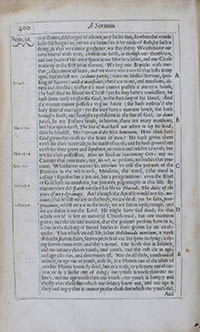 A Sermon
400
Serm.26.
A Sermon
400
Serm.26.
as prisoners, discharged of actions, may lie for fees, so when the womb
hath discharged us, yet we are bound to it by cords of flesh, by such a
string, as that we cannot go thence, nor stay there. We celebrate our
own funeral with cries, even at our birth, as though our threescore,
and ten years of life were spent in our Mothers labor, and our Circle
made up in the first point thereof. We beg one Baptism with ano-
ther, a sacrament of tears; and we come into a world that lasts many
ages, but we last not. In domo patris, (saies our blessed Saviour, spea-
king of heaven) multæ mansiones,Jo. 14.2. there are many, and mansions, di-
vers and durable; so that if a man cannot possess a martyrs house,
(he hath shed no blood for Christ) yet he may have a confessors, he
hath been ready to glorifie God, in the shedding of his blood. And
if a woman cannot possess a virgins house (she hath embrac'd the
holy state of marriage) yet she may have a matrons house, she hath
brought forth, and brought up children in the fear of God. In domo
patris, In my Fathers house, in heaven, there are many mansions,
but here upon earth,Mat. 8 20. The Son of man hath not where to lay his head,
saies he himself, No? terram dedit filiis hominum. How then hath
God given this earth to the Sons of men? He hath given them
earth for their materials, to be made of earth; and he hath given them
earth for their grave and sepulture, to return and resolve to earth; but
not for their possession.Heb. 13.14. Here we havh no continuing City; nay no
Cottage that continues; nay, no we, no persons, no bodies that con-
tinue. Whatsoever moved St. Hierome to call the journies of the
Israelites in the wilderness,Exo. 17.1. Mansions, the word, (the word is
nasang) signifies but a journie, but a peregrination: even the Israel
of God hath no mansions,Gen. 47 9. but journies, pilgrimages in this life. By
that measure did Jacob measure his life to Pharaoh, The daies of the
years of my pilgrimage. And though the Apostle would not say, mo-
rimer, that whilst we are in the body, we are dead, yet he saies, pere-
grinamur,2 Cor. 5 6. whilst we are in the body, we are but in a pilgrimage, and
we are absent from the Lord. He might have said dead; for this
whole world is but an universal Church-yard, but one common
grave; and the life and motion, that the greatest persons have in it,
is but as the shaking of buried bodies in their graves by an earth-
quake. That which we call life, is but Hebdomada mortium, a week
of deaths, seaven daies, seaven periods of our life spent in dying; a dy-
ing seaven times over, and ther's an end. Our birth dies in Infancy,
and our infancy dies in youth, and youth, and the rest die in age;
and age also dies, and determines all. Nor do all these, youth out of
infancy, or age out of youth, arise so, as a Phenix out of the ashes of
another Phenix formerly dead, but as a wasp, or a serpent out of car-
rion, or as a snake out of dung; our youth is worse then our in-
fancy, and our age worse then our youth; our youth is hungry and
thirsty after those sins which our infancy knew not, and our age is
sorry and angry that it cannot pursue those sins which our youth did.
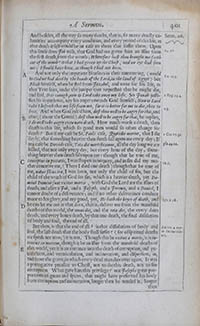 A Sermon.
401
Serm.26.
A Sermon.
401
Serm.26.
And besides, all the way so many deaths, that is, so many deadly ca-
lamities accompany every condition, and every period of this life, as
that death it self would be an ease to them that suffer them. Upon
this sense does Job wish,10. 18. that God had not given him an issue from
the first death, from the womb; Wherefore hast thou brought me forth
out of the womb? O that I had given up the Ghost, and no eye had seen
me; I should have been, as though I had not been. And not only the impatient Israelites in their murmuring, (would
to God we had died by the hands of the Lord,Ex. 16.3. in the land of Egypt) but
Eliah himself, when he fled from Jezabel, and went for his life, as
that Text saies, under the juniper tree requested that he might die,
and said, It is enough, now O Lord take away my life.1 Reg. 19.4. So Jonah justi-
fies his impatience, nay his anger towards God himself; Now O Lord
take I beseech thee my life from me, for it is better for me to die, then to
live. And when God ask'd him, dost thou well to be angry for this,4. 3. and
after, (about the Gourd) dost thou well to be angry for that, he replies,
I do well to be angry even unto death. How much worse a death, then
death is this life, which so good men would so often change for
death? But if my case be St. Pauls case, Quotidie morior,1 Cor. 15.31. that I die
dayly, that something heavier then death fall upon me every day; If
my case be Davids case, Tota die mortificamur,psa. 44.22. all the day long we are
killed, that not only every day, but every hour of the day, some-
thing heavier then death fals upon me: though that be true of me,
conceptus in peccatis, I was shapen in iniquity, and in sin did my mo-
ther conceive me,51. 5. (There I died one death) though that be true of
me, natus filius iræ, I was born, not only the child of sin, but the
child of the wrath of God for sin, which is a heavier death, yet Do-
mini Domini sunt exitus mortis, with God the Lord are the issues of
death; and after a Job, and a Joseph, and a Jeremy, and a Daniel, I
cannot doubt of a deliverance; and if no other deliverance conduce
more to his glory, and my good, yet, He hath the keyes of death,Apo. 1.18. and
he can let me out at that dore, that is, deliver me from the manifold
deaths of this world, the omni die, and the tota die, the every daies
death, and every hours death, by that one death, the final disolution
of body and soul, the end of all. But then, is that the end of all? Exitus a mor-
te Incineratio-
nis. is that dissolution of body and
soul, the last death that the body shall suffer? (for of spiritual deaths
we speak not now;) it is not. Though this be exitus a morte, it is in-
troitus in mortem, though it be an issue from the manifold deaths of
this world, yet it is an entrance into the death of corruption, and pu-
trifaction, and vermiculation, and incineration, and dispersion, in,
and from the grave, in which every dead man dies over again. It was
a prerogative peculiar to Christ, not to die this death, not to see
corruption. What gave him this privilege? not Josephs great pro-
portions of gums and spices, that might have preserved his body
from corruption and incineration, longer then he needed it, longer
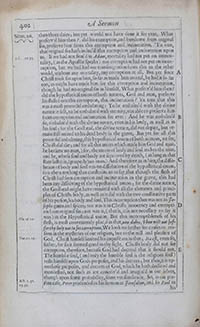 A Sermon
402
Serm.26.
A Sermon
402
Serm.26.
then three daies; but yet would not have done it for ever. What
preserv'd him then? did his exemption, and freedome from original
sin, preserve him from this corruption and incineration. 'Tis true,
that original sin hath induc'd this corruption and incineration upon
us.1 Cor. 15.33. If we had not sinn'd in Adam, mortality had not put on immor-
tality, (as the Apostle speaks) nor corruption had not put on incor-
ruption, but we had had our transmigration from this to the other
world, without any mortality, any corruption at all. But yet since
Christ took sin upon him, so far as made him mortal, he had it so far
too, as might have made him see this corruption and incineration,
though he had no original sin in himself. What preserv'd him then?
did the hypostatical union of both natures, God and man, preserve
his flesh from this corruption, this incineration? 'tis true that this
was a most powerful embalming: To be embalm'd with the divine
nature it self, to be embalm'd with eternity, was able to preserve him
from corruption and incineration for ever: And he was embalm'd
so, embalm'd with the divine nature, even in his body, as well as in
his soul; for the Godhead, the divine nature, did not depart, but re-
main still united to his dead body in the grave. But yet for all this
powerful imbalming, this hypostatical union of both natures, we see,
Christ did die; and for all this union which made him God and man,
he became no man,) for, the union of body and soul makes the man,
and he, whose soul and body are seperated by death, (as long as that
state lasts) is, (properly) no man.) And therefore as in him, the disso-
lution of body and soul was no dissolution of the hypostatical union,
so is there nothing that constrains us to say, that though the flesh of
Christ had seen corruption and incineration in the grave, this had
been any dissolving of the hypostatical union; for the divine nature,
the Godhead might have remain'd with all the elements and princi-
ples of Christs body, as well as it did with the two constitutive parts
of his person, his body and soul. This incorruption then was not in Jo-
sephs gums and spices; nor was it in Christs innocency and exempti-
on from original sin; nor was it, (that is, it is not necessary to say it
was) in the Hypostatical union. But this incorruptibleness of his
flesh,Psa. 16 10. is most conveniently plac,dplac'd in that, non dabis, Thou wilt not suf-
fer thy holy one to see corruption. We look no farther for causes or rea-
sons in the mysteries of our religion, but to the will and pleasure of
God.Mat. 11.26. Christ himself limited his inquisition in that; Ita est, even so,
father, for so it seemed good in thy sight. Christsbody did not see
corruption, therefore, because God had decreed that it should not.
The humble soul, (and only the humble soul is the religions soul)
rests himself upon Gods purposes, and his decrees; but then, it is up-
on those purposes, and decrees of God, which he hath declared and
manifested; not such as are conceiv'd and imagin'd in our selves,
though upon some probability, some verisimilitude. So, in our pre-
sent case,Act. 2.31.
13.35. Peter proceeded in his sermon at Jerusalem, and so Paul in
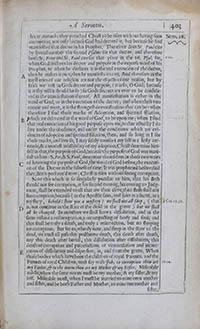 A Sermon.
403
Serm.26.
A Sermon.
403
Serm.26.
his at Antioch; they preached Christ to be risen without having seen
corruption, not only because God had decreed it, but because he had
manifested that decree in his Prophet. Therefore does St. Paul cite
by special number the second Psalme for that decree, and therefore
both St. Peter and St. Paul cite for that place in the 16. Psal. for,
v. 10. when God declares his decree and purpose in the express word of his
Prophet, or when he declares it in the real execution of the decree,
then he makes it ours, then he manifests it to us. And therefore as the
mysteries of our religion are not the objects of our reason, but by
faith we rest in Gods decree and purpose, (it is so, O God, because
it is thy will it should be so) so Gods decrees are ever to be conside-
red in the manifestation thereof. All manifestation is either in the
word of God, or in the execution of the decree; and when these two
concur and meet, it is the strongest demonstration that can be: when
therefore I find those marks of Adoption, and spiritual filiation,
which are delivered in the word of God, to be upon me; when I find
that real execution of his good purpose upon me, as that actually I do
live under the obedience, and under the conditions which are evi-
dences of adoption and spiritual filiation, then, and so long as I see
these marks, and live so, I may safely comfort my self in a holy cer-
titude, & a modest infallibility of my adoption. Christ determins him-
self in that, the purpose of God; because the purpose of God was mani-
fest to him: S. Pet. & S. Paul, determine themselves in those two waies
of knowing the purpose of God, the word of God before, the executi-
on of the Decree in the fulness of time. It was prophecied before, said
they, & it is perform'd now; Christ is risen without seeing corruption. Now this which is so singularly peculiar to him, that his flesh
should not see corruption, at his second coming, his coming to Judg-
ment, shall be extended to all that are then alive, their flesh shall not
see corruption; because (as the Apostle saies, and saies as a secret, as a
mystery, behold I shew you a mystery) we shall not all sleep,1 Cor. 15.51. (that
is, not continue in the state of the dead in the grave) but we shall
all be changed. In an instant we shall have a dissolution, and in the
same instant a redintegration, a recompacting of body and soul; and
that shall be truly a death, and truly a resurrection, but no sleeping
no corruption. But for us, who dy now, and sleep in the state of the
dead, we must all pass this posthume death, this death after death,
nay this death after burial, this dissolution after dissolution, this
death of corruption and putrefaction, of virmiculation and incine-
ration of dissolution and dispersion, in, and from the grave. When
those bodies which have been the children of royal Parents, and the
Parents of royal Children, must say with Job,17.14. to corruption thou art
my Father, & to the worm thou art my Mother & my Sister. Miserable
riddle, when the same worm must be my mother, & my sister, & my
self. Miserable incest, when I must be married to mine own mother
and sister, and be both Father and Mother, to mine one mother and
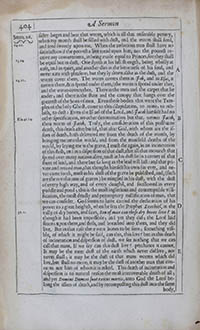 A Sermon
404
Serm.26.
A Sermon
404
Serm.26.
sister beget and bear that worm, which is all that miserable penury,
when my mouth shall be silledfilled with dust, and the worm shall feed,
and feed sweetly upon me.24.20. When the ambitious man shall have no
satisfaction if the poorest a live tread upon him, nor the poorest re-
ceive any contentment, in being made equal to Princes, for they shall
be equal but in dust.23.24. One dyeth at his full strength, being wholly at
ease, and in quiet, and another dies in the bitterness of his soul, and
never eats with pleasure; but they ly down alike in the dust, and the
worm cover them.24.11. The worm covers them in Job, and in Esai, it
covers them, & is spread under them, (the worm is spread under thee,
and the worm covers thee. There is the mats and the carpet that lie
under; and there is the state and the canopy that hangs over the
greatest of the Sons of men. Even those bodies that were the Tem-
ples of the holy Ghost, come to this dilapidation, to ruine, to rub-
bish, to dust: Even the Israel of the Lord, and Jacob himself had no
other specification,Esa. 41.14. no other denomination but that, vermis Jacob,
thou worm of Jacob. Truly, the consideration of this posthume
death, this death after burial, that after God, with whom are the is-
sues of death, hath delivered me from the death of the womb, by
bringing me into the world, and from the manifold deaths of the
world, by laying me in the grave. I must die again, in an incineration
of this flesh, and in a dispersion of that dust, that all that monarch that
spread over many nations alive, must in his dust lie in a corner of that
sheet of lead, and there but so long as the lead will last: and that pri-
vate and retired man, that thought himself his own for ever, and ne-
ver came forth, must in his dust of the grave be published, and, (such
are the revolutions of graves) be mingled in his dust, with the dust
of every high way, and of every dunghil, and swallowed in every
puddle and pond; this is the most inglorious and contemptible villi -
fication, the most deadly and peromptory nullification of man, that
we can consider. God seems to have carried the declaration of his
power to a great heighth, when he sets the Prophet Ezechiel, in the
vally of dry bones,37. 1. and saies, Son of man can these dry bones live? as
though it had been impossible; and yet they did; the Lord laid
sinews upon them, and flesh, and breathed into them, and they did
live. But in that case there were bones to be seen; something visi-
ble, of which it might be said, can this, this live? but in this death
of incineration and dispersion of dust, we see nothing that we can
call that mans. If we say can this dust live? perchance it cannot.
It may be the meer dust of the earth which never did live, nor
never shall; it may be the dust of that mans worms which did
live, but shall no more; it may be the dust of another man that con-
cerns not him of whom it is asked. This death of incineration and
dispersion is to natural reason the most irrecoverable death of all;
and yet Domini Domini sunt exitus mortis, unto God the Lord be -
long the issues of death, and by recompacting this dust into the same
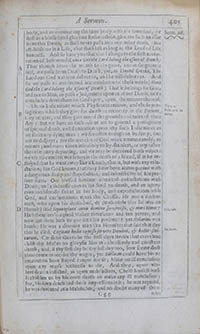 A Sermon.
405
Serm.26.
A Sermon.
405
Serm.26.
body, and re-inanimating the same body with the same soul, he
shall in a blessed and glorious Resurrection, give me such an issue
from this Death, as shall never passe into any other death, but
establish me in a Life, that shall last as long as the Lord of Life
himself. And so have you that that belongs to the first accep-
tation of these words (unto God the Lord belong the issues of Death)
That though from the womb to the grave, and in the grave it
self, we passe from Death to Death, yet, as Daniel speaks, The
Lord our God is able to deliver us, and he will deliver us. And
so we passe to our second accomodation of these words (Unto
God the Lord belong the issues of Death) That it belongs to God,
and not to Man, to passe a Judgement upon us at our Death, or to
conclude a dereliction on God's part, upon the manner thereof. Those Indications which Physitians receive,Part. 2.
Liberatio in
morte. and those pr-
sagitions which they give for death or recovery in the Patient,
they receive, and they give out of the grounds and rules of their
Art: But we have no such rule or art to ground a presagition
of spiritual death, and damnation upon any such Indication as
we see in any dying man: we see often enough to be sorry, but
not to despayr; for the mercies of God work momentanely, in
minuts; and many times insensibly to by-standers, or any other
then the party departing, and we may be deceived both wayes:
we use to comfort our selves in the death of a friend, if it be te-
stifyed that he went away like a Lamb, that is, but with any relu-
ctation; But God knows, that may have been accompanied with
a dangerous damp and stupefaction, and insensibility of his pre-
sent state. Our blessed Saviour admitted colluctations with
Death, and a sadnesse even in his Soul to death, and an agony
even to a bloody sweat in his body, and expostulations with
God, and exclamations upon the Crosse. He was a devout
man, who upon his death-bed, or death-turfe (for he was an
Hermit) said Septuaginta annis domino servivisti, & mori times?
Hast thou serv'd a good Master threescore and ten yeeres,Hilarion. and
now art thou loth to goe into his presence? yet Hilarion was
loath. He was a devoute man (an Hermite) that said that day
that he died, Cogitate hodie cœpisse servire Domino,Barlaam. & hodie fini-
turum. Consider this to be the first days service that ever thou
didst thy Master to gloryfie him in a christianly and constant
death; and, if thy first day be thy last day too, how soone dost
thou come to receive thy wages; yet Barlaam could have beene
content to have stayed longer for it; Make no ill conclusion
upon any man's lothnesse to die. And then, upon vio-
lent deaths inflicted, as upon malefactors, Christ himself hath
forbidden us by his own death to make any ill conclusion;
for, his own death had those impressions in it; he was reputed,
he was executed as a Malefactor, and no doubt many of them Ggg
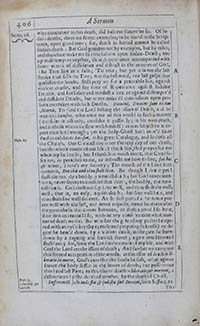 A Sermon
406
Serm.26.
A Sermon
406
Serm.26.
who concurred to his death, did beleeve him to be so. Of so-
dain deaths, there are scarce examples; to be found in the Scrip-
tures, upon good men; for, death in battail cannot be called
sodain death: But God governs not by examples, but by rules;
and therefore make no ill conclusions upon sodain-Death; nor
upon distempers neyther, though perchance accompanied with
some words of diffidence and distrust in the mercies of God.
The Tree lies as it falls; 'Tis true; but yet it is not the last
stroke that fells the Tree; nor the last word, nor last gaspe that
qualifies the Soule. Still pray we for a peaceable life, against
violent deaths, and for time of Repentance against sodaine
Deaths, and for sober and modest assurance against distemper'd
and diffident Deaths, but never make ill conclusiionconclusion upon per-
sons overtaken with such Deaths. Domini, Domini sunt exitus
Mortis, To God the Lord belong the issues of Death, and he
received Samson, who went out of this world in such a manner
(consider it actively, consider it passively; in his own death,
and in those whom he slew with himself) as was subject to inter-
pretation hard enough; yet the holy-Ghost hath mov'd Saint Paul to celebrate Samson, in his great Catalogue, and so doth all
the Church.Heb. 11. Our Criticall day is not the very day of our death,
but the whole course of our life: I thank him, that prayes for me
when my bell tolls; but I thank him much more, that Carechi-
ses me, or preaches to me, or instructs me how to live, fac hoc
& vives, There's my security; The mouth of the Lord hath
spoken it, Doe this and thou shalt live. But though I doe it yet I
shall die too, dy a bodily, a naturall death; but God never men-
tions, never seems to consider that death, the bodily, the natu-
rall death. God doth not say Live well, and thou shalt die well;
well, that is, an easy, a quiet death; but live well here, and
thou shalt live well for ever. As the first part of a Sentence pee-
ces well with the last, and never respects, never hearkens after
the parenthesis that comes between, so doth a good life here,
flow into an eternall life, without any consideration what man-
ner of death we die. But whether the gate of my prison be ope-
ned with an oyl'd key (by a gentle and preparing sicknesse) or the
gate be hew'd down, by a violent death, or the gate be burnt
down by a rageing and frantick feaver; a gate into Heaven I
shall have; for, from the Lord is the course of my life, and with
God the Lord are the issues of death; And farther we carry not
this second acceptation of the words, as this issue of death is li-
beratio in morte, God's care that the Soule be safe, what agonie
soever the body suffer in the houre of death; but passe to our
third and last Part; as this issue of death is liberatio per mortem, a
deliverance by the death of another, by the death of Christ. Part. 3.
Liberatio per
mortem.Sufferentiā Job audiistis & judistis finē Domini, saies S. Ja. 5.11.
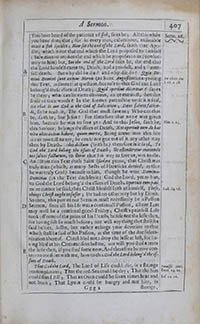 A Sermon.
407
Serm.26.
A Sermon.
407
Serm.26.
You have heard of the patience of Job, saies he; All this while
you have done that; for in every man, calamitous, miserable
man a Job speaks; Now see the end of the Lord, saith that Apo-
stle, which is not that end which the Lord proposed to himself
(Salvation to us) nor the end which he proposes to us (confor-
mity to him) but, See the end of the Lord saies he, the end that
the Lord himself came to, Death, and a painfull, and a shame-
full death. But why did he die? and why die so? Quia Do-
mini Domini sunt exitus Mortis (as Saint Augustine interpreting
this Text,De Civit. Dei
l. 17. c. 18. answers that question) because to this God our Lord
belong'd these issues of Death; Quid apertius diceretur? sayes
he there; what can be more obvious, more manifest, then this
sense of these words? In the former part of the verse it is said,
He that is our God is the God of Salvation; Deus salvos facien-
di, so he reads it, The God that must save us; Who can that
be, saith he, but Jesus? For therefore that name was given
him, because he was to save us: And to this Jesus, saith he,
Mat. 1.21. this Saviour, belongs the issues of Death, Nec oportuit cum de hac
vita alios exitus habere, quam mortis, Being come into this life
in our mortall nature, he could not goe out of it any other way
then by Death. Ideo dictum (saith he) therefore is it said, To
God the Lord belong the issues of Death; Ut ostenderetur moriendo
nos salvos facturum, to shew that his way to save us, was to die.
And from this Text doth Saint Isiodore prove, that Christ was
truly man (which, as many Sects of Hereticks denied, as that
he was truly God) because to him, though he were Dominus
Dominus (as the Text doubles it) God the Lord, yet to him,
to God the Lord belong'd the issues of Death. Oportuit eum pati,
more cannot be said, then Christ himself saith of himself, These,
Luk. 24.26. things Christ ought to suffer; He had no other way but by Death.
So then, this part of our Sermon must necessarily be a Passion
Sermon, since all his life was a continuall Passion, all our Lent
may well be a continual good-Friday; Christ's painfull Life
took off none of the pains of his Death; he felt not the lesse then,
for having felt so much before; nor will any thing that shall be
said before, lessen, but rather enlarge your devotion to that
which shall be said of his Passion, at the time of the due solem-
nization thereof. Christ bled not a drop the lesse at last, for ha-
ving bled at his Circumcision before, nor will you shed a teare
the lesse then, if you shed some now. And therefore be now con-
tent to consider with me, how to this God the Lord belong'd the is-
sues of Death. Potuisse Mori.That God the Lord, The Lord of Life could die, is a strange
contemplation; That the red-Sea could be dry;Exod. 14.21. That the Sun
could stand still;Jos. 10.12. That an Oven could be seven times heat and
not burn; That Lyons could be hungry and not bite, is
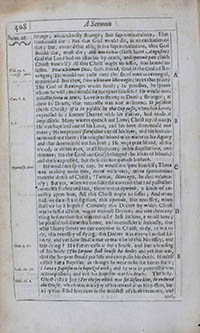 A Sermon
408
Serm.26.
A Sermon
408
Serm.26.
strange, miraculously strange; But super-miraculous, That
God could die: But that God would die, is an exaltation of
that; But, even of that also, it is a super-exaltation, that God
should die, must die; and non exitus (saith Saint Augustin)
God the Lord had no issue but by death, and oportuit pati (saith
Christ himself) all this Christ ought to suffer, was bound to
suffer.Psal. 94.1. Deus ultionum Deus, saith David, God is the God of Re-
venges; He would not passe over the sin of man unrevenged, Voluisse Mori.
unpunished. But then, Deus ultionum libere egit (sayes that place)
The God of Revenges works freely; he punishes, he spares
whom he will; and would he not spare himself? He would not.
Dilectio fortis ut Mors,Can. 8.6. Love is as strong as Death; stronger; it
drew in Death, that naturally was not welcome. Si possibile
(saith Christ) If it be possible let this Cup passe, when his Love,
expressed in a former Decree with his Father, had made it
impossible. Many waters quench not Love; Christ tryed many;
He was baptized out of his Love,v. 7. and his love determin'd not
there; He wept over Jerusalem out of his love, and his love de-
termined not there; He mingled blood with water in his Agony
and that determined not his love; He wept pure blood, all his
blood, at all his eyes, at all his pores; in his flagellations, and
thornes; (to the Lord our God) belonged the issues of blood.)
and these expressed, but these did not quench his love. Oportuisse MoriHe would not spare, nay, he would not spare himself; There
was nothing more free, more voluntary, more spontaneous
then the death of Christ; 'Tis true, libere egit, he died volunta-
rily; But yet, when we consider the contract that had passed be-
tween his Father and him, there was an Oportuit, a kinde of ne-
cessity upon him, All this Christ ought to suffer; And when
shall we date this obligation, this Oportuit, this necessity, when
shall we say it begun? Certainly this Decree by which Christ
was to suffer all this, was an eternall Decree; and was there any
thing before that that was eternall? Infinite love, eternall love;
be pleased to follow this home, and to consider it seriously, that
what liberty soever we can conceive in Christ, to dy, or not to
dy, this necessity of dying, this Decree is as eternall as that Li-
berty, and yet how small a matter made he of this Necessity, and
this dying?Gen. 3.15. His Father calls it but a Bruise, and but a bruising
of his heele (The Serpent shall bruise his heele) and yet that was,
that the Serpent should practise and compasse his death. Himself
calls it but a Baptism, as though he were to be the better for it;
I have a Baptism to be baptized with;Luk. 12.50. and he was in paine till it was
accomplished; and yet this Baptism was his death. The holy-
Ghost calls it Joy (For the joy which was set before him, he endured
the Crosse) which was not a joy of his reward after his passion,Heb. 12.2. but
a joy that filled him even in the middest of those torments, and
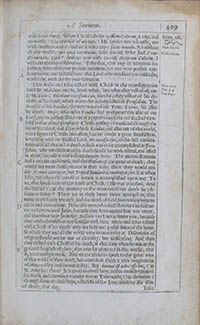 A Sermon.
409
Serm.26.
A Sermon.
409
Serm.26.
arose from them. When Christ cals his passion Calicem, a cup, and
no worse, (Can ye drink of my cup;) He speaks not odiously, not
with detestation of it; indeed it was a cup; salus mundo,Mat. 20.22. A health to
all the world; and quid retribuem, saies David,Psal. 116.12. What shall I ren-
der unto the Lord? Answer you with David, Accipiam Calicem, I
will take the cup of salvation. Take that, that cup of salvation his
passion, if not into your present imitation, yet into your present con-
templation, and behold how that Lord who was God yet could die,
would die, must die for your salvation. That Moses and Elias talked with Christ in the transfiguration
both St. Matthew, and St. Mark tel us; but what they talked of,Mat 17.3.
Mat. 9.4.
Luc. 9.31. on-
ly St. Luke; Dicebant excessum ejus, saies he; they talked of his de-
cease, of his death, which was to be accomplished at Jerusalem. The
word is of his Exodus, the very word of our Text, Exitus, his issue
by death. Moses, who in his Exodus had prefigured this issue of our
Lord, and in passing Israel out of Egypt through the red sea, had fore-
told in that actual prophecy Christs passing of mankind through the
sea of his blood, and Elias, whose Exodus, and issue out of this world,
was a figure of Christs ascension, had no doubt a great satisfaction,
in talking with our blessed Lord, De excessu ejus, of the full consum-
mation of all this in his death, which was to be accomplished at Jeru-
salem. Our meditation of his death should be more viseral, and affect
us more, because it is of a thing already done. The ancient Romans
had a certain tenderness, and detestation of the name of death; they
would not name death, no not in their wils; there they would not
say, Si mori contingat, but Si quid humanitas contingat, not if or when
I die, but when the course of nature is accomplished upon me. To
us, that speak daily of the death of Christ, (He was crucified, dead
and buried) can the memory or the mention of our death be irk-
some or bitter? There are in these latter times amongst us, that
name death freely enough, and the death of God, but in blasphemous
oaths and execrations. Miserable men, who shall therefore be said ne-
ver to have named Jesus, because they have named him too often;
and therefore hear Jesus say, Nescive vos I never knew you; because
they made themselves too familiar with him. Moses and Elias talked
with Christ of his death only in a holy and joyful sence of the bene-
fit which they and all the world were to receive by it. Discourses of
religion should not be out of curiosity, but edification. And then
they talked with Christ of his death, at that time when he was at the
greatest heighth of glory, that ever he admitted in this world; that
is, his transfiguration. And we are afraid to speak to the great men
of this world of their death, but nourish in them a vain imagination
of immortallity and immutability. But bonum est nobis esse hic, (as
St. Peter said there) It is good to dwell here, in this consideration of
his death, and therefore transfer we our Tabernacle, (our devotion)
through some of these steps, which God the Lord made to his issue of death, that day.
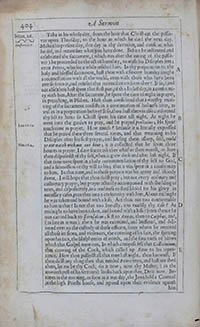 A Sermon
404
Serm.26.
ConformitasTake in his whole day, from the hour that Christ eat the passo-
A Sermon
404
Serm.26.
ConformitasTake in his whole day, from the hour that Christ eat the passo-ver upon Thursday, to the hour in which he died the next day.
Make this present day, that day in thy devotion, and consider what
he did, and remember what you have done. Before he instituted and
celebrated the sacrament, (which was after the eating of the passo-
ver) he proceeded to the act of humility, to wash his Disciples feet;
even Peters, who for a while resisted him. In thy preparation to the
holy and blessed sacrament, hast thou with a sincere humilty sought
a reconciliation with all the world, even with those who have been
averse from it, and refused that reconciliation from thee? If so, (and
not else) thou hast spent that first part, of this his last day, in a conformi-
ty with him. After the sacrament, he spent the time til night in prayer,
in preaching, in Psalms. Hast thonthou considered that a worthy recei-
ving of the sacrament consists in a continuation of holiness after, as
wel as in a preparation before? If so, thou hast therein also conformed
thy self to him: so Christ spent his time till night. At night he
went into the garden to pray, and he prayed prolixius; He spent
much time in prayer.Luc. 22.24. How much? because it is literally expressed
that he praied there three several times, and that returning to his
Disciples after his first prayer, and finding them asleep, said, could
ye not watch with me one hour;Mat. 26.40. it is collected that he spent three
houres in prayer. I dare scarce ask thee whither thou wentst, or how
thou disposedst of thy self, when it grew dark and after last night. If
that time were spent in a holy recommendation of thy self to God,
and a submission of thy will to his; that it was spent in a conformity
to him. In that time, and in those prayers was his agony and bloody
sweat. I will hope that thou didst pray; but not every ordinary and
customary prayer, but prayer actually accompanied with shedding of
tears, and dispositively, in a readiness to shed blood for his glory in
necessary cases, puts thee into a corformityconformity with him. About midnight
he was taken and bound with a kiss. Art thou not too conformable
to him in that? Is not that too literally, too exactly thy case? At
midnight to have been taken, and bound with a kiss? from thence he
was carried back to Jerusalem; first to Annas, then to Caiphas, and,
(as late as it was) there he was examined, and buffeted, and deli-
vered over to the custody of those officers, from whom he received
all those irrsions, and violences, the covering of his face, the spitting
upon his face, the blasphemies of words, and the smartness of blows
which that Gospel mentions. In which compass fell that Gallicinium,
that crowing of the Cock, which called up Peter to his repen-
tance. How thou passedst all that time last night, thou knowest. If
thou didst any thing then that needed Peters tears, and hast not shed
them, let me be thy Cock, do it now; now thy Master, (in the
unworthyest of his servants) looks back upon thee, Do it now. Be-
times in the morning, as soon as it was day, the Jews held a Councel
in the high Priests house, and agreed upon their evidence against
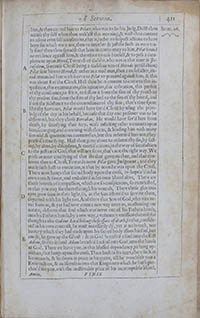 A Sermon.
411
Serm.26.
A Sermon.
411
Serm.26.
him, & then carried him to Pilate, who was to be his Judg. Didst thou
accuse thy self when thou wak'dst this morning, & wast thou content
to admit even fals accusations, that is, rather to suspect actions to have
been sin which were not, then to smother & justifie such as were tru-
ly sins? then thou spendst that hour in conformity to him. Pilat found
no evidence against him; & therefore to ease himself, & to pass a com-
plement upon Herod, Tetrarch of Galilee, who was at that time at Je-
rusalem, (because Christ being a Galilean was of Herods jurisdiction)
Pilat sent him to Herod; & rather as a mad man, then a malefactor, He-
rod remanded him with scorns to Pilat to proceed against him; & this
was about 8 of the Clock. Hast thou been content to come to this in -
quisition, this examination, this agitation, this cribration, this pursuit
of thy conscience, to sift it, to follow it from the sins of thy youth to
thy present sins, from the sins of thy bed to the sins of thy board, and
from the substance to the circumstance of thy sins; that's time spent
like thy Saviours. Pilat would have sav'd Christ by using the privi-
ledg of the day in his behalf, because that day one prisoner was to be
delivered; but they chose Barrabas. He would have sav'd him from
death, by satisfying their fury, with inflicting other torments upon
him, scourging, and crowning with thorns, & loading him with many
scornful & ignominious contumelies; but this redeem'd him not; they
press'd a crucifying. Hast thou gone about to redeem thy sin, by fast-
ing, by alms, by disciplines, & mortifications, in the way of satisfaction
to the justice of God; that will not serve, that's not the right way. We
press an utter crucifying of that sin that governs thee, and that con-
forms thee to Christ. Towards noon Pilat gave Judgment; and they
made such hast to execution, as that by noon he was upon the Cross.
There now hangs that sacred body upon the cross, re-baptiz'd in his
own tears & sweat, and embalm'd in his own blood alive. There are
those bowels of compassion, which are so conspicuous, so manifested,
as that you may see them through his wounds. There those glorious
eyes grew faint in their light, so, as the Sun asham'd to survive them,
departed with his light too. And there that Son of God, who was ne-
ver from us, & yet had now come a new way unto us, in assuming our
nature, delivers that soul which was never out of his Fathers hands,
into his Fathers hands, by a new way, a voluntary emission thereof; for
though to this God our Lord belong these issues of death, so that, conside-
red in his own contract, he must necessarily dy, yet at no breach, nor
battery which they had made upon his sacred body issues his soul, but
emisit, he gave up the Ghost: & as God breath'd a soul into the first
Adam, so this second Adam breath'd his soul into God, into the hands
of God. There we leave you, in that blessed dependancy, to hang up-
on him, that hangs upon the cross. There bath in his tears, there suck at
his wounds, & lie down in peace in his grave, till he vouchsafe you a
Resurrection, & an ascension into that Kingdome which he hath pur-
chas'd for you, with the inestimable price of his incorruptible blood. Amen. FINIS